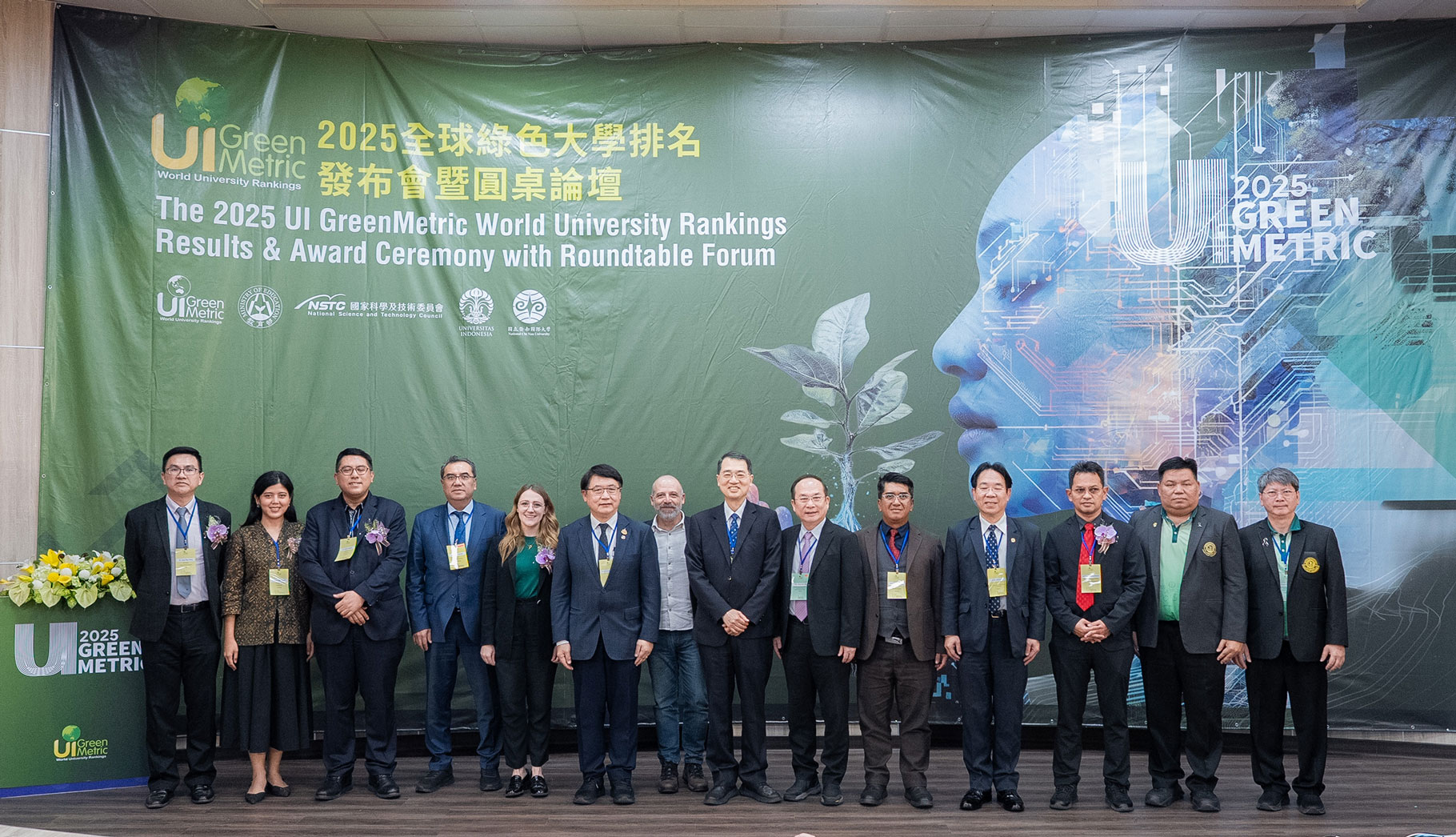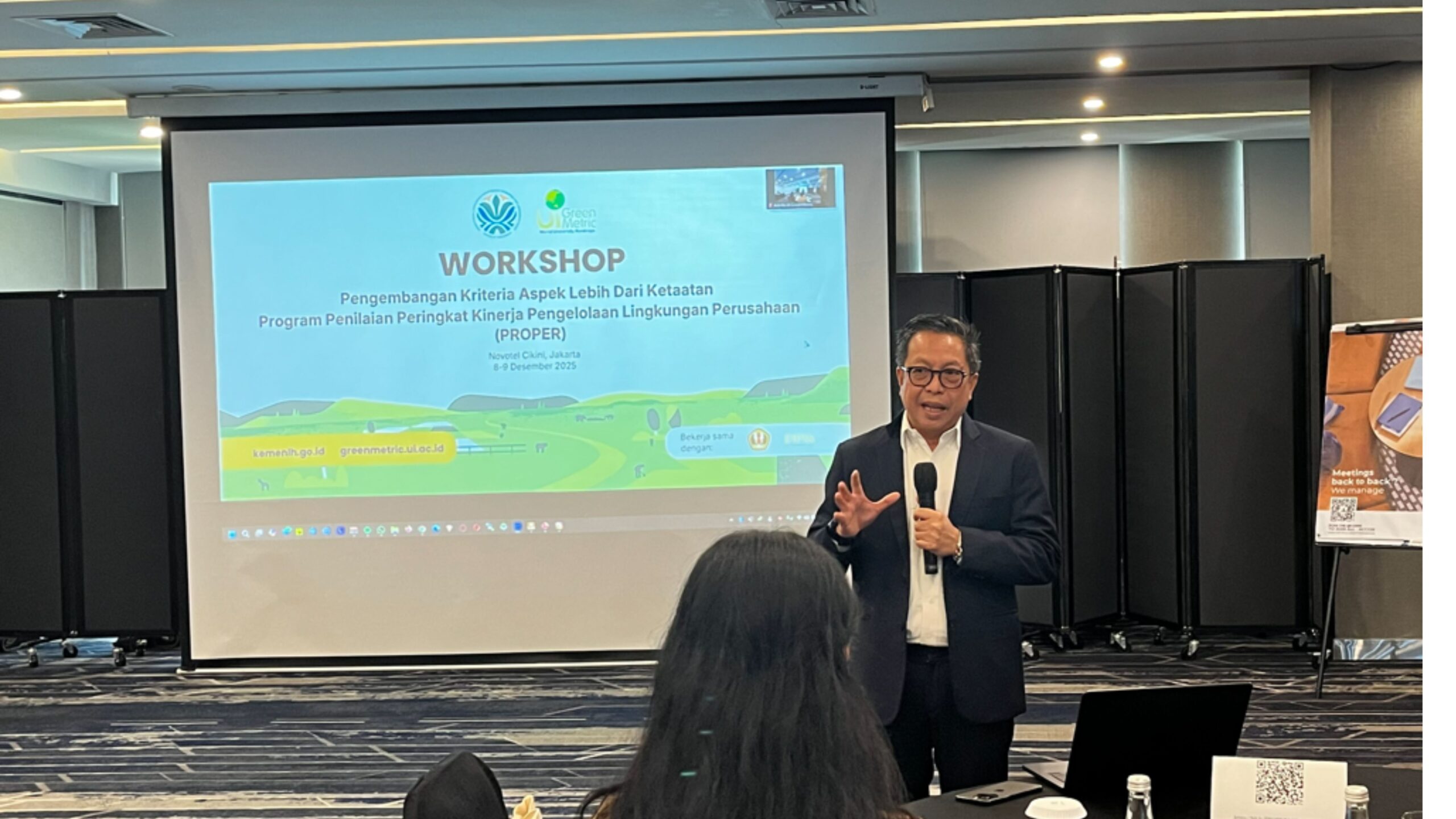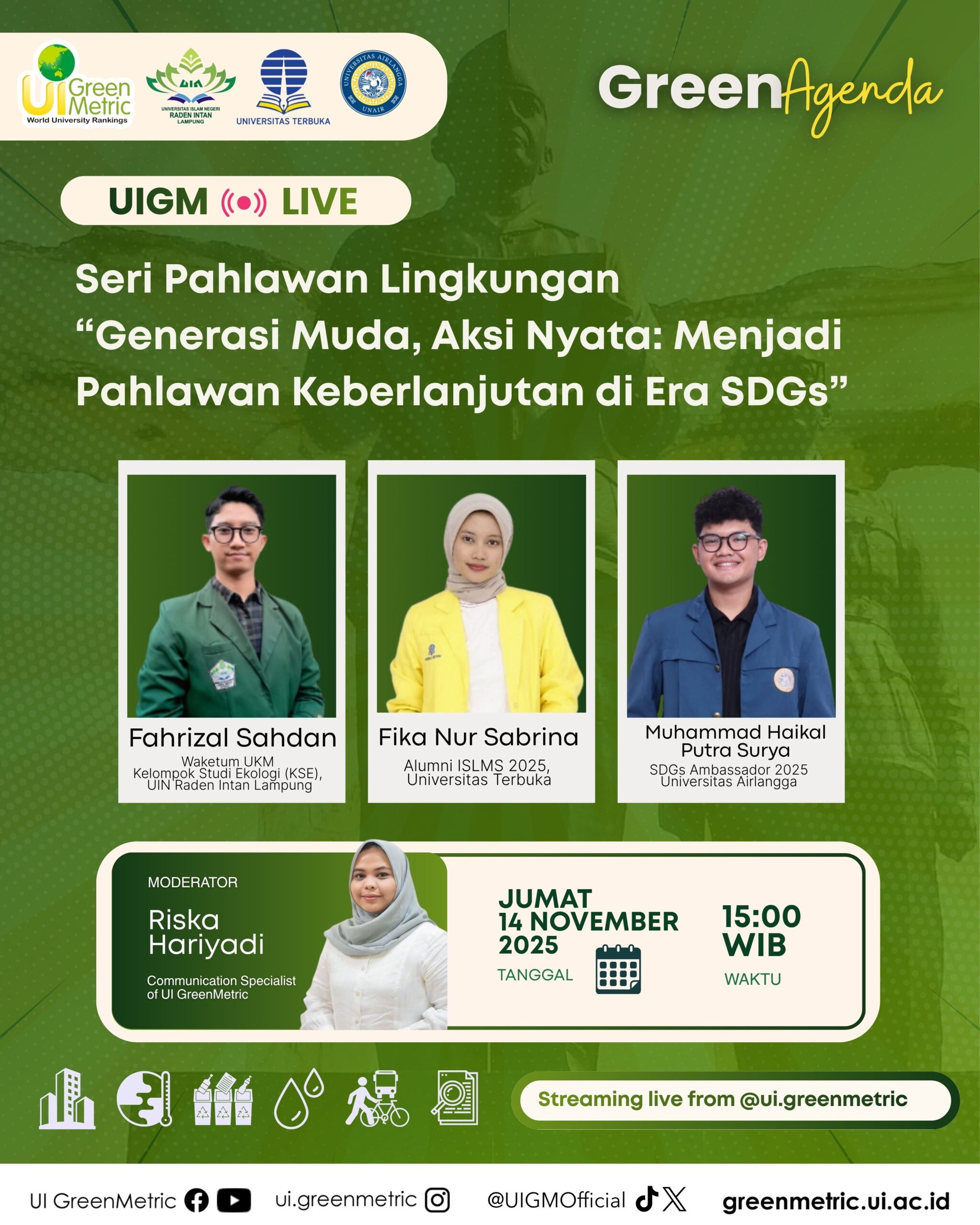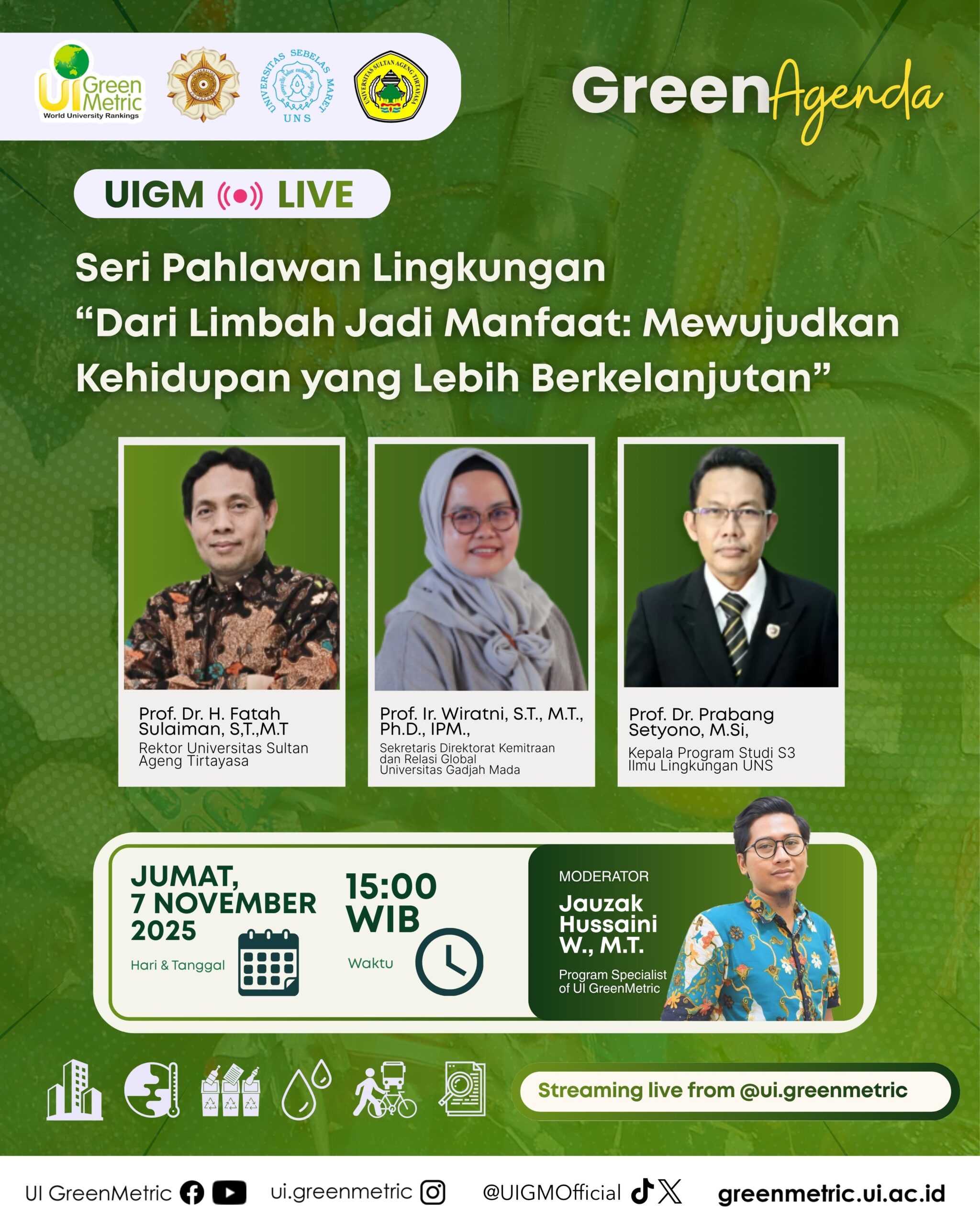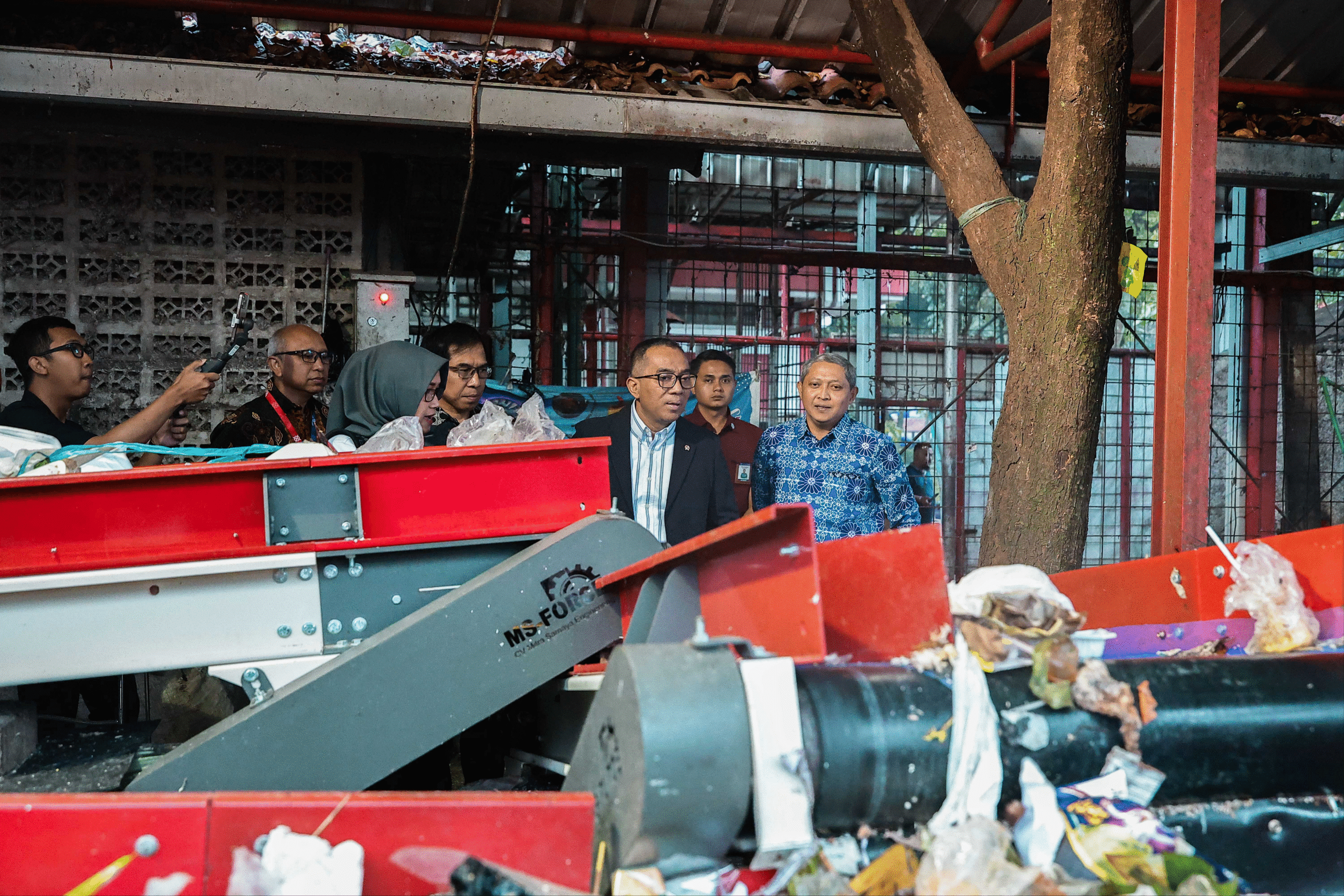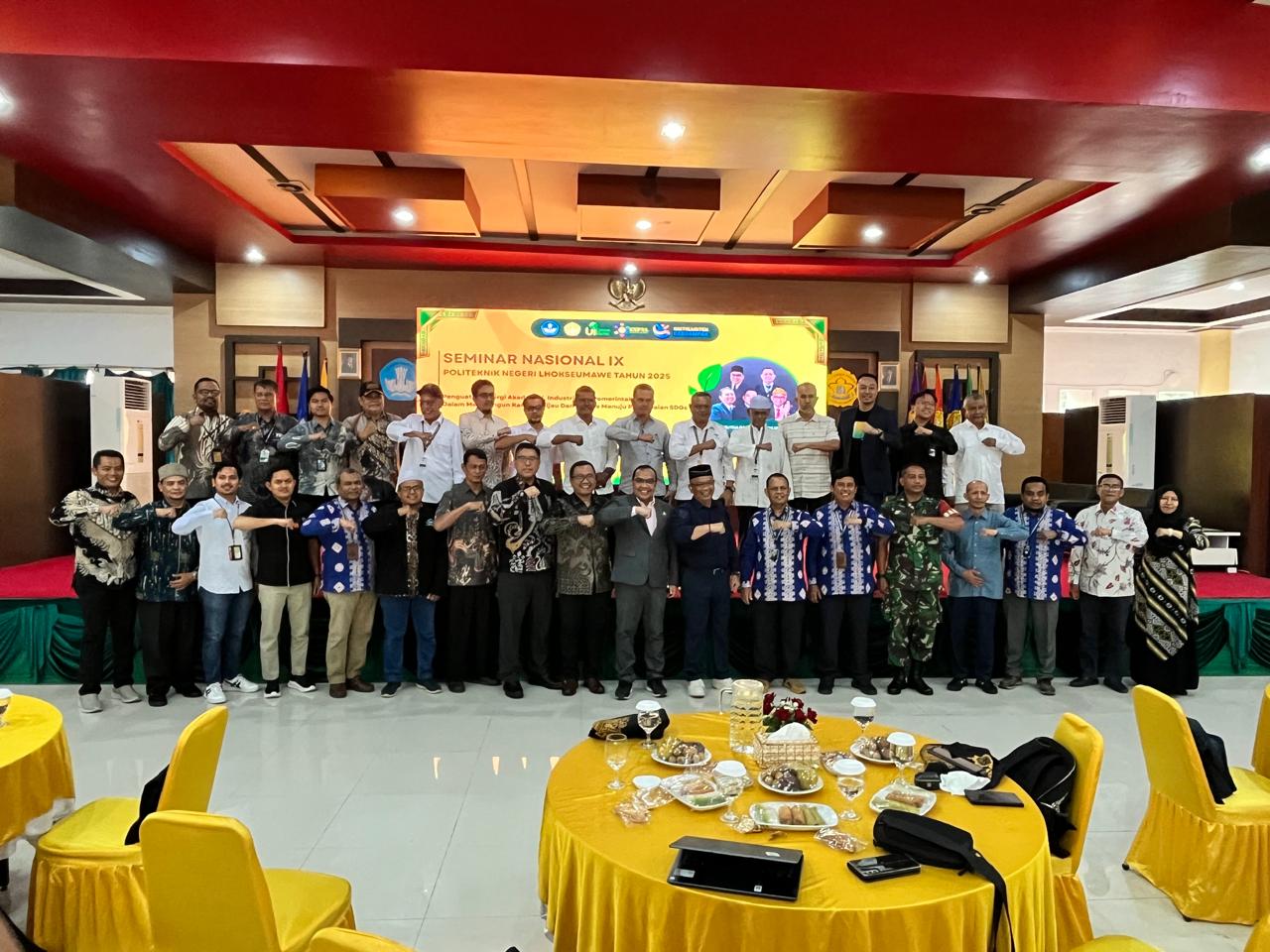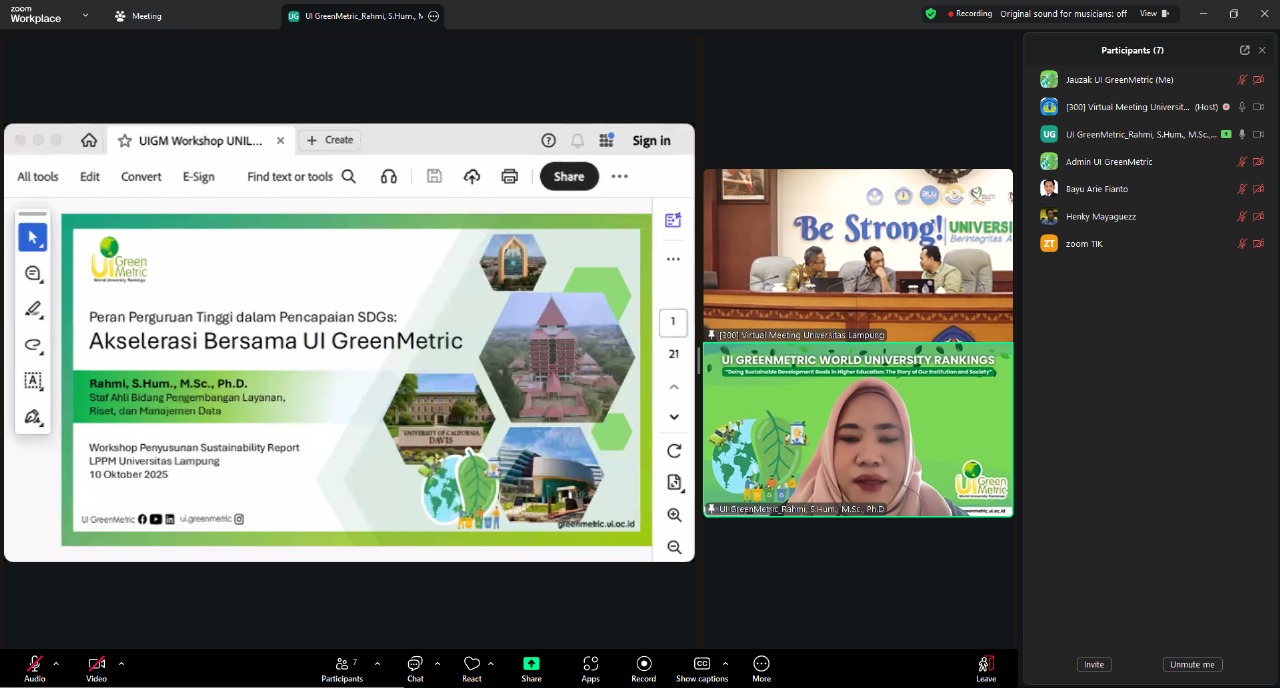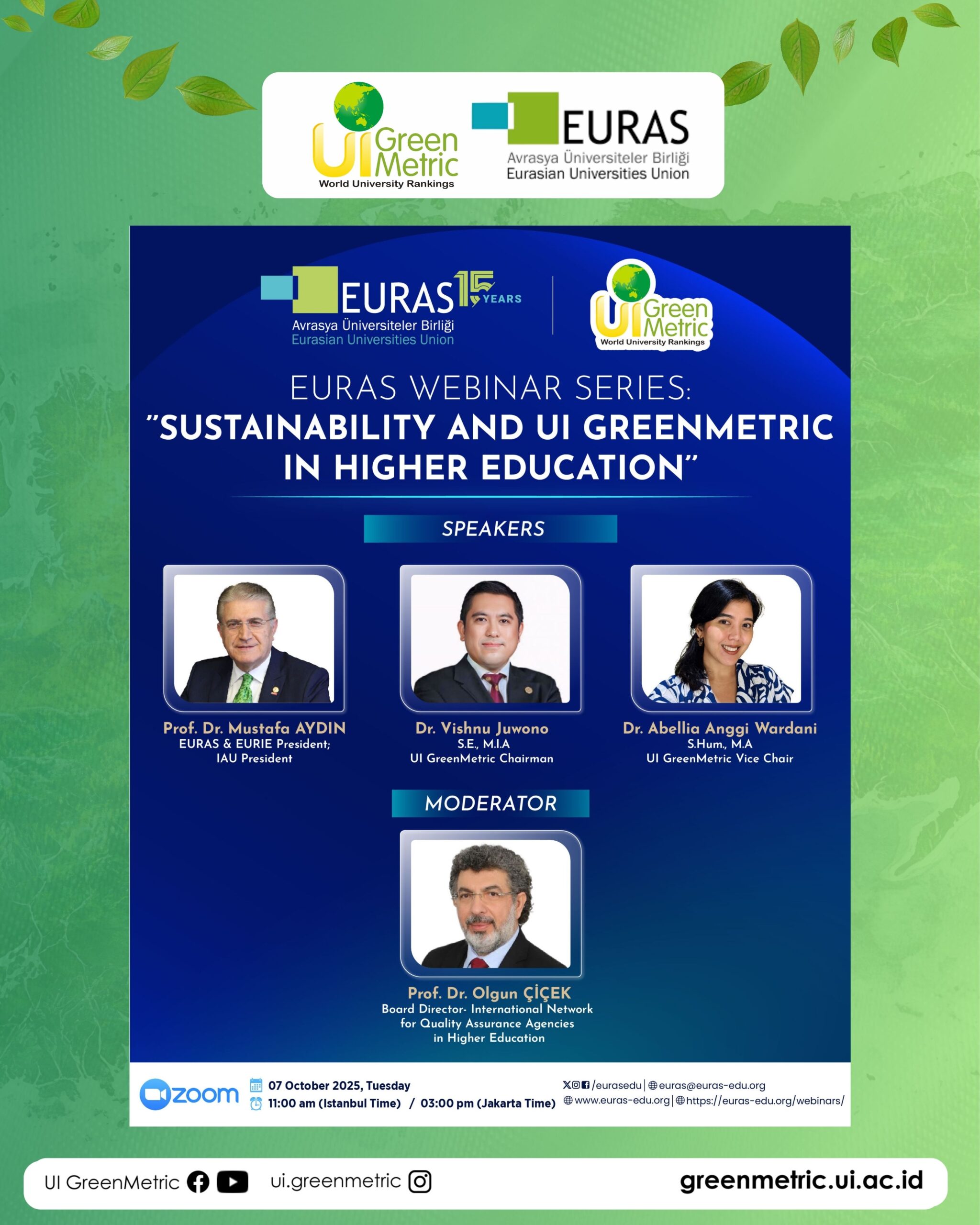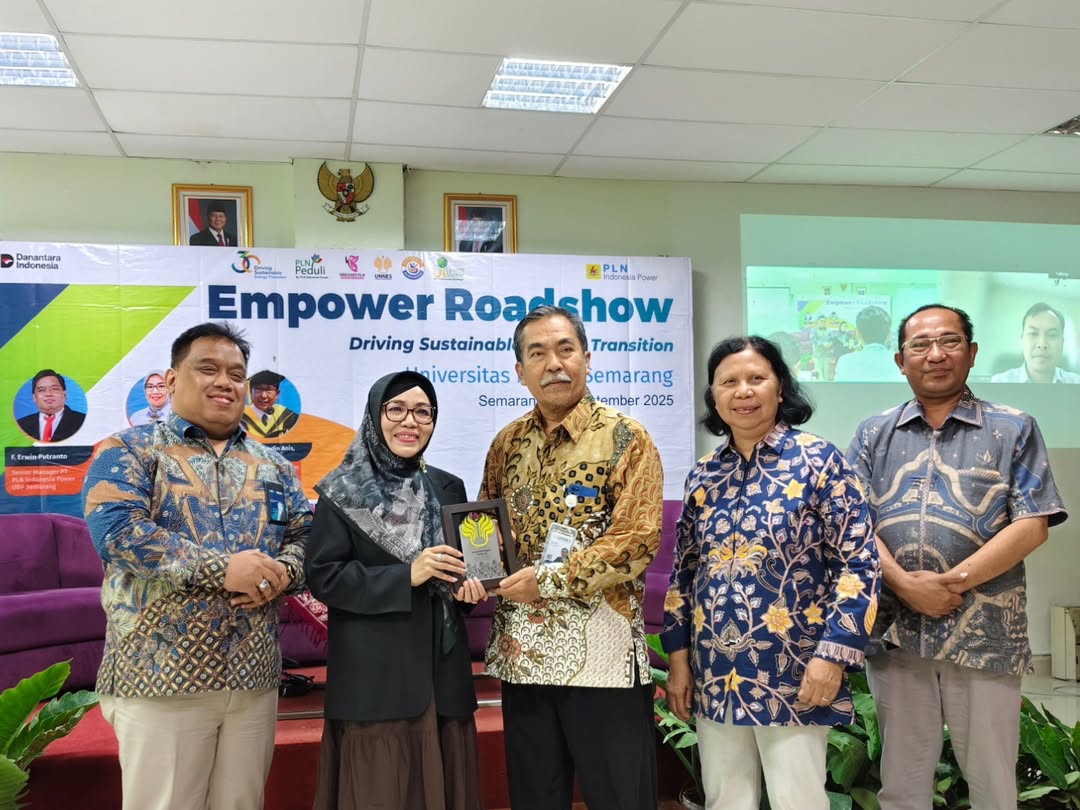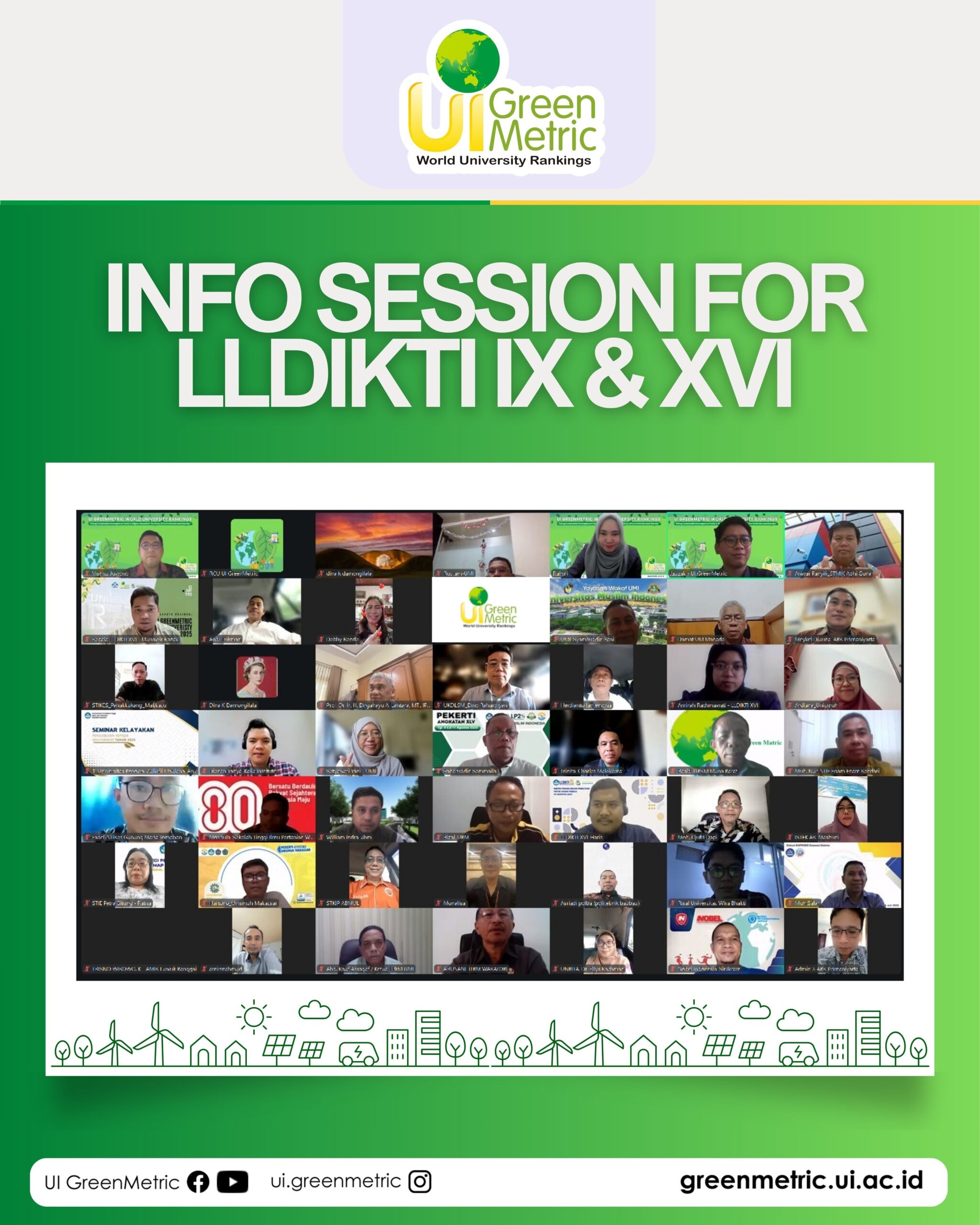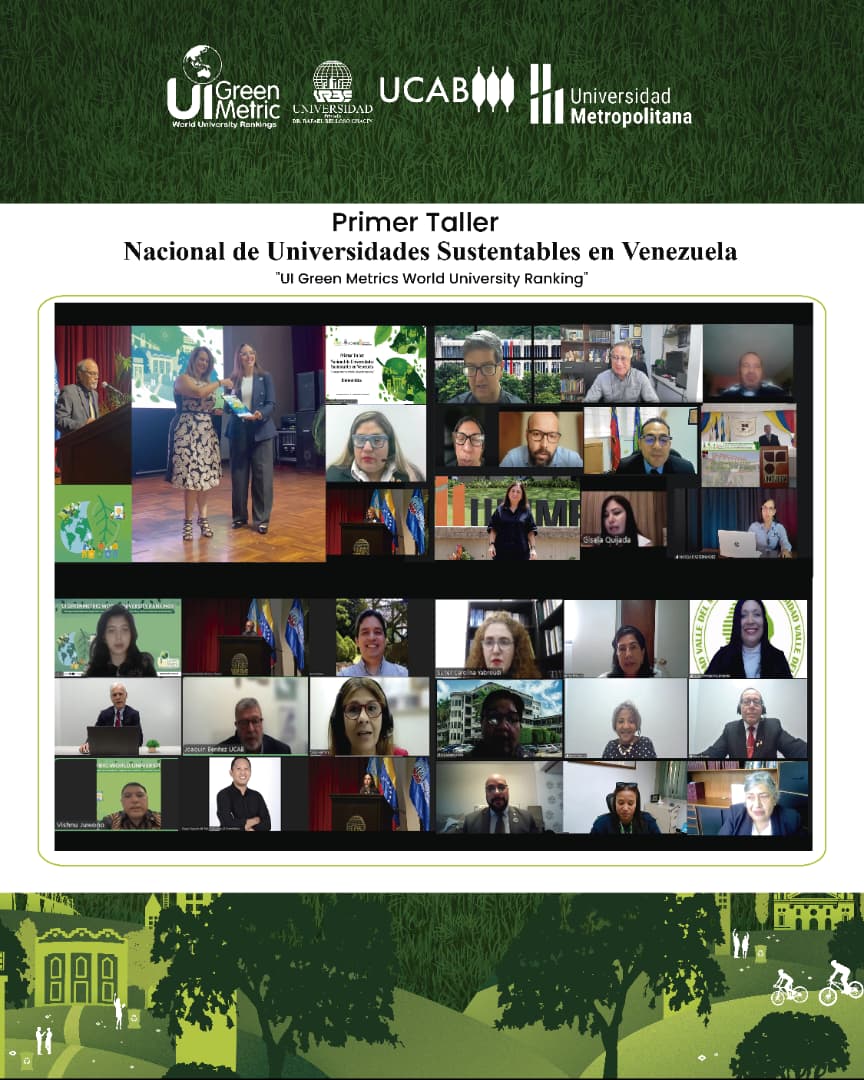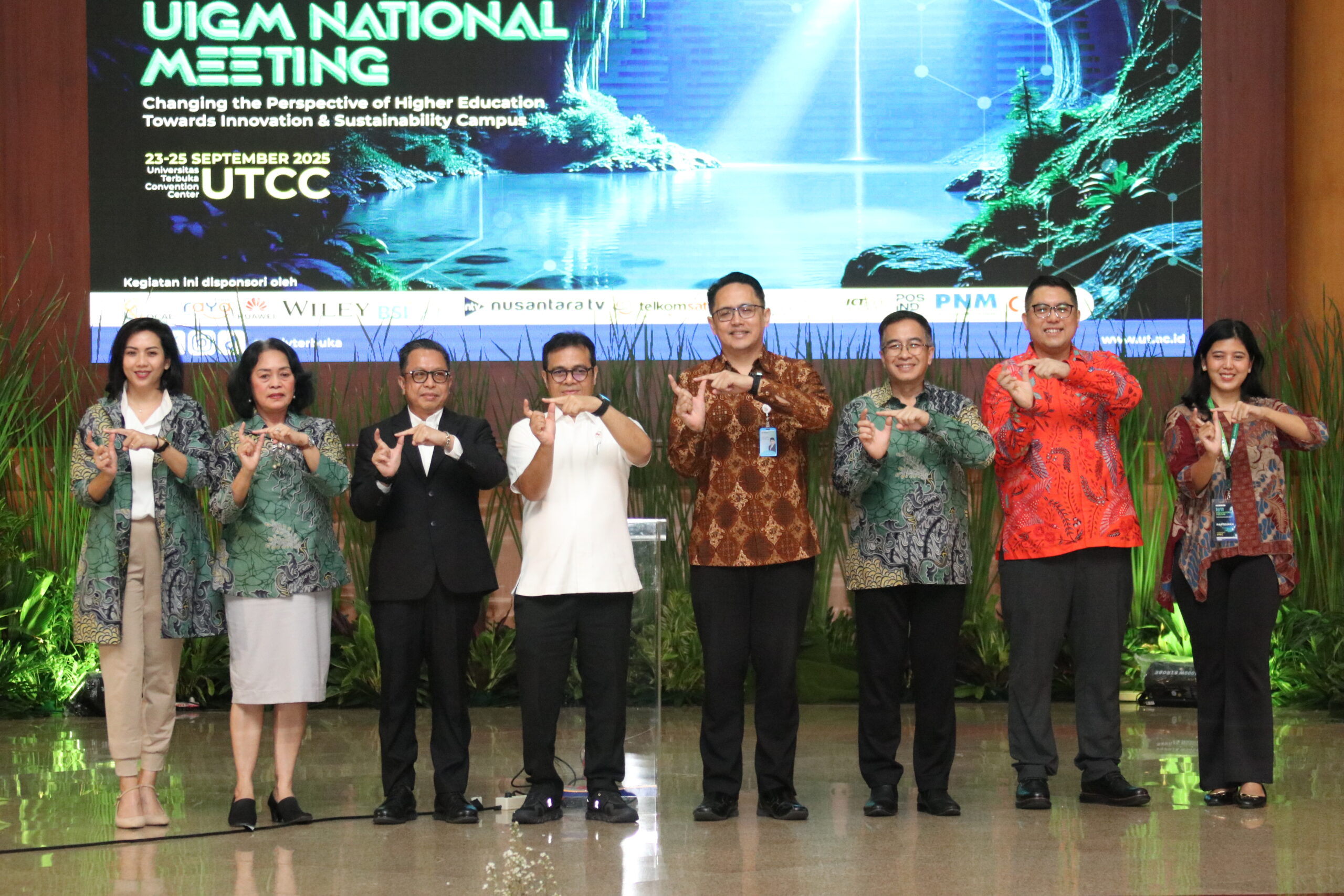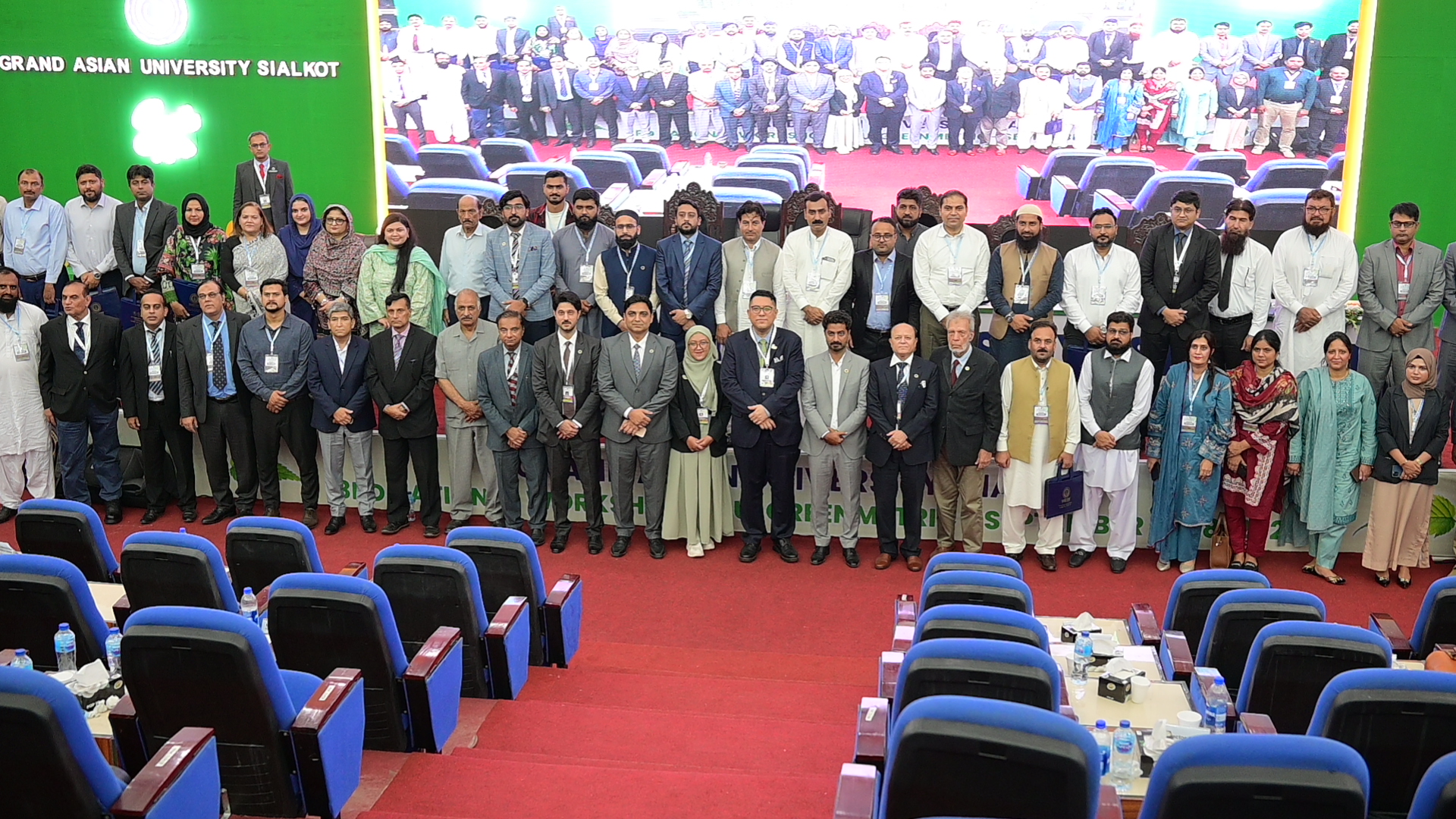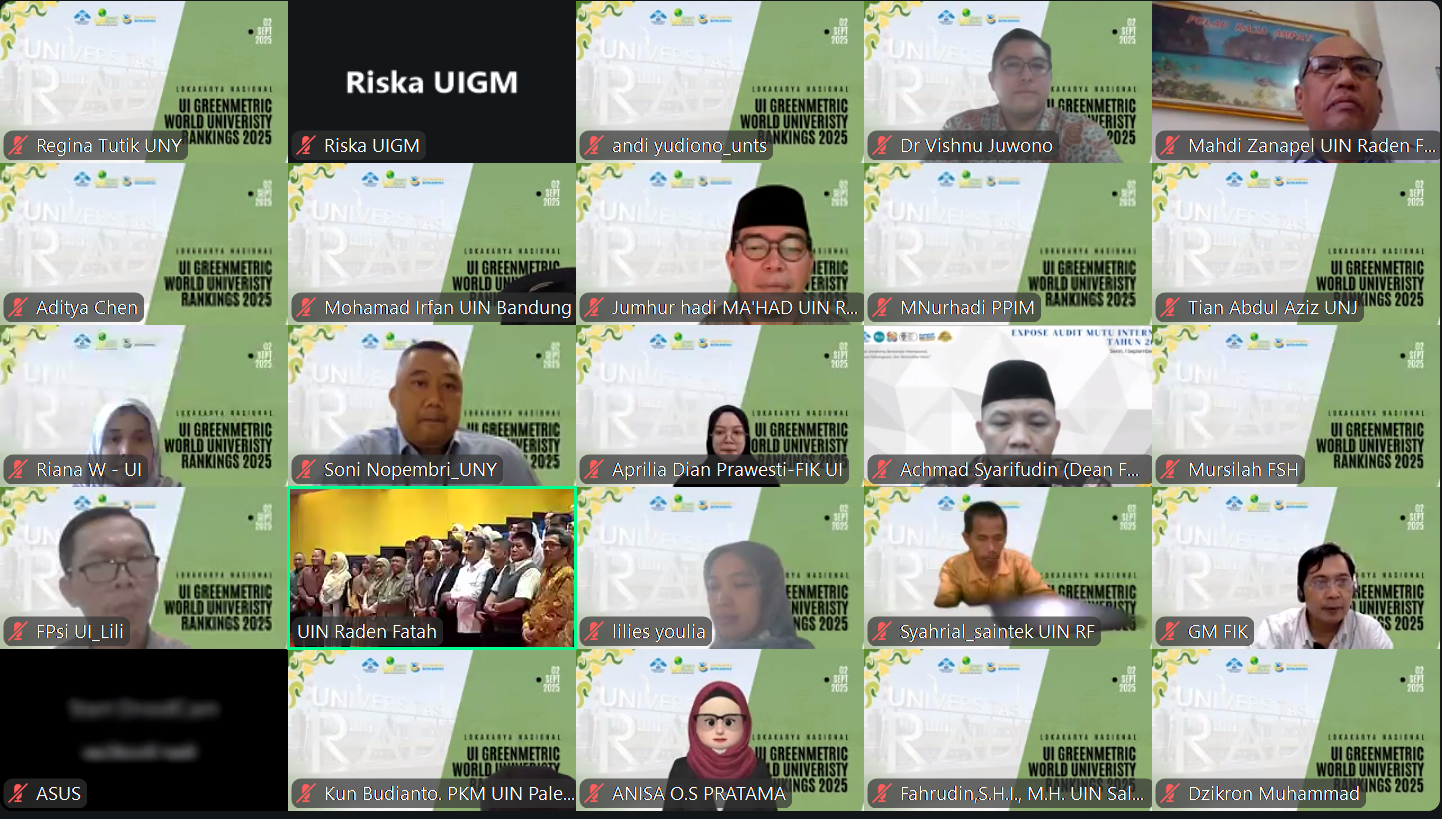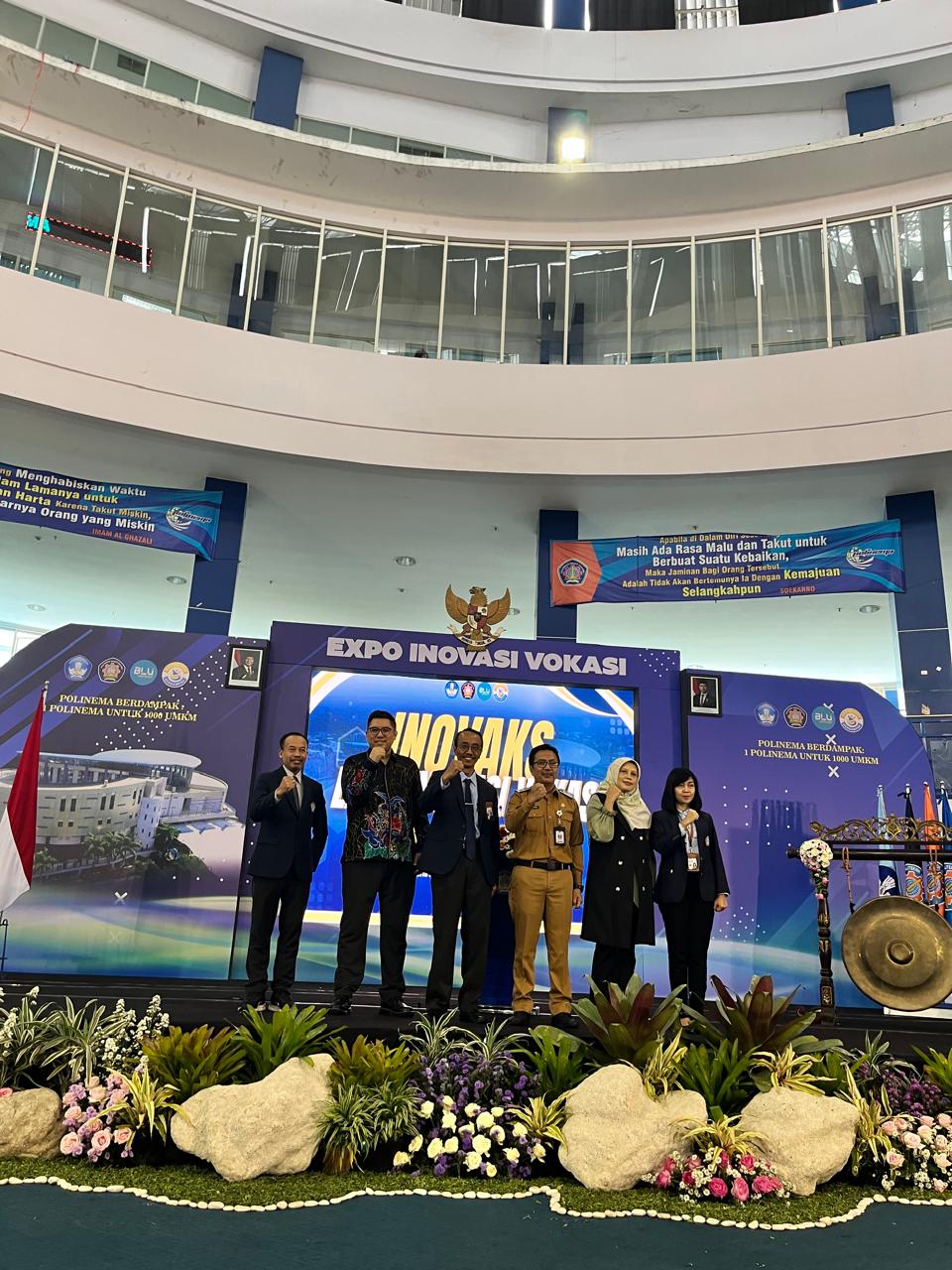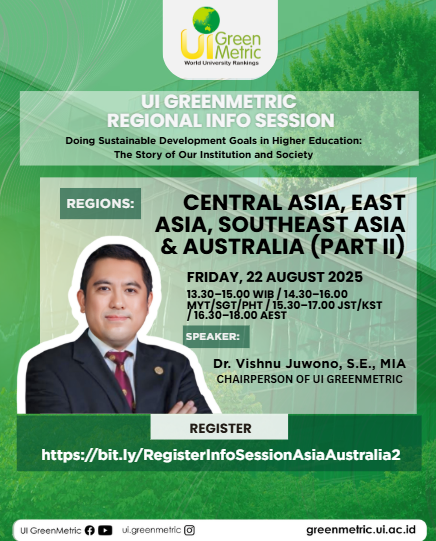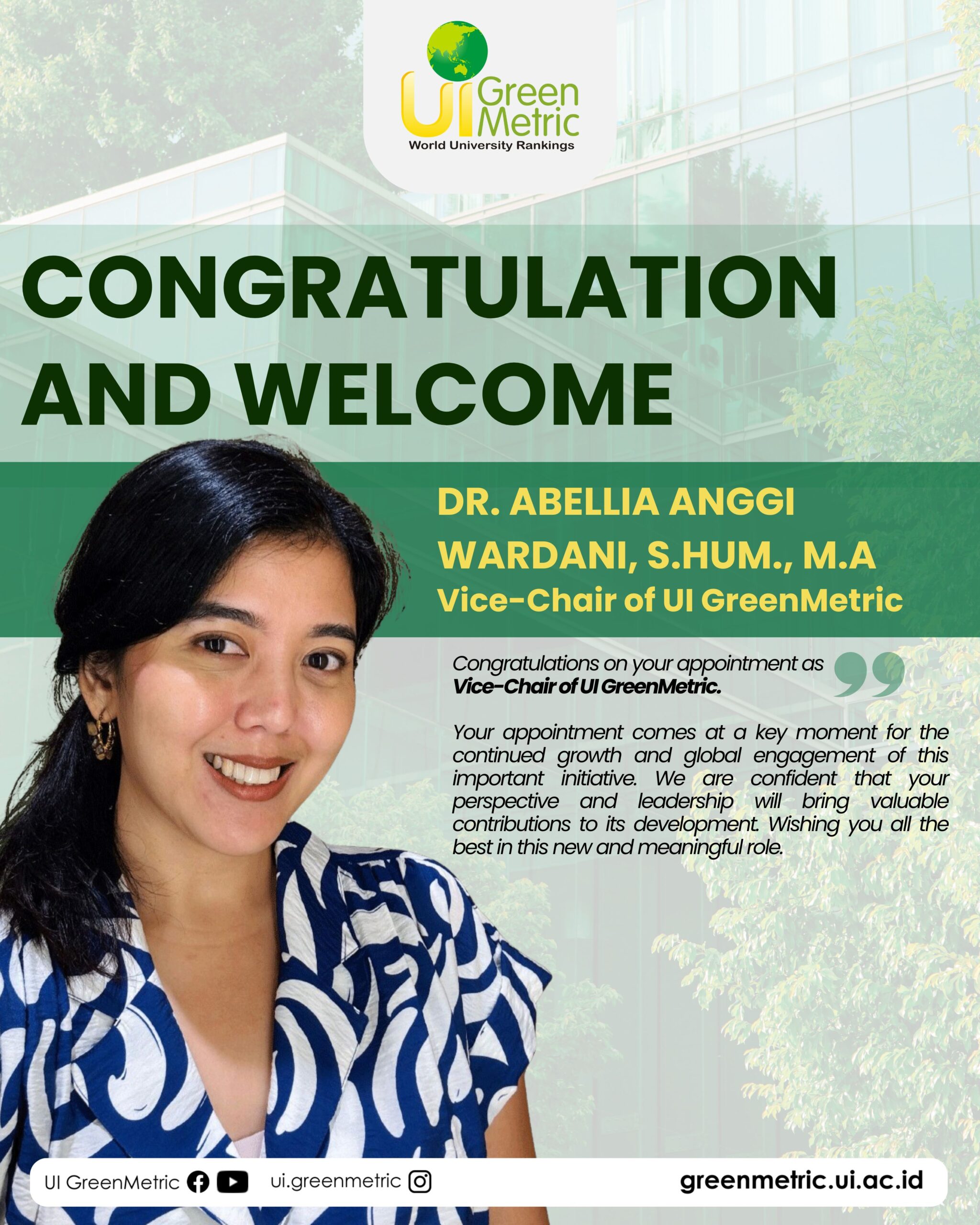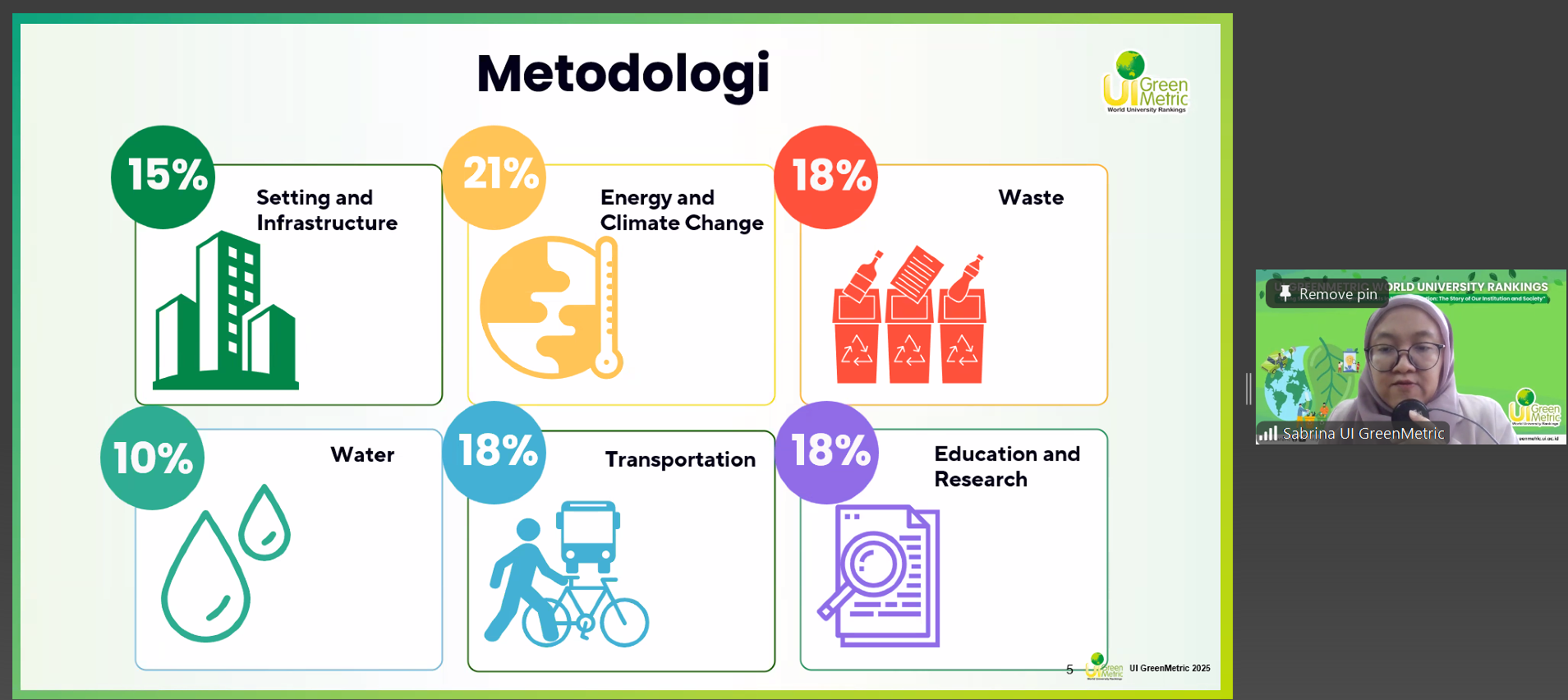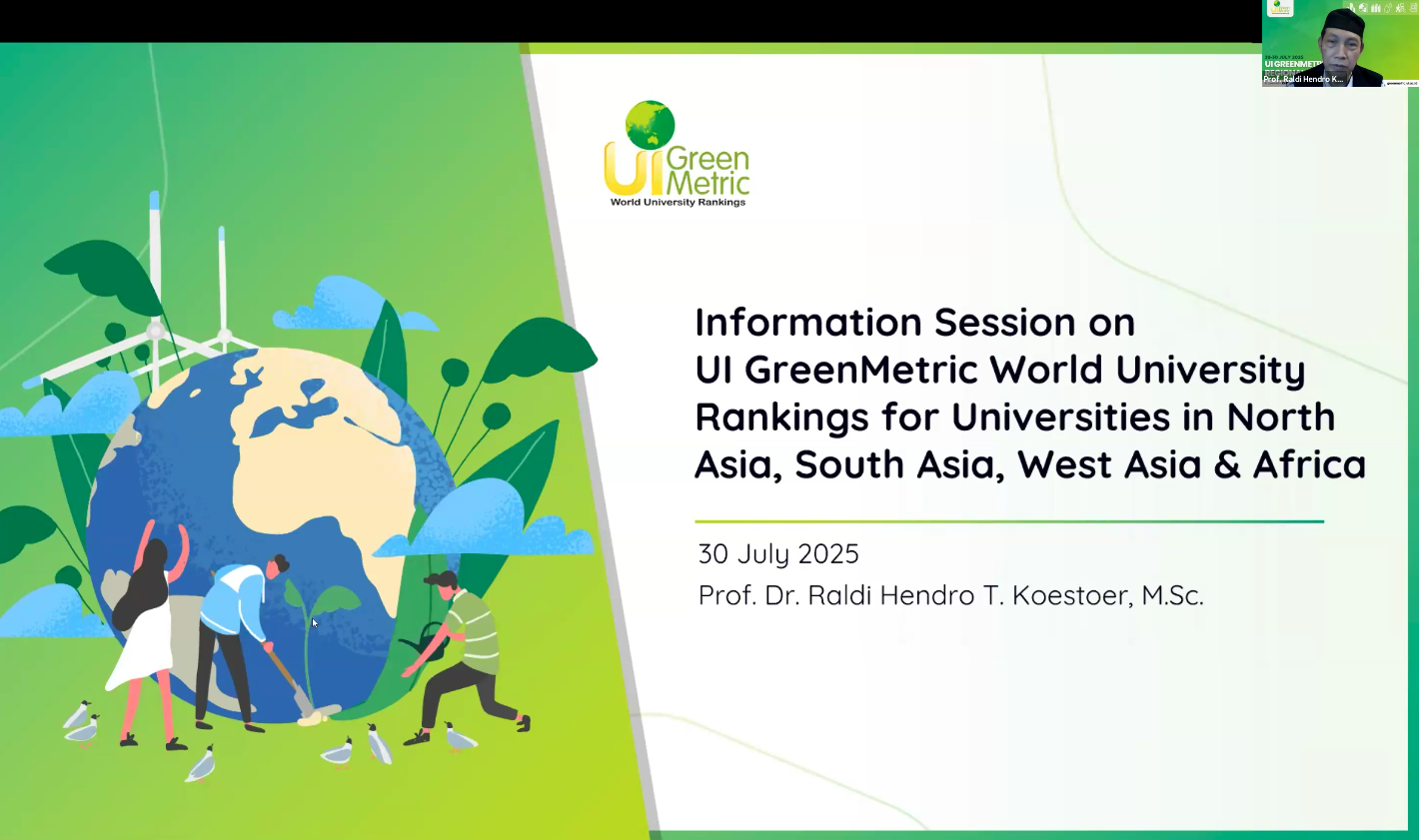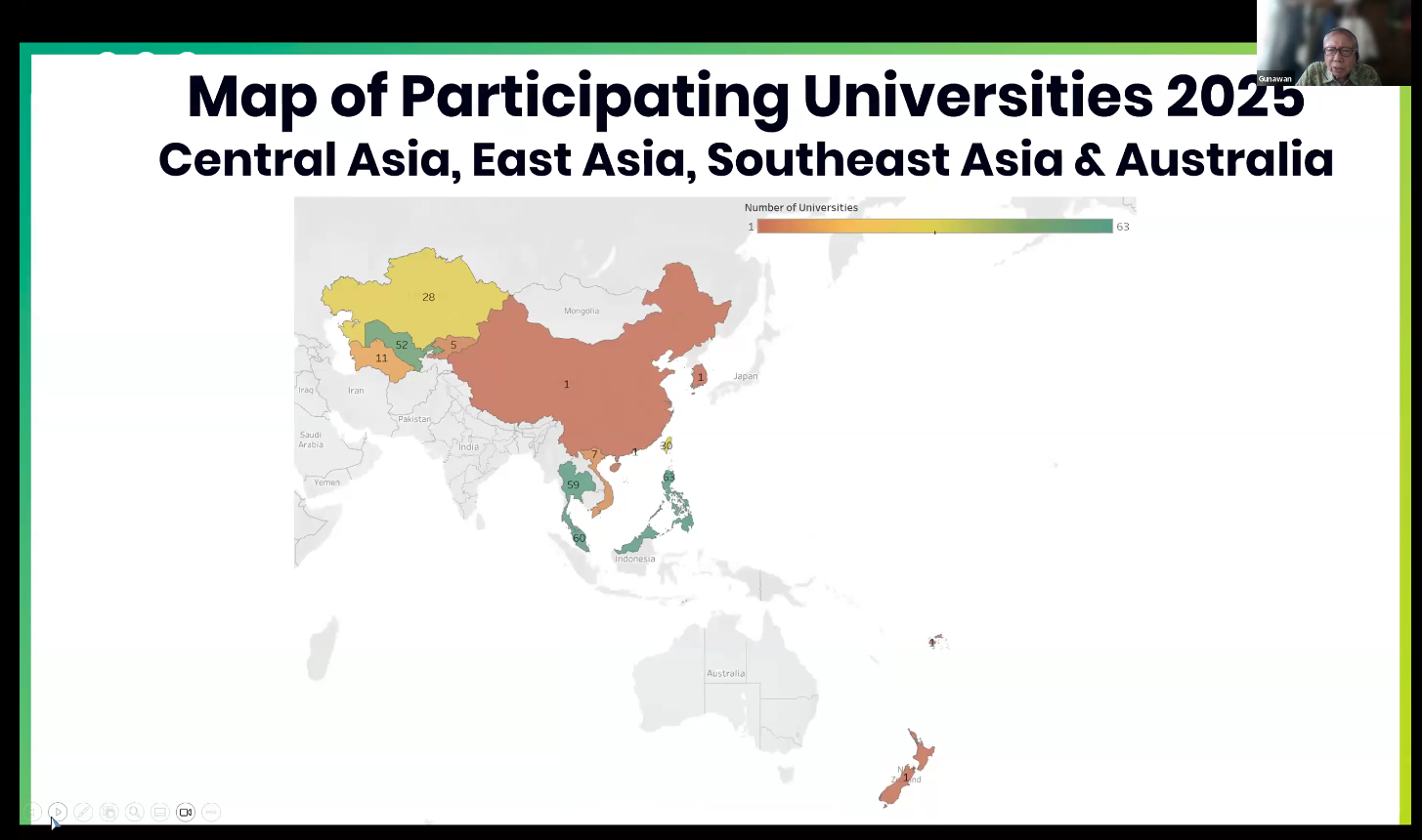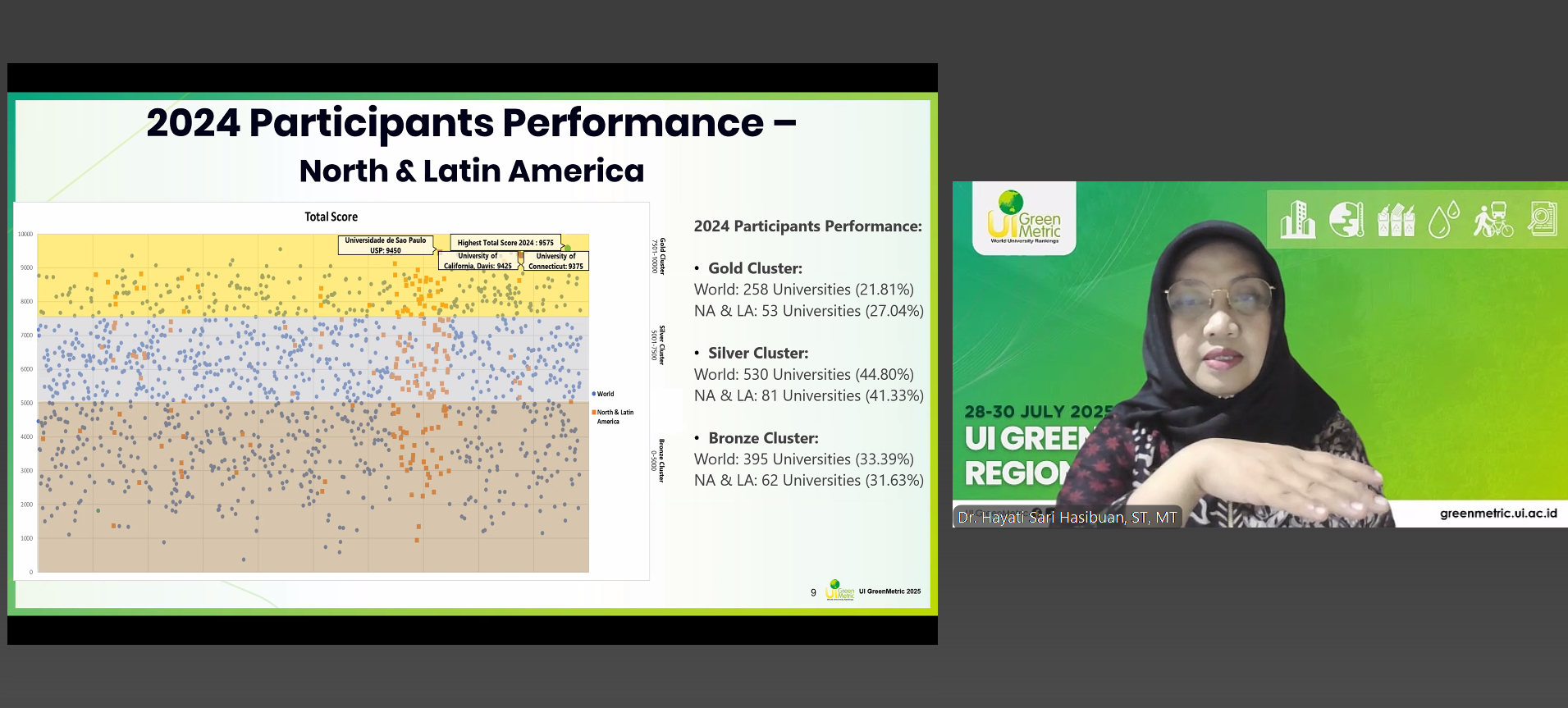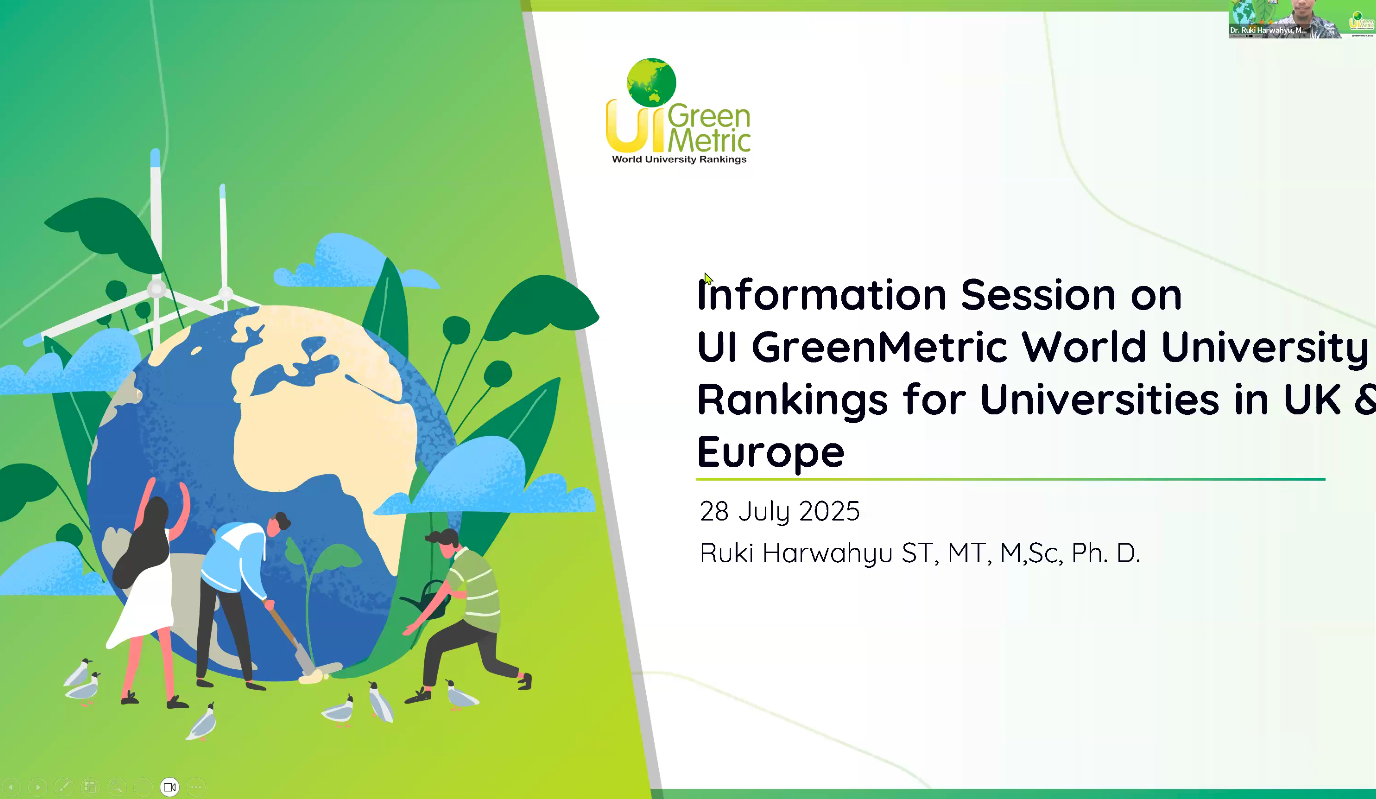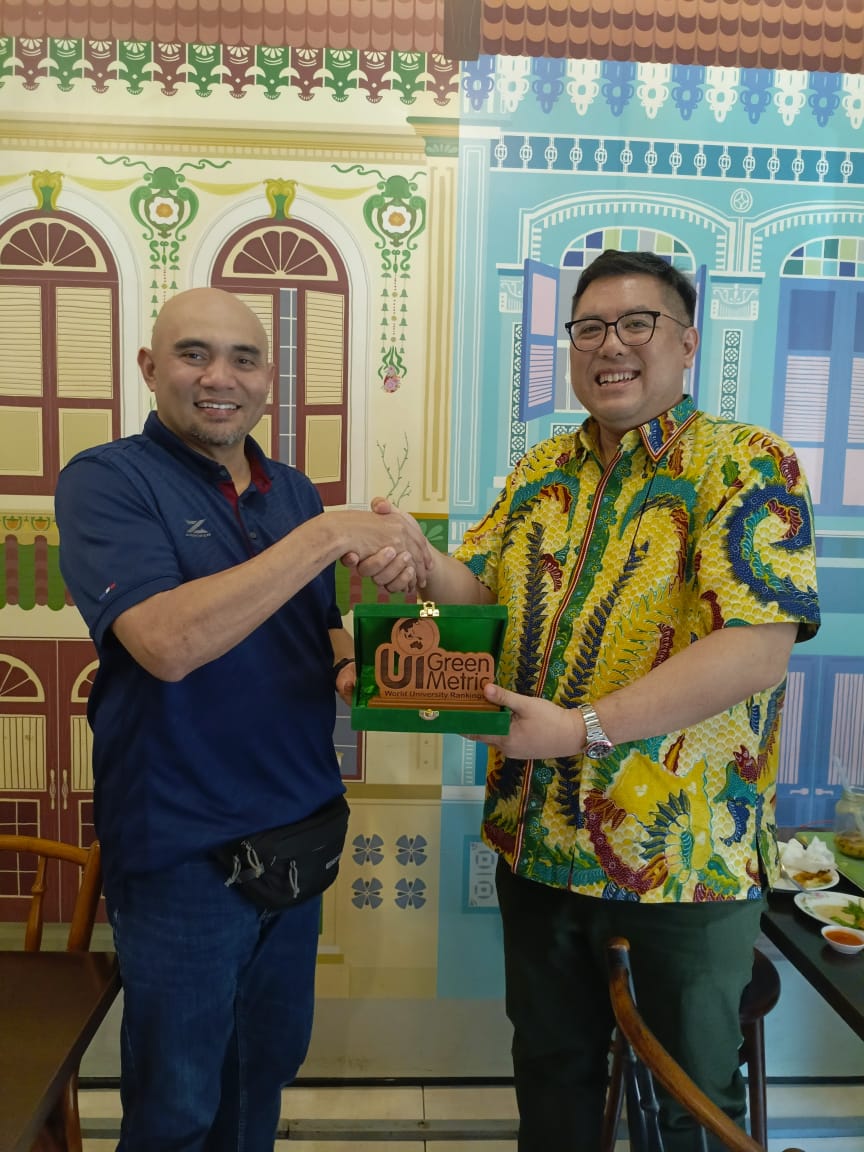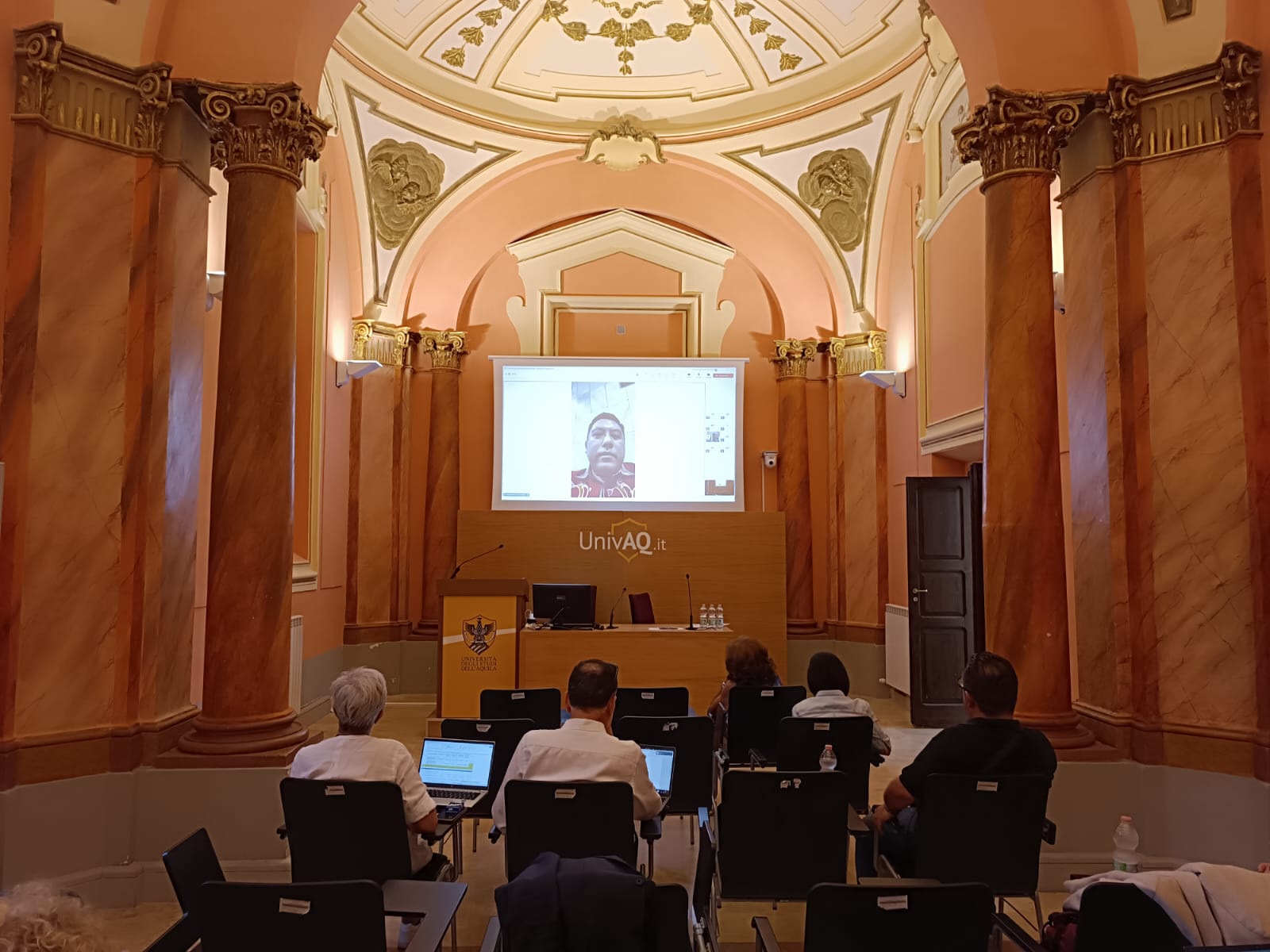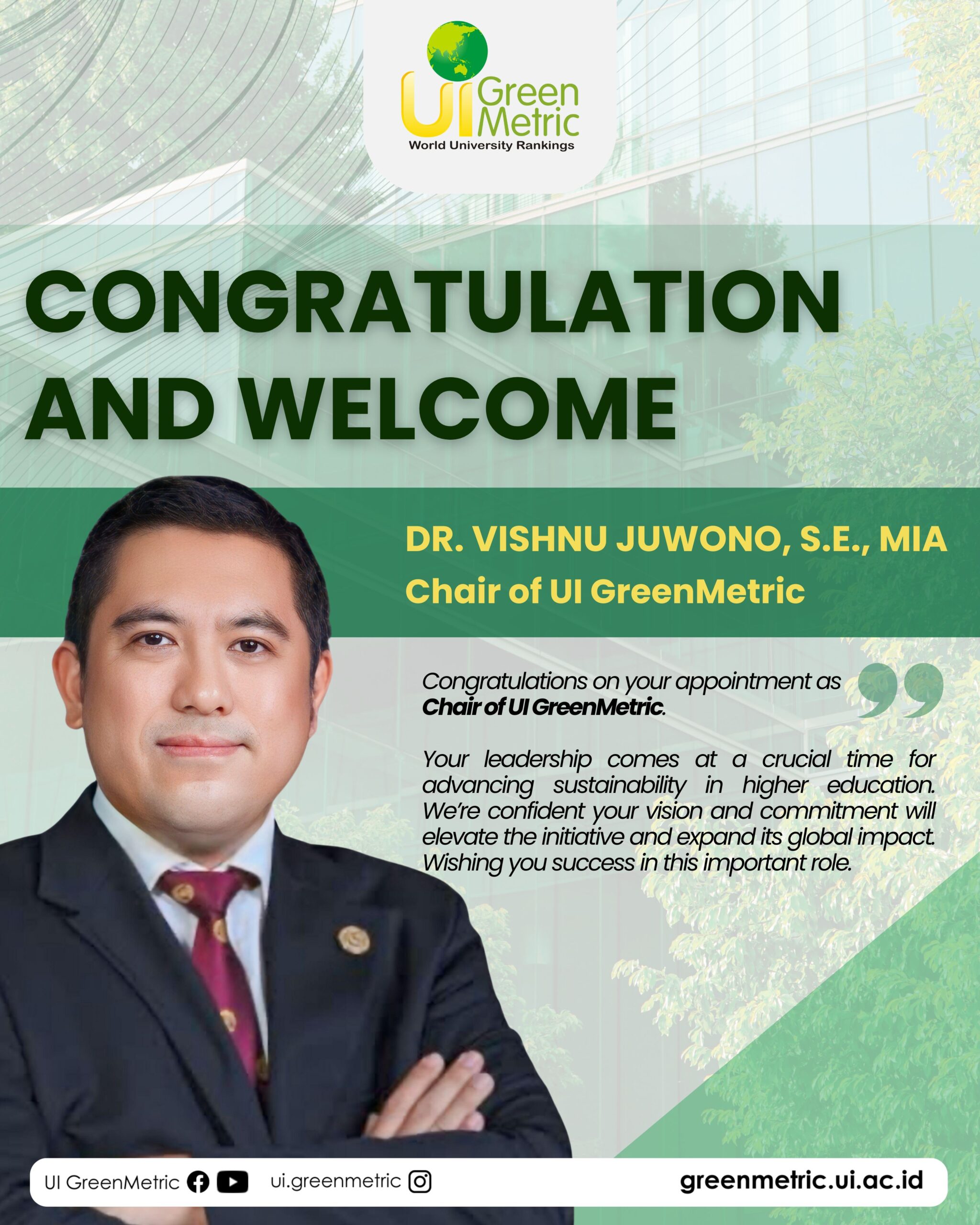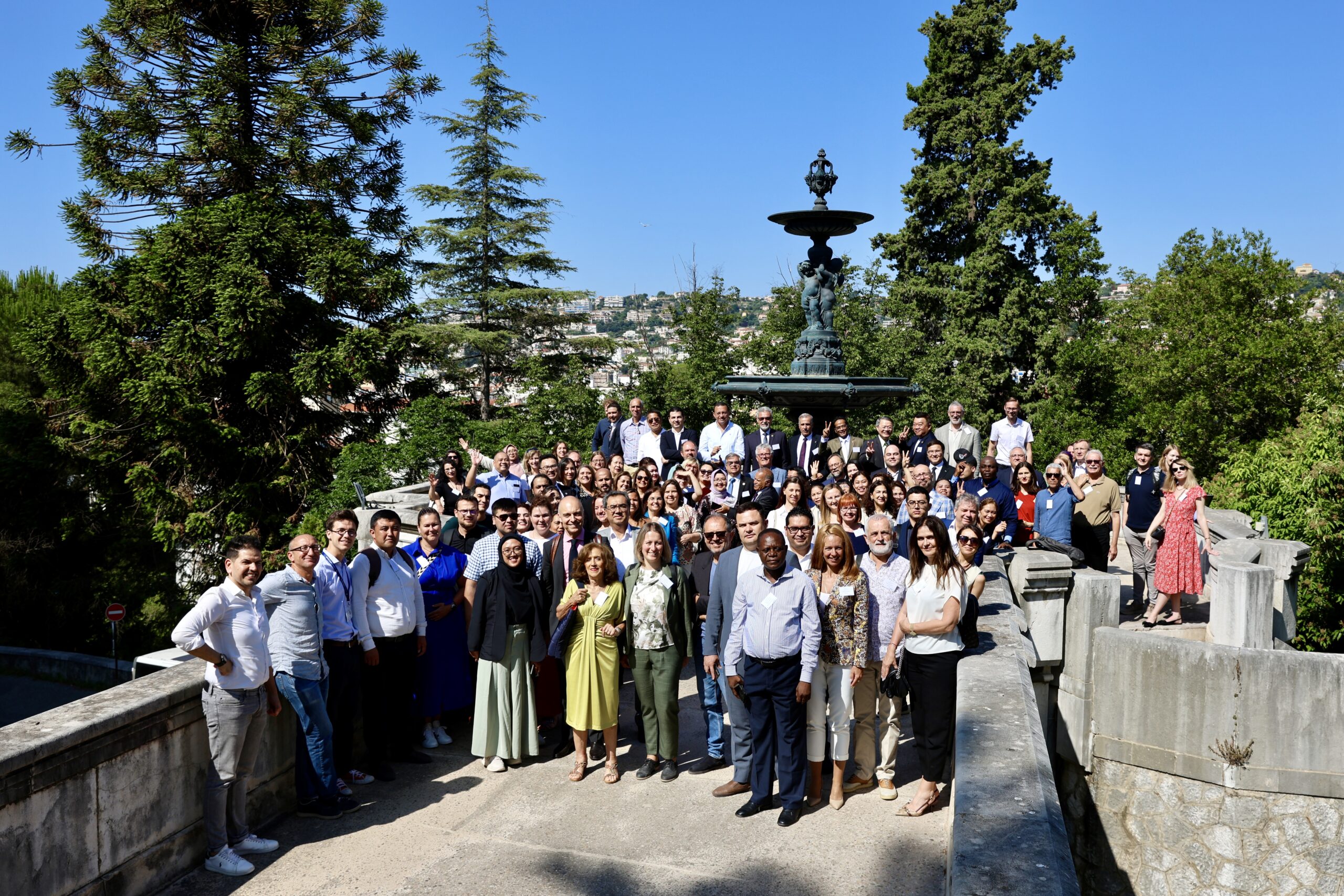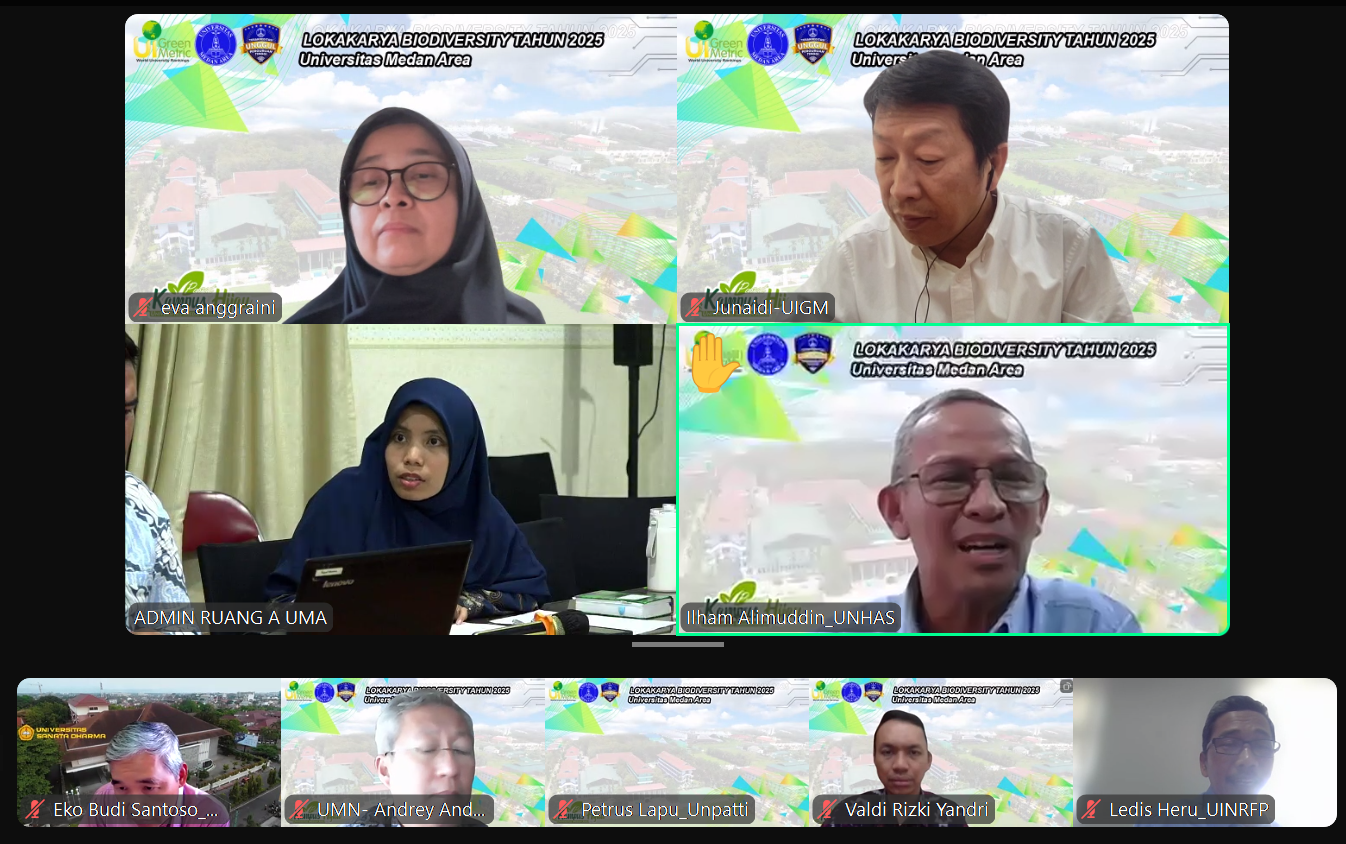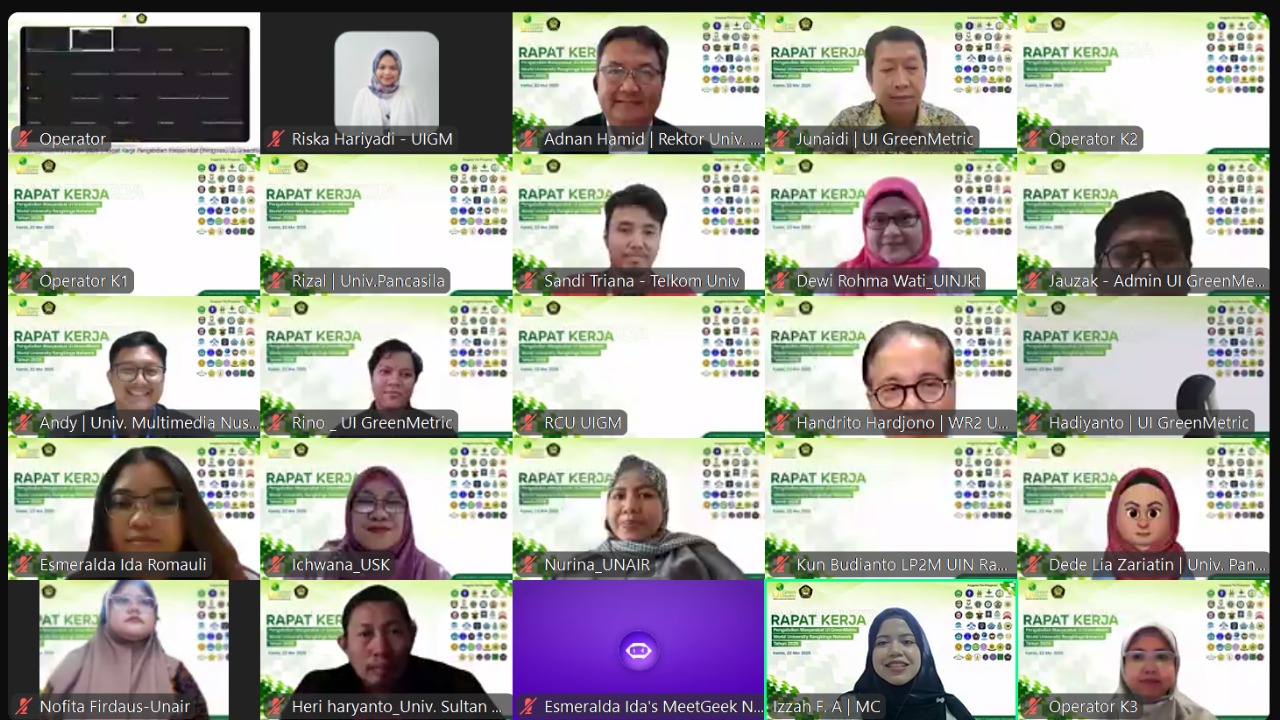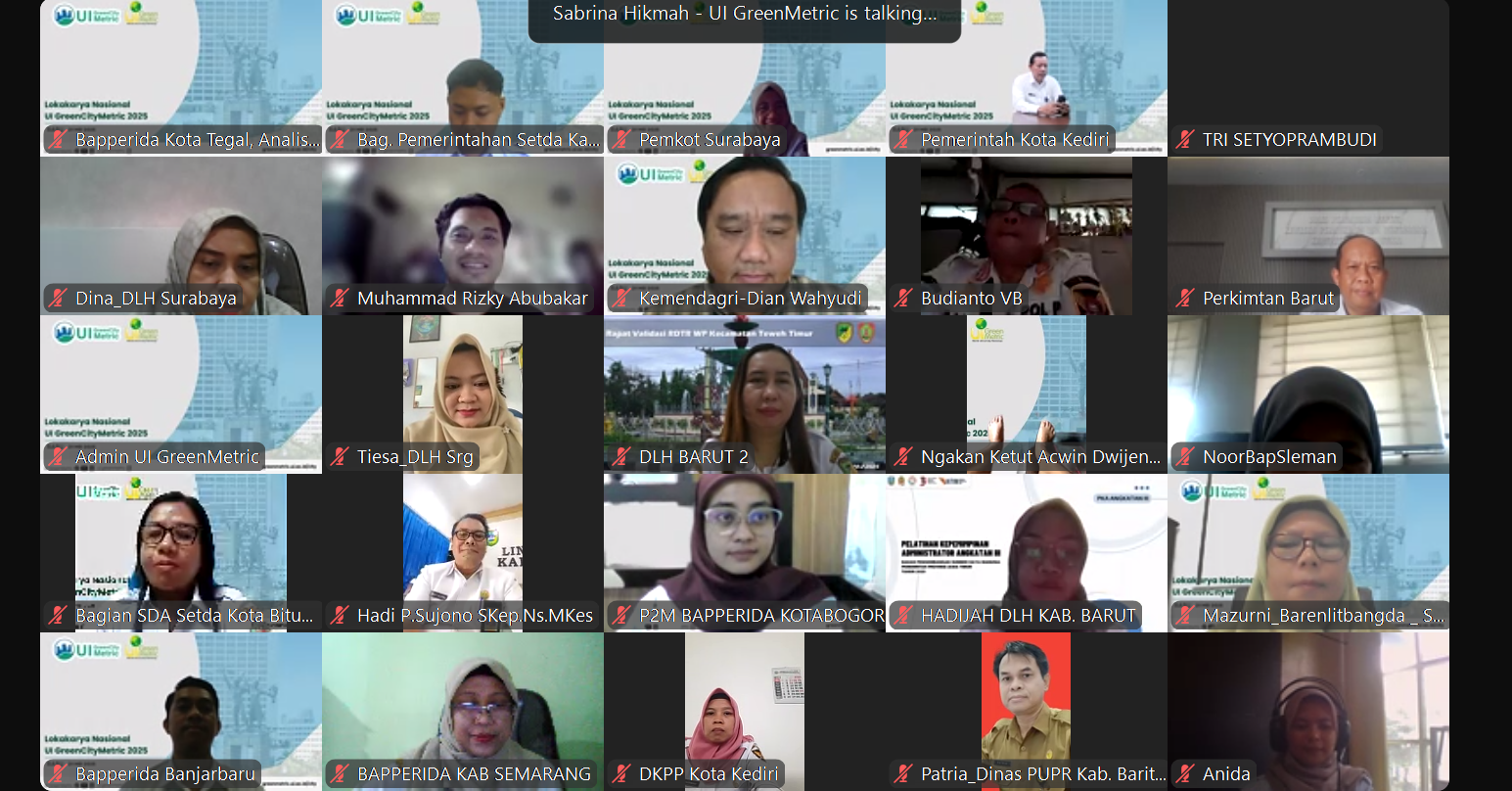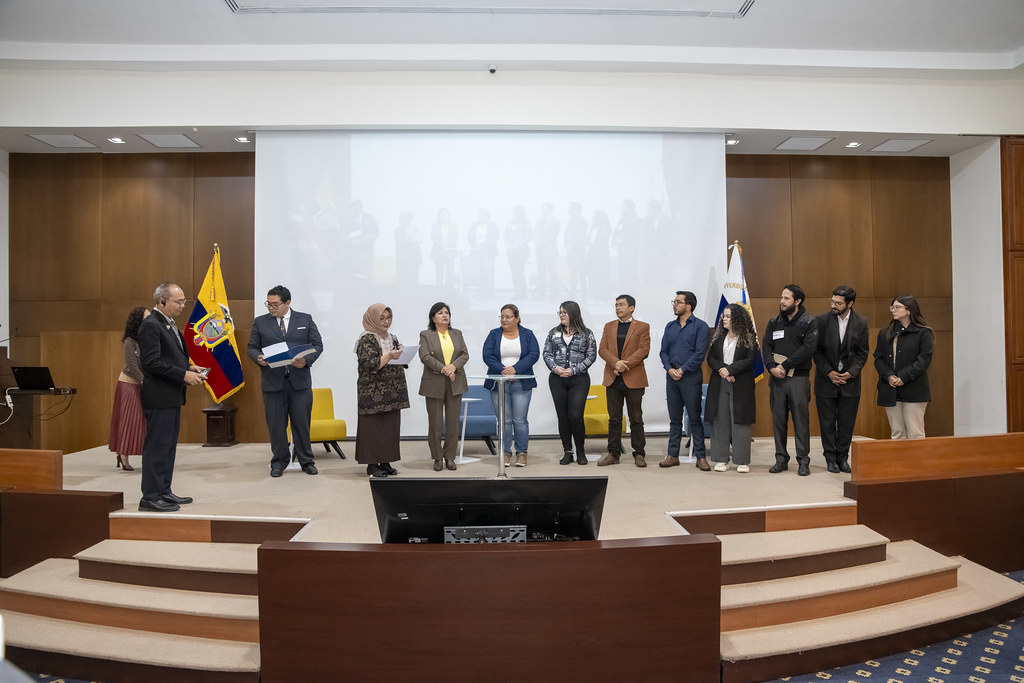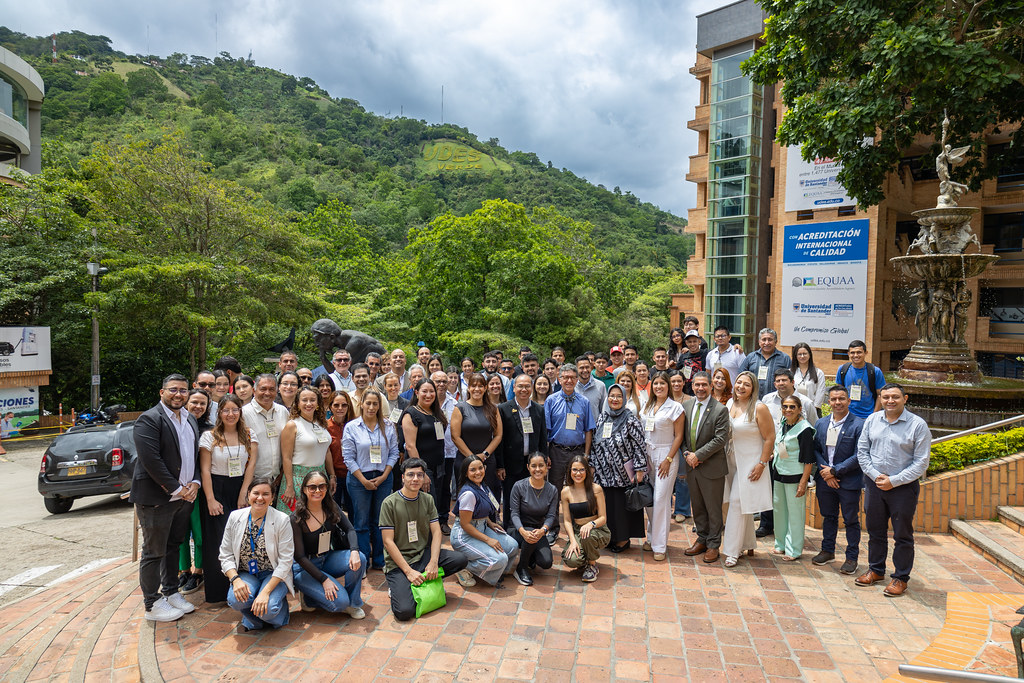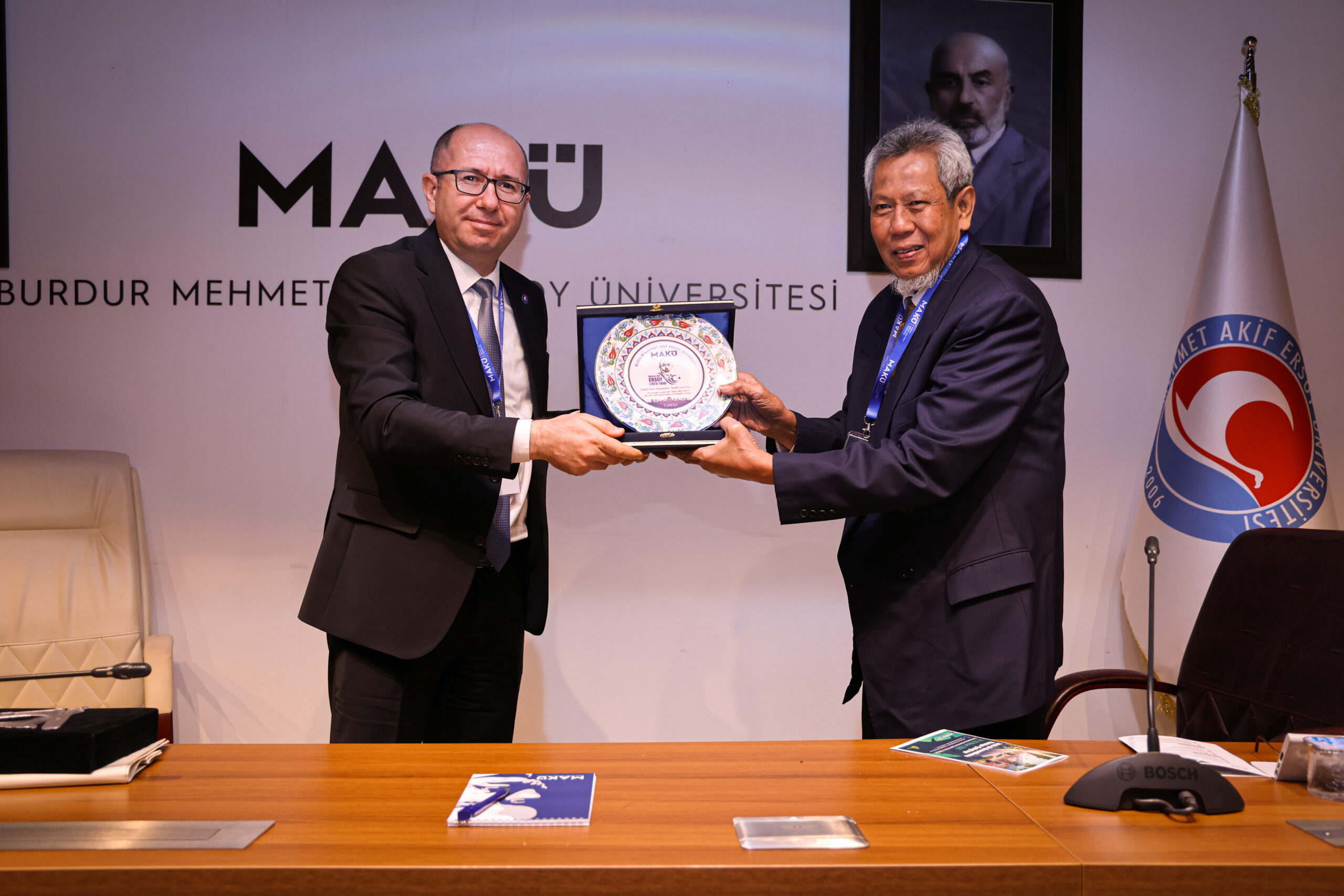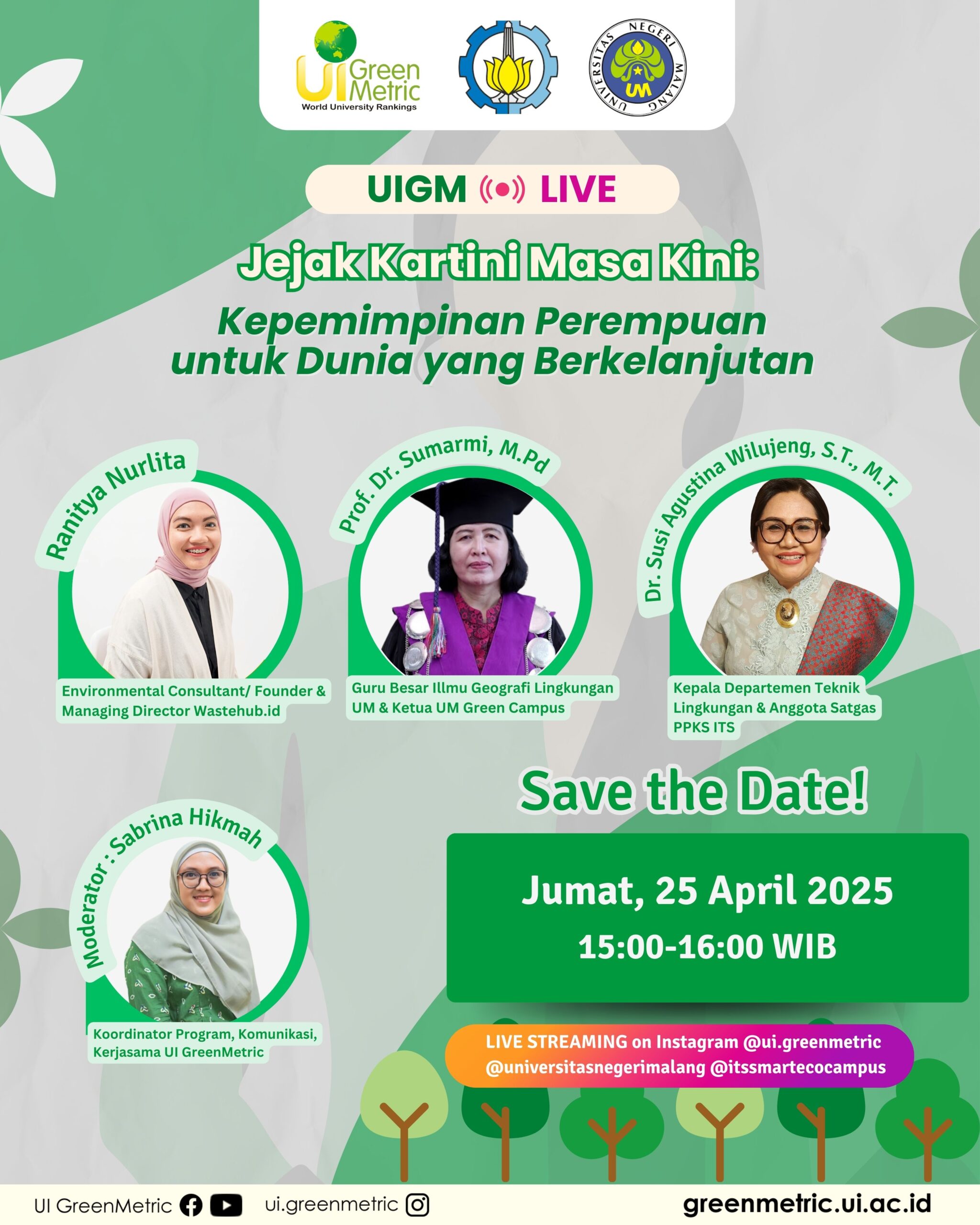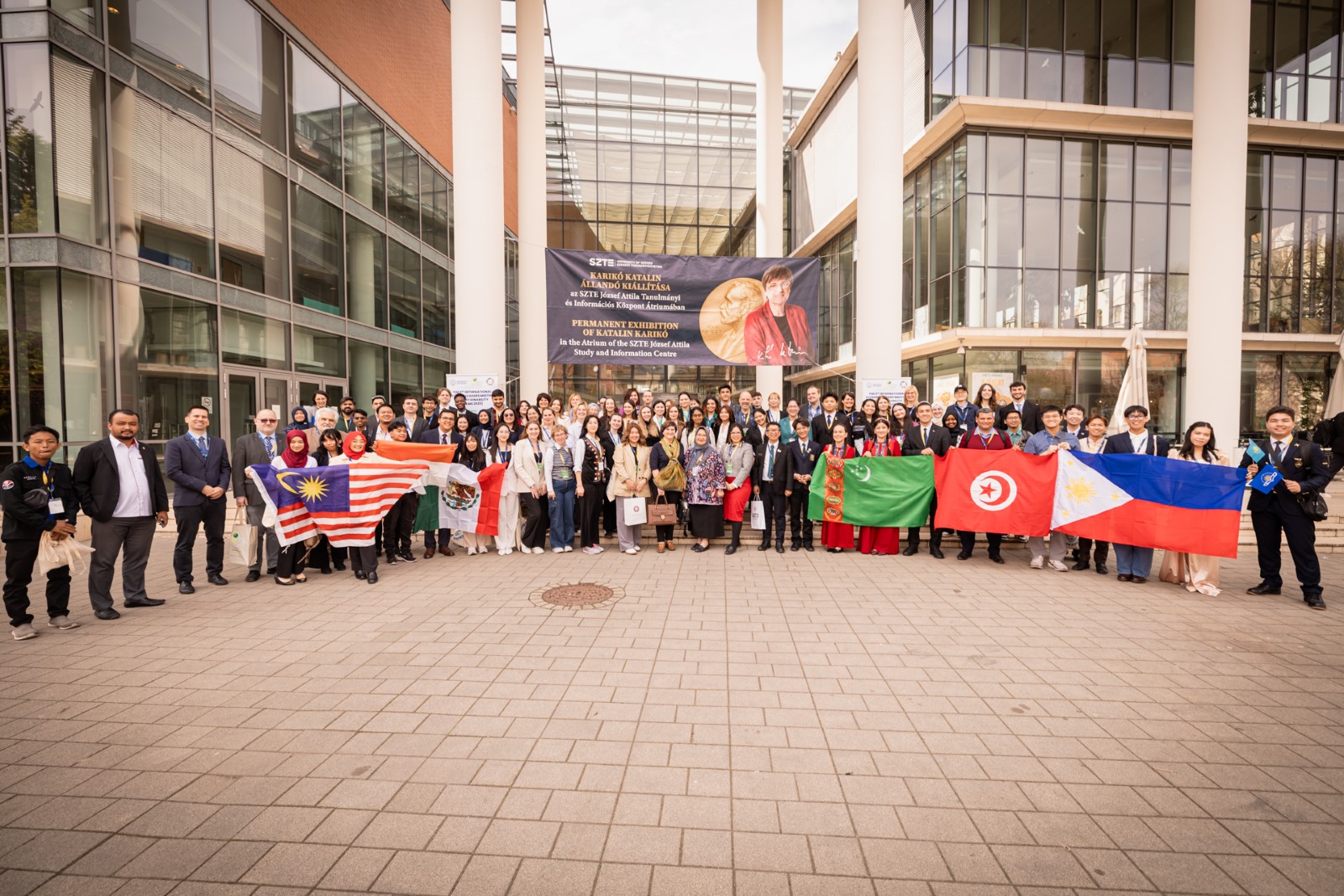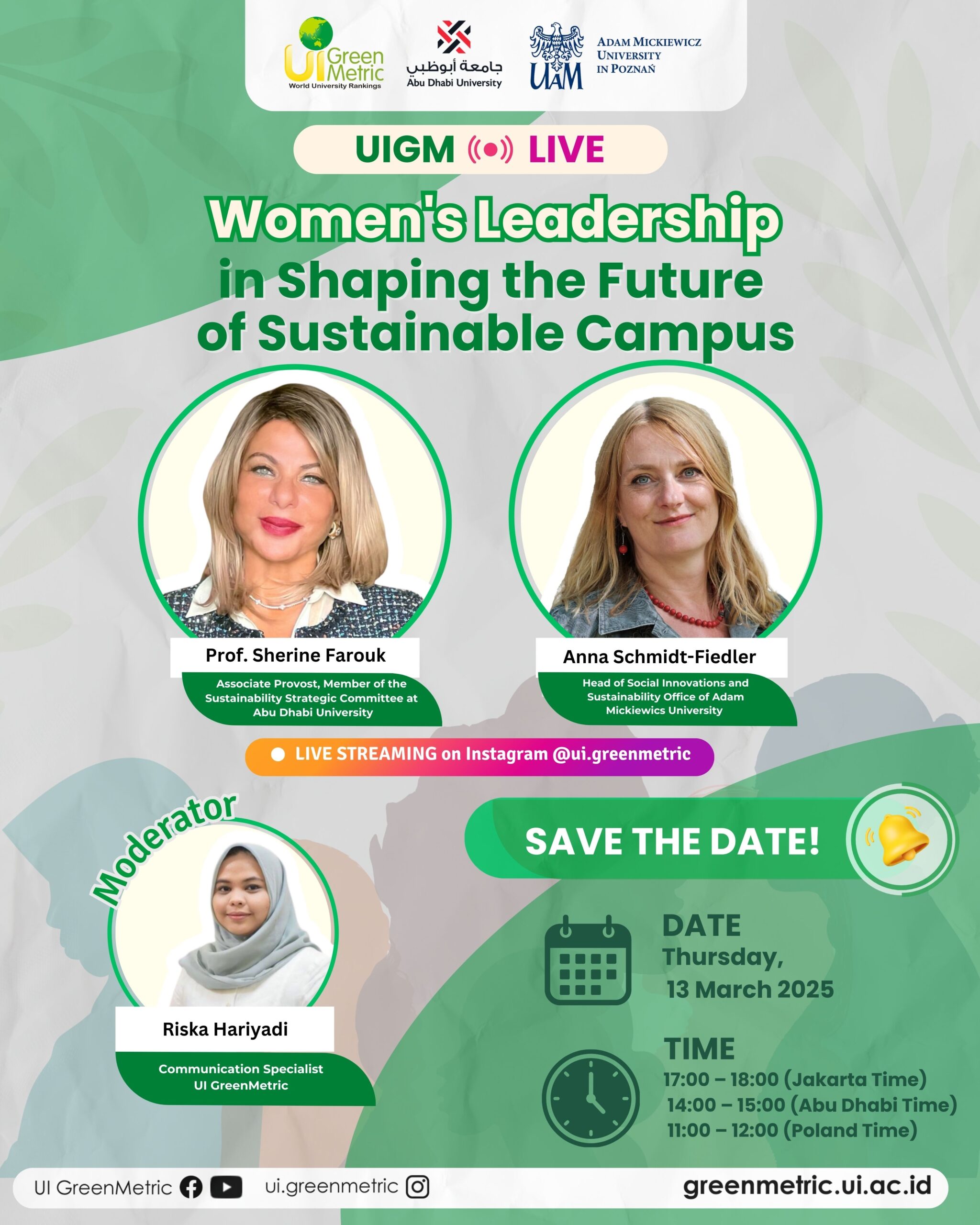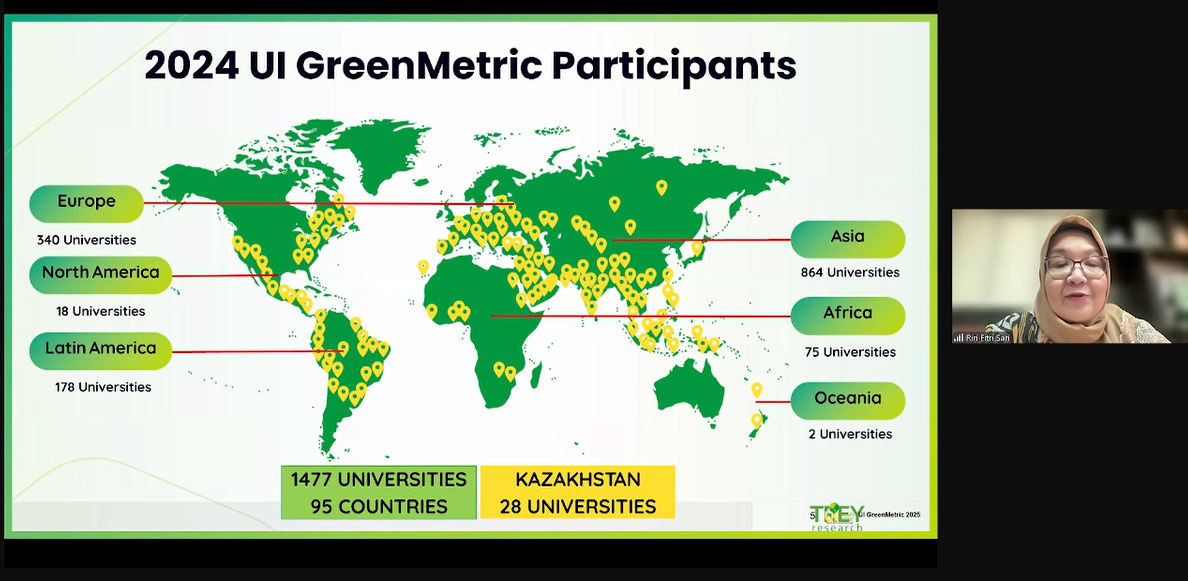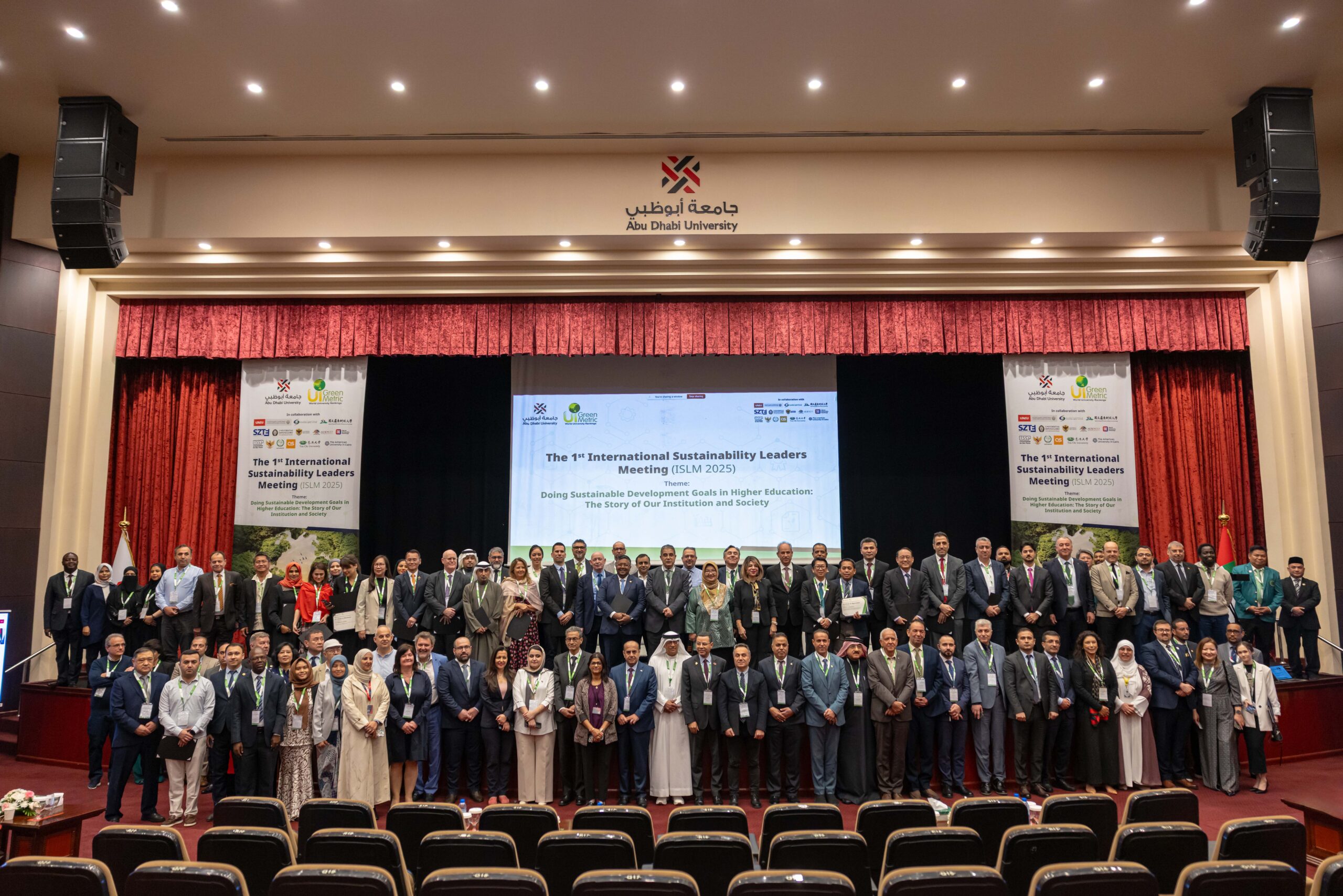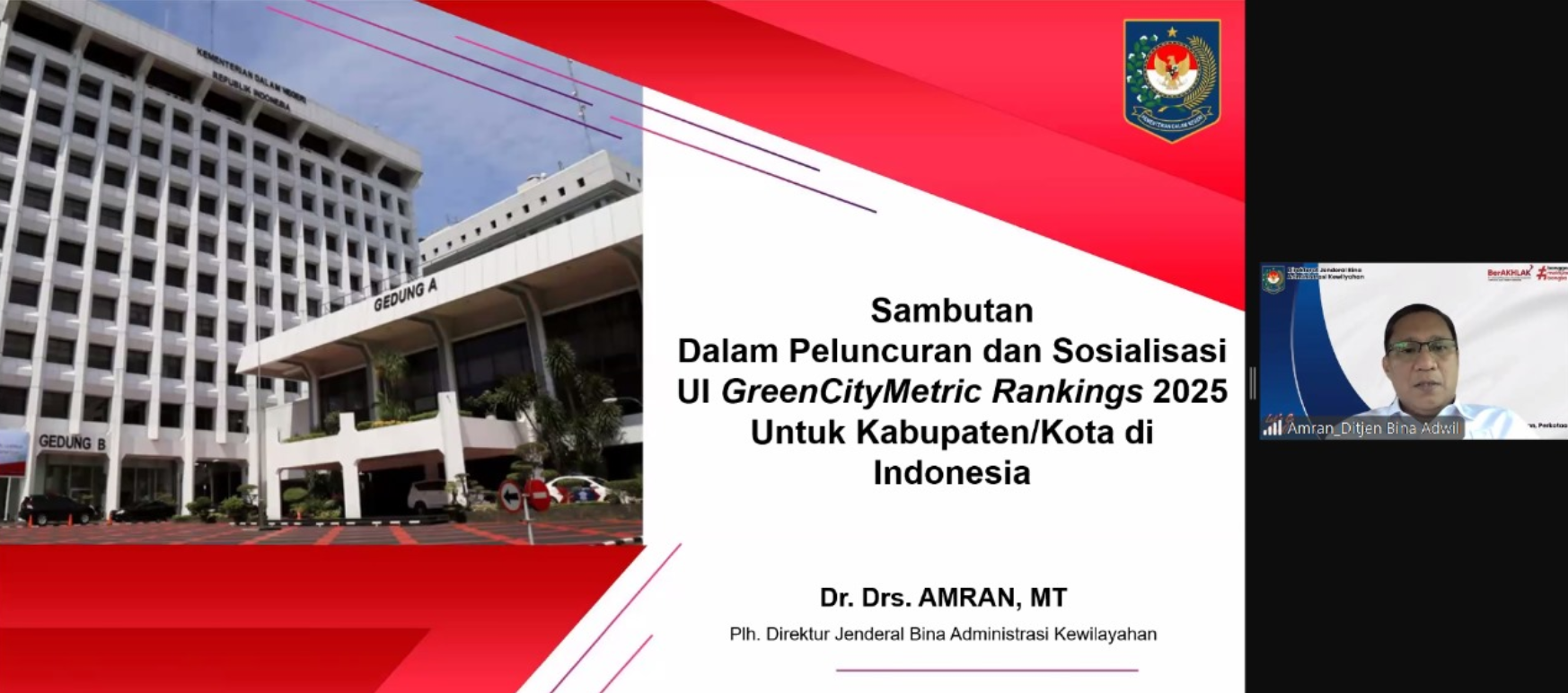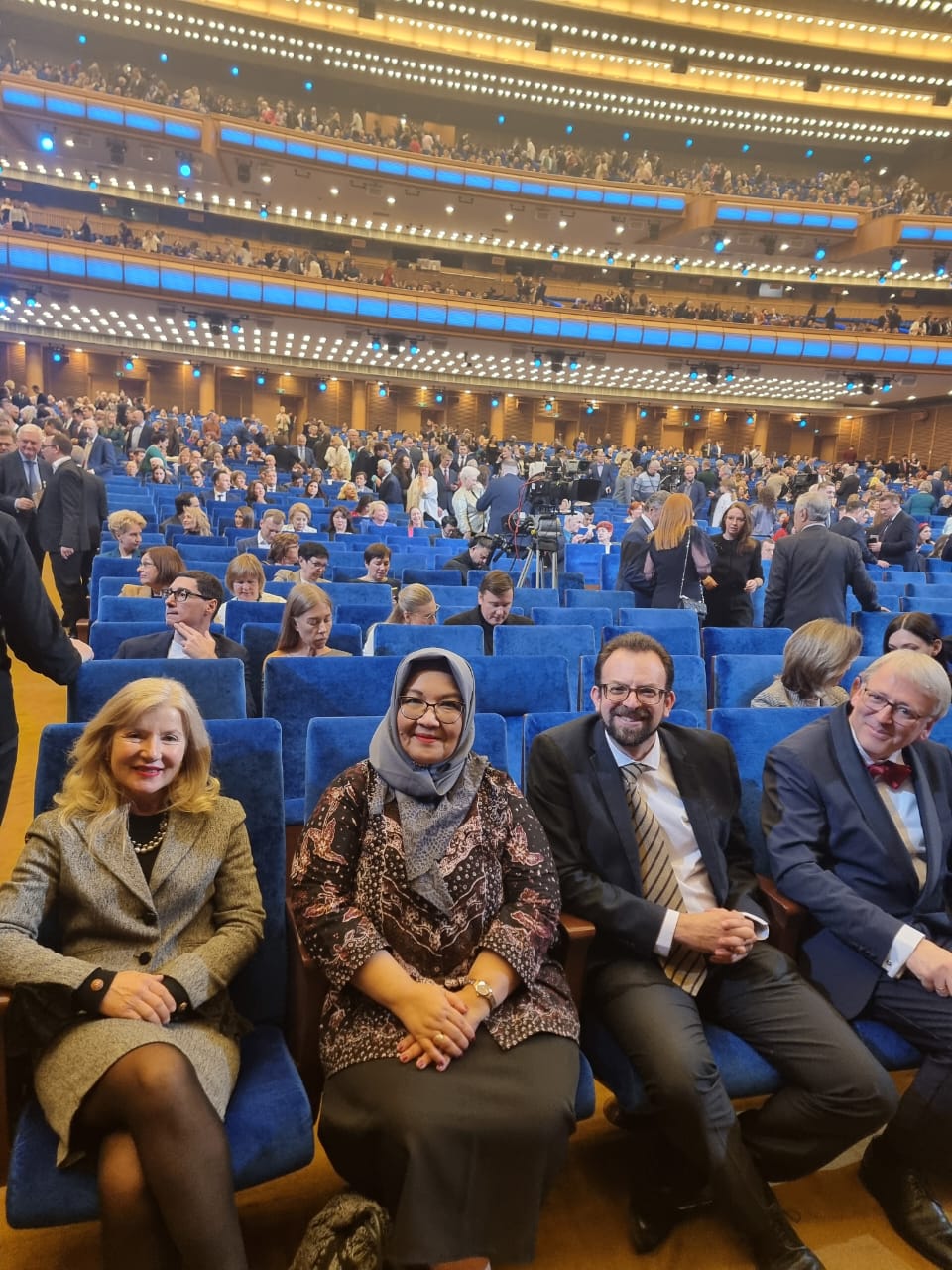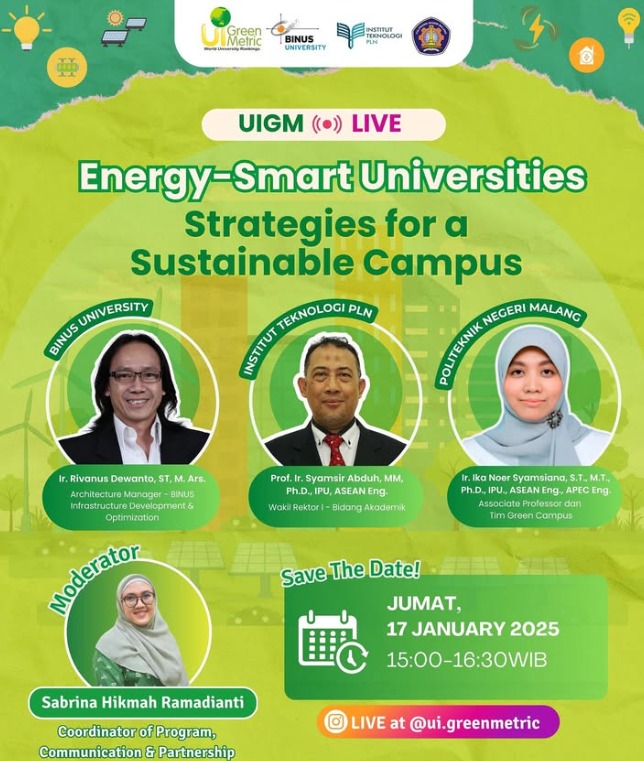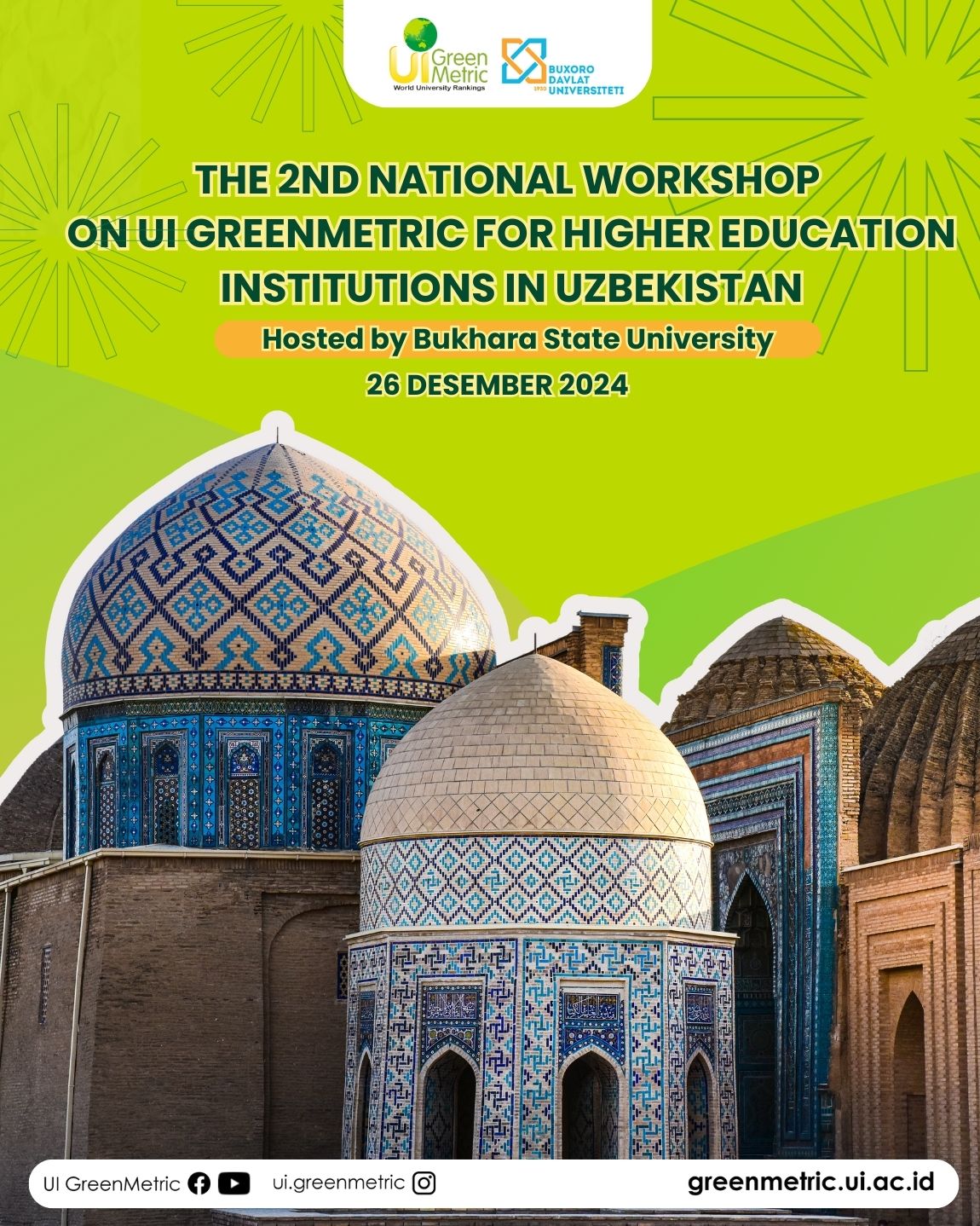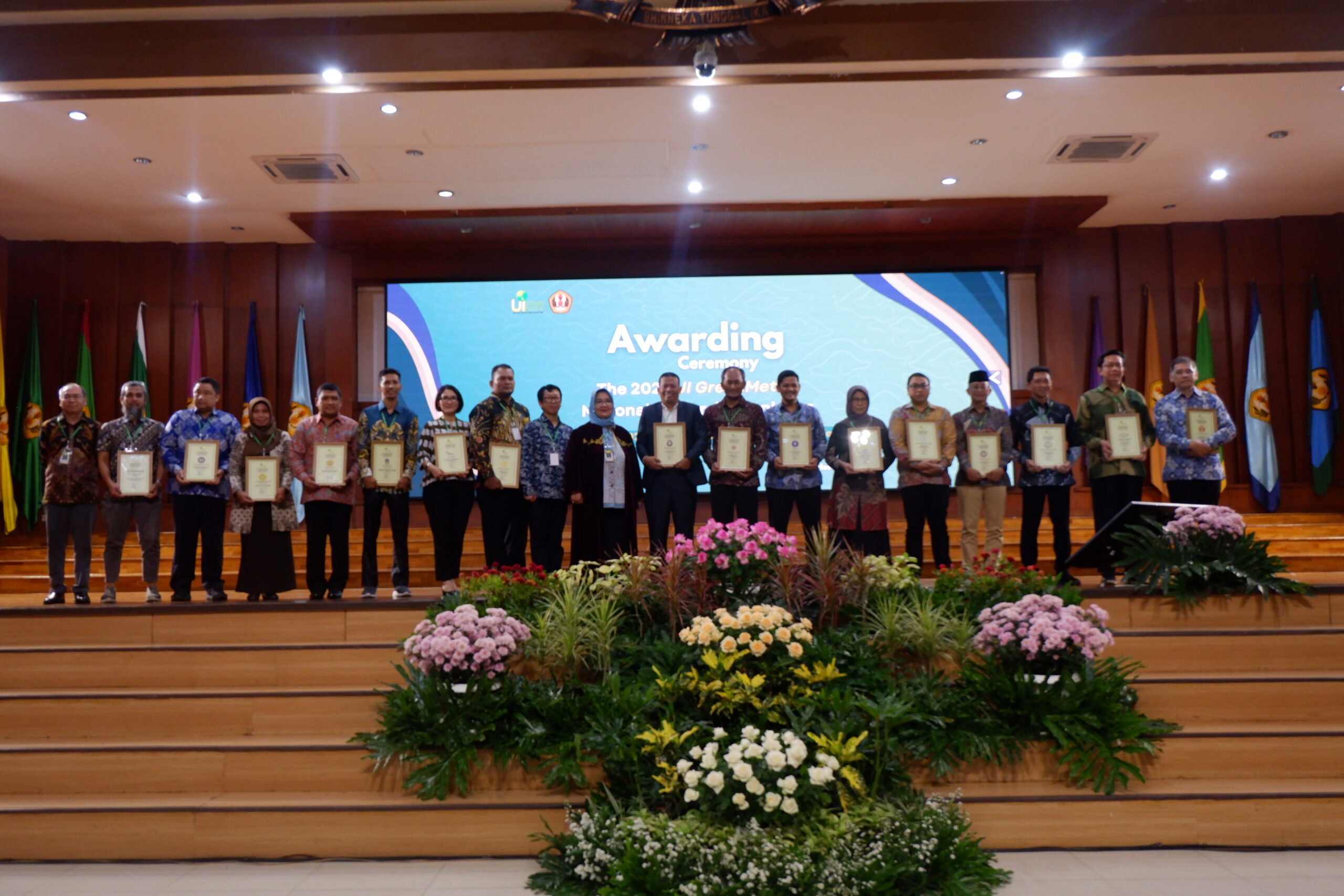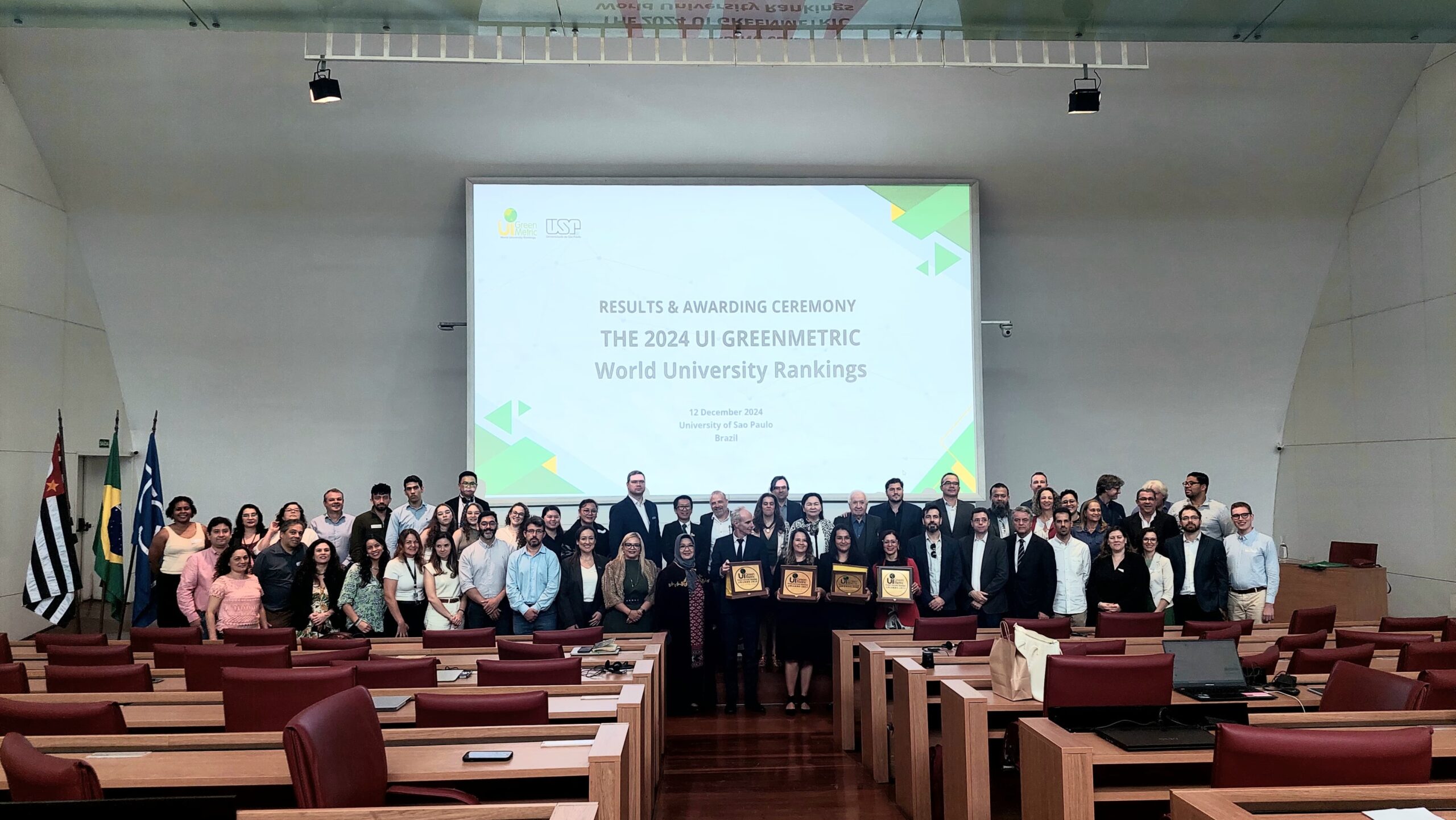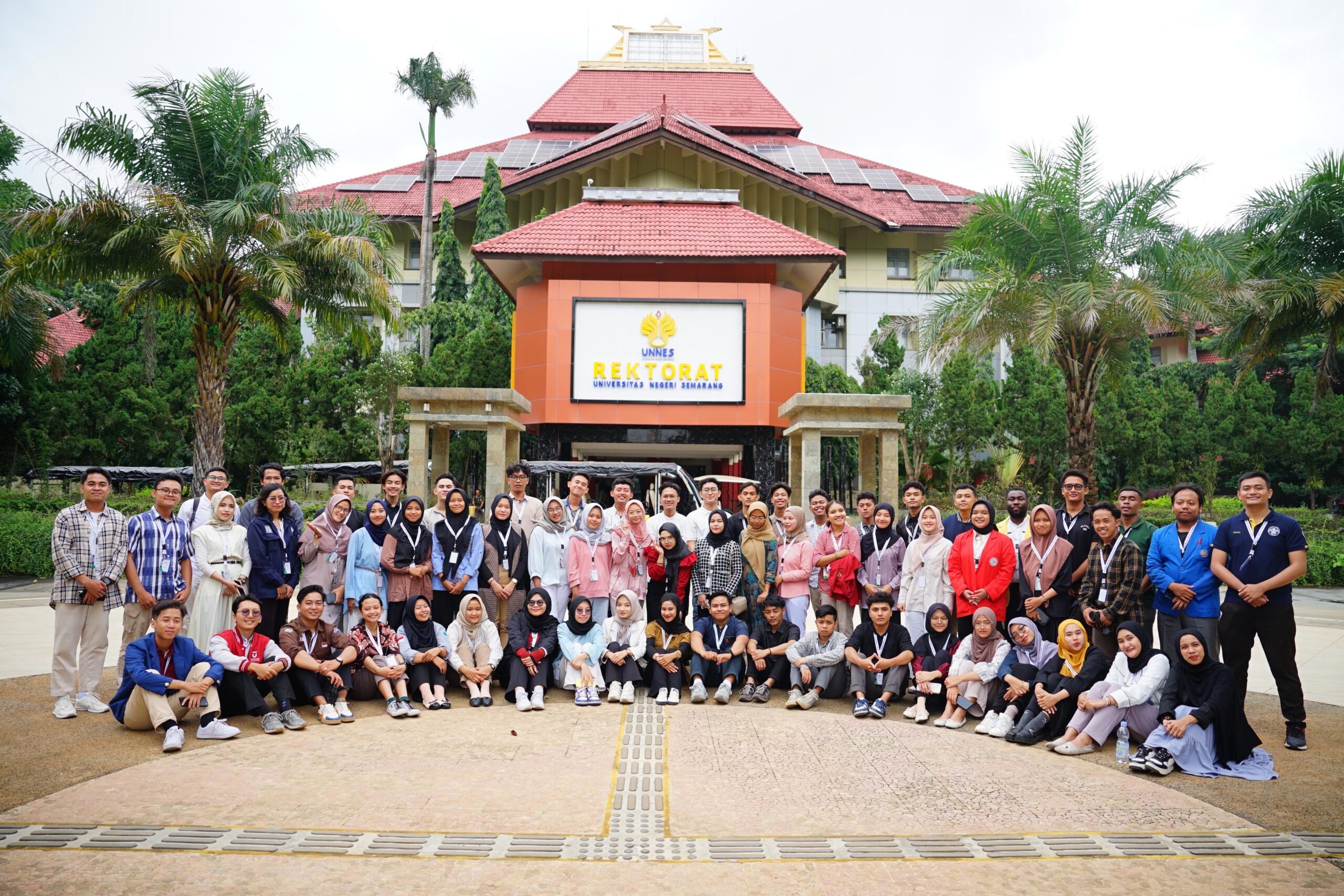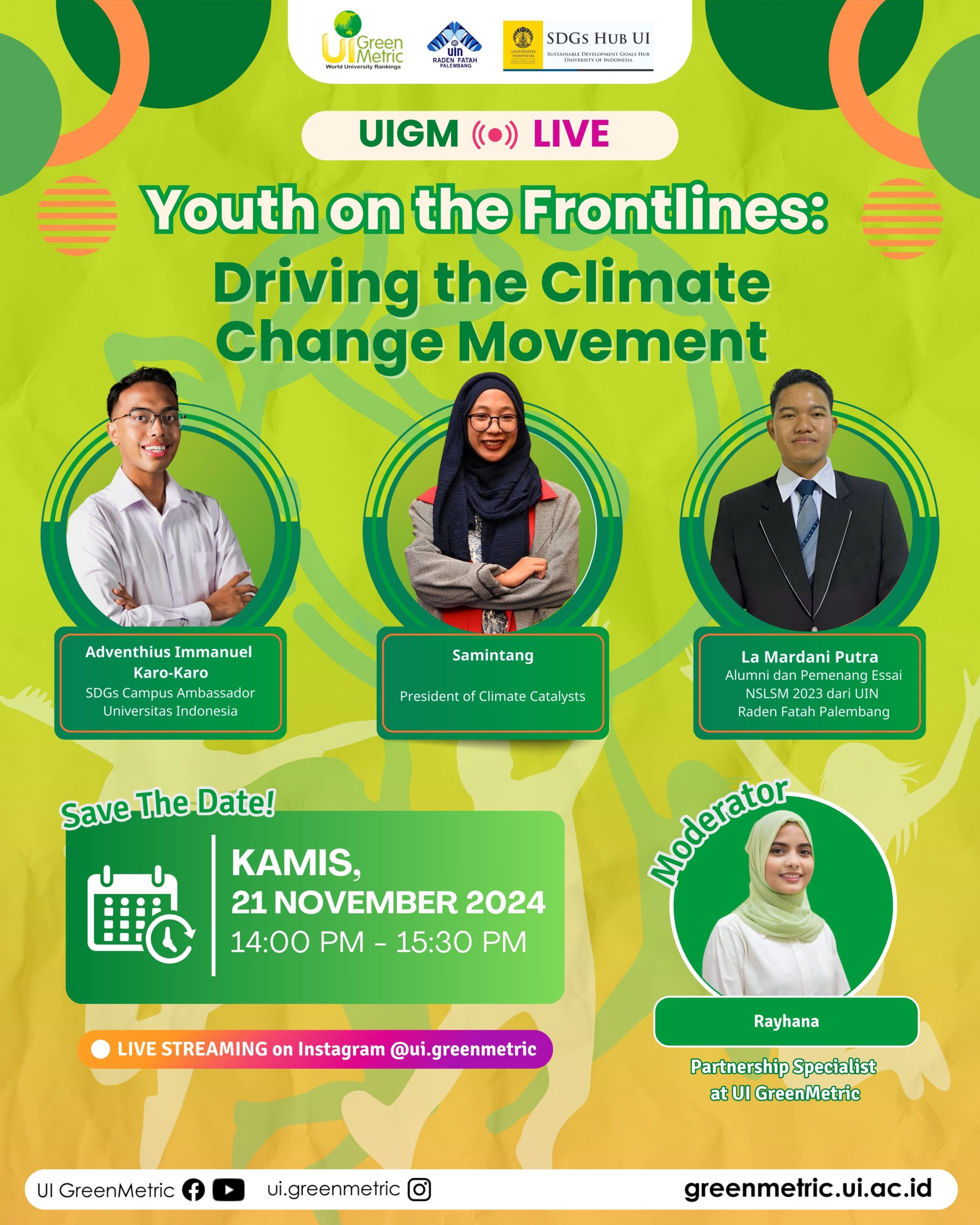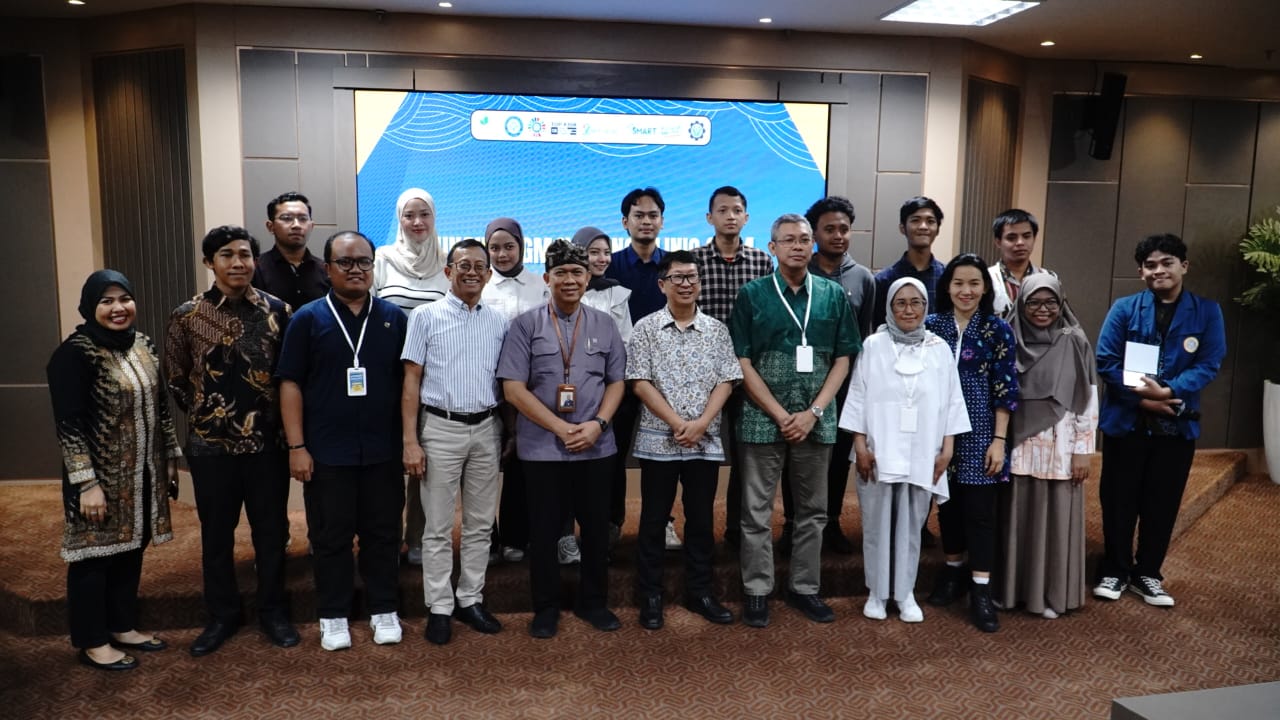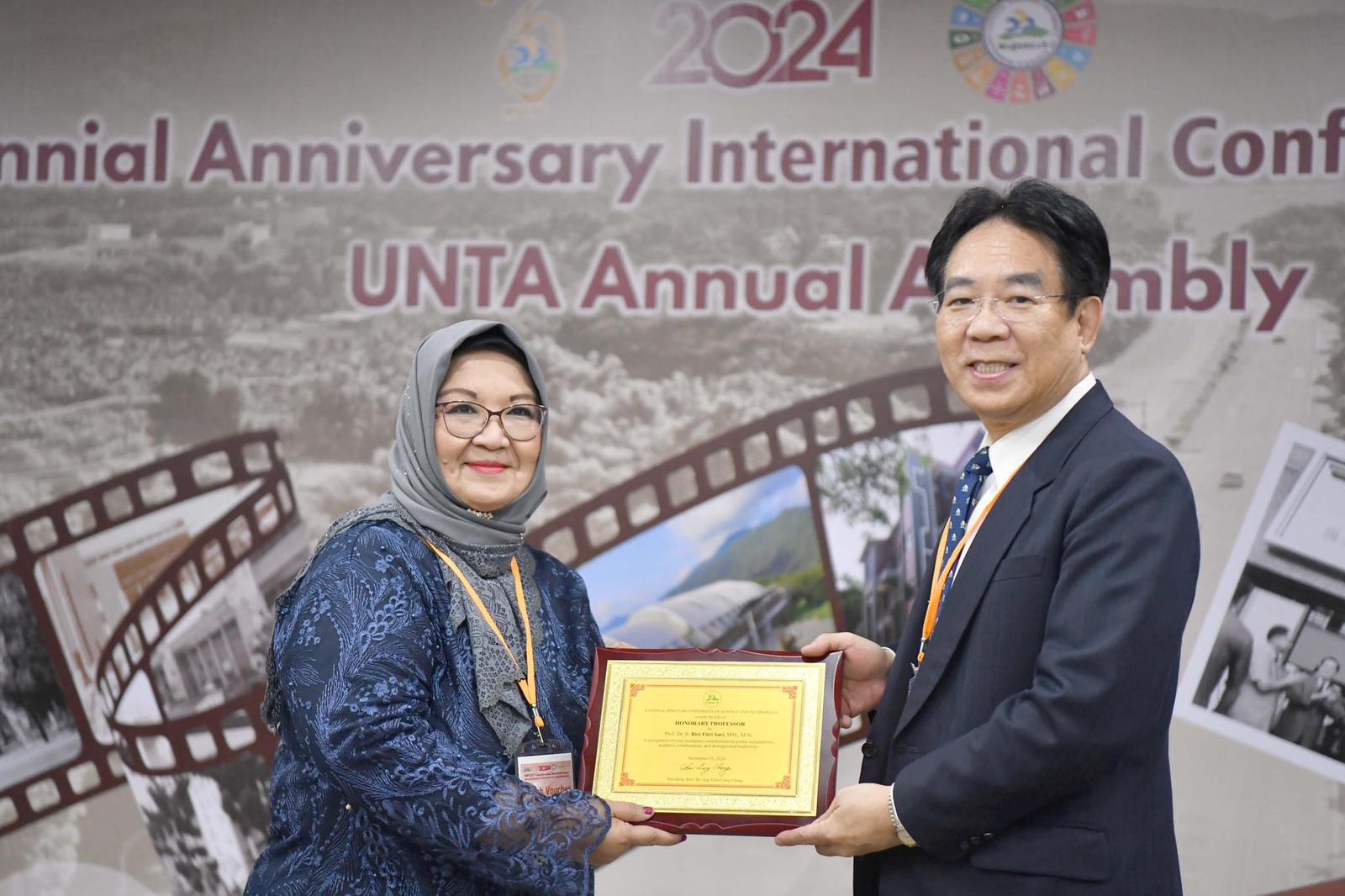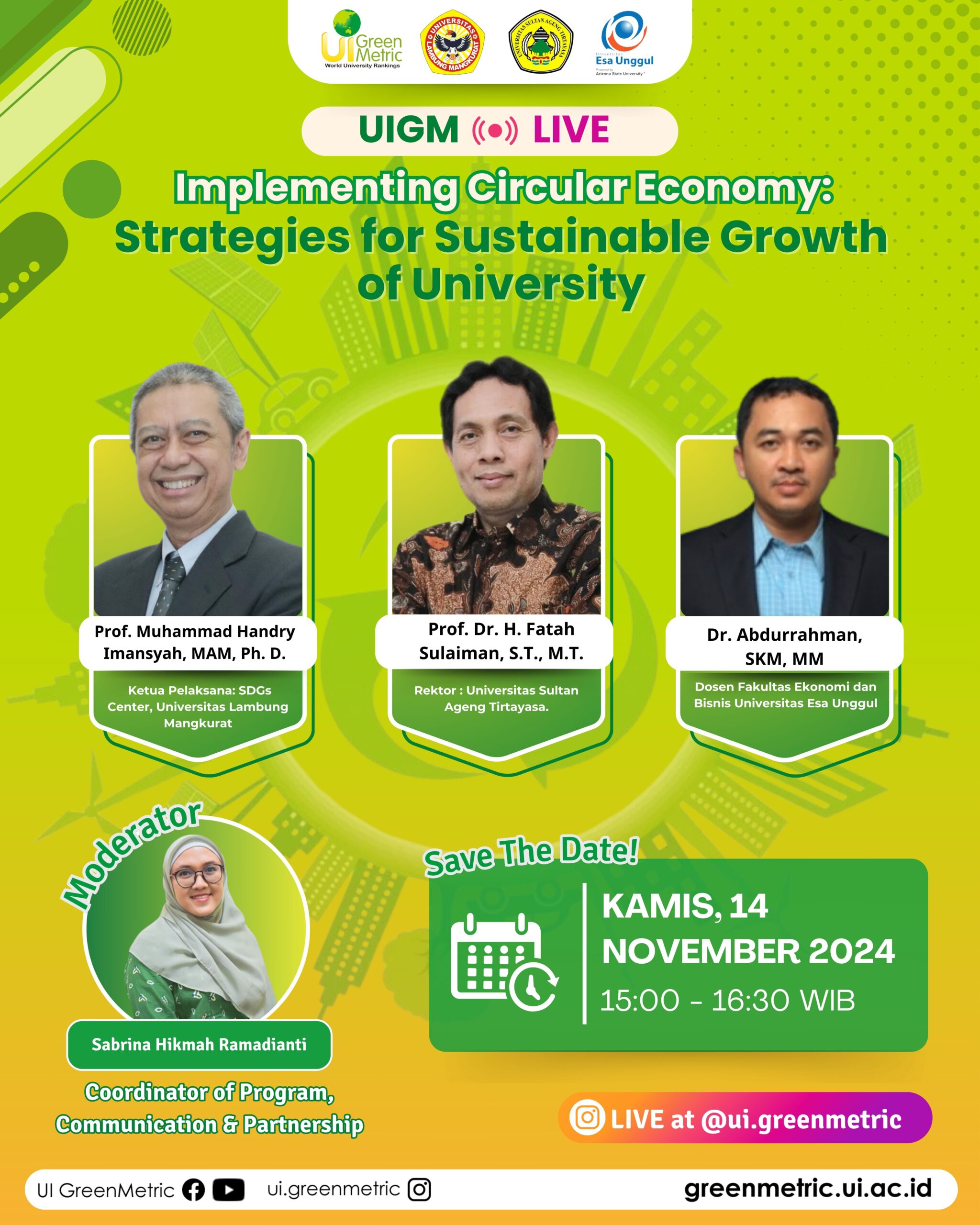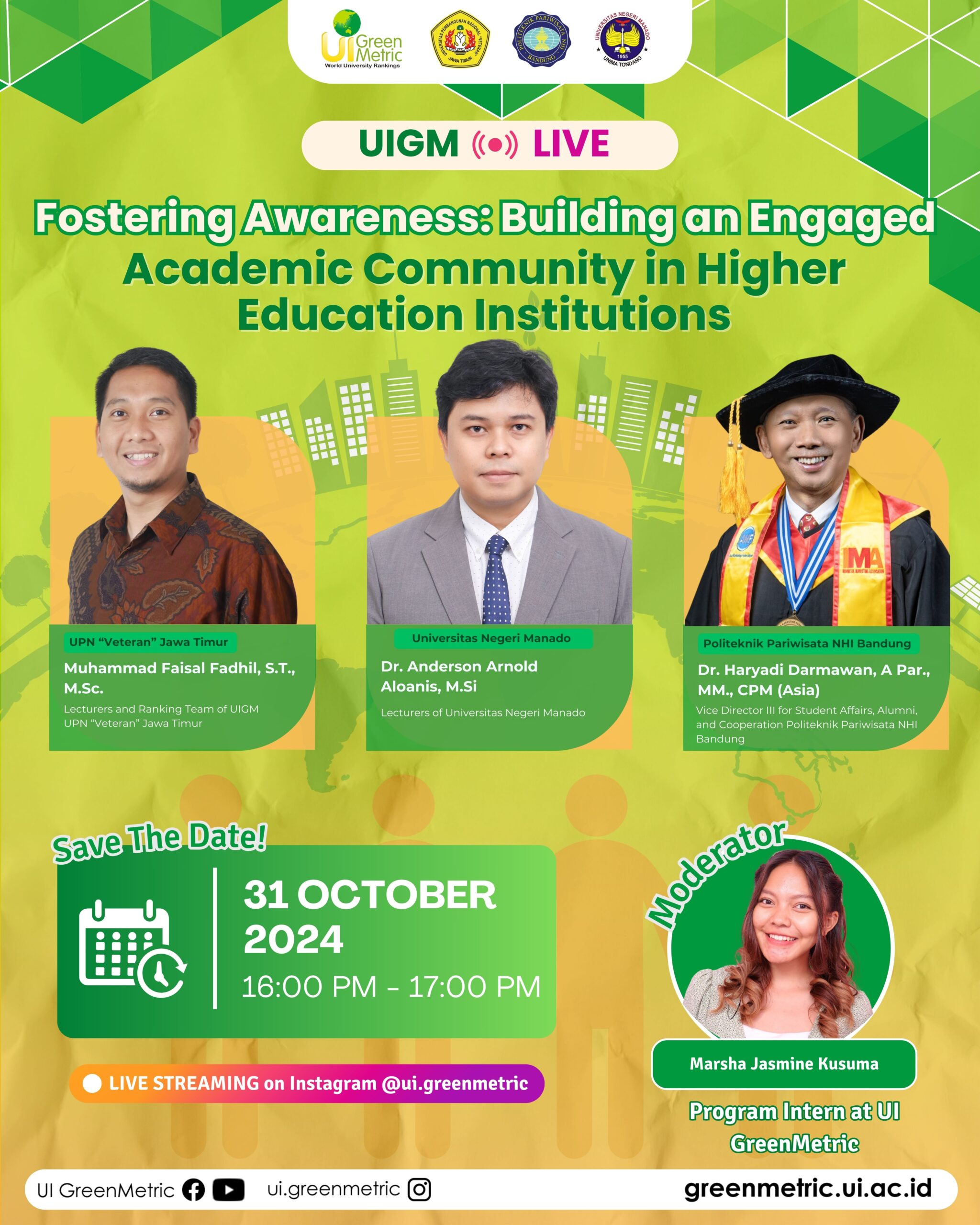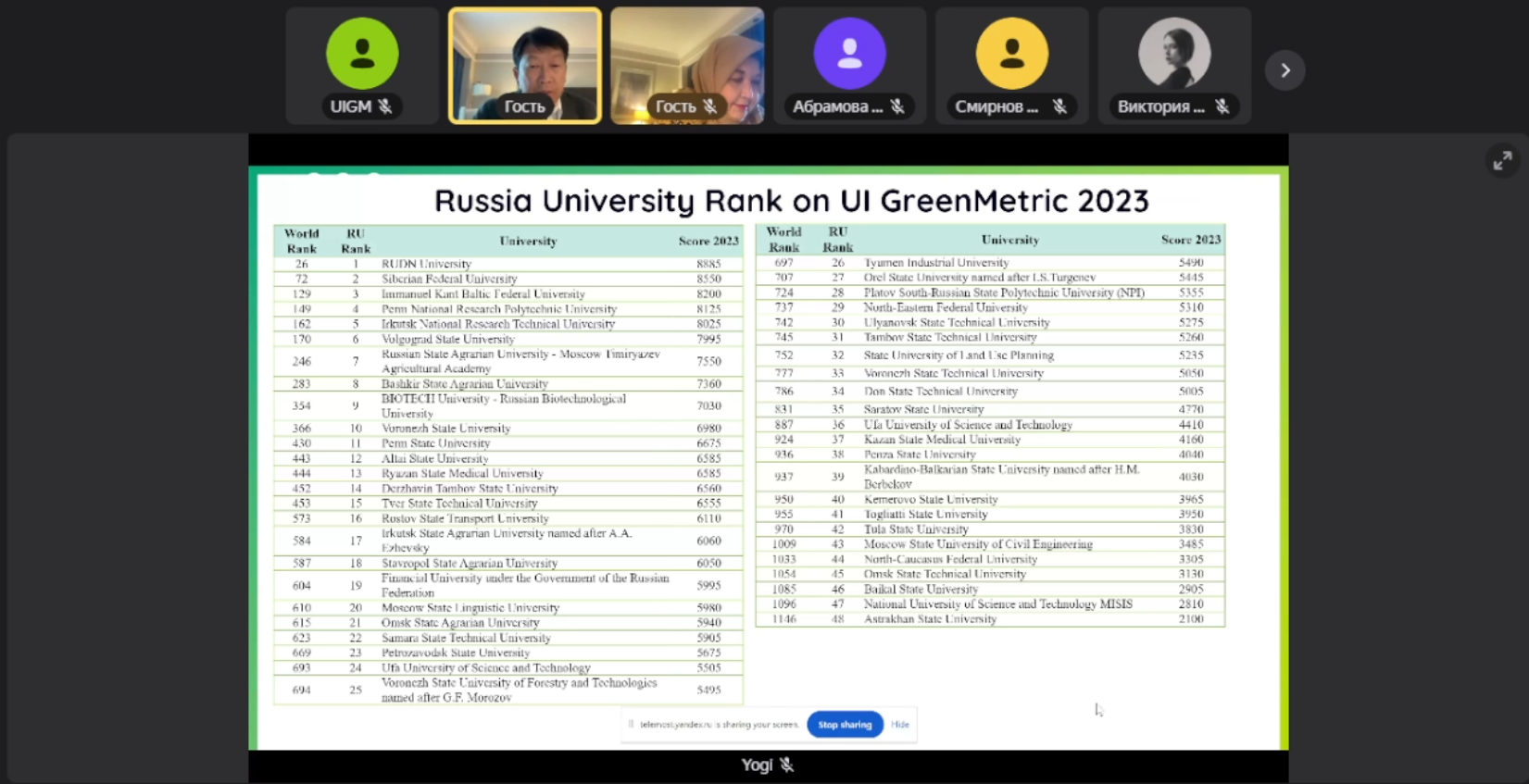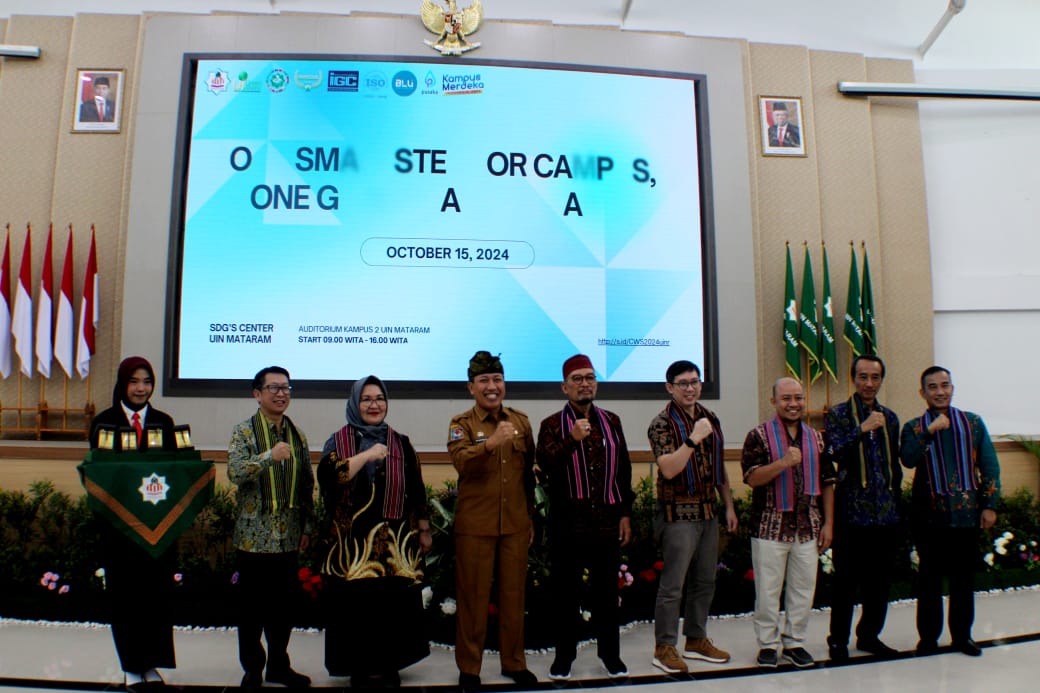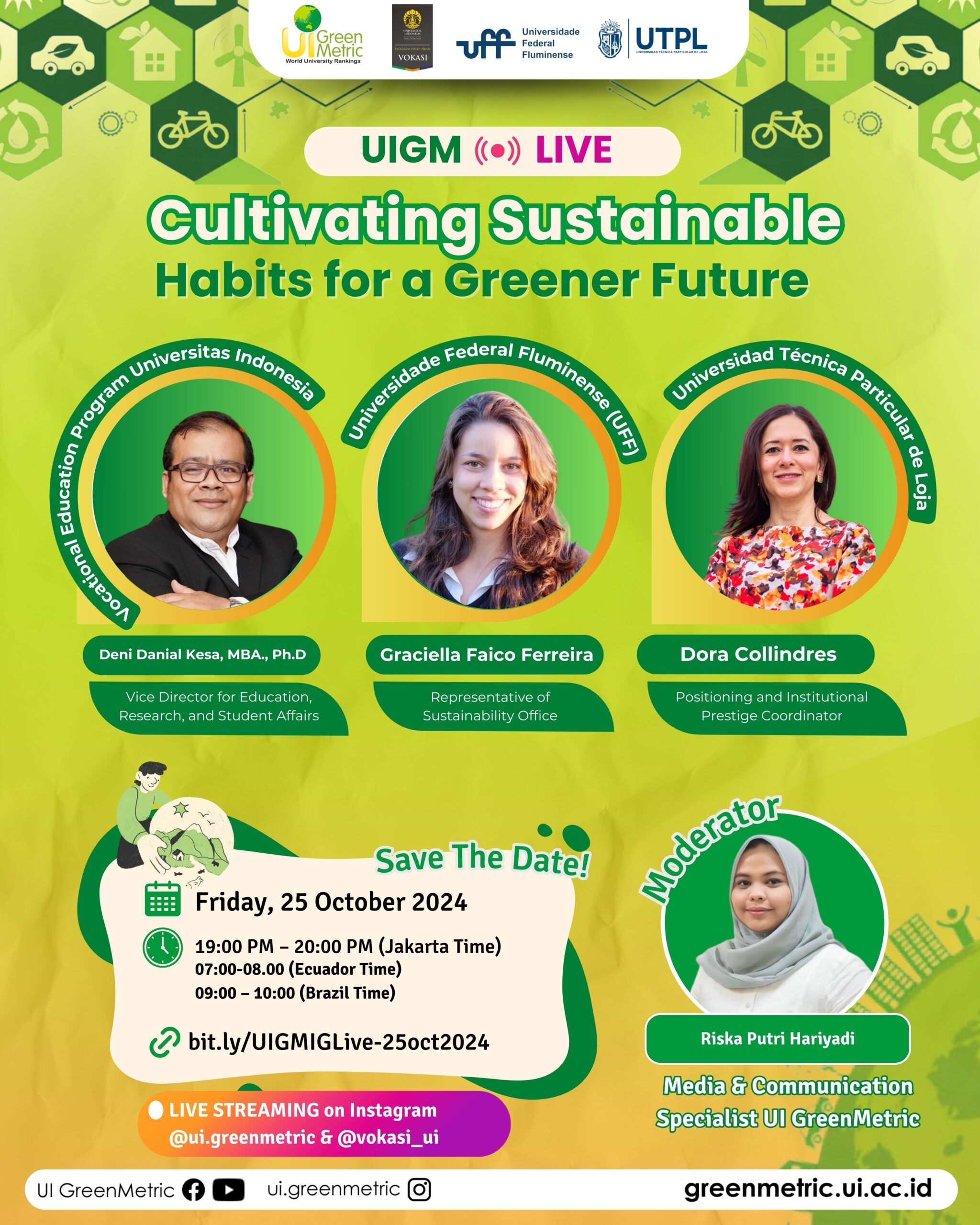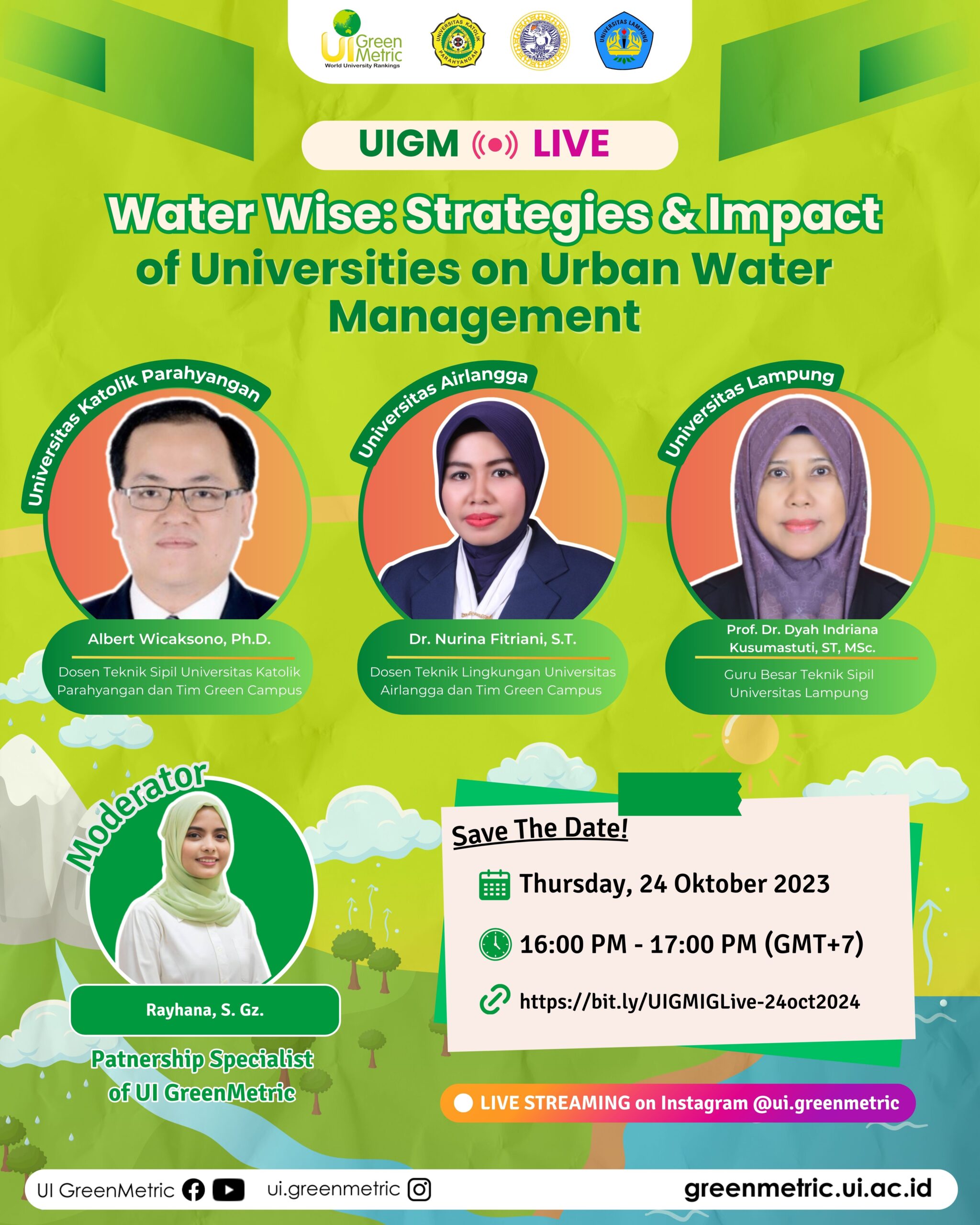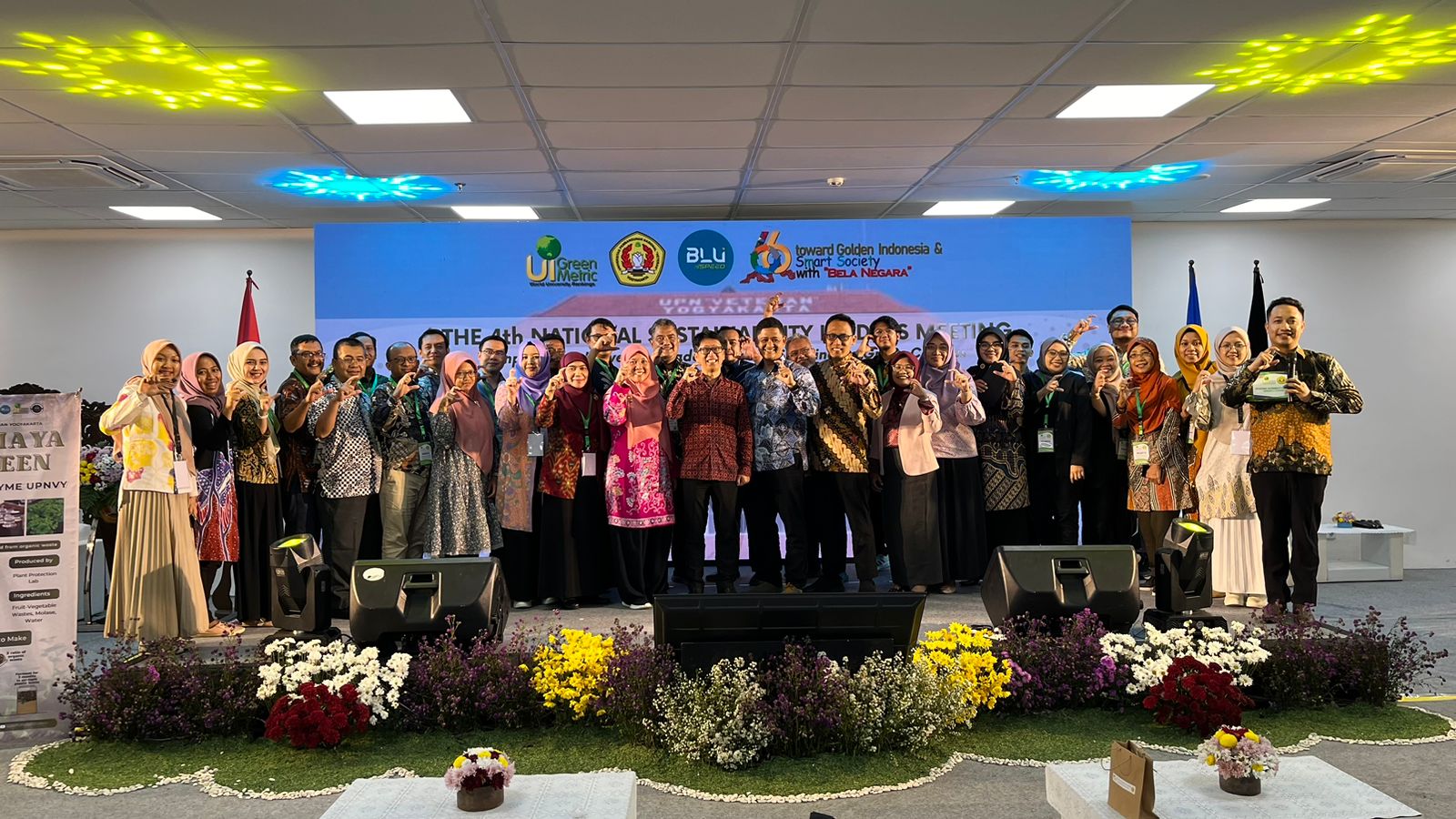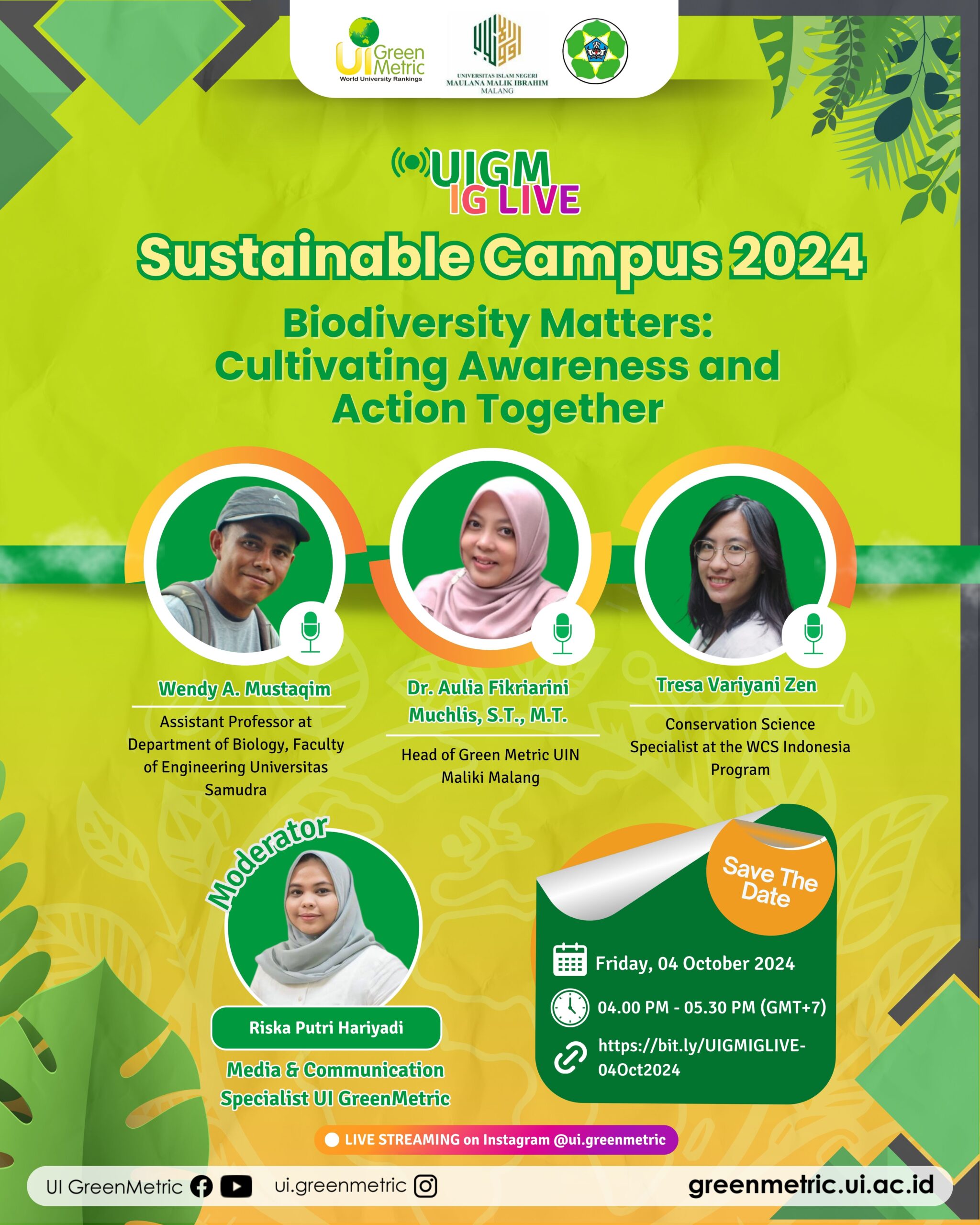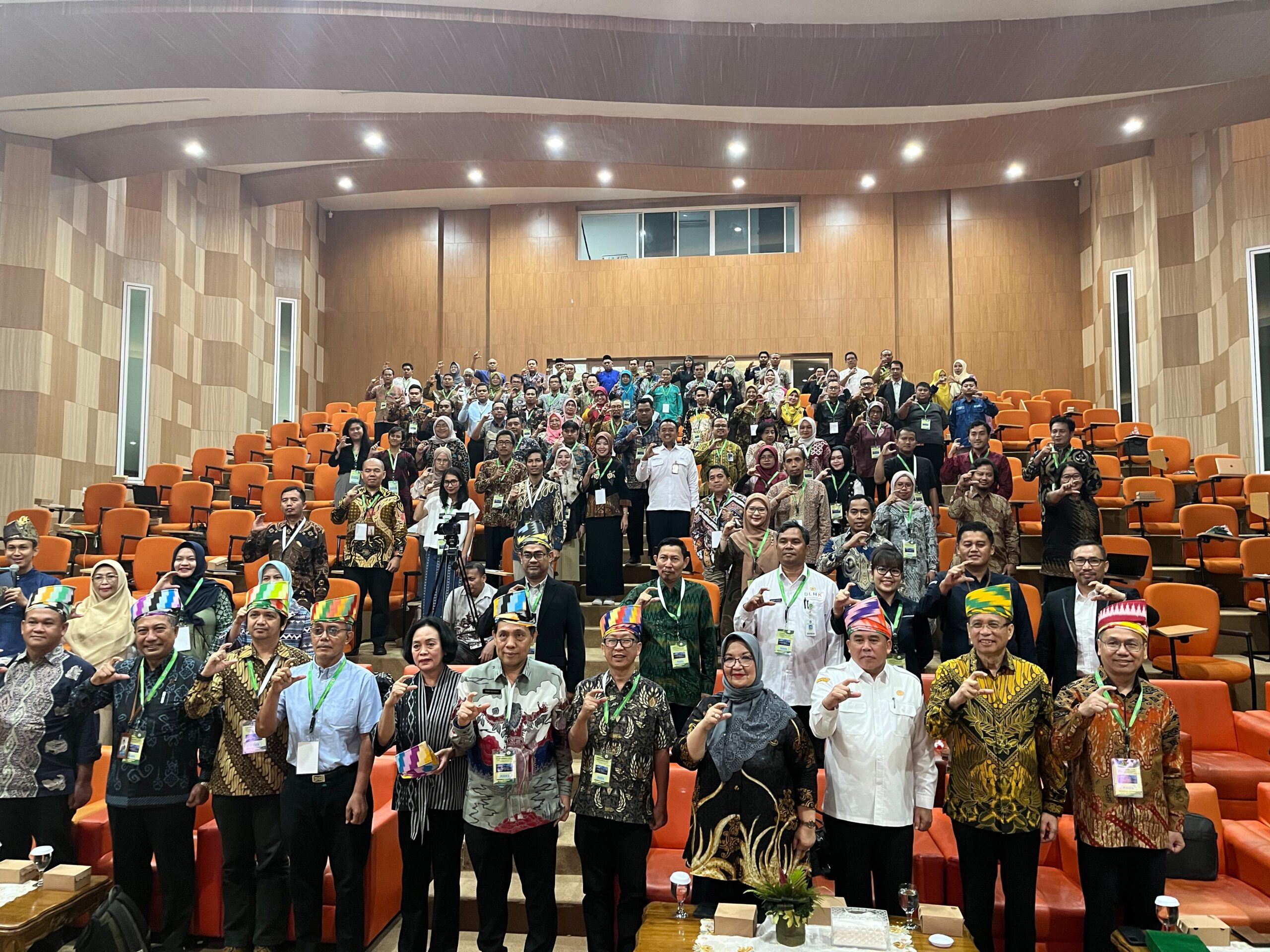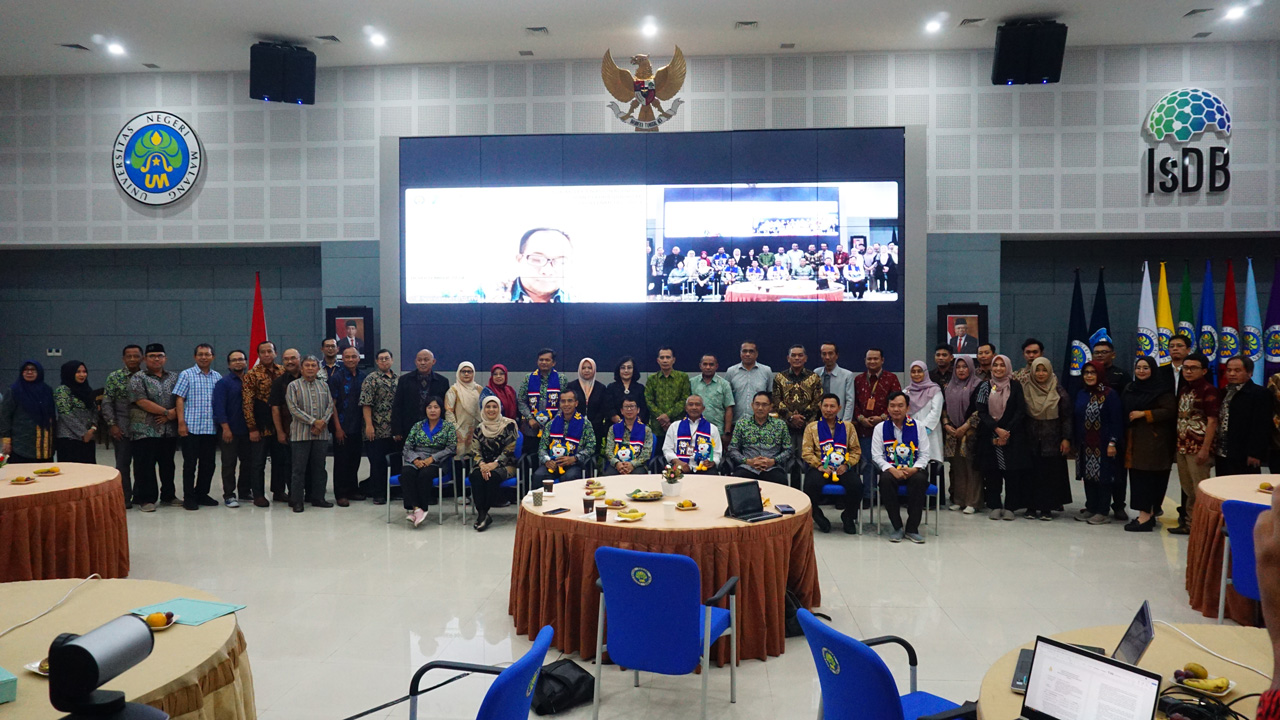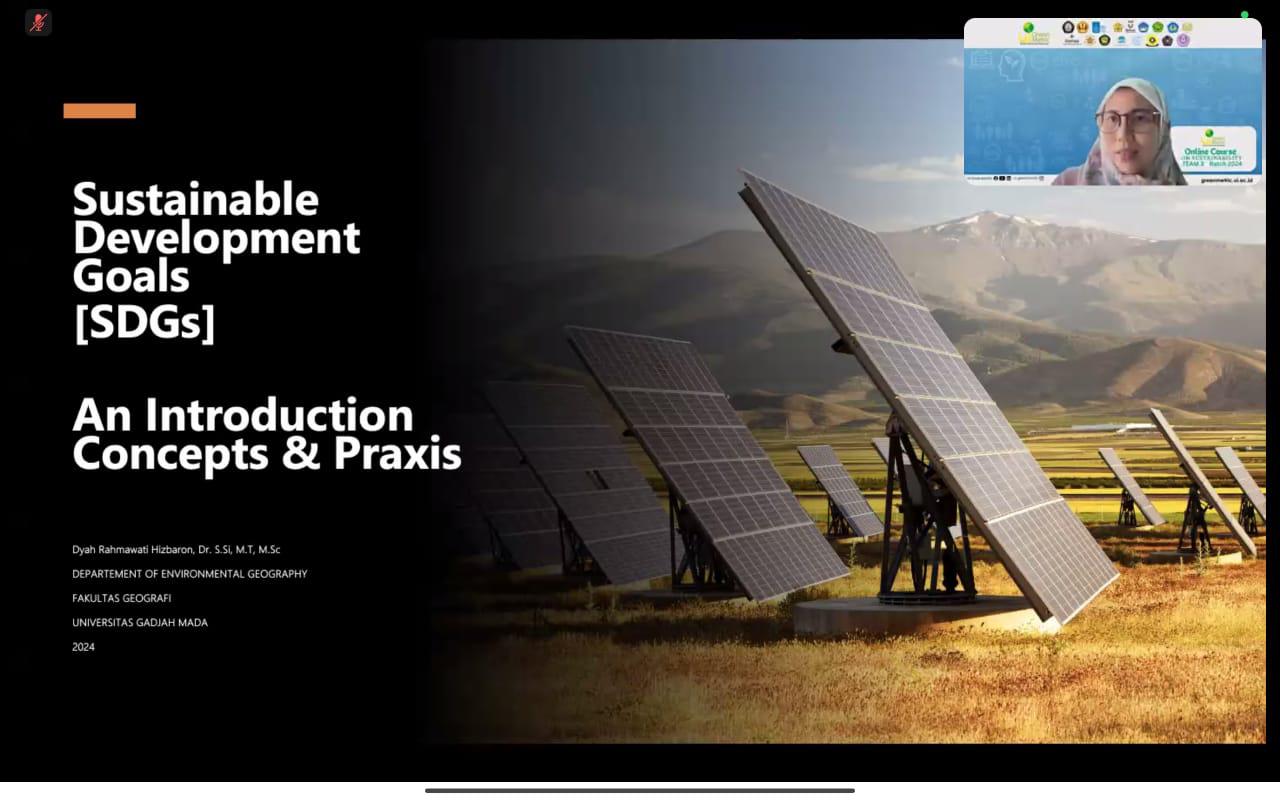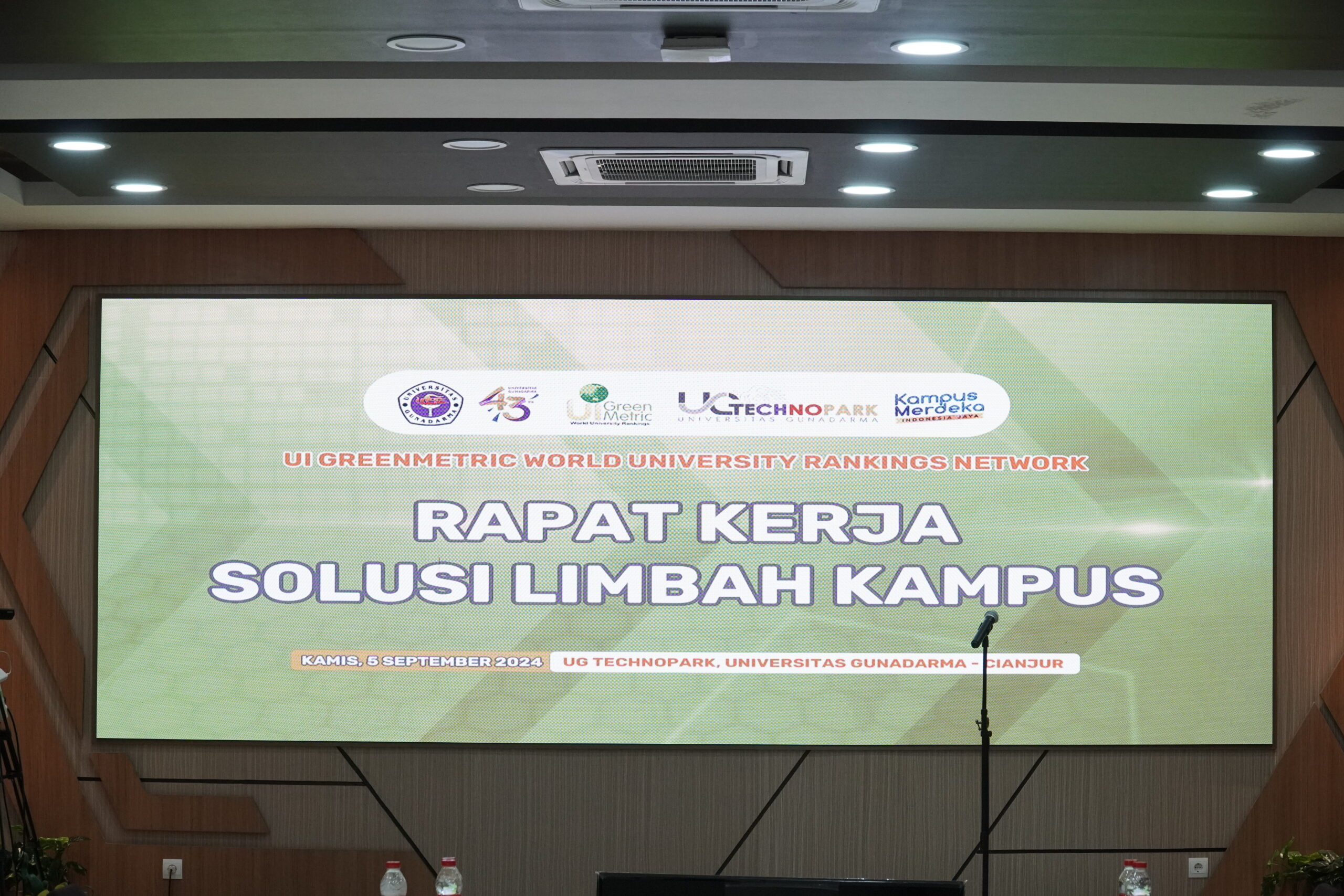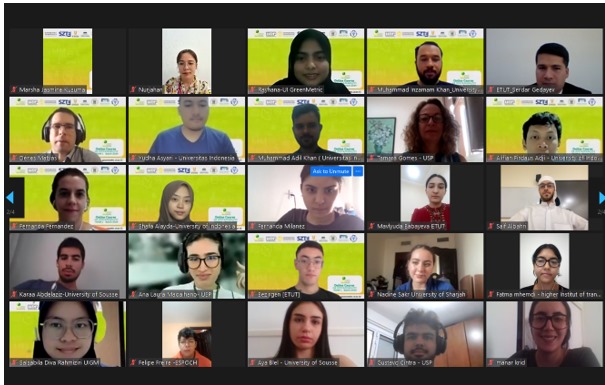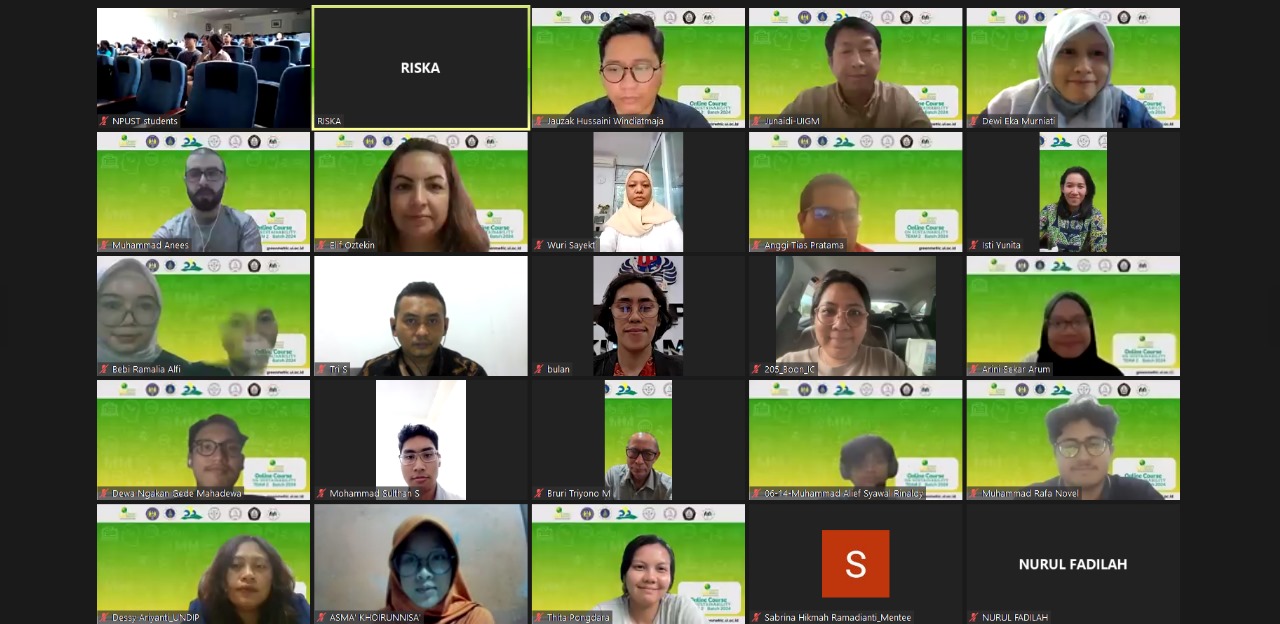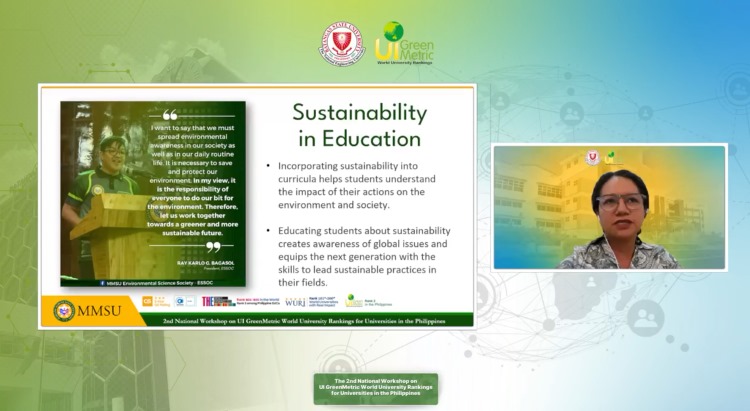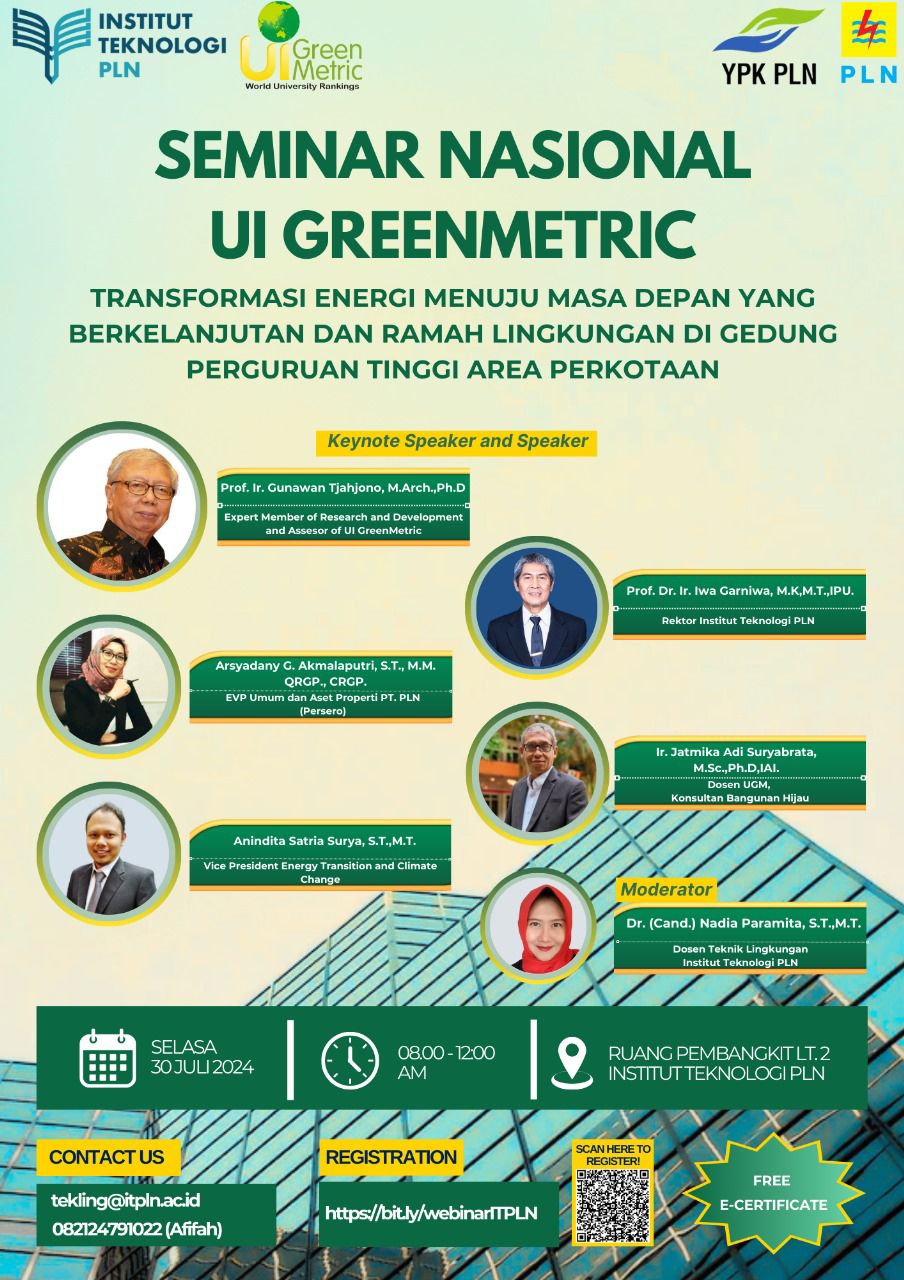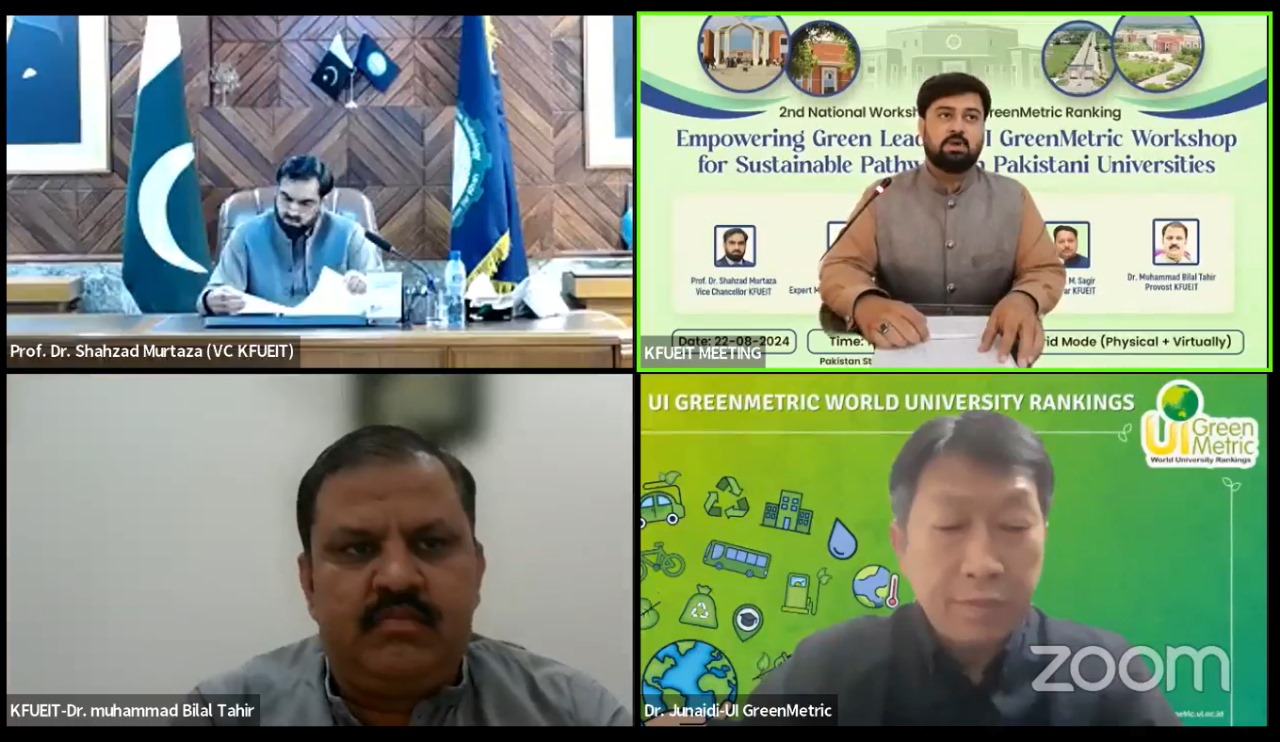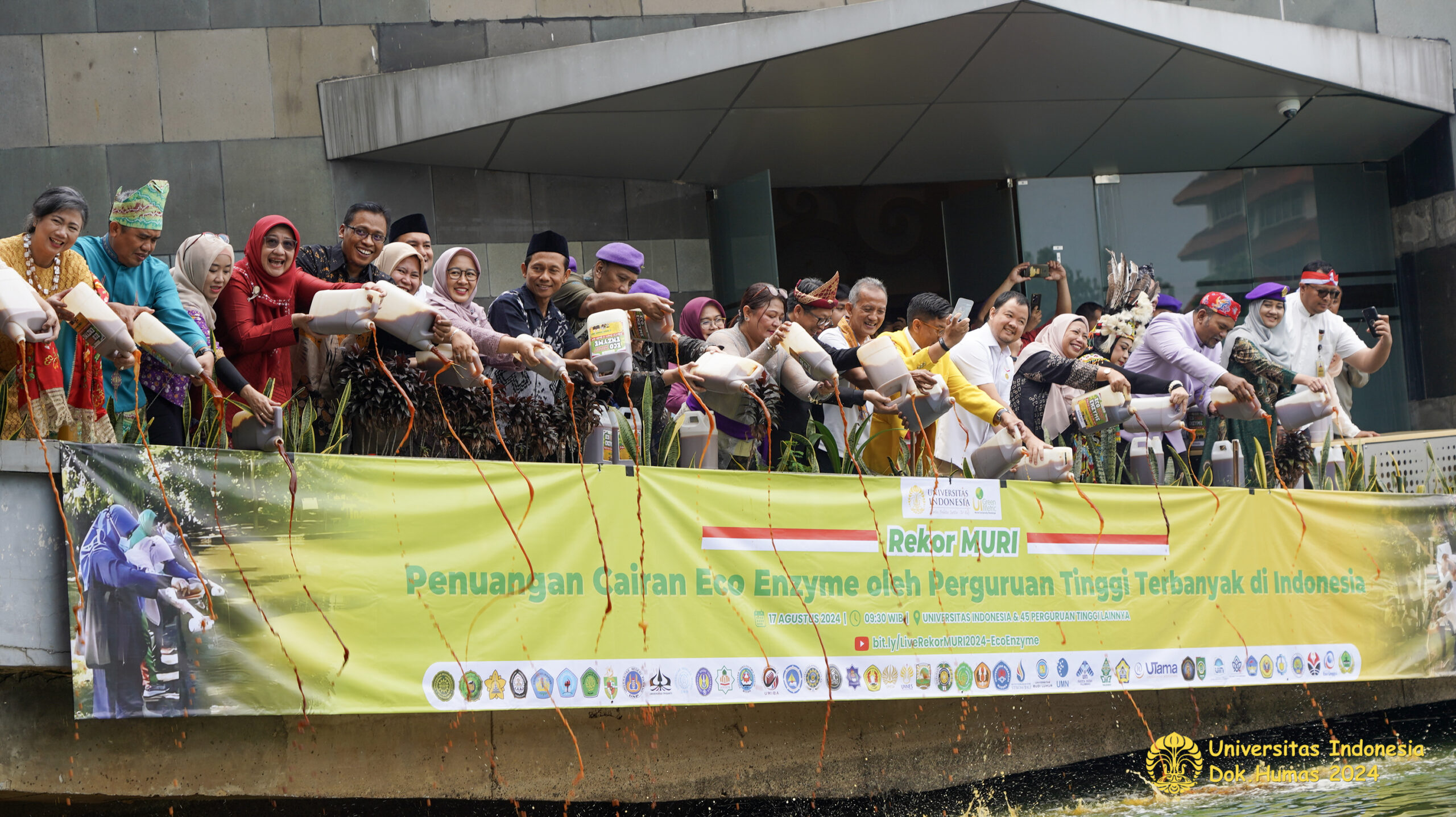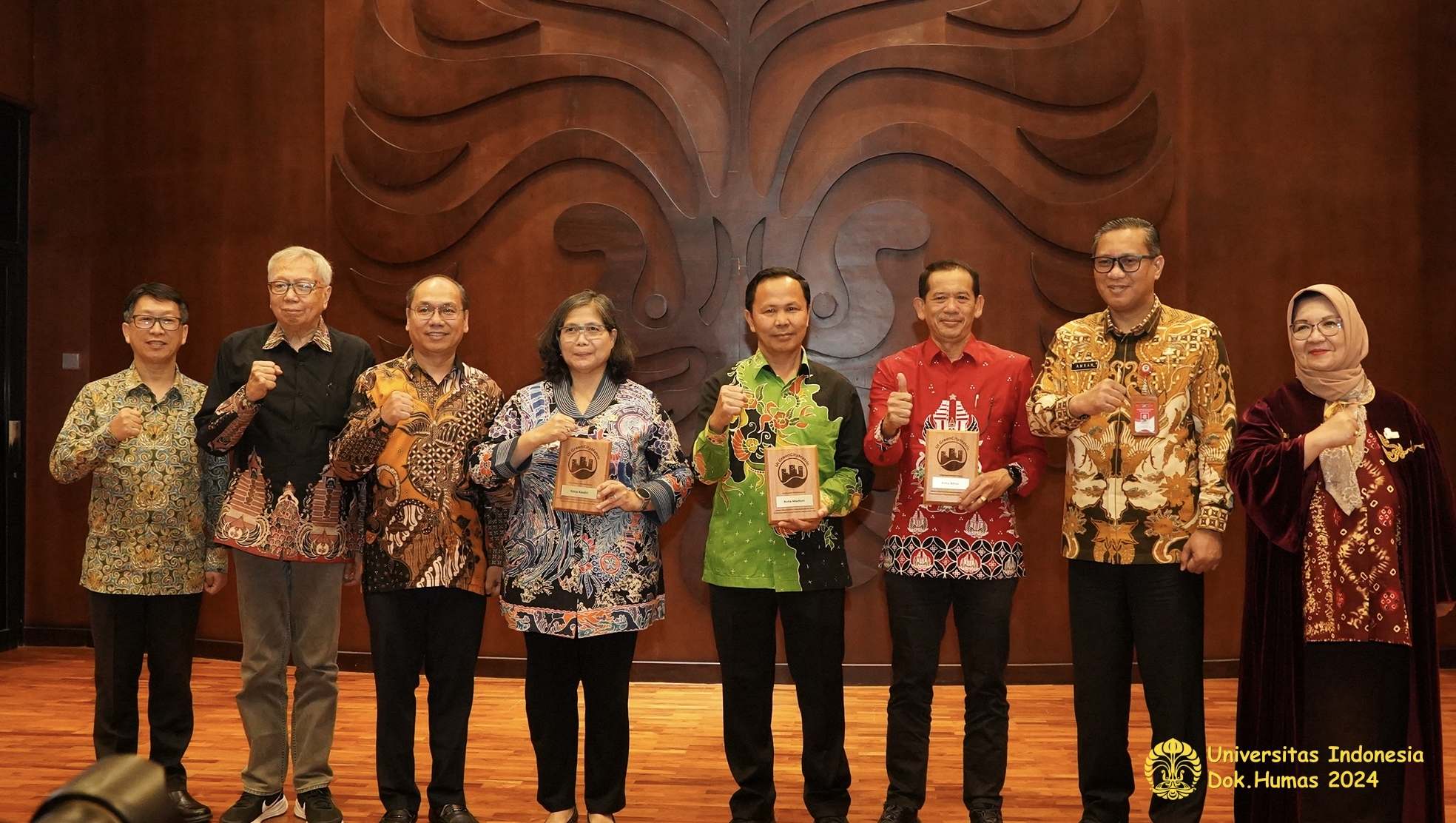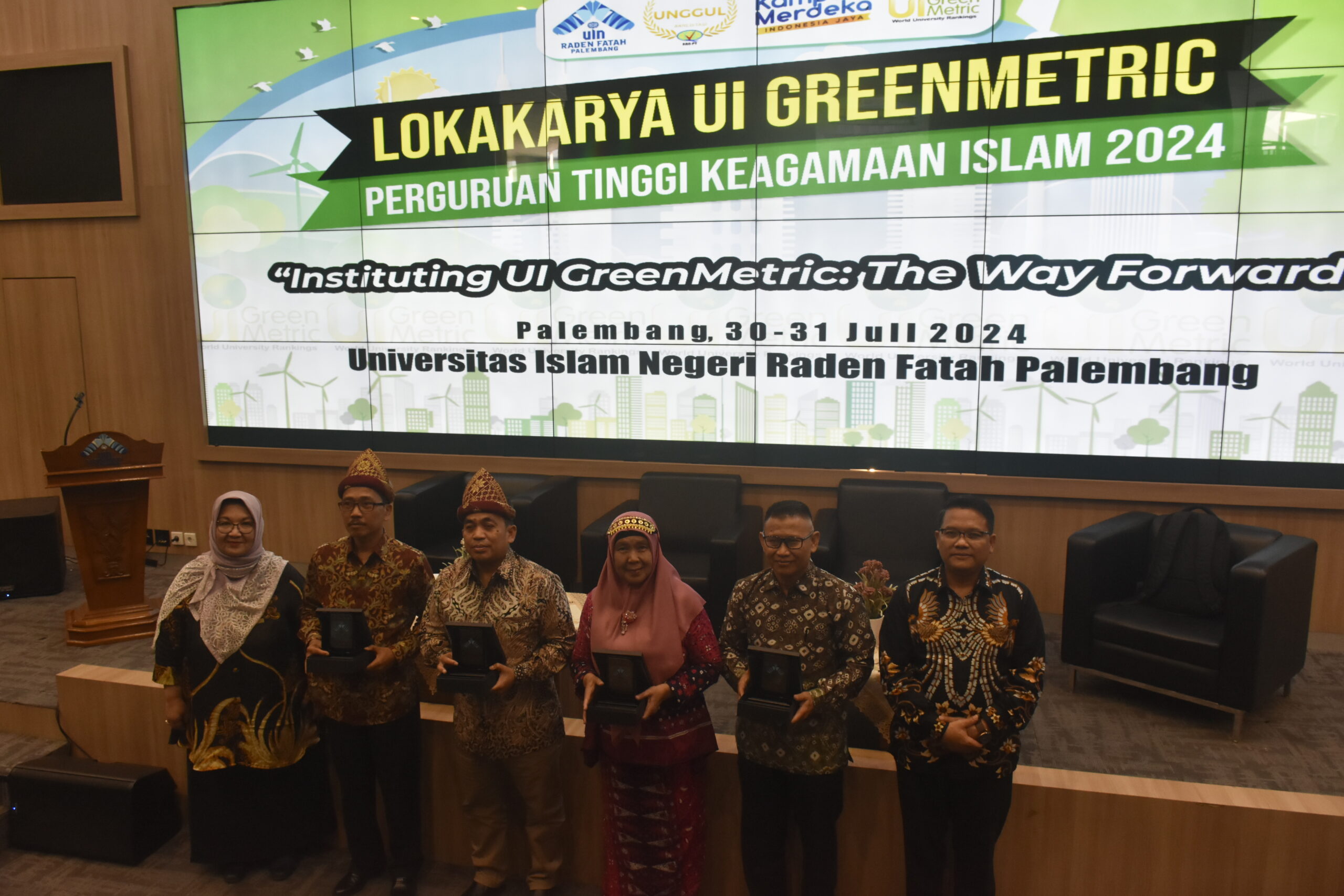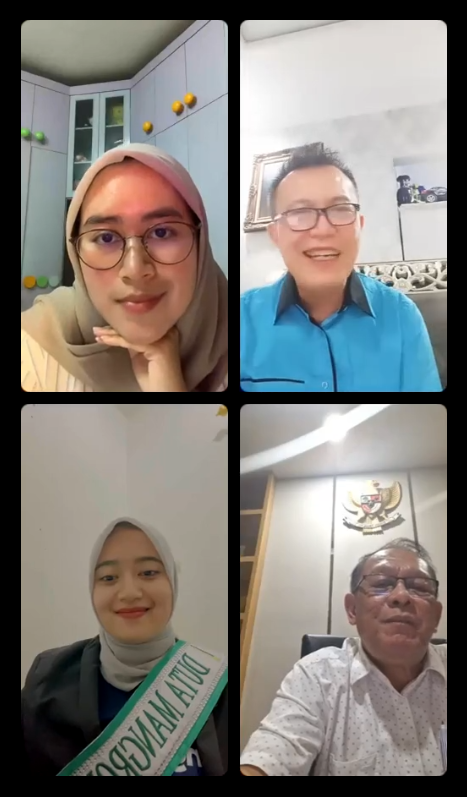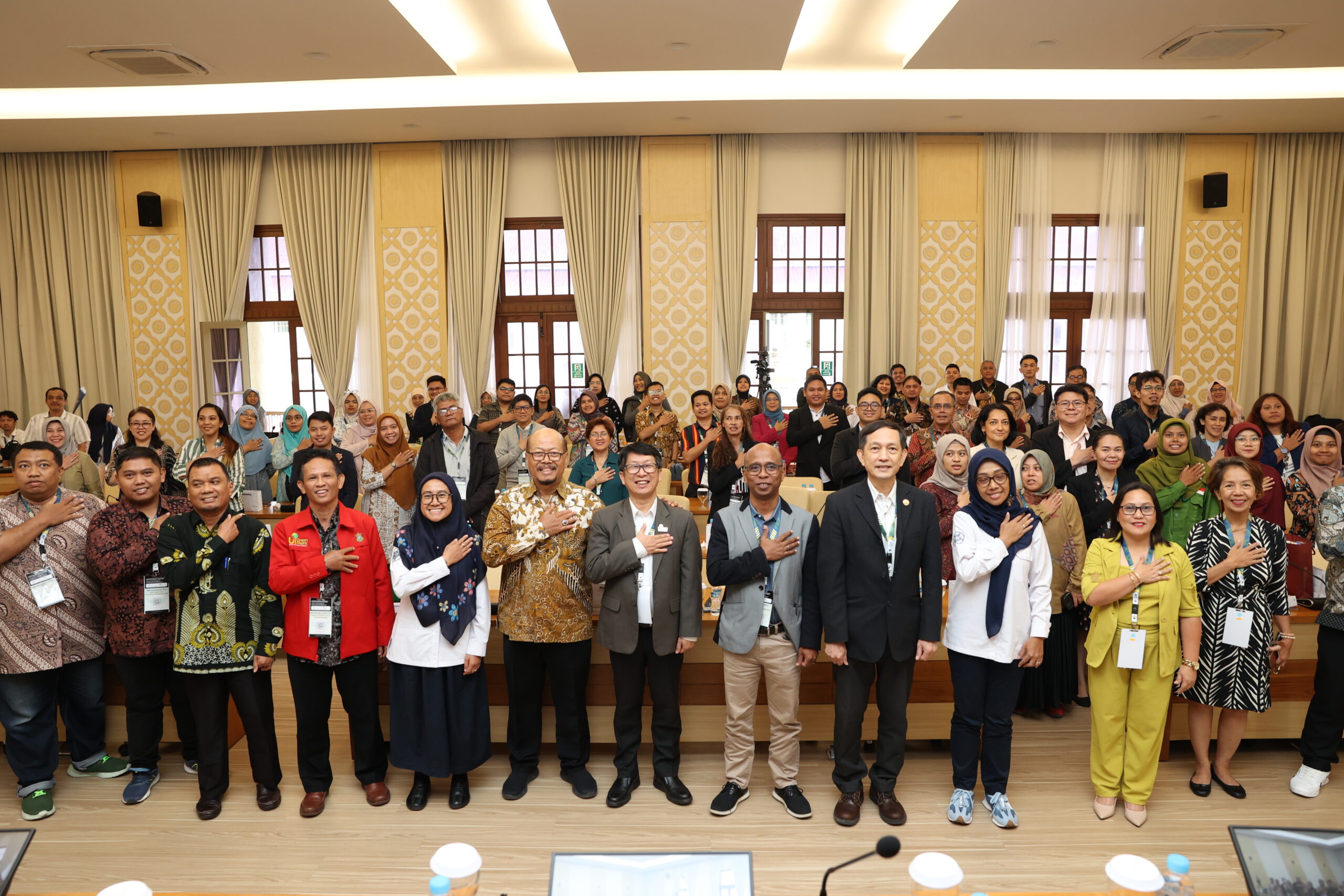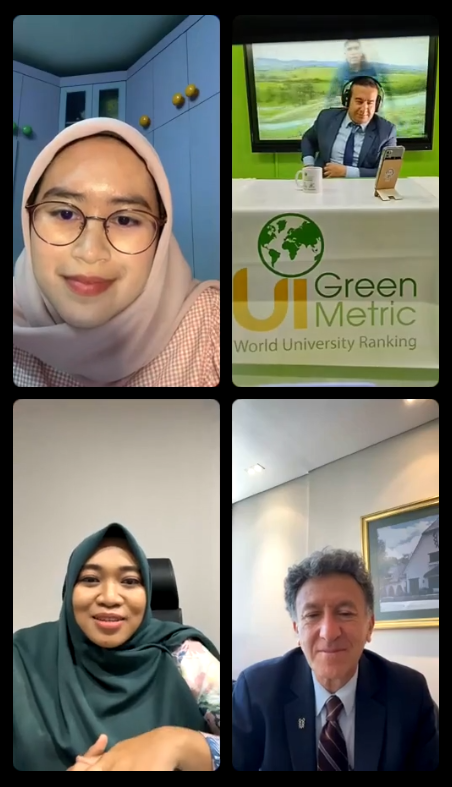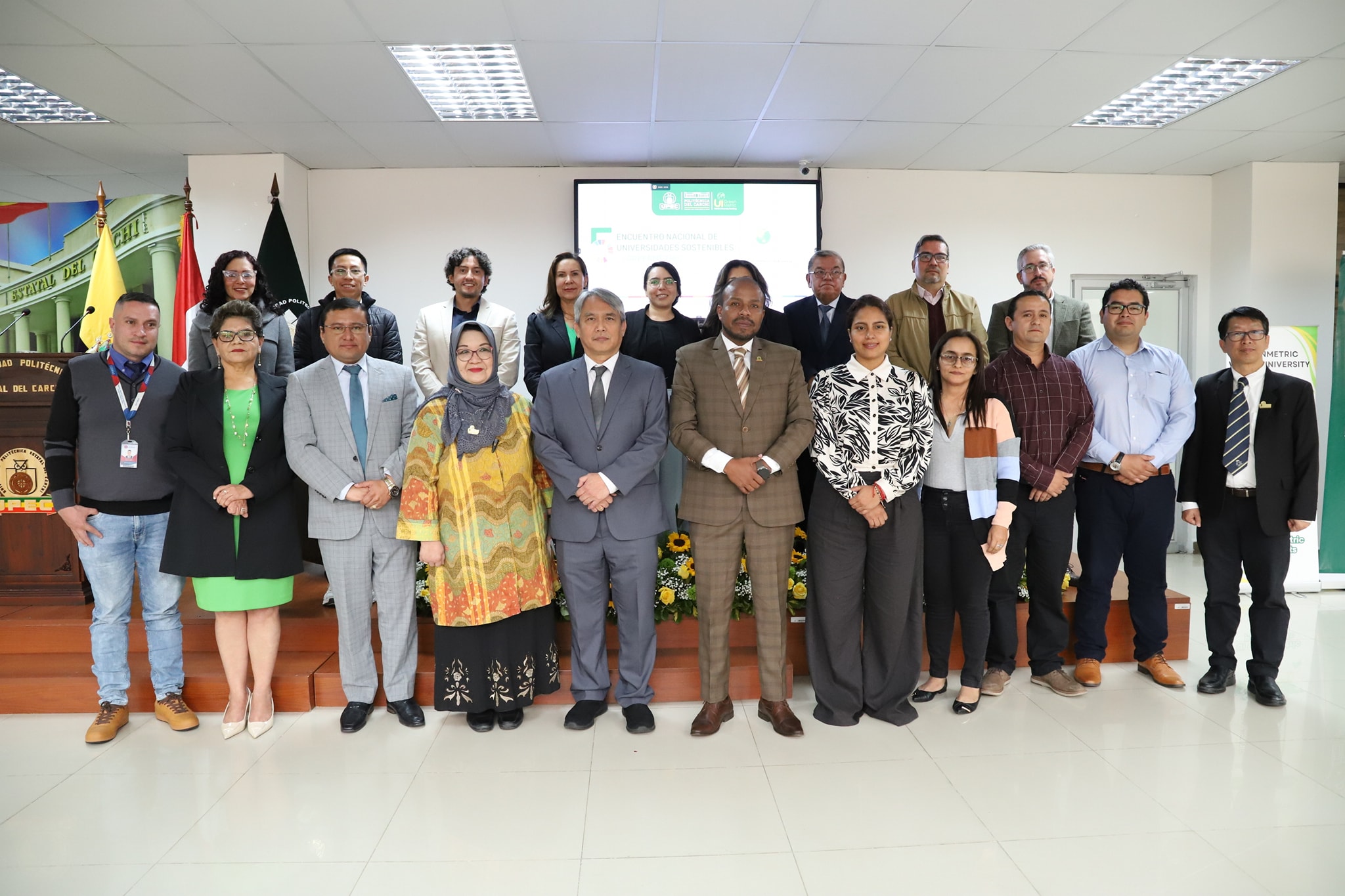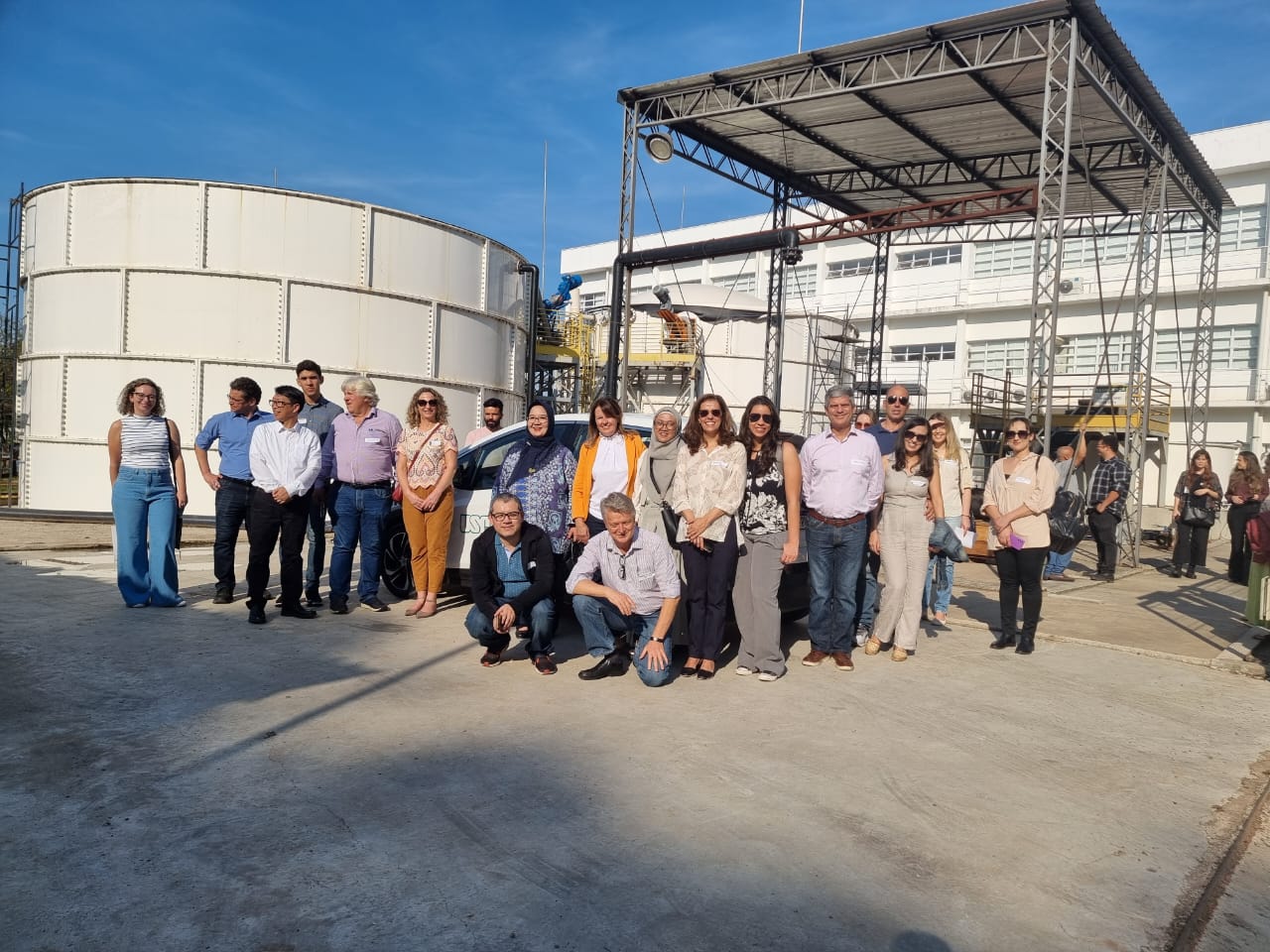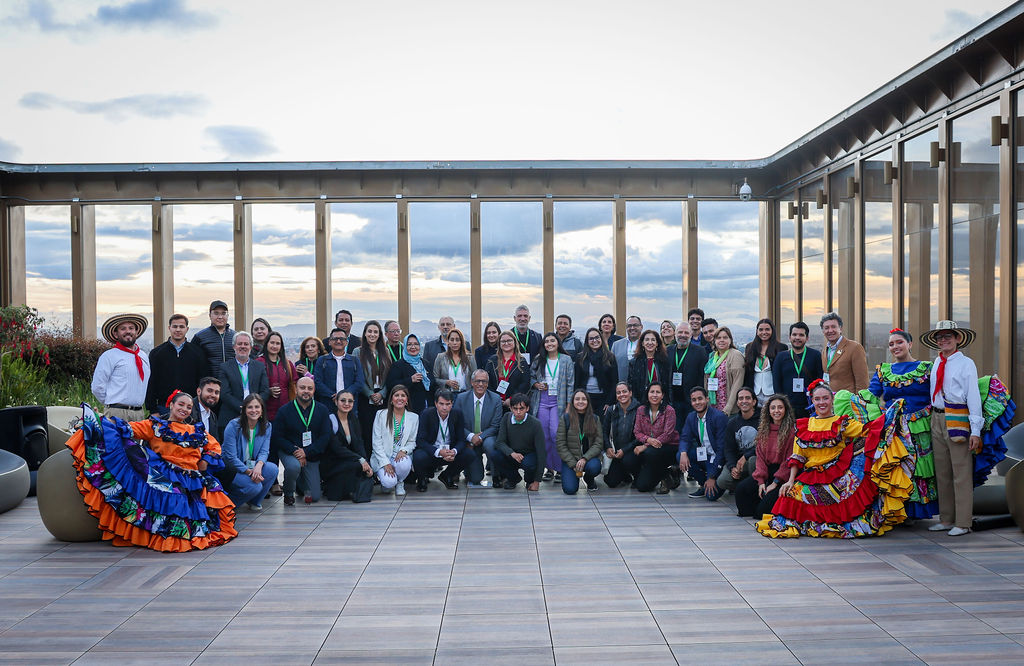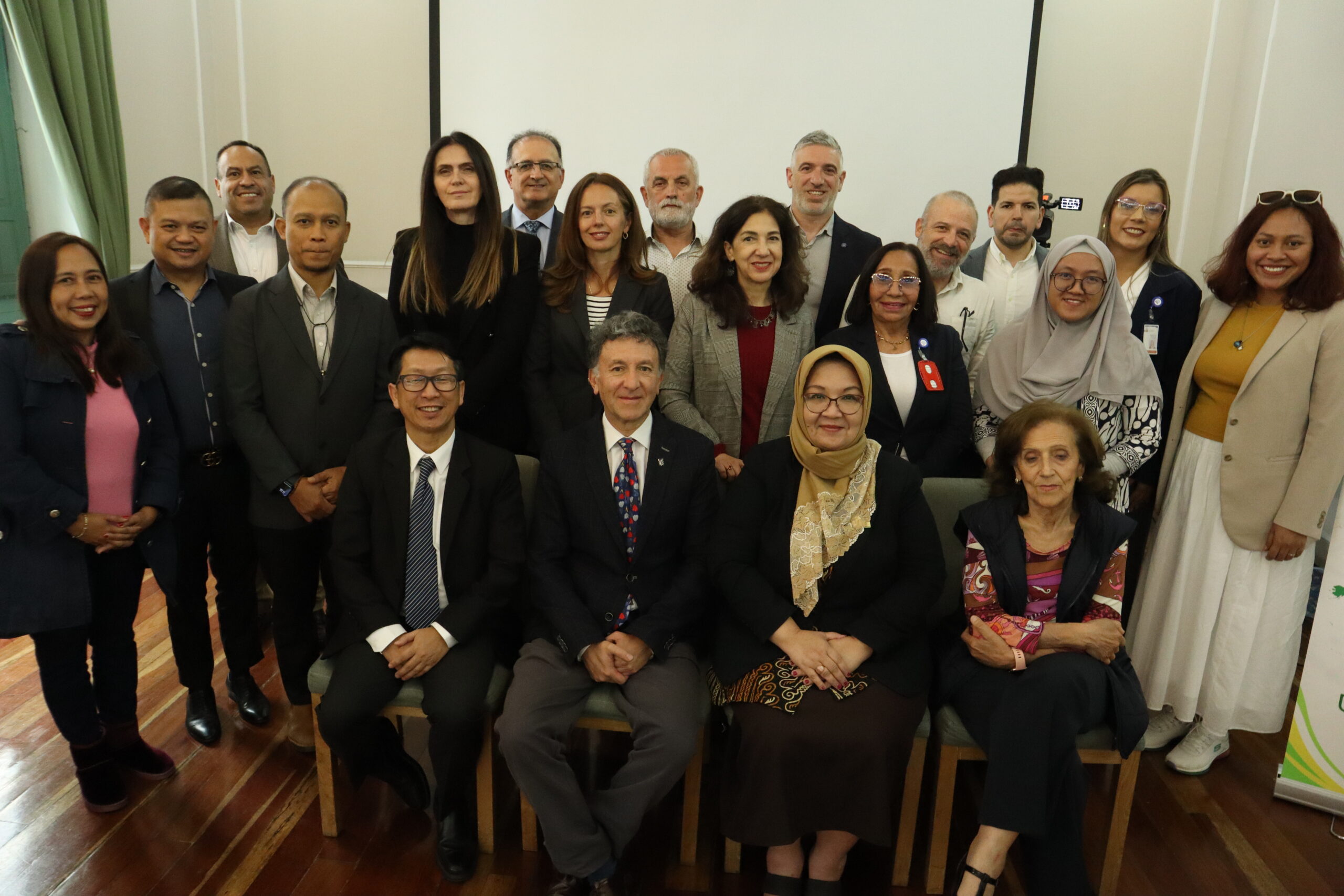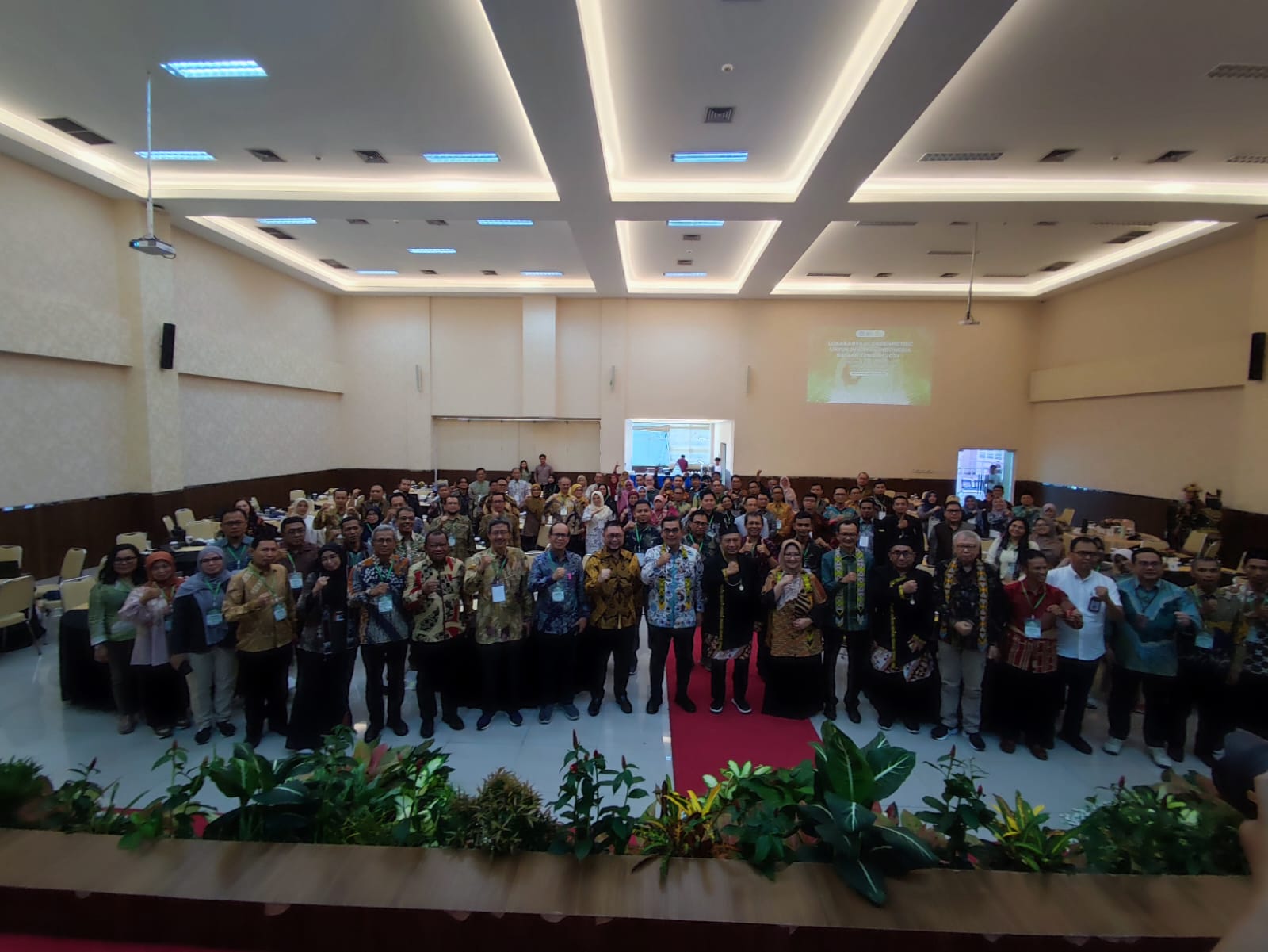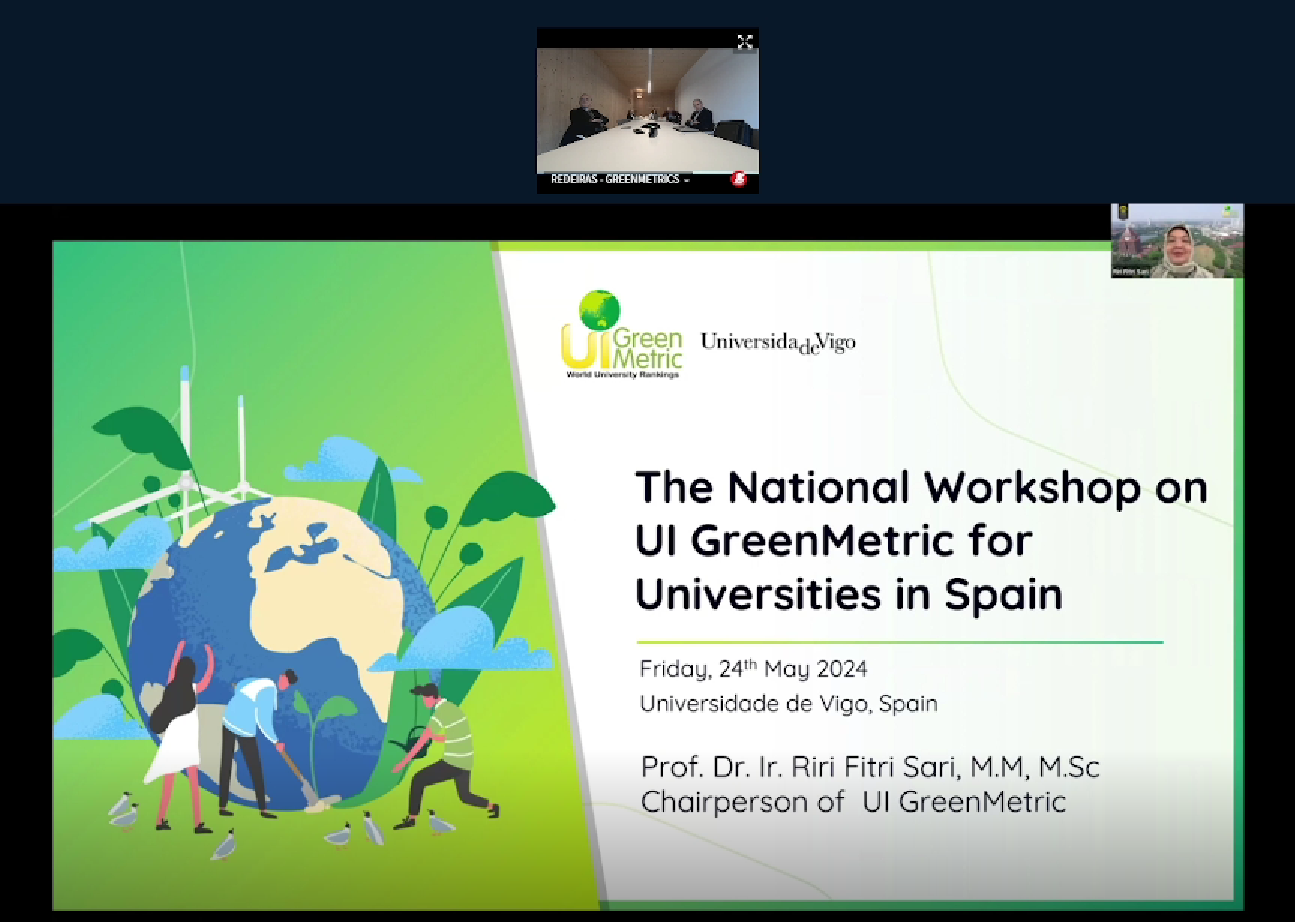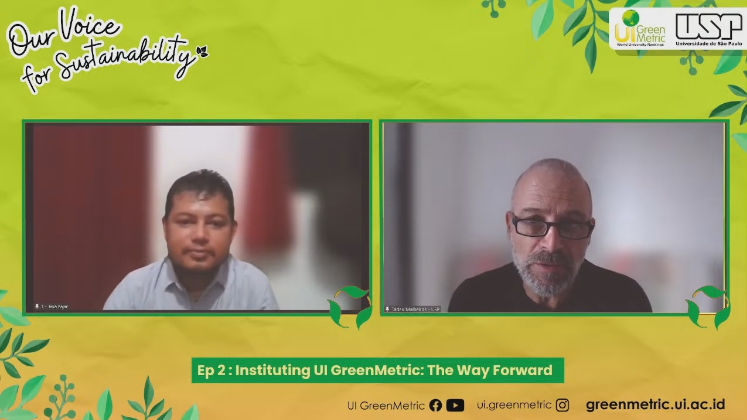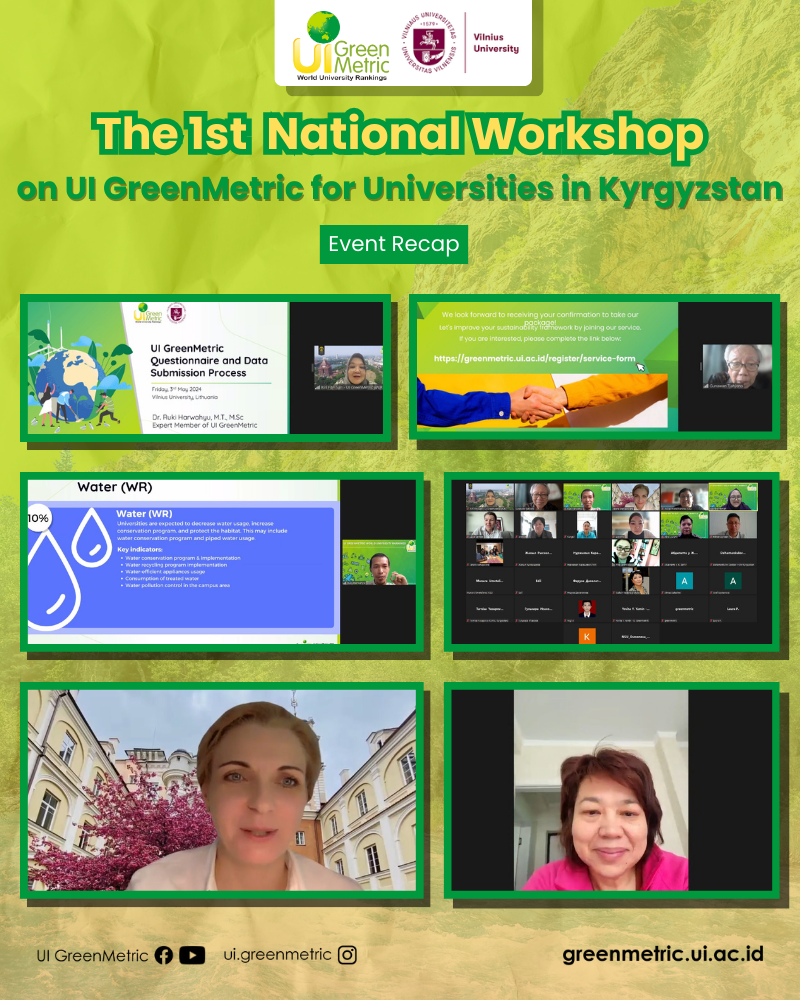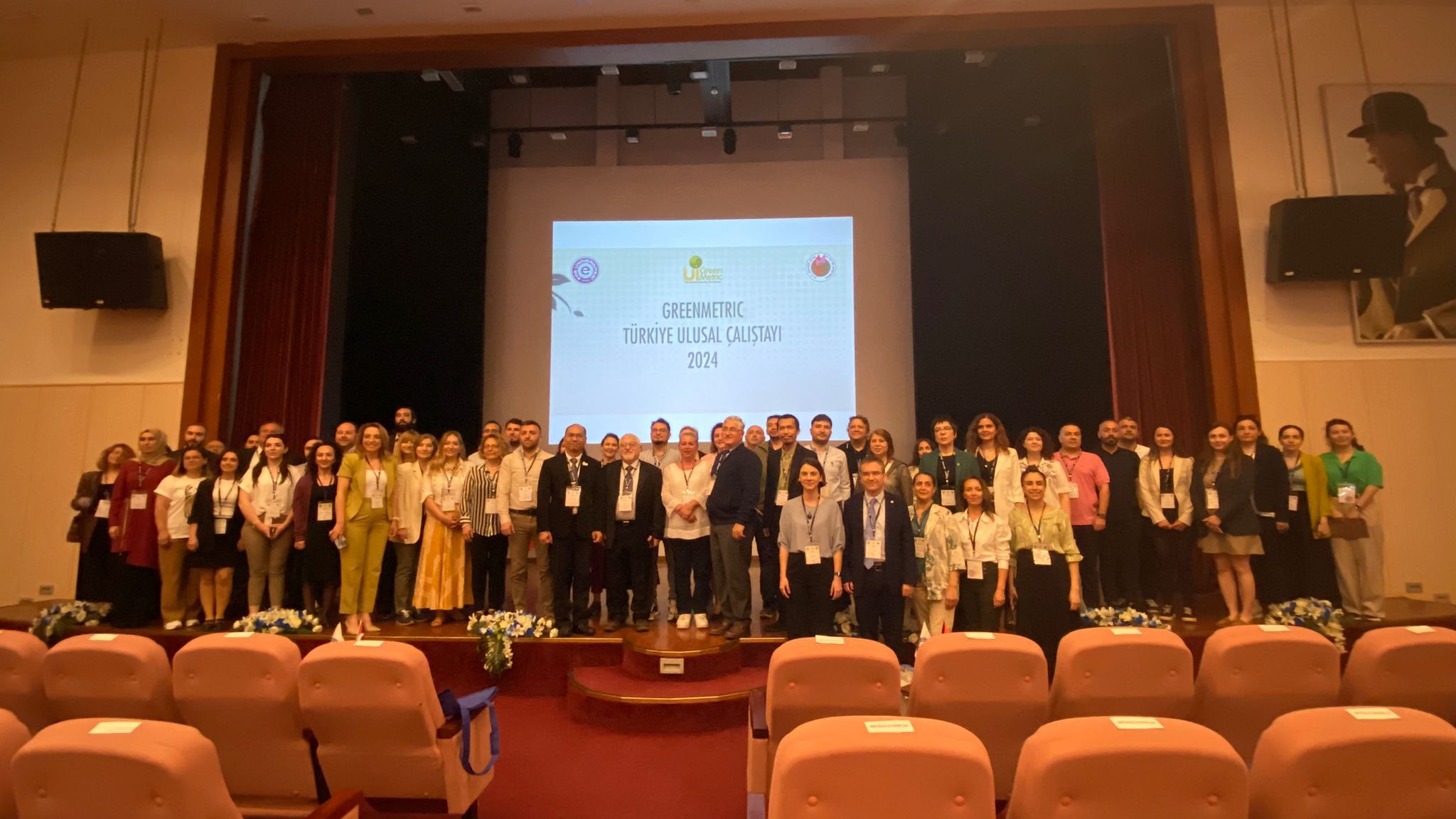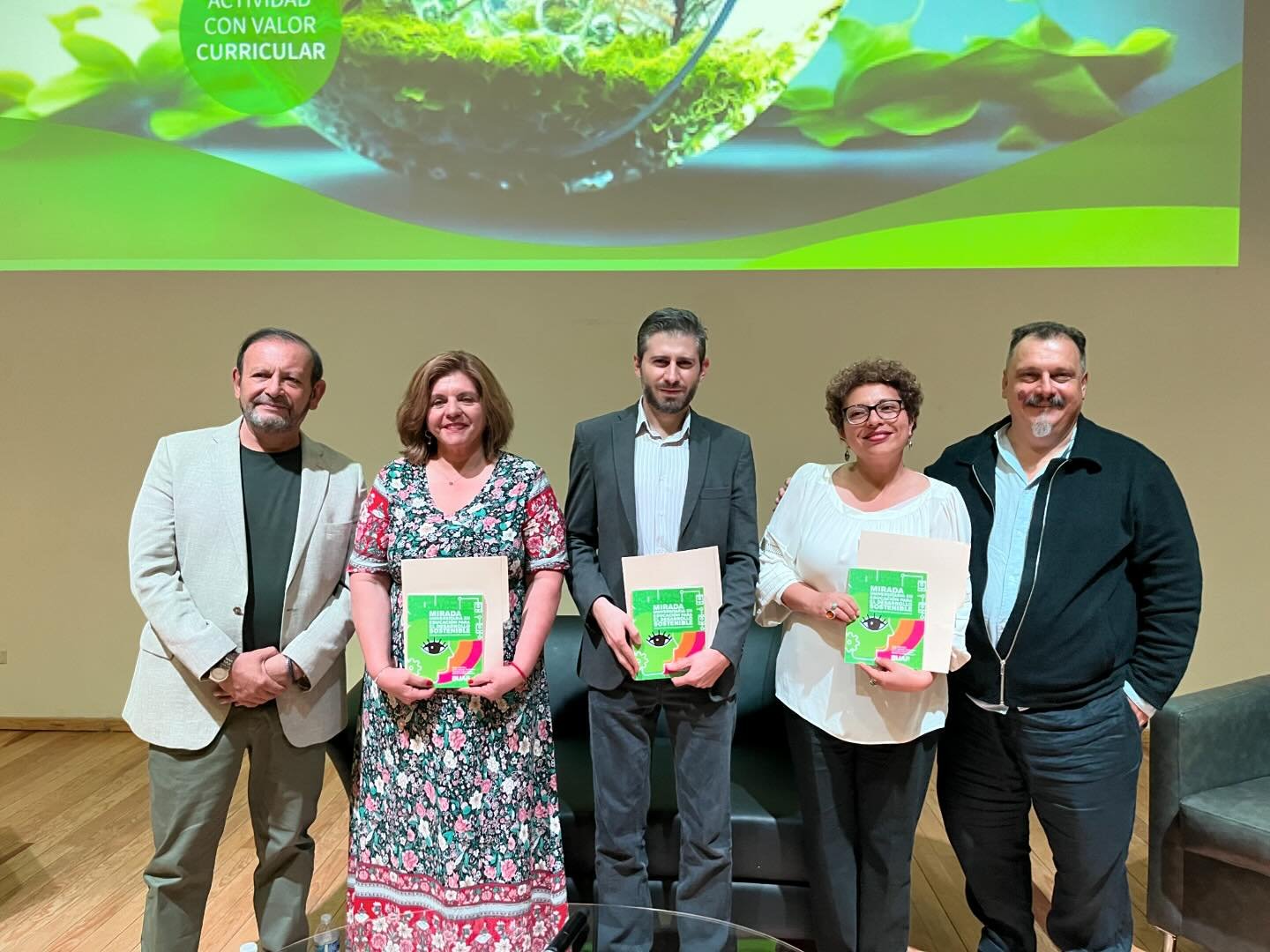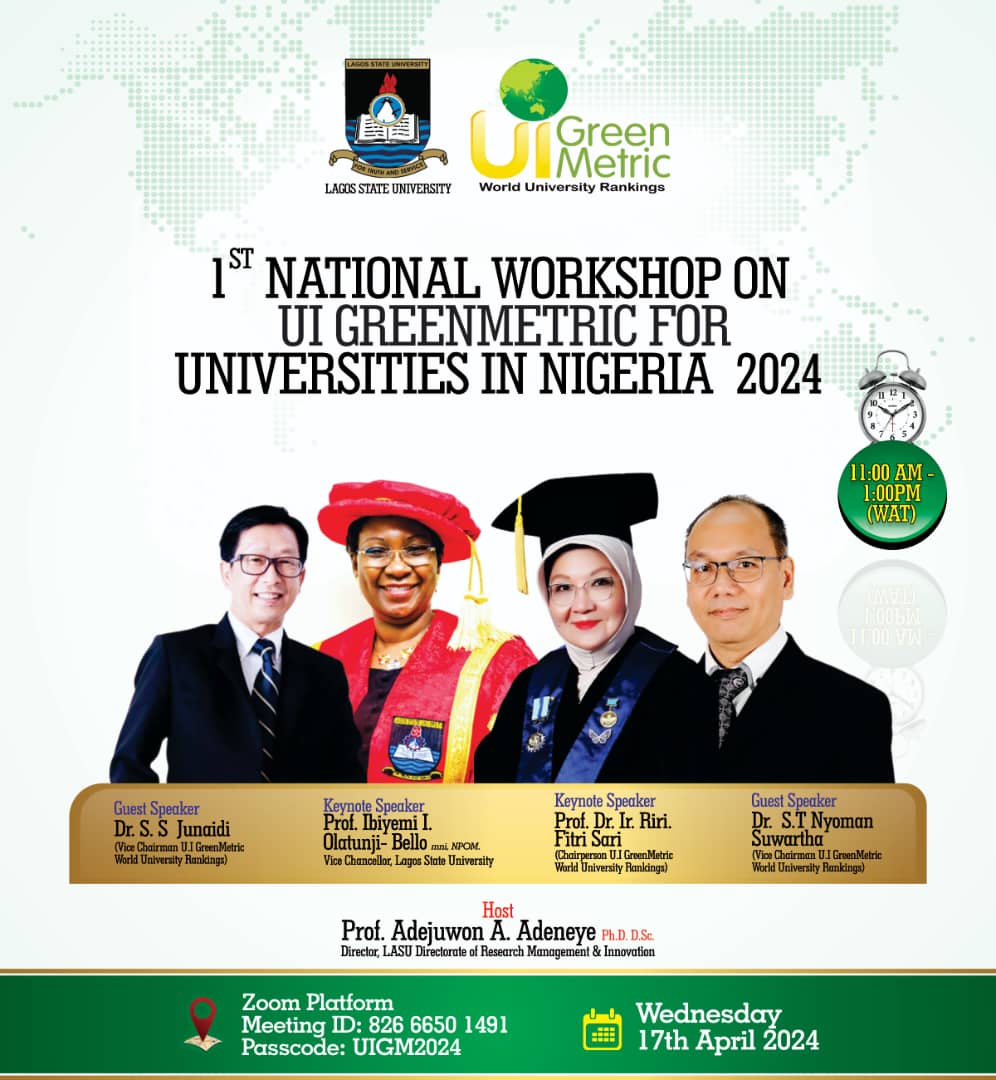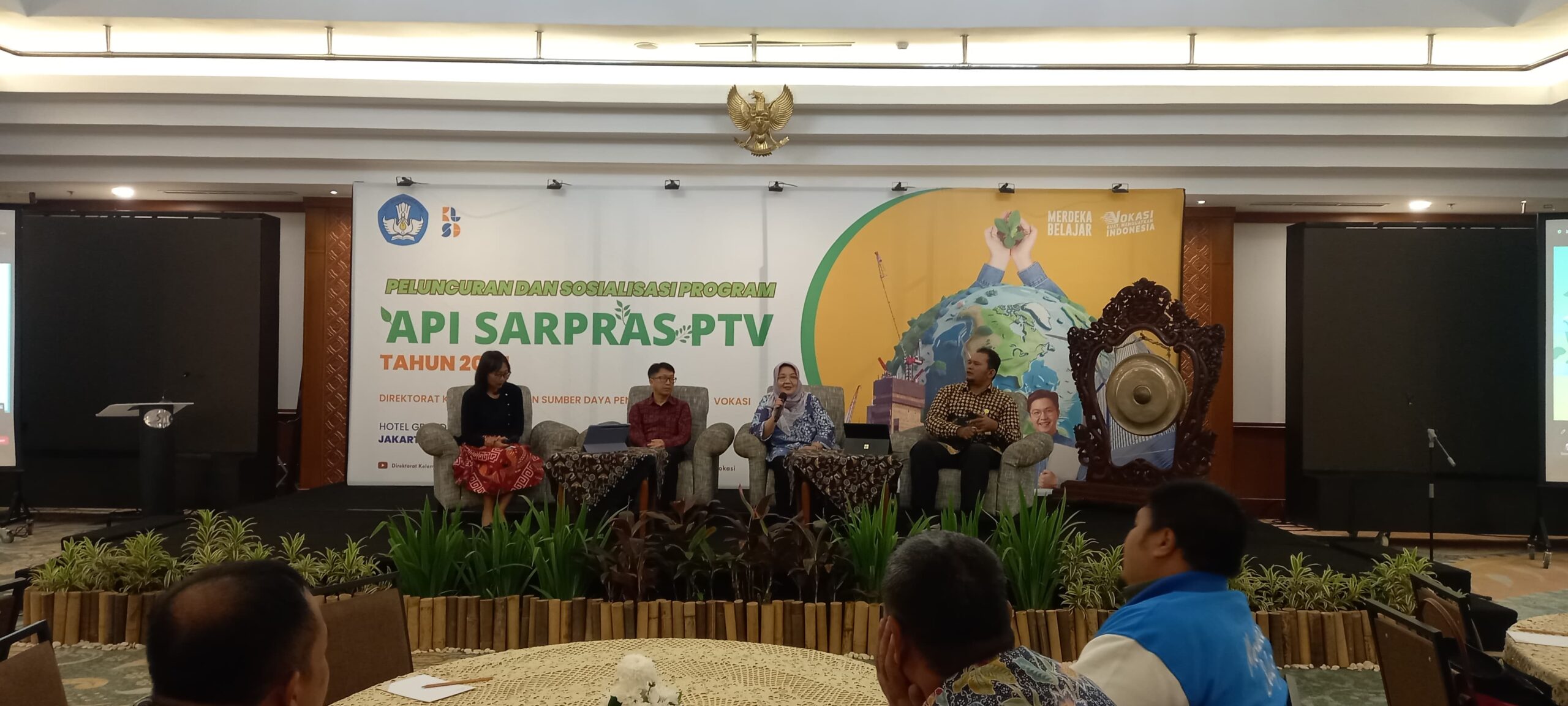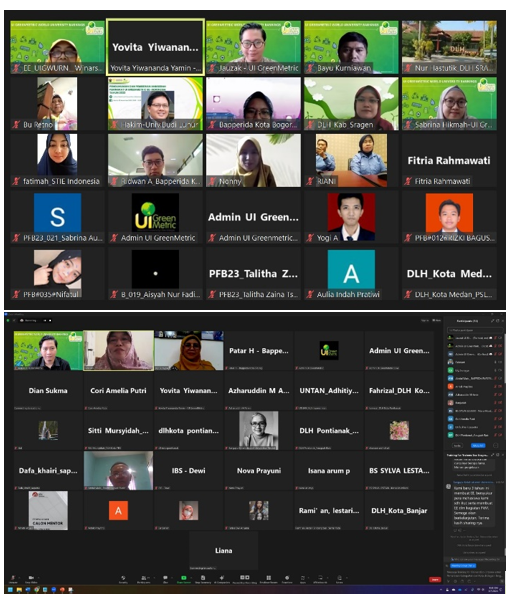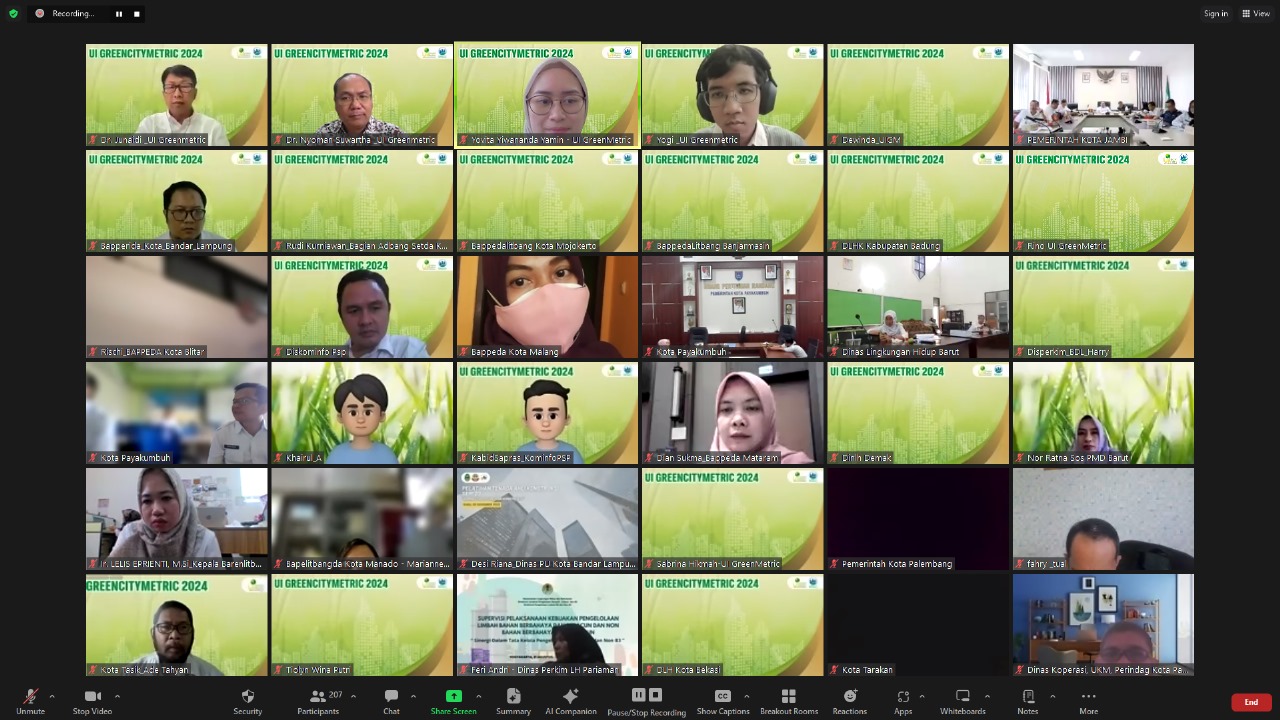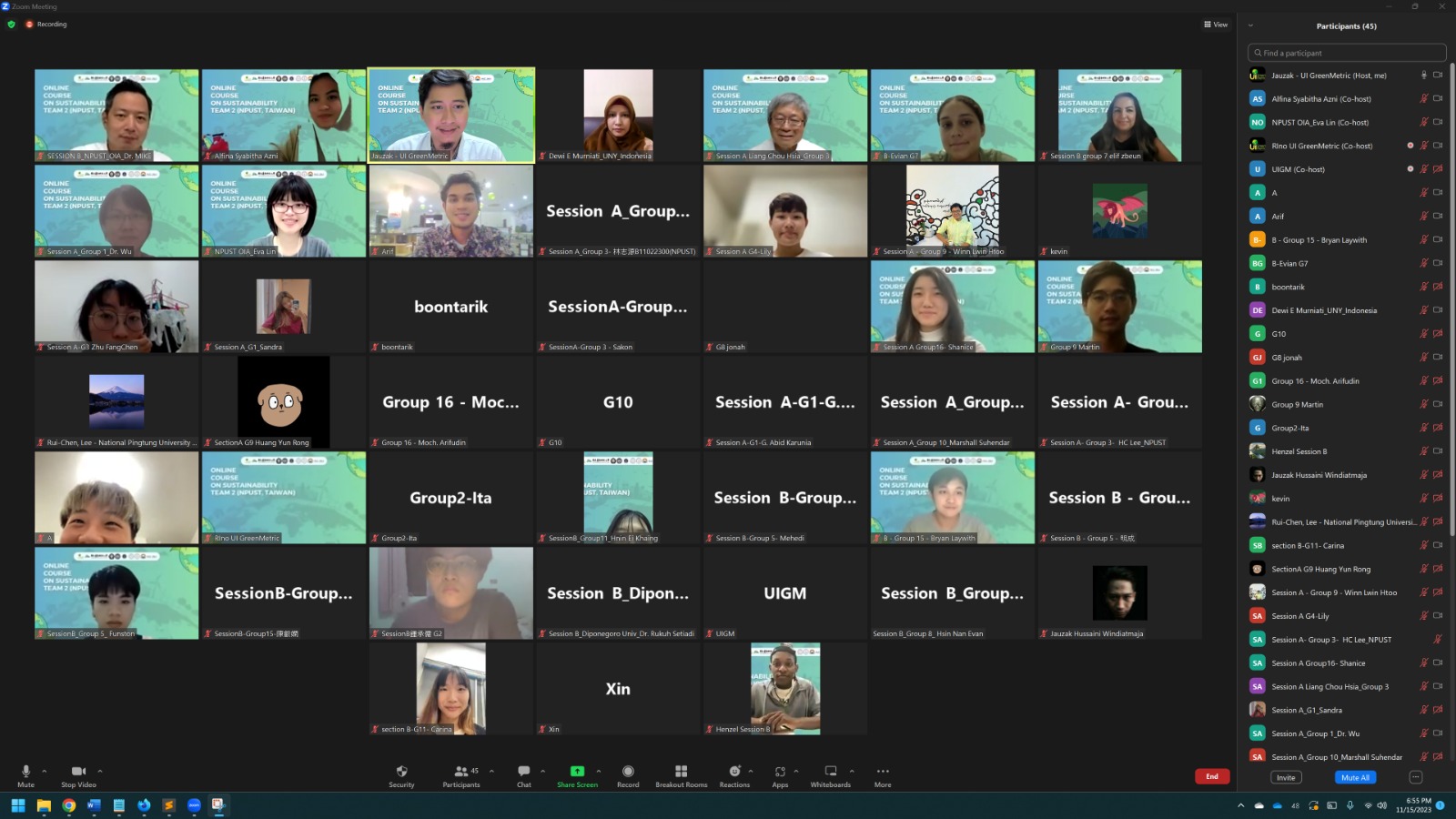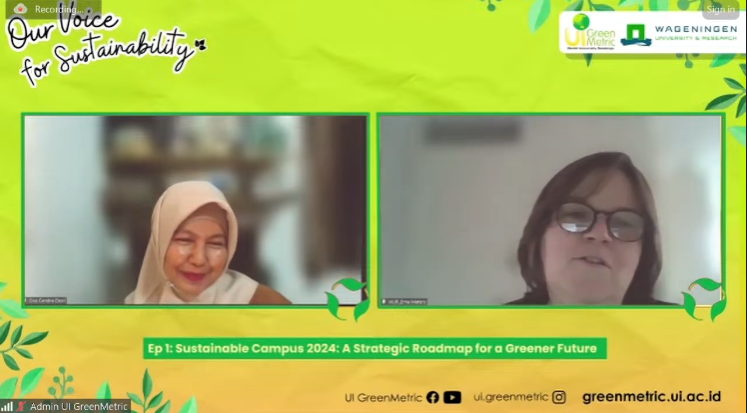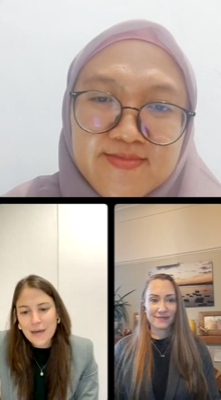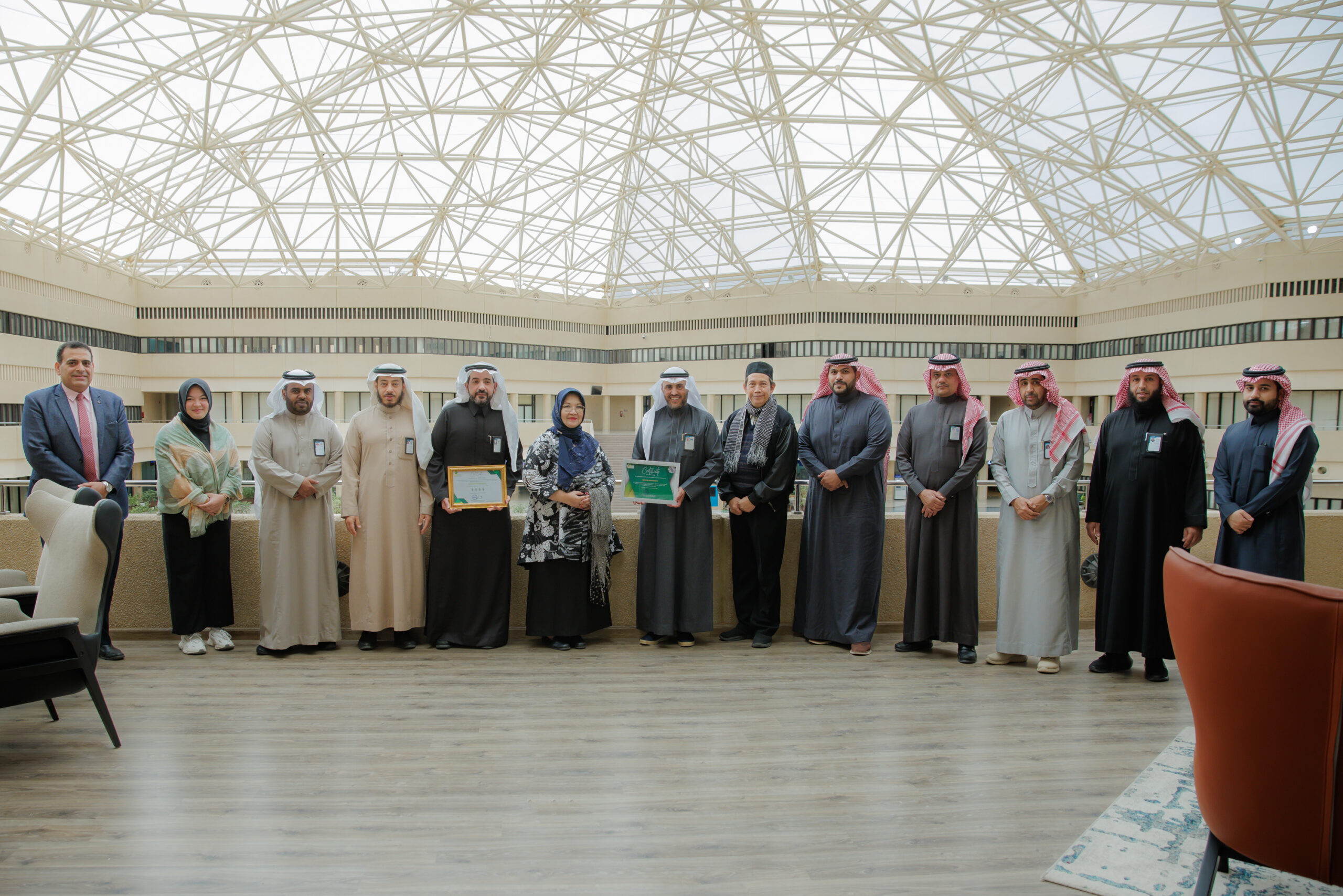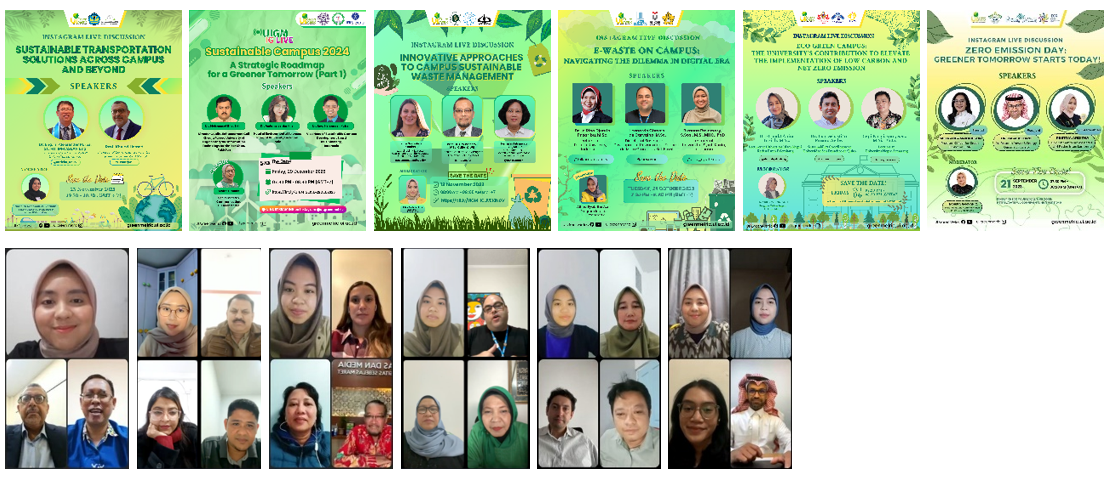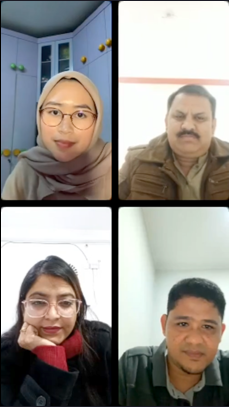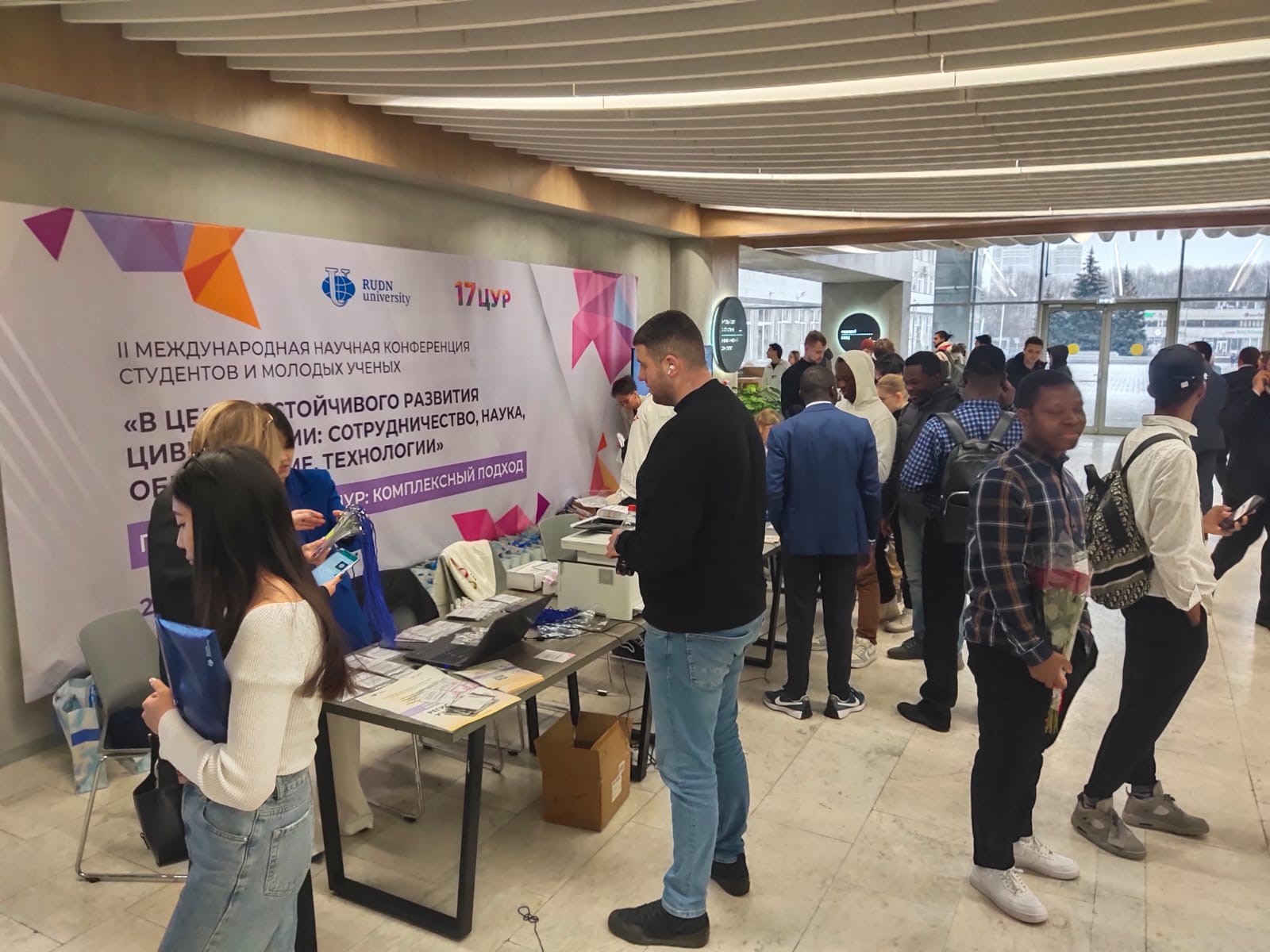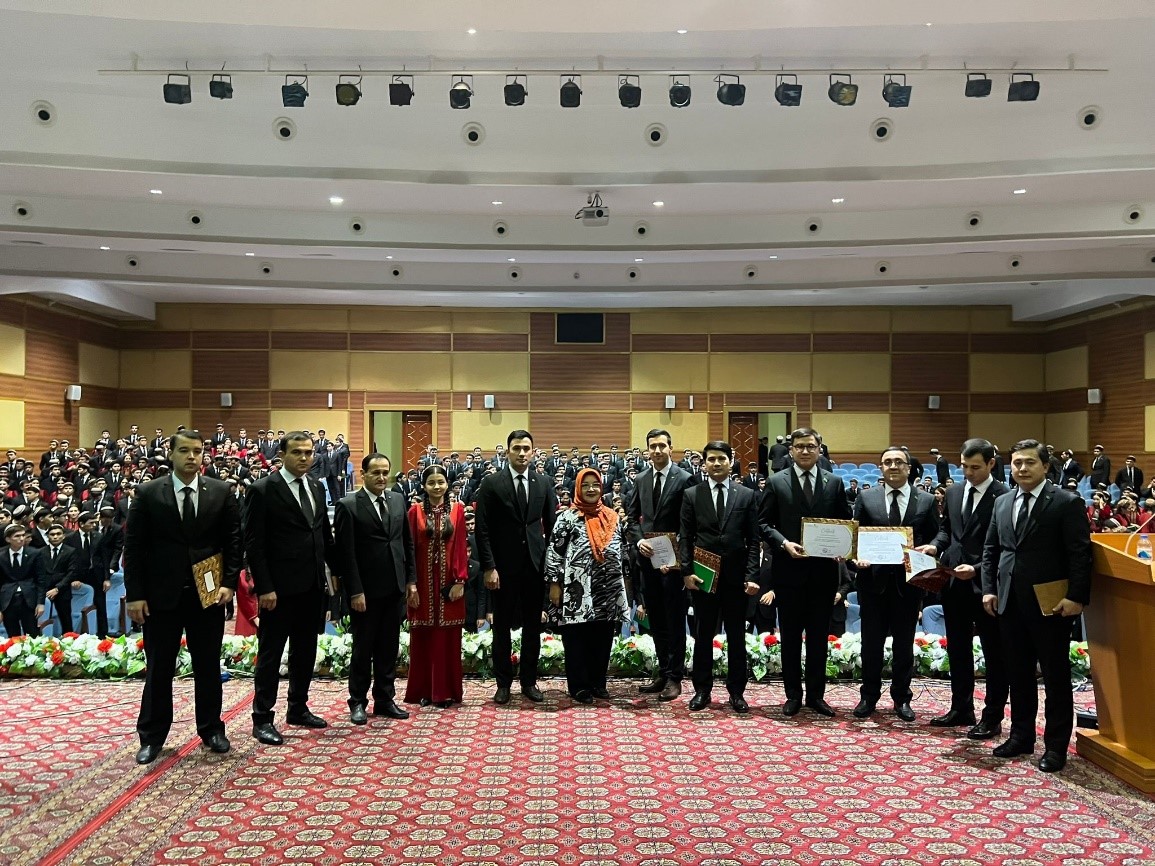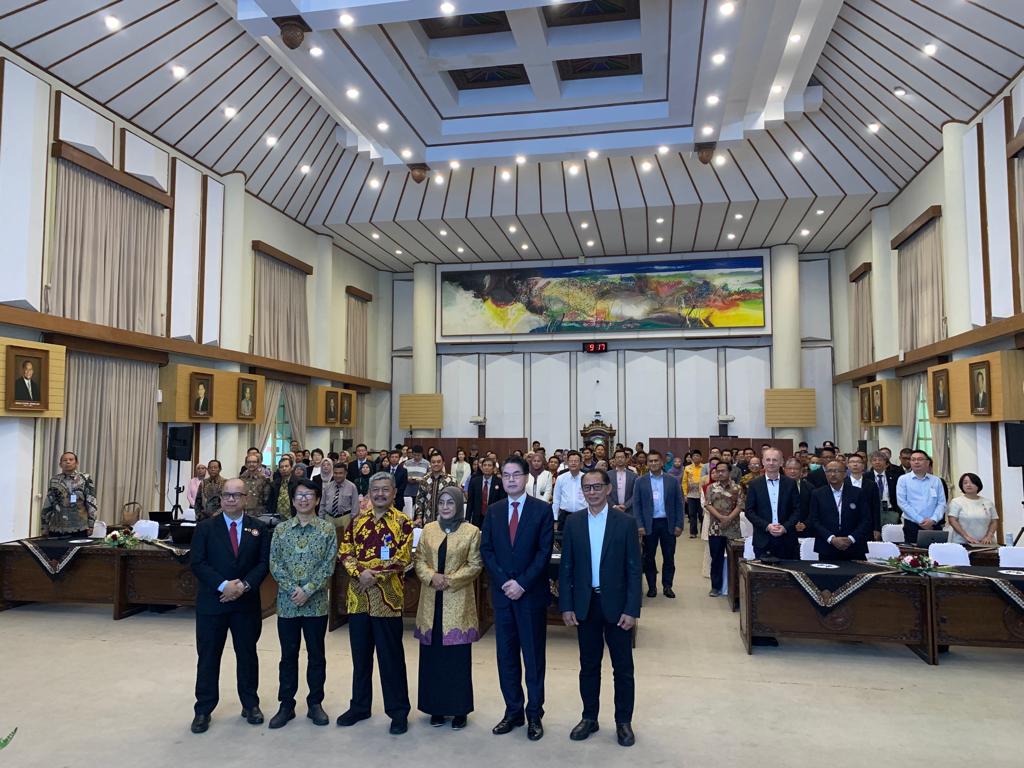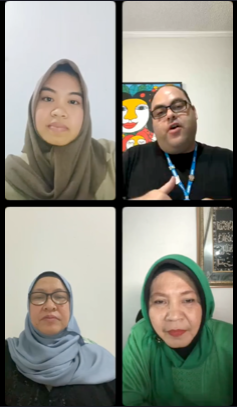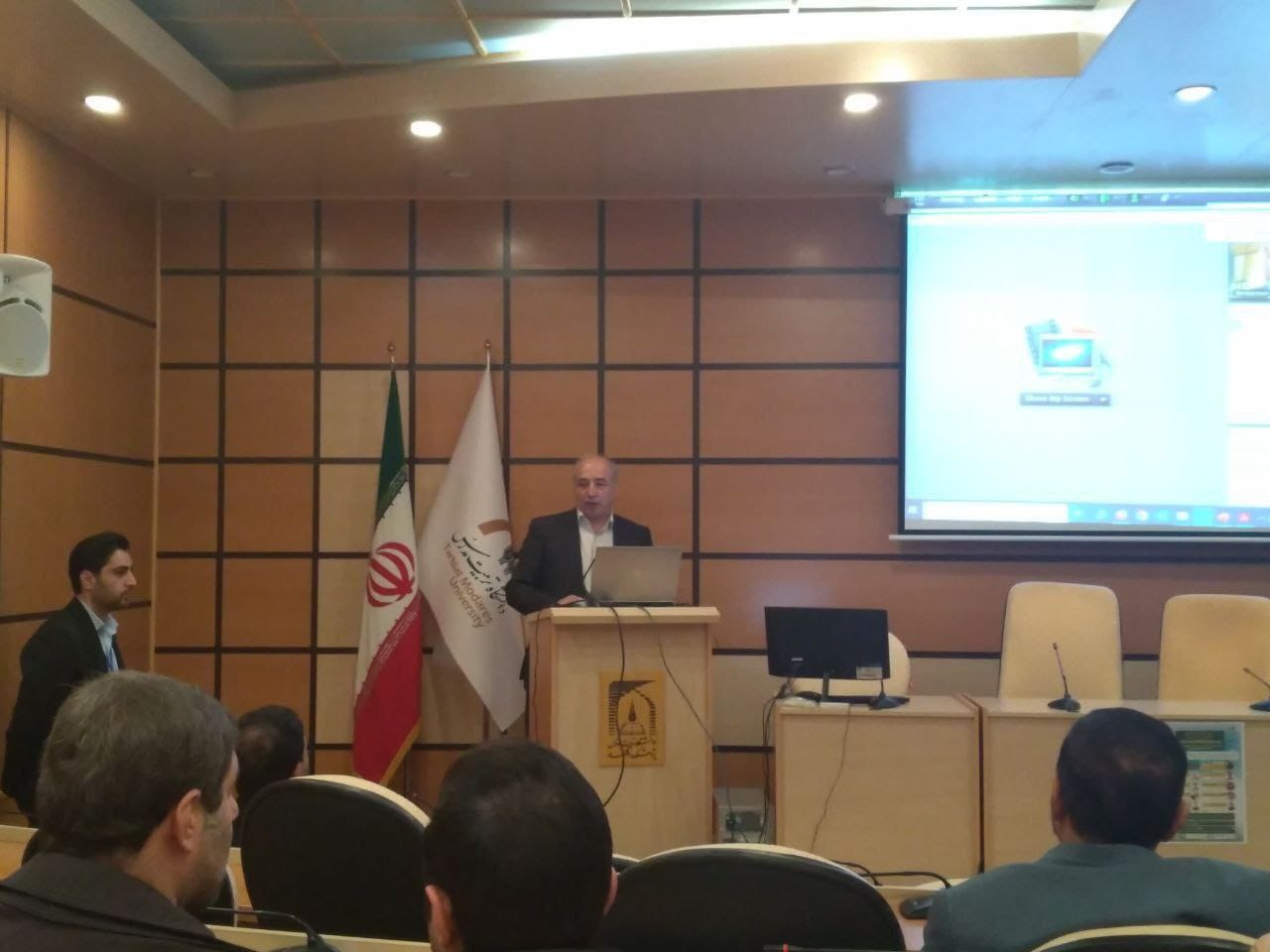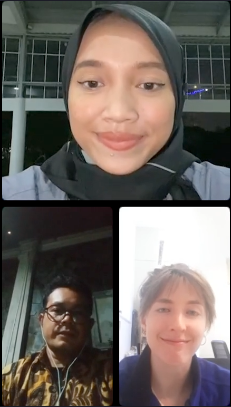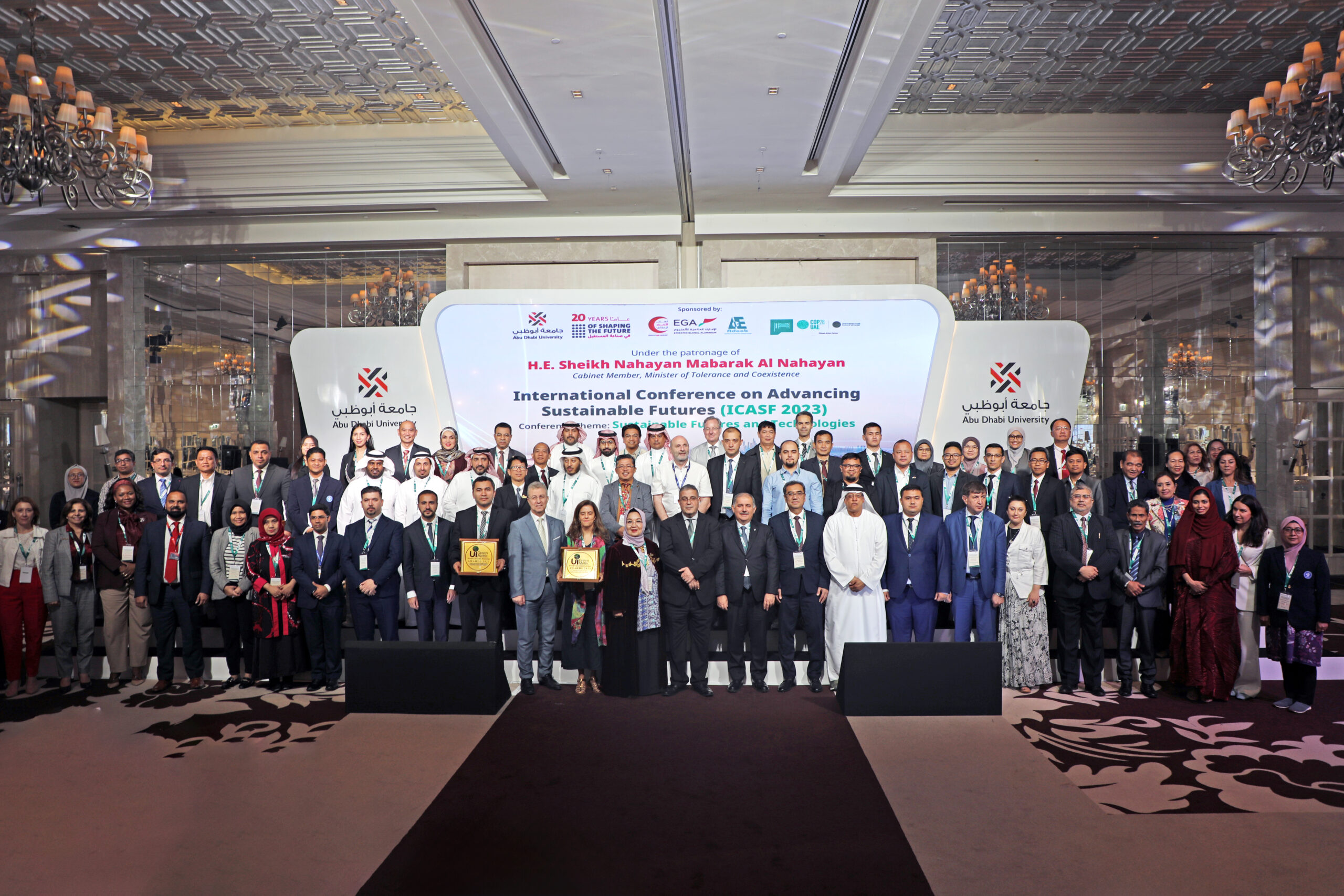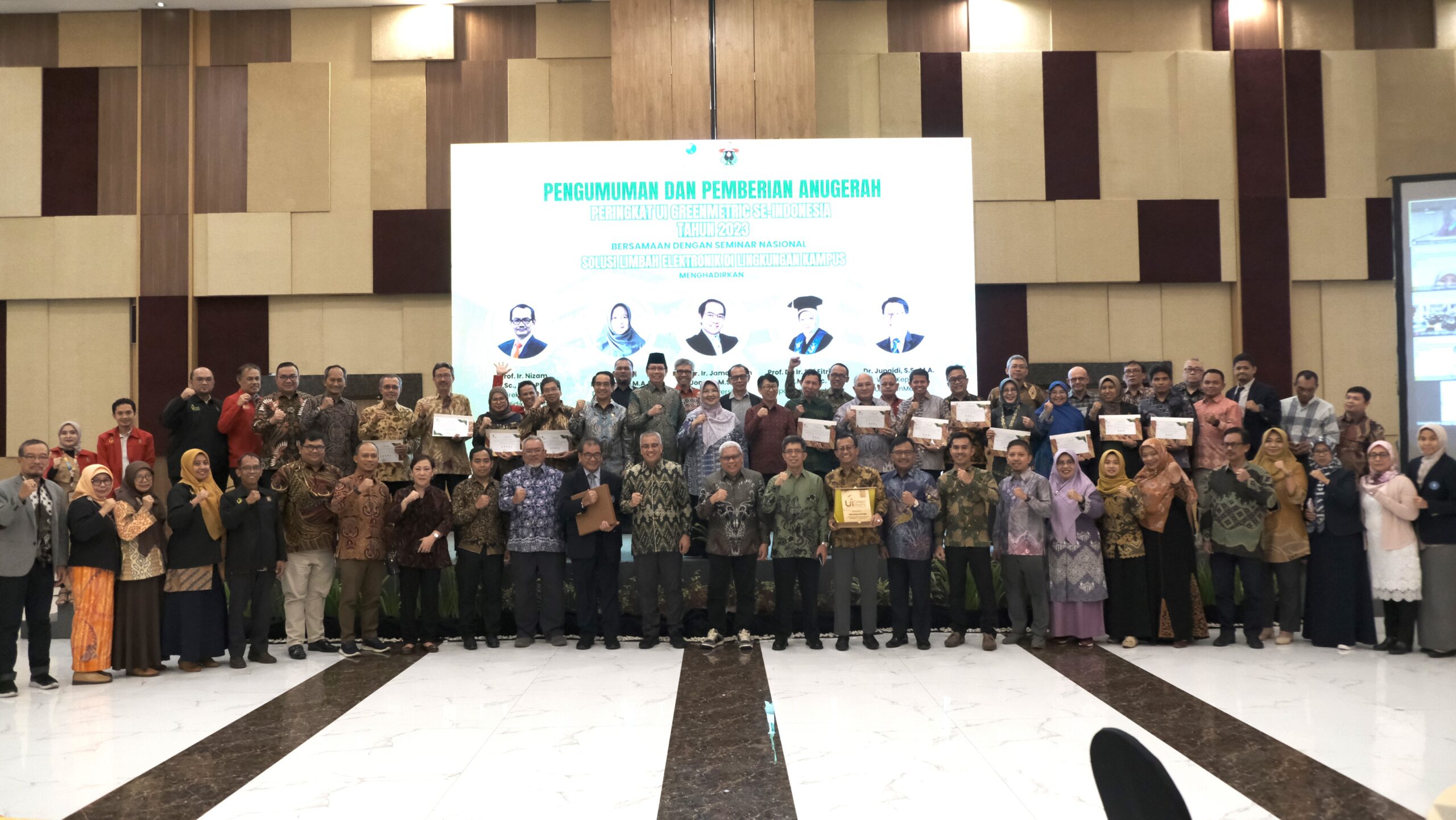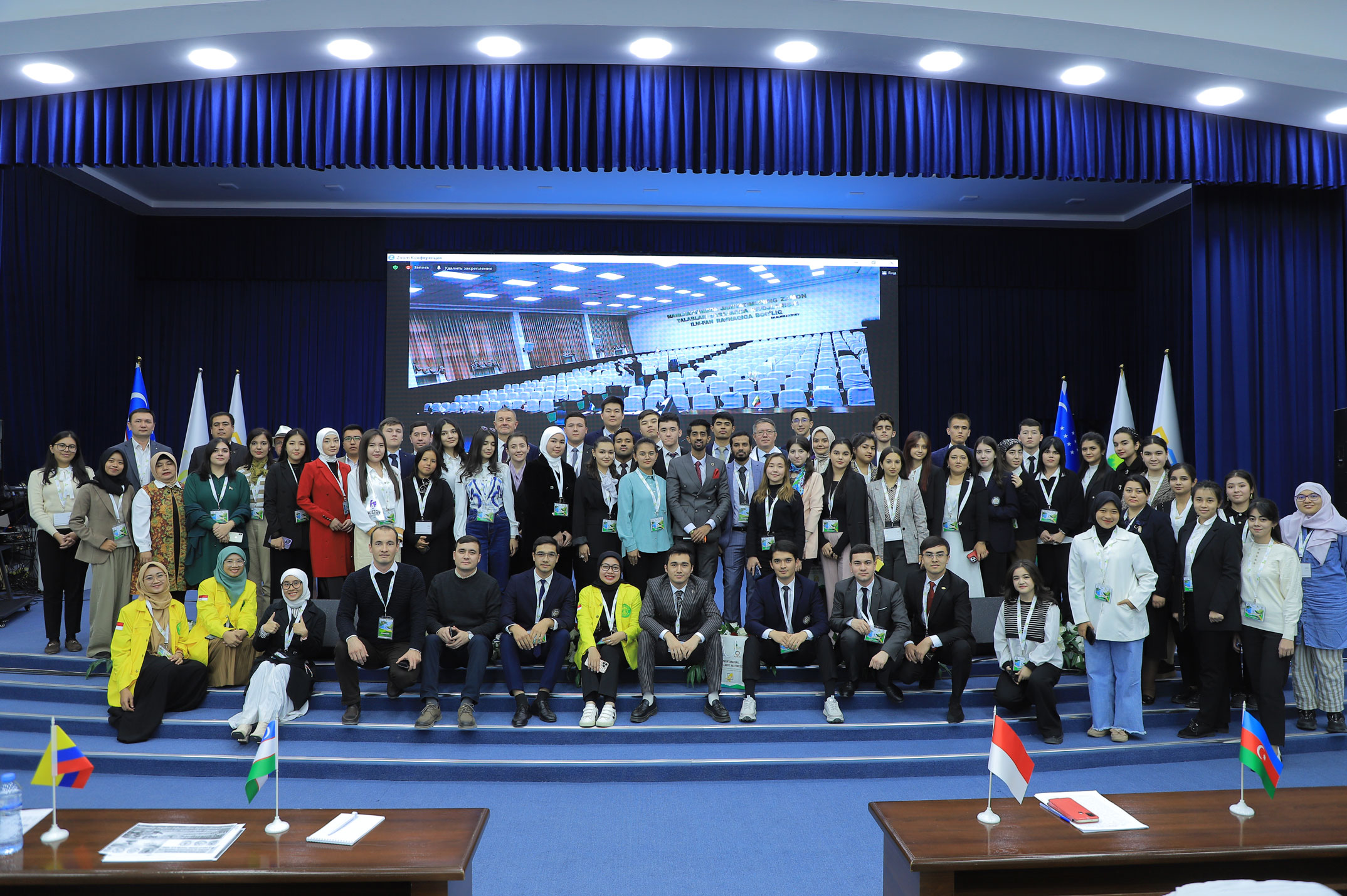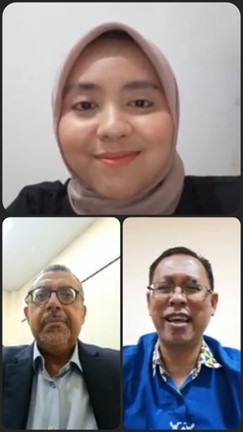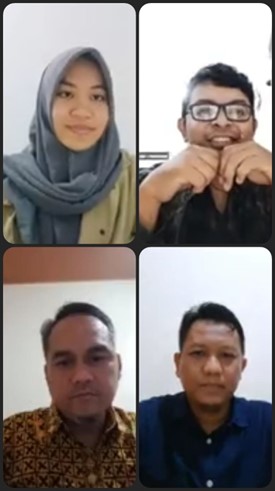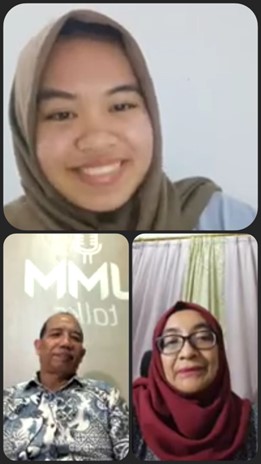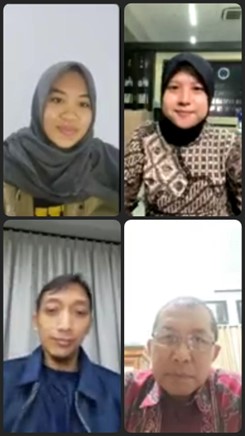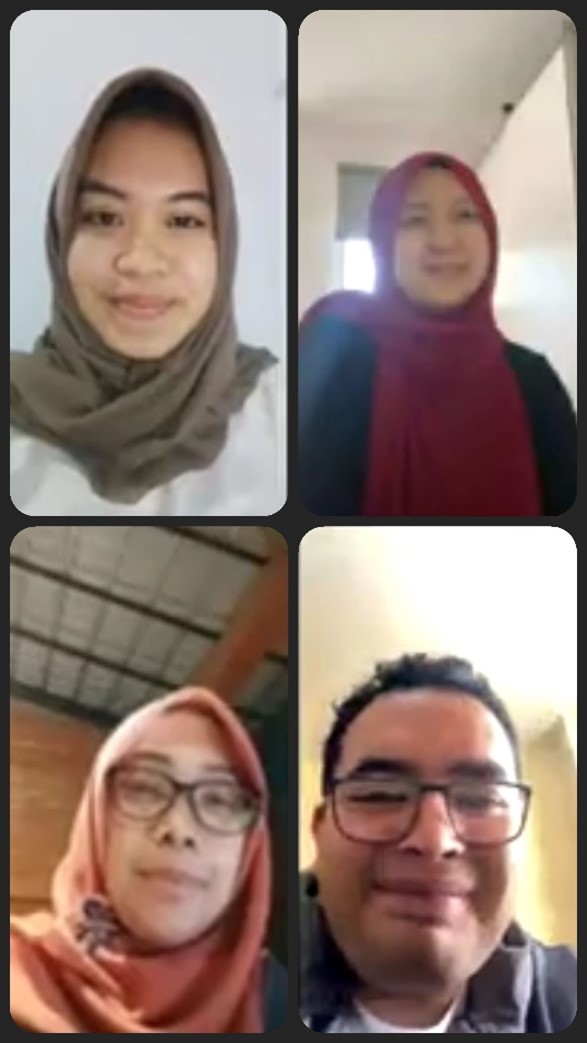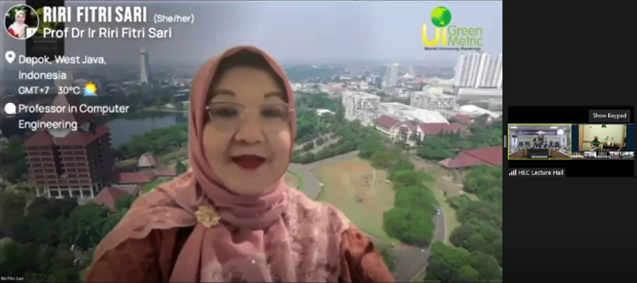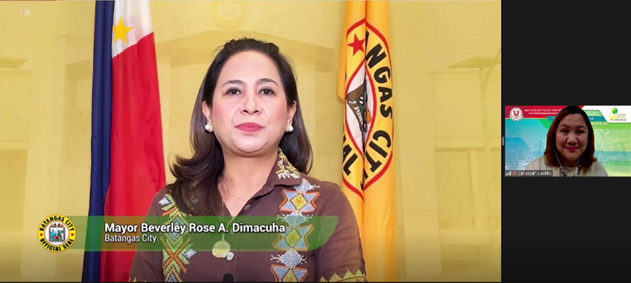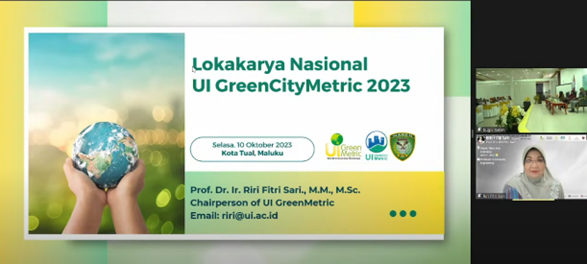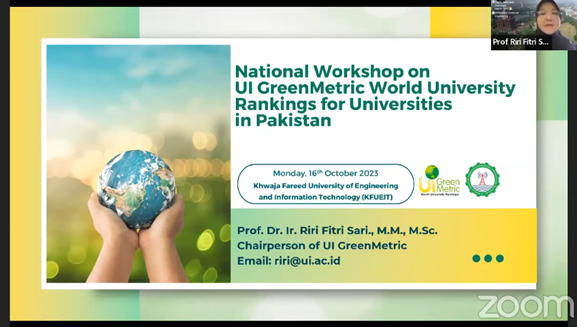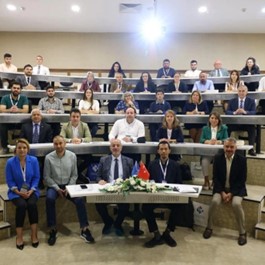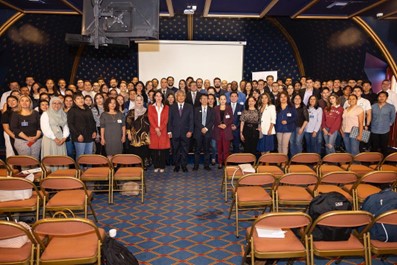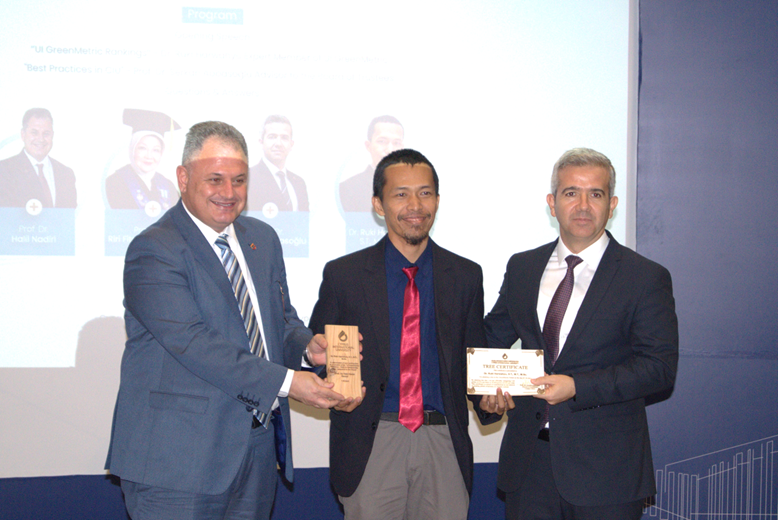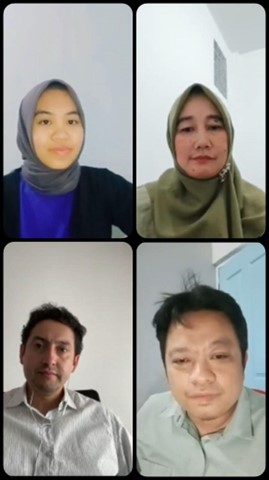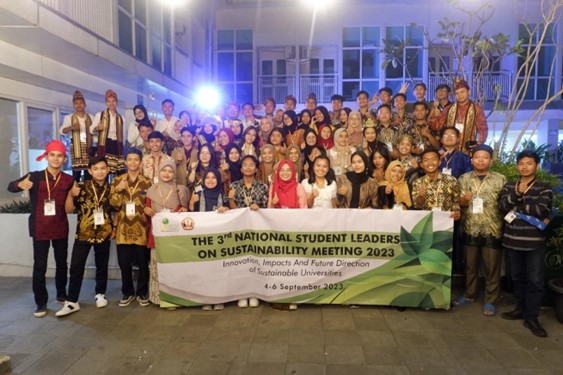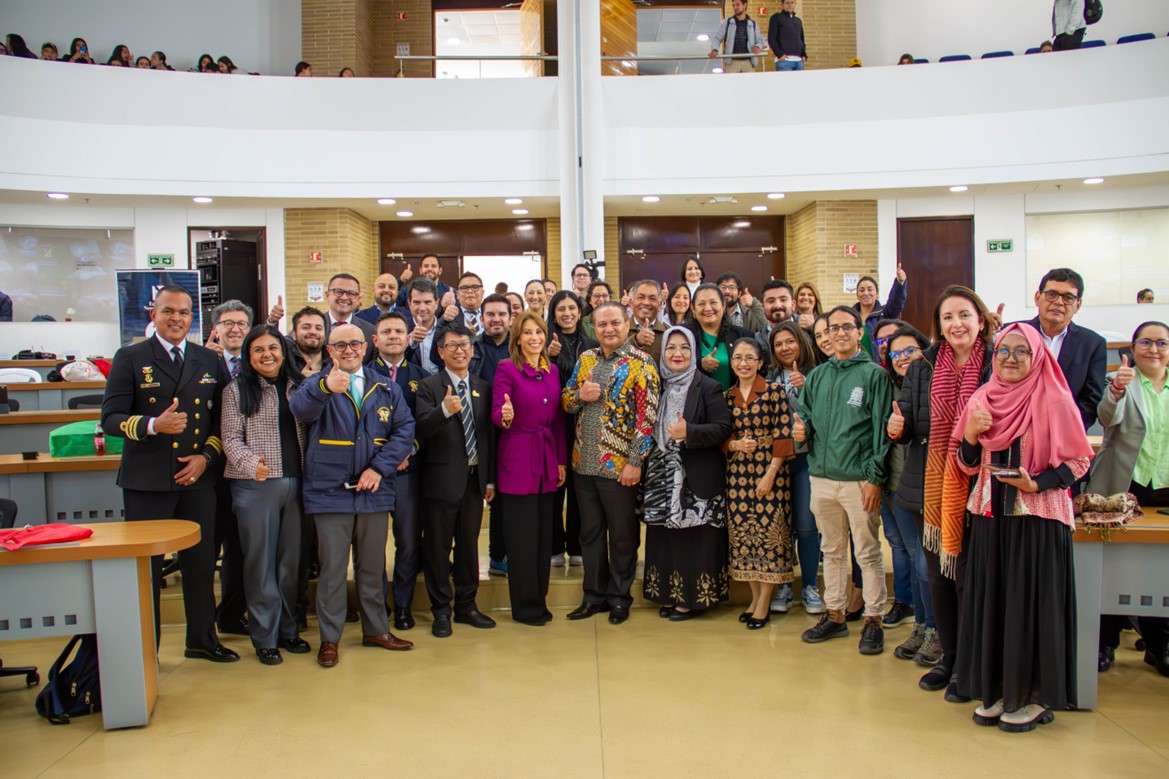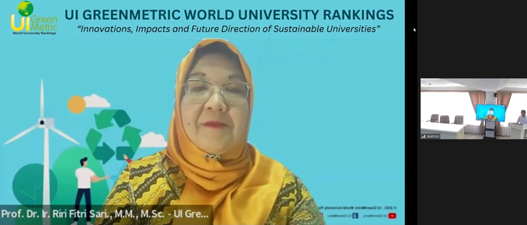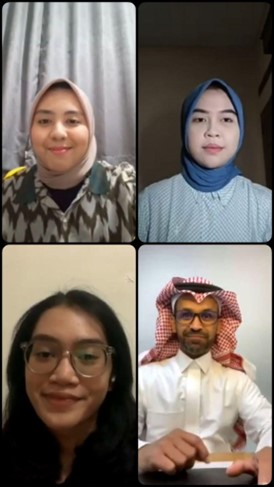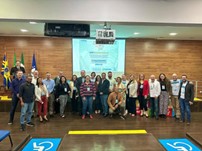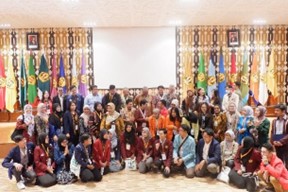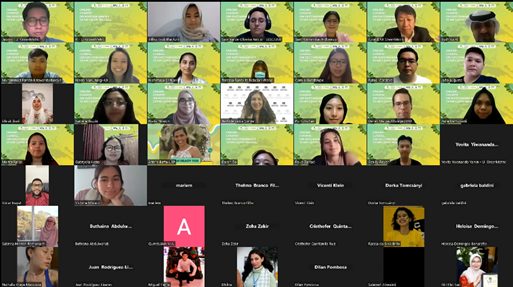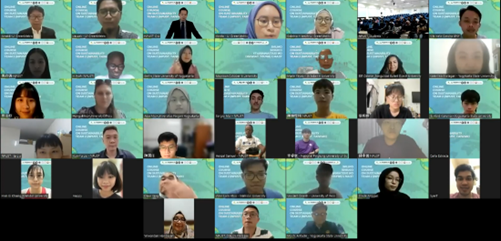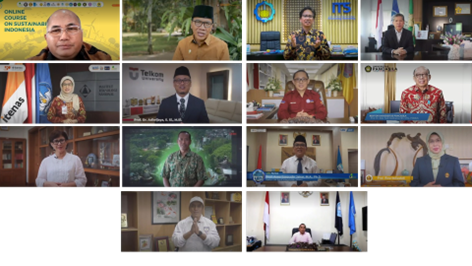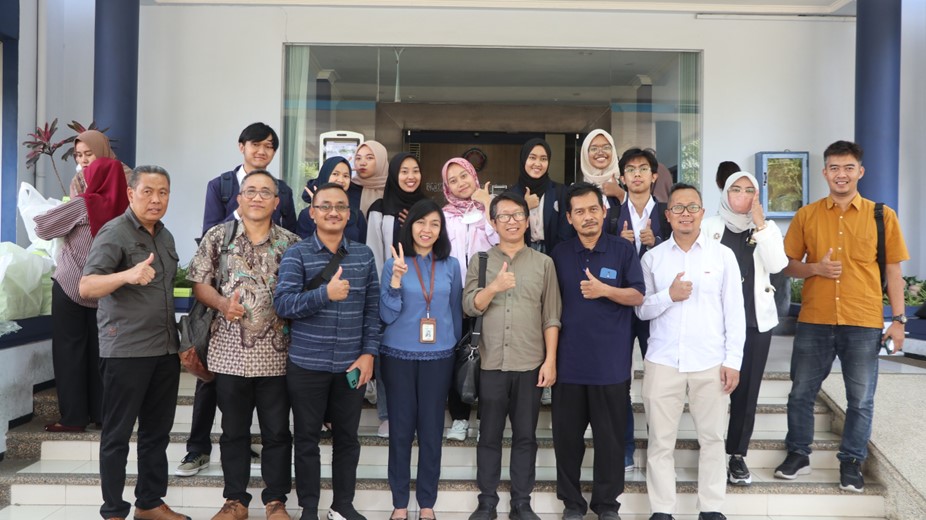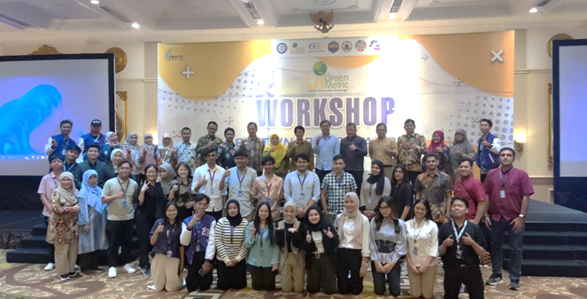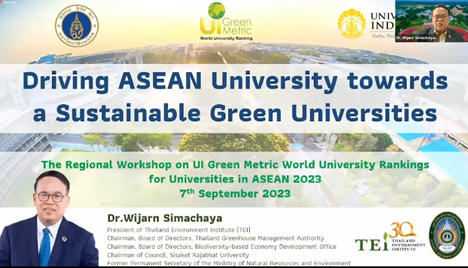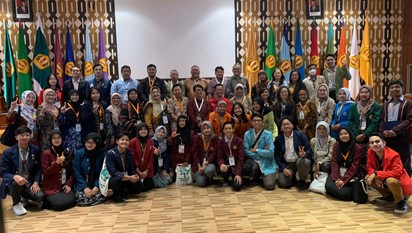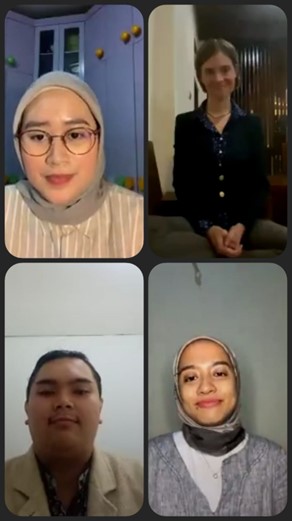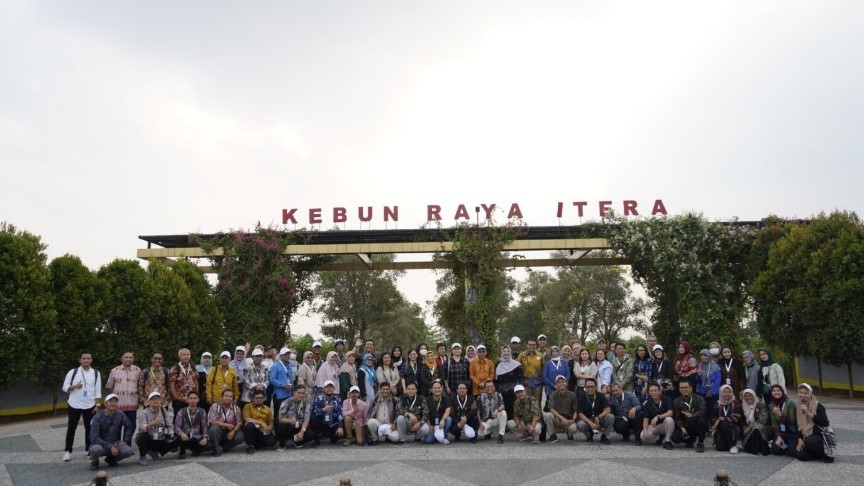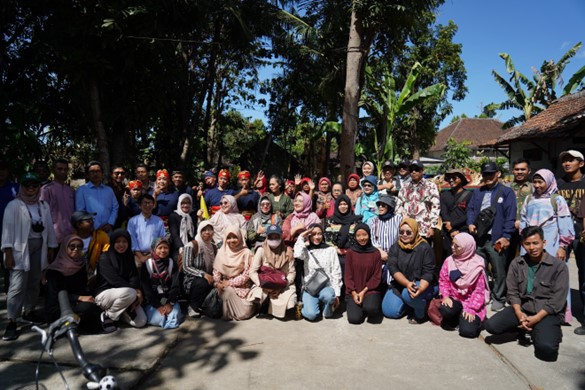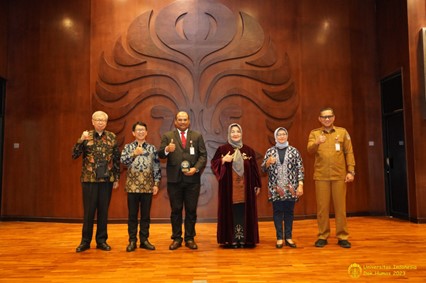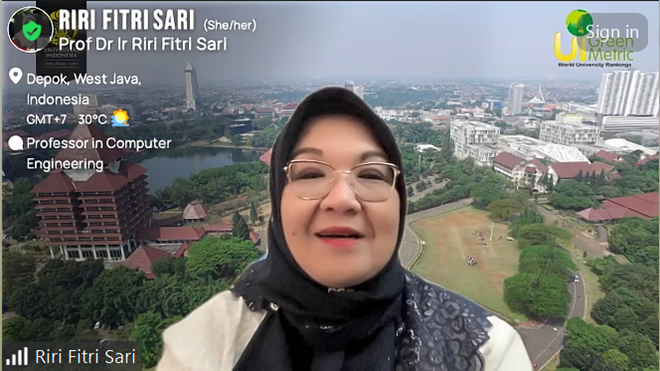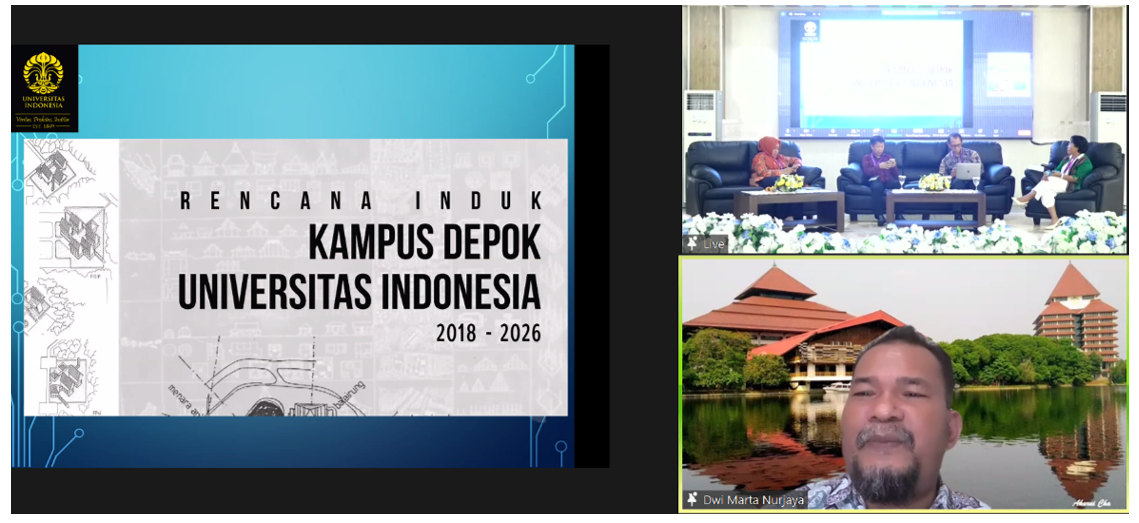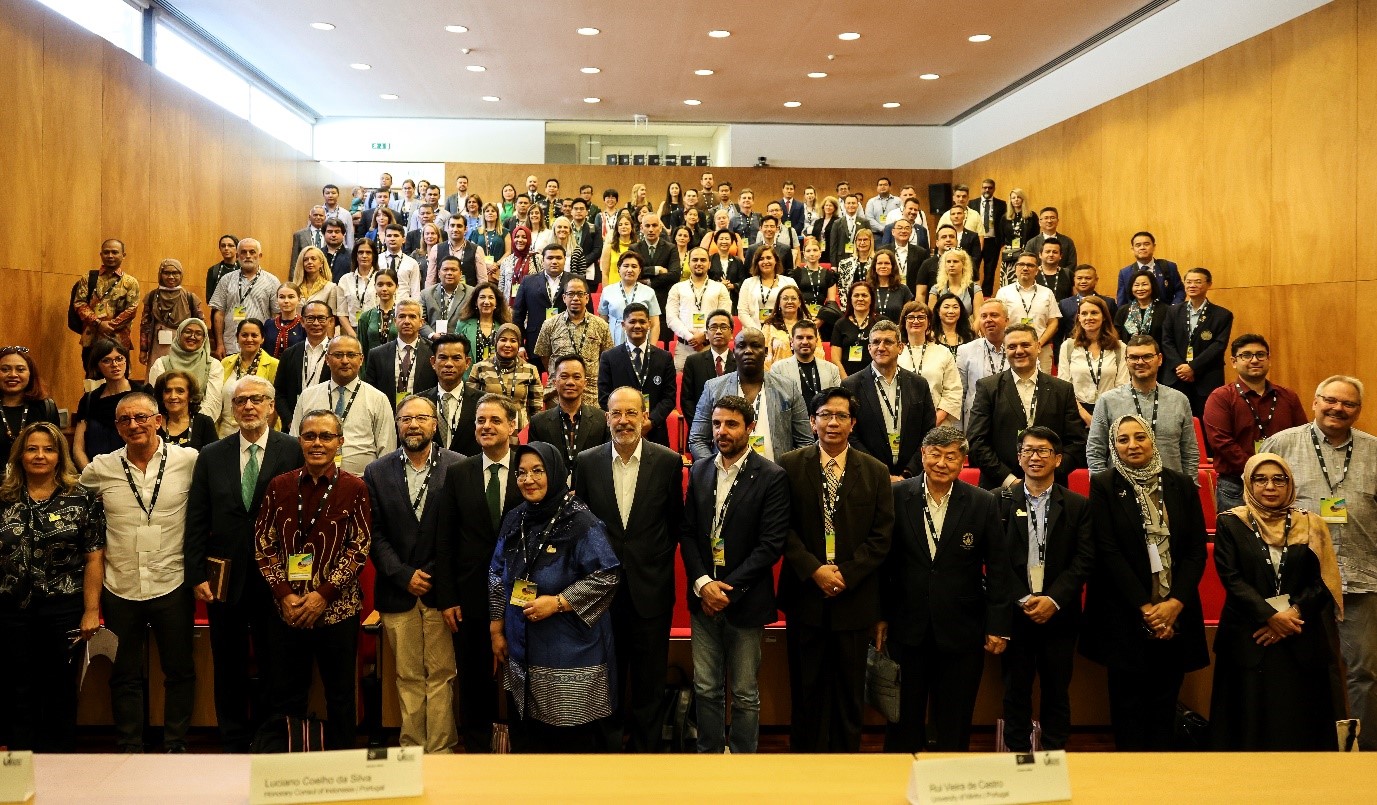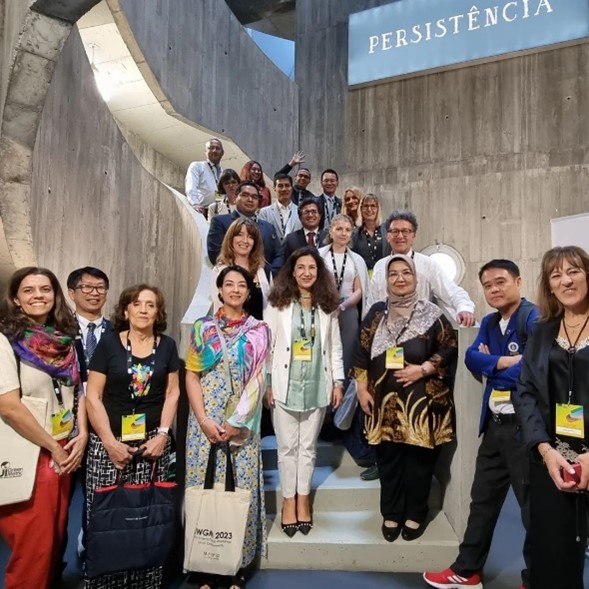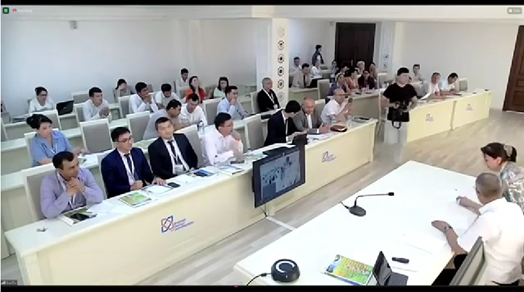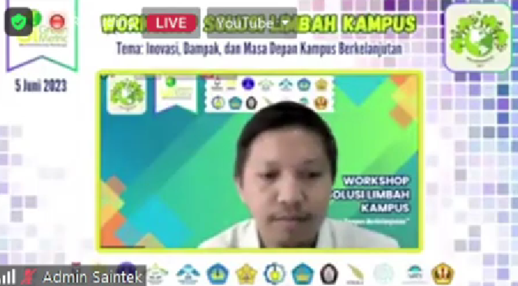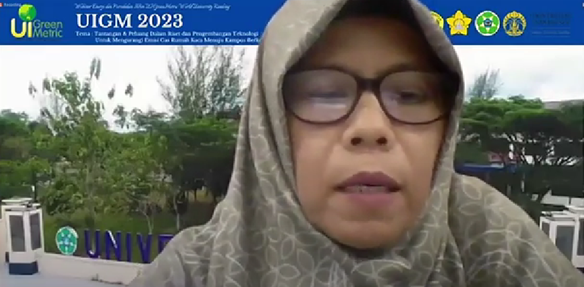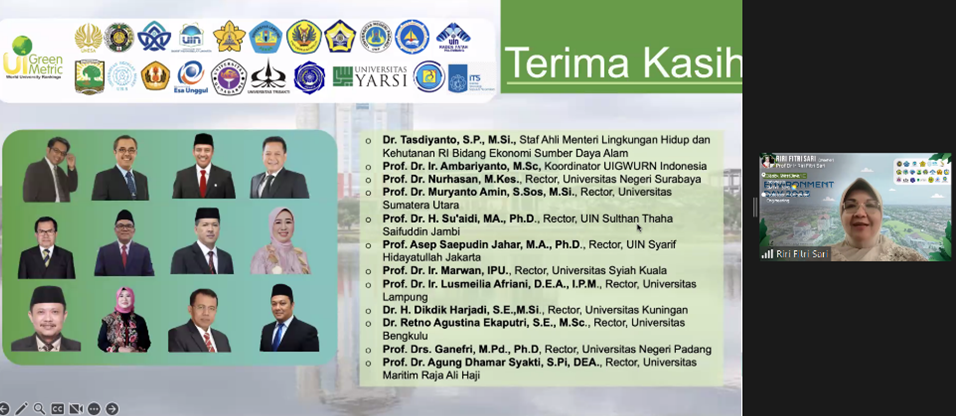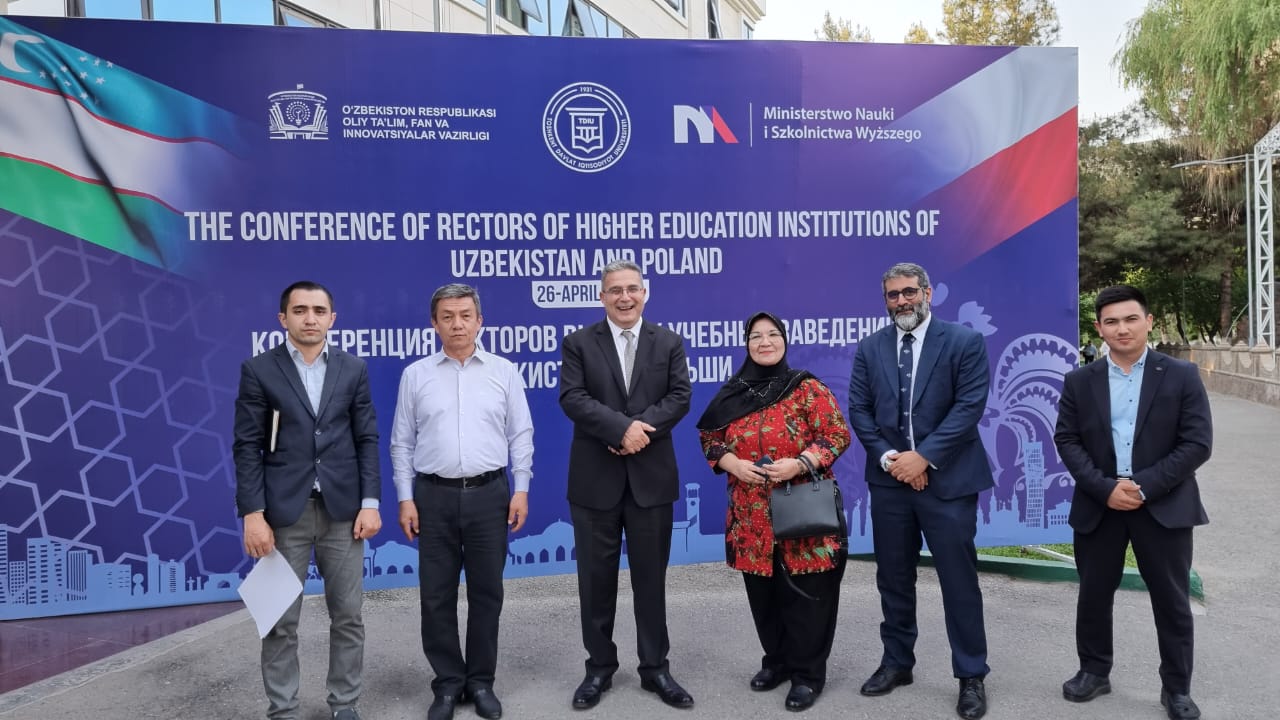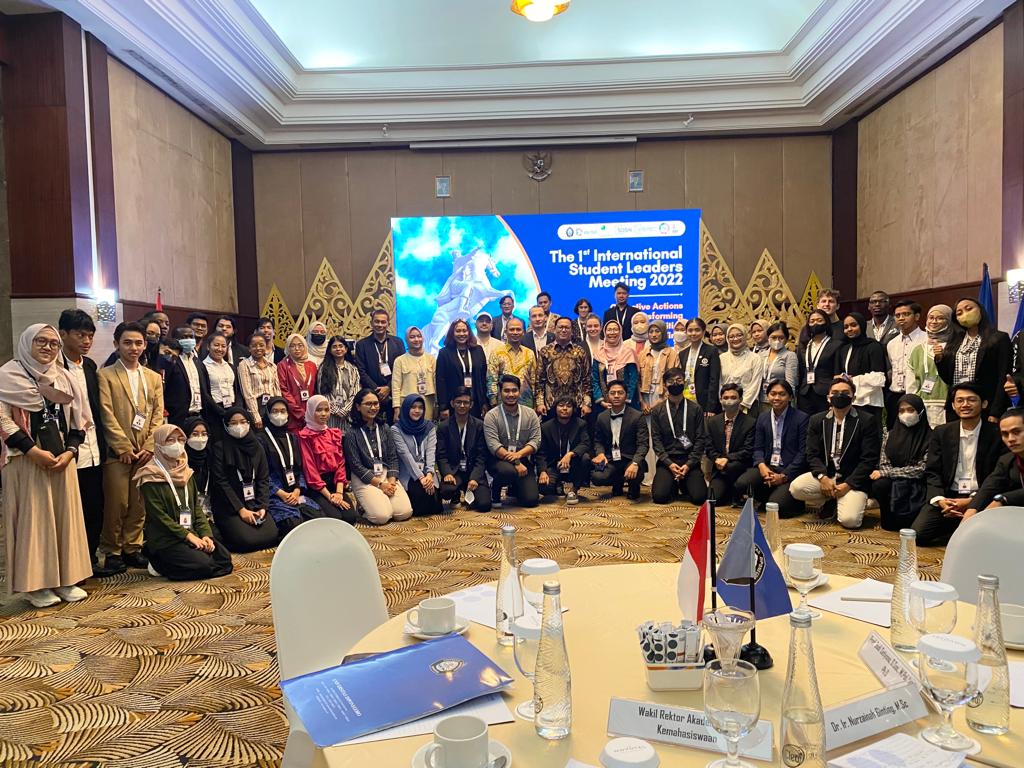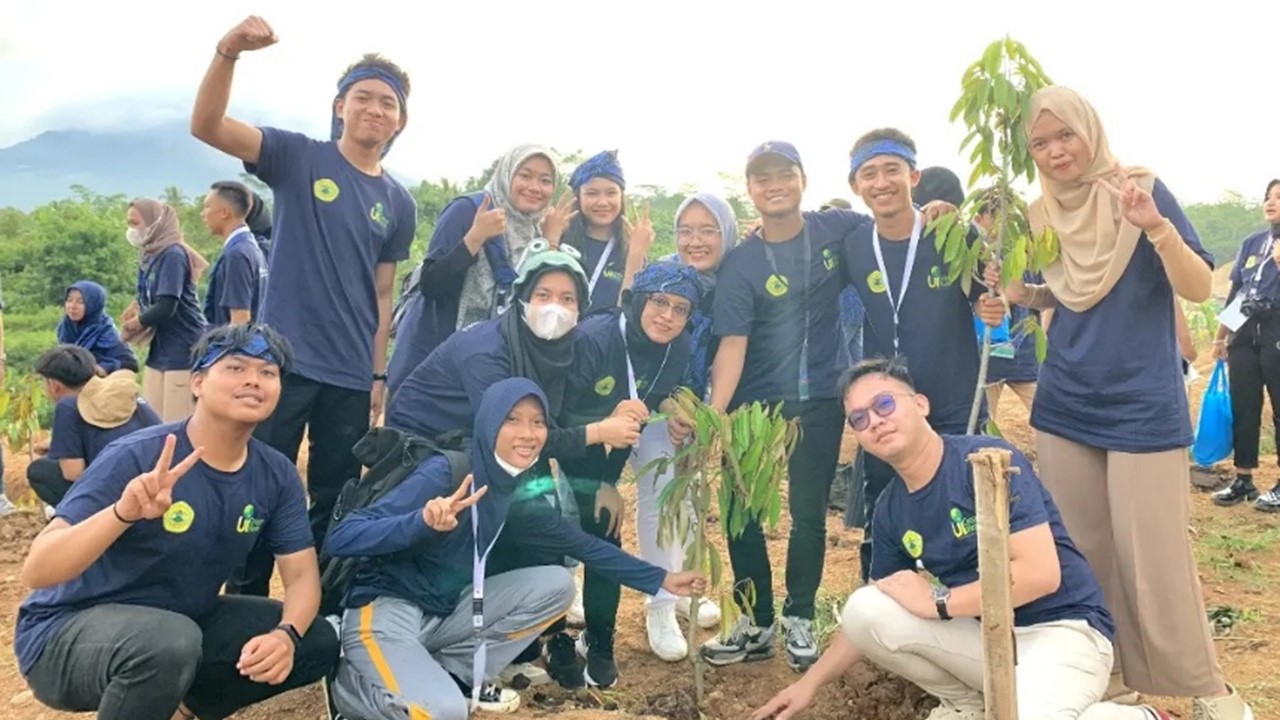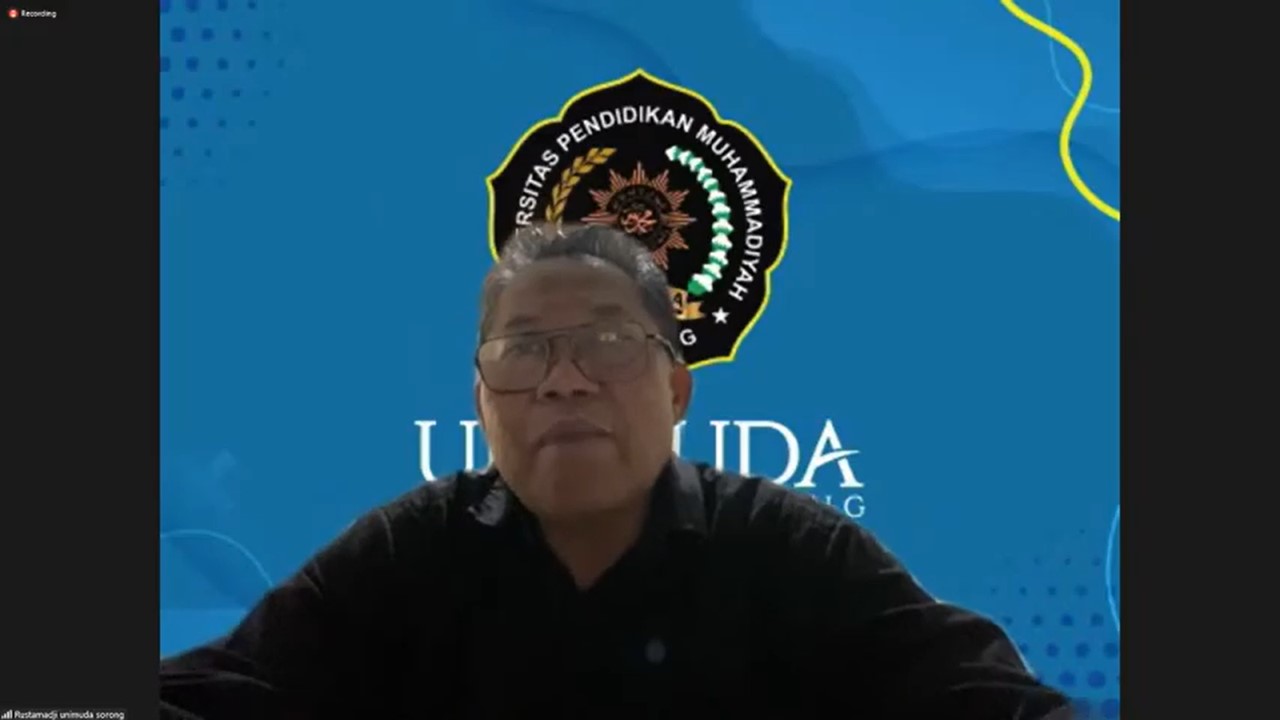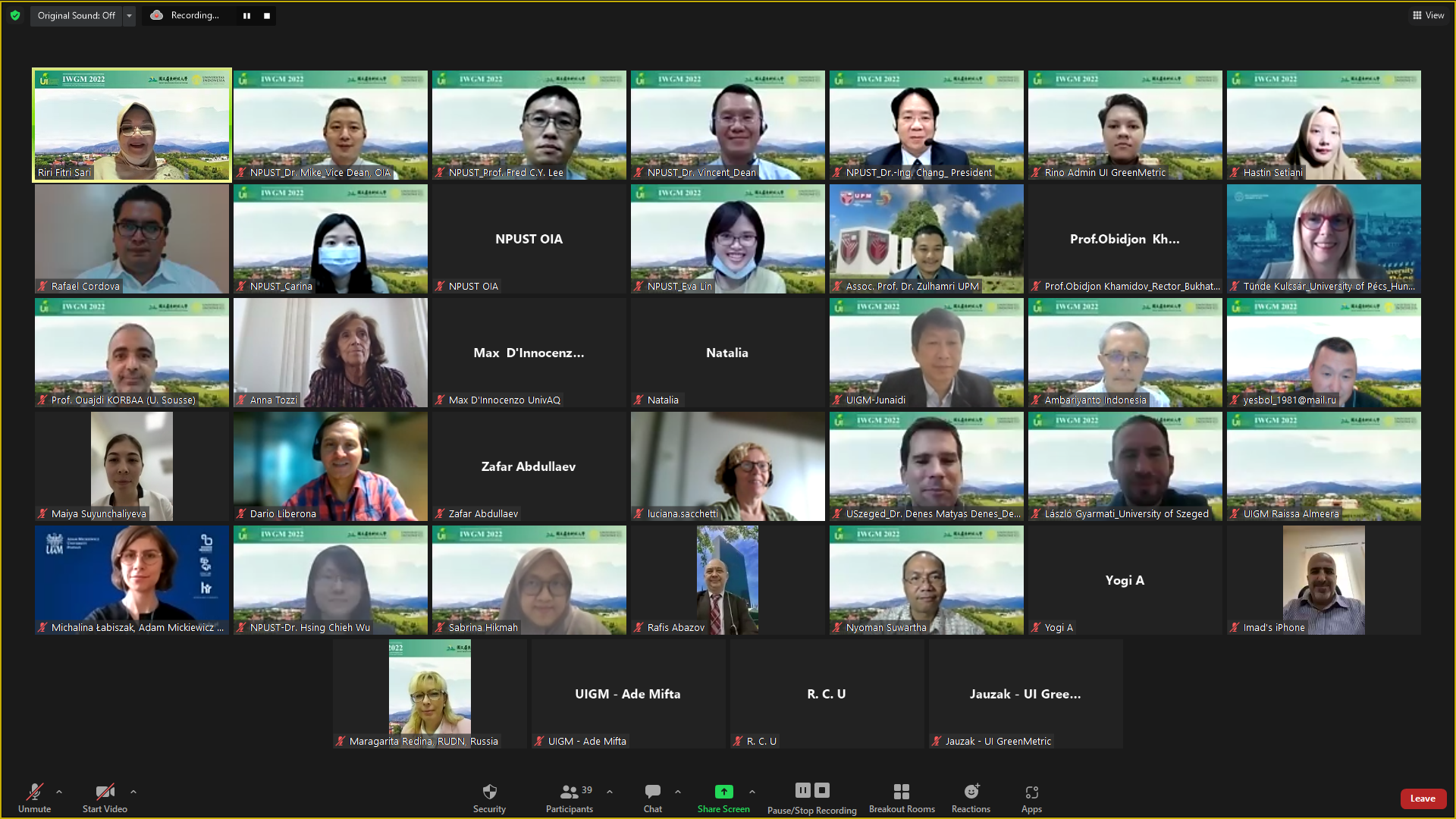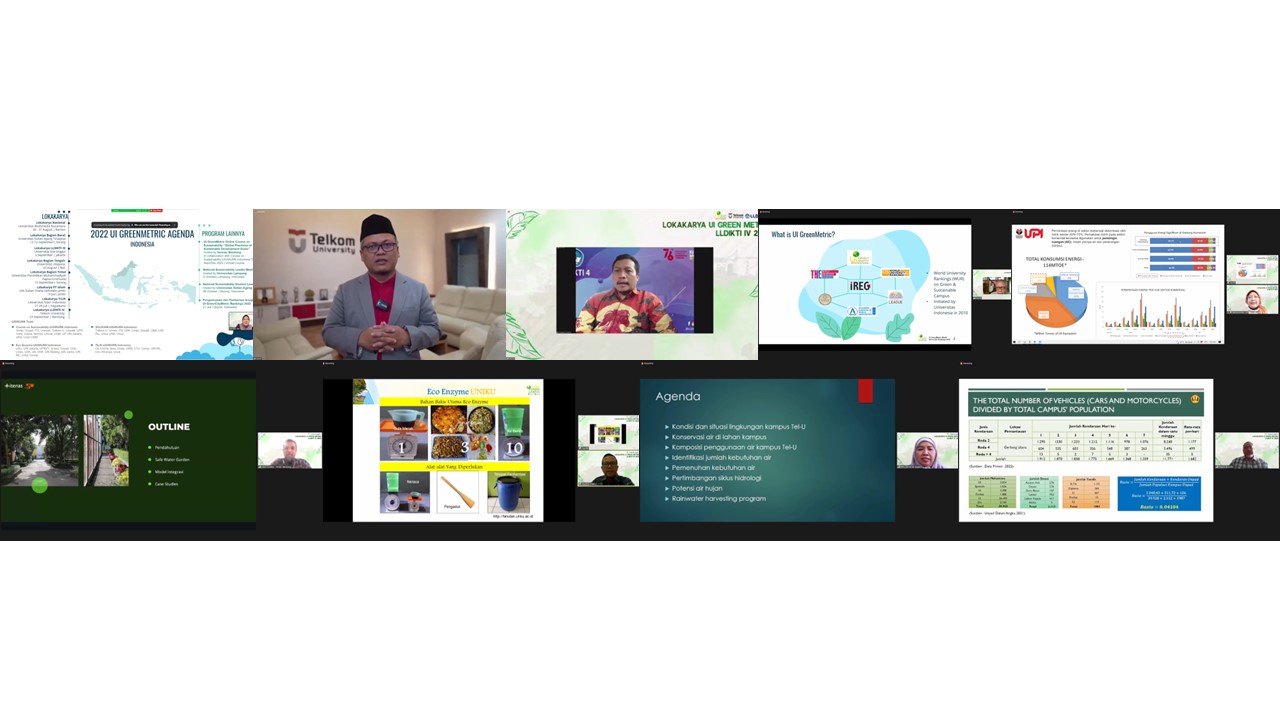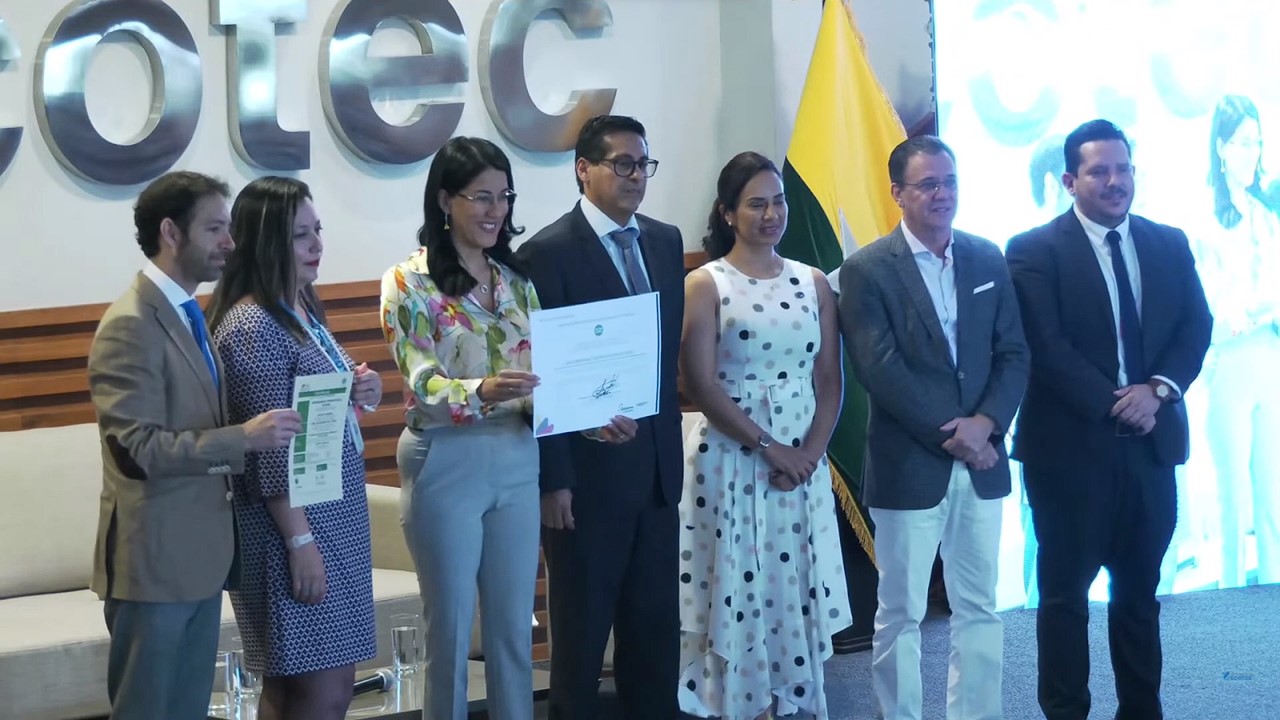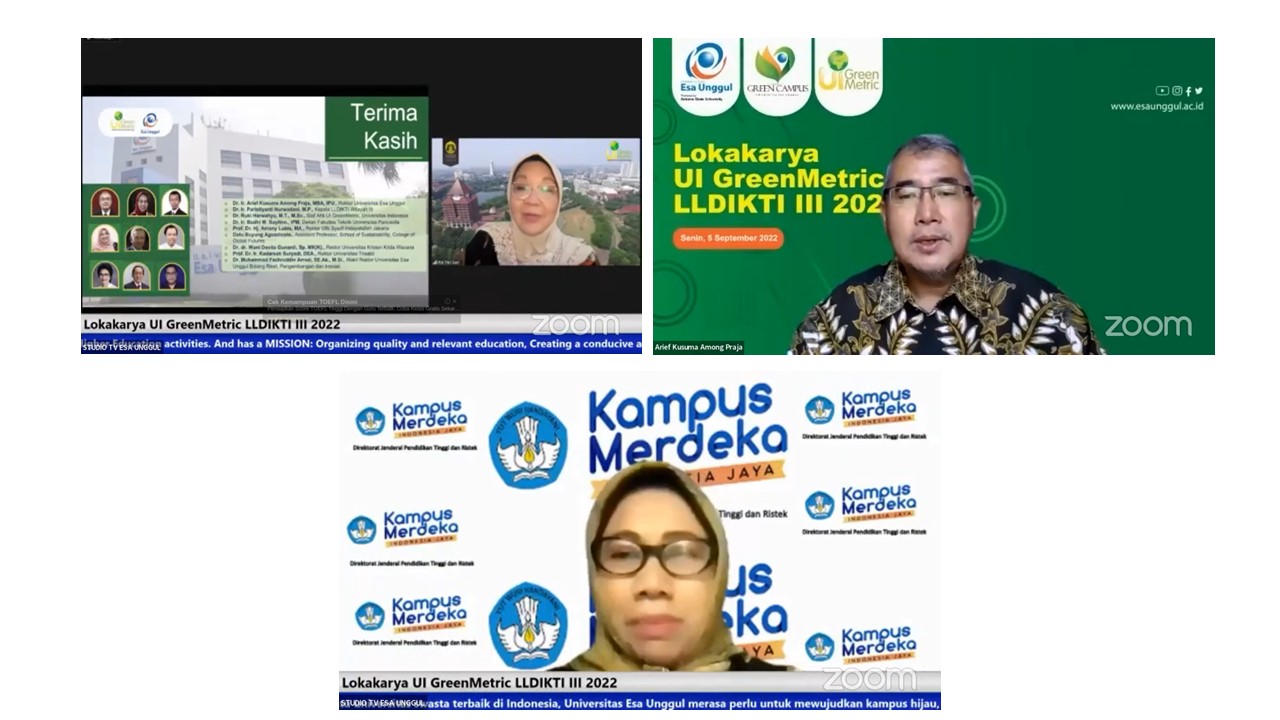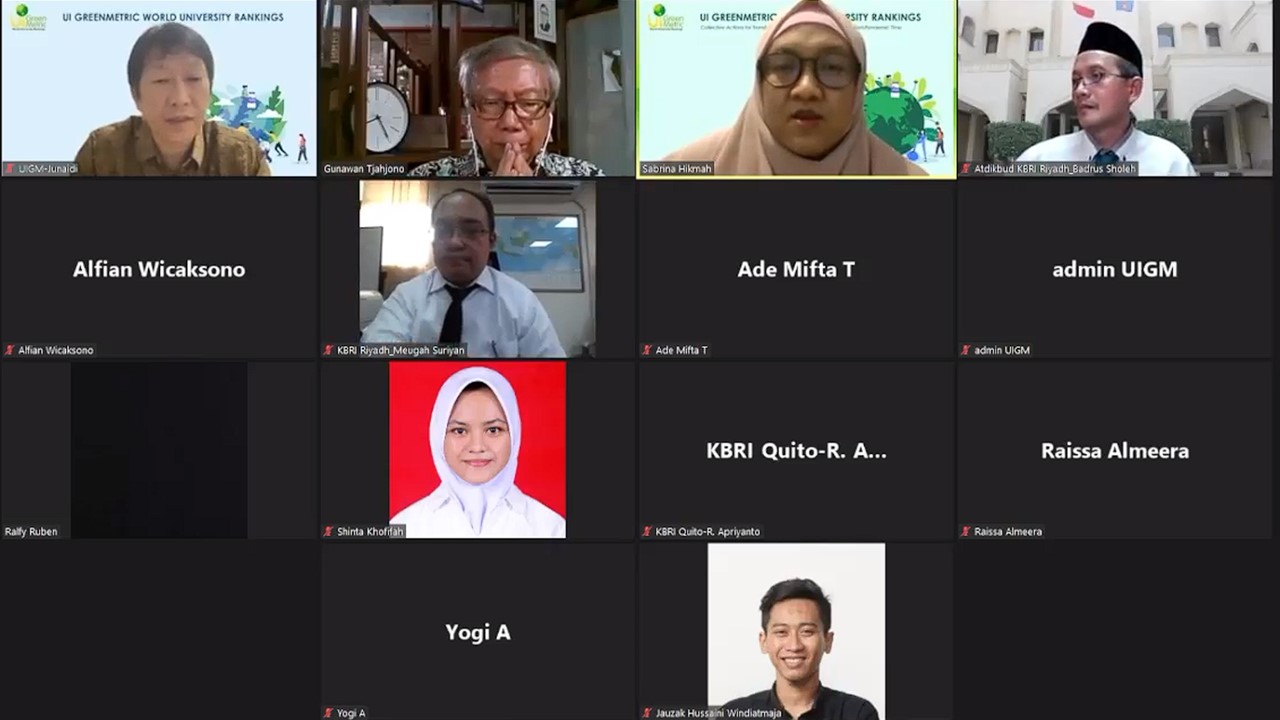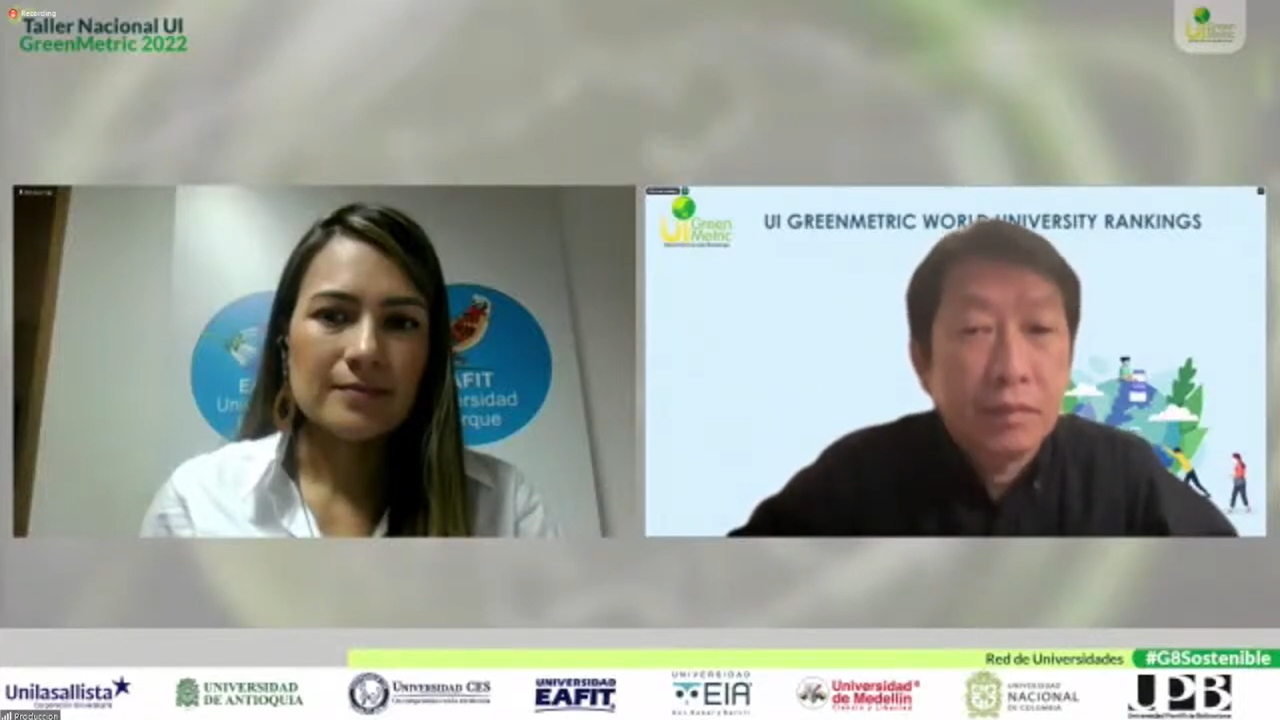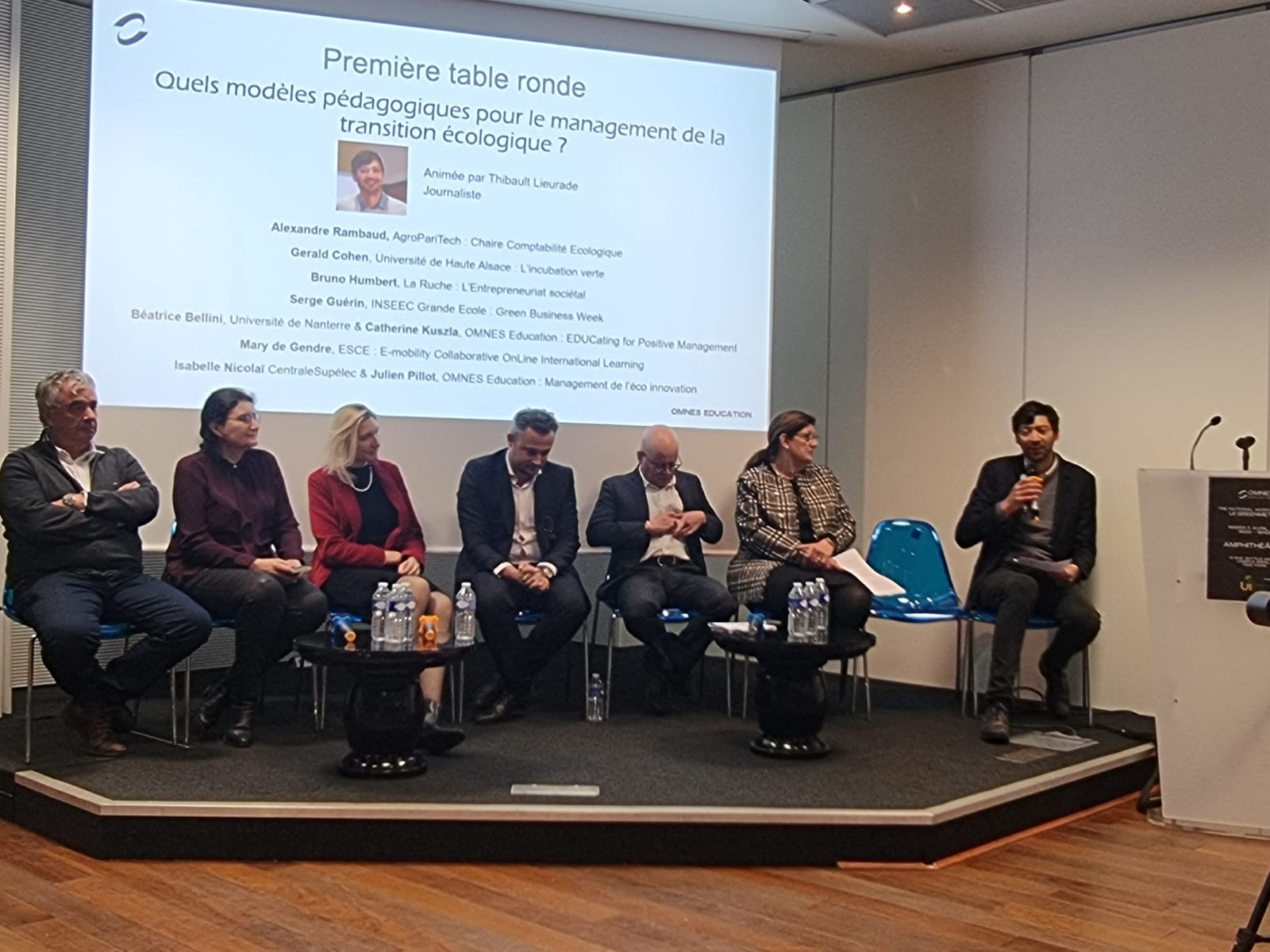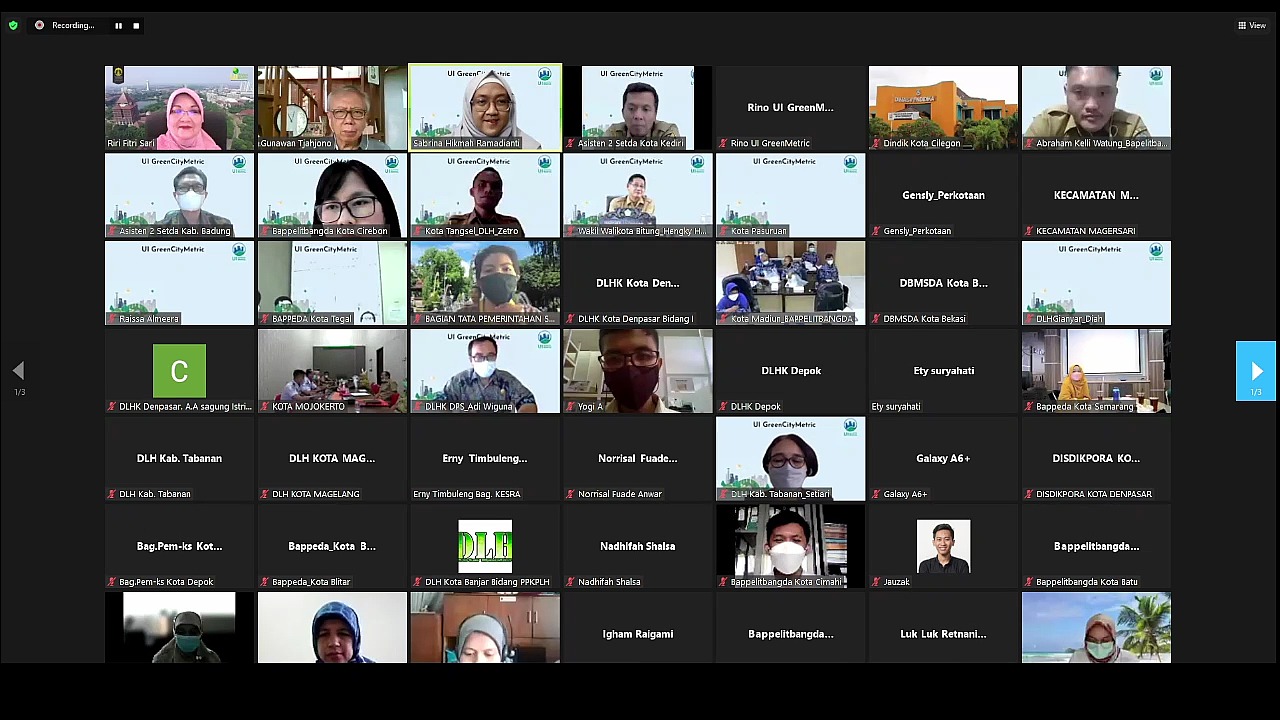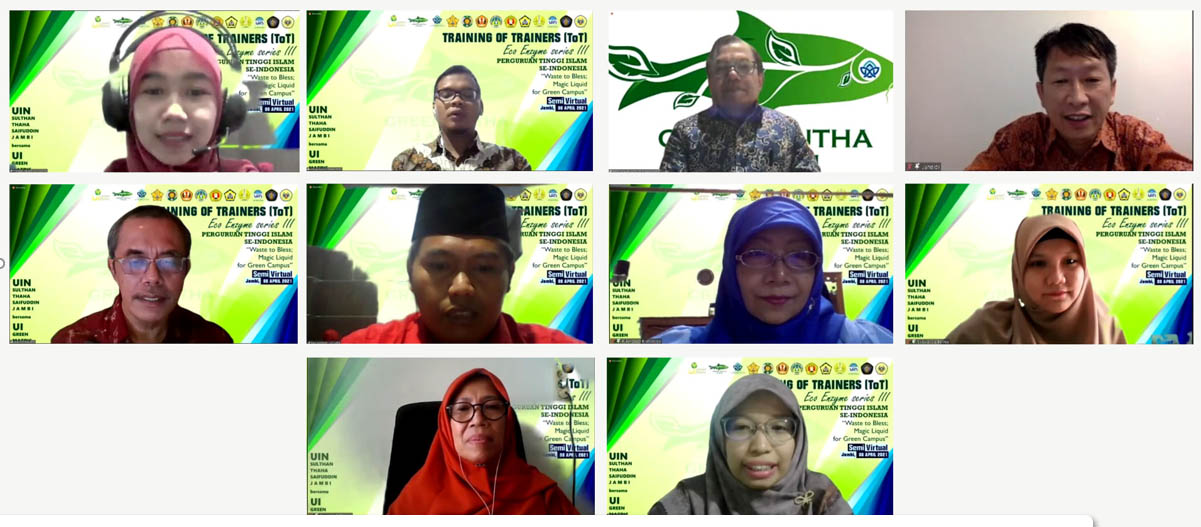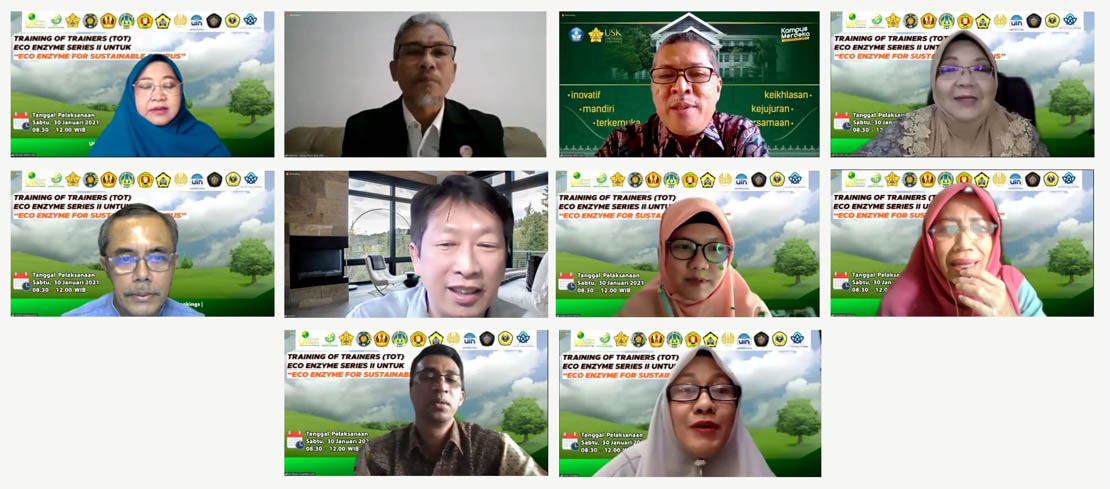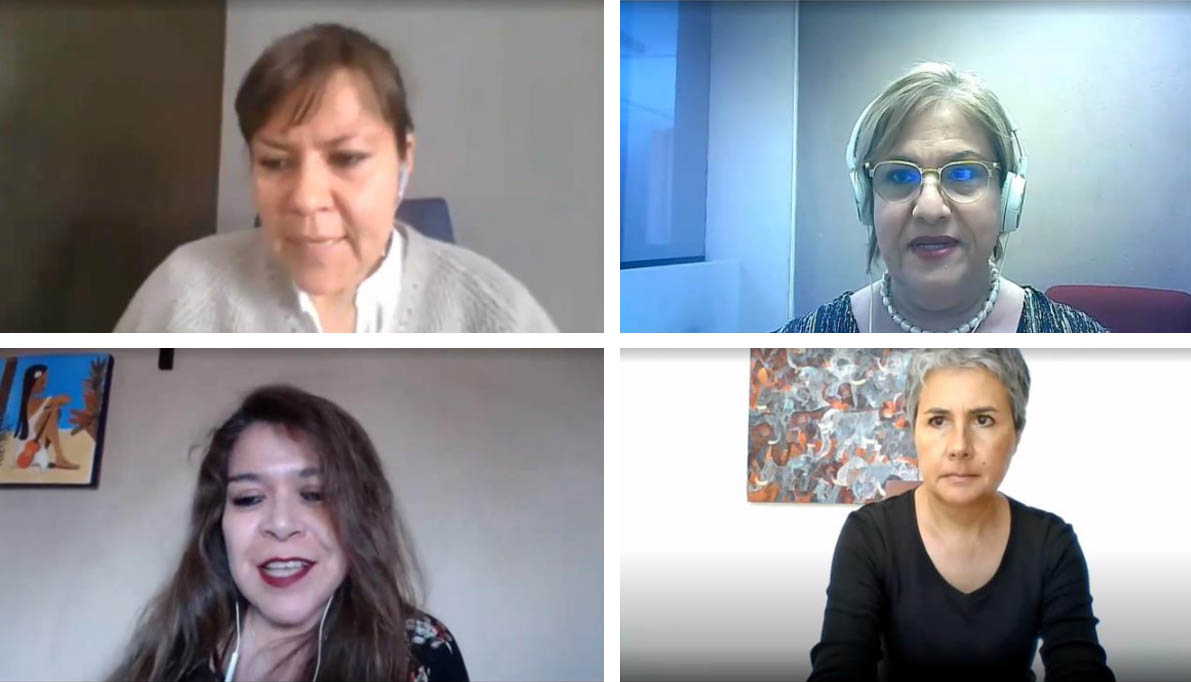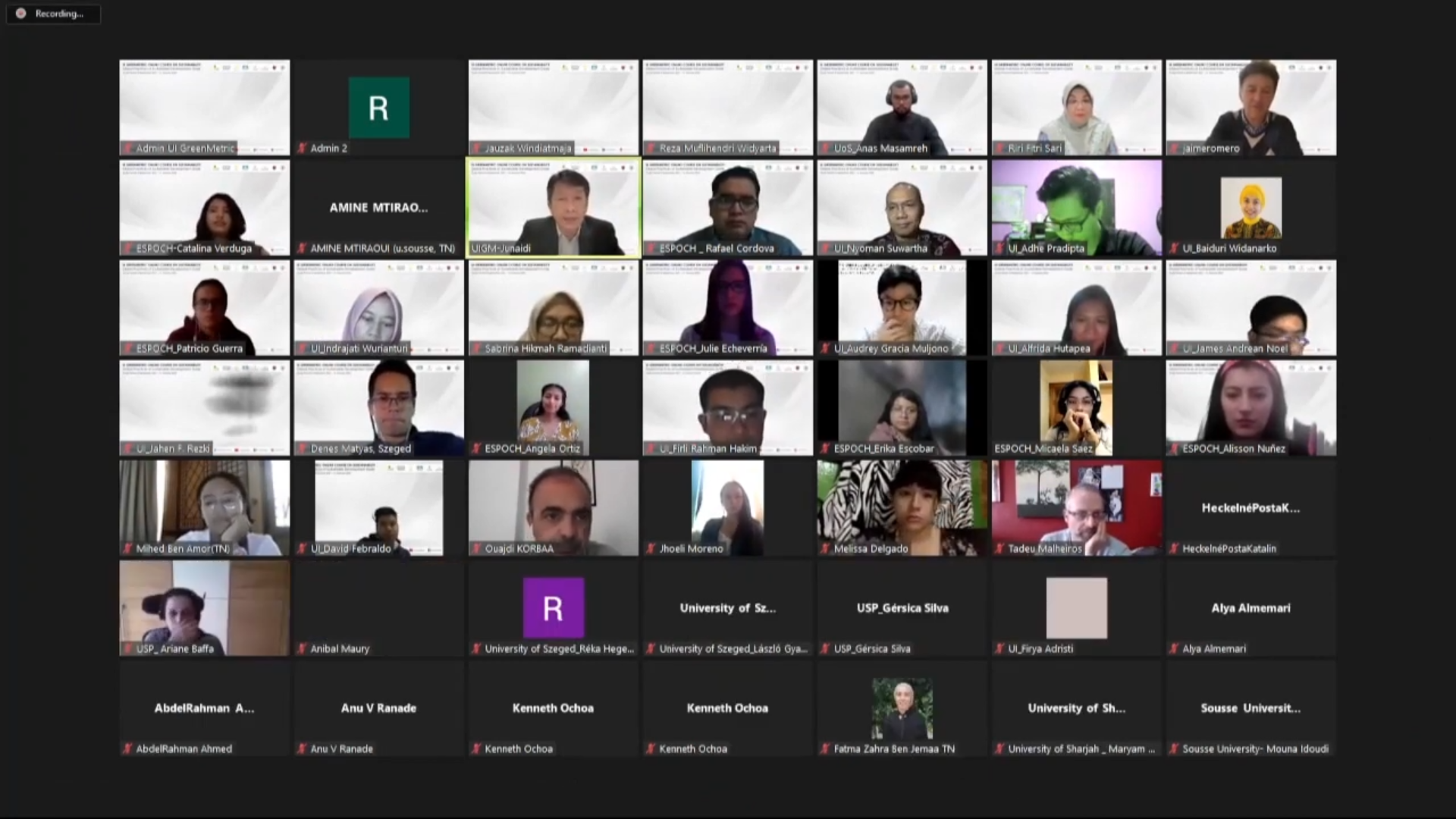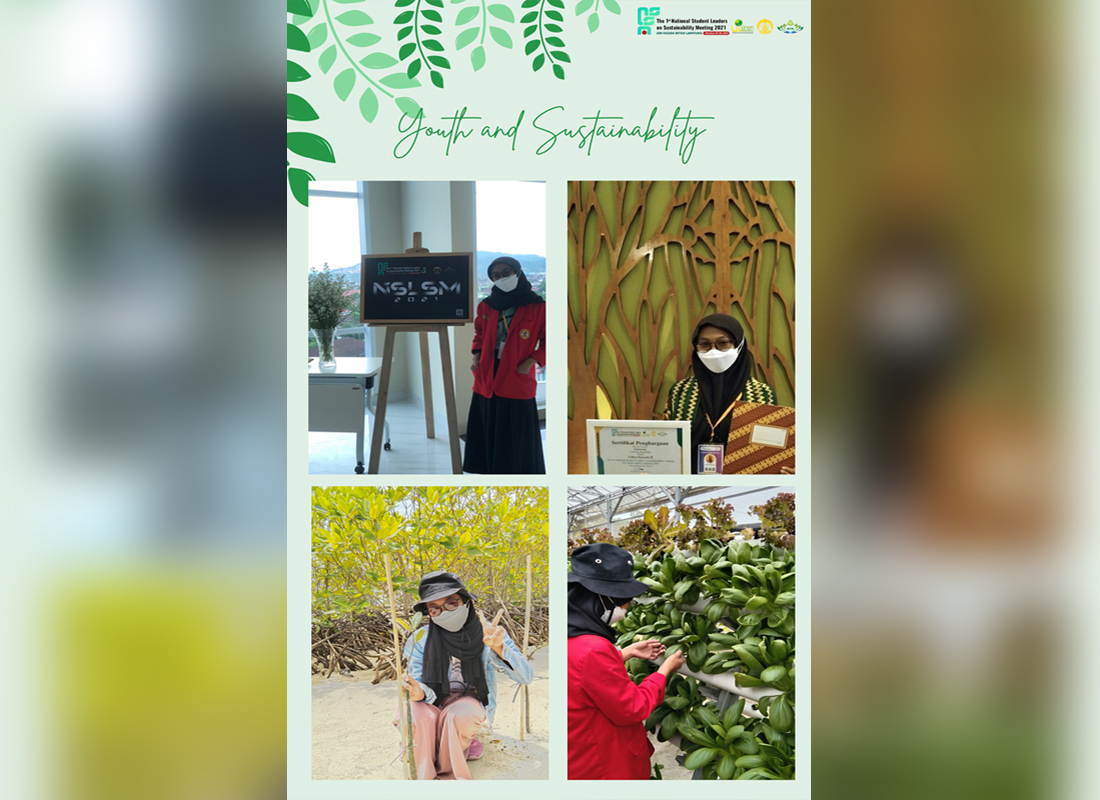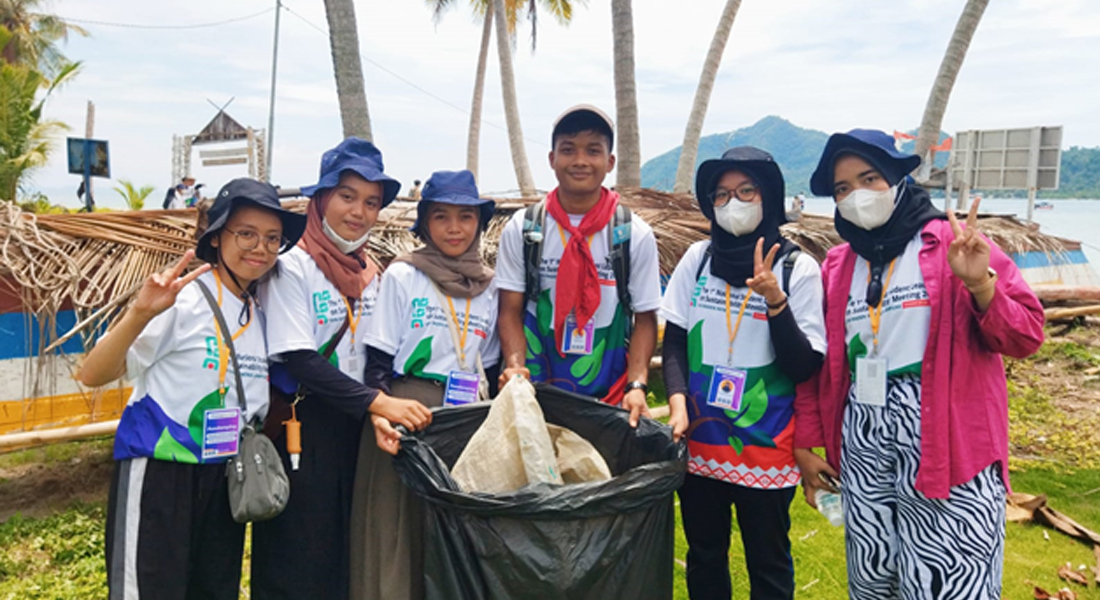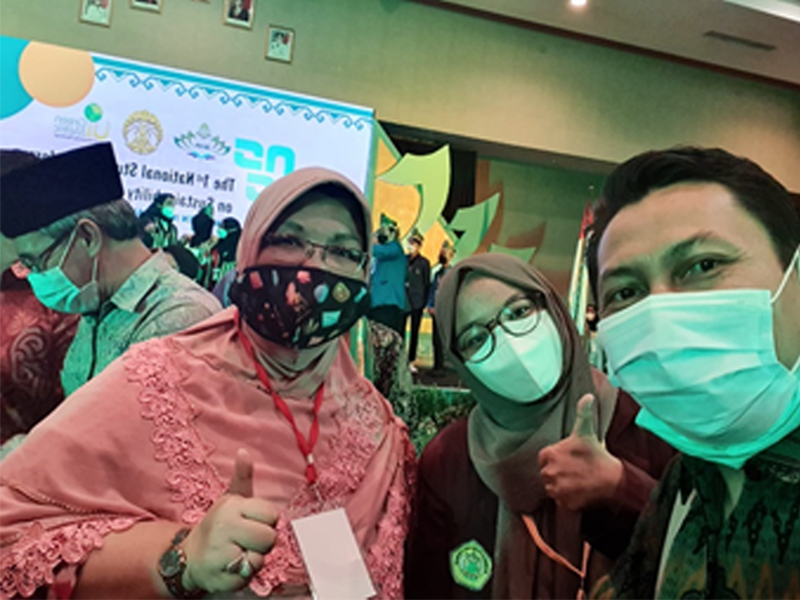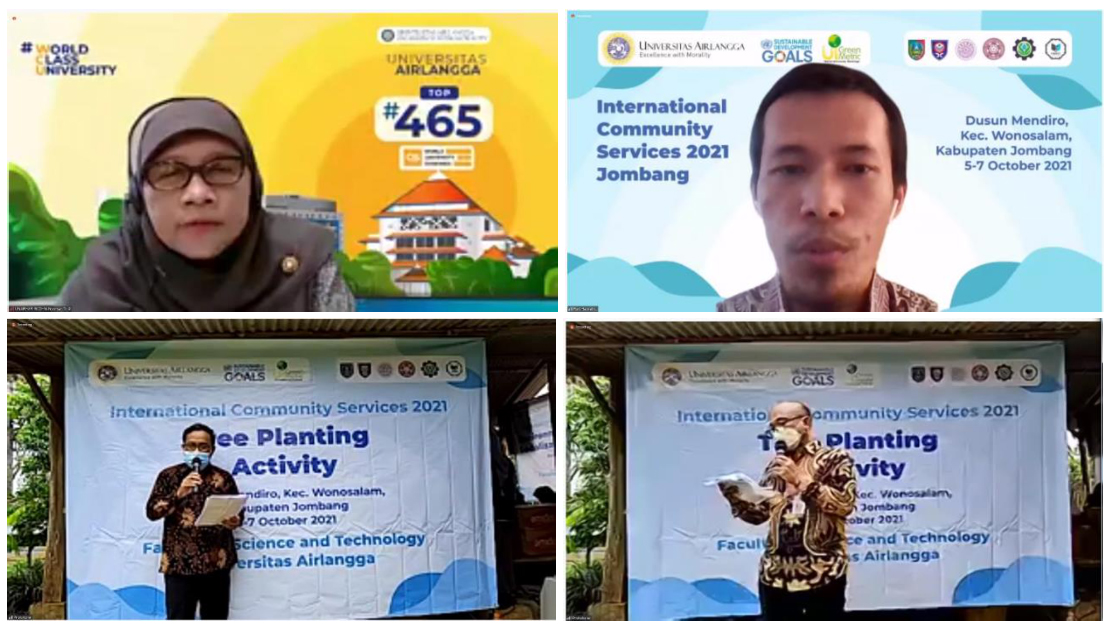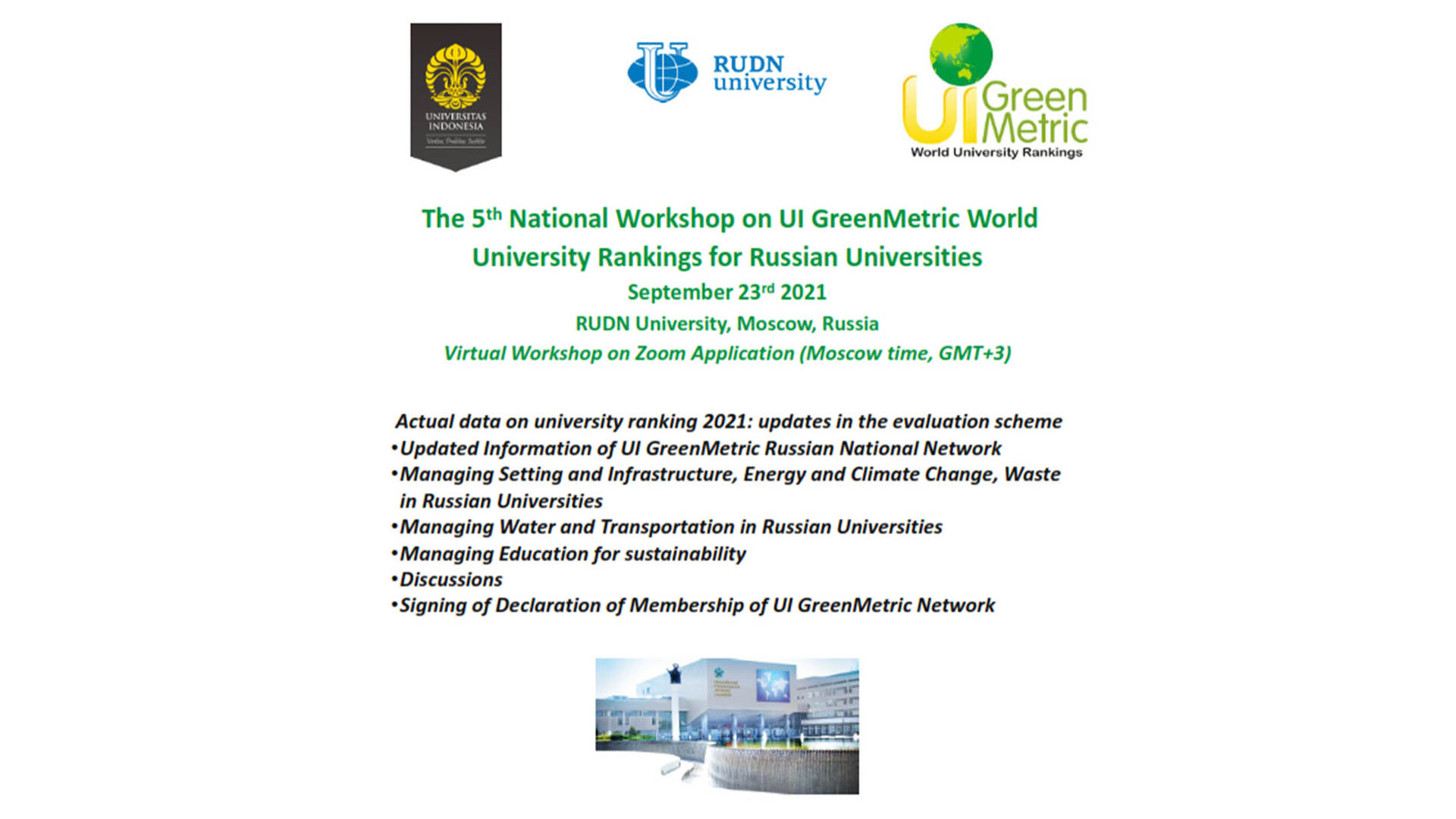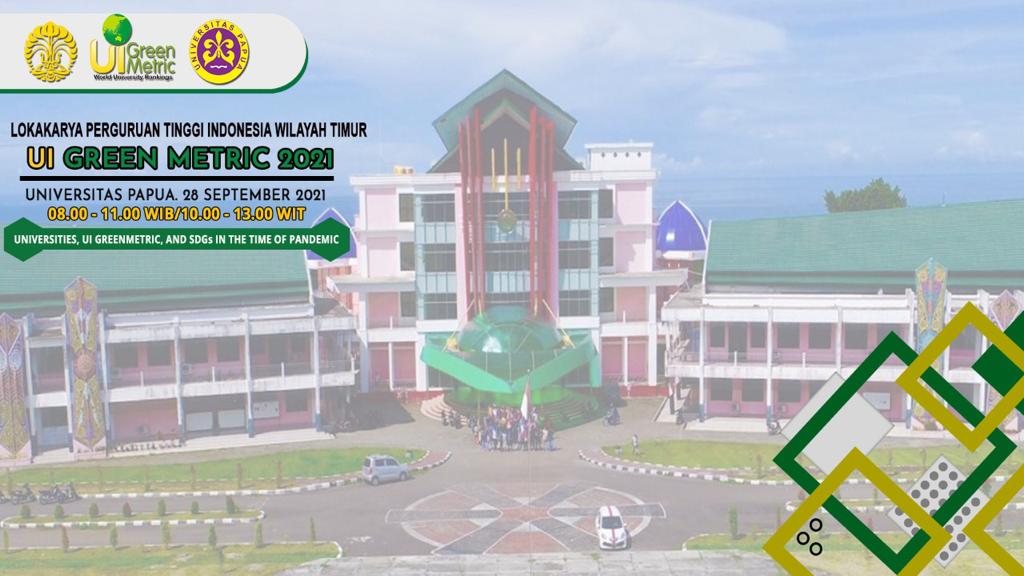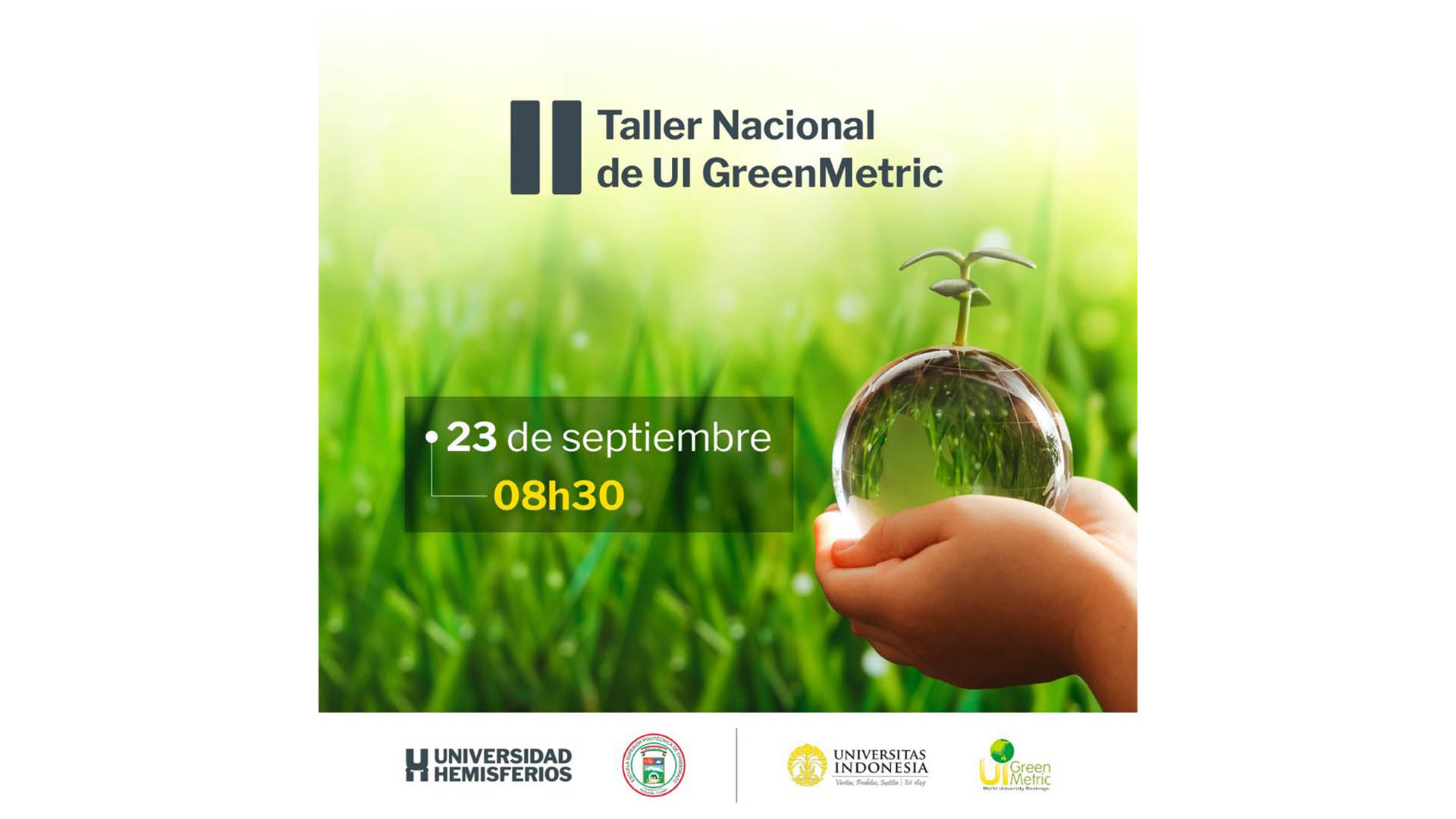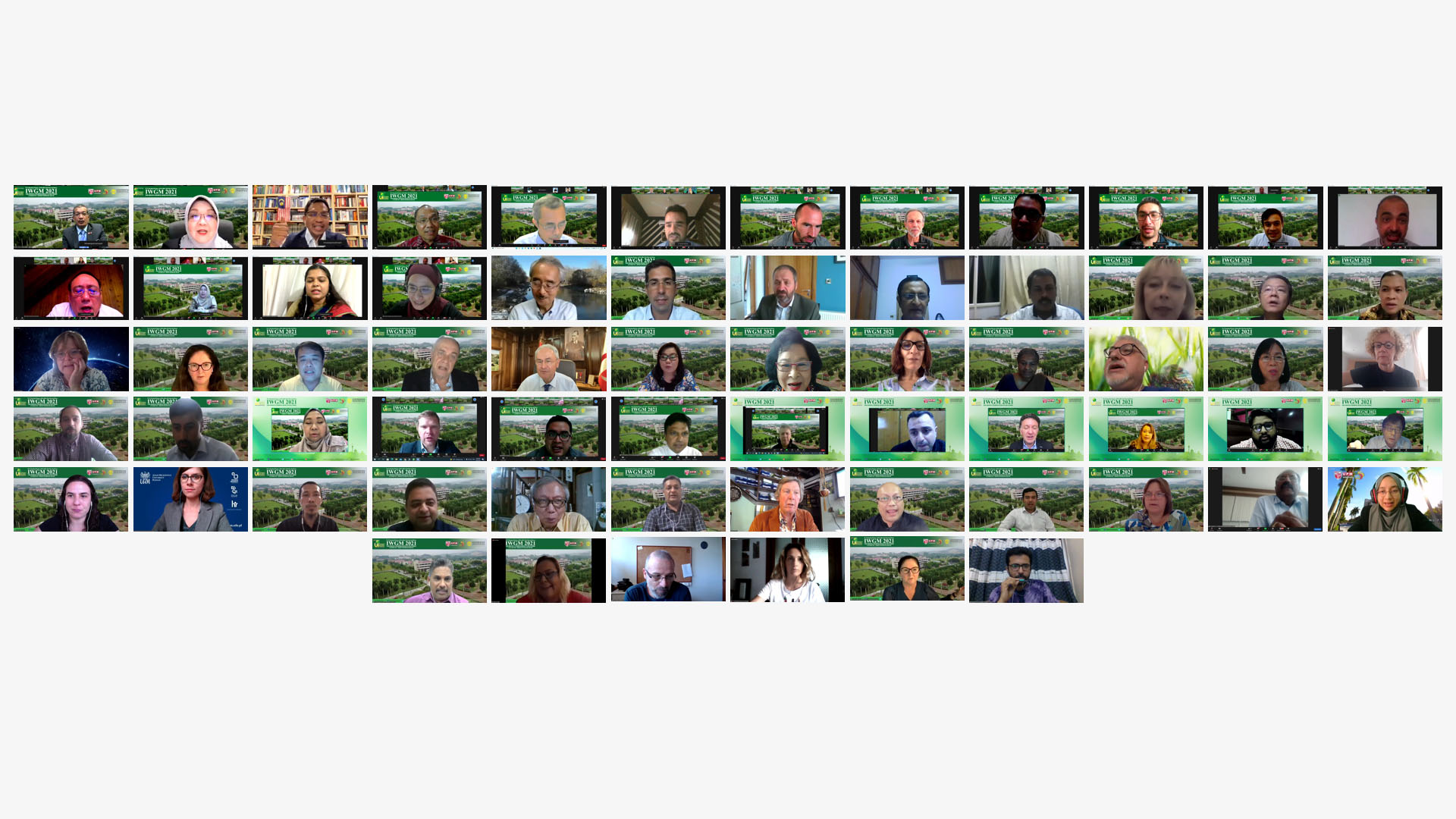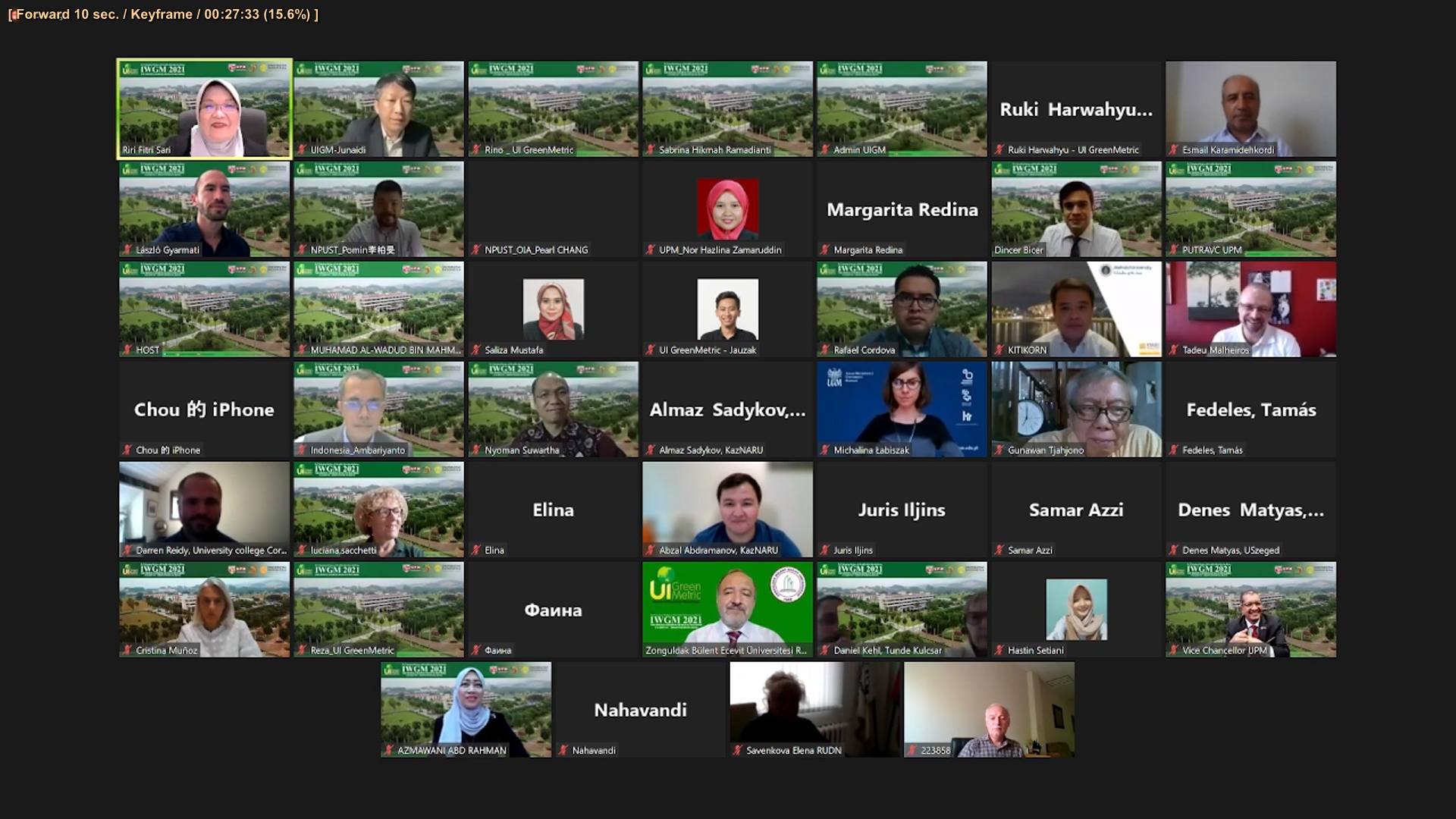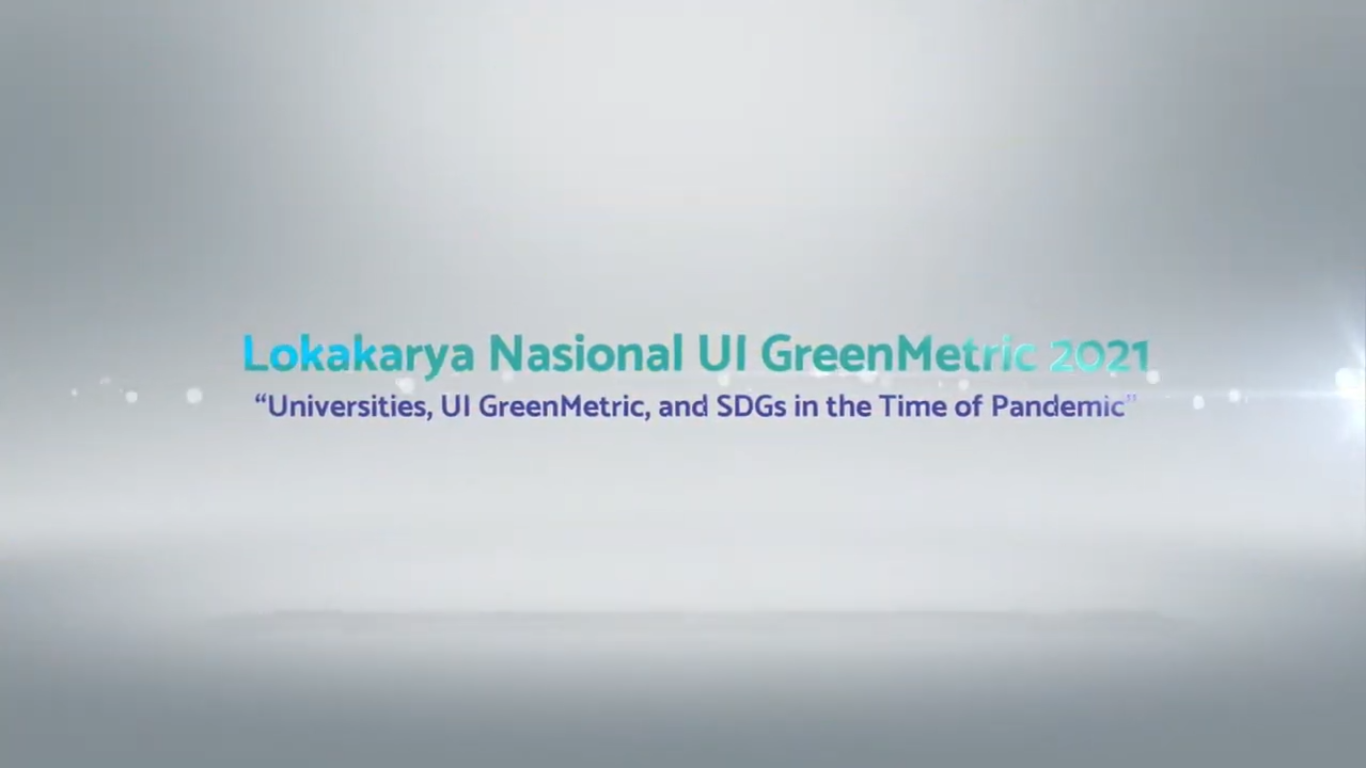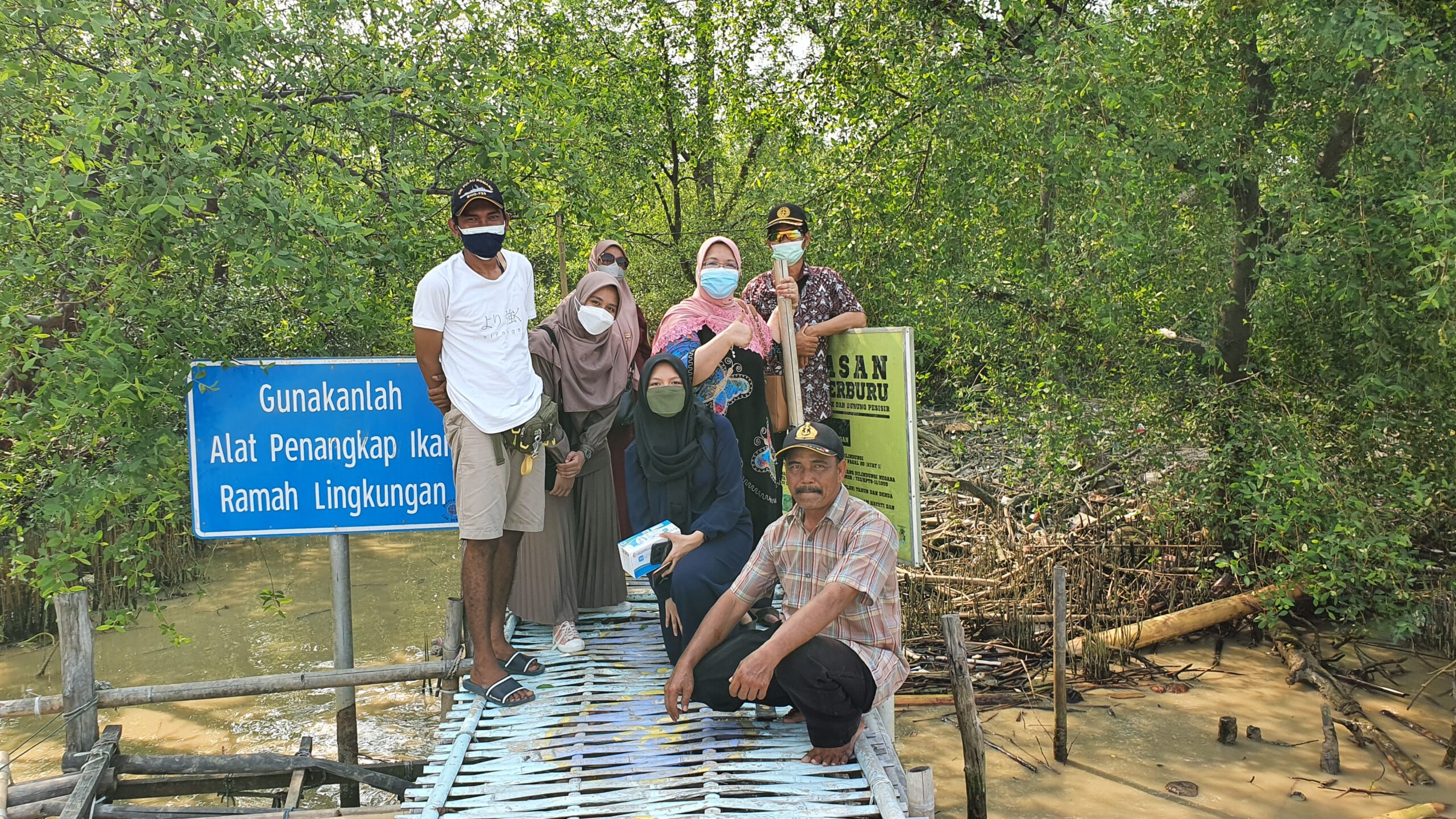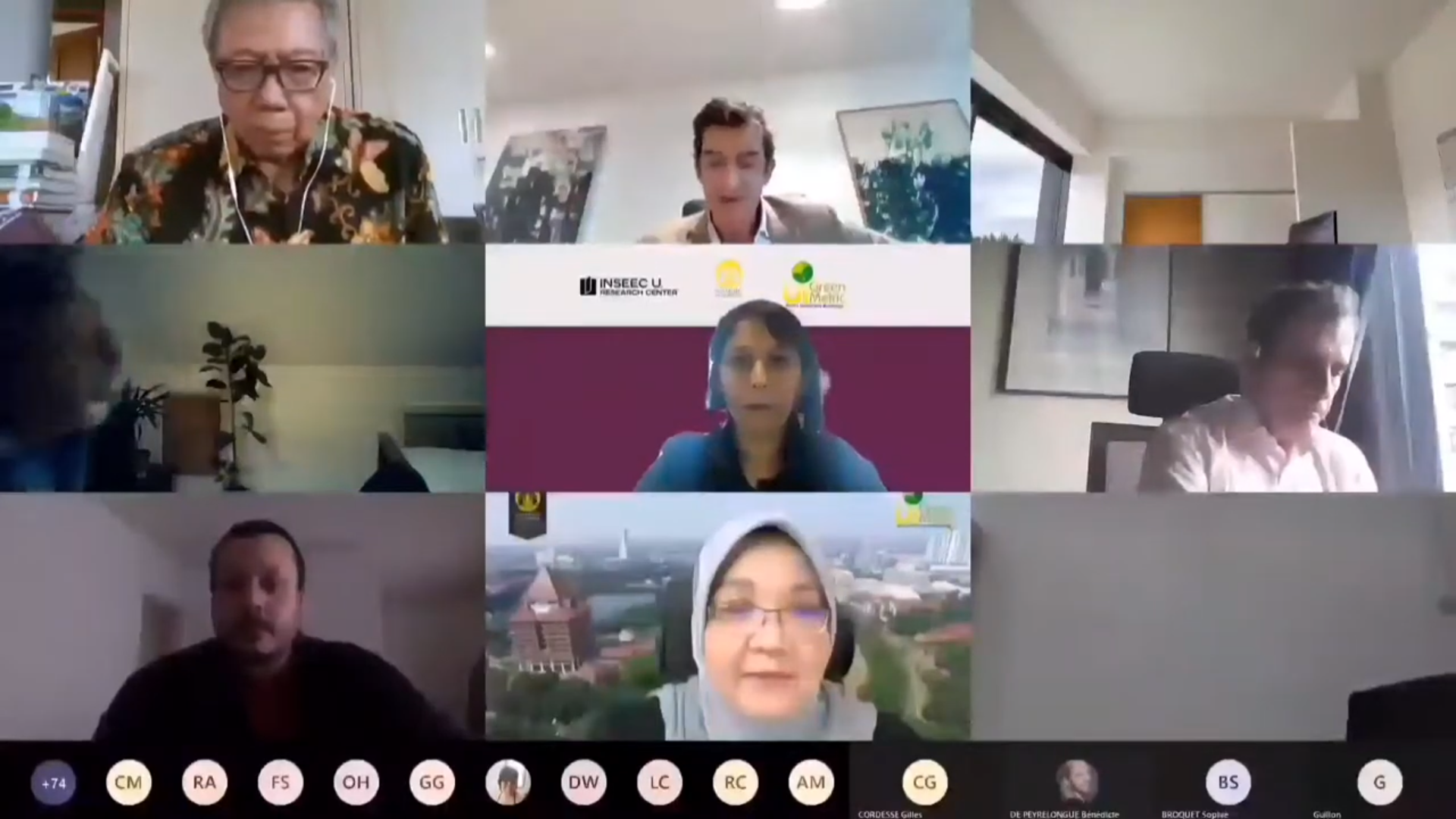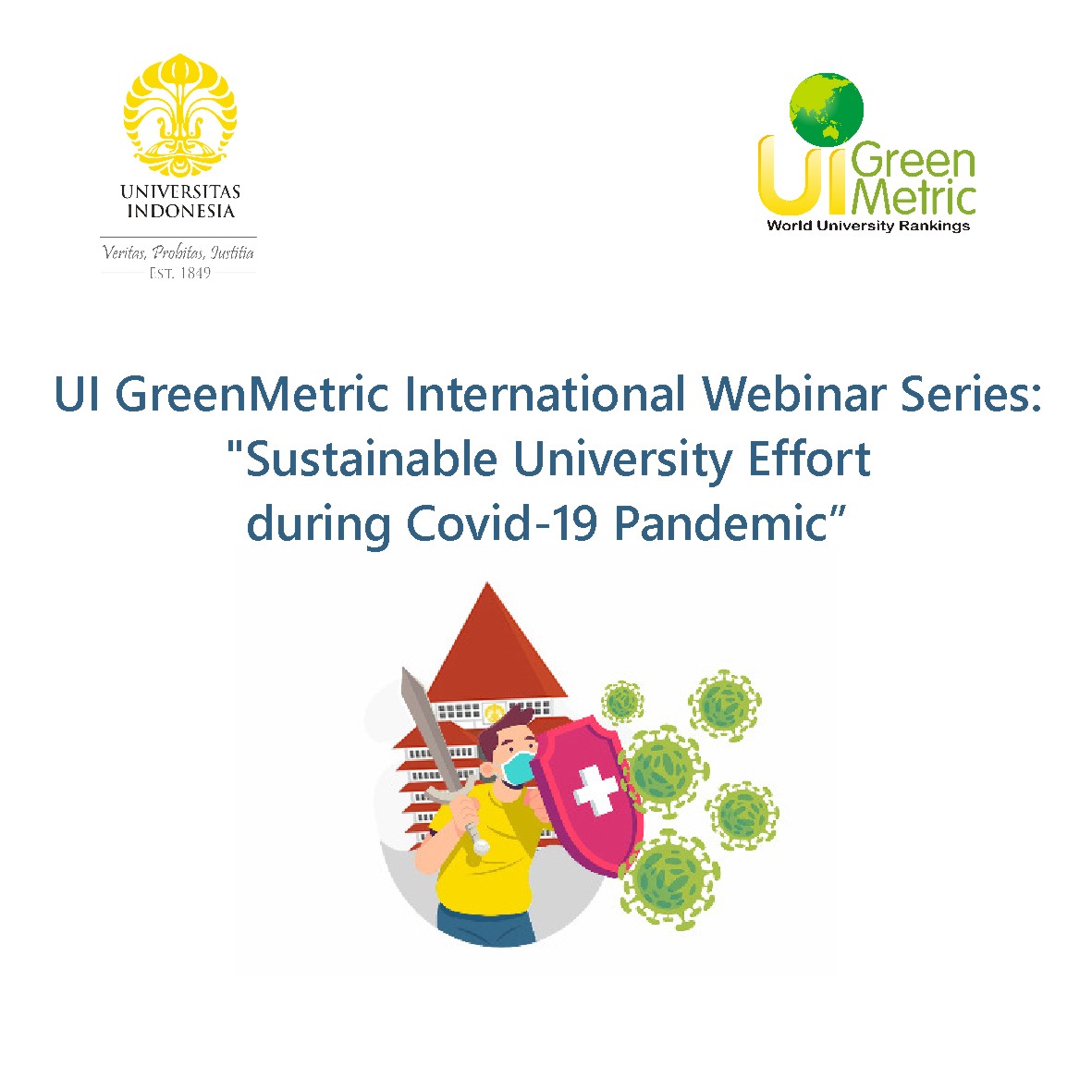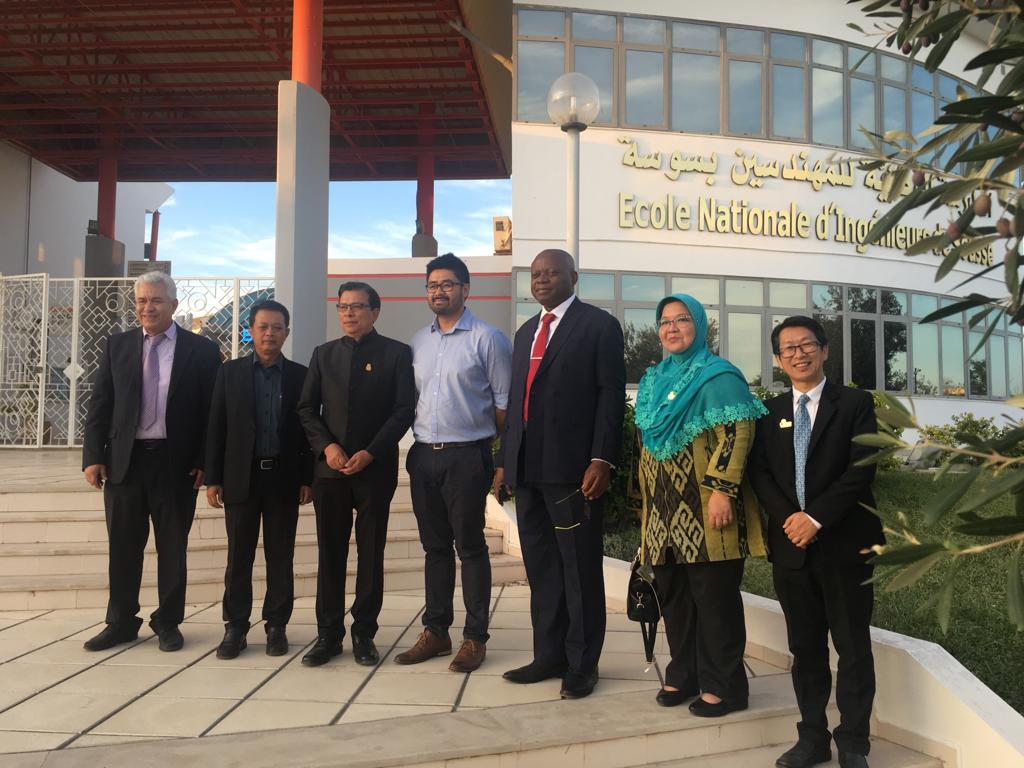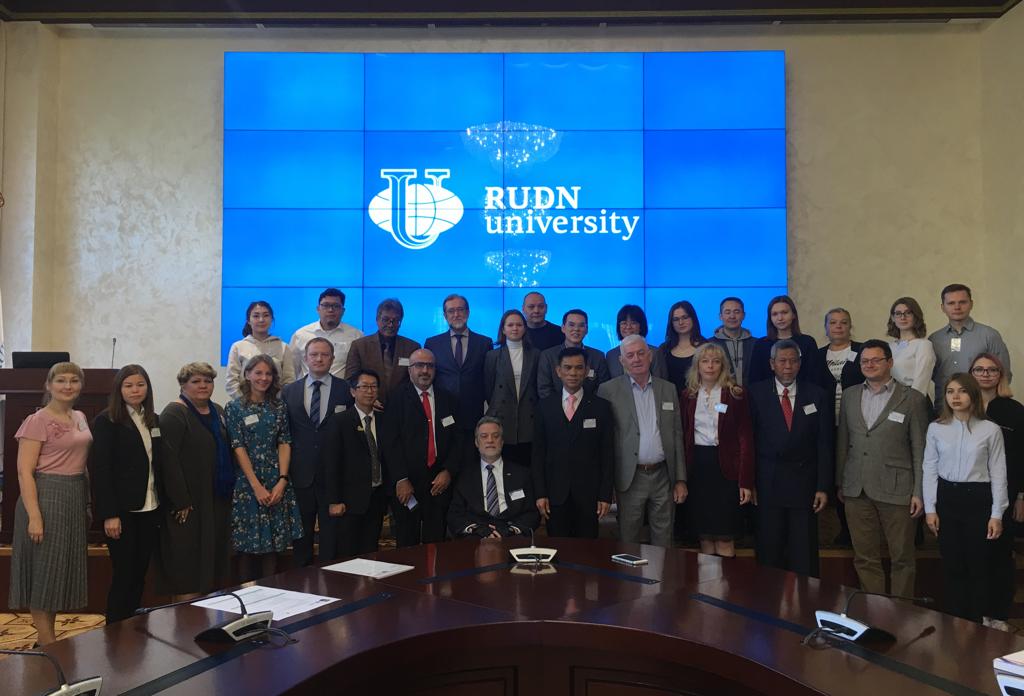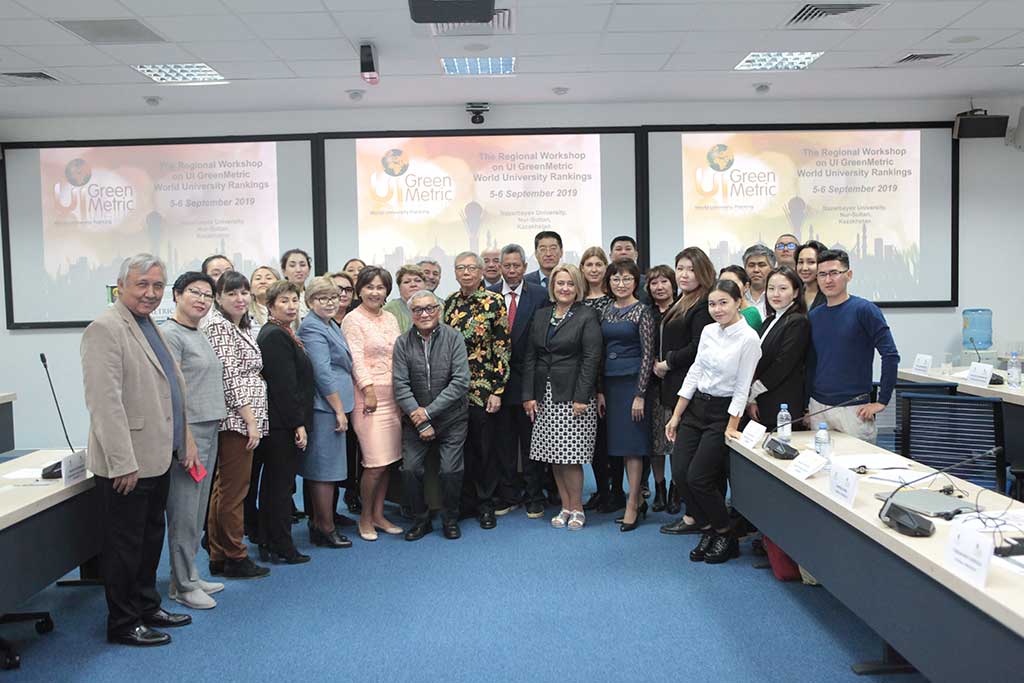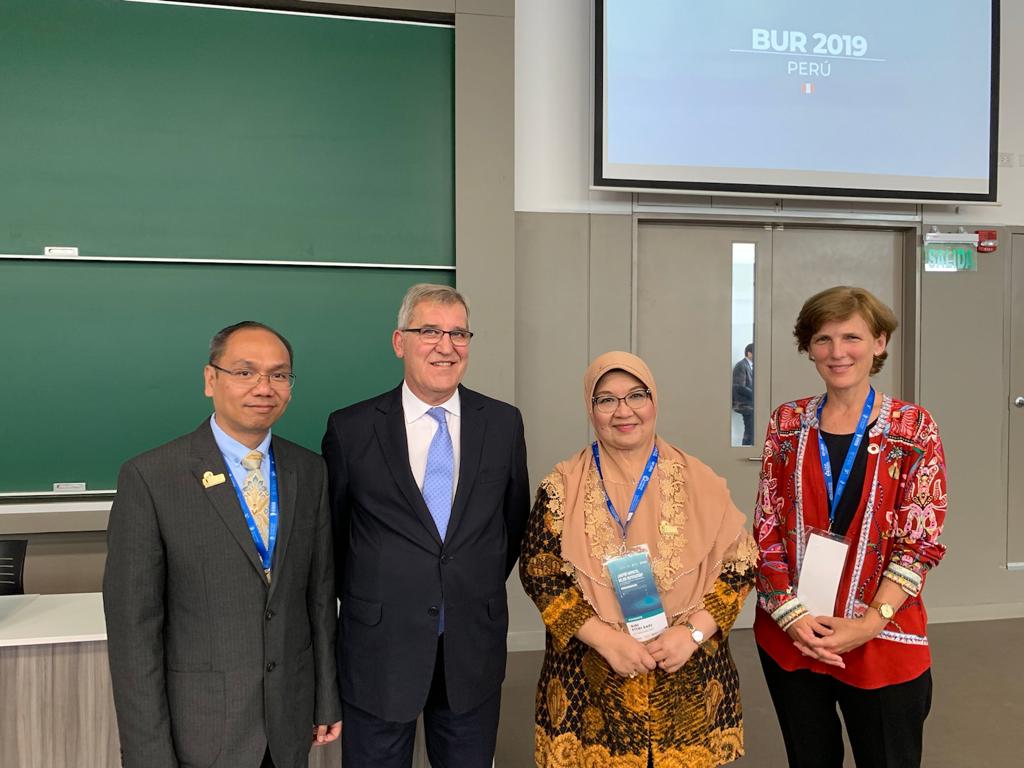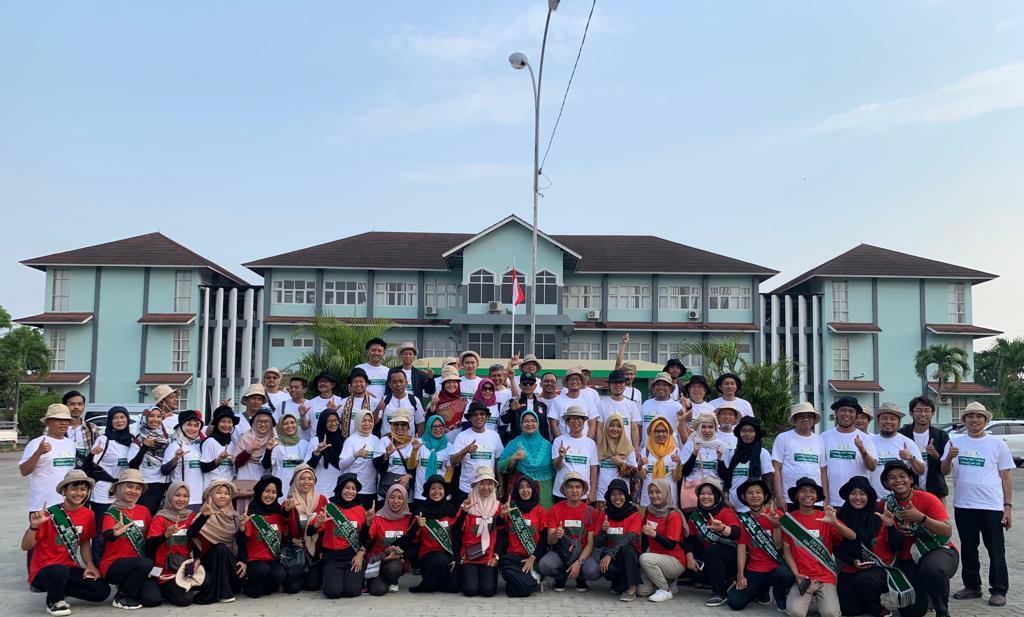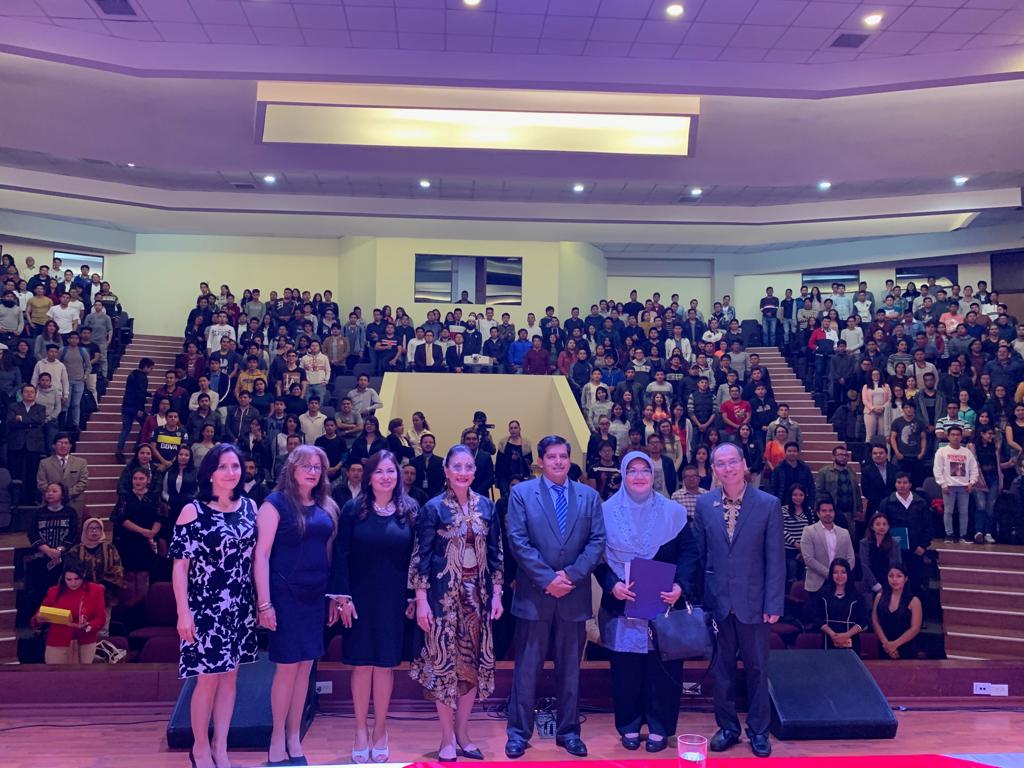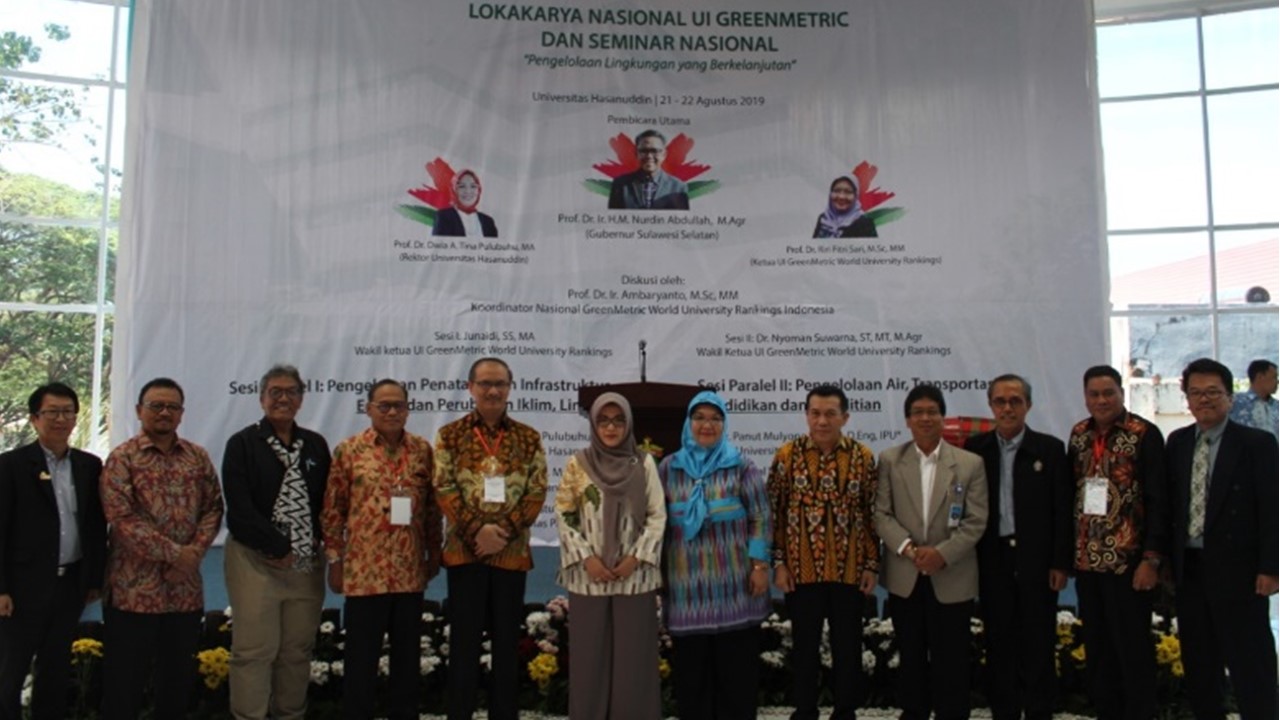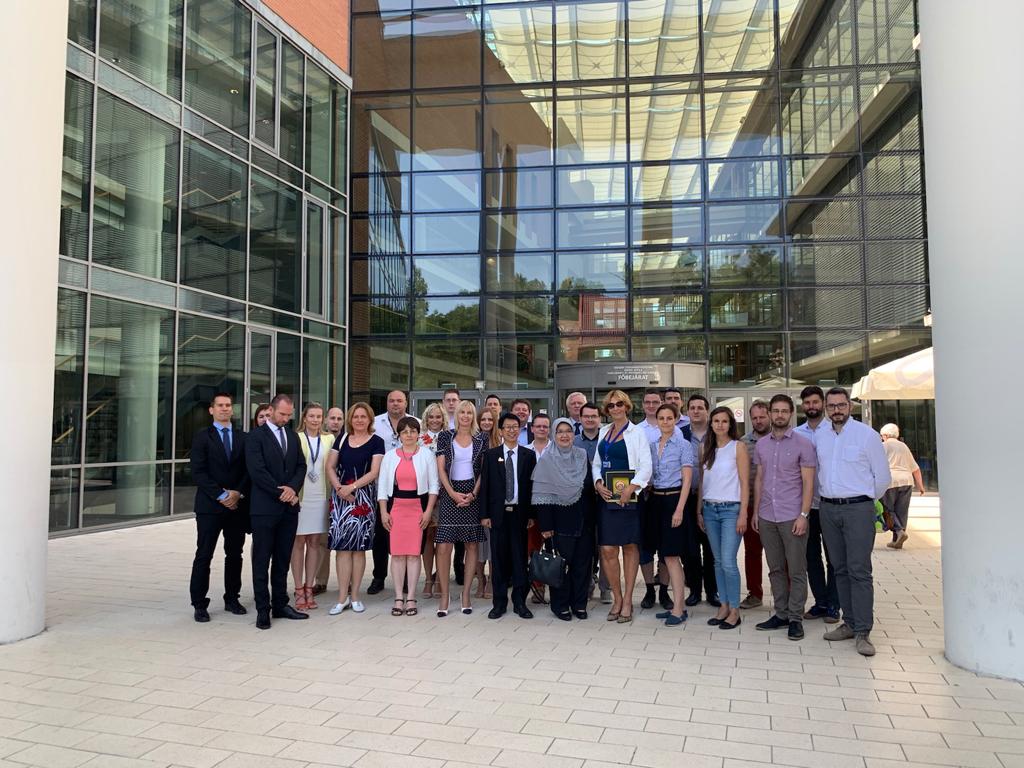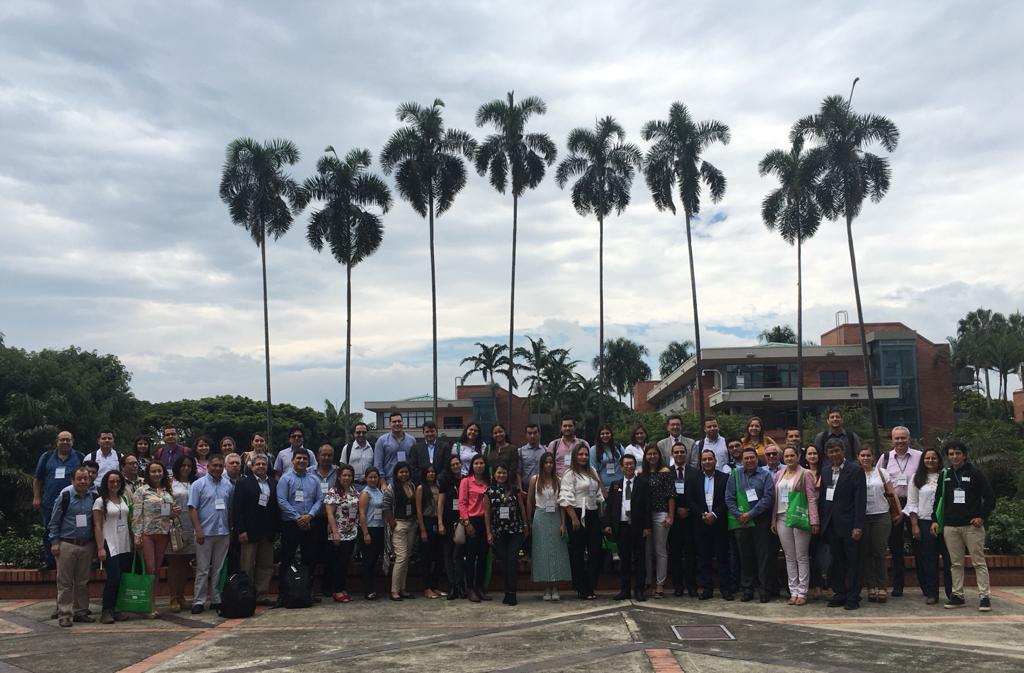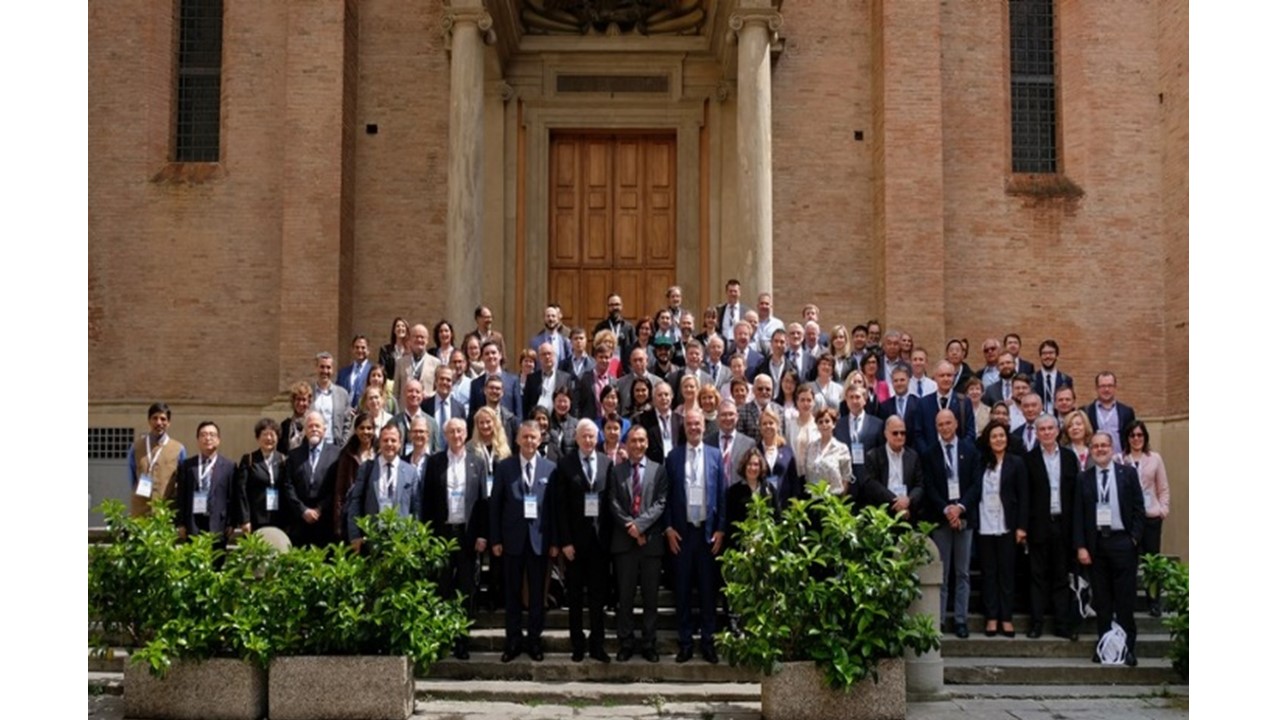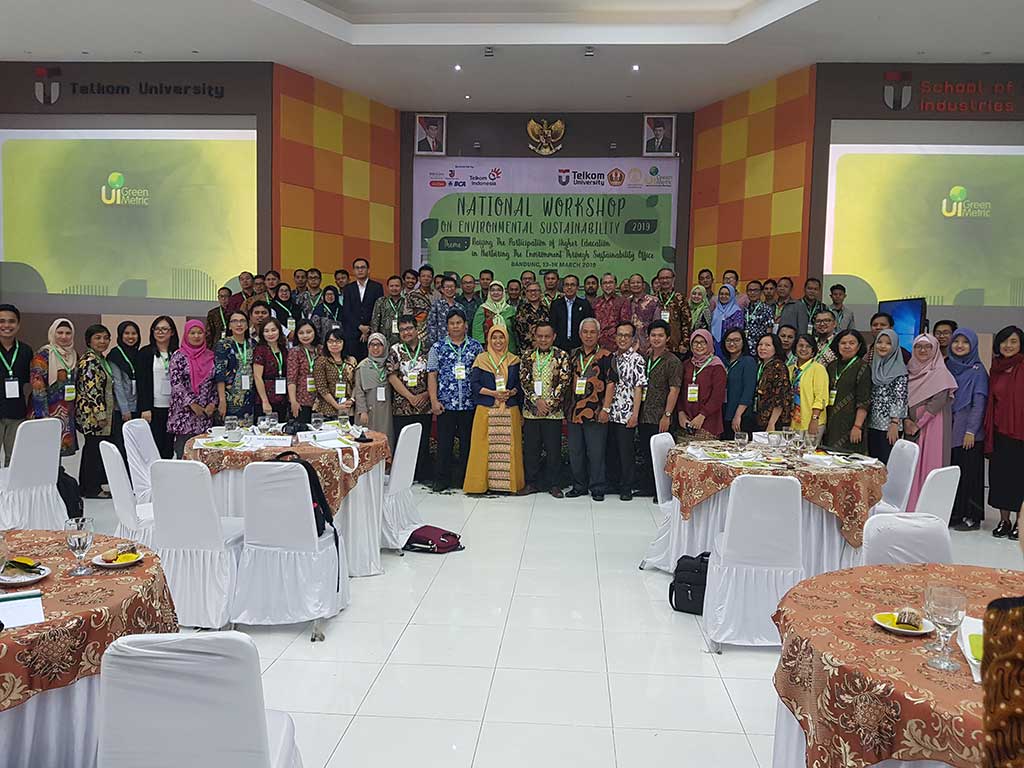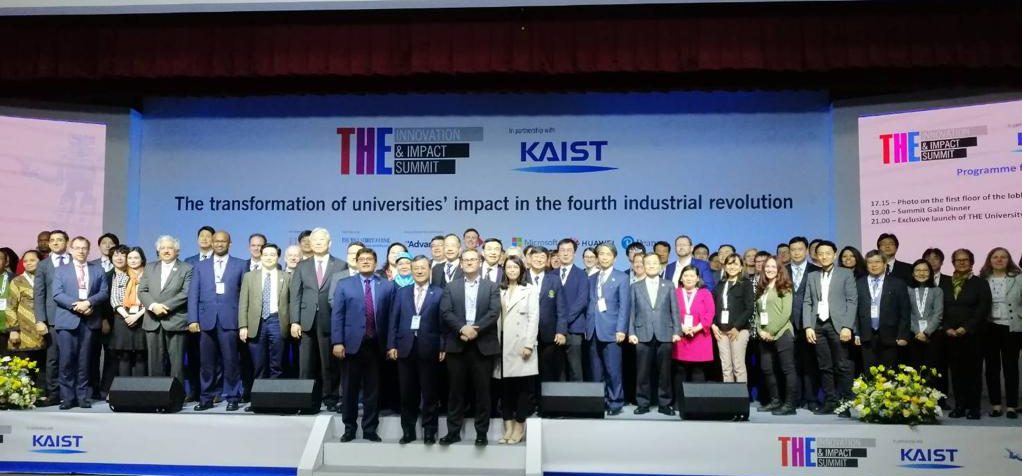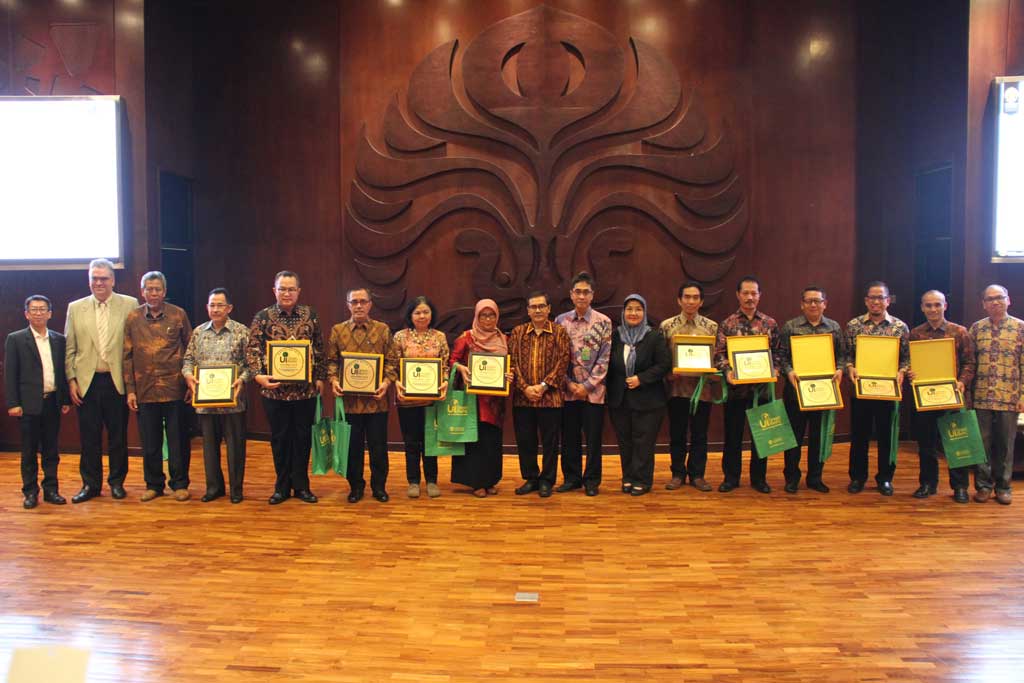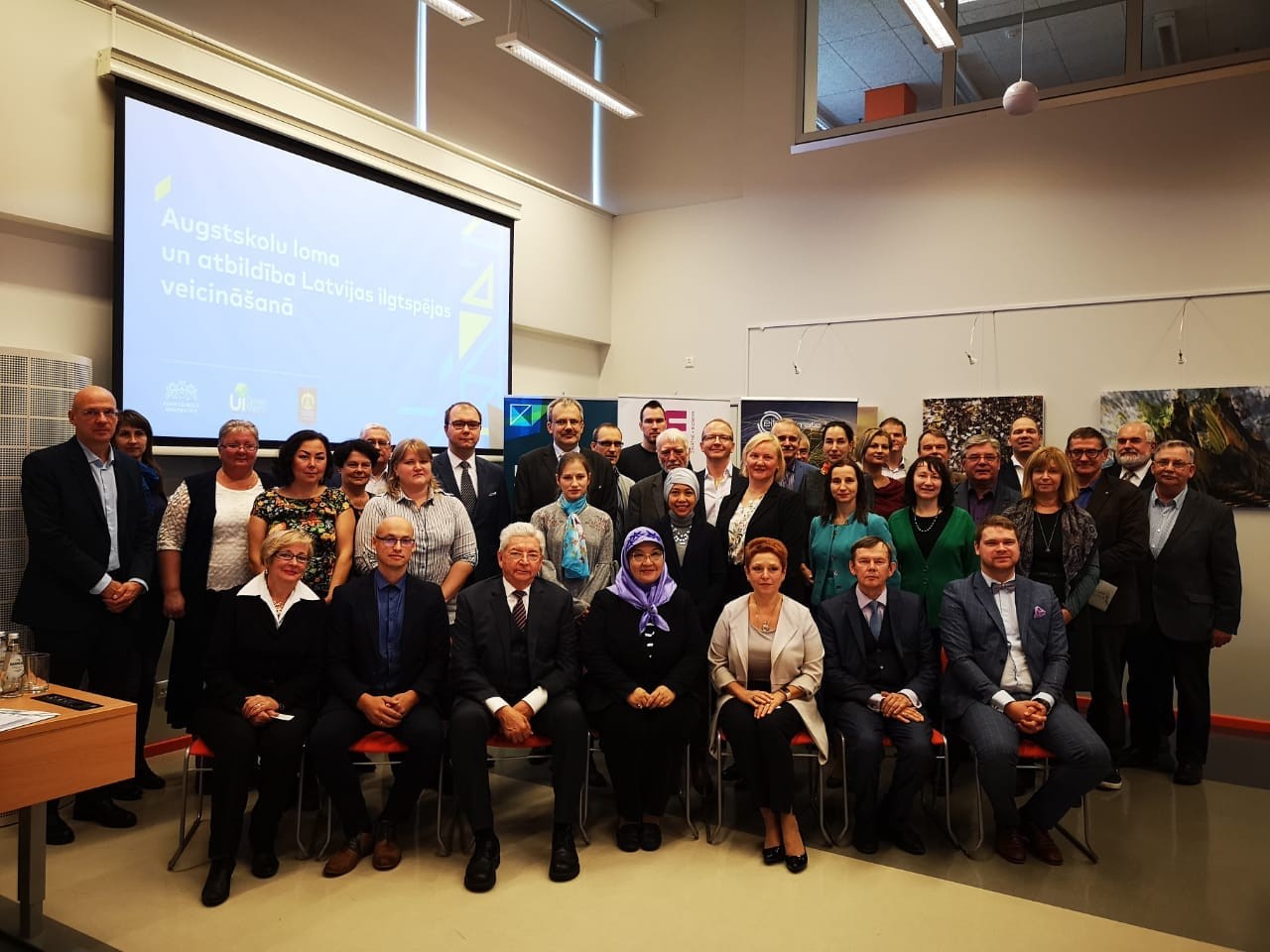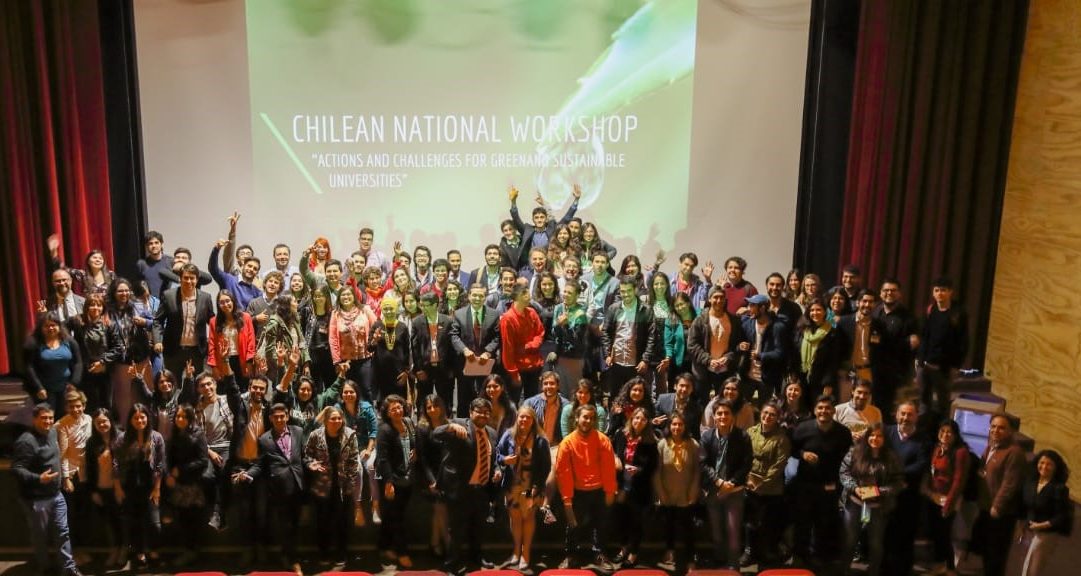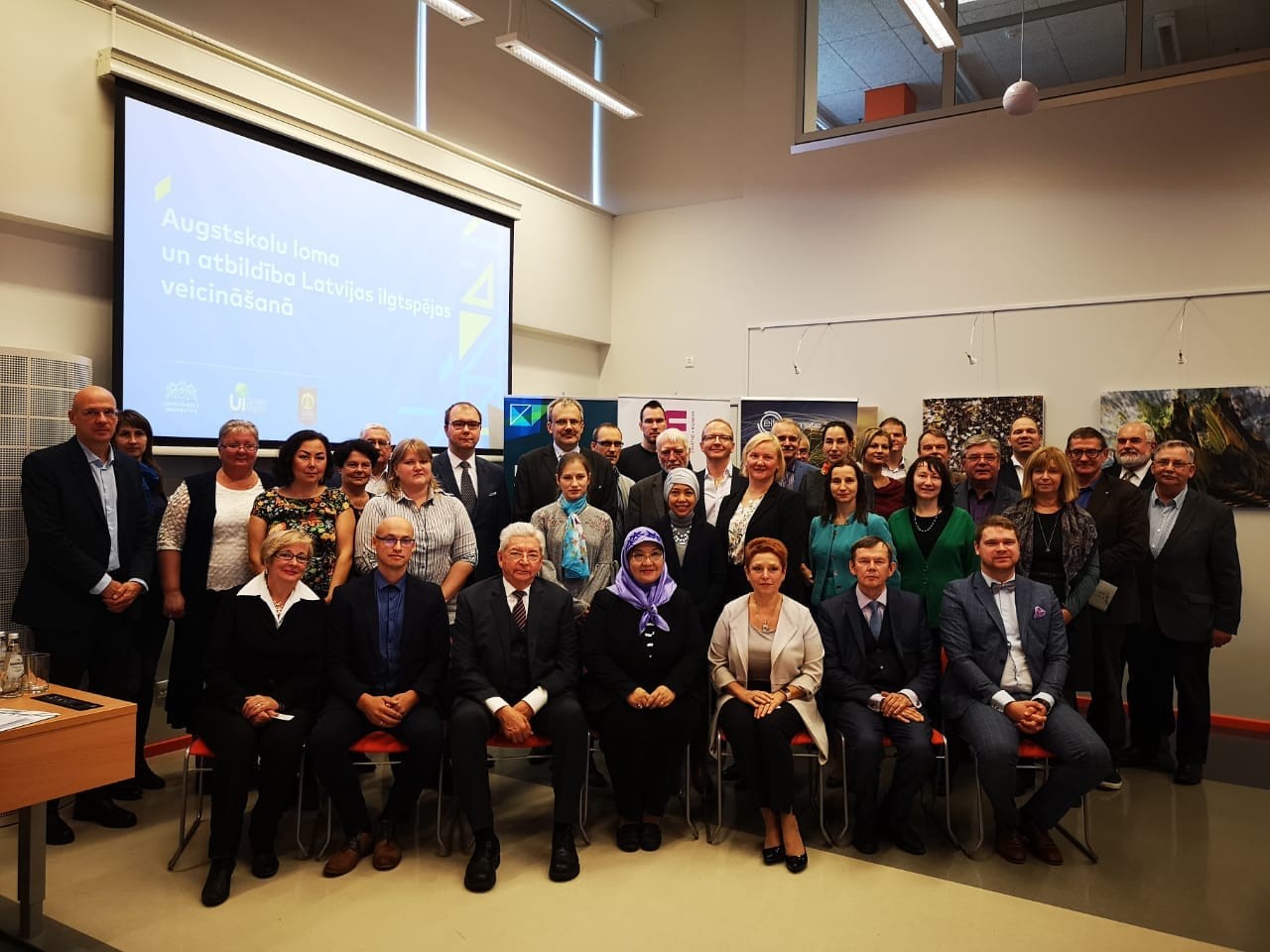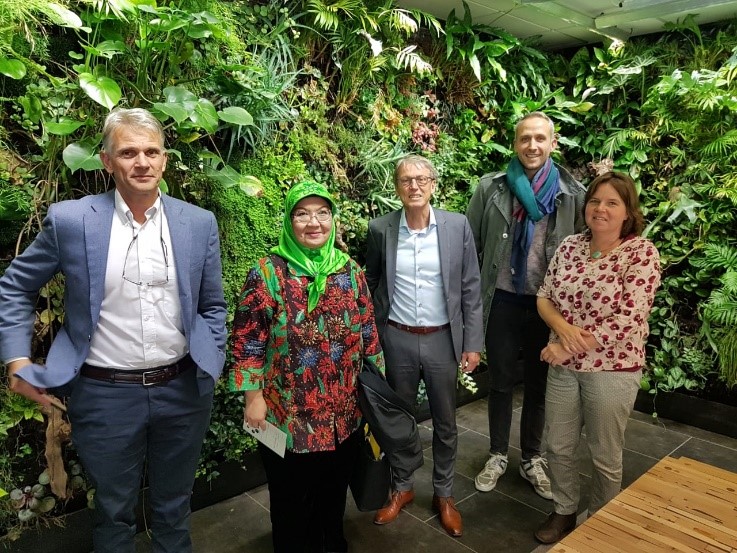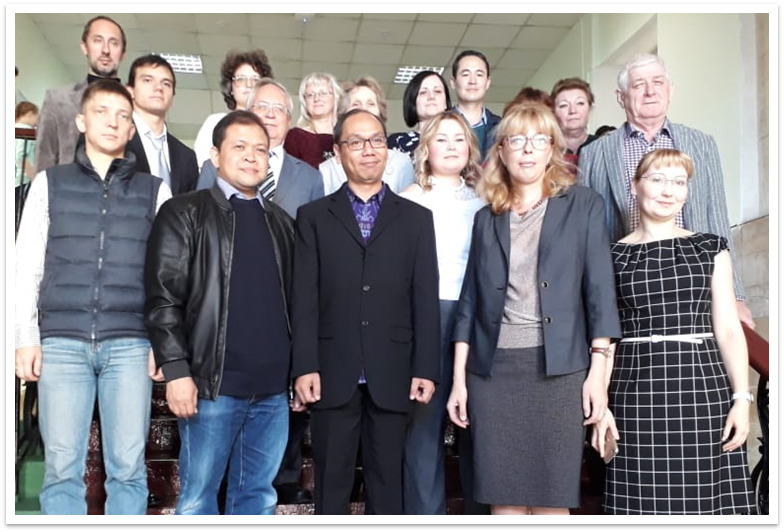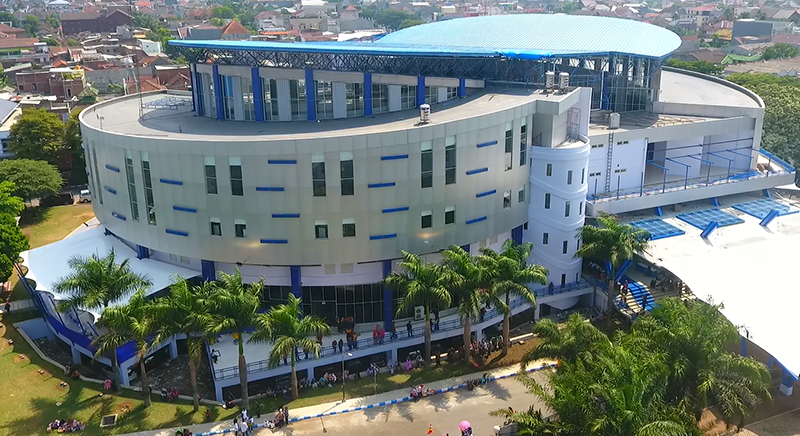| 2026-02-12 14:13:36 |
On the 11th of February of 2026, UI GreenMetric, represented by Dr. Vishnu Juwono, S.E., M.I.A., Head of UI GreenMetric; Sabrina Hikmah Ramadianti, S.Si., as Program, Partnership, and Communications Manager; Riska Putri Hariyadi, S.IP., M.Si., as Communications Coordinator; and Rayhana S.Gz., as Partnership & Program Coordinator, paid an official visit to the Ministry of Higher Education, Science, and Technology to meet with Prof. Dr. Mukhamad Najib, S.TP., M.M., as Director of Institutions at the Ministry of Higher Education, Science, and Technology of the Republic of Indonesia. The meeting was held to strengthen national-level collaboration between UI GreenMetric and higher education institutions across Indonesia to achieve a more sustainable campus environment.
This meeting marks an important step in the goal of a more sustainable higher educational environment. Campuses can help to both increase awareness and foster awareness among students on the importance of sustainable development. The key performance indicators of the Ministry of Higher Education, Science, and Technology have already laid out several ways that campuses can participate in the movement for a more sustainable future.
One of the indicators by the ministry is to give higher educational institutions a mandate to conduct research and spur innovation that can give a positive economic or social impact on an industry or society at large. This can be translated into research into proven sustainable methods in several sectors or even new innovations in various sectors to make them more sustainable. This indicator by the ministry aligns with one of the indicators of UI GreenMetric Sustainable University Rankings that encourages higher education institutions to increase awareness and research on sustainable development. This shows that both parties are committed to strengthening research and awareness.
Another indicator encourages lecturers to engage in off-campus activities within social, governmental, and industrial sectors. This engagement provides opportunities to apply sustainability principles through community service, research collaboration, and industry partnerships. Strengthened collaboration between the Ministry and UI GreenMetric can further leverage these activities to promote sustainability awareness and implement practical initiatives beyond the campus environment. This approach aligns with the vision of UI GreenMetric University rankings to bring sustainable impacts to universities around the world.
Furthermore, UI GreenMetric supports the Ministry’s efforts to advance sustainability across higher education institutions by expanding participation in its university rankings framework. Through benchmarking, evaluation, and guidance, participating universities are encouraged to strengthen sustainable campus practices and improve their environmental performance. Broader participation from Indonesian institutions, including state universities with legal entity status (PTNBH), public universities (PTN), and private universities (PTS), will contribute to more sustainable operations that benefit surrounding communities and industries at the national, regional, and local levels. As an initiative developed and initiated by Universitas Indonesia, UI GreenMetric represents a homegrown Indonesian framework that has earned global recognition, with 1,745 institutions across more than 105 countries currently participating.
This meeting marks an important step in strengthening collaboration between UI GreenMetric and the Ministry of Higher Education, Science, and Technology to advance sustainable development across Indonesia’s higher education sector. Through closer coordination and the integration of the UI GreenMetric framework with the Ministry’s Key Performance Indicators (IKU), more universities, including PTNBH, PTN, and PTS, are encouraged to adopt more measurable sustainability practices in campus operations, research, and community engagement. UI GreenMetric is well positioned to support national efforts in building environmentally responsible and socially impactful campuses. Moving forward, this partnership is expected to accelerate the realisation of a more sustainable future for Indonesian higher education.
Written by Muhammad Dito Rizki Suprapto - Media Relations Intern of UI GreenMetric
Editor by Anin Kumala - Social Media Officer of UI GreenMetric
Dokumentasi:
|
| 2026-02-11 11:03:48 |
On 10 February 2026, UI GreenMetric, represented by Dr Vishnu Juwono, S.E., M.I.A., Head of UI GreenMetric; Dr Abellia Anggi Wardani, S.Hum., M.A. as Vice Chair of UI GreenMetric; Sabrina Hikmah Ramadianti, S.Si., as Program, Partnership, and Communications Manager; and Rahmi, S.Hum., M.Sc., Ph.D., as Operations, Data, and Service Development Manager, held a meeting with the leadership of the Faculty of Engineering at Universitas Indonesia.
The Faculty of Engineering was represented by Prof. Kemas Ridwan Kurniawan, S.T., M.Sc., PhD, Dean; Prof. Dr.-Ing. Ir. Dalhar Susanto, Vice Dean for Resources, Ventures, and General Administration; Dr Eng. Radon Dhelika, B.Eng., M.Eng., Head of Planning, Performance Monitoring, and Education Modernisation Unit; Dr. Imam Jauhari Maknun, S.T., M.T., M.Sc., Manager of Infrastructure and Procurement; as well as Kartika Rahmasari and Vica Asrianti. The meeting took place in the Senate Room of the Faculty of Engineering Dean’s Building, aiming to strengthen institutional ties and explore collaboration toward advancing a sustainable campus at Universitas Indonesia.
The collaboration between UI GreenMetric and the Faculty of Engineering Universitas Indonesia is a strategic step in strengthening sustainability efforts at campus grounds. Both parties have implemented various programmes themed around sustainable development. UI GreenMetric itself has ranked universities at the national and global levels, covering more than 1,745 institutions in over 105 countries and 71 districts and cities in Indonesia, using six indicators to measure organisations' commitment to aspects of sustainable development.
The Faculty of Engineering at Universitas Indonesia has implemented various sustainability initiatives, including the development of the I-CELL building, which has achieved EDGE Advanced Green Building Certification. In recognition of its environmental management efforts, the faculty received the Universitas Indonesia Best Sustainable Faculty for Environmental Management award in 2022, reflecting its strong alignment with the university’s sustainable campus strategy. These efforts were further recognized through its achievement of 2nd place in the UI GreenMetric Faculty Rankings 2025.
This collaboration will focus on strengthening synergies in the planning and implementation of campus sustainability strategies. The potential for cooperation to create new programmes is significant, given that both parties have demonstrated a consistent commitment to sustainable development. Thus, the collaboration between UI GreenMetric and various faculties at Universitas Indonesia is an important step in strengthening the transformation towards a more sustainable campus.
Written by Muhammad Dito Rizki Suprapto - Media Relations Intern of UI GreenMetric
Editor by Anin Kumala - Social Media Officer of UI GreenMetric
Dokumentasi:
|
| 2026-02-10 14:08:24 |
Jakarta, 10 Februari 2026 — UI GreenMetric bekerja sama dengan Bursa Efek Indonesia (IDX) menyelenggarakan Awareness Session bertajuk “Next Practices in Sustainability: Safe-to-fail, Seamless Integration, and Scope 1–3 Emissions” untuk memperkenalkan kerangka UI GreenMetric Sustainable Corporate Rankings kepada pelaku industri. Forum ini menyoroti pentingnya pengukuran emisi gas rumah kaca dan integrasi ESG sebagai strategi bisnis inti perusahaan.
Dalam paparannya, UI GreenMetric menekankan bahwa inisiatif pemeringkatan korporasi ini dibangun di atas rekam jejak panjang UI GreenMetric dalam menilai keberlanjutan universitas dan kota secara global. Hingga 2025, jaringan UI GreenMetric telah mencakup lebih dari 1.700 universitas di lebih dari 100 negara, dan kini diperluas untuk membantu sektor korporasi membangun sistem pengukuran keberlanjutan yang transparan dan dapat dibandingkan.
Kepala UI GreenMetric, Dr. Vishnu Juwono, menyatakan bahwa pemeringkatan ini dirancang sebagai instrumen strategis, bukan sekadar daftar peringkat.
“UI GreenMetric Sustainable Corporate Rankings kami rancang sebagai platform pembelajaran dan transformasi. Tujuannya adalah membantu perusahaan Indonesia mengukur, membandingkan, dan meningkatkan kinerja keberlanjutan secara berbasis bukti, sehingga mampu bersaing di ekonomi rendah karbon,” ujarnya.
Sesi utama membahas tren global emisi gas rumah kaca yang terus meningkat dan implikasinya bagi dunia usaha. Data terbaru menunjukkan bahwa emisi global hampir terus naik sejak awal 2000-an, dengan dampak langsung terhadap biaya operasional, risiko rantai pasok, dan akses pembiayaan perusahaan.
Menurut Prof. Raldi Hendro Koestoer, Ph.D, perubahan iklim kini merupakan risiko bisnis sistemik.
“Emisi gas rumah kaca bukan lagi isu lingkungan semata. Ini adalah risiko bisnis strategis yang memengaruhi stabilitas keuangan, operasi perusahaan, dan daya saing jangkapanjang. Perusahaan yang proaktif mengelola emisi justru membuka peluang efisiensi dan akses pembiayaan hijau,” jelasnya.
Konsep Scope 1, 2, dan 3 emissions menjadi fokus penting dalam diskusi. Scope 3 — yang mencakup emisi sepanjang rantai nilai — sering kali menyumbang 70–90% jejak karbon perusahaan, sehingga kolaborasi dengan pemasok menjadi kunci strategi dekarbonisasi.
Dari perspektif strategi bisnis, Dr. Toto Pranoto menekankan pentingnya integrasi keberlanjutan dalam model operasional perusahaan.
“Keberlanjutan harus diintegrasikan langsung ke strategi korporasi. Pendekatan safe-to-fail memungkinkan perusahaan bereksperimen dengan inovasi hijau secara terukur, sehingga keberlanjutan menjadi sumber penciptaan nilai, bukan beban biaya,” katanya.
UI GreenMetric memaparkan bahwa metodologi pemeringkatan korporasi mencakup empat pilar utama: Lingkungan, Sosial, Tata Kelola, serta Riset & SDGs, dengan penekanan pada bukti publik yang dapat diverifikasi. Pendekatan ini dirancang untuk meningkatkan kredibilitas data ESG dan mengurangi risiko klaim berlebihan (greenwashing).
Dalam presentasinya, Rahmi, Ph.D, Manager Operasional, Data dan Riset UI GreenMetric, menambahkan:
“Kami menekankan keterlacakan bukti dan validasi silang per indikator. Sistem ini membantu perusahaan membangun pelaporan ESG yang konsisten, transparan, dan dapat diaudit.”
Forum ini juga menampilkan contoh praktik terbaik dari perusahaan internasional dan nasional yang telah menerapkan strategi pengurangan emisi melalui efisiensi energi, transisi energi bersih, dan manajemen rantai pasok berkelanjutan. Pendekatan tersebut terbukti dapat menghasilkan penghematan energi signifikan sekaligus memperkuat reputasi perusahaan.
Melalui kolaborasi dengan IDX, UI GreenMetric berharap dapat mempercepat adopsi standar keberlanjutan di kalangan emiten dan memperkuat ekosistem bisnis yang lebih hijau di Indonesia.
“Kami mengajak korporasi Indonesia untuk memanfaatkan pemeringkatan ini sebagai alat strategis untuk benchmarking dan transformasi. Keberlanjutan adalah fondasi daya saing masa depan,” tutup Dr. Vishnu Juwono.
Tentang UI GreenMetric
UI GreenMetric adalah program unggulan Universitas Indonesia yang sejak 2010 menilai komitmen keberlanjutan institusi melalui berbagai pemeringkatan global. Inisiatif terbaru, Sustainable Corporate Rankings, memperluas pendekatan tersebut ke sektor korporasi guna mendorong praktik bisnis berkelanjutan berbasis data.
Dokumentasi Acara:
|
| 2025-12-24 09:13:28 |
Chinese Taipei — 5 December 2025
UI GreenMetric World University Rankings today announced the official results of the 2025 edition during its annual Results and Award Ceremony, hosted at National Chi Nan University (NCNU). The event brought together university leaders, sustainability experts, and partners from around the world to strengthen dialogue and collaboration in sustainable campus development. The 2025 cycle marks a historic milestone for UI GreenMetric, with 1,745 universities from 105 countries participating, an increase from 1,477 universities from 95 countries in the previous edition. This year also welcomes 10 new participating countries, including the Democratic Republic of Congo, Tanzania, Georgia, Tajikistan, Cameroon, the Republic of Cyprus, Mongolia, Northern Cyprus, the Dominican Republic, and Japan.
“As the world’s first sustainability-focused university ranking, UI GreenMetric serves as a platform for shared learning, innovation, and international collaboration,” said Dr. Vishnu Juwono, Chairperson of UI GreenMetric. “The remarkable growth in participation demonstrates the collective commitment of universities worldwide to advance sustainability through research, education, and campus initiatives.”
This significant expansion underscores the growing global recognition of sustainability as a core priority for higher education institutions. As the first university ranking in the world dedicated specifically to sustainability, UI GreenMetric has come a long way since its early years, when it began with only 95 universities from 35 countries. Its evolution reflects a remarkable trajectory of collective progress, strengthened collaboration, and long-term commitment to building a more sustainable future across global campuses.
Since its establishment in 2010 by Universitas Indonesia, UI GreenMetric has developed into the largest global network of sustainable campuses. Its ranking framework, based on 58 indicators across 6 criteria, helps universities measure progress, share best practices, and foster collaboration toward a more sustainable future.
TOP 10 Most Sustainable Universities (2025)
1. Wageningen University & Research
2. University College Cork
3. Nottingham Trent University
4. Umwelt-Campus Birkenfeld (Hochschule Trier)
5. Universidade de São Paulo
6. University of Groningen
7. University of California, Davis
8. University of Connecticut
9. Università di Bologna
10. Universität Bremen
Honourable Awards
• Best New Participating University: Loyola University
• Most Sustainably Improved University: Ontario Tech University
• Most Active University in UI GreenMetric World Rankings: Siam University
The Most Sustainable University in Every Region.
• Africa: Alexandria University
• Asia: Universitas Indonesia
• Europe: Wageningen University & Research
• Oceania: Lincoln University
• Latin America: Universidade de São Paulo
• North America: University of California, Davis
The Most Sustainable University in Each University Criteria
• Setting & Infrastructure: Universidad Autónoma de Nuevo León
• Energy & Climate Change: University College Cork
• Waste Management: Wageningen University & Research
• Water Management: Wageningen University & Research
• Transportation & Mobility: Università di Bologna
• Education & Research: Umwelt-Campus Birkenfeld (Trier University of Applied Sciences)
Special Recognition
• Special Recognition for Hosting the 2025 UI GreenMetric World University Rankings Results and Award Ceremony: National Chi Nan University (NCNU)
Looking ahead, UI GreenMetric will continue its mission in 2026 as a global platform bridging sustainability efforts and strengthening the role of higher education institutions in addressing environmental and social challenges. Through collaboration, data-driven assessment, and knowledge sharing, UI GreenMetric remains cotmmitted to supporting universities worldwide in advancing sustainable campus practices. The data collection and submission period for the 2026 UI GreenMetric World University Rankings will officially open next year, and participating institutions are encouraged to stay tuned to our social media and website for further announcements regarding the timeline and technical guidelines.
Written by: Riska Putri Hariyadi
Galleries:
|
| 2025-12-10 10:49:42 |
Jakarta, Indonesia — 8–9 Desember 2025
UI GreenMetric bekerja sama dengan Badan Pengelolaan Lingkungan Hidup (BPLH) menyelenggarakan Workshop Pengembangan Kriteria Aspek Lebih dari Ketaatan Program Penilaian Peringkat Kinerja Pengelolaan Lingkungan Perusahaan (PROPER). Kegiatan ini dibuka oleh Dr. Rasio Ridho Sani, M.Com., MPM, Deputi Pengendalian Pencemaran dan Kerusakan Lingkungan BPLH sekaligus inisiator PROPER sejak 1995, yang menegaskan komitmen pemerintah dalam memperkuat kolaborasi untuk pengembangan instrumen penilaian yang lebih komprehensif. Kehadiran Dr. Vishnu Juwono, S.E., MIA, selaku Kepala UI GreenMetric, pemeringkatan universitas global yang kini diikuti 1.745 partisipan dari 105 negara, turut menunjukkan sinergi kedua institusi dalam mendorong penguatan indikator keberlanjutan di tingkat nasional dan internasional.
“Melalui PROPER, kami mendorong pengembangan inovasi sosial untuk tidak hanya memenuhi kewajiban minimum, tetapi juga menunjukkan kinerja lingkungan yang inovatif, transparan, dan berdampak nyata. Pengembangan kriteria ‘lebih dari ketaatan’ ini penting untuk memastikan PROPER tetap relevan dengan tantangan lingkungan masa kini serta mampu memotivasi perusahaan menjadi pelopor dalam perlindungan lingkungan. Kolaborasi dengan UI GreenMetric dapat memperkaya pendekatan kami, terutama dalam memperkuat indikator keberlanjutan yang terukur dan kredibel di tingkat nasional.” Ujar Dr. Rasio Ridho Sani, Deputi Pengendalian Pencemaran dan Kerusakan Lingkungan, Badan Pengendalian Lingkungan Hidup (BPLH).
Senada dengan hal tersebut, Dr. Vishnu Juwono, S.E., MIA menyampaikan, “UI GreenMetric kini telah menerapkan asesmen keberlanjutan untuk 1.745 universitas dan 71 kabupaten/kota di Indonesia—sebuah capaian yang menunjukkan besarnya potensi transformasi ketika komitmen dan inovasi dijalankan secara konsisten. Karena itu, kami menyambut baik kolaborasi dengan BPLH dalam pengembangan aspek ‘lebih dari ketaatan’. Inisiatif ini memungkinkan perluasan dampak asesmen kami ke sektor pemerintahan dan perusahaan, sekaligus mendorong praktik pengelolaan lingkungan yang lebih bertanggung jawab serta berkontribusi pada pencapaian target lingkungan nasional.”
Workshop ini melibatkan akademisi, institusi pendidikan, dan para ahli lingkungan untuk memperkuat inovasi sosial melalui penguatan peran institusi pendidikan sebagai pusat pembelajaran, penggerak partisipasi masyarakat, serta fasilitator kolaborasi komunitas dalam mewujudkan praktik keberlanjutan yang inklusif dan berdampak luas. Inisiatif ini juga menjadi ruang kolaborasi antarsektor untuk mempercepat transformasi lingkungan skala nasional.
Sena Pradipta, S.T., M.T., Ph.D. selaku Koordinator Kelompok Kerja (KAPOKJA) Sekretariat PROPER dari Badan Pengelolaan Lingkungan Hidup membuka sesi dengan pemaparan mengenai instrumen PROPER, memperkuat pemahaman peserta terkait mekanisme evaluasi kinerja lingkungan serta arah pengembangan kriteria “lebih dari ketaatan”. Kegiatan ini juga menghadirkan para pakar seperti Prof. Dr. Retno Kusumastuti Hardjono, M.Si. (Universitas Indonesia), Prof. Dr. Fani Cahyandito, S.E., M.Sc. (Universitas Padjadjaran), serta Bahruddin, S.Sos., M.Sc., Ph.D, (Universitas Gadjah Mada) hadir memberikan wawasan mendalam mengenai inovasi sosial, pengembangan nilai keberlanjutan, serta pendekatan Social Return on Investment (SROI) sebagai kerangka pengukuran dampak yang semakin relevan bagi perusahaan maupun lembaga publik.
Workshop ini juga dihadiri oleh berbagai pemangku kepentingan akademik, termasuk Prof. Dr. R. Cecep Eka Permana, Guru Besar Arkeologi Fakultas Ilmu Pengetahuan Budaya Universitas Indonesia, yang berpartisipasi aktif dalam sesi diskusi. Kehadiran beliau memperkaya pembahasan terkait penguatan aspek lebih dari ketaatan, terutama dari perspektif akademik lintas disiplin yang relevan terhadap pengembangan metodologi penilaian lingkungan.
“Keterlibatan akademisi lintas disiplin memperkaya pembahasan, mengingat pengembangan kriteria PROPER ke depan perlu mempertimbangkan konteks multikultural di tingkat masyarakat. Banyak Perusahaan, terutama di sektor tambang dan kehutanan, berinteraksi dengan komunitas yang memiliki nilai budaya kuat dan pandangan tersendiri terhadap lingkungan. Memahami dinamika seperti cara mereka memaknai air, ruang hidup, hingga kosmologi lokal menjadi penting agar penyusunan kriteria lebih komprehensif, relevan, dan sesuai realitas sosial-budaya di lapangan.” Ujar Prof. Dr. R. Cecep Eka Permana.
Melalui kolaborasi strategis antara UI GreenMetric dan BPLH, Indonesia meneguhkan komitmennya untuk mendorong keberlanjutan yang tidak hanya berhenti pada kepatuhan, tetapi mendorong inovasi, integritas, dan dampak yang lebih nyata bagi kualitas lingkungan hidup dan masyarakat di masa depan.
Ditulis oleh: Riska Putri Hariyadi - Spesialis Bidang Komunikasi UI GreenMetric
Galeri Kegiatan:
|
| 2025-11-24 10:34:48 |
On 14th November, UI GreenMetric continued its Seri Pahlawan Lingkungan through the second IG Live Discussion—this time spotlighting the energy and perspective of young sustainability champions. The session, titled “Generasi Muda, Aksi Nyata: Menjadi Pahlawan Keberlanjutan di Era SDGs,” felt like a small but meaningful reminder of how strongly students are driving change in their own circles.
Moderated by Riska Putri Hariyadi (UI GreenMetric Communication Specialist), the conversation brought together three youth leaders who each carry their own approach to sustainability:
The conversation was shaped by three young leaders, Fahrizal Sahdan from UKM KSE UIN Raden Intan Lampung, Fika Nur Sabrina from Universitas Terbuka, and Muhammad Haikal Putra Surya from Universitas Airlangga, each bringing their own experiences to the table. Instead of leaning on grand theories or abstract sustainability jargon, they grounded the discussion in what they know best: the reality of being a student trying to make change happen. Their stories kept circling back to the same idea, that shifts in daily habits, peer influence, and small, consistent actions can quietly reshape campus culture over time.
Fahrizal shared how ecological literacy grows from simple, consistent actions. Through KSE, he and his peers run waste-reduction campaigns, tree-planting activities, and environmental education sessions. His stories reflected a belief that change often begins quietly—with one person choosing a reusable bottle or inviting a friend to join a community clean-up.
Fika offered a broader lens, shaped by her journey in ISLMS. Her exposure to diverse discussions and cross-campus collaborations helped her see that sustainability is never the work of one discipline alone—it is influenced by public policy, social dynamics, education, and everyday human behavior. She noted that programs like ISLMS give students the confidence to speak up, connect issues across sectors, and design projects that have the potential to outlive their university years.
Haikal brought a governance-focused lens through his role as an SDGs Ambassador, emphasizing how sustainability can be woven into campus policies and student organizations. He reminded us that youth activism isn’t only about loud movements—often, it’s about quietly reshaping systems from within. Guided by the SDGs as a clear framework, he underscored the value of multisector collaboration and communicating sustainability in formats that resonate with Gen Z. One of the program he leads as SDGs Ambassor is by implementing SDGs gamification on campus showed how learning can become more interactive, relevant, and engaging for today’s students.
Across the session, a common thread emerged: students are uniquely positioned to accelerate sustainability both on campus and in their communities. Their ideas are fresh, their networks are wide, and their commitment often comes from a very personal place, concern for their future.
This IG Live discussion offered a glimpse into the growing ecosystem of young sustainability leaders in Indonesia. It also reaffirmed UI GreenMetric’s commitment to nurturing student initiatives, encouraging collaboration, and creating more spaces where youth voices can be heard and celebrated.
Written by Riska Hariyadi - Communication Specialist
|
| 2025-11-23 19:43:43 |
7 November 2025, As part of its ongoing commitment to strengthening sustainability practices in higher education, UI GreenMetric hosted an Instagram Live Discussion titled “Dari Limbah Jadi Manfaat: Mewujudkan Kehidupan yang Lebih Berkelanjutan.” The conversation brought together three leading academics in Indonesia’s sustainability landscape: Prof. Dr. H. Fatah Sulaiman, S.T., M.T., Rector of Universitas Sultan Ageng Tirtayasa; Prof. Ir. Wiratni, S.T., M.T., Ph.D., IPM., Secretary of the Directorate of Partnership and Global Relations at Universitas Gadjah Mada; and Prof. Dr. Prabang Setyono, M.Si., Head of the Doctoral Program in Environmental Science at Universitas Sebelas Maret. The session was moderated by Jauzak Hussaini W., M.T., representing UI GreenMetric.
The discussion expanded the view of waste management from a purely technical issue to a strategic opportunity for universities to shape values, shift everyday habits, and build a culture of environmental responsibility. With thousands of people interacting on campus each day, the speakers noted that universities naturally become microcosms where sustainable practices can take root and eventually influence broader communities.
The discussion collectively emphasized that effective waste management in universities requires more than technological upgrades—it demands institutional commitment, human-centered approaches, and strong academic involvement. The speakers highlighted how clear policies and supportive leadership provide the structural backbone for sustainability initiatives, while awareness-building and behavioral change remain essential for ensuring that systems function in practice. They also agreed on the pivotal role of research and student participation: campuses thrive as “living laboratories” when students, lecturers, and researchers collaborate to test ideas, develop innovations, and translate academic work into real solutions. Through this synergy of leadership, culture, and academic engagement, universities are uniquely positioned to shape sustainable habits that extend well beyond campus life.
Throughout the session, the speakers shared a unified view: waste is not merely an operational challenge but a strategic opportunity to build a culture of circularity and environmental stewardship. When universities treat waste as a valuable resource rather than a burden, they can significantly reduce emissions, strengthen campus ecosystems, and inspire sustainable behavior that students will carry with them long after graduation.
This discussion reaffirms UI GreenMetric’s commitment to fostering knowledge exchange among universities and supporting stronger leadership in sustainability. By enhancing waste treatment strategies and embedding sustainability into everyday academic life, higher education institutions can amplify their influence far beyond campus boundaries.
Written by: Riska P. Hariyadi - Communication Specialist of UI GreenMetric
|
| 2025-11-19 13:23:57 |
Bandung, 24 August 2025 — Telkom University (Tel-U), a long-time partner of the UI GreenMetric World University Rankings Network, welcomed Minister of Higher Education, Science, and Technology Prof. Brian Yuliarto, Ph.D., on Monday in a visit highlighting the institution’s efforts to strengthen both academic quality and sustainability practices.
Prof. Brian was received by officials from LLDIKTI Region IV, the YPT Board of Directors, and the university leadership before delivering a keynote speech at Tel-U’s Academic Assignment Meeting for the 2025/2026 academic year. Prior to the session, he toured one of the campus’s key environmental initiatives: its waste incinerator facility.
Developed in collaboration with Bandung Techno Park, the incinerator processes non-recyclable waste using a fuel blend of solar and water. The system is equipped with a three-stage filtration mechanism that reduces harmful emissions, enabling cleaner exhaust release. The remaining ash is later repurposed into cement mixtures used for sidewalk repairs on campus, reflecting Tel-U’s commitment to circular waste practices.
The facility forms part of Tel-U’s integrated waste management program, known as I-Want, which oversees waste from generation to final processing. Under this system, organic waste is converted into compost, while inorganic materials that cannot be recycled are directed to the incinerator. University officials say the approach aims to reduce the campus’s environmental footprint through more effective waste handling.
Telkom University’s operation of the incinerator aligns with the assessment criteria used by UI GreenMetric, particularly those concerning waste management, infrastructure and climate action. The ranking system places emphasis on not only policy development but also the actual implementation of sustainability measures. Tel-U’s incinerator serves as an example of how universities can adopt practical, technology-based solutions to address waste challenges while creating added value from residual materials.
The minister’s visit underscored the growing expectation for higher education institutions to contribute to national sustainability goals. His engagement at Telkom University highlighted the essential role of universities in advancing environmental stewardship alongside academic excellence.
Emphasizing the importance of relevance and societal impact, the Minister stated, “Civitas academica must create, understand industry needs, and respond to the needs of society. With the spirit of Diktisaintek Berdampak, let us move forward together toward Indonesia Emas 2025.”
As an active member of the UI GreenMetric global network, Telkom University has consistently participated in the annual evaluation and has undertaken a range of initiatives to improve its environmental performance. UI GreenMetric noted that the minister’s visit reaffirmed Tel-U’s commitment to implementing measurable and forward-looking sustainability practices.
University leaders said they hoped their efforts would encourage other higher education institutions in Indonesia and abroad to strengthen their environmental policies and adopt technologies that support long-term sustainability.
Written by: Riska Putri Hariyadi – Communication Specialist of UI GreenMetric
Galleries:
|
| 2025-10-28 11:08:12 |
23 October 2025, Lhokseumawe — The Seminar Nasional (SEMNAS) 2025 at Politeknik Negeri Lhokseumawe (PNL) marked a significant step forward in strengthening the partnership between UI GreenMetric World University Rankings and Indonesian higher education institutions in accelerating sustainability transformation.
With a focus on innovation, collaboration, and sustainable campus development, the event brought together experts, academics, and policymakers who are collectively driving the implementation of the Sustainable Development Goals (SDGs) through education, research, and institutional leadership.
Representing UI GreenMetric, Dr. Vishnu Juwono, S.E., MIA, a distinguished professor from Universitas Indonesia, delivered a keynote presentation titled “Green Campuses in Achieving the SDGs: Accelerating Together with UI GreenMetric.” His talk underscored how UI GreenMetric serves as both a benchmarking framework and a collaborative platform that helps universities measure, manage, and accelerate their sustainability performance.
“Sustainability is not only about data collection—it is about building systems that inspire continuous improvement and collaboration. Through UI GreenMetric, we empower universities like Politeknik Negeri Lhokseumawe to align their strategies with the SDGs and take tangible action on campus,” said Dr. Juwono.
The collaboration between UI GreenMetric and PNL reflects a shared commitment to making sustainability a core institutional value. PNL has actively engaged in sustainability-oriented initiatives—ranging from energy efficiency and waste reduction to community-based projects—that align with the UI GreenMetric indicators. This partnership also facilitates capacity building and mentoring, enabling PNL to strengthen its internal systems and integrate sustainability into teaching, operations, and community engagement.
Through this engagement, PNL not only enhances its sustainability ranking but also contributes meaningfully to national and global efforts toward achieving the SDGs. The collaboration embodies UI GreenMetric’s vision of creating networks of action, where universities serve as living laboratories for environmental stewardship and social innovation.
The SEMNAS 2025 event served as a platform for dialogue and shared learning—demonstrating how institutions can transform sustainability commitments into measurable outcomes. By continuing to collaborate with the UI GreenMetric network, Politeknik Negeri Lhokseumawe strengthens its role as a leading example of how vocational and applied universities can translate sustainability principles into practice.
Together, UI GreenMetric and Politeknik Negeri Lhokseumawe reaffirm their shared vision—building campuses that lead change, nurture innovation, and drive Indonesia’s higher education institutions toward a more sustainable future.
Written by: Riska Putri Hariyadi
Galleries:
|
| 2025-10-23 10:29:54 |
18 October 2025, Makassar — The Politeknik Pariwisata Makassar successfully hosted the 2nd International Conference on Marine Tourism and Hospitality Studies (IConMTHS 2025) at the Soesilo Soedarman Auditorium, gathering prominent experts, academics, and practitioners to discuss the future of sustainable tourism and hospitality.
Among the distinguished speakers was Prof. Dr. Raldi Hendro T. Koestoer, M.Sc., APU, Assessor of UI GreenMetric World University Rankings, who delivered a keynote presentation titled “Advancing Sustainable Marine Tourism through UI GreenMetric and the SDGs Framework.” His talk explored how sustainability principles embedded in the UI GreenMetric indicators can guide tourism and hospitality institutions—especially vocational universities—in implementing measurable, impactful sustainability practices.
Prof. Koestoer emphasized that the UI GreenMetric framework, built upon education, research, operations, and community engagement, provides an integrative model that resonates strongly with the vocational education approach. For institutions like Politeknik Pariwisata Makassar, this framework offers a clear pathway to link classroom learning with real-world sustainability initiatives in marine tourism and coastal resource management.
“The tourism sector holds a crucial role in achieving the Sustainable Development Goals (SDGs), particularly in areas such as responsible consumption, life below water, and climate action,” Prof. Koestoer stated. “Through the UI GreenMetric framework, vocational higher education institutions can embed sustainability principles into both their curriculum and campus operations, preparing students to become drivers of change in the tourism industry.”
The conference brought together participants from Indonesia, Australia, Malaysia, and Sri Lanka, featuring sessions on sustainable destination management, community-based tourism, and innovation in hospitality education.
By engaging with the UI GreenMetric network, Politeknik Pariwisata Makassar reinforces its commitment to advancing sustainability in vocational education and tourism. The collaboration highlights how vocational institutions can serve as living laboratories for sustainability, translating education, research, and innovation into tangible contributions toward a more sustainable and inclusive tourism future.
UI GreenMetric encourages the active participation of vocational higher education institutions to adopt the UI GreenMetric methodology. This collaboration offers mutual benefits—enhancing institutional performance while supporting the broader practical sphere of sustainable development. Vocational institutions, through their hands-on and applied learning models, play an essential role in implementing sustainability at the community level, bridging policy, practice, and education in transformative ways.
Written by: Riska Putri Hariyadi
Galleries:
|
| 2025-10-22 09:51:48 |
17 October 2025, Bandar Lampung — Universitas Lampung (UNILA) hosted a hybrid workshop titled “Developing Sustainability Reports in Higher Education Institutions to Support SDGs Achievement,” in collaboration with UI GreenMetric World University Rankings. The event aimed to strengthen the capacity of universities in preparing sustainability reports that align with the Sustainable Development Goals (SDGs) and promote institutional accountability in sustainable development.
The workshop brought together university leaders, sustainability practitioners, and academic experts to discuss strategies for enhancing transparency and reporting mechanisms in higher education. The program began with welcoming remarks from UNILA leadership, followed by insightful sessions featuring distinguished speakers.
Representing UI GreenMetric, Rahmi, S.Hum., M.Sc., Ph.D., Expert Member of Service Development, Research, and Data Management, joined the event virtually as a speaker in the first session on “The Role of Universities in Achieving the SDGs.” Her presentation underscored the importance of integrating sustainability into university governance, operations, education, and community engagement to accelerate progress toward the SDGs.
The second session, led by Dr. Bayu Arie Fianto, Chair of the Indonesia SDGs Center Network, provided technical guidance on “Developing Sustainability Reports in Higher Education.” Participants then engaged in an interactive panel discussion and a short simulation exercise, allowing them to apply reporting frameworks and data management approaches in practice.
Conducted in a hybrid format, the workshop enabled both onsite and online participants to share knowledge and best practices. As one of UI GreenMetric’s active partners, UNILA continues to demonstrate its commitment to advancing sustainability and improving institutional reporting standards.
Through initiatives like this, UI GreenMetric reinforces its mission to empower universities worldwide by promoting collaboration, capacity building, and continuous improvement in sustainability performance aligned with the SDGs.
Written by Riska Putri Hariyadi - Communication Specialist
Galleries:
|
| 2025-10-17 14:30:42 |
14–16 October 2025, Surabaya — Over three inspiring days, student delegates from universities across Indonesia gathered at Universitas Airlangga (UNAIR) for The 5th National Student Leaders on Sustainability Meeting (NSLSM), held from 14 to 16 October 2025 in collaboration with UI GreenMetric World University Rankings. The event served as a dynamic platform for young changemakers to exchange ideas, explore best practices in sustainability, and strengthen their role in driving collective environmental action for a more sustainable future.
Throughout the program, participants experienced a rich blend of field exploration, academic dialogue, and collaborative learning. The meeting began with a visit to Mangrove Wonorejo, where students learned firsthand about the importance of mangrove conservation for climate resilience and coastal protection. Guided by local farmers, they joined hands in planting mangrove seedlings—an act symbolizing their shared commitment to restoring and preserving Indonesia’s coastal ecosystems.
The subsequent discussions and seminar sessions brought together experts from UI GreenMetric, the East Java Environmental Agency (DLH), PDAM Surya Sembada, and sustainability practitioners from various sectors. Participants explored key aspects of sustainability leadership, environmental management, and the integration of Sustainable Development Goals (SDGs) into university programs. The entire program also reflected one of the main criteria of the UI GreenMetric methodology—Education and Research—by encouraging students to engage in hands-on learning, critical discussions, and evidence-based approaches to addressing environmental challenges.
“On this fifth commencement of the National Student Leaders on Sustainability Meeting, we continue to carry the message that youth are the pivotal actors shaping our sustainable future. Through this venue, we encourage students to engage in discourse, debate, and collaboration—turning ideas into meaningful actions that support sustainability in their universities and communities,” said Dr. Vishnu Juwono, S.E., MIA., Ph.D., Chairperson of UI GreenMetric World University Rankings.
The final day showcased the creativity and leadership of participants through a series of student project presentations, culminating in the NSLSM Awards ceremony recognizing the most innovative initiatives in campus sustainability.
NSLSM Awards 2025 Winners
1st Place: Group 1 – Institut Teknologi Sepuluh Nopember (ITS) & Universitas Airlangga
2nd Place: Group 9 – Universitas Hasanuddin & Universitas Indonesia
3rd Place: Group 10 – Politeknik Negeri Bali & Universitas Pendidikan Ganesha
Special Recognitions
Best Speaker: Riva Rizkiana Ramadhani (ITS)
Best Essay: ITS
Most Active Participant: Puan Maharani (Universitas Hasanuddin)
The event concluded with a gala dinner celebrating collaboration, friendship, and the shared vision of advancing sustainability across Indonesia’s higher education institutions.
UI GreenMetric extends its sincere gratitude to Universitas Airlangga for its warm hospitality and outstanding partnership in hosting this year’s meeting. Through this collaboration, the 5th NSLSM once again reaffirmed the vital role of youth in building a more sustainable and inclusive future—where learning, action, and research come together to shape real change for the planet.
Written by Riska P. Hariyadi - Communication Specialist UI GreenMetric
Galleries:
|
| 2025-10-08 14:20:28 |
8th October, 2025- The EURAS Webinar Series recently hosted an insightful session titled “Sustainability and UI GreenMetric in Higher Education,” highlighting the vital role of universities in advancing global sustainability efforts. The event brought together experts and leaders in sustainability and higher education to discuss innovative frameworks and collaborative strategies for a greener future.
The webinar was hosted by EURAS (Eurasian Universities Union) and featured distinguished speakers from UI GreenMetric World University Rankings, led by Dr. Vishnu Juwono, Chairperson of UI GreenMetric, and Dr. Abellia Anggi Wardhani, Vice Chairperson of UI GreenMetric. Also joining the session was Prof. Olgun Çiçek, Board Director of the International Network for Quality Assurance Agencies in Higher Education (INQAAHE), who served as both host and moderator.
The session began with opening remarks delivered by Prof. Olgun Çiçek and Dr. Vishnu, who emphasized the growing importance of sustainability as a central theme in shaping the future of higher education institutions worldwide. They both underlined the shared responsibility of universities to embed sustainability into their policies, research, and community engagement.
In the main presentation, Dr. Abellia introduced UI GreenMetric as a pioneering global ranking framework that promotes sustainability practices in higher education. She elaborated on the initiative’s mission, core indicators, and data submission process, explaining how it measures universities’ sustainability performance across six key areas: Setting & Infrastructure, Energy & Climate Change, Waste, Water, Transportation, and Education & Research.
Dr. Abellia further highlighted UI GreenMetric’s growing influence in driving behavioral and cultural change within universities and fostering international collaboration to support the United Nations Sustainable Development Goals (SDGs).
The webinar concluded with a Q&A session moderated by Prof. Olgun Çiçek, where the questions asked centered around issues such as university collaboration, behavioral change, data validation, and critiques of higher education rankings. This engaging exchange underscored UI GreenMetric’s commitment to transparency continuous improvement, and its role as a collaborative platform supporting institutions worldwide in their sustainability journey.
UI GreenMetric invites universities around the world to embrace our sustainability framework and join the global movement toward greener campuses.
The data collection for UI GreenMetric World University Rankings 2025 is still open until 31 October 2025. Be part of this transformative initiative — join 1,477 universities from 95 countries already working to advance sustainability within their institutions.
Written by: Riska Putri Hariyadi
Galleries:
|
| 2025-10-08 08:27:17 |
Madiun, 2 October 2025 — The Universitas Indonesia (UI), through its initiative UI GreenCityMetric, officially opened the 2025 UI GreenCityMetric Awards in Madiun, East Java. This year marks a significant milestone, with 71 cities and regencies participating—an increase from 64 in 2024—demonstrating stronger regional commitment to building a sustainable Indonesia.
More than just a ranking, UI GreenCityMetric serves as a collaborative platform that brings together local governments to share best practices and drive collective progress. With six main criteria—Setting and Infrastructure, Energy and Climate Change, Waste Management, Water Management, Access and Mobility, and Governance. The ranking framework not only measures sustainability performance but also encourages real transformation toward greener, more inclusive, and resilient urban development.
Dr. Vishnu Juwono, Head of UI GreenMetric, emphasized that Universitas Indonesia’s vision is to safeguard a sustainable future through various initiatives—ranging from global university rankings to city-level assessments across Indonesia. “We truly appreciate the spirit of Madiun City and its leadership for warmly hosting the 2025 UI GreenCityMetric Awards. Madiun has shown consistent commitment to sustainability, proven by its outstanding achievements in both 2024 and this year. We hope this inspires other regions to follow their example,” said Dr. Juwono.
The awarding ceremony, held at Hotel Mercure Madiun, celebrated the dedication and progress of local governments in advancing the Sustainable Development Goals (SDGs) through concrete actions at the city and regency level. This event was held in a hybrid format, with participants joining both onsite and online via Zoom and YouTube Live streaming, reflecting UI GreenMetric’s inclusive and collaborative spirit.
Recognizing Indonesia’s Most Sustainable Cities
The top three most sustainable cities in Indonesia for 2025 exemplify strong leadership and innovation in implementing sustainability measures:
1. Surabaya City — recognized as the Most Sustainable City in Indonesia 2025 for its outstanding achievements across multiple environmental and governance criteria.
2. Madiun City — ranked second, highlighting its excellence in Access and Mobility and Waste Management.
3. Semarang City — ranked third, excelling in Governance and Setting & Infrastructure.
These cities stand as models of how local governments can integrate sustainability principles into daily urban management and policy implementation, directly contributing to Indonesia’s SDG agenda.
Alongside these top three cities—Surabaya, Madiun, and Semarang—the UI GreenCityMetric Awards 2025 also recognized other outstanding regions that made it into the Top 10 Most Sustainable Regencies and Cities in Indonesia: Medan City, Kediri City, Salatiga City, Banjarbaru, Trenggalek Regency, Wonogiri Regency, and Magelang City. Each of these regions has demonstrated exceptional commitment, innovation, and continuous improvement in implementing sustainability principles within their local development agendas.
The 1st Winners in Each Key Indicator of UI GreenCityMetric 2025
• Setting and Infrastructure: Bontang City
• Energy and Climate Change: Medan City
• Waste Management: Surabaya City
• Water Management: Medan City
• Access and Mobility: Madiun City
• Governance: Semarang City
UI GreenMetric Special Awards:
• Best Improvement in Sustainability Performance: Banjarmasin City
• Best New Participant: Malang City
A Celebration of Collaboration and Local Leadership
The UI GreenCityMetric Awards 2025 also celebrated the leadership and dedication of the Mayor of Madiun, who graciously welcomed the event, and Ir. Suwarno, M.Si, Head of Bappeda Madiun, who served as the Organizing Committee Chair alongside his exceptional local team. Their coordination and hospitality ensured the event’s success as a platform for partnership and shared learning among Indonesian regions.
During this celebration of 71 successful collaborations among regencies and cities across Indonesia, the host city invited representatives from UI GreenMetric and regional delegations to visit TPA Winongo, one of Madiun’s exemplary waste management sites. The facility showcases the city’s ongoing efforts and innovations in improving waste management systems to address urban waste challenges effectively and sustainably.
The UI GreenCityMetric Awards 2025 reaffirm the importance of city and regency governments as the frontline actors in implementing the SDGs—transforming sustainability from national policy into local action. As the initiative continues to grow, it embodies the power of collaboration, innovation, and shared learning to create a greener and more resilient Indonesia.
For full ranking details, visit: https://greenmetric.ui.ac.id/city/ranking/ranking-keseluruhan-2025
Writer: Riska Putri Hariyadi
Galleries:
|
| 2025-10-07 08:36:26 |
Semarang, 30 September 2025 - Universitas Negeri Semarang (UNNES), known as a Conservation Campus and an active member of the UI GreenMetric network, continues to demonstrate its strong commitment to global sustainability efforts. This commitment was evident in the recent Empower Roadshow: Driving Sustainable Energy Transition, a hybrid seminar that engaged over 190 participants, including students, lecturers, and members of the wider community.
The event was organized by the Sub-directorate of Conservation at UNNES in collaboration with PT PLN Indonesia Power and supported by the Akar Banir Indonesia Foundation. The roadshow was designed as a multi-stakeholder dialogue, bringing together academia, government, industry, and civil society to raise awareness, build synergy, and encourage youth participation in the sustainable energy transition. As a media partner, UI GreenMetric recognizes that this initiative aligns closely with its core focus areas, especially education and research, energy and climate change, and social engagement.
The seminar began with an opening speech by UNNES Vice Rector I, Prof. Dr. Zaenuri, M.Si., Akt., followed by a welcome from PLN representative F. Erwin Putranto. Three main speakers shared their insights: Prof. Dr. Eng. Eniya Listiani Dewi, a national expert in renewable energy, Windy Febriasari from PLN Indonesia Power, and Prof. Samsudin Anis, Ph.D., a UNNES professor who emphasized the vital role of higher education in driving energy transformation. In addition to increasing knowledge, the seminar successfully generated practical ideas and collaboration opportunities across sectors. This shows how universities can play a key role in accelerating the national energy transition, not only through research but also through advocacy and community outreach.
As a Green Campus, UNNES has consistently demonstrated leadership in implementing sustainable campus practices in Indonesia. This includes its active participation in the UI GreenMetric ranking methodology and the application of effective measures related to clean energy, green transportation, waste management, and environmental conservation within the university.
UI GreenMetric appreciates initiatives like the Empower Roadshow, which contribute to strengthening the role of universities in achieving sustainability goals. Moving forward, UNNES is expected to continue inspiring other higher education institutions, both nationally and globally, to lead efforts in building a cleaner, greener, and more equitable energy future.
Written by: Riska Putri Hariyadi
Galleries:
|
| 2025-10-06 10:41:43 |
September 2025, UI GreenCityMetric (UIGCM) held a series of Info Sessions in collaboration with several regional LLDIKTI offices to promote sustainable campus development across Indonesian private universities. These sessions aimed to introduce the UIGCM framework and foster meaningful partnerships to support green transformation in higher education.
The sessions were held with LLDIKTI Region IX and XVI on September 4, followed by Region II and III on September 11, and concluded with Region VI on September 26. Each gathering provided a platform for discussion on the role of universities in addressing environmental challenges and implementing sustainability strategies based on the UIGCM indicators.
For private universities, UIGCM offers more than a ranking—it serves as a practical tool for assessing campus sustainability performance, setting measurable goals, and gaining recognition both nationally and globally. It also helps align university development with global commitments such as the Sustainable Development Goals (SDGs).
Collaboration with LLDIKTI plays a vital role in scaling this impact. As the main facilitators of higher education development across regions, LLDIKTI offices are key partners in encouraging private universities to take part in sustainability initiatives and to build capacity in campus greening efforts.
We would like to extend our deepest appreciation to the LLDIKTI leaders who participated and shared their perspectives: Dr. Andi Lukman, M.Si. (Region IX), Munawir Sadzali Razak, S.IP., M.A. (Region XVI), Prof. Dr. Iskhaq Iskandar (Region II), Dr. Henri Tambunan (Region III), and Prof. Dr. Ir. Aisyah Endah Palupi, M.Pd. (Region VI). Their presence and encouragement reflect strong institutional support for advancing sustainability in higher education.
UI GreenCityMetric looks forward to continued collaboration with LLDIKTI and private universities nationwide to cultivate campuses that are not only academically excellent, but also environmentally responsible and future-ready.
Written by: Riska Putri Hariyadi
Galleries:
|
| 2025-10-06 09:35:15 |
On September 26–27, 2025, Venezuela held its first-ever National Workshop on Sustainable Universities, hosted by Universidad Privada Dr. Rafael Belloso Chacín (URBE) in collaboration with the UI GreenMetric World University Rankings. Held in a hybrid format at the Universitaria campus in Maracaibo, the event brought together university leaders, researchers, and sustainability advocates to advance climate-conscious, socially inclusive practices across higher education.
The two-day workshop featured more than 25 lectures, keynote speeches, book baptisms, and institutional showcases. Universities from across Venezuela shared best practices aligned with UI GreenMetric’s six core indicators: infrastructure, energy, waste, water, transportation, and education. It marked a turning point in national efforts to integrate sustainability into teaching, research, and campus operations.
Joining the event virtually from Indonesia, UI GreenMetric Chairperson Dr. Vishnu Juwono and Vice Chair Dr. Abellia Anggi Wardani expressed strong support for Venezuelan universities to embrace the ranking and collaborate in achieving the Sustainable Development Goals (SDGs). Their presence underscored the truly global nature of the GreenMetric framework, which now connects institutions across continents through shared data and climate action.
In her opening remarks, Dr. Diana Belloso Montiel, Rector of URBE, reaffirmed the university’s commitment to sustainability as a strategic pillar of transformation. Keynotes from Dr. Luis Arrias and Dr. José Solano further emphasized the urgency of institutional leadership in climate resilience and green innovation, especially in the context of Venezuela’s evolving academic landscape.
Representatives from major universities—including UCV, ULA, USB, UNEG, and others—actively contributed ideas and initiatives, demonstrating a strong national commitment to environmental responsibility. From green building to digital inclusion, their presentations showcased local responses to global challenges.
Participants were also reminded that data submission for the UI GreenMetric World University Rankings 2025 remains open until 31 October. All universities are encouraged to take part in this global initiative and benchmark their progress. The official results will be announced in Taiwan in early December 2025, marking another milestone in global collaboration for a more sustainable higher education system.
Written by: Riska P. Hariyadi
Galleries:
|
| 2025-10-06 09:25:32 |
On September 23-25, Universitas Terbuka (UT) hosted the Galeri Pembelajaran Jarak Jauh (PTJJ) UT 2025 in collaboration with the UI GreenMetric World University Rankings, bringing together university leaders, policymakers, and sustainability experts from across Indonesia. Held at the Universitas Terbuka Convention Center in South Tangerang, this two-day national forum served as a dynamic platform to advance innovation in higher education through the integration of sustainable campus practices and inclusive, technology-driven learning systems that support the Sustainable Development Goals (SDGs).
As the country’s pioneer in distance education, UT has consistently demonstrated that expanding educational access can go hand in hand with environmental stewardship. The event showcased how digital learning models not only democratize education but also significantly reduce the environmental footprint of higher education. UT reaffirmed its commitment to ensuring that its institutional practices and infrastructure are aligned with both national sustainability frameworks and global environmental standards.
The importance of the event was further underscored by the presence and support of key government officials. Nezar Patria, Vice Minister of Communication and Digital Affairs, emphasized the strategic role of digital transformation in education and sustainability, particularly in bridging disparities across regions. Rasio Ridho Sani, a senior official from the Ministry of Environment and Forestry, reinforced the government’s support for universities in leading climate action through green campus development, research, and community engagement.
Alongside government representatives, the meeting also featured contributions from prominent Indonesian universities, including Universitas Padjadjaran, UIN Syarif Hidayatullah Jakarta, Institut Teknologi Sepuluh Nopember (ITS), Universitas Negeri Surabaya and Universitas Sultan Ageng Tirtayasa. Speakers shared institutional innovations and best practices in areas such as energy efficiency, sustainable waste and water systems, smart infrastructure, low-emission transport, and environmental education. These exchanges reflected a strong collective commitment to transforming Indonesian higher education into a model for sustainability.
The event also served as a moment to encourage wider participation in the UI GreenMetric 2025 Rankings, with submissions open until October 31 and global results to be announced in December. As universities continue to evaluate their performance across UI GreenMetric indicators, the meeting served as a powerful reminder that higher education has a critical role to play in advancing climate resilience, technological innovation, and social inclusion.
With Universitas Terbuka leading the charge—and in close collaboration with UI GreenMetric and national government agencies—Indonesia’s higher education sector is well-positioned to shape a greener, smarter, and more inclusive academic future.
Written by: Riska P. Hariyadi
Galleries:
|
| 2025-09-26 09:51:45 |
Punjab, Pakistan | 17–18 September 2025 – Grand Asian University, Sialkot proudly hosted the 3rd National Workshop on UI GreenMetric Ranking in Pakistan, a national forum dedicated to advancing sustainability in higher education. The event brought together university leaders, academics, and sustainability experts from across Pakistan and abroad to exchange ideas, highlight best practices, and enhance collaboration through the UI GreenMetric network.
The workshop began with an opening ceremony led by Ms. Rabia Tahir, which included a recitation from the Holy Quran, the national anthems of Pakistan and Indonesia, and a welcome address by Prof. Dr. Syed Mujahid Kamran, Vice Chancellor of GAUS. In his remarks, Mr. Mohammad Islam, Chairman of the Board of Governors of GAUS and Patron-in-Chief of NWUIGM-2025, reaffirmed the university’s commitment to supporting sustainability-focused education.
Representing the global UI GreenMetric community, Dr. Vishnu Juwono, Chairperson of UI GreenMetric World University Rankings, delivered the opening speech, emphasizing that the initiative is not merely a ranking system, but a platform to drive innovation and accelerate progress toward the United Nations Sustainable Development Goals (SDGs).
“We are happy to see the vision of UI GreenMetric transcending borders. The Pakistan Workshop successfully brought together a diverse group of academics from across the country. This strong level of engagement reinforces our belief that UI GreenMetric serves as a strategic platform to strengthen universities’ contributions to the achievement of the SDGs,” said Dr. Vishnu Juwono.
Two Days of Dialogue on Green Campus Initiatives Across Pakistan
Over the course of two days, sustainability advocates from universities across Pakistan gathered to discuss strategic approaches to tackling environmental challenges and building more sustainable campuses. The workshop served as an important space for sharing best practices and strengthening collaboration within the UI GreenMetric network. The first day focused on introducing the UI GreenMetric framework, which includes key areas such as Setting and Infrastructure, Energy and Climate Change, and Waste Management. Participants heard from several keynote speakers, including Dr. Khalid Khan, a leading climate expert, and H.E. Engr. Rui Duarte de Barros, former Prime Minister of Guinea-Bissau, who joined the event virtually. On the second day, the discussion moved to the remaining UI GreenMetric indicators, such as Water, Transportation, Education, and Research. Speakers like Dr. Aamir Saleem (Pir Mehr Ali Shah Arid Agriculture University), Dr. Muqarrab Ali (Muhammad Nawaz Shareef University of Agriculture), and Asim Azhar Shah (University of Central Punjab) shared how their institutions are managing resources sustainably and integrating sustainability into teaching and research.
A panel discussion featuring Dr. Vishnu Juwono, Dr. Khalid Khan, Dr. Jehanzaib Islam, and Prof. Dr. Saeed ul Hassan Chishti (Vice Chancellor of MY University, Islamabad) further enriched the dialogue on how inter-university collaboration can address pressing environmental issues. The workshop concluded with a certificate distribution ceremony and closing remarks by Prof. Dr. Muhammad Iqbal Butt, Chief Organizer, who expressed his appreciation to all participants and key contributors from across Pakistan, as well as to Grand Asian University, Sialkot, for graciously hosting the event.
Data Submission for UI GreenMetric 2025 Still Open
Participants were also reminded that the data submission for the UI GreenMetric World University Rankings 2025 is open until 31 October. The official global rankings announcement will take place in Taiwan in early December 2025.
Written by: Anin Kusuma - Communication Intern
Editor: Media and Communication Specialist
Galleries:
|
| 2025-09-16 11:50:51 |
Achieving Sustainable Development Goals (SDGs) is a global agenda that demands concrete action from all levels of society, including higher education. Institutions play a strategic role in integrating sustainability values into education, research, and community service. This approach encourages universities not only to produce academically superior graduates but also to shape a generation sensitive to environmental, social, and economic issues that are key challenges of the 21st century.
In line with this, the UI GreenMetric World University Ranking (UI GreenMetric WUR) serves as an international instrument that encourages universities worldwide to strengthen their commitment to sustainability. One of the six main assessment indicators is Education and Research, where the UI GreenMetric emphasizes the importance of cross-disciplinary curriculum development, innovative research, and the tangible contributions of graduates in the green sectors. Therefore, through this ranking, higher education institutions are ranked not only on their academic merit but also on their ability to be drivers of sustainable development.
Multi-, Inter- and Transdisciplinary Integration in Learning, Research and Inovation
Tackling today’s biggest sustainability challenges, such as climate change, public health crises, and poverty, requires more than just expertise in one field. Universities need to move beyond siloed ways of thinking and embrace more connected, collaborative approaches. As highlighted by UNESCO at the 3rd World Higher Education Conference (2022), higher education should bring together science, technology, the social sciences, and the humanities to create learning experiences that cut across disciplines. When students learn to think this way, they’re not just gaining knowledge. They’re becoming problem-solvers who are ready to take real action on global issues and help drive progress on the SDGs.
Research and innovation play a critical role in driving sustainable development. UI GreenMetric encourages universities to focus their research on pressing global challenges—like renewable energy, green technology, and climate resilience. By fostering cross-disciplinary collaboration, higher education institutions can go beyond academic publications and generate real-world solutions that benefit governments, industries, and communities, advancing progress toward the SDGs.
The UI GreenMetric WUR, through its sixth indicators, serves as a strategic guideline for HEIs to take concrete steps, starting with establishing a strategic guideline for HEIs to take concrete steps, starting with establishing a strategic direction for the sustainability of the academic community. This indicator is then broken down into several sub-indicators that provide a measurable picture of the extent to which aspects of sustainability-oriented education and research have been integrated across campuses. Sub-indicator 6.1 (ED 1) in the UI GreenMetric WUR identifies the ratio of the number of sustainability courses offered by a university to the total number of courses offered. Sub-indicator 6.2 (ED 2) identifies the ratio of sustainability-related research funding to total research funding at higher education institutions. Furthermore, sustainability achievements are also reflected in academic contributions through publications. Sub-indicator 6.3 (ED 3) identifies the ratio of sustainability-related publications to total publications at higher education institutions.
The graph shows the increasing performance trend across the three Education and Research sub-indicators (ED 1, ED 2, ED 3) of the UI GreenMetric World University Ranking from 2021 to 2024. Sub-indicator ED 1 (sustainability courses) shows a consistent increase from approximately 59 points in 2021 to nearly 65 points in 2024. Sub-indicator ED 2 (sustainability research funding) also experienced steady growth, from 59 points in 2021 to approximately 64 points in 2024. Meanwhile, ED 3 (sustainability publications) shows the most significant increase, from 62 points in 2021 to nearly 68 points in 2024.
Overall, this graph illustrates the growing commitment of higher education institutions to expanding sustainability-related education, research, and publications over the past four years.
The positive performance in the sixth indicator of the UI GreenMetric WUR indicates that universities are increasingly serious about integrating sustainability into education, research, and innovation. The increasing trend in courses, research funding, and publications related to sustainability is clear evidence that the transformation toward a multi-, inter-, and transdisciplinary approach is not just a discourse but has been realized in academic practice. This strengthens the role of HEIs as catalysts for global change, while ensuring that the contributions of academics align with the SDGs agenda to realize a more sustainable future.
Producing Graduates Ready to Compete in the Green Jobs Sector
Beyond education and research, one important indicator of a university's success is the contribution of its graduates to the workforce. Currently, the need for professionals in the green jobs sector is increasing with the transition to a low-carbon economy and green industry. Universities must required to equip students with relevant competencies, ranging from environmental literacy and green technology skills to innovation and networking skills. Through internship programs, green business incubators, startups, and collaborations with sustainable industries, universities can ensure that their graduates are not only ready to compete in the global job market but also become pioneers of change toward a more equitable and environmentally friendly society.
The latest sub-indicator in the UI GreenMetric WUR 2025, the percentage of graduates employed in green jobs in the past three years, serves as a crucial benchmark that underscores the direct link between academia and the world of sustainable work. Higher education institutions are assessed not only by their ability to deliver sustainability-oriented education, but by the extent to which their graduates contribute significantly to the transformation of the green economy. Therefore, a more integrated strategy is needed, from aligning the curriculum with the needs of the green industry to providing career paths that support students in pursuing sustainable professions.
Industry involvement in the educational process, collaborative projects, and applied research will strengthen students' readiness to face the challenges of an increasingly competitive green job market. Furthermore, this indicator also encourages universities to develop sustainable ecosystems within their own campuses, so that students become accustomed to applying green principles from the beginning of their studies. Thus, graduates are not only competently prepared but also possess a strong sustainability mindset. This ensures that their contributions to the green job sector will have a broad impact, both locally and globally, in line with the SDG agenda.
As universities deepen their role in advancing sustainability through education, research, and green job development, the need for global collaboration and measurable action becomes even more urgent. That’s where UI GreenMetric comes in—not just as a ranking, but as a platform for shared learning, benchmarking, and driving real change across campuses worldwide.
At UI GreenMetric, we believe that higher education must lead the charge toward a greener, fairer future. If your university is ready to strengthen its role in achieving the SDGs—through innovation, collaboration, and preparing graduates for the green economy—now is the time to act.
Data collection for UI GreenMetric World University Rankings 2025 is still open and will continue until 31 October 2025. To learn more about how your institution can participate, visit: https://greenmetric.ui.ac.id/about/how-to-participate
Written by: I Bagus Ngurah Alit Putra Wiryawan - Data & Development Specialist
Editor: Riska Putri Hariyadi - Communication Specialist
|
| 2025-09-04 09:33:45 |
Palembang, 2 September 2025 – Universitas Islam Negeri (UIN) Raden Fatah Palembang proudly hosted the National Workshop on UI GreenMetric 2025, a national forum dedicated to advancing sustainability in higher education. Held virtually via Zoom, the event brought together leaders from universities across Indonesia to exchange ideas, showcase innovations, and reaffirm their commitment to building greener campuses.
The day began with a formal opening led by MC, which included the singing of the Indonesian National Anthem and the UIN Raden Fatah Hymn, followed by a traditional welcome dance and the screening of the university’s profile video. In his remarks, Dr. Vishnu Juwono, S.E., M.I.A., Chairperson of UI GreenMetric, emphasized the importance of the ranking system as not only a global benchmark for sustainable campuses but also a platform for advancing the United Nations Sustainable Development Goals (SDGs).
Hosting rector Prof. Dr. Muhammad Adil, M.A. welcomed the participants, reaffirming UIN Raden Fatah’s commitment to embedding sustainability into all aspects of campus life. He stressed that as an Islamic university, UIN Raden Fatah holds a special responsibility to integrate values of stewardship, care for creation, and long-term sustainability into both education and community service.
The keynote session was delivered by Prof. Dr. Amin Suyitno, M.Ag., Director General of Islamic Higher Education at the Ministry of Religious Affairs, who highlighted the pivotal role of Islamic higher education institutions in leading environmental transformation. On behalf of the Mayor of Palembang, the Assistant for Government Affairs extended the city’s support for sustainable campus initiatives, underlining the importance of collaboration between universities and local government to achieve broader environmental goals.
The workshop reached its most engaging phase during the parallel seminar sessions, designed to share best practices from universities within the UI GreenMetric network. Each presentation reflected key dimensions of the UI GreenMetric methodology, ranging from setting and infrastructure to education and research.
In one room, discussions centered on campus infrastructure, energy, climate change, and waste management. Prof. Dr. Ir. Imam Santoso, MP, Vice Rector for Academic Affairs at Universitas Brawijaya, discussed strategies for sustainable setting and infrastructure as a foundation for green campus transformation. Prof. Soni Nopembri, M.Pd., Ph.D., Vice Rector for Partnerships and Information Systems at Universitas Negeri Yogyakarta, presented initiatives in energy efficiency and climate action, showcasing how universities can become leaders in reducing carbon footprints. From Universitas Syiah Kuala, Dr. Eti Endarti, M.Si., representing the Rector, highlighted systematic approaches to waste management, reinforcing the importance of responsible practices in reducing environmental impact.
Running in parallel, another session explored the dimensions of water, transportation, education, and research. Dr. Niki Prastomo, Dean of the Faculty of Engineering and Informatics at Universitas Multimedia Nusantara, shared innovative models for water conservation and transportation policies that align with sustainable urban mobility. Prof. Dr. I Nyoman Pugeg Aryantha, Ph.D., Rector of Institut Teknologi Sumatera, focused on transportation solutions, emphasizing the role of efficient systems in shaping eco-friendly campuses. Meanwhile, Prof. Dr. Muhammad Adil, M.A., Rector of UIN Raden Fatah Palembang, highlighted the central role of education and research in advancing sustainability, stressing that curricula, academic research, and community engagement must be integrated to foster long-term environmental responsibility.
Through these sessions, participants gained valuable insights into how different universities are interpreting and implementing the UI GreenMetric framework within their unique contexts. Despite the diversity of approaches, the shared goal was clear: to accelerate sustainability in higher education through innovation, collaboration, and leadership.
The workshop concluded on a forward-looking note, reaffirming that sustainability is not only an institutional agenda but a collective responsibility. By hosting this event, UIN Raden Fatah Palembang underscored its role as an Islamic higher education institution committed to sustainability and set an example for universities in Palembang and beyond.
Looking ahead, UI GreenMetric invites universities in Palembang, Sumatra, and across Indonesia to actively participate in the 2025 UI GreenMetric World University Rankings. The data collection period will remain open until 31 October 2025, providing an opportunity for all institutions to showcase their contributions to building a greener and more sustainable future.
Written by: Riska Putri Hariyadi - Communication Specialist
Galleries:
|
| 2025-08-29 11:26:47 |
26 August 2025 - UI GreenMetric collaborated closely with Politeknik Negeri Malang (Polinema) as the official host of the National Polytechnic Workshop on Sustainable Campuses. The event gathered polytechnic leaders, sustainability coordinators, government officials, and researchers from across Indonesia to strengthen the collaborative efforts of vocational and technical higher education institutions in advancing sustainability.
Held in a hybrid format, the workshop welcomed participants both on-site at Polinema’s campus in Malang, East Java, and virtually through Zoom from various regions. The program combined symbolic activities, keynote speeches, and interactive knowledge-sharing sessions to foster meaningful collaboration and exchange of ideas.
The workshop opened with remarks from the Director of Polinema and a representative from the Malang City Government, who attended on behalf of the Mayor. Together, they symbolized the partnership between academic institutions and local government by inaugurating the event and leading the ceremonial handover of 1,000 student innovation products to local beneficiaries. A symbolic tree-planting activity followed, reinforcing a shared commitment to environmental responsibility and reflecting UI GreenMetric’s core values in promoting sustainability.
While the Mayor of Malang was unable to attend in person, a presentation was delivered on his behalf, outlining the city's vision in “Transforming Malang into a Green City.” The presentation emphasized the importance of collaboration between local government and educational institutions in fostering inclusive, resilient, and environmentally conscious urban development.
The afternoon featured a keynote by Polinema’s Director on “Synergy of Innovation, Education, and Action Toward a Sustainable Campus,” underscoring the institution’s role in fostering innovation through education and community engagement in partnership with peers and stakeholders.
A series of sharing sessions followed, highlighting the innovative approaches adopted by Indonesian polytechnics in addressing sustainability challenges through applied research and community-based initiatives.
Politeknik Negeri Jember (Polije), represented by Dr. Wendy T. Nugroho, S.T., M.T., M.Sc., Eng., Ph.D., shared their advancements in technology and innovation for water management, waste handling, and sustainability education. The presentation emphasized how polytechnics can leverage scientific expertise and practical solutions to promote environmental awareness and operational improvements within campus ecosystems.
Meanwhile, Politeknik Negeri Batam (Polibatam), represented by Ir. Uuf Brajawidagda, S.T., M.T., Ph.D., presented their integrated approach to infrastructure management, energy efficiency, and sustainable transportation. Dr. Uuf highlighted how research and technology are being combined to create measurable impact across multiple sustainability dimensions, and how these strategies align with both institutional goals and broader environmental objectives.
As the event host, Polinema played a crucial role in facilitating constructive dialogue on applying sustainability principles in the polytechnic context, while fostering cooperation among institutions to accelerate progress toward shared sustainability goals.
The workshop’s interactive format and multi-stakeholder participation emphasized the importance of collaboration in driving sustainable development. It reaffirmed the vital role vocational and technical education institutions play in advancing the Sustainable Development Goals (SDGs), especially where applied science, community engagement, and industry partnerships intersect.
GreenMetric looks forward to continuing this spirit of collaboration with polytechnic institutions and regional partners, through future events, shared knowledge, and ongoing engagement within the global UI GreenMetric network.
For more information on UI GreenMetric and how to participate, please visit https://greenmetric.ui.ac.id.
Galleries
|
| 2025-08-29 07:15:35 |
22 August 2025 - UI GreenMetric successfully conducted its Second Regional Info Session for universities in Central Asia, East Asia, Southeast Asia, and Australia, responding to high demand from institutions in these regions that were unable to join the first session. The event drew participation from around 350 university leaders, sustainability officers, and academic professionals, reflecting the growing interest and engagement in campus sustainability practices across the Asia-Pacific.
This important session served as a platform to introduce the latest developments in the UI GreenMetric World University Rankings, foster dialogue on methodology, and support collaboration among regional universities committed to achieving global sustainability targets.
The session was officially opened by Dr. Vishnu Juwono, S.E., M.A., Chairperson of UI GreenMetric, who underscored the importance of regional partnerships in scaling up sustainability efforts. He commended the strong enthusiasm from institutions in the Asia-Pacific, highlighting their vital role in leading sustainable transformation in higher education.
Sabrina Hikmah, Coordinator of Program, Communication, and Partnership at UI GreenMetric, delivered the main presentation, offering a comprehensive overview of the UI GreenMetric methodology, its core indicators, and key updates for the upcoming 2025 ranking cycle. Her presentation also outlined how universities can align their sustainability efforts with broader frameworks such as the United Nations Sustainable Development Goals (SDGs).
The session was entirely moderated by Jauzak Hussaini W., who served as Master of Ceremony (MC) from start to finish. With his effective moderation, he ensured the session proceeded smoothly and encouraged active participation from the audience.
One of the highlights of the session was the interactive Q&A, where attendees submitted a wide range of insightful questions related to the UI GreenMetric methodology, data reporting practices, and strategies for improving campus sustainability. The richness of the questions demonstrated the participants’ deep interest and readiness to enhance their institutions’ contributions to sustainability.
This second info session reaffirms UI GreenMetric’s ongoing commitment to inclusivity and collaboration, providing universities in all regions equal opportunity to engage and contribute to the global sustainability movement.
UI GreenMetric encourages all universities in Central Asia, East Asia, Southeast Asia, and Australia to participate in the UI GreenMetric World University Rankings 2025, and to continue building momentum towards a more sustainable, inclusive, and environmentally responsible future in higher education.
For more information on how to participate, please visit https://greenmetric.ui.ac.id/about/how-to-participate or contact us via email at greenmetric@ui.ac.id.
Written by Riska P. Hariyadi – Communication Officer
Galleries:
|
| 2025-08-28 12:27:10 |
21 Agustus 2025 - UI GreenMetric is pleased to welcome Dr. Abellia Anggi Wardani as the new Vice-Chair, joining the leadership team to further strengthen global collaboration and promote inclusive sustainability practices in higher education.
Dr. Abellia brings academic and field experience in areas related to cultural diversity, local resilience, and community-based development. She currently serves as a lecturer at Universitas Indonesia and as Research Director at the Knowledge Hub Myanmar – Center for Social Integrity. Her academic background includes a PhD in Culture Studies from Tilburg University, and her work has involved research and engagement in various contexts across Southeast Asia and beyond.
Her perspective on the role of social systems, everyday practices, and community networks in shaping sustainable environments offers a valuable contribution to UI GreenMetric’s efforts in building a more holistic and inclusive approach to campus sustainability.
Chairperson of UI GreenMetric, Dr. Vishnu Juwono, SE, MIA, expressed support for the appointment, noting the importance of bringing diverse expertise into the network as sustainability challenges become increasingly complex and interconnected.
As Vice-Chair, Dr. Abellia will support ongoing initiatives to improve the UI GreenMetric methodology, broaden regional engagement, and encourage collaborative learning among universities worldwide.
UI GreenMetric looks forward to working together in advancing shared sustainability goals through cooperation, innovation, and inclusion in the global higher education community.
For more information on UI GreenMetric’s programs and how to participate, please visit https://greenmetric.ui.ac.id.
|
| 2025-08-28 09:20:15 |
20 Agustus 2025 - UI GreenMetric held a dedicated Info Session for LLDIKTI (Lembaga Layanan Pendidikan Tinggi) on 21 August 2025, aiming to enhance understanding and participation in the UI GreenMetric World University Rankings among higher education institutions across Indonesia. This session was part of UI GreenMetric’s broader mission to promote inclusive and collaborative sustainability practices in the higher education sector.
The event brought together representatives from LLDIKTI offices and universities under their coordination, providing a platform to explore the methodology, criteria, and strategic relevance of UI GreenMetric’s sustainability framework. The session also served to build momentum toward stronger national engagement with global sustainability standards.
The event began with opening remarks from Dr. Vishnu Juwono, SE, MIA, Chairperson of UI GreenMetric, who emphasized the importance of involving regional higher education service bodies like LLDIKTI to ensure a more equitable and widespread adoption of sustainability practices. He noted that the role of LLDIKTI is crucial in guiding and supporting universities, particularly in aligning with the Sustainable Development Goals (SDGs) through measurable actions.
The main presentation was delivered by Sabrina Hikmah, Coordinator of Program, Communication, and Partnership at UI GreenMetric. Her presentation provided a comprehensive overview of the UI GreenMetric methodology, key updates for the 2025 cycle, and practical steps for universities to effectively engage in the ranking.
The session was fully moderated by Jauzak Hussaini W., who served as Master of Ceremony (MC) and helped maintain an engaging and organized flow of the program.
A highlight of the session was the interactive Q&A, where LLDIKTI representatives had the opportunity to pose direct questions to the Chairperson and UI GreenMetric team. This open dialogue fostered clarity on technical matters and demonstrated the participants' active interest in advancing sustainability within their respective regions.
The session helped set the tone for future collaboration between UI GreenMetric and LLDIKTI offices across Indonesia, with the shared goal of increasing awareness, improving institutional readiness, and supporting broader participation in sustainability initiatives among universities of all types and sizes.
UI GreenMetric looks forward to continuing this cooperation to strengthen Indonesia’s collective commitment to sustainability in higher education.
For more information on how to participate in UI GreenMetric, please visit https://greenmetric.ui.ac.id.
Written by Riska P. Hariyadi - Communication Specialist
Galleries
|
| 2025-08-04 08:00:24 |
30 Juli 2025 – UI GreenMetric successfully concluded its 2025 Regional Info Session series with a dedicated session led by Prof. Raldi Hendro Koestoer, Ph.D., one of UI GreenMetric’s senior reviewer. The session attracted participation from around 150 universities, demonstrating continued global interest in advancing sustainability within higher education.
This final session brought together institutions eager to align with global sustainability standards, share experiences, and prepare for the upcoming UI GreenMetric World University Rankings 2025. The event was moderated by Riska Hariyadi, Communication Specialist of UI GreenMetric, who guided the flow of the session with clarity and professionalism.
Due to unforeseen circumstances, Dr. Vishnu Juwono, SE, MIA, Chairperson of UI GreenMetric, was unable to attend. However, he conveyed his warmest regards and gratitude to all attendees. In his message, he emphasized the importance of the region’s ongoing commitment and expressed his hope to see strong participation in this collective mission to transform higher education through sustainability.
During the session, Prof. Raldi Hendro Koestoer, Ph.D., delivered a detailed presentation covering:
• Key updates for UI GreenMetric 2025, including upcoming changes to the methodology and data submission process
• Ways universities can align with global goals, such as the United Nations Sustainable Development Goals (SDGs)
• Practical strategies for strengthening campus sustainability performance in governance, operations, and education
An interactive Q&A segment followed, with questions submitted through the Q&A box. Prof. Raldi addressed a wide range of topics including data collection process and proper evidence filing, explanations of newly added indicators, and clarifications on several technical aspects of data submission, providing thoughtful insights and encouraging universities to adopt sustainability as a strategic priority and long-term institutional value.
As the final event in the 2025 Regional Info Session series, this session marked the conclusion of a successful round of regional engagements. With universities from Europe, the Americas, Asia, and the Pacific having participated, UI GreenMetric has strengthened its global network and deepened its role as a catalyst for sustainability in higher education.
While this first series has come to a close, UI GreenMetric will continue to engage with universities around the world, supporting institutions in their journey toward sustainability and encouraging them to take part in the UI GreenMetric World University Rankings 2025.
To learn how to participate, please visit https://greenmetric.ui.ac.id/about/how-to-participate or contact us at greenmetric@ui.ac.id.
Written by: Riska Hariyadi - Communication Specialist
Galleries:
|
| 2025-08-04 07:53:29 |
30 July 2025 – UI GreenMetric successfully hosted its Regional Info Session for universities in Central Asia, East Asia, Southeast Asia, and Australia, further reinforcing its commitment to strengthening sustainability action and cooperation across diverse regions in the Asia-Pacific.
This important session gathered university leaders, sustainability officers, and academic professionals from across the region, offering a platform to engage with the latest developments in the UI GreenMetric framework and to promote collective efforts toward sustainable campus transformation.
The event opened with welcoming remarks from Dr. Vishnu Juwono, SE, MIA, Chairperson of UI GreenMetric, who emphasized the significance of regional collaboration in achieving shared sustainability goals. He noted that the Asia-Pacific region is home to some of the most dynamic and committed higher education institutions, whose leadership and innovation are crucial in advancing the global sustainability agenda.
The session was moderated by Shabrina Hikmah, Coordinator of Program, Communication, and Partnership at UI GreenMetric, who guided the program seamlessly and ensured participant engagement throughout the webinar.
The information session was led by Prof. Ir. Gunawan Tjahjono, M.Arch., Ph.D., a distinguished reviewer of UI GreenMetric, who delivered an in-depth presentation covering:
• Key updates for UI GreenMetric 2025, including revisions to methodology and guidance for data submission
• Strategies for aligning institutional practices with the United Nations Sustainable Development Goals (SDGs)
• Practical insights for enhancing sustainability performance in areas such as infrastructure, waste, water, energy, education, and research
An interactive Q&A session allowed participants to submit questions via the Q&A box, many of which were addressed by Prof. Gunawan with expertise and clarity. The variety and depth of the questions reflected the region’s growing engagement with sustainability challenges and readiness to implement effective solutions within their respective institutions.
This regional session also underscored the diversity and shared purpose of universities across Central Asia, East Asia, Southeast Asia, and Australia, reaffirming their role as critical drivers of change in the sustainability movement. By participating in UI GreenMetric, these institutions contribute not only to the improvement of their own sustainability practices but also to the broader transformation of higher education worldwide.
UI GreenMetric invites universities across the region to take part in the UI GreenMetric World University Rankings 2025, and to continue building momentum toward a more sustainable and equitable academic future.
For more information on how to participate, please visit https://greenmetric.ui.ac.id/about/how-to-participate or contact us via email at greenmetric@ui.ac.id.
Written by: Riska Hariyadi - Communication Specialist
Galleries:
|
| 2025-08-03 19:37:01 |
29 July 2025 – As part of its global outreach efforts, UI GreenMetric hosted a dedicated Regional Info Session for universities in Indonesia, reinforcing the country’s crucial role in the worldwide sustainability movement in higher education.
Held virtually, the session brought together over 200 representatives from universities across Indonesia, a clear reflection of the country’s deep commitment and leadership in driving sustainability efforts on campus and beyond.
The event opened with remarks from Dr. Vishnu Juwono, SE, MIA, Chairperson of UI GreenMetric, who emphasized Indonesia’s longstanding and active engagement in the UI GreenMetric network. He noted that Indonesia’s strong participation has been central to the success and global expansion of the initiative, helping to position higher education as a leading force in sustainable development.
In addition to delivering the opening address, Dr. Vishnu also led the main information session, presenting key topics such as:
• Key updates for UI GreenMetric 2025, including upcoming changes to the methodology and data submission process
• Ways universities can align with global goals, such as the United Nations Sustainable Development Goals (SDGs)
• Practical strategies for strengthening campus sustainability performance in governance, operations, and education
The session was moderated by Rayhana, Partnership Specialist of UI GreenMetric, who guided the event with clarity and ensured smooth engagement from start to finish.
An interactive Q&A session followed, where participants submitted questions through the Q&A box. Dr. Vishnu addressed each with insight, responding to inquiries around reporting procedures, sustainability metrics, and strategic implementation. The active participation showcased Indonesian universities’ readiness and ambition to lead in this space.
More than just a technical update, the session highlighted the pivotal role Indonesia plays as a driving force behind the UI GreenMetric movement. As one of its earliest and most committed supporters, Indonesia continues to inspire global collaboration, setting the pace for institutions around the world to follow.
UI GreenMetric warmly invites all Indonesian universities to maintain their leadership by joining the UI GreenMetric World University Rankings 2025, and to continue shaping a more sustainable, inclusive, and resilient future for higher education.
more information on how to participate, please visit https://greenmetric.ui.ac.id/about/how-to-participate or contact us at greenmetric@ui.ac.id.
Written by: Riska Hariyadi - Communication Specialist of UI GreenMetric
Galleries:
|
| 2025-08-03 19:26:24 |
28 July 2025 – Following the success of the UI GreenMetric Regional Info Session for the UK and Europe held earlier the same day, UI GreenMetric continued its mission to strengthen global collaboration for sustainability in higher education by engaging institutions across North America and Latin America in this dedicated session.
The virtual event welcomed around 100 participants representing universities from the United States, Canada, Mexico, Brazil, Argentina, Colombia, and other countries in the region. These institutions came together with a shared commitment to accelerating sustainability efforts within campus operations, governance, education, and community engagement.
The session began with opening remarks from Dr. Vishnu Juwono, SE, MIA, Chairperson of UI GreenMetric, who underscored the importance of regional cooperation in realizing the full potential of the global UI GreenMetric initiative. Dr. Juwono emphasized that creating region-specific platforms for dialogue allows institutions to better contextualize sustainability challenges and solutions.
The session was expertly moderated by Jauzak Windiatmaja, Program Specialist of UI GreenMetric, who guided participants through an informative program.
Leading the information session was Dr. Hayati Sari Hasibuan, S.T., M.T., esteemed reviewer of UI GreenMetric, who delivered a detailed overview of several key areas:
• Key updates for UI GreenMetric 2025, including upcoming changes to the methodology and data submission process
• Ways universities can align with global goals, such as the United Nations Sustainable Development Goals (SDGs)
• Practical strategies for strengthening campus sustainability performance in governance, operations, and education
A key highlight of the webinar was the interactive Q&A segment, where participants submitted thoughtful questions via the Q&A box. These covered topics such as sustainability indicators, data reporting, and practical implementation strategies, and were addressed by Dr. Hayati with clarity and depth. The quality of the questions and active participation underscored the region’s growing enthusiasm and readiness to advance campus sustainability.
In addition to providing technical insights, the session helped build a sense of shared purpose across institutions, encouraging reflection and alignment around global sustainability goals. The event served as a valuable starting point for future engagement and collaboration across the Americas.
Together, through collaborative effort and local action, we can build a more sustainable, inclusive, and resilient future for higher education.
For details on how to participate, please visit https://greenmetric.ui.ac.id/about/how-to-participate or contact us via email at greenmetric@ui.ac.id.
Written by: Riska Hariyadi - Communication Specialist of UI GreenMetric
Galleries:
|
| 2025-08-01 13:54:41 |
28 July 2025 – UI GreenMetric successfully hosted its first-ever Regional Info Session for universities in the United Kingdom and Europe, marking an important milestone in advancing sustainability collaboration across the region.
The event drew the participation of over 120 representatives from UK and European universities, all eager to learn, engage, and contribute to this global movement for a more sustainable higher education system.
The session opened with welcoming remarks from Dr. Vishnu Juwono, SE, MIA, Chairperson of UI GreenMetric, who emphasized the significance of regional engagement in strengthening international cooperation and driving sustainability action at the institutional level.
The session was moderated by Shabrina Hikmah, Coordinator for Program, Communication, and Partnership at UI GreenMetric, who guided the flow of the event and ensured meaningful engagement throughout.
Dr. Ruki Harwahyu, Reviewer of UI GreenMetric, led the session and provided a comprehensive overview of:
Key updates for UI GreenMetric 2025, including upcoming changes to the methodology and data submission process
Ways universities can align with global goals, such as the United Nations Sustainable Development Goals (SDGs)
Practical strategies for strengthening campus sustainability performance in governance, operations, and education
A key highlight of the session was an enriching Q&A segment facilitated by Dr. Ruki, where participants actively raised questions related to the UI GreenMetric questionnaire, data indicators, and approaches to implementation. The dynamic interaction reflected the region’s strong commitment to advancing sustainability through informed and collaborative action.
This session not only offered valuable technical insights but also served as a platform for fostering dialogue, sharing ideas, and building a stronger sense of community among institutions committed to sustainable development.
UI GreenMetric looks forward to increasing engagement and participation from institutions across the UK and Europe, and warmly invites both new and returning universities to take part in the UI GreenMetric World University Rankings 2025.
Together, we can shape a greener, more resilient, and more inclusive academic future.
For more information on how to participate, please visit https://greenmetric.ui.ac.id/about/how-to-participate or contact us through our email: greenmetric@ui.ac.id
Written by Riska Putri Hariyadi - Communication Specialist
Galleries:
|
| 2025-08-01 10:38:46 |
Depok & Jakarta, Indonesia – 25–26 July 2025 – In a continued effort to strengthen regional partnerships and promote sustainability in higher education, UI GreenMetric was honored to welcome a distinguished delegation from TVET Malaysia to the UI GreenMetric Secretariat, followed by a collaborative luncheon hosted by the Embassy of Malaysia in Indonesia.
The visit on 25 July 2025 was part of UI GreenMetric’s regional engagement initiative aimed at expanding cooperation with technical and vocational institutions in Southeast Asia. The delegation was warmly received by Dr. Vishnu Juwono, SE, MIA, Chairperson of UI GreenMetric, along with members of the Secretariat and affiliated experts.
The session focused on how Malaysia’s polytechnics and community colleges can align their sustainability practices with the UI GreenMetric World University Rankings framework. Key areas of discussion included governance, operational management, and education for sustainability. These conversations reinforced a shared commitment to advancing sustainable practices through collaborative regional action.
Following the visit from the TVET Malaysia delegation, the Embassy of Malaysia in Indonesia extended its hospitality by hosting a luncheon at Ah Mei Café, Setiabudi One – Jakarta, further cementing the growing partnership between the two countries. The informal gathering brought together key stakeholders in a setting that encouraged meaningful dialogue and mutual understanding.
Distinguished attendees included:
Dr. Hasnul Faizal Hushin Amri – Minister Counsellor (Education), Embassy of Malaysia
Zulfadhli bin Hamzah – Education Attaché, Education Malaysia
Nooriza binti Ibrahim – Deputy Director, Strategic Unit of TVET Coordination, Malaysia
Representing UI GreenMetric were:
Dr. Vishnu Juwono, SE, MIA – Chairperson of UI GreenMetric
The meeting was also attended by UI GreenMetric Secretariat members, TVET delegates, and Malaysian university representatives
The luncheon served as a platform for exchanging perspectives, reaffirming shared goals, and fostering stronger Malaysia–Indonesia academic cooperation. It marked a valuable step toward building sustainable partnerships that transcend national boundaries and support institutional transformation across the region.
UI GreenMetric welcomes collaboration from universities across ASEAN. As sustainability becomes an increasingly vital focus in higher education, UI GreenMetric invites ASEAN universities—including polytechnics, community colleges, and vocational institutions—to actively engage in this global movement. Through collaboration, shared learning, and mutual support, institutions can contribute to shaping a more sustainable academic landscape for future generations.
For more information on how your university can participate, collaborate, or host a regional activity, please contact the UI GreenMetric Secretariat.
Written by: Riska Putri Hariyadi - Communication Specialist
Galleries:
|
| 2025-07-01 10:47:54 |
L’Aquila, Italy – 25–26 June 2025 – The National Workshop of the Italian GreenMetric Network, hosted by the Università degli Studi dell'Aquila, marked a significant milestone in advancing sustainability efforts among Italian universities and reaffirmed their strong commitment to the global mission of UI GreenMetric World University Rankings.
Held at the university’s historic “Luigi Zordan” Conference Center, the two-day workshop brought together sustainability leaders, data officers, and academic representatives from across Italy to review their institutions’ participation in the 2024 rankings, share good practices, and collaborate on strategies for a more sustainable future in higher education.
One of the highlights of the event was the virtual participation of the newly appointed Chairperson of UI GreenMetric, Dr. Vishnu Juwono, along with Shabrina Hikmah, Coordinator of Program, Communication, and Partnership of UI GreenMetric. They were warmly welcomed by Italian colleagues and joined a plenary discussion with Prof. Anna Tozzi and Dr. Massimiliano D’Innocenzo of the University of L’Aquila.
During the session, Dr. Vishnu presented key takeaways from the 2025 International UI GreenMetric Conference, outlining future directions for global university sustainability efforts. Meanwhile, Shabrina Hikmah introduced the latest updates to the GreenMetric Guidelines 2025, providing clarity and vision for the next cycle of assessments.
Their presentations were followed by a fruitful and engaging Q&A session, where Italian university representatives actively participated in thoughtful dialogue—sharing insights, raising pertinent questions, and contributing to a rich exchange of ideas that strengthened the collective understanding of sustainability practices and metrics.
UI GreenMetric extends its deepest gratitude to the University of L’Aquila for its generous hospitality and for successfully hosting this important national gathering. The university’s commitment and leadership—particularly through the coordination of Prof. Tozzi and her team—have played a pivotal role in nurturing the Italian GreenMetric Network and promoting sustainability within and beyond the country.
This workshop reflects the growing momentum of the GreenMetric movement in Italy, and the enduring spirit of collaboration that underpins it. Together, UI GreenMetric and its partner universities continue to shape a more sustainable, inclusive, and innovative future for higher education worldwide.
UI GreenMetric also reminds all participating universities worldwide that the data collection period for the UI GreenMetric Questionnaire is now open and will remain so until 31 October 2025. Institutions are encouraged to complete their submissions in a timely manner and continue contributing to this global movement toward sustainable universities.
Written by Riska P. Hariyadi - Communication Specialist UI GreenMetric
Galleries
|
| 2025-06-24 10:57:03 |
Depok, 23 June 2025 – We are pleased to welcome Dr. Vishnu Juwono, S.E., MIA as the newly appointed Chair of UI GreenMetric World University Rankings, marking the beginning of an exciting new chapter in our global sustainability journey.
The official inauguration ceremony took place on 23 June 2025 at the Rectorate Building of Universitas Indonesia, Depok. This significant event marked not only a transition in leadership but also a renewed commitment to UI GreenMetric’s mission of advancing sustainability in higher education institutions worldwide. The ceremony was followed by a formal handover event attended by former Chair Prof. Riri Fitri Sari and the newly appointed Chair Dr. Vishnu Juwono, as well as Teguh Eko Winiharto, S.T., M.M., Director of Business Development and Management of Universitas Indonesia’s Business Units.
Dr. Vishnu Juwono brings with him a wealth of experience in academic leadership, international cooperation, and public governance. He is a senior lecturer at the Department of Political Science, Faculty of Social and Political Sciences, Universitas Indonesia, and holds a Master of International Affairs from Columbia University, USA. His career reflects a deep commitment to public accountability, institutional development, and cross-border collaboration—qualities that align with the vision and growing global role of UI GreenMetric.
As we look ahead to the future of UI GreenMetric, we pause to express our deepest gratitude to the former leaders and expert members whose unwavering dedication and vision have laid the strong foundation upon which the initiative proudly stands today.
For more than 15 years, Prof. Riri Fitri Sari served as Chairperson of UI GreenMetric with remarkable foresight and determination. Under her leadership, the initiative expanded its reach to over 1,400 universities worldwide, firmly establishing itself as a pioneering force in global sustainability rankings. Her tireless commitment has inspired countless institutions to embed sustainability into their academic and operational cultures.
Alongside her, Dr. Junaidi, S.S., M.A., as Vice-Chair for Program, Communication, and Partnership, played a pivotal role in cultivating a strong global network. One of his most enduring contributions was the establishment of the UI GreenMetric World University Rankings Network (UIGWURN), which has become a cornerstone for international collaboration and engagement among participating universities.
Dr. Nyoman Suwartha, S.T., M.T., M.Agr., as Vice-Chair for Administration, Research, and Development, contributed valuable insight and leadership in refining methodologies, strengthening data systems, and driving strategic initiatives—ensuring that UI GreenMetric continues to evolve as a credible and impactful tool for assessing university sustainability.
We also extend our heartfelt appreciation to our distinguished Expert Members—Prof. Dr. Ir. Tommy Ilyas, M.Eng.; Prof. Ir. Gunawan Tjahjono, M.Arch., Ph.D.; and Dr. Ruki Harwahyu, M.T., M.Sc. Their contributions have been essential in shaping the academic and strategic foundation of UI GreenMetric over the years.
As we begin this new chapter, we are pleased to announce that the 2025 UI GreenMetric questionnaire officially opened on 18 June 2025 and will remain open until 31 October 2025. This marks the continuation of our shared commitment to transform higher education into a driving force for global sustainability. We invite universities around the world to once again take part in this collective effort—advancing environmental stewardship, institutional resilience, and a smarter, greener future for all.
Written by: Riska P. Hariyadi - Communication Specialist of UI GreenMetric
|
| 2025-06-23 10:45:41 |
The 11th International Workshop on UI GreenMetric World University Rankings was successfully held from 17 to 20 June 2025 in the scenic city of Nice, France, hosted by Université Côte d’Azur. As one of the flagship annual events of UI GreenMetric, the workshop continues to serve as a vital platform for advancing sustainability in higher education worldwide.
This year’s theme, “Doing Sustainable Development Goals in Higher Education: The Story of Our Institution and Society,” brought together university rectors, institutional leaders, and sustainability experts to share inspiring stories of how their campuses are actively contributing to the United Nations Sustainable Development Goals (SDGs).
Set against the stunning backdrop of Nice’s Mediterranean landscape, the workshop welcomed nearly 140 participants from across the globe. Over four days, the event featured presentations, panel discussions, and interactive sessions focused on the six core criteria of the UI GreenMetric methodology: Setting and Infrastructure, Energy and Climate Change, Waste, Water, Transportation, and Education and Research.
The workshop opened with a warm welcome from Prof. Jeanick Brisswalter, President of Université Côte d’Azur, who emphasized the university’s deep commitment to sustainability and international collaboration. He was joined by HE Mohamad Oemar, Ambassador of the Republic of Indonesia to France, Andorra, and Monaco, and to UNESCO, who underscored the importance of shared global responsibility in addressing environmental challenges.
Also delivering opening remarks were Prof. Riri Fitri Sari, Chairperson of UI GreenMetric World University Rankings, whose visionary leadership has guided the initiative since its inception, and Prof. Erwin Franquet, Vice-President for Sustainable Development at Université Côte d’Azur, who welcomed attendees with enthusiasm and optimism for the days ahead.
The first day featured a compelling keynote by Emily Stott, Nature Positive Universities Coordinator at the University of Oxford, who introduced the concept of "nature-positive universities" and highlighted the urgent need for biodiversity awareness in higher education.
On the second day, participants were welcomed by Stéphane Mazevet, Director of the Côte d’Azur Observatory, setting the stage for two insightful keynotes. Cécile Sabourault, Vice-President for International Affairs at Université Côte d’Azur, explored the university’s role in marine protection with her talk, “The Role of Universities in Protecting the Sea: From Local to Global.” This was followed by Prof. Erwin Franquet, who shared the university’s efforts in embedding sustainable practices into long-term institutional planning.
Participants shared innovative practices, institutional successes, and actionable strategies for building greener campuses and fostering sustainability-minded communities. From energy-efficient buildings and green mobility solutions to research integration and sustainability education, the discussions reflected a growing commitment across institutions.
The sessions featured diverse perspectives, including student-driven initiatives, policy alignment with sustainability metrics, the role of infrastructure and planning, evolving literacy around sustainable consumption, and emerging efforts to monitor academic-related emissions—demonstrating the richness and depth of approaches being undertaken globally.
A momentous highlight of the event was the signing of a declaration of membership from 10 uniersities, marking the continued expansion of the global academic community committed to working together for sustainability in higher education. Some of the universities that signed the declaration include:
1. Université de Kikwit, Democratic Republic of the Congo
2. Beirut Arab University, Lebanon
3. University of Tuzla, Bosnia and Herzegovina
4. Shakhrisabz State Pedagogical Institute, Uzbekistan
5. Lazarski University, Poland
6. Instituto Superior de Engenharia de Lisboa, Portugal
7. Payap University, Thailand
8. Universitas Negeri Jakarta, Indonesia
9. Shaqra University, Saudi Arabia
10. Universidad Técnica de Ambato, Ecuador
This symbolic act represents a shared pledge to foster sustainable development through education, research, and collaboration.
The workshop also reinforced the importance of collaboration and mutual learning, as universities continue to serve as hubs for innovation and societal transformation. Université Côte d’Azur’s vibrant academic setting and steadfast commitment to sustainability made it a fitting and gracious host for this year’s landmark event, further solidifying its leadership in the global sustainability agenda in higher education.
As the 11th edition concludes, the workshop leaves behind a renewed sense of purpose and a strengthened network of institutions dedicated to building a more sustainable future. The UI GreenMetric community looks forward to continuing this journey together — working locally, impacting globally.
We are delighted to share that the 12th International Workshop on UI GreenMetric (IWGM) will be hosted by Adam Mickiewicz University in Poznań, Poland, in 2026. We look forward to welcoming new and returning participants to continue building on this momentum toward a greener, more sustainable global higher education community.
We are also pleased to announce that the UI GreenMetric 2025 questionnaire is now open, and universities around the world are invited to submit their data to participate in this year’s ranking. For institutions considering participation for the first time, UI GreenMetric offers guidance and is available for consultation — whether to support the data submission process or to assist in enhancing campus sustainability efforts. Please feel free to reach out via email for further assistance.
To learn more about how to get involved, visit: www.greenmetric.ui.ac.id.
Written by Riska P. Hariyadi - Communication Specialist UI GreenMetric
Galleries
Documentation from Université Côte d’Azur
|
| 2025-06-04 08:13:22 |
On Wednesday, 28 May 2025, the University of Medan Area (UMA), in collaboration with UI GreenMetric, successfully held the Biodiversity Workshop 2025 under the theme “Doing SDGs in Higher Education: The Story of Our Institution and Society.” The online event gathered around 130 participants from universities across Indonesia, creating a dynamic platform for dialogue and knowledge exchange on the role of higher education institutions in promoting sustainable development—particularly in the field of biodiversity.
The program began with a formal opening and the Indonesian national anthem, Indonesia Raya, symbolizing unity and shared commitment to environmental stewardship. The opening remarks were delivered by key academic leaders and sustainability figures. UMA Rector, Prof. Dr. Dadan Ramdan, M.Eng., M.Sc., highlighted the university’s commitment to sustainability and its integration into campus culture. This was followed by Prof. Dr. Ir. Hadiyanto, S.T., M.Sc., National Coordinator of UI GreenMetric Indonesia, who emphasized the importance of collaborative networks in fostering sustainable practices across institutions. Prof. Dr. Ir. Riri Fitri Sari, M.M., M.Sc., Chairperson of UI GreenMetric World University Rankings, concluded the opening segment by underlining the need for embedding SDG values in academic systems and societal engagement.
The keynote address, initially planned to be delivered by the Governor of North Sumatra, Muhammad Bobby Afif Nasution, was instead presented by Asep Perry M. Athorized, S.P., Head of Environmental Management and Forest Spatial Planning Division. His speech emphasized the importance of strengthening partnerships between government bodies and universities to advance biodiversity protection and sustainable land management in Indonesia.
In the first thematic session, Dr. Junaidi, S.S., M.A., Vice Chair of UI GreenMetric, presented an overview of biodiversity initiatives within the UI GreenMetric World University Rankings Network (UIGWURN) in Indonesia. His presentation illustrated how universities are taking meaningful steps to measure, report, and improve their biodiversity-related practices in alignment with global sustainability goals.
The second session featured a compelling set of institutional experiences and best practices in managing campus biodiversity. Prof. Dr. Dadan Ramdan returned to share UMA’s strategies for integrating biodiversity into university planning and operations. Ika Listiana, M.Si., from UIN Raden Intan Lampung, discussed efforts to develop environmentally conscious and sustainable campus models. Meanwhile, Dr. Ir. Andrey Andoko, M.Sc., Rector of Universitas Multimedia Nusantara, offered insights into building environmental awareness in digital-native academic environments. The session also included a presentation by Dr. rer. agr. Eva Anggraini, S.Pi., M.Si., Director of Global Connectivity at IPB University, who emphasized the value of international research collaboration in driving impactful environmental change.
The discussion continued with a fruitful Q&A session, where numerous insightful questions were raised by participants. The exchange of ideas enriched the dialogue around how universities can implement sustainability principles more effectively and inclusively across teaching, operations, and community outreach.
The workshop concluded with closing remarks, affirming the importance of sustaining this kind of academic collaboration. As part of the UI GreenMetric movement, this event underscored the collective responsibility of higher education institutions to lead the way in achieving a greener and more sustainable future. By sharing knowledge, scaling best practices, and working across disciplines and sectors, universities play a vital role in shaping policies and cultures that support the Sustainable Development Goals
Written by Riska Hariyadi - Communication Specialist of UI GreenMetric
Galleries
|
| 2025-06-03 11:44:05 |
On 22 May 2025, a Strategic Coordination Meeting was held online by Universitas Pancasila, Jakarta, bringing together members of the Community Engagement (Pengabdian kepada Masyarakat / Pengmas) Team under the UI GreenMetric World University Ranking Network (UIGMWURN) Indonesia. This meeting marked an important step in aligning university-led community programs with the broader mission of sustainable development and environmental stewardship.
The event was attended by 37 representatives from 32 universities across Indonesia, all active participants in the Pengmas working group. Among these were prominent institutions such as UIN Raden Intan Lampung, Universitas Syiah Kuala, UIN Syarif Hidayatullah Jakarta, Universitas Negeri Surabaya, Universitas Medan Area, Universitas Diponegoro, and many others. Their diverse participation enriched the dialogue and strengthened the national network’s capacity to address sustainability challenges through community service.
The event commenced with an opening speech by Prof. Riri Fitri Sari, Chairperson of UI GreenMetric, who emphasized the growing importance of community involvement in achieving global sustainability goals. She reiterated UI GreenMetric’s vision of not only ranking green campuses, but also mobilizing higher education institutions as change-makers through community-based solutions. Her remarks highlighted the need for cross-campus collaboration and shared responsibility in environmental and social transformation.
Following Prof. Riri’s remarks, Prof. Dr. Adnan Hamid, SH., MH, Rector of Universitas Pancasila, warmly welcomed all participants to the university. He expressed the institution's commitment to sustainability and underlined that community engagement is a vital component of the Tri Dharma of Higher Education. He also spoke about the importance of aligning these activities with the Sustainable Development Goals (SDGs), especially in tackling local challenges through academic-community partnerships.
After the opening remarks, Dr. Junaidi, S.S., M.A., Vice Chair of UI GreenMetric for Programs, Communication, and Collaboration, who presented the meeting’s agenda. Dr. Junaidi outlined the goals for this coordination meeting: to evaluate the outcomes of the previous year’s programs and to strategically plan impactful and scalable community engagement projects for 2025.
In order to deepen discussion and ensure focused outputs, the attendees were divided into three working groups, each tasked with a specific area of planning. The first group focused on developing the detailed program rundown, including timelines and coordination mechanisms. The second group engaged in an in-depth review of previous case studies and community engagement assessments, aiming to extract lessons learned and identify best practices that could inform upcoming initiatives. The third group concentrated on the technical execution aspects of the 2025 program, including participant registration procedures, criteria for site selection, and logistical planning.
These teams based set-up allowed participants from various universities across Indonesia to contribute their expertise and experiences. By facilitating open dialogue and joint decision-making, the meeting succeeded in generating actionable strategies that will be used to implement innovative and sustainable community engagement programs throughout the UIGMWURN network.
The meeting concluded with a shared commitment from all participating institutions to strengthen inter-university collaboration in the field of community engagement. Participants agreed that through strategic planning, mutual support, and a unified vision, universities in Indonesia can lead impactful sustainability efforts that extend well beyond the classroom and into the heart of communities.
We would like to extend our sincere congratulations and gratitude to Universitas Pancasila for graciously hosting this important coordination meeting. Their proactive leadership and commitment to sustainability truly exemplify the vital role universities play in advancing environmental stewardship and social responsibility. By taking active steps to advocate for and strengthen the role of higher education in driving sustainable development, Universitas Pancasila is setting a commendable example for institutions across Indonesia and beyond. Their dedication inspires all members of the UI GreenMetric World University Ranking Network to continue working collaboratively toward a greener, more sustainable future.
The Pengmas Team is part of several focused working groups within UIGMWURN Indonesia, dedicated to enhancing collaboration among universities and addressing environmental and social challenges through education, research, and service. This initiative reflects UI GreenMetric’s broader mission to elevate the role of higher education in achieving global sustainability.
Interested in collaborating? Join us in the UI GreenMetric World University Ranking Network—Indonesia and globally. Reach out via our social media platforms or email us at greenmetric@ui.ac.id to find out how to get involved./p>
Written by Riska Putri Hariyadi - UI GreenMetric Communication Specialist
Galleries
/p>
/p>
|
| 2025-05-27 09:15:56 |
Mewujudkan Kota Berkelanjutan: UI GreenCityMetric dan Pemerintah Daerah Bersinergi dalam Lokakarya Nasional
Rabu, 21 Mei 2025 – Dalam rangka mendukung keterlibatan aktif kota dan kabupaten di seluruh Indonesia dalam agenda pembangunan berkelanjutan, UI GreenCityMetric menyelenggarakan Lokakarya Nasional UI GreenCityMetric 2025 secara daring. Kegiatan ini juga bertepatan dengan masa pengisian kuesioner pemeringkatan kota/kabupaten UI GreenCityMetric 2025 yang telah dibuka sejak Februari lalu dan akan ditutup pada 30 Juni 2025.
Lebih dari 120 perwakilan pemerintah daerah hadir dalam lokakarya ini, termasuk Wali Kota, Bupati, Kepala Bappeda, serta dinas terkait dari DLHK, Bapperida, Bappelitbangda, hingga perwakilan APEKSI. Acara ini bertujuan untuk memperkuat kapasitas dan kolaborasi lintas pemangku kepentingan dalam penerapan prinsip kota berkelanjutan.
Acara dibuka oleh Prof. Riri Fitri Sari, Kepala UI GreenMetric, yang menekankan pentingnya kolaborasi antara pemerintah daerah dan perguruan tinggi. “Kolaborasi antara kota dan kabupaten bersama perguruan tinggi merupakan hal yang kerap kami temui dalam kerja sama UI GreenMetric dengan universitas-universitas global,” ujar Prof. Riri.
Melanjutkan pembukaan, Dr. Safrizal ZA, M.Si., Direktur Jenderal Bina Administrasi Kewilayahan, Kementerian Dalam Negeri, turut memberikan sambutan yang memperkuat pentingnya posisi pemerintah daerah sebagai aktor utama dalam agenda keberlanjutan. Ia menyampaikan bahwa kepala daerah—wali kota dan bupati—merupakan front runner dalam menghadirkan solusi konkret terhadap tantangan lingkungan dan tata kelola perkotaan. “Kepemimpinan lokal yang berkomitmen sangat menentukan keberhasilan implementasi kebijakan berkelanjutan di tingkat akar rumput,” tegasnya.
Sementara itu, Dr. Drs. Amran, M.T., Direktur Kawasan Perkotaan dan Batas Negara, Kemendagri, menyampaikan paparan utama bertajuk “Sinergi Daerah untuk Perkotaan Berkelanjutan: Peran Aktif Kota/Kabupaten dalam Menjawab Tantangan Lingkungan Global”. Ia menyoroti prediksi urbanisasi Indonesia yang akan mencapai 70% pada tahun 2045 dan menekankan pentingnya sinergi lintas sektor dalam menghadapi dampak perubahan iklim. “Inisiatif seperti UI GreenCityMetric menjadi mitra strategis pemerintah dalam memperkuat standar pelayanan perkotaan di seluruh Indonesia,” ujarnya.
Untuk memberikan pemahaman teknis yang lebih mendalam, Dr. Junaidi, S.S., M.A., Wakil Kepala UI GreenMetric Bidang Komunikasi, memaparkan metodologi serta tata cara pengisian kuesioner UI GreenCityMetric, yang mencakup enam indikator utama dalam penilaian keberlanjutan kota dan kabupaten.
Lokakarya ini juga menampilkan sesi berbagi praktik baik/best practices dari daerah-daerah dengan performa terbaik dalam UI GreenCityMetric 2024. Disusun berdasarkan jabatan dan indikator yang relevan, pemaparan dilakukan oleh:
• Vinanda Prameswati, S.H., M.Kn., Walikota Kediri – Pengelolaan Akses dan Mobilitas
• Dr. Drs. H. Maidi, S.H., M.M., M.Pd., Walikota Madiun – Tata Kelola Pemerintahan (Governance)
• Drs. Muhlis, Pj. Bupati Barito Utara – Pengelolaan Sumber Daya Air
• Budi Prakosa, S.T., M.T., Kepala Bappeda Kota Semarang – Pengelolaan Tata Ruang dan Infrastruktur
• Heru Utomo, S.H., M.H., Kepala BAPPERIDA Kabupaten Wonogiri – Pengelolaan Energi
• Zulkarnaen Nasrun, S.T., M.Si., Kepala Bappeda Kota Parepare – Pengelolaan Sampah dan Limbah
• Drs. Tri Iman Prasetyono, M.Si., Kepala Bappeda Kota Blitar – Pengelolaan Perubahan Iklim
Melalui lokakarya ini, UI GreenCityMetric menegaskan kembali perannya sebagai platform kolaboratif antara akademisi dan pemerintah daerah dalam memperkuat agenda keberlanjutan nasional. Komitmen kolektif yang ditunjukkan oleh berbagai kota dan kabupaten dalam kegiatan ini menjadi fondasi kuat menuju Indonesia yang lebih tangguh, adaptif, dan berdaya saing global dalam menghadapi tantangan lingkungan.
Ditulis oleh Riska P. Hariyadi - Spesialis Bidang Komunikasi UI GreenMetric
Translation
Wednesday, May 21, 2025 – In support of active participation from cities and regencies across Indonesia in the sustainable development agenda, UI GreenCityMetric held the 2025 UI GreenCityMetric National Workshop virtually. This event also coincides with the ongoing data submission period for the 2025 UI GreenCityMetric city/regency ranking questionnaire, which has been open since February and will close on June 30, 2025.
More than 120 representatives from local governments attended the workshop, including mayors, regents, heads of regional development planning agencies (Bappeda), and related agencies such as environmental offices (DLHK), regional development planning, research and innovation agencies (Bapperida/Bappelitbangda), as well as representatives from the Association of Indonesian Municipalities (APEKSI). The event aimed to strengthen the capacity and collaboration across stakeholders in implementing sustainable city principles.
The event was opened by Prof. Riri Fitri Sari, Head of UI GreenMetric, who emphasized the importance of collaboration between local governments and universities. “Collaboration between cities and regencies with higher education institutions is something we often observe in UI GreenMetric’s partnerships with global universities,” said Prof. Riri.
Following the opening, Dr. Safrizal ZA, M.Si., Director General of Regional Administration, Ministry of Home Affairs, delivered remarks that reinforced the vital role of local governments as key actors in the sustainability agenda. He stated that mayors and regents are front-runners in delivering concrete solutions to environmental and urban governance challenges. “Committed local leadership plays a crucial role in successfully implementing sustainable policies at the grassroots level,” he emphasized.
Meanwhile, Dr. Drs. Amran, M.T., Director of Urban Areas and State Borders at the Ministry of Home Affairs, delivered the keynote presentation titled “Regional Synergy for Sustainable Urban Development: Active Roles of Cities and Regencies in Addressing Global Environmental Challenges.” He highlighted Indonesia’s projected urbanization rate reaching 70% by 2045 and stressed the importance of cross-sectoral synergy in responding to climate change impacts. “Initiatives like UI GreenCityMetric are strategic partners for the government in strengthening urban service standards across Indonesia,” he stated.
To provide deeper technical understanding, Dr. Junaidi, S.S., M.A., Deputy Head of UI GreenMetric for Communications, presented the methodology and procedures for completing the UI GreenCityMetric questionnaire, which includes six main indicators used in assessing city and regency sustainability.
The workshop also featured a best practice sharing session from top-performing regions in the 2024 UI GreenCityMetric. Presentations were organized based on official roles and relevant sustainability indicators, delivered by:
Vinanda Prameswati, S.H., M.Kn., Mayor of Kediri – Access and Mobility Management
Dr. Drs. H. Maidi, S.H., M.M., M.Pd., Mayor of Madiun – Governance
Drs. Muhlis, Acting Regent of North Barito – Water Resource Management
Budi Prakosa, S.T., M.T., Head of Bappeda, Semarang City – Spatial and Infrastructure Management
Heru Utomo, S.H., M.H., Head of BAPPERIDA, Wonogiri Regency – Energy Management
Zulkarnaen Nasrun, S.T., M.Si., Head of Bappeda, Parepare City – Waste and Wastewater Management
Drs. Tri Iman Prasetyono, M.Si., Head of Bappeda, Blitar City – Climate Change Management
Through this workshop, UI GreenCityMetric reaffirmed its role as a collaborative platform between academics and local governments in advancing the national sustainability agenda. The collective commitment shown by various cities and regencies in this event forms a solid foundation for a more resilient, adaptive, and globally competitive Indonesia in facing environmental challenges.
Galleries
|
| 2025-05-22 13:47:45 |
On May 15–16, 2025, the 5th National Workshop on Sustainable Mexican Universities was held at CETYS Universidad, Campus Tijuana, in Baja California, Mexico. The event brought together sustainability leaders, academic experts, and university representatives from across Mexico to explore practical strategies for advancing sustainability in higher education through the UI GreenMetric World University Rankings framework.
The workshop opened with a welcoming ceremony led by CETYS authorities and keynote presentations from Prof. Dr. Riri Fitri Sari, Chairperson of UI GreenMetric, and Dr. Nyoman Suwartha, Vice Chair. They emphasized the importance of integrating sustainability into university governance and the potential of the GreenMetric network to foster transformative change through collaboration and data-driven action.
Following the opening, participants witnessed the official declaration of membership and engaged in a group photo session before proceeding with a day full of thematic discussions. In this momentous session, We welcomed Universidad de las America Puebla as new part of UI GreenMetric World University Rankings Network in Mexico. The first sessions addressed infrastructure and sustainable transport, with presentations ranging from green mobility initiatives to biodiversity protection and inclusive campus planning. Universities such as Universidad del Valle de Puebla and Universidad Nacional Autónoma de México shared projects that illustrated how thoughtful infrastructure design can contribute to environmental and social goals.
Energy and climate change formed the focus of the next segment, where institutions like Universidad Iberoamericana Puebla and Universidad de Colima showcased innovations in renewable energy and climate-resilient campus operations. These discussions reinforced how energy transition strategies must align with academic and operational planning to ensure long-term sustainability.
In the afternoon, participants joined a walking tour of CETYS facilities, including the waste management area, compost station, and wastewater treatment plant, offering real-world insights into operational sustainability practices. These were followed by parallel sessions on waste management and sustainability in education and research. Presentations from institutions such as ITESO, Tecnológico de Monterrey, and IPN demonstrated models of integrated waste handling and curriculum development that prepare students to lead in sustainability transitions.
The day concluded with a “Good Practices” session by Dr. Jessica Barlow from San Diego State University and a networking session that encouraged informal exchange among participants in a relaxed setting.
The second day featured additional sessions on best practices, with speakers such as Dr. Sergio Fernández from Universidad Autónoma de Nuevo León and Dr. Carla Fresquez from UC Davis. These sessions explored institutional approaches to climate action, student engagement, and regional sustainability partnerships.
The workshop closed with a synthesis of the discussions and proposals for future pathways. Representatives from participating universities voiced a shared commitment to deeper cooperation and action-oriented research. A follow-up meeting by the Mexican Alliance of Universities for Climate Action signaled ongoing momentum.
An optional third-day excursion to CETYS Campus Ensenada and the Guadalupe Valley wine region allowed attendees to explore local sustainability initiatives and regional culture, including a visit to the CETYS Wine Research Center and a local vineyard focused on sustainable agriculture.
Throughout the event, CETYS Universidad exemplified sustainability leadership through its campus initiatives, logistical support, and active participation. The workshop reinforced that universities are uniquely positioned to lead Mexico’s sustainability transformation—not just through teaching and research, but through bold operational changes and community engagement.
As the event came to an end, it was formally revealed that Universidad Panamericana will be the host of the 6th UI GreenMetric National Workshop for Universities in Mexico in 2026—signaling a continued commitment to advancing sustainability, inclusion, and resilience within the country's higher education sector.
UI GreenMetric celebrates the dedication of Mexican universities and looks forward to continued partnership to achieve a greener, more equitable future for higher education worldwide.
Written by Riska P. Hariyadi - Communication Specialist
Galleries
|
| 2025-05-19 08:48:51 |
On May 12-13, 2025, the UI GreenMetric Ecuador National Workshop was held at the campus of Universidad Técnica Particular de Loja (UTPL) in Loja, Ecuador. The event brought together academic leaders, researchers, sustainability practitioners, and representatives from universities across the country, all committed to advancing environmental responsibility and integrating sustainability into higher education.
The workshop opened with a welcoming ceremony featuring prominent figures in higher education and diplomacy. Prof. Dr. Riri Fitri Sari, President of UI GreenMetric, delivered remarks highlighting the importance of regional engagement within the GreenMetric network. Dr. Juan Manuel García, Director General of Institutional Evaluation and Quality at UTPL, emphasized the strategic role universities must play in responding to global sustainability challenges. Also present were Dra. María del Rosario de Rivas, Acting Rector of UTPL, and Sr. Agung Kurniadi, Ambassador of Indonesia to Ecuador, whose presence further reinforced the spirit of international cooperation underpinning the event.
As the host institution, UTPL played a key role in facilitating the success of the workshop. Through its hospitality, expert coordination, and active participation, UTPL exemplified what it means to lead by example. The university’s on-campus initiatives and contributions to the workshop content highlighted its long-standing commitment to sustainable development.
The workshop continued with a series of structured sessions designed to deepen understanding of the UI GreenMetric indicators and promote practical strategies for implementation across Ecuadorian universities. The first session introduced the UI GreenMetric framework, with a presentation outlining the methodology, purpose, and potential impact of the rankings. This provided a valuable foundation for universities new to the network, and helped establish a common language for sustainability planning across institutions.
As the workshop progressed, participants engaged in a rich, interconnected dialogue that followed the structure of the UI GreenMetric criteria, which served as a guiding framework throughout the day. These criteria not only assess university sustainability performance globally but also act as a roadmap for institutions looking to implement impactful change on their campuses.
The conversation began with topics related to Setting and Infrastructure, Energy, Climate Change, and Waste—core components of UI GreenMetric’s environmental indicators. Universities shared real-world strategies for reducing their ecological footprint, including UTPL’s transition to renewable energy and pioneering research in sustainable construction materials using recycled waste. These examples underscored how thoughtful infrastructure planning and resource management can make a tangible difference in environmental performance.
This naturally led into a discussion of Water Management, Transportation, and Sustainability in Education and Research. Presenters explored how universities are advancing efficient water systems, promoting sustainable mobility, and embedding environmental awareness into academic programs and campus culture. From case studies on transportation behavior to long-term biodiversity research, it became clear that operational improvements must be complemented by education and knowledge-building to cultivate long-lasting change.
Building on these foundations, the workshop turned to the role of Governance and Sustainability-Driven Research in fostering systemic transformation. Institutions highlighted how integrating sustainability into institutional planning is unlocking new opportunities for innovation in areas like bioeconomy, agribusiness, and circular resource use. These efforts are not only aligned with national development goals but also with the broader sustainability agenda set forth by UI GreenMetric.
The final session explored Social Innovation and Sustainable Economic Models, showcasing how universities are turning academic insight into community impact. UTPL and its partners presented initiatives that blend research, entrepreneurship, and local collaboration—empowering agribusiness ventures, supporting green start-ups, and demonstrating how campus-based innovation can directly support economic resilience and environmental stewardship.
Together, these sessions illustrated how the UI GreenMetric framework serves not just as a benchmarking tool, but as a catalyst for integrated sustainability planning across all dimensions of university life. By aligning their efforts with these global indicators, Ecuadorian universities are strengthening their role as sustainability leaders—fostering transformation that reaches far beyond the classroom and into the heart of their communities.
Throughout the day, the workshop created a space for dialogue, collaboration, and mutual inspiration. Participants exchanged ideas and forged connections that are expected to extend beyond the event itself, helping to shape long-term partnerships and national strategies.
In a landmark move that underscores Ecuador’s growing commitment to sustainability and environmental stewardship, nine higher education institutions from across the country have officially joined the UI GreenMetric World University Rankings Network. This declaration of membership, made during a recent workshop, marks a significant step forward in aligning Ecuadorian academia with global efforts to create a more sustainable future.
The nine Ecuadorian institutions that signed the declaration are:
1. Instituto Superior Universitario Sucre
2. Universidad Tecnológica Israel
3. Universidad Politécnica Salesiana
4. Universidad Nacional de Loja
5. Universidad Estatal Península de Santa Elena
6. Universidad Central del Ecuador
7. Universidad Católica de Cuenca
8. Universidad Indoamérica
9. Instituto Superior Tecnológico Alquimia
The UI GreenMetric Ecuador National Workshop was more than just a conference—it was a landmark moment in Ecuador’s sustainability journey. It reflected the determination of its universities to take an active role in solving pressing environmental challenges through innovation, collaboration, and education. We are happy to announce that this effort will continue as the Universidad Tecnológica Empresarial de Guayaquil (UTEG) will serve, as the host of the UI GreenMetric National Workshop 2026, further strengthening Ecuador’s leadership in this global sustainability movement.
UI GreenMetric looks forward to supporting this momentum in Ecuador and across Latin America. As the global network continues to grow, we invite more institutions to join us in shaping a sustainable, inclusive, and resilient future for higher education.
Written by: Riska Putri Hariyadi - Communication Specialist of UI GreenMetric
Galleries:
|
| 2025-05-16 09:57:21 |
On May 8–10, 2025, the 8th UI GreenMetric National Workshop for Universities in Colombia was held at Universidad de Santander (UDES) in Bucaramanga, bringing together sustainability leaders, educators, and university officials to strengthen higher education’s role in advancing sustainability. Organized in collaboration with the UI GreenMetric National Coordinator in Colombia, Prof. Jaime Romero of El Bosque University, and supported by UDES Vice Rector Dr. César Serrano, the workshop reflected a growing momentum across Colombian universities to institutionalize sustainability and foster collaborative innovation.
The event began with a series of welcoming segments, including a performance by the UDES Philharmonic Orchestra and several institutional video presentations that showcased the university’s green initiatives. Dr. Fernando Vargas Mendoza, President of the Board of Trustees at UDES, opened the event by highlighting the role of higher education institutions in leading environmental transformation.
This was followed by keynote remarks from UI GreenMetric representatives. Prof. Riri Fitri Sari, Chairperson of UI GreenMetric, emphasized how the rankings have motivated universities worldwide to integrate sustainability more deeply into their planning and operations. Prof. Nyoman Suwartha, Vice Chair, elaborated on how the framework supports continuous improvement through measurable indicators. Prof. Jaime Romero, in his role as National Coordinator, reaffirmed Colombia’s strong and growing commitment to the GreenMetric network. Patricia Plata also provided reflections on the importance of institutional support in advancing these efforts.
At this momentous event, UI GreenMetric also extended an invitation for collaboration to two universities from Colombia, welcoming them to join the UI GreenMetric World University Rankings Network. This partnership was symbolically formalized through the signing of a membership declaration. The two universities are:
1. Universidad de Tunja,and
2. Escuela Tecnológica Instituto Técnico Central (ETITC)
Throughout the three-day workshop, participants explored key themes aligned with the six UI GreenMetric indicators: Setting & Infrastructure, Energy & Climate Change, Waste, Water, Transportation, and Education & Research. Presentations ranged from sustainable mobility strategies and circular economy practices to energy efficiency, water innovation, and academic initiatives that promote environmental awareness. Institutions such as Universidad de La Salle, Universidad Nacional Abierta y a Distancia (UNAD), Universidad Autónoma de Occidente, Universidad El Bosque, and others contributed valuable insights, demonstrating how sustainability efforts are being translated into tangible outcomes across Colombian campuses.
UDES, as the host, showcased its own work in hydrogen innovation, eco-campus design, and carbon neutrality certification—reaffirming its role as a leader in sustainable university development. The workshop also included poster sessions, networking opportunities, and a well-being activity that reflected a holistic approach to sustainability, blending academic engagement with health and nature.
One of the highlights of the event was the eco-tour to Los Santos and Chicamocha Canyon. Participants visited local ecological and cultural sites, concluding the workshop with a deeper connection to the natural landscapes that sustainability efforts aim to protect.
The workshop demonstrated how Colombian universities are not only aligning with global sustainability goals but actively contributing to their advancement through knowledge sharing and partnership. It also reaffirmed UI GreenMetric’s ongoing role as a facilitator of international collaboration, supporting institutions around the world in building more sustainable, inclusive, and resilient campuses.
Looking ahead, the momentum will continue as Universidad Tecnológica de Pereira has been announced as the next host of the UI GreenMetric National Workshop in Colombia. Building on the successes of previous workshops, the university is committed to further advancing the implementation of sustainable operations in higher education. Guided by the six UI GreenMetric criteria—Setting & Infrastructure, Energy & Climate Change, Waste, Water, Transportation, and Education & Research—Universidad Tecnológica de Pereira aims to foster innovation, collaboration, and measurable progress toward greener, more resilient campuses across the region..
Written by Riska P. Hariyadi - Communication Specialist of UI GreenMetric
Galleries
|
| 2025-05-02 10:28:18 |
On April 29–30, 2025, the UI GreenMetric Türkiye Workshop was held at the Ground Floor Meeting Room of the Rectorate Building in Burdur, Türkiye. Hosted by Burdur Mehmet Akif Ersoy University, the event brought together representatives from universities across Türkiye who are united by a strong commitment to sustainability and building more resilient, environmentally conscious campuses.
In 2024, Türkiye has demonstrated outstanding leadership in higher education sustainability, with 120 Turkish universities now participating in the UI GreenMetric World University Rankings. Türkiye now stands among the most engaged countries worldwide in the UI GreenMetric network, reflecting its strong, collaborative commitment to advancing sustainability in higher education.
The workshop opened with a series of impactful remarks from distinguished sustainability leaders. Prof. Dr. Oğuz Gürsoy, Vice Rector of Burdur Mehmet Akif Ersoy University, welcomed the participants and emphasized the vital role universities play in fostering environmental responsibility. He was followed by Prof. Dr. Ir. Tommy Ilyas, M.Eng, Expert Member of the UI GreenMetric World University Rankings, who highlighted the global mission and progress of the UI GreenMetric network. The final keynote of the opening was delivered by Prof. Dr. Yılmaz Yıldırım, Professor of Environmental Sciences and Engineering at Zonguldak Bülent Ecevit University and UI GreenMetric Türkiye National Coordinator, who shared Türkiye’s remarkable progress and roadmap within the global sustainability framework.
The workshop continued with four sessions, each focused on advancing the implementation of UI GreenMetric indicators in campus operations. These sessions provided an opportunity for shared learning and practical dialogue among sustainability practitioners in Turkish higher education.
The first session covered national and global strategies for sustainability. Prof. Dr. Yılmaz Yıldırım provided updates on the UI GreenMetric framework and gave a briefing on the development of the Turkish National Network. His presentation was followed by an introduction to UI GreenMetric and the UI GWURN (GreenMetric World University Ranking Network) by Prof. Ir. Gunawan Tjahjono, M.Arch., Ph.D.
The session concluded with a symbolic moment—the UI GreenMetric Network Membership Declaration Signing Ceremony—further reinforcing Türkiye’s commitment to collaborative sustainability efforts. Eight universities signed the declaration, opening new opportunities for enhanced collaboration in higher education under the UI GreenMetric frameworks. The universities are:
1. Siirt University
2. Pamukkale University
3. Isparta University of Applied Sciences
4. Nevşehir Hacı Bektaş Veli University
5. Bingöl University
6. Amasya University
7. Konya Technical University
8. Ankara Hacı Bayram Veli University
In the second session, which focused on managing setting and infrastructure, energy, climate change, and waste, attendees heard from Prof. Dr. Halime Ömür Paksoy, who presented Çukurova University’s best practices in campus sustainability. Asst. Prof. Dr. Ufuk Özkan also shared a compelling case study of İzmir Kâtip Çelebi University’s transformation, titled “From Industrial Memory to a Resilient Future.”
The third session explored how campuses can effectively manage water, transportation, and sustainability in education and research. Research Asst. Dr. Tuğçe Kalkan shared real-life examples of water efficiency practices on university campuses. Assoc. Prof. Dr. Ümit Güneş presented on developing sustainable transportation systems, while Asst. Prof. Dr. Kübra Ertan emphasized the importance of integrating sustainability into both education and research.
Adding a hands-on dimension to the workshop, participants also took part in a Campus Tour hosted by Burdur Mehmet Akif Ersoy University. The tour offered a closer look at the university’s sustainability practices in action—from green infrastructure and energy systems to waste management and eco-conscious campus planning. It allowed attendees to see firsthand how sustainability principles are being implemented at the institutional level.
Over the course of two days, the UI GreenMetric Türkiye Workshop served not just as a platform for academic exchange but also as a symbol of Türkiye’s growing leadership in sustainability. The event reflected a shared passion and responsibility among Turkish universities to act collectively for a better future. The conversation around implementing sustainability as a foundational principle of universities will continue to take place, with Yildiz Technical University playing a pivotal role in hosting next year’s event.
UI GreenMetric invites even more institutions to join this global initiative. Together, we can take meaningful steps that turn ideas into action—and create a greener, more resilient academic world.
Written by Riska Putri Hariyadi - Communication Specialist of UI GreenMetric
Galleries
|
| 2025-04-29 10:23:50 |
On Friday, April 25th, UI GreenMetric celebrated the spirit of Kartini—Indonesia’s pioneering advocate for women’s rights—by holding a special Instagram Live Discussion titled “Jejak Kartini Masa Kini: Kepemimpinan Perempuan di Dunia yang Berkelanjutan.” This event honored Kartini’s enduring legacy by amplifying the voices of modern-day Indonesian women who are shaping a more sustainable and equitable future through education, advocacy, and innovation.
Moderated by Sabrina Hikmah, Coordinator of Program, Communication, and Partnership at UI GreenMetric, the session brought together three remarkable speakers: Prof. Dr. Sumarmi, M.Pd, Professor of Environmental Geography and Head of UM Green Campus; Dr. Susi Agustina Wilujeng, S.T., M.T., Head of the Environmental Engineering Department at the Institut Teknologi Sepuluh Nopember (ITS) and member of ITS’s PPKS Task Force; and Ranitya Nurlita, an environmental consultant and Managing Director of WasteHub.id.
The discussion centered on the evolving role of women in sustainability leadership, focusing on progress, persistent challenges, and the untapped potential of young women across sectors. All speakers acknowledged that while gender inclusion in sustainability has improved, significant work remains to ensure lasting structural change.
Prof. Sumarmi shared that women’s innate strengths—such as humanism, empathy, and collaboration—are key assets in shaping future educators and building inclusive academic environments. She shared, “Our university is centered around education where students are positioned as future educators. The quality of women, which includes a nurturing sense of humanism and collaboration, can bridge the future generation toward a more just and sustainability-focused future.” This is reflected in various programs she leads that extend beyond the campus and engage society at large—such as Saber Pungli Kota Malang, Sahabat Mata Air, and climate change mitigation programs that involve communities outside the university.
Ranitya Nurlita built on this perspective by highlighting the role of empathy and multitasking—qualities often associated with women—in designing effective environmental interventions. Using the example of domestic waste management, she stressed that policies need to reflect real-world struggles faced by women in their everyday lives. By acknowledging and integrating women’s experiences, solutions are appropriately targeted instead of being approached in a generalized manner.
Dr. Susi Agustina Wilujeng offered an institutional view, illustrating how UI GreenMetric has supported universities like ITS in identifying areas for improvement. She noted that UI GreenMetric’s indicators provide a helpful framework for internal evaluation and strategic planning in sustainability. She further explained how ITS integrates social justice into its sustainability agenda, particularly through its Gender VOCAL Point initiative—an internal program ensuring that both women and men have equal access to leadership roles and decision-making opportunities. This reflects the university’s commitment to Sustainable Development Goal 5 on gender equality, showing how institutional structures can be designed to support equity and sustainability together.
As the discussion progressed, more ways for women to engage in sustainability became evident. Representing an NGO perspective, Ranitya shared how her organization WasteHub.id actively creates pathways for women to pursue green careers. She runs a WhatsApp community that circulates updates on green jobs, workshops, and professional development opportunities. For those looking to explore this path, she invited the audience to visit bit.ly/JoinGreenJobs.
Throughout the event, what emerged was a clear and consistent message: women are already playing a central role in sustainability, but their leadership must continue to be recognized, supported, and expanded. Each speaker embodied the enduring spirit of Kartini—not only by advocating for gender equality but also by demonstrating that a sustainable future is best built through empathy, collaboration, and a sustained collective effort. UI GreenMetric remains committed to fostering ongoing dialogue and enriching discussions around sustainability, particularly within the context of higher education.
Written by Riska Putri Hariyadi – Communication Specialist
|
| 2025-04-14 09:21:42 |
The 3rd International Student Leaders Meeting on Sustainability (ISLMS 2025), held from 10–12 April 2025 in Szeged, Hungary, was a vibrant and inspiring gathering that united student-delegates, academics, and sustainability experts from across the globe. Hosted by the University of Szeged in collaboration with UI GreenMetric, the event brought together delegates from 27 countries and 57 universities, reflecting the shared global commitment to advancing sustainability in higher education and empowering the next generation of changemakers.
Throughout the three-day agenda, ISLMS 2025 not only provided a platform for academic and policy exchange but also served as a space to unite brilliant minds from around the world while fostering mutual cultural understanding. The presence of student-delegates from diverse backgrounds enabled the sharing of unique perspectives and enriched dialogue—not only about sustainability practices but also about the value of cultural diversity and the importance of peace-driven global collaboration. The event offered a meaningful opportunity for participants to connect with Hungarian culture, strengthening cross-cultural ties and mutual appreciation—key elements in building lasting international partnerships.
The meeting opened with inspiring remarks from key academic and institutional leaders. Prof. Zoltán Kónya, Vice-Rector for Scientific Affairs & Innovation, and Prof. Dr. Gábor Szabó, Chairman of the Board of Trustees at the University of Szeged, delivered welcoming addresses highlighting the role of universities as drivers of change in the sustainability movement. They were joined by Prof. Dr. Ir. Riri Fitri Sari, Chairperson of UI GreenMetric, who emphasized the importance of international collaboration and student engagement in shaping a sustainable future.
Keynote speeches throughout the day offered powerful insights into pressing global issues. Dr. Csaba Janáky, Director of the National Laboratory for Renewable Energy, challenged popular assumptions in his talk “Renewable Energy: Myth, Hype, and Reality,” offering a balanced and science-driven view on the future of clean energy. Dr. Junaidi, Vice-Chair of Program, Communication, and Partnership at UI GreenMetric, followed with “Building a Greener Future: The Role of Students in Sustainability,” inspiring the audience to recognize their potential and responsibility in creating change. Prof. Dr. Ildikó Csóka, Director-General for Strategy at the University of Szeged, concluded the keynote session with “Responses to Global Challenges at the University of Szeged,” highlighting the university’s institutional strategy and long-term vision for sustainability.
The afternoon program featured two in-depth panel discussions. The first, “Advancing Sustainability Competencies in Research and Education,” was moderated by Dr. Dénes Mátyás, Deputy Director for Sustainability at the University of Szeged. This session brought together interdisciplinary researchers from the host university—Prof. Zoltán Bajmócy, Dr. Tamás Gál, Dr. Csaba Janáky, Dr. József Maléth, and Dr. István Sisák—who shared how their work in economics, geospatial science, chemistry, medicine, and agriculture contributes to the sustainability agenda.
The second panel, “Sustainability in Higher Education: Efforts, Challenges, Activities, and Best Practices,” also moderated by Dr. Mátyás, showcased innovative practices and institutional strategies from other Hungarian universities. Speakers included Dr. Katalin Ásványi from Corvinus University of Budapest, Dr. Levente Horváth from the Budapest University of Economics and Business, Brigitta Molnár-Ferenczik from the University of Pannonia, and Dr. Zsuzsa Piskóti-Kovács from Eszterházy Károly Catholic University, each highlighting their efforts in embedding sustainability into academic and administrative frameworks.
ISLMS 2025 was more than a conference—it was a global platform for dialogue, learning, and action. It brought together diverse voices, forged new academic partnerships, and most importantly, empowered student-delegates as active contributors to sustainability leadership. The strong collaboration between the University of Szeged and UI GreenMetric laid the foundation for an inspiring and impactful event that will continue to resonate across campuses worldwide.
A heartfelt thank you to the University of Szeged for their generous hospitality and outstanding efforts in hosting this meaningful event. Their leadership and dedication made ISLMS 2025 a truly memorable and impactful experience for all participants.
Written by Riska P. Hariyadi - Communication Specialist
Galleries
|
| 2025-04-09 15:16:15 |
On 9 April 2025, the Second International Innovation X.0 Forum, hosted by the University of Sharjah, brought together global thought leaders, educators, and innovators to explore the future of sustainability and innovation. With the theme "Towards a Sustainable and Innovative Future: From Education and Research Perspective," the forum emphasized the crucial role of education and research in driving sustainable change.
One of the highlights of the forum was the keynote address delivered by the Chairperson of UI GreenMetric, titled "Sustainable Innovation with Blockchain: Reshaping Global Development for a Greener Economy." In her address, the Chairperson discussed how blockchain technology can contribute to sustainability efforts by improving transparency, reducing inefficiencies, and enabling more sustainable economic practices. She also highlighted the potential of blockchain to support a greener, more sustainable economy.
In addition to the Chairperson's enriching keynote, the forum featured several other prominent speakers, including Dr. H.E. Abdullah Belhaif Al Nuaimi, Prof. Hany Moustapha, Prof. Tommaso Di Noia, and Prof. Qassim Nasir, who shared their insights on how education and research can foster sustainable development.
Yousuf Alazizi, Abdelrahman Yousif Ahmed Alrousi Alhammadi, Walid AlRahmani, Eng. Mohamed Yousef Abdulla Mohamed Hasan, and Saleh Atatreh also provided valuable perspectives on innovation and sustainability, exploring emerging trends and solutions to the global environmental challenges we face today.
The forum served as an invaluable platform for thought leaders, educators, and innovators to exchange ideas and explore creative solutions to address the pressing environmental challenges of today, paving the way for a more sustainable future.
UI GreenMetric, dedicated to promoting sustainability within universities worldwide, continues to empower academic institutions to lead the way in integrating sustainable practices and innovations. The Chairperson’s participation underscored the organization's ongoing commitment to supporting global sustainability through collaboration, education, and research.
Written by Riska P. Hariyadi - Communication Specialist of UI GreenMetric
|
| 2025-03-14 11:42:59 |
On March 13th, UI GreenMetric IG Live took the stage again to strengthen the discourse around sustainability in higher education. This time, in collaboration with Abu Dhabi University and Adam Mickiewicz University, we discussed the topic of “Women’s Leadership in the Future of Sustainable Campuses.” This discussion aligns with the recent celebration of International Women’s Day on March 8th.
Showcasing real examples of women’s leadership in higher education and sustainability, the event featured Prof. Sherine Farouk, Associate Provost and Member of the Sustainability Strategic Committee at Abu Dhabi University (ADU), UAE, and Lead of the Communal Activation Pillar in the UAE Universities Climate Network (UCN), as well as Anna Schmidt-Fiedler, Head of the Social Innovations and Sustainability Office at Adam Mickiewicz University, Poland. The session was moderated by Riska Hariyadi, Communication Specialist at UI GreenMetric. The talk provided valuable insights into the incredible impact women’s leadership is having on sustainability efforts in educational institutions, including how women leaders are uniquely positioned to foster inclusivity and diversity, overcome challenges, and drive environmental action.
“The ability of women to address sensitive social issues that often disproportionately affect them can foster a culture of change in society that is more inclusive. Adam Mickiewicz University understands this challenge and has therefore initiated many programs to incorporate a gender-balanced approach through participatory research, as well as the use of feminine language that diminishes the centrality of masculine terms in professional settings,” shared Anna Schmidt-Fiedler when asked about the unique qualities women bring to leadership. She also noted that Adam Mickiewicz University has been a front-runner in implementing women’s leadership, as it is one of the few universities that has appointed a woman to the rector position.
In addition to the qualities of women that foster an inclusive working environment, Prof. Sherine Farouk shared that many strategic positions in Abu Dhabi have been filled by women. Women have also become pillars of decision-making in areas such as teaching, sustainability, and community engagement at her respective university. However, she acknowledged that challenges for women still exist. “Collaboration is key to positioning women in strategic roles. The absence of sufficient mentorship programs is one challenge, but maybe if we allow competition, it could benefit women by providing equal opportunities to showcase their leadership skills, excel, and break down barriers to top positions,” she explained.
In her closing statement, she also recommended the creation of female-focused sustainability fairs or workshops to strengthen women’s role in leadership. This recommendation resonated deeply, as it directly addresses the lack of mentorship that often hinders women’s growth. Such events could serve as valuable platforms for women to connect, gain direct mentorship, and find role models to inspire and guide their own leadership journeys.
UI GreenMetric has taken many aspects related to women into account, including the conscious decision to add indicator that support women’s natural needs while enabling them to function professionally in universities. This initiative aims to encourage universities around the world to adopt behavior changes that are both more sustainable and inclusive. This commitment to equity fosters leadership opportunities for women, driving sustainability efforts and promoting a more inclusive and thriving academic community.
UI GreenMetric is dedicated to sustaining these crucial conversations and actions to advance sustainability in higher education. This IG Live discussion is one of many initiatives that UI GreenMetric is carrying out to encourage sustainable practices across universities globally.
To keep up with upcoming events and sustainability efforts, make sure to follow UI GreenMetric on its social media channels.
• Instagram: @ui.greenmetric
• Facebook: UI GreenMetric World University Rankings
• YouTube: @UIGreenMetricWUR
• LinkedIn: UI GreenMetric World University Rankings
Written by Riska P. Hariyadi - Communication Specialist
|
| 2025-03-14 10:14:19 |
On March 7, 2025, the National Workshop for Universities in Kazakhstan was held at Kazakh National Agrarian University (KazNAU), bringing together sustainability experts, educators, and policymakers to explore the critical role of higher education in driving sustainable development. Organized in collaboration with the KazNAU UI GreenMetric National Coordinator in Kazakhstan, the event aimed to encourage collaboration and innovation in sustainability practices across universities in the country.
The workshop opened with welcoming remarks from prominent figures in sustainability and higher education. Prof. Riri Fitri Sari, Chairperson of UI GreenMetric, discussed how the UI GreenMetric World University Rankings inspire universities to adopt sustainable practices and integrate environmental responsibility into their policies. Idiricov Kamaladdin, representing the Council of Ministers of Karakalpakstan, emphasized the importance of government and financial support in advancing sustainability initiatives. Dr. Brendan Duprey, Founding Director of the Sustainable Kazakhstan Research Institute at Narxoz University, underscored the need to embed sustainability within research and academic programs to generate long-lasting environmental solutions. Laurinne Jamie Eugenio, Co-President of the Harvard Undergraduates in Asia Program (HUAP, UK), shared valuable insights on the impact of student-led sustainability movements on university efforts. The session was moderated by Maiya Suynchaliyeva, a leading specialist at Kazakh National Agrarian Research University.
Following the opening session, UI GreenMetric representatives provided an in-depth exploration of sustainability rankings and their influence on higher education. Dr. Junaidi, S.S., M.A., Vice-Chair of Program, Communication, and Partnership at UI GreenMetric, explained how the rankings serve as a global benchmark for sustainability efforts, motivating universities to enhance their environmental policies.
The workshop continued with engaging presentations from distinguished academics and sustainability advocates. Mariya Genina, Manager of the DKU-UNEP project at Kazakhstan-German University (DKU), introduced the “Global Opportunities for Achieving the Sustainable Development Goals in Central Asia and Transcaucasia” project, which focuses on regional collaboration to meet sustainability targets. Rasima Salimbaeva, Head of Educational Programs in Ecology and Sustainable Development at Narxoz University, discussed strategies for integrating sustainability into university curricula. Karina Ibragimova, a specialist at Kazakhstan-German University, shared inspiring examples of student-driven sustainability projects that engage young people in environmental action.
Kazakh National Agrarian University (KazNAU) showcased its advancements in agroecology and sustainable agriculture, further solidifying its leadership in environmental education. This event highlighted the importance of collaborative efforts in advancing sustainability practices, and as the workshop came to a close, it became clear that partnerships across universities and regions are crucial in driving real change.
UI GreenMetric remains dedicated to promoting collaboration among higher education institutions globally and fostering discussions on sustainability. Stay connected with us on social media for updates on our initiatives and join our mission to build a greener, more sustainable future.
Galleries:
Written by: Riska P. Hariyadi - Communication Specialist of UI GreenMetric
|
| 2025-03-03 09:52:12 |
Abu Dhabi, February 26, 2025 — The 1st International Sustainability Leaders Meeting (ISLM 2025), held at Abu Dhabi University on February 26-27, brought together over 250 participants from around the globe. The event was co-organized by Abu Dhabi University and UI GreenMetric, and aimed to address the pivotal role universities play in advancing sustainability through education, research, and community engagement. With leaders from academic institutions, international ranking organizations, industry experts, and government representatives in attendance, the meeting served as an invaluable platform for discussing strategies that universities can adopt to integrate sustainability into their operations and contribute to environmental action on a global scale.
Centered around the theme “Doing Sustainable Development Goals in Higher Education: The Story of Our Institution and Society”, the event highlighted the need for higher education institutions to take proactive steps in advancing sustainable practices within their campuses. This theme will also guide UI GreenMetric’s efforts in 2025, underscoring the responsibility universities have not only to implement sustainable measures on campus but also to weave the United Nations Sustainable Development Goals (SDGs) into their research, teaching, and operation strategies. The gathering made it clear that sustainability must be embedded in every aspect of university life, and institutions must lead by example to create lasting change.
The meeting featured a distinguished lineup of keynote speakers from universities and organizations across the globe. These experts discussed the evolving role of Sustainability Offices in shaping university policies and programs, emphasizing the growing importance of integrating sustainability into both curriculum development and campus operations. Speakers also explored the need to empower students and staff to engage in green initiatives and contribute to their universities’ sustainability goals.
A major focus was on the future of sustainable campuses, with discussions on how universities can adapt to emerging environmental challenges. Topics such as energy-efficient infrastructure, sustainable campus planning, and increasing student engagement in sustainability initiatives were addressed, offering insights into how universities are evolving to meet the needs of a rapidly changing world.
The event also underscored the significance of institutional leadership in driving sustainability efforts. University leaders were reminded of the unique position they hold in fostering a culture of sustainability that not only impacts their campuses but also influences their communities and the wider world. This leadership was seen as critical in ensuring that sustainability becomes a core principle guiding all aspects of university life.
A special acknowledgment was made to Abu Dhabi University for its pivotal role in hosting the event. Their leadership, hospitality, and commitment to advancing sustainability in higher education were key to the success of ISLM 2025. The university’s efforts to create a seamless and impactful experience for all involved were greatly appreciated, and their ongoing commitment to sustainability will continue to inspire other institutions globally.
Looking forward, UI GreenMetric is excited to continue its partnership with Abu Dhabi University and other institutions that share the same commitment to creating sustainable futures through education and collaboration. The insights and partnerships forged during ISLM 2025 are expected to have a lasting impact, and the ongoing dialogue surrounding sustainability will continue to shape the future of higher education in the years to come.
For more information on global sustainability efforts in higher education, visit greenmetric.ui.ac.id.
Galleries:
Written by: Riska P. Hariyadi - Communication Specialist of UI GreenMetric
|
| 2025-02-13 14:49:45 |
Jakarta, February 12, 2025 — Universitas Indonesia, through its UI GreenMetric initiative, officially launched the UI GreenCityMetric 2025, a sustainability ranking for cities and regencies across Indonesia. The virtual launch event provided an opportunity for local governments from Sabang to Merauke to participate in this initiative. Among the key figures attending the event were Dr. Drs. Amran, M.T., Director of Urban Areas and Border Regions at the Ministry of Home Affairs, and the UI GreenMetric team, including Prof. Riri Fitri Sari, Head of UI GreenMetric, Dr. Junaidi, S.S., M.A., Deputy Head of Communication, Programs, and Cooperation, Dr. Nyoman Suwartha, S.T., M.T., MAgr., Deputy Head of Administration, Research, and Development, and Prof. Ir. Gunawan Tjahjono, M.Arch., Expert Member of UI GreenMetric. The event also saw the participation of 150 representatives from local governments, including those from the Environmental and Forestry Services (DLHK), Regional Planning Development Agency (Bappeda), Regional Revenue Management Agency (Bapperida), and the Association of Indonesian City Governments (APEKSI).
In his opening remarks, Dr. Amran emphasized the importance of integrating sustainability into the operational management of cities and regencies. This was followed by a session on the methodology of UI GreenCityMetric 2025, presented by Dr. Junaidi. He highlighted the positive progress of this ranking initiative, noting that in 2024, 64 cities and regencies from 23 provinces participated. Dr. Junaidi expressed hope for even greater participation in the coming years, stating, "We expect more cities and regencies to join this year, helping drive Indonesia toward a more sustainable future."
UI GreenCityMetric is not only a ranking tool but also serves as a platform for knowledge sharing among cities and regencies on implementing sustainability initiatives. Since its inception, UI GreenMetric has conducted various workshops to create a space for local governments to exchange experiences and best practices in developing sustainability-based policies and initiatives. This forum is designed to strengthen collaboration between regions and accelerate the adoption of sustainable development strategies based on the UI GreenCityMetric indicators.
As part of its efforts to support local governments in filling out the ranking questionnaire, UI GreenMetric also hosted a special workshop led by Dr. Nyoman Suwartha. During the workshop, participants were provided with technical guidance on completing the UI GreenCityMetric questionnaire, which focuses on six key criteria to assess the sustainability performance of cities and regencies: Urban Planning and Infrastructure, Energy and Climate Change, Waste Management, Water Management, Access and Mobility, and Governance.
Dr. Suwartha also shared that the 2025 version of UI GreenCityMetric introduces enhanced indicators. “We have added a new indicator focused on raising public awareness, which is integrated into each of the main criteria. This is aimed at fostering synergy between local government efforts and actions that directly influence the public’s awareness. Our hope is that this will drive a shift in public behavior regarding sustainability implementation,” he explained.
The launch event also included an interactive Q&A session led by Prof. Gunawan Tjahjono, who addressed questions about the ranking methodology. The session provided a clear understanding of the process and encouraged participants to actively engage in the ranking to advance local sustainable development.
In the closing remarks, Prof. Riri Fitri Sari, Head of UI GreenMetric, expressed her enthusiasm and reiterated the commitment of UI GreenMetric to support Indonesian cities and regencies in building greener and more sustainable communities. “This initiative aligns perfectly with Indonesia’s national development vision and the global Sustainable Development Goals (SDGs). I encourage all cities and regencies to join UI GreenCityMetric 2025 and work together towards a sustainable Indonesia,” she said.
With the launch of UI GreenCityMetric 2025, UI GreenMetric hopes to set a benchmark for developing regions that are greener, more sustainable, and aligned with the national development goals and SDGs. Local governments across Indonesia are invited to participate in this vital initiative. For more information on how to get involved, visit https://greenmetric.ui.ac.id/city/partisipasi.
Galleries:
Written by Riska P. Hariyadi - Communication Specialist of UI GreenMetric
|
| 2025-02-08 22:58:18 |
Moscow, Russia, February 8, 2025 – In recognition of UI GreenMetric’s outstanding global contributions to sustainability, RUDN University has conferred the prestigious title of Honorary Professor upon Prof. Dr. Ir. Riri Fitri Sari, M.M., M.Sc., Chairperson of UI GreenMetric. The award was presented by the Rector of RUDN University, Oleg Yastrebov, and attended by Education and Health Ministers of Russia and more than 4000 audiences during the RUDN University’s 65th Anniversary Gala Concert celebrated at the Kremlin State Palace.
Prof. Riri Fitri Sari, a Professor of Computer Engineering at Universitas Indonesia, received this honor as a reflection of the collective efforts of the entire UI GreenMetric team, including its vice chairs, expert members, staff, reviewers, and members of the UI GreenMetric World University Ranking Network (greenmetric.ui.ac.id).
The achievements of UI GreenMetric are the result of collaborative work and a shared vision towards promoting sustainability in higher education institutions worldwide.
Since 2010, UI GreenMetric has grown from the world’s first university ranking focusing on environmental sustainability to a reputable and influential world university ranking on sustainability. This initiative has encouraged 1,477 member universities in 95 countries to implement sustainable practices and engage in meaningful actions to address climate challenges.
The Honorary Professorship from RUDN University not only recognizes Prof. Riri’s personal dedication but also highlights the collaborative spirit and shared commitment of the entire UI GreenMetric community. It is a testament to the joint efforts in advancing sustainable campus management and fostering a culture of environmental responsibility.
Prof. Riri was awarded this prestigious title alongside other respected professors: Prof. Markus Tiemann (Germany), Prof. Rafael Luque (Ecuador), and Prof. Alessandra Ragusa (Italy). These distinguished individuals were also honored for their significant contributions to their respective fields and their shared commitment to advancing knowledge and sustainability on a global scale.
The award ceremony took place in the State Palace of the Kremlin, a UNESCO World Heritage Site of great historical and cultural significance. This prestigious recognition underscores the global importance of UI GreenMetric’s efforts in promoting sustainability across higher education institutions worldwide.
This recognition further strengthens UI GreenMetric’s mission to inspire the next generation of environmentally conscious leaders and deepen global cooperation on sustainability. The Honorary Professorship not only celebrates Prof. Riri Fitri Sari’s achievements but also highlights the broader impact of UI GreenMetric in promoting environmental responsibility across higher education institutions worldwide.
Written by UI GreenMetric Team
|
| 2025-01-30 19:41:09 |
On Friday, December 17th, 2024, UI GreenMetric hosted its first IG Live discussion in 2025, focusing on the theme "Energy-Smart Universities: Strategies for a Sustainable Campus." This exciting event brought together sustainability experts from renowned institutions to explore how universities can take the lead in promoting energy sustainability and contribute to global environmental goals. The panel featured Ir. Ika Noer Syamsiana, S.T., M.T., Ph.D., IPU., ASEAN Eng., APEC Eng., Associate Professor and Green Campus Team Leader at Politeknik Negeri Semarang; Prof. Ir. Syamsir Abduh, MM, Ph.D., IPU., ASEAN Eng., Vice Rector I at Institut Teknologi PLN (ITPLN); and Ir. Rivanus Dewanto, ST, M. Ars., Architecture Manager at Binus University. The session was moderated by Sabrina Hikmah Ramadianti, the Coordinator for Communication & Partnerships at UI GreenMetric.
The discussion began by highlighting the crucial role universities play in advancing energy-smart initiatives, addressing the challenges they face and exploring strategies to overcome these obstacles. Additionally, the conversation emphasized how renewable energy can complement these efforts to create a more sustainable future.
All the experts shared strategies for how academic institutions can accelerate the implementation of sustainable energy practices. Prof. Syamsir Abduh made a notable contribution by outlining ITPLN’s innovative approach, which includes three key strategies: first, technology optimization, such as the use of smart energy appliances; second, the integration of renewable energy, including efforts to convert waste into energy; and third, operational efficiency, particularly through the development of integrated, energy-efficient buildings (bangunan terpadu) that meet rigorous energy standards.
Ir. Ika Noer Syamsiana shared her expertise on the financial challenges universities often face in adopting sustainable practices. She stressed the importance of securing funding through partnerships with state-owned entities or the private sector, which can help overcome financial barriers and facilitate the implementation of green technologies and infrastructure. Additionally, Mrs. Ika emphasized the role of digital platforms like Instagram in raising awareness and promoting sustainable behaviors, a concept that UI GreenMetric actively supports through its social media channels.
Ir. Rivanus Dewanto offered insights into sustainable infrastructure, focusing primarily on the technical aspects, such as the use of ceiling panels that can naturally cool down a room without consuming extra energy. He outlined actionable steps universities can take to integrate sustainability into campus development projects. Additionally, he emphasized the importance of engaging with private sector stakeholders to source materials and solutions that contribute to building more energy-efficient and sustainable campuses.
The engaging Q&A session gave participants the chance to interact directly with the panelists, further emphasizing the growing interest in energy-smart campuses and sustainability in higher education. The event highlighted the importance of collaboration and knowledge-sharing between institutions to speed up the shift to greener, more sustainable campuses.
UI GreenMetric is committed to continuing these important discussions and initiatives to promote sustainability in academic settings. This IG Live discussion is just the first of many efforts aimed at fostering sustainable practices across universities worldwide.
To stay updated on future events and green initiatives, be sure to follow UI GreenMetric on its social media platforms:
• Instagram: @ui.greenmetric
• Facebook: UI GreenMetric World University Rankings
• YouTube: @UIGreenMetricWUR
• LinkedIn: UI GreenMetric World University Rankings
Written by Riska P. Hariyadi - Communication Specialist
|
| 2024-12-31 08:05:43 |
On December 26, 2024, Bukhara State University hosted the 2nd National Workshop on UI GreenMetric for Higher Education in Uzbekistan, a virtual event that highlighted the growing commitment of academic institutions to sustainability. This workshop aimed to enhance awareness and encourage the adoption of best practices in line with the UI GreenMetric methodology, uniting universities across Uzbekistan in a shared mission to integrate sustainable development into their operations and policies.
The event featured distinguished representatives from UI GreenMetric, including:
Prof. Ir. Riri Fitri Sari, M.M.,M.Sc, Chairperson of UI GreenMetric
Dr. Junaidi, S.S., M.A, Vice Chair of Program, Communication, and Partnership, UI GreenMetric
Dr. Ruki Harwahyu, M.T., MSc, Expert Member of Data, System, and IT, UI GreenMetric
In addition to these experts, the workshop was graced by several prominent figures from the higher education and government sectors, including:v
Khamidov Obidjon Khafizovich, Rector of Bukhara State University
Maxkamov Otabek Muxtarovich, Deputy Minister of Higher Education, Science and Innovation of the Republic of Uzbekistan
Salixov Jasur Shavkatovich, Rector of "Green University" Central Asian University of Environmental and Climate Change Studies
Boboyeva Go‘zal Nurmatovna, Head of the Scientific Administration Department, Tashkent State University of Law
Xoshimov Doniyor, Acting Head of the Department of International and National Ratings, Tashkent State University of Economics
Uktamov Sarvar Atxam o'g’li, Chief Specialist of the International Ratings Department, Tashkent State Transport University
Bekzod Nishanaliev, Head of the International Ratings Department, Uzbekistan State University of World Languages
Farhod Safarov, Department of International Ratings, Samarkand Institute of Economics and Service
Yusupova Malika Botiralievna, Head of the Department for Working with National and International Ratings, Andijan Institute of Mechanical Engineering
These key figures underscored the importance of aligning higher education institutions with global sustainability goals, providing valuable insights into the UI GreenMetric framework and its potential impact on sustainability efforts in Uzbekistan.
A central part of the workshop was the series of presentations by leading Uzbek universities, where each institution showcased its efforts to integrate sustainable practices based on the six core indicators of the UI GreenMetric methodology: Setting and Infrastructure, Energy and Climate Change, Waste, Water, Transportation, and Education and Research. For example, one university highlighted its eco-friendly campus planning with energy-efficient buildings, while another presented its strategies for reducing carbon emissions and utilizing renewable energy systems. Several universities also discussed initiatives in waste reduction, water conservation, green transportation, and fostering environmental awareness through research and education.
The presentations were followed by engaging discussions that allowed universities to exchange knowledge, tackle common challenges, and inspire innovative approaches. These dialogues emphasized the interconnectedness of sustainability practices and encouraged participants to adopt a more holistic approach to their sustainability efforts.
A key takeaway from the workshop was the growing participation of Uzbek universities in the UI GreenMetric ranking. Currently, 52 universities from Uzbekistan have joined the UI GreenMetric Ranking, reflecting a significant rise in awareness and a commitment to sustainability within the academic community. This shift is indicative of a broader movement toward more responsible and sustainable behavior in higher education, fostering long-term environmental change.
The workshop served as a call to action for even more Uzbek universities to engage with the UI GreenMetric framework. By adopting these practices, institutions can not only improve their sustainability rankings but also contribute meaningfully to addressing pressing global environmental challenges.
UI GreenMetric remains dedicated to encouraging collaboration among higher education institutions worldwide and fostering dialogue on sustainability. Stay tuned to our socials for updates on our initiatives and how we are working together to create a greener, more sustainable future.
Galleries:
|
| 2024-12-22 21:07:45 |
Bandung, 17 December 2024 – After the successful global celebration of collective action by universities, hosted by Universidade de São Paulo, Brazil, UI GreenMetric took the next step in its mission by hosting the national-level UI GreenMetric Ranking celebration in Indonesia. The event, led by Universitas Padjadjaran, played a crucial role in bringing together university communities to continue the drive for sustainability in higher education. With 115 participants from 72 Indonesian universities attending in person and many more joining virtually via Zoom and YouTube, the celebration united over 183 university communities, all contributing to the shared goal of transforming higher education through sustainable practices.
In this momentous occasion, Prof. Arief Sjamsulaksan Kartasasmita, dr., Sp.M(K)., M.Kes., Ph.D., the Rector of Universitas Padjadjaran, took the stage alongside distinguished speakers: Ir. Sigit Reliantoro, M.Sc., Director General of Pollution and Environmental Damage Control at the Ministry of Environment and Forestry, Republic of Indonesia; Tatang Muttaqin, S.Sos., M.Ed., Ph.D., Acting Director General of Vocational Education at the Ministry of Education, Culture, Research, and Technology; and Prof. Dr. Ir. SriSuning Kusumawardani, S.T., M.T., Director of Learning and Student Affairs at the Ministry of Education, Culture, Research, and Technology. Their speeches inspired attendees to deepen their commitment to sustainability, urging continued collaboration between UI GreenMetric, universities, and the government to achieve the Sustainable Development Goals together.
This year saw a significant increase in participation from Indonesia’s higher education institutions. Nearly 50 new universities filled out the UI GreenMetric Questionnaire, highlighting a growing enthusiasm for adopting sustainable practices within the academic community. This surge reflects the powerful vision of UI GreenMetric, which has positioned itself as a pioneering force in world university rankings by fostering the implementation of more sustainable practices across campuses.
Prof. Riri Fitri Sari, Chairperson of UI GreenMetric, shared her thoughts on the importance of these achievements: “The milestones reached this year mark a significant turning point in our journey. They reflect the strength of collaboration among participating institutions and the power of our shared vision for a sustainable future—one that can create meaningful impact within the academic community.” UI GreenMetric is more than just a ranking system—it’s a collaborative platform through the UI GreenMetric World University Ranking Network (UI GMWURN), which operates both internationally and nationally. This network helps sustain and accelerate the transformation of green campuses around the world.
Before the awarding ceremony, representatives from various thematic groups within UI GMWURN Indonesia—such as TILIK, EcoEnzyme, Pengabdian Masyarakat, and Online Courses—shared their experiences and the lessons they’ve learned, offering a glimpse into the future of these programs. This insightful session was followed by the highlight of the event: the awarding ceremony.
The awards ceremony was split into two parts, with Dr. Junaidi presenting the top 50 most sustainable universities in Indonesia. The top 10 universities leading the way in sustainability were:
1. Universitas Indonesia (UI)
2. Universitas Diponegoro (UNDIP)
3. Universitas Gadjah Mada (UGM)
4. IPB University
5. Universitas Negeri Semarang (UNNES)
6. Universitas Sebelas Maret (UNS)
7. Universitas Airlangga (UNAIR)
8. Institut Teknologi Sepuluh Nopember (ITS)
9. Universitas Islam Negeri Raden Intan Lampung (UINRIL)
10. Universitas Padjadjaran (UNPAD)
The event continued with another award presentation, specifically to recognize outstanding achievements within the UI GreenMetric World Universities Network (UI GMWURN), led by Dr. Nyoman Suwartha. The winners in this category were:
1. Most Sustainable University with the Best Progress in Indonesia: Binus University
2. Most Active University in UI GreenMetric World University Rankings - Indonesia: Universitas Terbuka
3. Most Innovative in Sustainability in Indonesia: Universitas Syiah Kuala
4. Best Newcomer in UI GreenMetric Participation: Universitas Pembangunan Nasional Veteran Jawa Timur
5. University Offering Online UI GreenMetric Courses for International Students: Universitas Negeri Yogyakarta
6. University Offering Online UI GreenMetric Courses for Indonesian Students: Institut Teknologi Nasional Bandung
Marking its 14th anniversary, UI GreenMetric has grown significantly, driving systematic transformation in universities around the world. This year, the initiative saw participation from 1,477 universities across 95 countries, including 11 new nations. This expansion continues to spread the spirit and values of UI GreenMetric, positioning it as a pioneer in university rankings focused on sustainability. It plays a key role in fostering the creation of more environmentally-conscious campus communities.
The UI GreenMetric Questionnaire 2025 will be open again for universities worldwide to join our global movement towards sustainable higher education. By adopting our methodology, your institution can promote environmentally-friendly campus operations and contribute to a greener future. The next year's National Ranking Ceremony will be celebrated at Universitas Diponegoro, providing a collaborative stage to honor our collective efforts. Don’t miss out—visit this link now to learn more and get involved!
Galleries:
Written by Riska P. Hariyadi - Communication Specialist UI GreenMetric
|
| 2024-12-18 08:40:57 |
On December 12, 2024, UI GreenMetric announced the results of the 2024 UI GreenMetric World University Rankings in São Paulo, Brazil. Hosted by the Universidade de São Paulo, the event highlighted global achievements in advancing environmental sustainability within higher education institutions.
The ceremony adopted a hybrid format, enabling participants from universities across the globe to join either in person or virtually. This inclusive approach showcased the collective commitment to driving systemic change for a more sustainable future. Attendees came together to celebrate the collaborative efforts of universities dedicated to creating greener campuses and fostering environmental stewardship.
This year, UI GreenMetric achieved a remarkable milestone with 1,477 participating universities across 95 countries, marking an increase of nearly 300 new institutions compared to last year. This growing participation showcases the increasing awareness of the importance of taking an active role in shaping more resilient and environmentally conscious campus communities. Furthermore, it emphasizes that every institution joining this year is a champion, signaling their commitment to transforming their campuses with more sustainable and environmentally friendly operations.
Notable recognition was given to the top 10 most sustainable universities, setting an example with their innovative approaches and transformative initiatives. Here is the list of the ten most sustainable universities:
1. Wageningen University and Research - Netherlands
2. Nottingham Trent University - United Kingdom
3. University of Groningen - Netherlands
4. University College Cork - Ireland
5. Universidade de São Paulo - Brazil
6. Umwelt-Campus Birkenfeld - Germany
7. University of California, Davis - USA
8. University of Nottingham - United Kingdom
9. Università di Bologna - Italy
10. University of Connecticut – USA
For a complete view of this year’s rankings, all results can be accessed through this link.
Along with the notable recognition of the 10 most sustainable universities, UI GreenMetric also presented special awards during the event. These included:
• “The Most Active National Coordinator of UI GreenMetric World University Ranking Network” to Universidad El Bosque, Colombia
• “The Most Active New Participant University in Latin America” to Universidad Técnica Particular de Loja, Ecuador
• “The Best New Participating University” to University of Augsburg, Germany
• “The Most Sustainably Improved University” to Imam Abdulrahman Bin Faisal University, Saudi Arabia
The event not only served as a celebration but also as a venue for collaboration and the exchange of ideas. The program continued with a seminar on the circular economy and the Sustainable Development Goals (SDGs), where participants representing institutions from around the world showcased their best practices. This provided an opportunity for valuable lessons to be shared and learned among participants.
UI GreenMetric extends its highest appreciation to Universidade de São Paulo for hosting the 2024 awarding ceremony and to the National Coordinator of UI GreenMetric World University Rankings in Brazil for their continuous collaboration and unwavering commitment to transforming universities into leaders in achieving a sustainable future.
We eagerly invite more institutions to become part of this global movement and take the lead in driving sustainable transformation as we will open the UI GreenMetric Questionnaire for 2025. Next year, the journey continues at the University of Chinan, Chinese Taipei, as the host of the awarding ceremony. We are excited to see the University of Chinan’s leadership and initiatives as they take center stage in promoting sustainability on a global platform!
Galleries:
v
Written by Riska P. Hariyadi - Communication Specialist UI GreenMetric
|
| 2024-12-08 15:07:18 |
Semarang, 5-7 December 2024 — The 4th National Student Leaders on Sustainability Meeting (4th NSLSM) brought together student leaders from across Indonesia to discuss and explore strategies for building a greener future. Hosted by Universitas Negeri Semarang (UNNES) in collaboration with UI GreenMetric, this influential event was made possible through Universitas Negeri Semarang's ongoing commitment to positioning universities as key leaders in shaping students into future leaders with a strong knowledge of sustainability, contributing to the vision of Indonesia Emas 2045.
The event opened with a series of impactful speeches from notable leaders in sustainability. Prof. Dr. Ir. Amin Retnoningsih, M.Si., Kasubdit Konservasi Universitas Negeri Semarang, and head of the organizing team, delivered the first remarks, emphasizing the essential role of conservation knowledge in preserving the planet. Her leadership has been instrumental in creating a platform that empowers students to become active champions of sustainability. Prof. Amin’s vision for NSLSM continues to inspire and shape the direction of sustainability efforts in higher education.
The Rector of UNNES, Prof. Dr. S. Martono, M.Si., was represented by Prof. Dr. Sugianto, M.Si., the Secretary of UNNES, who also addressed the audience. Prof. Sugianto reinforced the university’s commitment to sustainability, urging students to actively engage in the promotion and adoption of sustainable practices on campus. He highlighted the importance of universities in shaping a sustainable future by integrating sustainability into all aspects of academic and campus life.
In addition to Prof. Sugianto’s remarks, Prof. Dr. Ir. Riri Fitri Sari, M.M., MSc., Chairperson of UI GreenMetric joined the event virtually and spoke about the critical role that student leaders play in advancing sustainability at their universities. She encouraged students to become advocates for sustainability and to implement practices that align with global environmental goals.
On Day 1, Alfian Fajri Nasrulloh, an NSLSM alumnus, took the stage to share his personal journey and ongoing commitment to sustainability, offering inspiring insights on how student leaders can influence their universities' sustainability programs The event continued with a presentation by Dr. Junaidi, Vice Chairperson of UI GreenMetric, who explored the transformative power of student leadership in shaping a more sustainable world. His message resonated deeply with the audience, reminding participants of their unique role in advancing sustainability efforts both on campus and beyond.The first day culminated in a symbolic environmental commitment ceremony, where NSLSM alumni, VIPs, and student leaders signed a collective pledge to contribute to environmental conservation. This act highlighted the shared responsibility for creating a sustainable future.
On Day 2 of the 4th National Student Leaders on Sustainability Meeting (NSLSM), the event featured dynamic sessions focused on the role of Generation Z in advancing sustainability and the green economy. The day kicked off with a panel discussion exploring sustainable conservation practices, where Darmanto, S.P., M.AP., from BKSDA Jateng, discussed the importance of strengthening local conservation leadership through grassroots efforts. Prof. Dr. Amin Pujiati, S.E., M.Si., from UNNES, followed by emphasizing the pivotal role of Gen Z in driving the Sustainable Development Goals (SDGs), urging students to see themselves as active change-makers in both local and global contexts.
Later in the day, Arief Khristanto, S.Hut, an expert on Low Carbon Development from Bappenas, provided a compelling overview of the future of green jobs in Indonesia’s low-carbon economy by 2045. He highlighted how sectors like renewable energy, sustainable agriculture, and green infrastructure will offer significant opportunities for young leaders. The discussions offered valuable insights on how student leaders can contribute to shaping Indonesia’s sustainable future through innovation, policy advocacy, and the creation of green solutions.
In between these fruitful sessions, the event also offered an outdoor activity—a fish-release activity at Embung, symbolizing the participants' commitment to environmental stewardship. After this refreshing break, the event continued with a session on the role of student leaders in creating sustainable campuses, focusing on the implementation of the six UI GreenMetric indicators. The session was led by Teguh Prihanto, S.T., M.T., who moderated an engaging panel discussion with student leaders from various universities, highlighting how they can integrate sustainability practices within their campuses. This final session wrapped up the day’s activities, offering participants the tools and inspiration to make real, impactful changes at their own universities.
On the third day, marking the final day of the event, participants enjoyed a city tour of Semarang’s cultural landmarks, offering them the opportunity to reflect on the connections between environmental stewardship and cultural heritage. As they explored sites such as Tugu Muda, Lawang Sewu, and the Kota Lama, participants were reminded of the importance of preserving not only the natural environment but also the historical and cultural assets that define a community. This experience provided a holistic perspective on sustainability, emphasizing the need to protect both the planet and the rich cultural heritage that shapes our identities.
This event was fruitful in fostering collaboration and enriching discussions on the implementation of sustainability practices across Indonesian campuses. We look forward to continuing these discussions and supporting student leaders as they play a crucial role in enhancing awareness of sustainability and encouraging the adoption of sustainable practices both at national and international levels. The conversation will continue in 2025 when Universitas Airlangga will host the next NSLSM, bringing together student leaders from across Indonesia to further explore the role of students in shaping a sustainable future. For those interested in joining the conversation and learning about future events, please visit this page.
Galleries:
Written by Riska P. Hariyadi - Communication Specialist UI GreenMetric
|
| 2024-11-25 13:11:44 |
On November 21st, 2024, UI GreenMetric continued its efforts to promote sustainable practices by hosting an insightful Instagram Live discussion on the theme “Youth on the Frontlines: Driving the Climate Change Movement.” The event featured passionate young individuals, including Samintang, President of Climate Catalyst; Adventhius Immanuel Karo Karo, SDGs Campus Ambassador from Universitas Indonesia; La Mardani Putra, an alumnus and winner of NSLSM 2023 from UIN Raden Fatah Palembang; and was moderated by Rayhana, a Partnership Specialist at UI GreenMetric. The discussion was rich with valuable insights as the speakers shared concrete steps for youth to contribute and collaborate in achieving a sustainable future.
The discussion began with the role of youth in addressing the ongoing climate crisis. According to Samintang, the role of youth in tackling the current climate crisis is crucial. He pointed out that two-thirds of Indonesia’s population is made up of young people, making them a dominant demographic. This presents an opportunity for youth to unite as key players in raising awareness and taking action on climate issues. Youth movements often begin at the grassroots level, working closely with local communities to empower them with knowledge about climate challenges, particularly for those most affected. These movements operate across various levels, from local to global, with each contributing significantly to the broader fight against the climate crisis.
Immanuel then highlighted that youth carry a double burden in the fight against climate change. On one hand, they are beneficiaries of efforts to address the crisis, but on the other, they also bear the responsibility of driving meaningful impact. He broke this role down into three main functions. First, youth act as initiators and drivers of change, taking concrete actions to address climate challenges. Second, they serve as advocates, providing recommendations to governments and pushing for sustained commitment to sustainable development goals. Without strong governmental alignment, the impact of youth-led initiatives can become limited. Third, youth are the recipients of the benefits that arise from these collective efforts, making their involvement even more essential. Lamar added that young people are the core of a civilization and act as agents of change. Their innovative ideas and energetic nature allow them to empower communities and create positive societal transformations.
The discussion also explored practical ways youth can contribute to the climate movement. Starting with Immanuel, he emphasized the importance of education, particularly in fostering behavioral changes as people become more aware of environmental issues. He suggested targeting groups that are not typically exposed to environmental discussions, such as anime or motorcycle communities, to broaden the reach of climate awareness. He also stressed the need to understand local contexts by actively listening to the specific challenges faced in different regions. For young people, he recommended joining organizations or communities that work closely with the government to actively participate in creating policies that promote sustainability. Lamar proposed that, as outlined in the Paris Agreement, climate crisis mitigation efforts must include research and development. He noted that findings from research can help reduce the severity of climate impacts. Additionally, he highlighted the importance of early education, ensuring that environmental issues become an integral part of children’s lives, helping them develop habits and values that consider their environmental impact.
Sam also suggested that contributing to climate solutions doesn’t have to start with grand actions. Small, actionable steps can make a significant difference over time. She reminded everyone that everyone is equally vulnerable to the effects of the climate crisis, which makes it crucial for all to participate in mitigating it. Simple daily habits, such as carrying reusable containers and tumblers, reducing the use of single-use plastics, and opting for thrifted clothes instead of buying new ones, can collectively contribute to reducing the impact of the climate crisis.
The discussion underscored the vital role youth play in addressing climate change and emphasized the importance of collaborative efforts at all levels. By taking proactive steps, whether through education, advocacy, research, or small individual actions, young people can significantly contribute to building a sustainable future. Together, these efforts can create a powerful collective movement capable of tackling the climate crisis and creating a more sustainable future.
Written by Salsabila D. Rahmiziri - Communication Intern
Editor: Riska P. Hariyadi
|
| 2024-11-25 08:32:32 |
On November 21-22, 2024, UI GreenMetric and Universitas Airlangga joined forces to host a two-day Writing Clinic at Merr-C Campus, Surabaya. This collaborative event aimed to empower academics, researchers, and students to produce high-quality, impactful publications with a strong focus on sustainability. Universitas Airlangga, serving as the host, showcased its dedication to supporting the mission of UI GreenMetric in advancing sustainable practices in higher education and prolonging the global conversation around sustainability.
The Writing Clinic opened with welcoming remarks from the Chairperson of UIGM and the Rector of Universitas Airlangga, who both highlighted the critical role of research in driving sustainable development. These opening speeches emphasized the collaborative effort between UIGM and Universitas Airlangga, underscoring the importance of academic contributions to sustainability. This partnership aligns with UI GreenMetric’s goals, which aim to elevate the standards of sustainability in universities and foster a more environmentally-conscious academic community.
The first educational session, led by Prof. Hery Purnobasuki, M.Si., Ph.D., titled "Publications Are Not Difficult," focused on the essentials of academic writing. Prof. Hery provided participants with strategies for structuring papers effectively, choosing suitable journals, and navigating common challenges. This session included interactive discussions, allowing participants to ask specific questions related to their research, with an emphasis on making sustainability research more accessible. The session tied back to the core values of UI GreenMetric by demonstrating how impactful publications can drive meaningful change.
In the afternoon, the second session featured Ferry Efendi, S.Kep., NS., M.Si., Ph.D., who presented on "High-Quality and Impactful Publications." This course focused on crafting research that not only meets academic standards but also contributes significantly to sustainability discourse. Ferry’s presentation encouraged participants to critically assess how their research could influence sustainable practices, particularly within the context of higher education. This aligns with UI GreenMetric’s mission to foster research that promotes sustainable solutions and policies.
On the second day, the event centered on publishing in international journals and managing the peer review process. Prof. Dr. Radin Maya Saphira Binti Radin Mohamed delivered a course on "Tips for Choosing Reputable International Journals," guiding researchers in targeting credible publications related to sustainability. This session reinforced the global aspect of UI GreenMetric’s goals, highlighting the importance of disseminating quality research that can influence sustainability practices worldwide.
The final session was led by Dr. Setyo Budi Kurniawan, who covered "Navigating Peer Review: Tips and Tricks." His presentation focused on responding to reviewer feedback effectively, enhancing manuscript quality, and understanding the peer-review process. These skills are essential for publishing high-quality research that aligns with the rigorous standards of UI GreenMetric and supports its vision of advancing sustainability in academia.
By hosting the Writing Clinic, Universitas Airlangga demonstrated its commitment to the mission of UI GreenMetric, further solidifying its role as a key player in the sustainability movement within Indonesian higher education. The collaboration between UIGM and Universitas Airlangga underscored the importance of empowering academic professionals to produce impactful research and prolonging the sustainability conversation in global forums.
The event not only enhanced the participants' skills in academic writing and publishing but also highlighted the critical role of universities in leading the way toward a more sustainable future. As UIGM and Universitas Airlangga continue to drive initiatives that support sustainability in higher education, the Writing Clinic 2024 serves as a significant step in their shared mission to shape the future of research and education in sustainability. The success of this event reaffirmed the dedication of both institutions to foster collaboration, drive impactful research, and elevate the standards of sustainability in the academic community.
Galleries:
Written by Riska P. Hariyadi
|
| 2024-11-25 08:20:07 |
National Pingtung University of Science and Technology (NPUST) recently marked a significant milestone with the celebration of its Centennial Anniversary, held from November 14 to 17, 2024. Over the past 100 years, NPUST has played a pivotal role in shaping agricultural and technological advancements, evolving from a humble agricultural college to a leading institution in education, innovation, and sustainability. This anniversary not only highlighted its academic achievements but also underscored NPUST's deep commitment to sustainability, a principle integrated into every aspect of the university’s education, research, governance, and community service.
In alignment with the Sustainable Development Goals (SDGs), NPUST has integrated sustainable development principles into its education, research, governance, and community service. This commitment is reflected in its ongoing collaboration with UI GreenMetric, the globally recognized university sustainability ranking system. NPUST not only participates in the UI GreenMetric ranking but also actively supports its initiatives, demonstrating its role as a leader in educating the next generation about sustainability. One key example is the launch of an Online Course on Sustainability, where NPUST plays a vital role as a collaborating university, participating in spreading knowledge and fostering sustainable mindsets among young people around the world.
During the Centennial celebration, NPUST reaffirmed its dedication to sustainability with discussions on important topics such as University Social Responsibility (USR) and the innovative application of artificial intelligence in agriculture. The session on "Achieving a Sustainable Future: Innovative Application of Artificial Intelligence in Agriculture" reflected the university’s ongoing role as a pioneer in combining technology with sustainable agricultural practices.
In addition to its centennial reflections, the celebration served as the perfect occasion to honor an individual whose contributions to global sustainability have had a profound impact: Prof. Riri Fitri Sari, Chairperson of UI GreenMetric. During the event, NPUST awarded Prof. Riri the esteemed title of Honorary Professor in recognition of her exceptional leadership, academic collaboration, and her pivotal role in promoting sustainability on a global scale. Prof. Riri's efforts in driving the UI GreenMetric initiative have led to the engagement of over 1,180 universities worldwide, helping them adopt environmentally friendly practices and take proactive measures in addressing the challenges of climate change.
Prof. Riri’s award is not only a recognition of her individual achievements but also a testament to the strong partnership between NPUST and UI GreenMetric. Through their collaboration, the two institutions have created a platform for knowledge sharing and global cooperation aimed at tackling climate change. The recognition of Prof. Riri’s leadership at NPUST’s Centennial celebration highlights the deep ties between their shared vision of a sustainable future.
As UI GreenMetric continues to expand its reach and impact, it serves as a call to action for all institutions of higher learning to participate in the global movement for sustainability. Universities and cities that collaborate with UI GreenMetric are not only making meaningful contributions to sustainability but are also gaining valuable insights into their own performance, which can help improve their global rankings and foster a greater sense of accountability and innovation in the higher education sector.
If you’re an institution striving for a more sustainable future, it’s time to join UI GreenMetric and take part in shaping a greener, more sustainable world. Learn more about how your university or city can benefit from being a part of this global movement and contribute to advancing sustainability through data-driven actions, collaborations, and solutions. Together, we can create a lasting impact on the planet for generations to come.
Galleries:
Written by Riska P. Hariyadi
|
| 2024-11-18 08:55:47 |
On November 14, 2024, UI GreenMetric hosted an Instagram Live discussion to promote awareness and understanding of sustainability, particularly in university settings. The event, titled "Implementing Circular Economy: Strategies for Sustainable Growth of Universities," featured three distinguished speakers: Prof. Muhammad Handry Imansyah, MAM, Ph.D., Chair of the SDGs Center at Universitas Lambung Mangkurat; Prof. Dr. H. Fatah Sulaiman, S.T., M.T., Rector of Universitas Sultan Ageng Tirtayasa; and Dr. Abdurrahman, SKM, MM, a lecturer at the Faculty of Economics and Business, Universitas Esa Unggul. The session was moderated by Sabrina Hikmah, Program Coordinator for Partnership and Communication at UI GreenMetric.The discussion provided valuable insights into how circular economy principles can transform universities into models of sustainability.
The circular economy presents a groundbreaking approach to sustainable development, focusing on the efficient use and reuse of resources. Unlike the traditional "take, make, dispose" model, the circular economy emphasizes reducing waste and maximizing the lifecycle of materials. Universities, as centers of education and innovation, play a pivotal role in adopting these practices to promote sustainable growth within their institutions and contribute to global sustainability goals. Through the speakers' contributions, it became evident that applying circular economy strategies in universities is both impactful and achievable.
At Universitas Sultan Ageng Tirtayasa (Untirta), the circular economy is embodied in the "Healthy, Integrated, Smart, and Green" initiative. Prof. Dr. H. Fatah Sulaiman, S.T., M.T., explained that this program integrates campus zones with technology to significantly reduce carbon emissions and paper usage. For instance, rooftops are equipped with solar panels to generate renewable energy, and the university actively fosters a culture of eco-innovation and sustainability. However, Prof. Fatah acknowledged that transitioning to a sustainability-focused culture is not without challenges. Resistance often arises from senior faculty and staff who find new systems unfamiliar or inconvenient. To address this, Untirta integrates sustainability into its policies and collaborates with stakeholders to implement practical solutions. For example, smoking areas have been repurposed as green spaces, and a smart waste management system monitors and promptly addresses littering. These initiatives gradually influence campus behavior, making sustainable practices the norm.
Dr. Abdurrahman, SKM, MM, from Universitas Esa Unggul, highlighted the importance of efficiency, particularly for private universities that must carefully manage costs. At his institution, circular economy practices focus on operational cost savings through digital transformation. Paperless exams and e-learning platforms, for example, not only reduce paper use but also streamline administrative processes. Transitioning to energy-efficient LED lighting has further enhanced sustainability while reducing energy costs by 8%. Most academic activities now rely on digital tools, which improve both efficiency and environmental performance. Despite the benefits, implementing circular economy practices often requires significant initial investment. Dr. Abdurrahman shared how this challenge can be mitigated through grants and partnerships. For instance, the university’s public health department secured grants to fund environmental programs such as air quality monitoring. Partnerships with industries have also been beneficial, providing resources like refill stations for drinking water and machines that convert plastic waste into redeemable points. These collaborative efforts demonstrate how financial and resource challenges can be overcome through innovative solutions.
At Universitas Lambung Mangkurat, digitalization has been a key element of its sustainability strategy. Prof. Muhammad Handry Imansyah, MAM, Ph.D., shared that even before the pandemic, the university had implemented internet-based learning and incentivized faculty members to adopt digital tools. These measures have minimized paper use by transitioning consultations and submissions to digital formats, significantly reducing costs and environmental impact. However, Prof. Handry emphasized that promoting sustainability requires more than just implementing systems; raising awareness among the campus community is equally important. Practices such as recycling and resource efficiency are sometimes misunderstood as mere cost-cutting measures, but universities must help their communities see the long-term benefits of sustainability. Actively involving students, staff, and faculty in these initiatives ensures their success and fosters a culture of environmental responsibility.
Universities are uniquely positioned to lead the adoption of circular economy principles. By focusing on resource efficiency, waste reduction, and digital transformation, they can contribute significantly to global sustainability goals while fostering sustainable growth within their own campuses. Through collaboration, strategic planning, and active community engagement, these institutions can overcome challenges and create lasting change. By embracing circular economy practices, universities not only set an example for others but also help build a healthier and more sustainable future.
Written by Salsabila D. Rahmiziri - Communication Intern
Editor: Riska P. Hariyadi
|
| 2024-11-05 08:27:31 |
On October 31st, 2024, UI GreenMetric continued its efforts to promote sustainable practices through an insightful Instagram Live discussion on the theme, “Fostering Awareness: Building an Engaged Academic Community in Higher Education Institutions.” The event featured esteemed speakers from Politeknik Pariwisata NHI Bandung, Universitas Negeri Manado, and UPN “Veteran” Jawa Timur, as they explored effective strategies for fostering harmony within academic communities to support a sustainable future.
The discussion was rich with valuable insights, thanks to our expert speakers: Dr. Haryadi Darmawan, A Par., M.M., CPM (Asia), Vice Director III for Student Affairs, Alumni, and Cooperation at Politeknik Pariwisata NHI Bandung; Dr. Anderson Arnold Aloanis, M.Si., Lecturer at Universitas Negeri Manado; and Muhammad Faisal Fadhil, S.T., M.Sc., Lecturer and Ranking Team Member of UI GreenMetric at UPN “Veteran” Jawa Timur. They shared their point of view on practical strategies to build an engaged academic community that is both aware of and involved in sustainability issues.
Dr. Haryadi Darmawan, A Par., M.M., CPM (Asia) emphasized the critical role of leadership in raising awareness of sustainability within academic communities. He highlighted the importance of leaders formulating concrete policies that encourage active participation in sustainability initiatives. Additionally, he stressed the need for universities to collaborate, exchanging data and experiences to strengthen their collective commitment to sustainability.
Dr. Anderson Arnold Aloanis, M.Si. shared the sustainable practices being implemented at Universitas Negeri Manado, focusing on the integration of sustainability into the curriculum, student activities, and campus communities. By incorporating project-based assignments centered on local sustainability issues, the university ensures that students are actively engaged in solving real-world challenges. Student-run initiatives also help raise awareness among peers and drive action.
Muhammad Faisal Fadhil, S.T., M.Sc. emphasized the importance of internal progress in creating a sustainable campus. He pointed out that the development of facilities that support sustainable practices is essential for achieving this goal. Furthermore, he highlighted the value of synergy between different segments of the academic community to foster a sustainable culture on campus. Through collaboration, universities can gain deeper insights into how to tackle sustainability challenges in a more comprehensive way.
The discussion reaffirmed the importance of collaboration among university leaders, faculty, staff, and students to raise awareness and involvement in sustainability efforts. Tangible policies and facilities that support sustainable practices are essential to create a lasting impact. Moreover, cross-university collaboration is vital, as it allows institutions to share valuable knowledge and strengthen their sustainability initiatives.
UI GreenMetric remains committed to raising awareness of sustainability through engaging and informative discussions with various experts. Don’t miss our upcoming Instagram Live sessions, follow our social media for more updates!
Written by Marsha Jasmine Kusuma
Editor: Riska Putri Hariyadi
|
| 2024-10-28 08:46:25 |
On 24 October 2024, Russian universities united in their commitment to sustainability during the 8th National Workshop on UI GreenMetric World University Rankings, held at RUDN University. This event served as a pivotal platform for knowledge exchange and collaboration among sustainability representatives from various institutions.
The workshop commenced with an inspiring opening ceremony featuring welcome speeches from key figures in the field. Prof. Vladimir Filippov, President of RUDN University, and Prof. Elena Savenkova, Director of the Institute of Environmental Engineering, welcomed attendees and underscored the importance of sustainability in higher education. They were joined by Prof. Dr. Ir. Riri Fitri Sari, Chairperson of UI GreenMetric, who emphasized the global role of universities in advancing sustainable practices.
Following the opening remarks, the first session focused on the UI GreenMetric World University Rankings, moderated by Margarita Redina, a professor at RUDN University. Dr. Junaidi, joining virtually from Turkey, provided insights into the UI GreenMetric indicators and the data submission process, while Dr. Margarita Redina updated participants on the Russian National Network’s developments for 2024. This session concluded with a signing of the Declaration of Membership for the UI GreenMetric Network, symbolizing a collective commitment to sustainability.
The subsequent sessions delved into specific themes relevant to Russian universities. The second session, also moderated by Margarita Redina, explored the management of infrastructure, energy, climate change, waste, and transportation. Speakers included Timur Shiyapov and Aleksandr Marusin, who presented RUDN University’s experience with an innovative sustainability calculator, and Anna Sivkova from Yugra University, who discussed the institution's ESG agenda. Alla Khutorova from the State University for Land Use Management shared her insights on the ecologization of university practices.
The third session shifted focus to the management of education and research for sustainability. Dr. Qamar from Lahore University discussed an evolving topic, while Anna Matveeva from Volgograd State University emphasized the significance of environmental education in developing human capital. Tilekova Zhanna, from Abai Kazakh National Pedagogical University, highlighted the ecologization of educational processes in Kazakhstan.
An open discussion session provided attendees an opportunity to share their insights and identify thematic priority activities for the UI GreenMetric Russian National Network. This interactive platform showcased the shared commitment among universities to tackle sustainability challenges collaboratively.
The workshop concluded with closing remarks from RUDN University, Prof. Dr. Riri Fitri Sari, and Dr. Junaidi, who reiterated the importance of collective efforts in advancing sustainability in higher education.
This event marked a significant milestone in fostering a network of Russian universities committed to sustainability, reinforcing their roles as leaders in addressing global environmental challenges. The ongoing dialogue and collaborative initiatives inspired by the workshop are expected to strengthen the commitment to a greener future across the region.
Galleries:
Written by Riska P. Hariyadi
|
| 2024-10-28 08:40:28 |
On October 15-16, 2024, Universitas Islam Negeri (UIN) Mataram hosted the National Workshop on Campus Waste Solutions, in collaboration with UI GreenMetric. This event aimed to reinforce the commitment of Indonesian universities to sustainability and effective waste management practices, showcasing innovative solutions for campus waste issues.
The workshop commenced on the morning of October 15, with a registration period followed by an opening ceremony in the UIN Mataram Auditorium. The event featured traditional elements, including Tilawah, the singing of Indonesia Raya, and cultural performances, setting a warm and inviting tone. Prof. Dr. H. Masnun Tahir, the Rector of UIN Mataram, delivered an opening speech, emphasizing the university’s dedication to environmental stewardship and the importance of sustainable practices in higher education.
Prof. Dr. Ir. Riri Fitri Sari, Chairperson of UI GreenMetric, highlighted the pivotal role of universities in advancing sustainability efforts across Indonesia. Her insights were complemented by remarks from Prof. Dr. Ambariyanto, the National Coordinator of UI GreenMetric, who discussed the importance of collaboration among institutions in tackling waste management challenges.
The main seminar session focused on “Zero Waste and Waste Management in Mataram,” presented by Drs. Tri Budiprayitno, the Acting Mayor of Mataram. He outlined the local government's initiatives aimed at reducing waste and promoting a cleaner environment. Dr. Junaidi, Vice Chair of UI GreenMetric, elaborated on the framework and benefits of the UI GreenMetric rankings, encouraging universities to participate actively in sustainability assessments. The sharing session that followed featured best practices from various institutions.
Dr. Syahril Jamil from UIN Raden Fattah Palembang discussed the application of technology and innovation in reducing environmental impact. Ir. Supriatna Adhisuwignjo from Politeknik Negeri Malang presented their approach to integrating vocational education with sustainability in waste management. Zaid Perdana Nasution from Universitas Sumatra Utara emphasized the role of technology and community engagement in effective waste management, while Dr. Eng. Niki Prastomo from Universitas Multimedia Nusantara explored sustainable design and future infrastructure on campuses.
The second day featured a workshop on Modern TPST (Integrated Waste Management System) Sandubaya, where participants engaged in hands-on learning about contemporary waste management solutions. The workshop aimed to equip attendees with practical skills and knowledge applicable to their respective institutions. In the afternoon, participants enjoyed a cultural tour, visiting local sites that align with Sustainable Development Goals, including the traditional village of Sade and the picturesque Kuta Beach in Lombok.
The tour not only showcased the region's cultural heritage but also emphasized the importance of promoting sustainable tourism practices.This workshop underscored the collective commitment of Indonesian universities to address environmental challenges through innovative waste management solutions. By fostering collaboration among university leaders and sustainability experts, the event created a valuable platform for sharing knowledge and best practices, ultimately enhancing sustainability efforts across the nation. The insights gained from this workshop will empower future generations to tackle pressing ecological issues and contribute to a greener, more sustainable Indonesia.
This event successfully fostered collaboration and sparked enriching discussions on integrating sustainability practices into operational aspects across Indonesian campuses. We look forward to continuing these conversations to elevate norms and raise awareness of sustainability in universities at both national and international levels.
Galleries:
Written by Riska P. Hariyadi
|
| 2024-10-28 08:33:51 |
On October 25th, 2024, UI GreenMetric organized an IG Live discussion themed “Cultivating Sustainable Habits for a Greener Future,” featuring sustainability experts from Universitas Indonesia’s Vocational Education Program, Universidade Federal Fluminense in Brazil, and Universidad Técnica Particular de Loja in Ecuador. The speakers, Deni Daniel Kesa, MBA, Ph.D., Graciela Faico Ferreira, and Dora Collindre, shared their universities’ unique approaches to building sustainable habits and engaging their communities in environmental responsibility.
Deni Daniel Kesa from Universitas Indonesia described UI’s efforts to teach sustainability skills to students and staff through practical and interdisciplinary learning, as well as partnerships with other institutions and government programs. He highlighted UI’s campus green spaces and jogging paths as examples of eco-friendly infrastructure that encourage sustainable behavior among students. The university also partners in projects like large-scale mangrove planting in Jakarta, where students can apply sustainable techniques while supporting local communities, such as helping fishermen use eco-friendly practices to protect marine life. To encourage environmental responsibility, UI rewards those who actively participate in sustainable activities, fostering a culture that values eco-friendly actions and creating a campus environment focused on nature and sustainability.
Graciela Faico Ferreira explained that Universidade Federal Fluminense in Brazil uses a multidisciplinary approach, weaving sustainability themes across different academic fields. She shared how the university’s eco-friendly bus program helps cut down on campus commuting emissions, reducing the campus carbon footprint and making renewable energy a regular part of campus life. Despite challenges like limited budgets and diverse perspectives, these limitations push students and staff to be creative and find unique solutions. Graciela believes that hands-on learning allows students to connect emotionally with sustainability, creating lasting habits and deeper understanding.
Dora Collindres from Universidad Técnica Particular de Loja highlighted the importance of including sustainability in the curriculum through project-based learning. At UTPL, students take on real-world sustainability issues by working with companies that face challenges in sustainable resource management, seeing the impact of their education firsthand. She acknowledged the difficulties in building consistent and long-lasting sustainability habits, so UTPL launched the “Loja Recycling” initiative to promote city-wide recycling and support the circular economy. This initiative not only encourages students to participate in sustainability efforts but also engages the larger community in these efforts, helping create a shared culture of conservation and eco-friendly practices.
Together, these speakers highlighted how universities play a vital role in developing sustainable habits and promoting environmental responsibility. Each university offers different methods to guide students toward making eco-friendly choices. Their experiences demonstrate that with hands-on learning, supportive infrastructure, and community involvement, universities can foster generations who value sustainability and are prepared to tackle global environmental challenges. UI GreenMetric will continue these discussions, inviting more universities to participate and encouraging a collective journey toward a sustainable future. For updates on upcoming IG Live events, follow UI GreenMetric on social media!
Written by Salsabila D. Rahmiziri - Communication Intern
Editor: Riska P. Hariyadi
|
| 2024-10-28 08:27:55 |
On October 24th, 2024, UI GreenMetric held an IG Live discussion titled “Water Wise: Strategies and Impact of Universities on Urban Water Management.” This event was a collaboration between Universitas Katolik Parahyangan, Universitas Airlangga, and Universitas Lampung, featuring three speakers: Albert Wicaksono, Ph.D., from Universitas Katolik Parahyangan; Dr. Nurina Fitriani, S.T., from Universitas Airlangga; and Prof. Dr. Dyah Indriana Kusumastuti, ST, MSc., from Universitas Lampung.This session was moderated by Rayhana, S.Gz, A partnership Specialist of UI GreenMetric.
The discussion focused on the growing issue of urban water management. Increasing demand and the added pressures from climate change make it essential to find sustainable water solutions. As knowledge hubs, universities have a key role to play in addressing water challenges in cities through research, education, and collaboration.
The discussion began by exploring the main challenges cities face in water management and why public awareness is crucial. Dr. Nurina explained that unpredictable seasons have a major impact on both water quality and quantity. Coastal areas, for example, experience a drop in water quality from upstream to downstream, making it difficult for water utilities to provide clean, safe water. Albert Wicaksono added that dense urban populations and heavy land use impact water availability and often lead to flooding, as there is less open space to absorb water. Prof. Dr. Dyah also highlighted how climate change worsens water shortages in dry seasons and intensifies floods during the rainy season, emphasizing the need for increased public awareness
Next, the speakers discussed how universities can help address urban water management and shared examples of campus-led initiatives. Prof. Dr. Dyah shared that universities contribute through research, community outreach, and partnerships with government agencies, such as city drainage planning and water storage projects on the Universitas Lampung campus. Albert highlighted a “pentahelix” approach in West Java, involving government, business, community, academia, and media, where universities not only research water management but also help build sanitation facilities and manage domestic waste alongside NGOs. Dr. Nurina added that academia helps communities understand water regulations by conducting studies on water quality in rivers and monitoring pollution in areas like East Java.
The conversation then shifted to integrating sustainability into the curriculum to prepare future leaders. Albert explained that Universitas Padjadjaran includes sustainability and water management topics in the curriculum, and the “Merdeka Belajar Kampus Merdeka” program enables students to work directly with communities along rivers. Prof. Dr. Dyah shared that in civil engineering, water management courses help students and faculty gain real-world experience in community settings. Dr. Nurina added that Universitas Airlangga requires all new students to take a course on the Sustainable Development Goals (SDGs), specifically on water and sanitation, to build awareness of clean water challenges.
The panelists then discussed ways for effective collaboration among stakeholders. Dr. Nurina noted that working with communities can be challenging, as each group has unique characteristics and may not see water issues as urgent, so tailored approaches are needed. Albert highlighted that in projects like the Citarum River cleanup, academics serve as a bridge between government, community, and business interests, such as monitoring factories that may pollute. Prof. Dr. Dyah emphasized the need for collaboration to ensure that government intentions are understood and implemented by the community, especially in sensitive projects like irrigation in Lampung.
The discussion concluded with recommendations to improve awareness and sustainable actions. Prof. Dr. Dyah expressed hope for better land management to reduce urban flooding. Dr. Nurina suggested that students gain hands-on experience with communities, which can deepen their understanding of water management. Albert encouraged academic communities to initiate research-based activities that impact society, motivating students to develop relevant projects. The speakers agreed that water management is a pressing issue in cities, and universities, along with other stakeholders, play a critical role in raising awareness and working toward solutions. UI GreenMetric will continue hosting IG Live discussions and other programs to keep the conversation on sustainability going. Follow us on social media for updates on upcoming IG Live events!
Written by Salsabila D. Rahmiziri - Communication Intern
Editor: Riska P. Hariyadi
|
| 2024-10-23 08:25:15 |
On October 18th, 2024, the conversation about creating sustainable campuses moved forward once again. Through an Instagram Live session, UI GreenMetric presented the theme “Future Greenprints: Universities as Green Spaces Establishment Catalysts.” This IG Live discussion was a collaboration between Universitas Multimedia Nusantara, Telkom University, and Universitas Teuku Umar, featuring a panel of experts sharing strategies for universities to drive green space development.
The distinguished speakers included Dr. Ir. Andrey Andoko, M.Sc, Vice-Rector for General Administration and Finance at Universitas Multimedia Nusantara; Dr. Erna Sri Sugecti, Ir., M.Sc, Head of the Doctoral Program in Electrical Engineering and Coordinator for Water Green & Sustainability Standards at Telkom University; and Rayhan Amadius Weihan, M.P, a team member of the Green Campus initiative at Universitas Teuku Umar.
The discussion focused on how universities can take an active role as catalysts in creating and maintaining green spaces. These efforts not only contribute to environmental sustainability but also enhance the overall campus ecosystem for students, staff, and the surrounding community. This initiative is closely tied to UI GreenMetric’s criteria for assessing sustainable campus infrastructure.
Dr. Andrey Andoko highlighted that while establishing green spaces on urban campuses, especially in cities like Jakarta, is challenging due to space limitations, universities can still lead sustainability efforts by focusing on energy-efficient buildings. He shared how Universitas Multimedia Nusantara uses solutions like natural light optimization, and water recycling to reduce their carbon footprint. These initiatives serve as powerful examples for students, showing how to overcome constraints and take meaningful action in addressing the climate crisis. By creating sustainable models on campus, universities set the standard for how individuals and institutions can contribute to environmental responsibility, even in densely populated urban areas.
Dr. Erna Sri Sugecti highlighted how Telkom University showcases numerous best practices that foster collaboration between the academic community and the surrounding local community, creating a healthy and productive environment for future generations. She pointed to projects such as sustainable water conservation, energy-efficient infrastructure, and green spaces that serve as living laboratories for students and faculty. By involving both the university and the local community in these initiatives, Telkom University not only enhances its campus environment but also strengthens its role as a catalyst for sustainable development, providing valuable insights and practical solutions that benefit both current and future generations.
Although Rayhan Amadius Weihan was unable to join the rest of the event due to technical issues, he made an important contribution at the beginning of the discussion. He emphasized the critical role of green spaces, particularly from biological and ecological perspectives, in promoting a balanced environment on campus. Rayhan also highlighted how Universitas Teuku Umar is committed to integrating these principles into their campus development. By focusing on preserving biodiversity and creating sustainable green areas, the university aims to ensure that ecological considerations remain central to their green campus initiatives.
The speakers agreed on the importance of universities as key players in the movement toward greener cities and communities. They highlighted that universities are not only places of education but also serve as examples for how large institutions can reduce their environmental impact while fostering a healthier, greener future.
UI GreenMetric continues to foster discussions and collaborations that promote the implementation of sustainable campuses around the world. Stay tuned for more IG Live discussions by following us on social media!
Written by Riska P. Hariyadi
|
| 2024-10-15 08:32:01 |
On October 9, 2024, Universitas Pembangunan Nasional (UPN) Veteran Yogyakarta, in collaboration with UI GreenMetric, hosted the National Seminar "Empowering University Leaders Through Sustainable Green Campus" as part of the 4th National Sustainability Leaders Meeting. This event underscores UPN Veteran Yogyakarta's commitment to becoming a leader in sustainability within higher education, particularly in campus greening and environmental education.
The seminar, held in a hybrid format, featured international speakers and facilitated discussions on best practices for developing sustainability offices in Indonesia. Prof. Dr. Mohamad Irhas Effendi, M.Si., the Rector of UPN Veteran Yogyakarta, emphasized the university's ongoing efforts since 2016 to enhance sustainability across various sectors, in line with rector's regulations on green campus management. He noted that these initiatives aim not only to improve university rankings but also to foster awareness about the importance of a sustainable environment.
Prof. Dr. Riri Fitri Sari, M.M., M.Sc., Chairperson of UI GreenMetric, highlighted the pivotal role of university leaders in driving sustainability at both national and global levels. Her insights were echoed by Prof. Dr. Ambariyanto, M.Sc., the National Coordinator of UI GreenMetric, who stressed that leadership at all levels is crucial for the success of sustainability initiatives.
Dr. Johan Danu Prasetya, S.Kel., M.Si., the Coordinator of UI GreenMetric at UPN Veteran Yogyakarta, explained the seminar's theme, "Waste to Energy," which focuses on sustainable waste management strategies. He showcased initiatives already implemented at UPN, such as eco enzyme production, aimed at environmental preservation.
A panel discussion on the roles, issues, and challenges faced by sustainability offices in universities included insights from Dr. Teguh Husodo, M.Si. from Universitas Padjadjaran, Dr.Eng. Heriansyah Putra, S.Pd., M.Eng from IPB, and Suci Wulan Pawhestri, S.Si., M.Si. from UIN Raden Intan Lampung. They explored the integration of sustainability into campus operations and discussed strategies for overcoming environmental challenges in academic settings.
Prof. Ir. IDAA Warmadewanthi from ITS presented on solid waste treatment and management, emphasizing innovative technologies and the importance of effective systems to foster eco-friendly academic environments.
International speaker Dr. Maria Kirrane from University College Cork shared insights into the role of the Sustainability Office in promoting eco-friendly practices, managing waste, and advancing sustainable development on campus.
Additionally, the seminar featured a demonstration on eco-enzymes led by Azizah Ridha Ulilalbab, S.P. M.Si., which illustrated the practical applications of eco-enzymes in waste management and sustainability. Following this, Agus Bambang Irawan, S.Si., M.Sc., presented on compost management and Refuse-Derived Fuel (RDF), while Dr. Ir. Joko Soesilo, MT, IPM, provided an overview of the Integrated Laboratory, highlighting the significance of scientific research in supporting sustainability efforts.
The event continued with a field trip on the 2nd day, offering participants opportunities to explore practical applications of sustainability, including a visit to a melon farm where attendees could pick melons and learn about sustainable agricultural practices. Participants also had the chance to purchase orchids, promoting biodiversity and sustainable plant cultivation. A demonstration of compost processing showcased effective techniques for turning organic waste into valuable compost, and a small exhibition allowed local businesses and initiatives focused on sustainability to display their products and practices, encouraging networking and collaboration.
This seminar aims to promote collaboration and develop concrete solutions for addressing future environmental challenges. By uniting university leaders and sustainability experts, it creates a platform for sharing knowledge and best practices. Participants will engage in meaningful discussions to develop actionable strategies tailored to the needs of Indonesian institutions. Ultimately, the insights gained will enhance sustainability efforts and contribute to a broader movement for environmental stewardship, equipping future generations to tackle pressing ecological issues.
Galleries The 4th National Sustainability Leaders Meeting:
Written by Salsabila R. Rahmarizi – Communication Intern
Editor: Riska P. Hariyadi
|
| 2024-10-08 14:08:06 |
On October 4th, 2024, a discussion on efforts to implement sustainable campuses continued. Using the interactive medium of Instagram, UI GreenMetric presented the theme "Biodiversity Matters: Cultivating Awareness and Action Together" for its IG Live discussion. This event was a collaboration between Universitas Samudra and UIN Maliki Malang, featuring expert speakers to discuss actions we can take to conserve biodiversity.
The invited speakers included Wendy Achmmad Mustaqim, S.Si., M.Si.
, an Assistant Professor in the Biology Program at the Faculty of Science and Technology at Universitas Samudra; Dr. Aulia Fikriarini Muchlis, S.T., M.T., Head of Green Metric at UIN Maliki Malang; and Tresa Variyani Zen, a Conservation Science Specialist at the WCS Indonesia Program.
The discussion aimed to increase societal awareness of biodiversity and conservation. One of the indicators we used to assess the criteria for the Setting & Infrastructure of Sustainable Campus Implementation, according to the UI GreenMetric World University Rankings. The event began with a contextual overview of biodiversity and its functions on our planet, followed by a deeper exploration of conservation beyond its basic definition.
Wendy Achmmad Mustaqim, S.Si., M.Si. shared extensive insights on biodiversity conservation, reshaping the audience's understanding by emphasizing that culture is an integral part of biodiversity. He stressed the need to integrate local wisdom into conservation efforts, highlighting that communities often have sustainable practices rooted in their knowledge of the local environment. He advocated the importance of considering natural vegetation before developing conservation projects to ensure the effectiveness of biodiversity efforts.
Dr. Aulia Fikriarini Muchlis, S.T., M.T., provided valuable insights based on UIN Maliki Malang's best practices. She highlighted several conservation projects that involve student participation, such as the Maliki Biodiversity Forest, which exemplifies collaboration between the university and local government. She also emphasized the importance of engaging non-traditional partners, beyond government and fellow universities, to foster more successful conservation approaches.
Lastly, Tresa Variyani Zen from the Wildlife Conservation Society emphasized that while we all have connections to nature, the fast pace of modern life often leads to disconnection and harmful behaviors. The idea of conservation began when we re-connect our connection with nature. Providing insights of the programs implemented by WCS.,Tresa stressed out the importance of facilitating opportunities for young people to contribute their creative solutions. To address this issue, education is essential, and by engaging the younger generation, we can cultivate innovative approaches that promote a more sustainable future.
We are committed to fostering discussions that promote the international implementation of sustainable campuses. Engage with us for our future IG Live Discussion by following us on our social media channels.
Written by Riska P. Hariyadi
|
| 2024-09-29 19:46:15 |
On September 24-26, 2024, the UI GreenMetric National Workshop was held in the heart of Pontianak, West Kalimantan Province, hosted by Universitas Tanjungpura. This event highlighted the university's commitment to implementing a Green Campus, with the theme "Instituting UI GreenMetric: The Way Forward." Participants from across Indonesia gathered to foster collaboration on how to incorporate sustainability implementation into their campuses.
The first day began with the National Coordinators Meeting of UI GWURN, formally opened by Prof. Garuda Wiko, SH., M.Si., Rector of Universitas Tanjungpura. The rector warmly welcomed participants to Pontianak, expressing hopes for an enriching learning experience throughout the workshop. This was followed by opening remarks from Dr. Junaidi, S.S., M.A., who also expressed gratitude for the warm welcome received from Universitas Tanjungpura as the host.
On the first day, Prof. Dr. Ir. Ambariyanto, M.Sc., National Coordinator of UI GreenMetric Indonesia, explored the developments within the UI GreenMetric World University Ranking Network (UI GWURN). He provided updates on program implementation for 2024 and shared insights on the background of UI GreenMetric 2024. The discussion deepened during a Q&A session facilitated by Dr. Junaidi and Prof. Ambariyanto, where participants posed questions and the hosts for the 2025 programs were appointed.
The hosts for next year’s events in 2025 are as follows:
• National Workshop UI GreenMetric 2025: UIN Raden Fatah Palembang
• Workshop UI GreenMetric 2025 for Central Part of Indonesia: Universitas Pendidikan Nasional Denpasar
• Workshop UI GreenMetric 2025 for Islamic Universities: UIN Malang
• Workshop on Scientific Writing: Universitas Diponegoro
• National Sustainability Leaders Meeting 2025: Institut Teknologi Kalimantan
• National Student Leaders on Sustainability Meeting 2025: Universitas Airlangga
• Energy and Climate Change Team: Universitas Pancasila
After the discussion, participants were invited to explore UNTAN Eco Green Campus, experience the rich culture of Pontianak, and witness performances from talented students of Universitas Tanjungpura, including traditional dances and the UNTAN GOT TALENT showcase. The first day concluded with enriching discussions and the warm hospitality of UNTAN.
The second day provided further enriching sessions aimed at enhancing participants' understanding of UI GreenMetric, offering practical approaches through best practices implemented at various universities. The day opened with remarks from Prof. Garuda Wiko, SH., M.Si., followed by an overview of the UI GreenMetric program for 2024 presented by Prof. Dr. Ir. Riri Fitri Sari, M.M., MSc., Chairman of UI GreenMetric. Dr. Nyoman Suwartha, S.T, M.T, M.Ag, Vice Chair of UI GreenMetric, delivered a comprehensive presentation on UI GreenMetric and UI GWURN, including indicators and questionnaires, followed by a Q&A session.
The first session concluded with the signing of a declaration of membership, marking a momentous commitment from six universities to participate in the UI GreenMetric World University Rankings and Network. This event symbolizes their collective dedication to transforming higher education institutions into leaders in the pursuit of a sustainable future. The seven universities listed for membership are:
1. Universitas Panca Bhakti
2. Institut Pendidikan Indonesia Garut
3. Politeknik Perkapalan Negeri Surabaya
4. Universitas Muhammadiyah Jakarta
5. Universitas Singaperbangsa Karawang
6. Politeknik Negeri Ketapang
After the first session, the workshop continued with sessions two and three, divided into different rooms to allow participants to choose presentations that piqued their interest. Discussions were led by various speakers, including:
• Prof. Dewi A. Padmo Putri, M.A., Ph.D., Universitas Terbuka
• Prof. Dr. Ir. H. Fatah Sulaiman, ST., MT., Rector, Universitas Sultan Ageng Tirtayasa
• Prof. Dr. Eti Indarti, M.Sc, Universitas Syiah Kuala
• Dr. Eng. Abdul Rahman, Divisi Setting Infrastructure Tim UIGM Universitas Hasanuddin
• Yackob Astor, ST. MT., Ketua Pusat Penelitian dan PKM Politeknik Negeri Bandung
• Prof. Dr. H. Masnun Tahir, M.Ag., Rector, Universitas Islam Negeri Mataram
• Prof. Dr. Garuda Wiko, S.H., M.Si., Rector, Universitas Tanjungpura
• Prof. Dr. Markus Diantoro, M.Si., Universitas Negeri Malang
• Uuf Brajawidagda, S.T., M.T., Ph.D., Politeknik Negeri Batam
• Abdul Khalim, BINUS University
• Prof. Dr. rer. nat. Agus Rubiyanto, M.Eng.Sc., Direktur, Institut Teknologi Kalimantan
They explored topics centered on UI GreenMetric criteria, sharing best practices from their campuses, and promoting the exchange of knowledge to encourage the implementation of sustainability practices among participants.
To conclude the productive discussions on the second day, Universitas Tanjungpura offered a campus tour, allowing participants to learn more about RUSUNAWA and its sustainability initiatives, followed by a delightful offering of traditional delicacies.
The final day of the workshop provided participants with an excellent experience, starting with a tree-planting event at the Edu Creative Hub of Universitas Tanjungpura, showcasing the spirit of a green campus and emphasizing the importance of green spaces. Participants also explored the Walking Area Hijau Kota Pontianak: Arboretum Sylva, a forest maintained by Universitas Tanjungpura in the heart of the city, and visited the Jogging Track Digulis, providing a vibrant view of the lively atmosphere in Pontianak. The event concluded with a final meal provided by UNTAN and a city tour that highlighted beautiful landmarks in Pontianak, such as Masjid Mujahiddin and Rumah Radakng.
This event was fruitful in fostering collaboration and enriching discussions on the implementation of sustainability practices that integrate operational aspects across Indonesian campuses. We look forward to continuing these discussions to enhance norms and awareness of sustainability practices in universities at both national and international levels. The conversation will continue as Universitas Islam Negeri Raden Fatah Palembang hosts the UI GreenMetric National Workshop in 2025. For those interested in joining the conversation and learning about future events, please visit this page.
Written by Riska P. Hariyadi
|
| 2024-09-23 11:42:38 |
From September 18th to 20th, a significant event fostering dialogue involving academia, local government, and the community regarding climate change and energy took place in the picturesque city of Malang. The UI GreenMetric National Workshop on Climate Change and Energy, hosted by Universitas Negeri Malang (UM), highlighted the university's commitment to fostering collaboration toward a greener future.
This three-day event was a collaborative effort between UM and the Malang Local Government, showcasing how both entities are working together to transform Malang into a beacon of sustainability. It was truly inspiring to witness the dedication to sharing knowledge and innovation in alignment with the Sustainable Development Goals (SDGs).
The event commenced on September 18th at Aula GKB A19 on the 9th floor of UM, with opening remarks from the Rector of UM, Prof. Dr. Hariyono, M.Pd. His speech marked the official opening of the workshop, emphasizing the importance of university communities in maintaining innovation in sustainable energy and fostering a mindset geared toward developing a healthy and smart campus. Following the Rector’s remarks, Dr. Junaidi, S.S., M.A., Acting Chairperson of UI GreenMetric took the stage to express his appreciation for UM as the host of the workshop. He noted that through UI GreenMetric, we can see how universities play a crucial role in creating energy solutions and mitigating the impacts of global climate change.
On the first day, discussions delved deeply into various themes centered around climate change and energy. The main event was divided into three sessions, with the first session featuring keynote speakers. Muhammad Fajar Subkhan, S.T., M.T., Acting Director of Institutional Development and Vocational Higher Education Resources, addressed the topic of "Programs and Grants for Climate Change Anticipation on Campus." This was followed by Erik Setyo Santoso, S.T., M.T., Secretary of the Malang City Government, who presented on "Energy Management and Climate Change Collaboration in Malang.
The second session was led by Heri Haryanto, S.T., M.T. from Universitas Sultan Ageng Tirtayasa, alongside the Energy and Climate Change Team of UI GreenMetric. This team is a working group within the UI GreenMetric World University Ranking Network Indonesia, dedicated to fostering partnerships that address solutions for energy and climate change among participating universities.
In the afternoon session, participants engaged in workshops led by energy experts, including Harry Yuliansyah, S.T., M.Eng. from the Institute of Technology Sumatera and Prof. Dr. Markus Diantoro, M.Si. from UM. Attendees also had the opportunity to visit UM's Energy Laboratory and participate in hands-on activities, including the creation of supercapacitors.
The second day featured the SUSTAIN conference, which sparked rich discussions emphasizing the importance of collaboration among academia, government, and communities. Presentations from various speaker from different countries enriched participants' knowledge and opened avenues for potential collaborations that extend beyond national borders.
On the final day, attendees enjoyed a city tour showcasing the collaborative efforts of UM and local officials to position Malang as a model of sustainability. The commitment to sharing knowledge and innovation in alignment with the Sustainable Development Goals (SDGs) was truly inspiring.
UI GreenMetric would like to express our appreciation to Pertamina for their support of our event on climate change and energy. Their dedication to sustainability aligns seamlessly with our goals, and we are pleased to have them as partners in this vital conversation. Join us in our productive discussions to address the pressing issues of our time. Check our events timeline to find out the details here.
Written by Riska P. Hariyadi
|
| 2024-09-22 09:35:50 |
On September 19, 2024, the UI GreenMetric Online Course on Sustainability officially launched for Team 3. This online course is a collaboration initiative by 17 universities, led by UI GreenMetric, in response to the growing need of solution to the sustainability challenges. The 17 universities are from various regions across Indonesia, including Universitas Sam Ratulangi Manado, Universitas Diponegoro, Universitas Padjadjaran, Institut Teknologi Sepuluh Nopember, Universitas Syiah Kuala, Telkom University, Universitas Pattimura, Universitas Palangka Raya, Universitas Lampung, Universitas Negeri Surabaya, Institut Teknologi Nasional, Universitas Gadjah Mada, Universitas Pancasila, Universitas Islam Negeri Syarif Hidayatullah Jakarta, Universitas Sriwijaya, Universitas Muhammadiyah Malang, and Universitas Sebelas Maret.
The event conducted virtually via Zoom, allowing participants from across Indonesia to take part. The online course began with opening remarks from Dr. Junaidi, Acting Chairperson of UI GreenMetric Indonesia. He emphasized the course's role as a platform for students and experts to exchange insights on sustainability issues. The curriculum is designed to analyze real case studies, enhancing participants’ understanding of current environmental challenges in Indonesia. He also encouraged students to support one another throughout the course, highlighting that this initiative offers more than just knowledge sharing; it’s a valuable opportunity to network and forge lasting friendships with peers from diverse universities.
Representatives from the 17 participating universities expressed their hope that the course would not only yield tangible solutions but also deepen students' understanding of sustainability. Their collective effort as part of the UI GreenMetric World University Ranking network underscores a commitment to partnering for a greener future. By collaborating on this initiative, these institutions aim to enhance sustainability practices across Indonesia and contribute to global environmental efforts.
The event then featured Drs. Suparto, M.Pd, the Academic Coordinator, who provided a comprehensive overview of the course syllabus, materials, key dates, and the Moodle platform. He emphasized the importance of balancing social progress, environmental preservation, and economic growth to achieve true sustainability.
The highlight of the first week was a session on the Introduction to Sustainable Development Goals, presented by Dr. Dyah Rahmawati Hizbaron from Universitas Gadjah Mada. She discussed the SDGs from a geographical perspective, stressing the necessity of sustainable practices to meet the demands of a growing global population. Dr. Dyah also underscored the importance of ongoing research and learning in tackling sustainability challenges.
The event concluded with an engaging Q&A session, where students actively participated, demonstrating their enthusiasm for sustainability. Following this, participants moved into breakout rooms to introduce themselves and delve deeper into discussions about their perspectives on these vital issues.
This launch marked a significant step in empowering students as agents of change. Team 3 and the other online course teams will embark on an exciting learning experience over the next three months. We invite you to join us on this journey toward a sustainable future for next year’s batch. To learn more about UI GreenMetric and how you can get involved, visit our website and social media to explore our initiatives!
Written by Salsabila R. Rahmarizi – Communication Intern
Editor: Riska P. Hariyadi
|
| 2024-09-17 08:19:37 |
On September 5th, a Strategic Meeting was held with the Solusi Limbah Kampus (SOLIKAM), also known as the Campus Waste Solutions Team, of the UI Green Metric World University Ranking Network (UIGMWURN) Indonesia at the TechnoPark of Universitas Gunadarma in Cianjur. This team is part of UI GreenMetric's commitment to positioning universities as key leaders in driving the transformation toward sustainability. By fostering collaboration through the establishment of UIGMWURN, this network extends beyond national borders and traditional university ranking metrics, transcending mere benchmarking to promote a dynamic culture of global collaboration.
The event focused on accelerating the implementation of campus waste management in Indonesia. It commenced with opening remarks from Dr. Junaidi, S.S., M.A., followed by a welcome from Prof. ES. Margiyanti, Rector of Universitas Gunadarma, who acted as the host institution for this Strategic Meeting. The meeting continued with a productive discussion led by Prof. Dr. Drs. Pranoto, M.Sc., Head of the Solikam Team for 2023/2024. The Strategic Meeting was divided into two sessions, with the main objectives being to evaluate the performance of the working group from the previous year and to prepare for more effective project implementation in the 2024/2025 period.In the first session, the discussion focused on team restructuring and discussion of the previous year’s program execution to capture lessons learned and enhance future project implementation. The meeting then moved into the second session, which addressed two key activities: the presentation of the program plan by the appointed committee and a group discussion to set program priorities.
On the second day, the Solikam team had the opportunity to explore Technopark UG Cianjur, allowing them to tour various areas of UG-TechnoPark before engaging in another productive session with Kedaireka. Located in Desa Jamali-Mulyasari, Kecamatan Mande, Kabupaten Cianjur, UG-TechnoPark offers a diverse range of facilities. Technopark is a comprehensive development complex focusing on technology, management, education, and business. We extend our sincere gratitude to Universitas Gunadarma for graciously hosting this event and providing an ideal venue that facilitated productive discussions in a refreshing environment.
During the Kedaireka Talk, the discussion focused on campus waste management solutions and sustainability efforts applicable in a campus setting, as presented by experts. This session offered valuable insights, enhancing the Solikam team’s ability to develop effective waste management strategies for universities.
SOLIKAM is one of several working groups within UIGWURN Indonesia dedicated to fostering collaboration among members and addressing pressing environmental challenges. It is part of UI GreenMetric’s broader effort to partner on solutions to sustainability challenges. Join us in our mission and become part of UIGWURN Indonesia and UIGWUR Global Network. Contact us through our social media channels or email us at greenmetric@ui.ac.id to know more about how to collaborate!
Written by Riska P. Hariyadi
|
| 2024-09-15 20:48:17 |
On September 12, 2024, the second opening of the UI GreenMetric Online Course on Sustainability for Team 1 took place. This online course is a collaborative effort among eight universities, initiated by UI GreenMetric, in response to the global demand for a sustainable future. The participating universities include the University of São Paulo, El Bosque University, Escuela Superior Politécnica de Chimborazo, Universitas Indonesia, University of Sharjah, University of Sousse, University of Szeged, and Oguz Han Engineering and Technology University. The event was held virtually, enabling students and lecturers from across the world to attend via Zoom.
The event officially began with opening remarks from Dr. Junaidi, Chairman of UI GreenMetric. He shared the vision and mission of UI GreenMetric, which aims to inspire universities worldwide to transform toward greater sustainability. He emphasized that this course is unique in providing a global experience, enabling experts and students from various countries to learn diverse perspectives on sustainability.
Next, remarks were delivered by Prof. Patricia Iglecias, Head of Environment at the University of São Paulo, who spoke on behalf of the rector. She noted that the course will equip students with the knowledge needed to respond effectively to the global environmental and social challenges posed by climate change. She stressed that the interconnected nature of these problems requires a multidisciplinary approach that integrates various perspectives to address global environmental issues.
Dr. Agustin Kusumayati, M.Sc., Ph.D., Secretary at Universitas Indonesia, highlighted that this online course represents the starting point of future collaborations between universities to address the global need for climate solutions. She also outlined the benefits for participants, including gaining invaluable knowledge on achieving the Sustainable Development Goals (SDGs) and being inspired to design effective interventions or programs aimed at meeting these goals.
Dra. Maria Clara Rangel, Rector of Universidad El Bosque, also offered remarks. She welcomed all students participating in the course, expressing her belief that this initiative will serve as a platform to unite universities, experts, and students globally in a joint effort to work toward a sustainable future.
Prof. László Rovó, Rector of the University of Szeged, shared that sustainability is a key indicator in university policy, education, research, and operations. He affirmed that this online course would provide participants with valuable and up-to-date knowledge on topics related to the SDGs.
Following this, Prof. Maamar Bettayeb from the University of Sharjah expressed appreciation for the course, which empowers students with constructive knowledge on sustainability and fosters the spread of sustainable practices. The representative emphasized that the spirit of collaboration driving this initiative enables everyone to work together toward a better future.
Ing. Byron Vaca, Ph.D., Rector of Escuela Superior Politécnica de Chimborazo (ESPOCH), then shared his university's commitment to addressing global sustainability issues through this collaborative initiative. He noted that the online course provides professors, lecturers, and students with an opportunity to engage in international education focused on sustainability.
The President of the University of Sousse, Prof. Lotfi Belkacem, followed with remarks, stating that this program ensures students gain interdisciplinary knowledge to make an impact in their communities, engage in environmental protection, and respond to society's growing need for sustainable practices.
Dr. Sardar Gadayef, speaking on behalf of the rector of Oguz Han Engineering and Technology University, highlighted the opportunities students would gain by participating in the course. These include engaging in meaningful discussions with experts, deepening their understanding of sustainable practices, and fostering personal growth. He emphasized that this course is a response to the urgent global challenges of sustainability.
The event then proceeded with a presentation by Prof. Tadeu Fabricio Maheiros, who provided general information about the course. He emphasized that the lecturers and students participating in this Zoom meeting were gathered for a noble cause. He also shared that the primary goal of the course is to promote collaborative efforts in addressing climate issues, with a focus on identifying solutions tailored to specific contexts. The course offers perspectives from a wide range of backgrounds, ensuring that students receive a comprehensive understanding of sustainability challenges.
Prof. Tadeu Fabricio Maheiros continued with an introduction to the SDGs, warning that climate disasters are compounding existing problems, and the time available to address these challenges is limited. He stressed the urgent need for collaborative efforts to develop solutions. He also provided examples of how human intervention, although it took a long time, has the potential to bring about meaningful change. Prof. Maheiros underscored the importance of changing behaviors, production technologies, and policies to mitigate these issues and work toward a sustainable future. The event then proceeded to the Q&A session, which was filled with insightful discussions. The session wrapped up with students and tutors joining breakout rooms to explore their sustainability goals and thoughts in more detail.
This opening event highlighted the critical global need for solutions to sustainability challenges. It emphasized how the UI GreenMetric Online Course on Sustainability plays a key role in providing interdisciplinary knowledge and fostering collaboration among students worldwide, instilling in them a sense of urgency and the responsibility to contribute to effective solutions for sustainability issues.
Written by Salsabila D. Rahmarizi – Communication Intern
Editor: Riska P. Hariyadi
|
| 2024-09-14 20:29:50 |
On September 11, 2024, the opening of the UI GreenMetric Online Course on sustainability for Team 2 took place. This event marked the ceremonial launch for students and professors from across the globe, collaborating with UI GreenMetric to deepen their understanding of climate issues and prepare to become future leaders capable of addressing climate disruption and fostering sustainability. The course is made possible through partnerships with several environmentally conscious universities, including Universitas Negeri Yogyakarta, National Pingtung University of Science and Technology (NPUST), Mahidol University, University of Pécs, Universitas Diponegoro, Zonguldak Bülent Ecevit University, and Arab American University. The event was held online, allowing participants worldwide to join via Zoom.
The event officially began with opening remarks from Dr. Junaidi, the Chairperson of UI GreenMetric. He provided insights into the UI GreenMetric Online Course on sustainability, which aligns with the organization's thematic priorities of cultivating global sustainability leaders. He also emphasized the importance of studying the Sustainable Development Goals (SDGs) featured in the course, stressing our collective responsibility to preserve the environment for future generations.
Next, remarks were delivered by Prof. Dr. Margana, M.Hum., M.A., Vice Rector for Research, Partnerships, Information Systems, and Entrepreneurship at Universitas Negeri Yogyakarta (UNY). He highlighted UNY's commitment to sustainability initiatives, including energy management, water usage, waste management, transportation infrastructure, and environmental education. He further underscored the significance of participating in the UI GreenMetric Online Course as a means to develop a deeper understanding of sustainability principles and strategies.
The next speaker, Prof. Dr.-Ing. Chin-Lung Chang, President of the National Pingtung University of Science and Technology, discussed the benefits of the course for students. He noted that the course offers a global perspective by bringing together expertise from around the world, thereby reflecting a shared commitment to the SDGs.
Prof. Dr. Suharnomo, S.E., M.Si., Rector of Universitas Diponegoro, followed with his remarks. He described the UI GreenMetric Online Course as the first of its kind—a unique global course that unites students and experts from three continents and seven countries to explore the principles of sustainable and environmentally responsible living.
The remarks continued with the Vice Rector of Zonguldak Bülent Ecevit University (ZBEU), Prof. Dr. Servet KARASU, who highlighted the university's commitment to sustainability. He shared that ZBEU has demonstrated its efforts in this area by applying for rankings and meeting all the requirements within the scope of their zero-waste project. As a result, ZBEU was honored as the leading university in Türkiye in the fields of zero waste, green campus initiatives, and environmentalism by the Turkish Higher Education Council. He further emphasized that the university fully supports this online course, especially in an era where natural resources are rapidly depleting globally and climate change is a pressing issue.
The event then proceeded with remarks from Prof. Dr. Attila Miseta, Rector of the University of Pécs, who expressed his gratitude to the partners and colleagues involved in the initiative. He emphasized the course's goal of uniting minds from around the world to build a generation where sustainability is a common value.
The event continued with Prof. Dr. Mochamad Bruri Triyono, M.Pd., the course coordinator from Universitas Negeri Yogyakarta, who provided general information about the UI GreenMetric Online Course on sustainability. He explained that the course is designed to address complex questions concerning the interplay between the economy, social life, the environment, and human activities. Prof. Triyono also outlined the course structure, including its materials, lecturers, session dates, syllabus, Moodle platform, individual and group assignments, and assessment criteria.
The session then moved to an introduction of the SDGs by Dr. Dewi Eka Murniati, S.E., M.M. from UNY. She explained that sustainability involves balancing the economic, social, and environmental dimensions, and stressed the importance of youth engagement in sustainability efforts. She highlighted education as a catalyst for sustainable development, with this online course aimed at helping young people understand various theories and practices of sustainability to support a sustainable transition. This was followed by a Q&A session that enriched the participants' experience with insightful discussions. The session concluded with students and tutors joining breakout rooms to engage in deeper conversations about their goals and perspectives on sustainability.
This event highlights the critical role of education in driving sustainable development and how the UI GreenMetric Online Course contributes to fostering a sustainable transition by enhancing young people's understanding of sustainability principles. It aims to shape future global leaders with the vision to guide the world toward a socially inclusive, environmentally durable, and economically viable future.
Written by Salsabila D. Rahmiziri - Communication Intern
Editor: Riska P. Hariyadi
|
| 2024-09-05 11:16:40 |
On August 27, the 2nd National Workshop on UI GreenMetric World University Rankings for Universities in the Philippines 2024 was held. This event, hosted by Batangas State University, The National Engineering University, attracted more than 500 virtual attendees, exceeding last year's number of participants. It showcased the unwavering commitment and growing collective awareness to take action for a better future through continuous efforts to transform universities in the Philippines toward sustainable practices.
The event began with welcoming remarks by Dr. Tirso A. Ronquillo, President of Batangas State University, who welcomed the diverse speakers with extensive experience in implementing sustainability efforts across higher education institutions in the Philippines and Indonesia. Following the welcoming remarks, Dr. Freddie B. Bulauan, OIC, Office of the Director IV, Commission on Higher Education Region IV-A, and Dr. Junaidi, S.S., M.A., Acting Chairperson, UI GreenMetric World University Rankings, delivered speeches that both emphasized the appreciation of collaborative efforts across universities in the Philippines. This impactful event aims to enhance understanding of sustainability efforts and encourage universities in the Philippines to participate in the UI GreenMetric World University Rankings, fostering collaboration toward a more sustainable future.
After the insightful speeches, Dir. Maria Lourdes G. Ferrer, CESO III, Director of the Ecosystem Research and Development Bureau, took the stage as the keynote speaker. She delivered a presentation on the theme "Advancing Sustainability through Research and Innovations: Insights from the Ecosystem Research and Development Bureau," providing the audience with insights into sustainability implementation and best practices applied in the Development Bureau.
The main event of the workshop then commenced with a panel discussion, featuring credible speakers from the Philippines and Indonesia who shared their best practices, enriching the exchange of ideas and knowledge. The panel discussion focused on global collaboration for sustainable action, exploring how government, industry, and academia can partner for a sustainable future. This session featured Professor Ambariyanto, M.Sc.E., Ph.D., Former Vice Rector of Universitas Diponegoro and UI GreenMetric National Coordinator for Indonesia; Richard Engasa, Senior Economic Development Specialist, NEDA Region IV-A; and Ms. Janice Ortanez-Dugan, Corporate Social Responsibility Senior, First Gen Corporation.
The conversation progressed with several enriching sessions, divided into three segments, featuring prominent speakers from UI GreenMetric and representatives from universities in the Philippines such as Saint Louis University, West Visayas State University, Mariano Marcos State University, Central Philippines State University, and De La Salle University.
The first session, led by Prof. Fr. Ir. Tommy Ilyas, M.Eng, focused on the UI GreenMetric World University Rankings Methodology and Questionnaire. The second session featured Dr. Aladino C. Moraca, President of Central Philippines State University; Engr. Erwin Rafael D. Cabral, Head of the GIS Application Development Center at Batangas State University; and Asst. Prof. Geraldine C. Zam, Campus Sustainability Director at De La Salle University. They discussed topics around Managing Setting and Infrastructure, Energy and Climate Change, and Waste in Sustainable Universities.
The final session marked the end of the workshop and centered on Water Management, Transportation, and Education and Research in Sustainable Universities. In this final session, Ms. Stephenie O. Busbus – Global Relations and Alumni Affairs of Saint Louis University, Dr. Elizabeth A. Magallanes – Director, Quality Assurance Office of West Visayas State University and Dr. Lawrence A. Eclarin took the opportunity as speakers to share their best practices from their institution. Marking the end of the workshop Atty. Noel Alberto S. Omandap -Vice President for Development and External Affairs of National Coordinator Phillipines for UI GreenMetric Network delivered the closing remarks, concluding the comprehensive workshops that encouraged knowledge sharing between universities in the Philippines and UI GreenMetric representatives.
The 2nd National Workshop on UI GreenMetric World University Rankings for Universities in the Philippines represents a significant milestone in UI GreenMetric's mission to position higher education institutions as key leaders in achieving a sustainable future, fostering collaboration within national borders and beyond. Join our effort to drive sustainable impact across universities worldwide by participating in the UI GreenMetric questionnaire and showcasing your campus's best efforts toward sustainability. The submission period for the UI GreenMetric Questionnaire is open until October 31, 2024. Please refer to this link to find out more about how to participate.
Written by Riska P. Hariyadi
|
| 2024-08-29 22:07:34 |
On July 30, 2024, a significant seminar aimed at advancing Indonesia’s efforts in energy transformation and enriching the discourse on sustainability in higher education institutions took place. Hosted by Institut Teknologi PLN, the seminar was titled "Transformasi Energi Menuju Masa Depan yang Berkelanjutan dan Ramah Lingkungan di Gedung Perguruan Tinggi Area Perkotaan." The seminar served as a platform for providing innovative solutions in sustainable energy transformation and environmentally friendly building practices for higher education institutions in urban areas.
The event was held in a hybrid format, allowing participants from various regions across Indonesia to join via Zoom. The seminar garnered substantial interest, reflecting a keen commitment to learning about energy transition and sustainability.
The event officially began with opening remarks from Ir. Ishvandono Yunaini A, M.M., Vice Rector III Student and Facilities Affairs. He expressed appreciation for all the committee members involved in organizing the event and shared his hope that it would serve as a valuable learning opportunity for advancing green building efforts at campuses located in urban areas.
The session continued with remarks from Prof. Ir. Gunawan Tjahjono, M.Arch., Ph.D., an expert in UI GreenMetric. He provided insights into UI GreenMetric, which supports efforts to establish a climate of environmental responsibility within Indonesian higher education institutions and around the globe. He commended ITPLN for hosting an event that highlighted one of the UI GreenMetric criteria by promoting energy efficiency practices.
The seminar then featured presentations from three prominent speakers. The first presentation, titled "Peran Strategi Audit Energi dalam Mewujudkan Lingkungan Ramah Energi" was delivered by Prof. Dr. Ir. Iwa Garniwa, M.K.M.T., IPU, Rector of Institut Teknologi PLN. He discussed the importance of energy auditing in assessing the use of appliances and emphasized how measuring ideal versus actual energy consumption can benefit energy-saving efforts.
The second speaker, Arsyadani G. Akmalaputri, S.T., M.M., QRGP., CGRP., EVP of General Affairs & Property Assets at PT. PLN Persero, addressed the theme "Menyelaraskan Langkah PLN dengan Visi Pemerintah Menuju Net Zero Emission." She explored the integration of government initiatives with multilateral efforts towards Net Zero Emission and how advancing technology can contribute to saving energy solutions.
The discussion then took a global perspective, with Anindita Satria Surya, S.T., M.T., Vice President Energy Transition and Climate Change PT. PLN (Persero), presenting on "Upaya PLN dalam Mendorong Transisi Energi di Indonesia Menuju NZE 2060." He highlighted Indonesia’s journey toward renewable energy, showcasing efforts such as the implementation of Green Enabling Super Grid, Smart Grid, and Flexible Generation, and how these align with sustainable development goals.
The first session concluded with a Q&A segment that captured the genuine interest of attendees, including university students, private sector employees, and academics.
Following the Q&A, the second session began with Ir. Jatmika Adi Suryabrata, M.Sc., Ph.D., IAI. (Lecturer at UGM and Green Building Consultant), who spoke on "Implementasi Perencanaan dan Perancangan Bangunan Hemat Energi Guna Mencapai Bangunan Gedung Hijau." This session resumed the discussion on actual measurements and provided insights for universities in urban areas on developing or establishing green buildings. It was followed by another Q&A session that enriched the seminar experience with additional valuable discussions.
The seminar touched upon the important aspect of setting infrastructure criteria, which is included in the UI GreenMetric methodology. It marked a collective effort from higher education institutions to share knowledge and advance sustainability. The spirit of achieving sustainability will continue through future discussions, seminars, and workshops with UI GreenMetric and its network.
Written by Riska P. Hariyadi
|
| 2024-08-25 21:43:21 |
On August 22, 2024, Pakistan’s universities made a significant move toward sustainability by holding the 2nd National Workshop on UI GreenMetric Ranking. Themed "Empowering Green Leaders: UI GreenMetric Workshop for Sustainable Pathways in Pakistani Universities," this event was hosted by Khwaja Fareed University of Engineering & Information Technology (UEIT). The workshop provided a platform for knowledge exchange between sustainability representatives from universities across Pakistan and the UI GreenMetric expert team from Indonesia.
The event officially began with a welcome note from Prof. Dr. Shahzad Murtaza of Khwaja Fareed UEIT, Vice Chancellor of Khwaja Fareed UEIT. He emphasized that the purpose of this event, is a crucial step toward a sustainable future, aiming to empower green leaders in Pakistan with strategic solutions to address global challenges. He highlighted that universities play a key role as learning venues and catalysts for change.
The event continued with a plenary session led by Dr. Junaidi S.S., M.A. Joining virtually from Indonesia, He expressed his gratitude and appreciation for Khwaja Fareed UEIT's efforts to advance sustainability through the commencement of this workshop. UI GreenMetric, as the First World University Ranking Focused on sustainability, values Pakistan's active participation in fostering a university climate that supports the implementation of GreenMetric. This involvement ensures that universities can take a leadership role in sustainability. With annual workshops and initiatives from Khwaja Fareed University, the hope is to expand this movement and encourage more universities to become green leaders within the UI GreenMetric framework and beyond.
Following the plenary session, Dr. Ruki Harwahyu M.T, M.Sc, Expert Member of Data, System, and IT, took the stage to provide a deeper background on UI GreenMetric. He emphasized the organization's genuine commitment to promoting universities as key leaders in sustainability and its role in pioneering the world university ranking on sustainability. Dr. Ruki Harwahyu also shared the journey of UI GreenMetric, highlighting its continuous improvement methods, growing number of participants, and innovative approaches.
The event continued with Dr. Muhammad Bilal Tahir, who shared the success stories and sustainability efforts of Khwaja Fareed UEIT. Dr. Tahir highlighted several key points, including the benefits of implementing sustainable practices in universities and the success of Khwaja Fareed UEIT in meeting the UI GreenMetric criteria for sustainability. He also encouraged other universities to follow similar steps and collaborate to become green leaders in Pakistan. The session proceeded with Dr. Umar Farooq, who discussed best practices at Khwaja Fareed UEIT in line with the UI GreenMetric criteria.
Before moving to the Q&A session, Prof. Dr. Muhammad Sagir delivered acknowledgment remarks. He expressed appreciation for the committee and UI GreenMetric for organizing a successful workshop. He emphasized that achieving a greener future cannot be accomplished in isolation; a collaborative environment where best practices are shared, and knowledge is exchanged between universities and key leaders is essential for progress.
Concluding the event, the Q&A session demonstrated the unwavering commitment of sustainability representatives across Pakistan, shown by the large number of questions directed at the speakers. The discussion covered a wide range of issues, from technical aspects of questionnaire completion to how the scope of work can address another pressing global challenge. It also provided valuable input for improving the UI GreenMetric World University Ranking.
This event highlighted a collective commitment that transcends national borders, aiming to address global challenges and position universities as catalysts for systemic change toward sustainability. The dialogue on sustainability will continue to grow and advance with UI GreenMetric.
Written by Riska P. Hariyadi
|
| 2024-08-19 14:21:44 |
On Saturday, August 17, 2024, UI GreenMetric, in collaboration with Universitas Indonesia (UI), joined forces with 45 other environmentally-conscious universities across Indonesia to celebrate the 79th Anniversary of the Republic of Indonesia. Together, they set a MURI (Indonesian World Records Museum) record for "The Most Eco-Enzyme Liquid Distributed by Universities in Indonesia." This year's event saw participation from 46 universities, a significant increase from 22 in 2023 and 11 in 2022. The award was presented by MURI Vice President Director, Osmar Semesta Susilo, to the Acting Head of UI GreenMetric, Dr. Junaidi, S.S., M.A., during the Eco-Enzyme Festival at the UI Central Library’s Floating Room.
The Eco-Enzyme Festival involved the distribution of eco-enzyme liquid into lakes and rivers within campus areas. This year, a total of 20,928 liters of eco-enzyme were collected from 46 universities and distributed into various water bodies such as lakes, rivers, and ponds on their campuses. UI contributed 1,764 liters of eco-enzyme, produced by all faculties, schools, and vocational programs, with additional donations from the Upakara Bioenzim Indonesia Foundation.
During the event’s opening, UI Secretary Dr. Agustin Kusumayati, M.Sc., Ph.D., emphasized that the Eco-Enzyme Festival is an innovative initiative by UI GreenMetric aimed at promoting environmental sustainability. “This year marks the third Eco-Enzyme Festival, and it has attracted the highest number of participants, with 46 universities involved. This initiative is designed to raise awareness and encourage active participation from universities on environmental issues. We hope such activities will foster a sense of responsibility and understanding among students, faculty, and the surrounding community,” she stated.
Dr. Junaidi explained that the eco-enzyme produced was distributed into six lakes on the UI campus: Kenanga, Aghatis, Mahoni, Puspa, Ulin, and Salam. This eco-enzyme is expected to improve the quality of water bodies at UI, thereby supporting ecosystem sustainability. These six lakes play a crucial role in preserving biodiversity, providing clean water supplies, and serving as water catchment areas.
“The existence of these lakes supports the environmental carrying capacity of Depok, helping to mitigate flooding during the rainy season, providing water supply during drought, and contributing to the regulation of the microclimate in Depok. Therefore, it is essential to maintain the water quality in the UI lakes,” Dr. Junaidi emphasized.
The Eco-Enzyme Festival was also attended by UI Vice-Rector for Research and Innovation, Drg. Nurtami Soedarsono, Ph.D., Sp.OF(k); UI Director of Operations and Facility Maintenance, Dr. Dwi Marta Nurjaya, S.T., M.T.; ILUNI UI Chairperson, Didit Ratam; UI Head of Public Relations and Information Disclosure Bureau, Amelita Lusia; Senior MURI Manager, Awan Rahargo; several vice deans and directors from various UI departments; as well as 60 UI students who volunteered to participate in this historic event.
The other 45 participating universities include Universitas Syiah Kuala, Universitas Maritim Raja Ali Haji, Universitas Lampung, Universitas Katolik Indonesia Atma Jaya, Universitas Esa Unggul, Universitas Kuningan, Universitas Wahid Hasyim, Universitas Ahmad Dahlan, UIN Maulana Malik Ibrahim Malang, Universitas Negeri Malang, Universitas Wiraraja, Universitas Pattimura, Universitas Teuku Umar, Politeknik Teknologi Kimia Industri, Universitas Sumatera Utara, Universitas Islam Sumatera Utara, Universitas Andalas, Universitas Negeri Padang, Universitas Islam Negeri Sultan Thaha Saifuddin Jambi, Universitas Islam Negeri Raden Fatah Palembang, Universitas Bengkulu, Universitas Padjadjaran, Universitas Widyatama, Universitas Pendidikan Indonesia, Universitas Winaya Mukti, Universitas Budi Luhur, Universitas Trisakti, Universitas Mitra Bangsa, UIN Syarif Hidayatullah Jakarta, Universitas Multimedia Nusantara, Universitas Diponegoro, Universitas Negeri Semarang, Universitas Islam Negeri Walisongo Semarang, Universitas Sebelas Maret Surakarta, Universitas Muhammadiyah Yogyakarta, Universitas Pembangunan Nasional Veteran Yogyakarta, Universitas Negeri Yogyakarta, Universitas ‘Aisyiyah Yogyakarta, Universitas Ciputra Surabaya, Universitas Negeri Surabaya, Institut Teknologi Sepuluh Nopember, Universitas Brawijaya, UIN Mataram, Institut Teknologi dan Bisnis STIKOM Bali, and Universitas Kristen Indonesia Tomohon.
This initiative aims to reduce the release of chemicals found in soaps and toxic waste that can damage the water quality around campuses. It aligns with Goal 14 of the Sustainable Development Goals (SDGs), which focuses on the conservation of aquatic ecosystems, seas, and marine resources. UI GreenMetric hopes to see continued sustainable actions from all participating universities and aims to expand this initiative internationally in the future.
Gallery:
Source: Universitas Indonesia's Press Conference
Written by: Yovita Y. Yamin
|
| 2024-08-15 10:22:06 |
The prestigious UI GreenCityMetric Ranking 2024 Announcement and Awards ceremony took place on Thursday, August 8th, 2024, at Balai Sidang Universitas Indonesia, Kampus UI Depok. This event was streamed live via Zoom and YouTube, allowing a broad audience to join in the celebration of sustainable urban development. The hybrid format of the event brought together representatives from 26 cities/regencies in person, while an additional 38 cities/regencies participated virtually, marking a truly remarkable and inclusive occasion.
Now in its third edition, the UI GreenCityMetric Ranking continues to grow, reflecting the increasing commitment of Indonesian cities and regencies to sustainability. Compared to 2022’s participation of 34 cities/regencies and 2023’s participation of 58 cities/regencies, this year saw a notable rise, with a total of 64 cities/regencies taking part. Distinguished speakers from various esteemed institutions and government bodies in Indonesia graced the event, underscoring the importance of sustainable practices and expressing their appreciation for UI GreenCityMetric’s role in fostering a sustainable future for Indonesia.
Among the honored speakers were Prof. Dr. Ir. Riri Fitri Sari, MM., MSc., Chairperson of UI GreenMetric, Dr. Nurtami, Ph.D., Sp,OF(K), Vice-Rector for Research and Innovation, Universitas Indonesia, Alwis Rustam, M.Int.Dev., Executive Director, Association of Indonesian City Governments, Pungkas Bahjuri Ali, S.TP, MS, Ph.D., Expert Staff in Social Affairs and Poverty Alleviation, Head of the SDGs National Secretariat, Ministry of National Development Planning/Bappenas, Republic of Indonesia, Ir. Laksmi Dhewanthi, M.A., Director-General of Climate Change Control, Ministry of Environment and Forestry, Prof. Dr. rer. nat. Abdul Haris, M.Sc., Director General of Higher Education, Research, and Technology, Ministry of Education, Culture, Research, and Technology, Republic of Indonesia, and Dr. Drs. Amran, M.T., Acting Director General of Regional Administration, Ministry of Home Affairs, Republic of Indonesia. Each of these speakers delivered inspiring addresses, commending the efforts of UI GreenCityMetric and the participating cities/regencies for their dedication to sustainability, ensuring a brighter and more prosperous future for the nation.
The highlight of the event was the much-anticipated announcement of the rankings from 1 to 64, delivered by Dr. Junaidi, S.S., M.A., Vice-Chair of UI GreenMetric for Program, Communication, and Partnership. The event continued with the presentation of awards to the top 10 winners, celebrating their outstanding achievements in sustainability.
Top 10 Most Sustainable Cities/Regencies in the UI GreenCityMetric 2024 Rankings:
1. Kota Kediri
2. Kota Madiun
3. Kota Blitar
4. Kota Semarang
5. Kabupaten Wonogiri
6. Kota Pariaman
7. Kota Banjarbaru
8. Kota Salatiga
9. Kota Medan
10. Kota Jambi
In addition to the overall rankings, awards were also given to the winners of each of the six key indicators of UI GreenCityMetric, the Best New Participant, and Best Improvement in Sustainability Performance, presented by Dr. Nyoman Suwartha, S.T., M.T., M.Agr., Vice Chair of UI GreenMetric for Administration, Research, and Development.
Awardees for Each of the Six Indicators:
1. Most Sustainable in Setting and Infrastructure: Kota Semarang
2. Most Sustainable in Energy and Climate Change: Kabupaten Wonogiri
3. Most Sustainable in Waste Management: Kota Parepare
4. Most Sustainable in Water Management: Kabupaten Barito Utara
5. Most Sustainable in Access and Mobility: Kota Kediri
6. Most Sustainable in Governance: Kota Madiun
Awardee for Best New Participant: Kabupaten Trenggalek
Awardee for Best Improvement in Sustainability Performance: Kota Magelang
The UI GreenCityMetric Ranking 2024 stands as a testament to the growing commitment of Indonesia’s cities and regencies to sustainability. The event not only recognized their remarkable achievements but also served as a platform to inspire continued efforts toward a sustainable future. As these cities and regencies lead the way, they set a powerful example for others to follow, paving the path toward a greener, more sustainable Indonesia.
UI GreenMetric would like to extend our sincere gratitude to Danone for their valuable support of this event. Their unwavering commitment to promoting a healthier planet through the "One Planet, One Health" initiative, coupled with their dedication to sustainable practices that benefit both people and the environment, aligns seamlessly with the objectives of UI GreenCityMetric. The success of the UI GreenCityMetric Ranking 2024 underscores the critical role of collaboration, innovation, and determination in addressing the challenges of sustainable development. As we look forward to future editions, the spirit of this year's participants serves as a beacon of hope and inspiration for all. Let us continue to strive together for a sustainable future, where every city and regency in Indonesia thrives in harmony with the environment.
Gallery:
Written by: Yovita Y. Yamin
|
| 2024-08-09 16:12:50 |
Workshop on UI GreenMetric for Islamic Higher Education Institutions 2024" was held from July 29th to 31st, with the theme "Instituting UI GreenMetric: The Way Forward." Hosted by UIN Raden Fatah Palembang, this event aimed to be part of a collaborative effort to drive systemic change toward sustainable development goals in higher education institutions. Commenced at UIN Raden Fatah Palembang, one of the leading campuses in Sumatera Province, Indonesia, which is committed to participating in sustainable goals through its continuous efforts to transform the campus to be greener.
The opening speech was delivered by Prof. Dr. Ir. Riri Fitri Sari, M.M., M.Sc, The Chairperson of UI Greenmetric, who highlighted her appreciation for UIN Raden Fatah Palembang’s committed efforts and underlined the need to maintain the spirit of universities worldwide to work together toward sustainability for the sake of future generations.
The remarks continued with Prof. Dr. Nyanyu Khodijah S.Ag., M.Si, the Rector of UIN Raden Fatah Palembang, who welcomed all distinguished guests from Islamic higher education institutions in Indonesia and emphasized the Islamic values that prioritize everything based on goodwill, which aligns with the aims of UI GreenMetric as a world-ranking university that encourages institutions of higher education to be more environmentally responsible.
The main event of the workshop was held on the second day, where distinguished speakers from various universities delivered their speeches on the six criteria used by UI GreenMetric to determine their world ranking system. The first session was led by Dr. Junaidi, M.A., Vice Chair of UI GreenMetric, who explored the background and operational aspects of UI GreenMetric, including the establishment of the UI GreenMetric World University Ranking Network (UI GWRUN). This network serves as a unique selling point for UI GreenMetric, operating beyond mere benchmarking by promoting collaboration among universities worldwide to foster green campuses through knowledge exchange among members.
In this momentous event, a declaration of UI GreenMetric membership was made by five universities, committing to participate in the UI GreenMetric World University Rankings and Network. This marks their collective commitment to actively transform higher education institutions into leaders in the pursuit of a sustainable future. The new university members are as follows:
• IAIN Kudus,
• Institut Teknologi dan Sains Nadhlatul Ulama Sriwijaya Palembang,
• UIN Syekh Ali Hasan Ahmad Addary Padangsidimpuan,
• Politeknik Pariwisata NHI Bandung,
• Poltekkes Kemenkes Palembang
The workshop sessions continued after the signing of UI Greenmetric Declaration membership. Divided into two sessions, the discussion centered around the six criteria used by UI GreenMetric. The first session discussed the themes of Setting & Infrastructure Management, Energy & Climate Change, and Waste. This session was delivered by Prof. Dr. Arif Satria, S.P., M.Si. (Rector of Institut Pertanian Bogor), Prof. Dr. Ir. H. Fatah Sulaiman, S.T., M.T. (Rector of Universitas Sultan Ageng Tirtayasa), and Prof. Wan Jamaluddin Z., M.Ag., Ph.D. (Rector of Universitas Islam Negeri Raden Intan Lampung), providing perceptive views around the best practices for universities to actively taking parts toward sustainable futures.
The second session emphasized the criteria of Water Management, Transportation, and Education & Research. Three speakers provided insightful points of view during the discussion: Dr. Ir. Ledis Heru Saryono Putro, M.Si. (Head of the Eco-green Campus Team at UIN Raden Fatah Palembang), Prof. Ir. Hj. Erika Buchari, M.Sc., Ph.D. (Professor at the Faculty of Engineering at Universitas Sriwijaya), and Prof. Dr. Hadiyanto, S.T., M.Sc., M.M. (Head of the Office of Diponegoro University).
Concluding the second day of the Workshop on UI GreenMetric for Islamic Higher Education Institutions 2024, the event included the dissemination of catfish fry at Kanal Kampus Jakabaring, UIN Raden Fatah Palembang.
On the final day, the event featured site visits to showcase the beauty and cultural richness of Palembang City, including visits to the Songket Craftsmen, the Al-Quran Al-Akbar House, and the Sriwijaya Kingdom Tourism Park (History of the Sriwijaya Kingdom).
This workshop served as a platform for attendees to share knowledge, learn from best practices, and gain insights from leading institutions in sustainability to encourage other universities to transform toward greener campuses.
The collaborative efforts to lead systemic change toward a sustainable future will continue as Universitas Islam Negeri (UIN) Malang hosts the Workshop on UI GreenMetric for Islamic Higher Education Institutions for next year. This workshop aims to promote knowledge exchange and encourage all higher education institutions to operate their campuses in a sustainable framework.
Documentation: HUMAS UIN Raden Fatah Palembang
Written by Riska P. Hariyadi
|
| 2024-08-09 14:58:08 |
In celebration of International Mangrove Conservation Day on July 26, 2024, UI GreenMetric partnered with Universitas Sriwijaya, Universitas Lampung, and the Mangrove Jakarta Community to host an Instagram Live Discussion titled "Protecting the Guardians of Coastal Resilience and Biodiversity". The agenda featured three distinguished speakers: Prof. Rujiton Suwignyo, Dr. Ahmad Herison, and Wafika Amira Nurfitri, who shared their expertise on the crucial role of mangrove habitats in preserving coastal biodiversity.
Prof. Rujiton Suwignyo, Director of the Center of Excellence for Peatland and Mangrove Conservation and Productivity Improvement (CoE Place) at Universitas Sriwijaya, emphasized that the existence of mangroves is interconnected with three essential aspects: physical, social, and economic. He underscored the urgent need to raise awareness about ecosystem disruption caused by irresponsible human activities. Prof. Rujito stressed that everyone must take part in safeguarding these aspects to ensure the sustainability of mangrove ecosystems.
Dr. Ahmad Herison, a mangrove researcher at Universitas Lampung, highlighted the importance of more specific and detailed regulations to protect mangroves, which he described as a multipurpose resource vital for human life. He advocated for eco-designs that promote environmentally friendly infrastructure and landscapes in coastal areas as a practical solution to support mangrove conservation.
Wafika Amira Nurfitri, a 2024 Mangrove Ambassador emphasized the necessity of collaboration among all stakeholders—including communities, institutions, private sectors, and governments—to protect and conserve mangroves. She also shared her experiences in raising awareness about mangrove conservation among students, stressing the importance of education in fostering a conservation-minded generation.
This insightful discussion provided valuable knowledge to all participants, underscoring the critical importance of collective action in protecting and sustaining mangrove ecosystems in their respective regions.
Written by: Yovita Y. Yamin
|
| 2024-07-24 14:55:54 |
The Regional Workshop on Sustainable Campus for Universities in Asia-Pacific, focusing on "Green Technology for Sustainable Development," was a landmark event held from July 22 to 23, hosted by Universitas Gadjah Mada (UGM) in Yogyakarta, Indonesia. This significant gathering drew 107 participants and featured 10 esteemed speakers from diverse countries, including Indonesia, the Philippines, Taiwan, Mexico, and Colombia, who attended both in person and virtually.
The workshop commenced with an inspiring opening speech by Prof. Dr. Wening Udasmoro, S.S., M.Hum., DEA, the Vice Rector for Education and Learning at Universitas Gadjah Mada. She motivated all participants to continue striving towards achieving sustainable development goals, highlighting UGM's own commitment through its participation in the UI GreenMetric rankings and its collaboration in hosting this event.
Prof. Dr. Wening Udasmoro, S.S., M.Hum., DEA, the Vice Rector for Education and Learning at Universitas Gadjah Mada
Following Prof. Udasmoro, Prof. Riri Fitri Sari, M.M., M.Sc., the Chairperson of UI GreenMetric, addressed the participants. In her speech, she emphasized the crucial role of technology in transforming societies to be more eco-friendly, thus preparing the next generation to tackle environmental challenges effectively.
Prof. Riri Fitri Sari, M.M., M.Sc., the Chairperson of UI GreenMetric
The first session featured a presentation by Mr. Andreas Bayu Nugroho, S.T., M.P.A., Head of the Socio-Cultural Division at the Regional Development Planning Agency (Bappeda) of Yogyakarta. Mr. Nugroho elaborated on the implementation of sustainability practices in Yogyakarta, discussing both the achievements and challenges faced in striving to meet the 17 Sustainable Development Goals (SDGs) in the coming years.
Mr. Andreas Bayu Nugroho, S.T., M.P.A., Head of the Socio-Cultural Division at the Regional Development Planning Agency (Bappeda) of Yogyakarta
Next, Dr. Junaidi, S.S., M.A., the Vice-Chair of UI GreenMetric, delivered an insightful presentation on what sets UI GreenMetric apart from other global university rankings. He detailed the establishment, methodology, criteria, and requirements of UI GreenMetric, emphasizing its six criteria, thematic priorities, and the process for universities to participate. This session also included a Q&A segment, providing an opportunity for attendees to explore ways to enhance their campus sustainability efforts.
Dr. Junaidi, S.S., M.A.
A significant highlight of the workshop was the signing of a declaration by eight new university members, committing to participate in the UI GreenMetric World University Rankings and Network. The new university members as follows:
- Biliran Province State University, Philippines
- Bulacan Agricultural State College, Philippines
- Universitas Bakti Indonesia, Indonesia
- IAIN Kudus, Indonesia
- Politeknik LPP Yogyakarta, Indonesia
- Polytechnic of Wilmar Bisnis Indonesia, Indonesia
- UIN Sunan Ampel Surabaya, Indonesia
- Universitas Mulawarman, Indonesia
This was followed by a presentation from Prof. Sung-Chi Hsu, Vice-President of Chaoyang University of Technology in Chinese Taipei, who shared best practices from his institution in achieving a sustainable campus.
Signing of Declaration
Prof. Sung-Chi Hsu, Vice-President of Chaoyang University of Technology, Chinese Taipei
Dr. Tirso A. Ronquillo, Rector of Batangas State University, The National Engineering University, Philippines, continued the workshop by sharing his university's best practices in implementing the SDGs. This was followed by Mr. Arief Nugroho, S.T., M.Eng., Ph.D., Vice-Rector for Planning, Assets, and Information Systems at UGM, who discussed UGM's sustainability initiatives based on the six UI GreenMetric indicators. This session concluded with a Q&A segment.
Dr. Tirso A. Ronquillo, Rector of Batangas State University, The National Engineering University, Philippines
The subsequent session featured Prof. Mario A. Gandini from Universidad Autónoma de Occidente, Colombia, who joined online to share his experiences in managing a sustainable campus and presenting best practices from his university.
Prof. Mario A. Gandini, Representative of Rector, Universidad Autónoma de Occidente, Colombia
Prof. Frederick Godinez, representing De La Salle University - Dasmarinas, Philippines, offered his perspectives on achieving a sustainable campus, followed by a presentation from Prof. Dr. M. Baiquni, M.A., Chairman of the Board of Professors at UGM. Prof. Baiquni emphasized UGM's efforts in sustainability through education and research, highlighting the need for a comprehensive understanding of sustainability concepts before taking action. This final session concluded with an engaging Q&A.
Prof. Frederick Godinez, representative of Rector, De La Salle University - Dasmarinas, Philippines
Prof. Dr. M. Baiquni, M.A., Chairman of the Board of Professors at UGM
This workshop served as a crucial platform for knowledge exchange and collaboration, reinforcing the role of universities as leaders in the pursuit of a sustainable future. By integrating green technologies and sustainable practices, institutions are poised to drive significant change, inspiring others to follow suit.
Gallery:
Written by: Yovita Y. Yamin
|
| 2024-07-18 16:02:55 |
In celebration of World Environment Day on June 5, 2024, UI GreenMetric collaborated with UIN Raden Intan Lampung, Indonesia, Universidad El Bosque, Colombia, and Universidad Politécnica Estatal del Carchi (UPEC), Ecuador, to present an Instagram Live Discussion titled “Preserving Our Water: Effective Conservation & Contamination Control.” The event featured three representatives: Suci Wulan Pawhestri, M.Si. from UIN Raden Intan Lampung, Dott. Ing. MGO Prof. Jaime Alberto Romero-Infante from Universidad El Bosque, and Dr. Jaime Moreno from UPEC. They shared insights on effective water conservation practices implemented at their respective campuses.
Miss Suci discussed the importance of regular water quality monitoring at UIN Raden Intan Lampung, adherence to government policies, and chemical measurements of water quality. She highlighted advanced water filtration as a crucial solution to address contamination issues.
Dr. Moreno emphasized the role of sustainable development goals in reducing water consumption at UPEC. He advocated for integrating sustainability education at all levels, ensuring that future generations understand the importance of water conservation. Additionally, he stressed the significance of collaboration with local governments in implementing effective water management policies.
Prof. Jaime highlighted the necessity of government financial support to enhance knowledge sharing between cities, communities, and industries. He underscored the need for spreading awareness within neighborhoods to foster community collaboration, which can significantly impact water conservation efforts.
This enlightening discussion provided valuable insights to all participants, emphasizing the importance of collective action in preserving our water resources.
|
| 2024-06-12 10:01:47 |
The Universidad Politécnica Estatal del Carchi (UPEC) proudly hosted the 5th National Meeting of Sustainable Universities UI GreenMetric on June 11, 2024. This significant event brought together university leaders, sustainability officers, and academic experts to discuss strategies and share insights on enhancing sustainable practices within higher education institutions.
The workshop featured the esteemed presence of the Ambassador of the Republic of Indonesia in Ecuador, H.E. Agung Kurniadi; Prof. Riri Fitri Sari, Chairperson of UI GreenMetric; and Dr. Junaidi, Vice-Chair of UI GreenMetric. These distinguished guests provided an international perspective on sustainability in higher education and shared insights on the latest trends and updates in the GreenMetric rankings. The event was inaugurated by Jorge Mina, Ph.D., Rector of Universidad Politécnica Estatal del Carchi (UPEC) who are welcomed participants.
Figure 1. Prof. Riri Fitri Sari, Chairperson of UI GreenMetric
Figure 2. Jorge Mina, Ph.D., Rector of Universidad Politécnica Estatal del Carchi
Figure 3. Dra. Teresa Sánchez, Dra. Teresa Sánchez, Vice-Rector of Universidad Politécnica Estatal del Carchi
Figure 3. HE Agung Kurniadi, the Ambassador of the Republic of Indonesia in Ecuador
Figure 4. Dr. Junaidi, Vice-Chair of UI GreenMetric
Figure 5. Bestowal of Appreciation
Representatives from various Ecuadorian universities participating in the UI GreenMetric Ranking attended the event, including the Universidad Técnica del Norte, Universidad San Francisco de Quito, Universidad Hemisferios, and Escuela Superior Politécnica del Litoral. These institutions, along with UPEC, are dedicated to improving their sustainability practices and performance through UI GreenMetric Rankings.
The workshop included presentations and case studies on successful sustainability initiatives at each university. Notable speakers included:
- Dra. Teresa Sánchez, Vice-Rector of UPEC
- Alfonsina Punín Valdiviezo, MSc., and Sofía López Iglesias, MSc., Escuela Superior Politécnica del Litoral
- Daniel Barragán, Universidad Hemisferios
- Juan Sebastián Proaño Avilés, Ph.D., Universidad San Francisco de Quito
- José Alí Moncada Rangel, Ph.D., Universidad Técnica del Norte
During the workshop, six universities from Ecuador and Colombia committed to participating in the UI GreenMetric rankings in 2025 by signing the declaration of participation as part of the UI GreenMetric Network. These universities are:
- Technical University of Loja
- CESMAG of Colombia
- University of the Arts
- National University of Education
- Technical University of Babahoyo
- Technical University of Manabi
This expansion reflects the growing commitment of South American universities to sustainability and ecological campus initiatives. In conclusion, it was announced that the Private Technical University of Loja has pledged to host the 6th National Meeting of Sustainable Universities UI GreenMetric in 2025, continuing the momentum and collaborative efforts towards a greener future. This event exemplifies the collaborative spirit and dedication of universities in Ecuador and beyond, working together to enhance their contributions to environmental sustainability.
Gallery:
Live streaming: https://www.facebook.com/share/v/N4D4wt8zMRYeh3Dw/?mibextid=qi2Omg
Written by: Yovita Y. Yamin
|
| 2024-06-11 09:20:41 |
The 7th National Workshop on GreenMetric in Brazil was held on June 8 and 9, 2024, hosted by the prestigious University of São Paulo (USP). This significant event brought together a diverse group of academics, researchers, and professionals dedicated to advancing sustainability within higher education institutions. The primary focus was on Brazil's participation in the UI GreenMetric World University Ranking, with an emphasis on environmental management, renewable energy, and sustainable development.
The workshop began with technical visits at the University of São Paulo. The first visit, guided by Prof. Ildo Sauer, focused on the biogas digester and included an informative lecture on solid waste management. This session highlighted innovative approaches to converting waste into renewable energy, offering practical insights into sustainable waste management practices.
The official workshop opening featured a warm welcome from Prof. Patrícia Iglesias, who emphasized the workshop's significance in promoting sustainability. She provided an overview of the University of São Paulo's best practices in achieving sustainability, setting an inspiring tone for the event. The first lecture of the evening, delivered by Roberto Zilles, focused on photovoltaic systems in the USP. This session offered a comprehensive overview of solar energy technologies and their applications in creating sustainable energy solutions. Following this, Prof. Suani Coelho explored the production of hydrogen from ethanol. Her lecture delved into hydrogen's potential as a clean energy source of the USP and its implications for the future of sustainable energy. The evening concluded with a lecture on carbon inventory by Prof. Sérgio Pacca. He emphasized the critical role of carbon accounting in mitigating climate change and highlighted methods for accurately tracking and reducing carbon emissions in USP, he explained that the USP's objectives are to establish a viable, comprehensive GHG inventory system for USP, assess challenges, promote solutions for annual reporting, and experiment with different methods to ensure effectiveness.
The final lecture of the day was given by Prof. Riri Fitri Sari, who provided an in-depth analysis of the UI GreenMetric World University Ranking. She discussed the criteria used in the ranking, its global impact, and the pivotal role of universities in driving sustainability initiatives. The day’s sessions concluded with an event closure led by Prof. Patrícia Iglesias, who summarized the key points discussed throughout the day and outlined the agenda for the following day. The evening ended with a closing dinner, providing an additional opportunity for participants to network and exchange ideas in a more informal setting.
On June 9, the workshop featured a visit to the Ipiranga Museum. This visit aimed to provide attendees with a rich cultural experience, highlighting Brazil's illustrious history and heritage. The museum visit served as a reminder of the importance of cultural context in understanding and addressing sustainability challenges.
The 7th National Workshop on GreenMetric in Brazil was a resounding success, bringing together experts and enthusiasts in the field of sustainability. Through a well-curated combination of lectures, technical visits, and cultural experiences, the event underscored the crucial role of universities in promoting sustainable development and environmental stewardship. The insights and knowledge shared during the workshop are expected to inspire further advancements in sustainability practices within Brazilian higher education institutions. This workshop not only highlighted current achievements but also set a forward-looking agenda for continued progress in sustainability.
Gallery:
|
| 2024-06-10 14:03:12 |
On June 7, 2024, the Oguz Han Engineering and Technology University of Turkmenistan hosted a landmark conference centered on the pivotal areas of green economics, with a special focus on eco-, nano-, bio-, and information technologies. This event featured a meticulously planned agenda, packed with insightful sessions, expert presentations, and engaging discussions, all aimed at pushing forward the boundaries of green economics.
The conference kicked off with opening remarks from the Rector of Oguz Han Engineering and Technology University. The introductory speech highlighted the critical importance of green economics in addressing today's global environmental challenges and set the stage for a day of rich dialogue and idea exchange.
The first session, led by Dr. Ruki Harwahyu, an esteemed member of UI GreenMetric, focused on the UI GreenMetric World University Rankings. Dr. Harwahyu's presentation offered a deep dive into the ranking criteria, emphasizing their role in promoting sustainable practices across universities worldwide. Following this, the second session delved into the UI GreenMetric Questionnaire. Prof. Dr. Raldi Hendro T. Koestoer, a seasoned reviewer for UI GreenMetric, shared his extensive knowledge on the questionnaire's complexities. He detailed how this tool is essential for evaluating and enhancing sustainability initiatives within higher education institutions.
The third session was a highlight of the conference, dedicated to exploring the main areas of green economics. Experts from Oguz Han Engineering and Technology University of Turkmenistan led this dynamic discussion, which underscored the integration of eco-, nano-, bio-, and information technologies in fostering sustainable economic growth. This session spanned a wide array of topics, including the development and implementation of eco-friendly technologies, cutting-edge advancements in nanotechnology, groundbreaking innovations in biotechnology, and the crucial role of information technologies in promoting sustainability. The session aimed to provide a comprehensive understanding of how these interdisciplinary fields converge to drive a sustainable future.
The fourth session continued the in-depth exploration of green economics. This segment offered additional insights and practical case studies on the application of eco-, nano-, bio-, and information technologies. Discussions during this session highlighted real-world examples of how these technologies are being used to tackle environmental challenges and bolster economic resilience.
The conference concluded with a campus tour, allowing participants to witness firsthand the university's sustainable initiatives and infrastructure. This tour served as a practical extension of the day's discussions, showcasing Oguz Han Engineering and Technology University's dedication to green practices.
The Main Areas of Green Economics Conference at Oguz Han Engineering and Technology University of Turkmenistan was a resounding success. It brought together a diverse group of experts, academics, and industry leaders to share knowledge, exchange innovative ideas, and foster partnerships aimed at advancing sustainable economic practices. The event underscored the vital role of eco-, nano-, bio-, and information technologies in shaping a sustainable future and reinforced the university's position as a leader in promoting green economics.
Gallery:
|
| 2024-06-10 10:22:06 |
The 10th International Workshop on UI GreenMetric (IWGM 2024) was held from June 4th to 7th, 2024, in Bogotá, Colombia. The event was collaboratively hosted by Universidad del Rosario, Pontificia Universidad Javeriana, Universidad Nacional de Colombia, Universidad Autónoma de Occidente, and Universidad El Bosque. This year’s workshop embraced the theme “Instituting UI GreenMetric: The Way Forward,” fostering friendships and partnerships among 110 high-ranking officials from 61 universities across 23 countries. Representatives from Colombia, Indonesia, Russia, the Philippines, Venezuela, Argentina, Montenegro, Ecuador, Italy, Brazil, UAE, Turkmenistan, Nigeria, Mexico, Canada, the Netherlands, USA, Lebanon, France, Panama, El Salvador, Turkey, and Lithuania showcased their institutions' best practices and sustainability efforts in the historic city of Bogotá.
Steering Committee 2024
The workshop commenced on June 4th with the annual steering committee meetings of the UI GreenMetric National Coordinators at Universidad del Rosario. Attended by 21 representatives from 15 countries, both in person and online, the committee reviewed past activities, discussed ongoing projects, and planned future collaborations. This meeting provided a platform to address critical questions regarding the roles of universities in tackling global sustainability challenges, with the primary objective of enhancing cooperation and knowledge sharing among universities worldwide.
Figure 1. Steering Committee Meeting
Workshop Activities
Day 1: June 5th
The first full day of the workshop, held at Universidad del Rosario, featured opening speeches by:
1. Gustavo A. Quintero-Hernández, MD, Rector of Universidad del Rosario, Colombia
2. Dr. María Clara Rangel Galvis, Rector of Universidad El Bosque, Colombia (online video) and Dott. Ing. MGO Prof. Jaime Alberto Romero-Infante, Representative of Rector of Universidad El Bosque, Colombia
3. HE Tatang Budie Utama Razak, Ambassador of the Republic of Indonesia to Colombia
4. Prof. Riri Fitri Sari, Chairperson of UI GreenMetric World University Rankings
As the representative of Indonesian Embassy in Colombia, HE Tatang Razak was highlighted the essential role of universities in fostering sustainable development and future leaders. He praised the University of Indonesia GreenMetric for promoting global sustainability practices. Reflecting on Indonesia's progress since independence, he emphasized the impact of higher education in reducing poverty and illiteracy. He introduced the new capital, Nusantara, a zero-emission, forest-smart city, showcasing Indonesia's commitment to innovation and sustainability. He concluded by stressing the importance of academic collaboration in achieving environmental goals and encouraged the sharing of best practices to inspire global sustainability efforts.
Figure 2. Gustavo A. Quintero-Hernández, MD, Rector of Universidad del Rosario, Colombia
Figure 3. Dott. Ing. MGO Prof. Jaime Alberto Romero-Infante, Representative of Rector of Universidad El Bosque, Colombia
Figure 4. HE Tatang Budie Utama Razak, Ambassador of the Republic of Indonesia to Colombia
Figure 5. Prof. Riri Fitri Sari, Chairperson of UI GreenMetric World University Rankings
Figure 6. Bestowal of Appreciation from UI GreenMetric to speakers
The day continued with three parallel sessions covering:
1. Managing Energy and Climate Change (Sessions 1A and 1B)
2. Managing Waste (Sessions 2A and 2B)
3. Managing Transportation (Session 3A)
4. Managing Education and Research (Session 3B)
The day concluded with closing remarks from Prof. Dr. Diego Fernando Mejia-Carmona, PhD, Assistant professor, Universidad Nacional de Colombia and Prof. Riri Fitri Sari, along with a cultural show.
Figure 7. Group Photo
Figure 8. Cultural Show
Day 2: June 6th
The second day of the workshop was hosted by Pontificia Universidad Javeriana and began with welcoming speeches from:
1. Prof. Maria Adelaida Farah Quijano, Vice President for Academic Affairs, Pontificia Universidad Javeriana, Colombia
2. Prof. Riri Fitri Sari, Chairperson of UI GreenMetric World University Rankings
The day featured three more parallel sessions:
1. Managing Setting and Infrastructure (Session 4)
2. Managing Water (Session 5)
3. Managing Education and Research (Sessions 6A and 6B)
Figure 9. Prof. Maria Adelaida Farah Quijano, Vice President for Academic Affairs, Pontificia Universidad Javeriana, Colombia
Figure 10. Prof. Riri Fitri Sari, Chairperson of UI GreenMetric World University Rankings
Figure 11. Bestowal of Appreciation
During the proceedings, UI GreenMetric announced that Université Côte d'Azur, France, will host the next IWGM in 2025. The day concluded with remarks from Prof. Diego Hernandez Lozada, Rector of Universidad Autónoma de Occidente, Colombia, and Prof. Riri Fitri Sari.
Figure 12. Dr. Yasser MAGHRBI Director of Research Operations, Université Côte d’Azur, France
Figure 13. Prof. Diego Hernandez Lozada, Rector of Universidad Autónoma de Occidente, Colombia
Figure 14. Group Photo
Day 3: June 7th
The final day of the workshop was dedicated to exploring the Natural Park Matarredonda, offering participants an opportunity to experience Colombia’s natural beauty and reflect on the workshop's discussions.
Figure 15. Exploring the Natural Park Matarredonda
Achievements and Impact
The 10th International Workshop on UI GreenMetric successfully met its goals of promoting sustainable universities, facilitating knowledge exchange, and encouraging global collaboration. Through keynote speeches, presentations, panel discussions, workgroup sessions, and networking opportunities, the workshop cultivated an environment of learning, sharing, and cooperation. The outcomes of this event will significantly contribute to a greener and more sustainable future for higher education institutions worldwide.
Documentation:
https://iwgm.ui.ac.id/gallery-international-workshop-on-ui-greenmetic-2024/
Written by: Sabrina Hikmah Ramadianti and Yovita Y. Yamin
|
| 2024-06-10 09:20:21 |
On Tuesday, June 4, 2024, the 8th Steering Committee Meeting of the UI GreenMetric World University Rankings Network (UIGWURN) took place at Casa Rosarista, Universidad del Rosario, Bogota, Colombia. The National Coordinators of UI GreenMetric World University Rankings gathered to present reports and future plans regarding their sustainability efforts. This meeting was attended by the UI GreenMetric World University Rankings Secretariat, Prof. Riri Fitri Sari (Chairperson of UI GreenMetrc), Dr. Junaidi (Vice-Chair of IO GreenMetric), and Sabrina Hikmah Ramadianti, S.Si. (Coordinator for Program, Communication and Partnership of UI GreenMetric) and national coordinators from Colombia, Italy, Brazil, Indonesia, the United Emirates Arab, Russia, Ecuador, Hungary, Kazakhstan and Nigeria.
The purpose of this meeting was to report and discuss activities in each country, agree on the 2024 activities, and address other matters related to the network. The participants presented their reports in person in Bogota and via online/pdf/recording formats.
In-person Participants:
1. Colombia (El Bosque University): Dra. Maria Clara Rangel, Rector & Prof. Jaime Alberto Romero Infante, Director of the Environmental Management Unit
2. Italy (Universita degli Studi dell'Aquila): Prof. Anna Tozzi, Rector's Consultant for Internationalisation Policies & Dr. Massimiliano, University representative in the Energy working group of the University Network for Sustainable Development
3. Brazil (University of São Paulo): Prof. Tadeu Malheiros, Environmental Superintendency Advisor
4. Indonesia (Universitas Diponegoro): Prof. Dr. Denny Nugroho Sugianto, S.T., M.Si, Coordinator of SDGs Center & Dessy Ariyanti, S.T., M.T., Ph.D., Deputy Head of University Reputation Office
5. United Arab Emirates (University of Sharjah): Prof. Dr. Tevhide Serra Gorpe, Co-chair Sustainability Curriculum Circle and Professor of Communication
Online/PDF/Recording Participants:
1. United Arab Emirates (University of Sharjah): Prof. Abdelaziz Soufyane, Director of the Office of International Relations
2. Ecuador (Escuela Superior Politécnica de Chimborazo): Byron Ernesto Vaca Barahona, Rector & Ing. Rafael Cordova, Person in Charge for UI GreenMetric
3. Russia (RUDN University):Prof. Vladimir M. Filippov, President & Prof. Margarita Redina, Professor
4. Hungary (University of Pécs): Tünde Kulcsár, Program Coordinator, Green University Program
5. Hungary (University of Szeged): Dr. Dénes Mátyás, Deputy Director for Sustainability
6. Nigeria (Lagos State University): Prof. Adejuwon Adewale Adeneye, Person in Charge of UI GreenMetric
7. Kazakhstan (Kazakh National Agrarian Research University):Prof. Rafis F. Abazov, Ph.D., Director of the Institute for Green and Sustainable Development
Observers:
1. Saeed Zolfaghari, Ph.D., PEng, FEIC, Professor and Vice-President, Administration and Operations, Toronto Metropolitan University, Canada
2. Savo Markovic, Full Professor, Rector, University Mediterranean, Montenegro
3. Marija Jankovic, Vice-Rector of International Cooperation, University Mediterranean, Montenegro
4. Marina Bulatovic, Financial Director, University Mediterranean, Montenegro
5. Dr. Yasser MAGHRBI, Director of Research Operations, University of Côte d'Azur, France
6. MSc. Enibeth Madueño, Directora de Relaciones Institucionales e Información, Universidad Privada Dr. Rafael Belloso Chacín, Venezuela
7. Dra. Cruz Barreto Teran, Coordinadora de Desarrollo Sustentable, Universidad Privada Dr. Rafael Belloso Chacín, Venezuela
8. Dr. Nathaniel S. Golla, Vice Chancellor for Administrative Services, De La Salle University-Dasmariñas, Philippines
9. Dr. Geraldine Campos Zamora, Assistant Professor, De La Salle University-Dasmarinas, Philippines
The presence of national coordinators provided an opportunity to address crucial inquiries regarding the responsibilities of universities in global sustainability challenges. The primary objective was to promote collaboration and knowledge sharing among universities worldwide in addressing sustainability issues. Distinguished experts, rectors, deans, senior representatives, academics, and members of the UI GreenMetric secretariat attended the meeting. The discussions, which were smooth and fruitful, revolved around key areas including:
1. Ongoing efforts in establishing a strategic network within each member country
2. Necessary actions to implement strategic frameworks effectively
3. Exploring avenues for collective collaboration within the UI GreenMetric World University Rankings Network
UI GreenMetric envisions this meeting as a dynamic platform for National Coordinators to generate innovative ideas, engage in meaningful discussions, and collaborate on addressing future environmental challenges. The goal is to foster more active engagement within the UI GreenMetric green campus and sustainable agenda.
From this meeting, we aim to establish future collaborations, including the Sustainable Entrepreneur Bootcamp, a joint initiative by UI GreenMetric in partnership with the University of Sharjah, UAE, Università degli Studi dell'Aquila, Italy, and Universidad El Bosque, Colombia.
Additionally, we plan to embark on a joint research project focused on sustainability, specifically in the field of circular economy. This research will be led by Universidade de São Paulo, Brazil, with Universitas Diponegoro, Indonesia, as the co-leader. The project will also involve collaboration with the University of Montenegro, Montenegro, the University of Sharjah, UAE, Toronto Metropolitan University, Canada, Universidad El Bosque, Colombia, Università degli Studi dell'Aquila, Italy, ESPOCH, Ecuador, and RUDN University, Russia.
Gallery:
Written by: Sabrina Hikmah Ramadianti and Yovita Y. Yamin
|
| 2024-05-30 10:07:06 |
Workshop UI GreenMetric 2024 for the Central Part of Indonesia was held from 29 May 2024 to 31 May 2024. This event opened with traditional dance performed by UKM Tari Institut Teknologi Kalimantan followed by opening remarks from Prof. Dr. rer. Nat. Agus Rubiyanto, M.Eng.Sc. as rector of ITK, Prof. Riri Fitri Sari, M.M., M.Sc as chairperson of UI Greenmetric. and Achmad Safei as Secretary of the Balikpapan City Research and Development Bappeda, representative of the Mayor of Balikpapan.
Figure 1. Traditional dance by students from ITK Dance UKM
Figure 2. Greetings from Prof. Dr. rer. Nat. Agus Rubiyanto, M.Eng.Sc.
Figure 3. Greetings from Prof. Riri Fitri Sari, M.M., M. Sc
Figure 4. Greetings from Achmad Safei
The event continued with a keynote speech by Prof. Ir. Mohammed Ali Berawi, M.Eng.Sc, Ph.D. as Deputi Bidang Transformasi Hijau dan Digital Otorita Ibu Kota Nusantara (IKN) and Prof. Ir. Nizam, M.Sc., DIC., Ph.D as Professor of Civil Engineering UGM.
Figure 5. keynote speech by Prof. Ir. Mohammed Ali Berawi
Figure 6. keynote speech by Prof. Ir. Nizam
After the keynote speech, the event continued with an inauguration session by the rector of ITK by sounding the Gong and taking a group photo.
Figure 7. Inauguration of the opening of the event by the rector of ITK
Figure 8. Group photo
The first session is a feature by 2 speakers, Prof. Dr. Ir. Riri Fitri Sari, M.M., M.Sc and Prof. Ir. Gunawan Tjahjono, M.Arch., Ph.D and moderated by Happy Aprillia, S.ST., M.T., M.Eng., Ph.D. This session closed with the declaration from universities that had not participated in UI Greenmetric were present.
Figure 9. First Session
Figure 10. Declaration UIGM
The second session features 3 speakers, started and moderated by Ir. Nadia Almira Jordan, S.T., M.T., and the first speaker that was Chandra Suryani R., B.Sc., M.Sc. as Coordinator of the Environmental Engineering Study Program from the Kalimantan Institute of Technology who talked about Settings and Infrastructure at ITK. The second speaker was Dr. Muhammad Fachruddin Arrozi, SE, Ak., M.Si. vice director for Learning at Esa Unggul University who talked about the energy and climate change category. The third and the last speaker in this session was Prof. Ir. Ida Bagus Dharmawan, S.T., M.Si., IPM., ASEAN Eng. as Head of the Center for Research & Community Service from Balikpapan State Polytechnic who talked about waste management at his university.
Figure 11. Second Session
The third session featured 3 speakers, started and moderated by Maryo Inri Pratama, S.T., M.T., and the first speaker that was Prof. Dr. Fredy Leiwakabessy, M.Pd rector of Pattimura University who talked about water management at his university. The second speaker was Dr. I Ketut Sutama, MA. As vice director for Cooperation at the Bali State Polytechnic, he talked about transportation at his university. The third and last speaker in this session was Prof. Dr. Ir. Nyoman Sri Subawa S.T., S.Sos., M.M., IPM., ASEAN Eng as Chancellor of the National Education University who talked about education and research category at his university.
Figure 12. Third Session
After the sesssion ended, the event continued with tree planting by the speakers near the ITK student dormitory. day 1 event ended with dinner at Pandang Laut restaurant.
Figure 13. Planting trees
Figure 14. Dinner
Day 2 activities were carried out at Ibu Kota Nusantara (IKN). At IKN, participants were invited to go to the Indonesian technology house, where participants were shown the master plan for IKN that would be built.
Figure 15. Presentation of the IKN master plan
After that, the event continued with lunch and a closing ceremony at the IKN Construction Worker's Residence. The closing ceremony began with remarks from the Rector of ITK, followed by remarks from Prof. Riri, followed by a few remarks from the Rector of UNDIKNAS as the host of the 2025 workshop, followed by a testimony from the Rector of Wiraraja and closed by a group photo.
Figure 16. Housing for IKN Construction Workers
Figure 17. A remarks from the rector of ITK
Figure 18. A remarks from Prof. Riri Fitri Sari, M.M., M. Sc
Figure 19. remarks from the rector of UNDIKNAS
Figure 20. remarks from the rector of Wiraraja
Figure 21. Closing group photo
|
| 2024-05-24 11:41:21 |
On May 24, 2024, the University of Vigo hosted the 1st National Workshop on UI GreenMetric for Universities in Spain. This event, held in the picturesque surroundings of the Universidade de Vigo, aimed to bring together academic leaders and sustainability experts to discuss and promote sustainable practices within Spanish universities. The workshop featured a comprehensive schedule, blending insightful presentations, keynote lectures, and interactive discussions.
The workshop commenced with a video profile highlighting the University of Vigo and the UI GreenMetric initiative. Following this, the Rector of the University of Vigo, along with Professor Riri, formally welcomed the participants, setting the tone for a day of knowledge sharing and collaboration.
The first session of presentations, featuring a series of expert speakers. Dr. Junaidi from UI GreenMetric opened the session, providing an overview of GreenMetric's objectives and achievements. Xavier Lavandeira delivered a keynote lecture, offering valuable insights into the integration of sustainability in higher education. Jorge Jesús Gómez from Universidad Complutense presented on their sustainability initiatives, followed by Carolina Paiz from Universidad de Granada. The session concluded with a joint presentation by María Sarabia and Manuel Ocaña from Universidad de Alcalá, detailing their environmental management strategies.
The second session of presentations resumed at noon. Armand Hernández from Universidad de la Coruña shared their sustainability projects and progress. Rubén Regueira from Universidad de Santiago de Compostela discussed their innovative approaches to sustainable development. Representatives from the host institution, Delfina Couce and Camilo Carrillo of Universidad de Vigo, wrapped up the session with an engaging presentation on their university's green initiatives.
The workshop concluded with a round table discussion where participants engaged in an open dialogue, addressing key challenges and exploring collaborative opportunities to enhance sustainability across Spanish universities.
The workshop exemplified the collaborative spirit necessary for advancing sustainability in higher education. Participants shared best practices, success stories, and lessons learned from their respective institutions. Presentations and discussions were geared towards providing actionable insights that universities could implement to improve their sustainability metrics. This practical focus ensured that attendees left with concrete ideas and strategies to apply at their institutions. The event brought together a diverse group of universities, each contributing unique perspectives and experiences. This diversity enriched the discussions and highlighted the varied approaches to sustainability within the Spanish higher education context.
The 1st National Workshop on UI GreenMetric for Universities in Spain was a resounding success, fostering a robust exchange of ideas and reinforcing the commitment of Spanish universities to sustainability. The Universidade de Vigo's efforts in hosting this significant event underscored the importance of collaboration and continuous improvement in the pursuit of a greener future. As universities continue to work together within the UI GreenMetric framework, events like this workshop play a crucial role in driving collective progress towards environmental sustainability.
Gallery:
|
| 2024-05-21 16:00:43 |
In celebration of National Education Day on May 2nd, UI GreenMetric collaborated with Universitas Terbuka (UT), Institut Teknologi Sepuluh Nopember (ITS), and Carbon Ethics to explore the integration of sustainability education for green job opportunities to empower future leaders. The discussion featured distinguished experts: Prof. Imam Farisi, Head of the Green SDGs at UT; Dr. Susi Wilujeng, Head of the Smart Eco Campus Development Unit at ITS; and Natalia Christiani, M.Si., Project Manager at Carbon Ethics. Each expert provided valuable insights into how their respective institutions and organizations are advancing sustainability education to equip the next generation with the knowledge and skills needed for a sustainable future.
In a discussion involving three expert speakers, the discussion started with how to measure the effectiveness of sustainability education (both formal and non-formal) in preparing future generations to face environmental challenges and green job opportunities. Prof. Imam emphasized the importance of three key aspects: structured planning, process, and results. He highlighted the need to evaluate effectiveness by examining participation levels, satisfaction, and outcomes. He also pointed out that sustainability education should encompass a wide range of courses, with a particular focus on practical programs and contextual curricula tailored to regional needs.
Moreover, Dr. Susi discussed the ambitious goal of Indonesia Emas in year 2030, which aims to have 4.4 million human resources in green jobs. She shared her university’s experience in the introduction of a special curriculum in 2023 that focuses on the green economy and includes tracer studies for alumni to evaluate the performance of education and partnerships. She mentioned the importance of inclusive education that involves educational institutions, government, private sector, and NGOs to create green job opportunities and highlighted the need for a collaborative approach to sustainability education.
Natalia added to the discussion by talking about the importance of curriculum evaluation through alumni surveys, which provide valuable feedback to educational institutions. She emphasized that sustainability education should include both formal and non-formal elements, with a strong focus on practical knowledge and case studies. She also underscored the significance of providing volunteer opportunities to increase interest and awareness of environmental issues among students and the broader community.
The speakers agreed that sustainability education plays a crucial role in an era of globalization and increasingly complex environmental challenges. This education focuses not only on environmental protection but also includes social and economic aspects, preparing future generations to be more resilient to environmental and climate issues. They highlighted the need for collaboration between universities, educational institutions, government, private sector, and local communities to create relevant curricula that are up-to-date with environmental issues, policies, regulations, and funding. Raising awareness through education and the use of environmentally friendly technologies that support sustainable development, as well as providing practical experiences and volunteer opportunities, were identified as essential steps in integrating sustainability education and creating inclusive and sustainable solutions.
Streaming Live on: https://www.instagram.com/p/C7ER0JAy4z5/
Written by: Yovita Y. Yamin
|
| 2024-05-20 16:00:20 |
To enhance UI GreenMetric’s YouTube activity, we proudly continued our podcast journey with the second episode of "Our Voice for Sustainability" on May 10, 2024. This episode featured a distinguished guest, Prof. Tadeu Malheiros, the Environmental Superintendent Advisor at Universidade de Sao Paulo, Brazil, and was expertly moderated by Dr. Jaka Fajar, a reviewer and assessor for UI GreenMetric.
This episode provided a platform for Prof. Tadeu to share his extensive knowledge and experiences from his 14-year journey in implementing UI GreenMetric indicators at Universidade de Sao Paulo. Dr. Jaka meticulously posed thought-provoking questions that elicited in-depth responses and clear explanations, enriching our viewers' understanding of sustainability practices within the academic realm.
Throughout the discussion, several key themes emerged. Prof. Tadeu emphasized the critical importance of adopting comprehensive strategies to prioritize sustainability in universities. This involves not only implementing effective policies but also fostering robust leadership support and dedicating specific departments to sustainability initiatives. He highlighted that a successful sustainability framework requires the integration of these elements to create a cohesive and impactful approach.
Prof. Tadeu also shared best practices from Universidade de Sao Paulo, illustrating how the institution has navigated various challenges and achieved significant milestones in sustainability. He explained that the journey towards a sustainable campus is multifaceted, involving a combination of strategic planning, innovative thinking, and a commitment to continuous improvement. The insights provided offered valuable lessons for other universities aiming to enhance their sustainability efforts.
One of the standout points in the discussion was the role of UI GreenMetric in facilitating global dialogue and the sharing of best practices. Prof. Tadeu underscored the importance of collaboration and networking in driving international impact. By participating in UI GreenMetric, universities worldwide can learn from each other, share their successes and challenges, and collectively advance the global sustainability agenda.
Overcoming financial barriers was another critical topic addressed during the podcast. Prof. Tadeu stressed the need for a shift in mindset towards viewing sustainability as a worthwhile investment rather than a cost. He argued that long-term benefits, such as reduced operational costs and enhanced institutional reputation, far outweigh the initial financial outlay. This perspective encourages universities to allocate resources towards sustainable initiatives, ultimately contributing to their long-term viability and success.
Furthermore, Prof. Tadeu highlighted the pivotal role of partnerships in achieving sustainable outcomes. He explained that collaborative efforts between universities, governments, businesses, and communities are essential for driving meaningful behavior change and implementing effective sustainability practices. These partnerships can provide the necessary support, resources, and expertise to tackle complex environmental challenges and create lasting positive impacts.
The discussion concluded after an intensive 50 minutes, with the hope that these insights will become valuable resources for other universities.
Live streaming on UI GreenMetric's YouTube: https://www.youtube.com/watch?v=8IrllQiLrYI&t=13s
Written by: Yovita Y. Yamin
|
| 2024-05-14 15:20:56 |
The inaugural National Workshop on UI GreenMetric for Universities in Kyrgyzstan marked a significant milestone in the realm of sustainability education and collaboration. Facilitated by Vilnius University, Lithuania, on May 3rd, 2024, this workshop was the fruit of a collaborative effort between UI GreenMetric and Vilnius University under the Erasmus Program. The event aimed to extend an invitation to universities in Kyrgyzstan to participate in the prestigious UI GreenMetric Rankings, thereby fostering a culture of environmental stewardship and academic excellence within the region.
Conducted online, the workshop convened an esteemed panel of experts, including Prof. Riri Fitri Sari, Chairperson of UI GreenMetric, along with Prof. Gunawan Tjahjono and Dr. Ruki Harwahyu, esteemed members of UI GreenMetric. Hosting the event was Professor Jelena Stankevičienė of Vilnius University, with the opening remarks delivered by Janara Baitugolova, Head of the International Relations Office at Naryn State University. The workshop proceeded seamlessly, characterized by active engagement and participation from representatives of 12 esteemed universities from Kyrgyzstan and beyond.
The participating universities included:
- Diplomatic Academy of the Ministry of Foreign Affairs of the Kyrgyz Republic named after Kazy Dikambaev
- The Kyrgyz State Medical Academy Named After I K Akhunbaev
- Ishenaly Arabaev Kyrgyz State University
- Batken Mamlekettik Universiteti
- Bishkek State University Named After K Karasaev
- International Higher School of Medicine Institution
- S. Naamatov Naryn State University
- Osh State University
- Kyrgyz State Technical University Named After I. Razzakov
- Issykkul State University Named After K.Tynystanov
- Vilnius University
- Hamburg University of Applied Science
The workshop served as a platform for knowledge exchange, capacity building, and networking, with the overarching goal of promoting sustainability initiatives and increasing awareness of the UI GreenMetric rankings among universities in Kyrgyzstan. By fostering collaboration and dialogue, the workshop aimed to empower institutions to integrate sustainability principles into their operations and curriculum effectively.
As a result of this inaugural workshop, it is hoped that awareness of the UI GreenMetric rankings will be heightened within the Kyrgyzstan region, leading to increased participation and engagement from universities. By leveraging the insights and networks established during the workshop, stakeholders aspire to drive meaningful progress towards a more sustainable future, both locally and globally.
Gallery:
Written by: Yovita Y. Yamin
|
| 2024-05-08 15:27:47 |
The 5th National Workshop on UI GreenMetric for Universities in Türkiye, hosted by Ege University, took place on April 25th to 26th, 2024. The workshop was conducted in person, providing UI GreenMetric with the opportunity to visit Ege University and offer insights on UI GreenMetric Rankings. Dr. S.T. Nyoman Suwartha, M.T., M.Agr., Vice-Chair of UI GreenMetric, and Dr. Ruki Harwahyu, M.T., M.Sc., Expert Member of UI GreenMetric, represented the organization.
This two-day workshop sparked fruitful discussions, drawing participants from universities across Turkey, thereby fostering a spirit of commitment to achieving a sustainable world. The workshop featured esteemed speakers, including:
- Dr. S.T. Nyoman Suwartha, M.T., M.Agr. (Vice-Chair of UI GreenMetric)
- Dr. Ruki Harwahyu, M.T., M.Sc. (Expert Member of UI GreenMetric)
- Prof. Dr. Yılmaz YILDIRIM (UI GreenMetric’s National Coordinator for Turkey)
- Dr. Ögr. Üyesi Dilara TÜFEKÇİOĞLU (Hacettepe University)
- Prof. Dr. M. Pınar MENGÜÇ (Özyeğin University)
- Prof. Dr. Dursun Ali KÖSE (Hitit University)
- Prof. Dr. Serkan ABBASOĞLU (Uluslararası Kıbrıs University)
- Prof. Dr. Emine Hesna KANDIR (Afyon Kocatepe University)
- Dr. Ögr. Üyesi Mutluhan ERSOY (Kastamonu University)
Each speaker from Turkish universities presented their best practices for achieving sustainable campuses based on the six criteria of UI GreenMetric. Moreover, the workshop garnered new participants from Turkish universities who declared their intention to engage with the UI GreenMetric rankings and network. The universities are as follows:
- Izmir Katip Celebi University
- Kutahya Dumlupinar University
- Malatya Turgut Ozal University
- Munzur University
- Yasar University
- Ardahan University
- Aydin Adnan Menderes University
- Balikeser University
- Burdur Mehmet AkifErsoy University
- Eskisehir Osmangazi University
- Hakkari University
The enthusiasm of the participants was evident through their active involvement in discussions.
Gallery:
Written by: Yovita Y. Yamin
|
| 2024-04-24 15:46:28 |
Benemérita Universidad Autónoma de Puebla hosted the 4th National Workshop of Sustainable Universities in Mexico, a collaborative effort with the invaluable support of the UI GreenMetric World University Rankings, coinciding with World Earth Day. With presenting 24 speakers from best universities in Mexico, including Mtra. Gabriela Carvajal Rubilar, Director of the Energy Agency of the State of Puebla, Lic. Jorge Ermilo Barrera Novelo, Secretary of Economy of the Government of the State of Puebla, as well as to Prof. Dr. Ir. Riri Fitri Sari, Chairperson of the UI GreenMetric, and Mtra. Gabriela Georgina Mateos Gómez, Technical Secretary of the South Central Regional Council of the National Association of Universities and Higher Education Institutions ANUIES.
Dr. Arq. Manuel Sandoval, General Coordinator for Sustainable Development at BUAP, and Mtro. Diego Ariel Riva, Coordinator of the ANUIES Network and Coordinator of Environmental Management and Social Responsibility, are also essential figures in this endeavor.
List of the speakers as follows:
- Dra. Ma. Lilia Cedillo Ramírez (Rector Benemérita Universidad Autónoma de Puebla)
- Dr. Arq. Manuel Sandoval Delgado (General Coordinator of Sustainable Development, Benemérita Universidad Autónoma de Puebla)
- Dr. Junaidi, S.S., M.A. (Vice Chair of UI GreenMetric for Program, Communication, and Partnership)
- Dr. Nyoman Suwartha, S.T., M.T., M.Agr. (Vice-Chair of UI GreenMetric for Administration, Research, and Development)
- Mtra. Tonantzin López Lozano (Head of Environmental Management, Benemérita Universidad Autónoma de Puebla)
- Mtra. Laura Gabriela Alcalá Ruiz (Head of Education for Sustainable Development and Global Citizenship, Benemérita Universidad Autónoma de Puebla)
- Mtra. Delfina Corsi Villalobos (Deputy Director of Sustainable Campuses and Linkage, University Coordination for Sustainability CoUS-UNAM, Universidad Nacional Autónoma de México)
- Dr. Isaac Azuz Adeath (Director of the Institute of Sustainability Studies. Baja California Sur., CETYS University Centro de Enseñanza Técnica y Superior)
- Pablo David Necoechea Porras (National Manager of Sustainability and Climate Change, Tecnológico de Monterrey)
- Dr. Noé Armando Colín Mercado (Director of the Institute of Agricultural and Rural Sciences, Universidad Autónoma del Estado de México)
- Dra. Diana Cabañas Vargas (Responsible for the UADY Sustainable program, Universidad Autónoma de Yucatán)
- Mtro. Miguel Ángel Ley Sánchez (Technical Secretary of the Sustainable UADY Program, Universidad Autónoma de Yucatán)
- Dra. Eloísa Domínguez Mariani (Member of the UAM Water Network. Research Professor, Dept. Earth Resources, Universidad Autónoma Metropolitana (UAM) Unidad Lerma)
- Mtro. Arturo Aguilar (Head of Environmental Affairs, Universidad Iberoamericana Ciudad de México)
- Dra. Evangelina Ramírez Lara (Director of Environmental Management and Safety, Universidad Autónoma de Nuevo León)
- Mtro. Yeshúa Israel González Silva (Head of the Institutional Sustainability Program, Universidad Iberoamericana León)
- Dra. Valentina Campos Cabral (Director of the Environmental Research Institute XABIER GOROSTIAGA SJ., Universidad Iberoamericana Puebla)
- L.A.Gustavo David Calva Fuentes (Director of Quality Management, Universidad Autónoma del Estado de Hidalgo)
- Biol. Mariel Gómez Olivares (Head of the Environmental Responsibility and Sustainability Area, Universidad Autónoma del Estado de Hidalgo)
- Mtra. Mildred Castro Hernández (Polytechnic Coordinator for Sustainability, Instituto Politécnico Nacional)
This workshop serves as a platform for attendees to share knowledge, learn from best practices, and gain insights from leading institutions in sustainability. These institutions have achieved remarkable scores in the UI GreenMetric World Rankings. With the participation of over 55 national universities and an audience of 600 individuals, this workshop promises an excellent opportunity for collaboration and learning.
Stream online at UI GreenMetric's YouTube Channel: https://www.youtube.com/live/h6yWDYodNDI?si=Cvkq6_aZyeweGwp3
Gallery:
Written by: Yovita Y. Yamin
|
| 2024-04-22 11:20:36 |
Lagos University recently made history by hosting the inaugural National Workshop on UI GreenMetric for Universities in Nigeria on 17 April 2024, a groundbreaking event that heralded a new era of sustainability in higher education across the nation. Embracing the digital age, the workshop seamlessly transitioned into the virtual realm, attracting a diverse array of participants from universities throughout Nigeria. Their enthusiastic engagement underscored a shared commitment to fostering sustainable campuses and leveraging the UI GreenMetric rankings as a catalyst for positive change in the current year.
Steering the workshop with finesse and expertise was Prof. Adejuwon A. Adeneye, Ph.D., D.Sc., an esteemed figure in academia serving as the Director of Research and Management at Lagos University. Setting the tone for the event's significance was Prof. Ibiyemi I. Olatunji-Bello, mni, NPOM, the Vice Chancellor of Lagos State University, whose opening remarks resonated with a sense of purpose and determination.
A highlight of the workshop was the invaluable contributions from UI GreenMetric luminaries, including Prof. Dr. Ir. Riri Fitri Sari, M.M., M.Sc., Chairperson of UI GreenMetric, who provided a comprehensive introduction to the framework and methodologies of UI GreenMetric. This set the stage for Dr. Nyoman Suwartha, the Vice Chair of UI GreenMetric for Administration, Research, and Development, to delve into the intricacies of participation, offering practical insights and guidance on optimizing university rankings.
Adding depth and context to the discussions, Prof. Adejuwon shared Lagos University's own sustainability journey, highlighting best practices and lessons learned along the way. The presentations culminated in a dynamic Q&A session, expertly facilitated by Dr. Junaidi, Vice Chair of UI GreenMetric for Program, Communication, and Partnership, fostering an environment of collaboration and knowledge exchange among participants.
The resounding success of the workshop was a testament to the collective enthusiasm and commitment of Nigerian universities towards sustainable development. As participants exchanged ideas and experiences, a palpable sense of optimism permeated the virtual space, fueling aspirations for a greener, more interconnected future. Looking ahead, UI GreenMetric remain hopeful for continued collaboration and networking opportunities within Nigeria's academic community, buoyed by the momentum generated by this transformative event.
Streaming on UI GreenMetric’s Youtube Channel: https://www.youtube.com/watch?v=4eHmSk6UNlo
Gallery:
Written by: Yovita Y. Yamin
|
| 2024-03-28 14:11:54 |
During a three-day workshop held from March 26th to March 28th, 2024, UI GreenMetric, in collaboration with the Ministry of Education, Culture, Research, and Technology of Indonesia, conducted a significant event aimed at empowering vocational institutions in their pivotal role in climate change adaptation through the implementation of UI GreenMetric Indicators. This workshop served as a platform to disseminate essential information, strategies, and best practices.
At the heart of this workshop was the Ministry's proposal urging all public vocational institutions across Indonesia to actively engage in the UI GreenMetric Rankings. Through this initiative, the Ministry aims to recognize and reward those institutions that excel in environmental sustainability efforts. To incentivize participation, the Ministry plans to introduce a donation scheme for selected institutions that demonstrate exceptional performance. These chosen institutions will receive sponsorship from the Ministry to bolster their infrastructure procurement and development endeavors for the fiscal year 2024.
This collaborative effort not only signifies a commitment to fostering sustainability within vocational institutions but also underscores the government's dedication to supporting and nurturing environmentally conscious practices in the education sector. By encouraging participation in UI GreenMetric Rankings, the Ministry aims to cultivate a culture of environmental awareness and responsibility among vocational institutions, thereby contributing to broader national and global efforts to mitigate climate change.
In addition to the Ministry's initiatives, UI GreenMetric played a crucial role in providing valuable insights during the workshop. Through discussions on UI GreenMetric indicators, participants gained a deeper understanding of the metrics used to evaluate environmental sustainability. Moreover, they learned about the myriad benefits of participating in the rankings and received guidance on effectively completing the questionnaire.
This workshop marks a significant milestone in advancing sustainability initiatives within vocational institutions across Indonesia. Through collaboration, education, and proactive engagement, stakeholders are poised to make meaningful strides towards a more environmentally sustainable future.
Written by: Yovita Y. Yamin
|
| 2024-03-14 14:08:59 |
The two-day online Training of Trainers on Eco-Enzyme for Indonesian Cities and Regencies spanned on Tuesday, 5 March 2024 and Thursday, 7th March 2024. Building upon previous university-focused agendas, this year's program expanded to include participants from UI GreenCityMetric, aiming to equip representatives from all Indonesian cities and regencies with vital knowledge and skills concerning the creation and significance of eco-enzymes in everyday life.
The webinar's inaugural session featured welcoming remarks from esteemed figures, with Prof. Riri Fitri Sari serving as chairperson. The highlight was a comprehensive presentation by Bayu Kurniawan, S.Si., M.Sc., of the Eco-Enzyme Team at UIGWURN from UIN Sulthan Thaha Saifuddin Jambi. He shared insights into eco-enzymes' origins and significance, detailing the step-by-step process of eco-enzyme production.
Subsequently, Dr. Winarsih, M. Kes., Coordinator of the Eco-Enzyme Information Team at UIGWURN from Universitas Negeri Surabaya, took the virtual stage, offering practical guidance through student-led demonstrations on eco-enzyme creation at her campus.
The second day saw continued enthusiasm from participants, with Prof. Riri Fitri Sari reprising her role as chairperson. Prof. Dr. Lily Surraya Eka P., M.Env.Stud., Coordinator of the Eco-Enzyme Research Team at UIGWURN from UIN Syarif Hidayatullah Jakarta, and Dr. Febriani, S.Si., M.Si., of the Eco-Enzyme Team at UIGWURN from Syiah Kuala University, delivered in-depth presentations mirroring earlier speakers' coverage of eco-enzyme fundamentals.
Throughout the event, participants displayed unwavering engagement, eager to assimilate knowledge and explore eco-enzymes' potential applications within their respective cities and regencies. This training not only facilitated learning but also bolstered collaborations and partnerships toward sustainable practices across Indonesian cities and regencies.
To put theory into action, UI GreenMetric organized an Eco-Enzyme Festival on June 5, 2024, in honor of World Environment Day. We extend our invitation to all cities, regencies, and universities to join us in this festival, aiming to pour approximately 21,000 liters of eco-enzyme liquid in each area, thus breaking Indonesia's MURI record. For those interested in participating, kindly complete the registration form at bit.ly/EEFES-2024 or contact Jauzak at +62 812-2560-6655. Let's work together to build a more environmentally friendly world through eco-enzymes!
Gallery:
Live Streaming on UI GreenMetric's Youtube Channel:
ToT Eco-Enzyme untuk Pemerintah Kabupaten dan Kota di Bagian Tengah – Timur Indonesia 2024: https://www.youtube.com/live/2KKoI85pxfo?si=il6ijA3hCGiewnyZ
ToT Eco Enzyme untuk Pemerintah Kabupaten dan Kota di Bagian Barat Indonesia 2024: https://www.youtube.com/live/vSFEnabyEe4?si=qTdF-Zf-OG07kjv_
Written by: Yovita Y. Yamin
|
| 2024-03-14 13:59:30 |
The online Training of Trainers on Eco-Enzymes for Colombian Universities was held for the first time on Wednesday, 6th March 2024, aimed to provide participants from Colombian universities with essential knowledge and skills regarding the creation and significance of eco-enzymes in daily life.
The webinar commenced with welcoming remarks from distinguished figures, including Prof. Riri Fitri Sari, serving as the chairperson, and Prof. Jaime Alberto Romero Infante, the national coordinator for Colombia. Their warm words set the tone for an engaging and informative session.
The highlight of the event was the comprehensive presentation delivered by Dr. Ir. Nurzainah Ginting, M.Sc., Head of the Eco-Enzyme Team at UIGWURN from University of Sumatera Utara. Dr. Ginting shared insights into the origin and significance of eco-enzymes, shedding light on their role in sustainable practices.
Following this, Dr. Ir. Rukmowati Brotodjojo, M.Agr., Training Coordinator of the Eco-Enzyme Team at UIGWURN from UPN Veteran Yogyakarta, took the virtual stage. Dr. Brotodjojo provided practical guidance on how to create eco-enzymes and introduced the eco-enzyme team at UI GreenMetric World University Rankings Network (UIGWURN), offering valuable insights into implementation strategies.
Throughout the event, participants remained deeply engaged and curious, eager to absorb knowledge and explore the potential applications of eco-enzymes in their respective university settings. This event not only fostered learning but also strengthened collaborations and partnerships in the pursuit of sustainable practices in Colombian universities.
Gallery:
Live Streaming on UI GreenMetric's Youtube Channel: https://www.youtube.com/live/QmfwjvOWBG0?si=TlvalyyJOlQEmfuR
Written by: Yovita Y. Yamin
|
| 2024-02-28 10:13:32 |
The launch event for the 2024 UI GreenCityMetric Ranking took place on Wednesday, 21 February 2024. Prof. Dr. Ir. Riri Fitri Sari, M.M., M.Sc., the chairperson of UI GreenMetric, and Dr. Drs. Amran, M.T., the Acting Director General of Regional Administration Development at the Ministry of Home Affairs, Indonesia, graced the occasion. Both of them delivered an inspiring opening speech, encouraging cities and regencies in Indonesia to actively participate in this year's rankings.
Following the opening remarks, the agenda proceeded with a comprehensive socialization session about UI GreenCityMetric, including insights into its development and guidance on filling out the questionnaires. Dr. Junaidi, S.S., M.A., and Dr. Nyoman Suwartha, S.T., M.T., M.Agr., Vice-Chairs of UI GreenMetric, provided valuable information during this session. The event unfolded smoothly, with enthusiastic participation from attendees eager to understand the intricacies of UI GreenCityMetric Ranking.
Beyond the ranking system, the UI GreenCityMetric team introduced service packages tailored for cities and regencies aiming to enhance their sustainability programs. Dr. Junaidi, S.S., M.A., elaborated on the service package, emphasizing its role in facilitating in-depth evaluations through expert-led fact-file analyses. Cities and regencies interested in subscribing to the service package are urged to act promptly, as the UI GreenCityMetric questionnaire is now open. Providing substantial evidence of their sustainability efforts is essential for a comprehensive assessment.
Written by: Yovita
|
| 2024-02-23 15:30:42 |
In celebration of National Waste Day on the 21st of February each year, we seized a valuable opportunity to collaborate with Bank Sampah Bersinar, represented by its Director, Fei Febri, and UN SDSN Youth Indonesia, featuring Salma Ranggita in her role as Network Coordinator. This collaborative initiative facilitated a profound exploration of innovative waste solutions with a vision towards ensuring a sustainable future.
During the insightful discussion, Fei Febri emphasized the crucial need to revisit the grassroots of waste management, underscoring the fundamental importance of instilling basic knowledge in waste sorting among individuals. She highlighted that this foundational knowledge serves as a cornerstone, laying the essential groundwork without which progress toward more advanced waste solutions would be challenging. Fei Febri's perspective underscored the necessity of building a strong foundation in waste management education for everyone, emphasizing that it is the key to advancing to the next level in our collective journey toward sustainable waste solutions.
Salma Ranggita brought attention to the pivotal role of youth in environmental stewardship and the transformative power of partnerships among various stakeholders. She emphasized that fostering a supportive environment is critical to achieving heightened awareness and actionable efforts. Salma stressed that cultivating a supportive ecosystem is essential for youth engagement and collaboration with environmental stakeholders, underlining the need for collective action to address pressing environmental concerns.
As we collaborate with Bank Sampah Bersinar and UN SDSN Youth Indonesia, we aim to showcase our commitment to environmental sustainability. Through these collaborative efforts, we strive to raise awareness, inspire action, and contribute to the ongoing global dialogue on innovative waste solutions. By addressing the core aspects of waste management, fostering youth involvement, and building meaningful partnerships, we envision a future where our collective actions lead to a more sustainable and environmentally conscious world.
Written by: Yovita Y. Yamin
|
| 2024-02-21 14:59:27 |
The 2023 UI GreenMetric Online Course on Sustainability represents a groundbreaking global educational initiative led by top universities across four continents and eleven diverse countries. Aligns with UI GreenMetric's second thematic priority of creating global sustainable leaders, this course is exclusively tailored for members of the UI GreenMetric World University Rankings Network, serves as a comprehensive introduction of Sustainable Development Goals suitable for both undergraduate and master's level students.
In today's world, characterized by the pressing need for social inclusivity, environmental sustainability, and financial viability, students must gain a nuanced understanding of economic dynamics, societal structures, and environmental ecosystems. Equally vital is the exploration of the far-reaching impacts of human activities on our environment, coupled with the presentation of innovative solutions to address these challenges.
Building upon the resounding success of the past two years, this program has expanded its collaborations to include universities from Brazil, United Arab Emirates, Colombia, Ecuador, Hungary, Indonesia, Tunisia, and is this year extending to Taiwan, Thailand, Turkey, and Egypt.
The course itself is an outcome of collaboration among eleven esteemed universities, organized into three classes, Class A, led by the University of Sao Paulo, Universitas Indonesia, El Bosque University, University of Szeged, University of Sharjah, Escuela Superior Politécnica de Chimborazo, and the University of Sousse. Class B, spearheaded by the National Pingtung University of Science and Technology, Mahidol University, Universitas Negeri Yogyakarta, University of Pécs, Zonguldak Bülent Ecevit University, Universitas Diponegoro, and October 6 University. Class C, conducted by the Institut Teknologi Nasional Bandung, Telkom University, Universitas Sam Ratulangi, Universitas Diponegoro, Universitas Gadjah Mada, Universitas Pancasila, UIN Syarif Hidayatullah Jakarta, Universitas Muhammadiyah Malang, Universitas Negeri Surabaya, Universitas Padjajaran, Universitas Pattimura, Universitas Sebelas Maret, Universitas Palangka Raya, Universitas Lampung, and Universitas Sriwijaya.
The 3-month program begin on 7th (Class C), 13th (Class B), and 14th (Class A) September 2023 and received enthusiastic participation from 310 students. UI GreenMetric aims to equip students with the necessary tools and understanding to contribute to a more sustainable and environmentally conscious future. We hope that students who have joined this online course will enjoy the presentations provided by the lecturers and eventually foster collaboration among students from 27 universities in different countries. Together, students can develop sustainability solutions not only for their daily lives but also for the world.
The courses have yielded significant achievements for students who participated, inspiring them to delve deeper into sustainability issues, particularly those aligned with SDGs Indicators. Palmira Grefa from ESPOCH, Ecuador, expressed, “The course has been an enriching experience that has strengthened my knowledge base and skills.” In addition to their academic pursuits, students navigate their studies across multiple campuses, shouldering responsibilities for their coursework and fostering teamwork. Yerlin Cayambe from ESPOCH shared, “I have learned how to be a leader and how to work in a team. Moreover, navigating diverse situations has taught me to be empathetic towards others.”
We aspire for the continuation and expansion of the UI GreenMetric online course, attracting a growing number of students in the years ahead. This is aimed at nurturing future leaders in sustainability!
Gallery:
Written by: Yovita Y. Yamin
|
| 2024-01-29 10:23:38 |
After the success of the UI GreenMetric Instagram Live Discussion series in 2023, we are expanding our platform in the realm of social media this year to reach a wider audience through YouTube's Online Podcast, titled 'Our Voice for Sustainability.' This initiative aims to provide viewers with an in-depth discussion between a guest speaker and an expert moderator from the UI GreenMetric reviewer/assessor community, fostering a broader conversation in the field of sustainable campuses.
On Friday, January 26, 2024, the premiere was streamed live, featuring the representative of the 2023 Most Sustainable University in the UI GreenMetric rankings, Ir. Erna Maters, the Policy CSR Officer of Wageningen University and Research. The session was seamlessly moderated by an expert from the UI GreenMetric Team, Dr. -Ing. Ova Candra Dewi, S.T., M.Sc., GP, who also serves as the Head of the Urban and Regional Planning Master Program at the Faculty of Engineering, Universitas Indonesia (PWK FTUI).
During this engaging discussion, Dr. -Ing. Ova meticulously posed thought-provoking questions to elicit in-depth responses and clear explanations for the viewers. Erna highlighted the importance of fostering a sustainable strategy at Wageningen University and Research, emphasizing the engagement of all stakeholders within academia, from university leaders to students. This approach involves setting ambitious yet realistic goals throughout the university's organizational structure, ensuring that objectives align with the principles of sustainability. She emphasized that achieving a sustainable mindset extending beyond the next generations requires more than just incorporating it into the curriculum. It involves instilling in future generations the character of responsible citizens committed to protecting their environment. This transformation should commence at the community level and extend to encompass the entire world. As an institution, it is essential for us to acknowledge the crucial role that universities play in society, especially in shaping the education of future generations and leading the way in sustainability initiatives.
UI GreenMetric is committed to championing sustainability. We remain steadfast in our collaboration with institutions and environmental communities to amplify awareness about the significance of sustainability, particularly within the higher education sphere.
Stream live on UI GreenMetric's Youtube: https://www.youtube.com/live/H2x_oVJZSug?si=iunrtxCZaZYAwwqT
Written by: Yovita Y. Yamin
|
| 2024-01-19 10:19:00 |
On January 12th, 2024, UI GreenMetric, in collaboration with Nottingham Trent University, United Kingdom, and Universidad del Rosario, Colombia, hosted an Instagram Live Discussion titled "Sustainable Campus 2024: A Strategic Roadmap for A Greener Tomorrow". This event marked the second installment of the series, delving into the perspectives of universities ranking in the top 50 globally, with Nottingham Trent University securing the second position and Universidad del Rosario at 32nd place.
Guided by the adept moderation of Sabrina H. Ramadianti, Coordinator for Program, Communication, and Partnership at UI GreenMetric, the virtual stage was graced by distinguished speakers, each contributing their profound insights to the discourse. Laura Mayhew-Manchon, the Head of Sustainability at Nottingham Trent University, underscored the imperative need for collaborative efforts among university leaders, stakeholders, communities, and the entire academic civitas. Emphasizing the essence of cultivating awareness, especially in the paradigm shift of policies and collaborations with governments, Laura set the tone for a united commitment towards sustainable strategies in the coming year.
In a complementary perspective, Claudia Dulce Romero, Director of Social Outreach and Alumni Relations at Universidad del Rosario, illuminated the significance of UI GreenMetric criteria as instrumental tools in achieving sustainability goals. Romero articulated that these criteria serve as a comprehensive measure, offering insights into the implementation of existing initiatives, identifying achieved goals, and pinpointing areas for improvement in the forthcoming year.
As the curtains draw on this enlightening discussion, it becomes evident that the journey towards a greener tomorrow is a collective endeavor. The echoes of this dialogue will resonate in the consciousness of universities, urging them to align their efforts, leverage UI GreenMetric criteria, and march forward in unison towards a more sustainable future.
Streaming Live: https://www.instagram.com/p/C2AJNF5xdA6/
Written by: Yovita Y. Yamin
|
| 2024-01-16 09:04:55 |
On January 7th and 8th, 2024, Prof. Dr. Ir. Riri Fitri Sari, Chairperson of UI GreenMetric, and Prof. Dr. Ir. Raldi Hendro Koestoer, assessor of UI GreenMetric, had the privilege of visiting Qassim University in Buraydah, Saudi Arabia. This visit marked a pivotal alignment with Qassim University's acquisition to the UI GreenMetric Platinum Service Package, providing an invaluable opportunity for a firsthand assessment of the university's commitment to a sustainable and green campus.
Qassim University
On the inaugural assessment day, Prof. Riri and Prof. Raldi were led on an extensive campus tour by the Qassim University team. The tour offered a detailed exploration of the entire campus, showcasing innovative initiatives and highlighting the implementation of green technologies. Post the campus tour, they visited the office of the Deputy Academic at Qassim University and continued to the sustainability office in the Department of Agriculture. This was followed by a comprehensive presentation by Prof. Riri and Prof. Raldi, wherein they not only acknowledged Qassim University's commendable aspects but also provided constructive insights into areas for improvement.
Site Visit Situation
Meeting Situation Day 1
On the second assessment day, a meeting with Prof. Mohammed AlSaawi, Vice Rector of Qassim University, took place, culminating in the presentation of a certificate of compliance and a prestigious 4 out of 5 trees rating by UI GreenMetric—an achievement deserving of immense pride for Qassim University. The activities then continued with a site visitation to the waste and water treatment system of Qassim University, further underscoring the institution's commitment to sustainability and environmental stewardship.
Meeting Situation Day 2
Bestowal of Certificate of Compliance and Trees Rating
Certificates of Compliance and Trees Rating of Qassim University
Token of Appreciation from UI GreenMetric to Qassim University
This opportunity has indeed paved the way for further enhancements at Qassim University, nurturing a collective dedication to advancing sustainable environments and campuses. UI GreenMetric remains committed to supporting universities worldwide that seek to enhance and improve their sustainability strategies through our service packages.
Gallery:
Written by: Yovita Y. Yamin
|
| 2024-01-09 10:18:37 |
Launched in 2022, the UI GreenMetric Instagram Live Discussion Series has developed into a monthly social media initiative, fostering collaboration with almost 33 universities across 14 countries to this day. This dynamic platform catalyzes the unveiling of eco-green strategies employed by campuses across the globe. Beyond university partnerships, our collaboration extends to Non-Governmental Organizations (NGOs) in Indonesia and Mexico, as well as the German Embassy in Indonesia and the Environmental Agency of the City of Semarang, Indonesia.
Designed to go beyond the traditional scope, this series brings together experts, environmentalists, and enthusiasts, creating a unique space for delving into sustainability within university campuses. Each live session facilitates insightful conversations that shed light on diverse approaches taken by universities and local communities to address environmental challenges. From sustainable infrastructure and waste management to renewable energy projects and biodiversity conservation, the series covers a broad spectrum, showcasing the unwavering commitment of academic institutions to creating eco-friendly and resilient campuses.
The UI GreenMetric Instagram Live Discussion Series not only shares success stories and best practices but also invites thought leaders, researchers, and practitioners to contribute their expertise, discussing the latest innovations shaping the landscape of green campuses. This collaborative approach not only keeps our audience updated on the latest developments but also encourages knowledge exchange among institutions, all working towards a positive impact on the environment.
The global reach of the UI GreenMetric Instagram Live Discussion Series extends beyond borders, connecting a diverse audience worldwide. Leveraging the accessibility of social media, this inclusivity promotes a shared understanding of challenges and opportunities in sustainable development, fostering a sense of global solidarity in the collective pursuit of environmentally conscious practices within academic institutions. Serving as a beacon, the UI GreenMetric Instagram Live Discussion Series guides universities and their stakeholders toward a more sustainable and environmentally responsible future.
Gallery:
Live streaming all discussion series at https://www.instagram.com/ui.greenmetric/
Written by: Yovita Y. Yamin
|
| 2024-01-05 15:30:42 |
On December 29th, 2023, the UI GreenMetric, in collaboration with Integral University of Lucknow, India, Khwaja Fareed University of Engineering and Information Technology Rahim Yar Khan, Pakistan, and IPB University, Indonesia, hosted an Instagram Live Discussion Series titled "Sustainable Campus 2024: A Strategic Roadmap for A Greener Future." This event introduced the new theme for UI GreenMetric in 2024, focusing on "Instituting UI GreenMetric World University Rankings: The Way Forward."
Moderated by Yovita Yiwananda, Social Media and Communication of the UI GreenMetric team, distinguished speakers graced the virtual stage, each contributing their expertise to the discourse. Dr. Ambrina Sardar Khan, Head of Environmental Sciences at Integral University Lucknow, India, emphasized the need to build a long-term sustainable strategy by starting with a shift in mindset and increasing public awareness within the academic community about sustainability. She suggested introducing eco-friendly trend exhibitions and celebrating Sustainability Campus Day to achieve this.
Dr. Muhammad Bilal Tahir, Director of the Quality Enhancement Cell at Khwaja Fareed University of Engineering and Information Technology Rahim Yar Khan, Pakistan, added to the dialogue. He emphasized the importance of incorporating sustainability into every academic discipline to create awareness among students. This includes integrating sustainability into international-level programs, addressing sustainability development goals, and engaging students in various activities.
Aligning with this profound perspective, Dr. Heriansyah Putra, Vice Head of the Sustainable Campus Development Board, IPB University, Indonesia highlighted the significance of policies, collective awareness, and leadership within the academic community. He emphasized the need to introduce sustainability aspects in all activities, incorporate sustainability courses, and garner support from university leaders and local government authorities.
In closing, the insightful discussions during the Instagram Live series have illuminated the critical path toward a sustainable future for academic institutions. The collaborative efforts of these esteemed speakers from diverse backgrounds underscore the importance of a holistic approach, encompassing mindset shifts, cultural celebrations, interdisciplinary integration, and leadership commitment.
As we embark on this journey towards a greener and more sustainable world, let us carry forward the wisdom shared today. The commitment to sustainability is not merely a goal but a collective responsibility, and together, we can shape a brighter and greener future for generations to come.
Streaming Live: https://www.instagram.com/p/C1cN34gxem2/
Written by: Yovita Y. Yamin
|
| 2024-01-05 11:32:27 |
On November 21, 2023, UI GreenMetric was honored to participate in the prestigious event themed "For the Sustainable Development of Civilization: Cooperation, Science, Education, Technology" The specific focus of the event was "Africa’s Pathway to the 17 SDGs: An Integrated Approach". As a significant addition to the agenda, UI GreenMetric seized the opportunity to collaborate with RUDN and conducted a National Workshop on UI GreenMetric for Universities in Russia on November 22, 2023.
The inaugural day of the event unfolded seamlessly, featuring prominent figures in Russia, including President of Russia Vladimir Putin, Chairman of the Conference Organizing Committee and President of RUDN University Vladimir Filippov, and Rector of RUDN University Oleg Yastrebov. Representing UI GreenMetric were Prof. Dr. Ir. Riri Fitri Sari, M.M., M.Sc., the Chairperson of UI GreenMetric, and Dr. Nyoman Suwartha, the Vice-Chair of UI GreenMetric. They shared their perspectives on Africa’s Sustainable Development, with a particular emphasis on sustainable campuses.
Vladimir Putin, President of Russia
Oleg Yastrebov, Rector of RUDN
Prof. Dr. Ir. Riri Fitri Sari, Chairperson of UI GreenMetric
Dr. Nyoman Suwartha, Vice-Chair of UI GreenMetric
The first day continued with insights from distinguished speakers, such as Ayele Teshome, the Minister of Health of the Federal Democratic Republic of Ethiopia, and Ramatulai Wurie, the Minister of Technical and Higher Education of the Republic of Sierra Leone. Each speaker provided comprehensive presentations on Africa’s concerted efforts to achieve sustainable development goals.
Discussion Situation
Event Situation
The second day featured the UI GreenMetric National Workshop for Universities in Russia. The event commenced with welcoming remarks from Prof. Vladimir Filippov, President of RUDN University, Prof. Elena Savenkova, Director of the Institute of Environmental Engineering at RUDN University, and Dr. Nyoman Suwartha, Vice-Chair of UI GreenMetric, who attended in person in Russia. The workshop drew significant participation, inviting speakers from various universities in Russia, Belarus and Kazakhstan, including:
Stepan Bykov, Vice-Rector, Irkutsk National Research Technical University
Nadezhda Strigelskaya, International Sakharov Environmental Institute of Belarusian State University, Belarus
Representatives of Saint-Petersburg State University
Representatives of Nizhny Novgorod State University of Architecture and Civil Engineering
Pavel Medvedev, Irina Akhmedova, South-Russian State University
Representatives of State University on Land Use Planning
Representatives of Abai University, Kazakhstan
Representatives of Volgograd State University
Sofia Nekrasova, Polina Nechaeva, RUDN University
Galley:
Workshop Situation
Through this workshop, UI GreenMetric aspires to cultivate a mindset and raise awareness about the crucial role of Higher Education in achieving a sustainable future.
Written by: Yovita Y. Yamin
|
| 2024-01-05 11:12:31 |
On the inaugural day of the event, December 26th, the Ministry of Education of Turkmenistan, in collaboration with the Institute of Telecommunication and Informatics of Turkmenistan took center stage, hosting the grand Youth Forum Conference. Themed "Happy Youth with Arkadag Serdar", this conference was aimed to support graduate students and young scientists throughout the year. A key highlight of the day was the active participation of all Turkmenistan universities, proudly showcasing their UI GreenMetric certificates of participation at their booths. This collective display marked a pivotal moment, signifying the unwavering commitment of Turkmenistan's educational institutions to global standards of environmental consciousness.
The Minister of Education of Turkmenistan, Gurbangul Atayeva (left) and Chairperson of UI GreenMetric, Prof. Riri Fitri Sari (right)
UI GreenMetric’s Certificates Bestowal
The following day, December 27th, we witnessed the convergence of international guests at the event venue. The Minister of Education of Turkmenistan, Gurbangul Atayeva, inaugurated the event, setting the stage for government department exhibitions, conferences, and presentations by key ministers. Prof. Dr. Ir. Riri Fitri Sari, M.M., M.Sc., the Chairperson of UI GreenMetric, had the honor of officially bestowing the 2023 UI GreenMetric final rankings certificates in person to Turkmenistan universities. In addition, UNDP Turkmenistan bestowed prestigious awards, recognizing the remarkable achievements of university rectors. The impactful day concluded with certificates conferred upon artistic and sports heroes, a national concert attended by 6,000 government officials and youth representatives, and an exclusive dinner at Yildiz Hotel for esteemed foreign invitees.
Prof. Dr. Ir. Riri Fitri Sari’s Presentation
December 28th unfolded as a day of exploration and academic exchange, featuring visits to the Smart and Sustainable City "Arkadag" and meetings with Point of Contacts (PiC) from 8 universities affiliated with UI GreenMetric. Prof. Dr. Ir. Riri Fitri Sari delivered a lecture to a captivated audience of 300 students, faculty members, and university leaders, emphasizing the day's dedication to fostering connections and disseminating knowledge.
The journey continued on December 29th with a campus tour and a visit to the second campus of the Institute of Telecommunication and Informatics of Turkmenistan. This itinerary underscored the importance of hands-on experiences, providing insights into the practical applications of sustainable initiatives within the academic landscape.
This comprehensive agenda successfully showcased Turkmenistan's steadfast commitment to sustainability, educational excellence, and international collaboration, positioning the nation at the forefront of global efforts toward a more environmentally conscious future.
Gallery:
Written by: Yovita Y. Yamin
|
| 2024-01-02 11:50:40 |
On June 30, 2023, the UI GreenMetric Instagram account orchestrated an enlightening Instagram Live Discussion, a vibrant gathering in celebration of World Environmental Day. Steering the conversation with finesse was Yovita Yiwananda, Social Media and Communication of the UI GreenMetric team. The virtual stage was graced by the presence of distinguished speakers, each lending their expertise to the discourse.
Among the esteemed speakers was Duana Polo, the representative of Promesa Group and the Economy Circular Coordinator at PROMESA, Mexico, who brought forth a compelling perspective on the role of education in shaping the environmental consciousness of the younger generation. With a focus on sharing environmental awareness with young minds, Duana underscored that education acts as a catalyst, paving the way for the exchange of behaviors that empower individuals to recognize the pivotal role they play in steering the trajectory of our collective future.
Adding her academic wisdom to the dialogue, Dewi Eka Murniati, a distinguished Lecturer at Universitas Negeri Yogyakarta, echoed the sentiment that education regarding the environmental crisis needs to commence at an early age. Dewi stressed that the younger the audience, the more receptive they are to absorbing information and education. She advocated for a tailored and age-appropriate syllabus to effectively impart the crucial lessons needed to navigate and address environmental challenges.
In alignment with these profound perspectives, Diah Sulistiowati, an eminent figure serving as the Communication and Education Team Leader at WWF Indonesia added a critical dimension to the discussion, emphasizing the heightened sense of urgency that needs to permeate society. She argued that instilling a sense of urgency is paramount to eliciting meaningful actions, particularly within the unique context of Indonesia. Diah underscored the imperative of aligning this sense of urgency with a robust and proper educational framework, creating a harmonious synergy between awareness and action.
The Instagram Live Discussion not only celebrated World Environmental Day but also served as a crucible of ideas, where the collective wisdom of these esteemed speakers illuminated the path towards a more environmentally conscious and proactive future. The echoes of this discourse resonate as a testament to the indispensable role of education in forging a sustainable tomorrow.
Streaming Live: https://www.instagram.com/p/CuHcyVgxorn/
Written by: Yovita Y. Yamin
|
| 2024-01-02 11:16:12 |
From November 7th to 9th, 2023, Universitas Negeri Yogyakarta was chosen as the host to the 19th Asian Academic Society for Vocational Education and Training (AASVET), a significant event aimed at fostering the exchange of knowledge, research findings, and best practices among Asian countries. This gathering, organized in collaboration with UI GreenMetric, was a pivotal platform for advancing discussions on sustainability in higher education.
UI GreenMetric, as the pioneering entity behind the world's first university rankings on sustainability, seized the opportunity to showcase its extensive experience and contributions in the realm of sustainability, particularly within the higher education sector. Having been at the forefront since 2010, UI GreenMetric shared insights into its methodologies and best practices that have evolved over the years.
Group Photo
The event commenced with a welcome address by Prof. Dr. Margana, M.Hum., M.A., the Vice-Rector for Research, Cooperation, Information Systems, and Business. Subsequently, Prof. Bruri Triyono, the event's organizer and the head of the International Office at UNY, took the stage. The lineup of distinguished speakers included Dr. Ir. Kiki Yulianti, M.Sc., Director General of Vocational Higher Education at Kemendikbud; Dr. Seung-Il Na, the President of AASVET; Hj Aliyas, the Deputy Director of Seameo Voctec; and Dr. Junaidi, S.S., M.A., the Vice Chair of UI GreenMetric.
Opening Remarks from Prof. Dr. Margana, M.Hum., M.A.
Opening Remarks from Prof. Bruri Triyono
The program proceeded with keynotes from prominent speakers, including a presentation by Dr. Kiki, followed by a plenary session featuring insights from representatives of Seameo, AASVET, and UI GreenMetric. This comprehensive event facilitated the sharing of expertise and best practices and underscored the collaborative efforts needed to address sustainability challenges in the academic landscape. The convergence of these influential figures and institutions exemplified a commitment to advancing vocational education and training within the framework of sustainable practices.
Presentation from Dr. Ir. Kiki Yulianti, M.Sc.
Plenary Session
Written by: Yovita Y. Yamin
|
| 2023-12-29 15:06:53 |
On October 24, 2023, UI GreenMetric hosted an Instagram Live Discussion on 'E-waste on Campus: Navigating the Dilemma in the Digital Era' The forum featured three distinguished speakers: Dr. Ir. Rina Djunita Pasaribu, M.Sc., Lecturer at Telkom University; Leonardo Chaves, M.Sc., Director of Sustainable Development at UFMS Brazil; and Rizanna Rosemary, S.Sos., M.Si., MHC, Ph.D., Lecturer at Universitas Syiah Kuala.
During the discussion, Leonardo shared his university's e-waste management experiences, including donation, sale, and sending to third parties for reprocessing. He emphasized the crucial role of students in proper e-waste handling, underscoring the need for educational initiatives by universities to raise awareness about the dangers of e-waste and encourage thoughtful electronic purchases for the long term.
Rina emphasized the importance of educating the entire academic community, including students, alumni, campus residents, faculty, and staff, on proper e-waste management. She also highlighted the potential financial benefits of sustainable e-waste handling.
Additionally, Rizanna shared Universitas Syiah Kuala's e-waste handling policy, focusing on an online application developed by her team to promote a green economy and sustainable e-waste management.
Streaming Live: https://www.instagram.com/p/CyyKZbLyo7g/
Written by: Yovita Y. Yamin
|
| 2023-12-28 13:55:04 |
Tarbiat Modares University played host to the 2nd workshop on UI GreenMetric Rankings for universities in Iran, held from December 12 to 13, 2023. The overarching theme of the workshop, "Universities and Sustainable Environment: Enhancing Sustainability of Universities’ Ecosystems," underscored the pivotal role of higher education institutions in fos tering environmental sustainability.
The inaugural day commenced with welcoming remarks by Dr. Fatemeh Vaez Javadi from the University of Tehran, a distinguished committee member of the organizers. The first session unfolded with a presentation by Prof. Dr. Ir. Riri Fitri Sari, M.M., M.Sc., the Chairperson of UI GreenMetric, elaborating on the significance of UI GreenMetric World University Ranking. Subsequently, Prof. Gunawan Tjahjono, M.Arch., Ph.D., an expert member of UI GreenMetric, provided insights into the latest updates on UI Green Metric World University Ranking and its Network.
Presentation by Prof. Dr. Ir. Riri Fitri Sari
The dialogue further evolved with Dr. Esmail Karamidehkordi, a Steering Committee Member of UI GreenMetric Rankings, presenting the latest status of Iranian universities in UI Greenmetric World University Ranking. The session concluded with an engaging question and answer segment.
Post-break, the workshop seamlessly transitioned into Session 2, featuring two distinguished speakers. Dr. Mahdi Nasiri, Assistant Professor of the University of Zanjan, illuminated the Sustainable management of infrastructure and landscape in the University of Zanjan. Following this, Dr. Jamshidzadeh, Assistant Professor of the University of Kashan, delved into sustainable management of water and sewage in the University of Kashan. The session culminated in a dynamic question and answer session and an enlightening exhibition visit.
Workshop Situation
The second day mirrored the structure of the first, with two sessions continuing the robust discussions. Dr. Nader Mokhtarani, Professor of Tarbiat Modares University, spearheaded the third session, offering insights into waste management in universities. Mr. Meisam Soheili followed suit, shedding light on energy use and resources management in Tarbiat Modares University.
The fourth session featured Dr. Hamed YousefZadeh, Assistant Professor of Tarbiat Modares University, unraveling the intricacies of biodiversity in the research and educational forest of Tarbiat Modares. The day concluded with an expression of gratitude to all speakers and a final exhibition exploration.
We envision this workshop as a collaborative platform fostering the exchange of knowledge and best practices, with the primary goal of spotlighting the advancements made by universities in Iran toward establishing sustainable campuses. Our aspiration is that this collective endeavor will make a substantial contribution to the UI GreenMetric World University Rankings, underscoring the unwavering commitment of Iranian universities to global environmental sustainability.
Gallery:
Written by: Yovita Y. Yamin
|
| 2023-12-28 10:26:02 |
On the 26th of May 2023, UI GreenMetric orchestrated a captivating Instagram Live Discussion, delving into the crucial theme of "Promoting Biodiversity in Higher Education and Beyond.” This enlightening discourse was graced by the presence of two distinguished speakers—namely, Irene Shúilleabháin, the Greenshoots Coordinator at University College Cork, and Parid Ridwanuddin, the Coastal and Marine Campaign Manager at WALHI.
The discussion unfolded as a rich tapestry of insights, unraveling universities' multifaceted role in fostering biodiversity within their campus boundaries and extending their influence into the broader community. Both speakers, with their wealth of experience and dedication to environmental causes, shed light on the pivotal importance of safeguarding biodiversity from the microcosm of university grounds to the macrocosm of the external environment.
Parid Ridwanuddin, the voice behind WALHI's Coastal and Marine Campaign, passionately emphasized the interconnectedness of human life with nature. He underscored that nature is a crucial foundation for all life on Earth, with humanity intricately woven into its fabric. Parid compellingly highlighted a steadfast commitment to biodiversity protection, urging concerted efforts at every opportunity. Drawing upon the exemplary WALHI project, he illustrated the potency of collaborative endeavors with grassroots communities, particularly in coastal and marine conservation. Furthermore, he stressed the imperative need for robust regulations to fortify the defense of biodiversity.
On the flip side of this eco-centric conversation, Irene Shúilleabháin shared an inspiring narrative of collaboration between her university, University College Cork, and the Irish government. Their joint initiatives spanned various projects dedicated to preserving the environment and nurturing biodiversity. One notable practice highlighted by Irene was the conscious decision by UCC to abstain from using pesticides and harsh chemicals on campus plants and trees—a commendable effort in the pursuit of sustainable practices. Moreover, UCC's commitment to animal conservation underscored their holistic approach to safeguarding biodiversity. Irene took pride in the strides made by UCC, accentuating the development of expanded green spaces within the campus—a tangible reflection of their dedication to environmental enhancement.
In essence, the Instagram Live Discussion served as a vibrant forum where the confluence of academic institutions and environmental advocates echoed a unified call to action. The insights shared by Irene Shúilleabháin and Parid Ridwanuddin underscored the pivotal role that higher education institutions can play in spearheading initiatives that transcend campus boundaries, resonating a clarion call for the preservation of biodiversity at a global scale.
Streaming Live on https://www.instagram.com/p/CstRWYsLMrQ/
Written by: Yovita Y. Yamin
|
| 2023-12-12 08:53:12 |
Inaugurated on the international stage in Dubai, the Results and Awarding Ceremony of the 2023 UI GreenMetric World University Rankings unfolded at the Waldorf Astoria, Dubai Palm Jumeirah on December 5, 2023. This monumental event, graciously hosted by Abu Dhabi University, not only marked a momentous occasion but also demonstrated alignment with COP 28, coupled with collaboration with ICASF 2023.
The ceremony commendably recognized and awarded 14 awards upon universities from 84 countries, lauding their exemplary sustainability achievements. Drawing nearly a hundred participants, the event transcended into a pivotal nexus of collaboration and partnerships between UI GreenMetric and sustainable universities globally, setting a trajectory towards an increasingly sustainable future.
The proceedings commenced with a salutary address by H.E. Husin Bagis, the Ambassador of the Republic of Indonesia for the UAE, followed by insightful remarks from Prof. Ghassan Aouad, the Rector of Abu Dhabi University. The agenda unfolded with a keynote address by Prof. Waldemar Siwinski, the President of IREG Observatory and Academic Ranking, and seamlessly transitioned to the discourse by Prof. Dr. Ir. Riri Fitri Sari, M.M., M.Sc., the Chairperson of UI GreenMetric.
Prof. Riri Fitri Sari (left), H.E. Husin Bagis (middle), Prof. Ghassan Aouad (right)
Prof. Waldemar Siwinski (through online Zoom)
The main of the event was the unveiling of the 2023 UI GreenMetric World University Ranking results, proudly presented by Dr. Junaidi, S.S., M.A., the Vice Chair of UI GreenMetric. The presentation meticulously delineated the top 50 most sustainable universities, elucidating each rank obtained, and culminated in the felicitation of 14 universities with prestigious sustainability awards.
Announcement Situation
Foremost among these recognitions was bestowed upon Wageningen University & Research from the Netherlands, rightfully crowned the World Most Sustainable University in the 2023 UI GreenMetric World University Rankings, attaining an extraordinary total score of 9500.
The list of esteemed awardees also featured universities as follows:
The Most Sustainable University (Wageningen University & Research, Netherlands)
Received by Wassim Beaineh, MBA, PMP, Manager International Collaborations, MENA
The 2nd Most Sustainable University (Nottingham Trent University, United Kingdom)
Received by Laura Mayhew-Manchón, Head of Sustainability
The 3rd Most Sustainable University (Umwelt-Campus Birkenfeld (Trier University of Applied Sciences), Germany)
Received by Prof. Dr. Peter Heck, CEO Institute of Applied Material Flow Management (IfaS)
The 4th Most Sustainable University (University of Groningen, Netherlands)
Received by Prof. Dr. Ir. Jacquelien Scherpen, Rector
The 5th Most Sustainable University (University of California, Davis, USA)
Received by Dr. Aditya Ramji, India ZEV Research Centre, Institute of Transportation Studies
The 6th Most Sustainable University (University College Cork, Ireland)
Received by Prof. John O' Halloran, President
The 7th Most Sustainable University (University of Nottingham, United Kingdom)
Received by Gavin Scott, Environmental Manager
The 8th Most Sustainable University (Universidade de Sao Paulo, Brazil)
Received by Dr. Maria Fernanda Tourinho Peres, Head of Environment
The 9th Most Sustainable University (University of Connecticut, USA)
Received by Patrick Mc Kee, Senior Sustainability Program Manager
The 10th Most Sustainable University (University Bremen, Germany)
Received by Prof. Dr. Jutta Günter, Rector
The Most Active National Coordinator University (Bukhara State University)
Received by Prof. Obidjon Khamidov, Rector
The Best New Participating University (Tashkent State Pedagogical University)
Received by Dr. Sherzod Shukhratovich Abdullaev, Head of the Department of International Relations
The Most Sustainable University in Middle East (Istanbul Technical University)
Received by Prof. Dr. İsmail Koyuncu, Rector
The Most Sustainably Improved University (California State University, Sacramento, USA)
Received by Dr. Bena Arao, Senior Director for Resource and Organizational Management
We extend our sincere gratitude to the 49 participants representing 33 universities from 17 countries, who have joined us in person for this momentous occasion: Federal University of Pará, Brazil; Universidade de Sao Paulo USP, Brazil; Universidade Federal de Mato Grosso do Sul, Brazil; University of Campinas, Brazil; Umwelt-Campus Birkenfeld (Trier University of Applied Sciences), Germany; Integral University, India; IPB University, Indonesia; UIN Raden Fatah Palembang, Indonesia; Universitas Indonesia, Indonesia; Universitas Muhammadiyah Malang, Indonesia; University of Lampung, Indonesia; Al-Bayan University, Iraq; Al-Iraqia University, Iraq; Al-Karkh University of Science, Iraq; Al-Zaytoonah University of Jordan, Jordan; Jadara University, Jordan; USEK, Lebanon; Wageningen University & Research, Netherlands; University of Mianwali, Pakistan; Central Bicol State University of Agriculture, Philippines; Ifugao State University, Philippines; Samar State University, Philippines; WSB University, Poland; Qassim University, Saudi Arabia; Ubon Ratchathani Rajabhat University, Thailand; Istanbul Technical University, Turkiye; S.A.Niyazow Turkmen Agricultural University, Turkmenistan; University of California, Davis, USA; Angren University, Uzbekistan; Bukhara State Medical Institute, Uzbekistan; Bukhara State University, Uzbekistan; Tashkent State Pedagogical University, Uzbekistan; Urganch State Pedagogical Institute, Uzbekistan.
As the event drew to a close, it sought to motivate universities on a global scale to actively participate in the rankings, generating a shared commitment towards a sustainable future for the betterment of our world.
Group Photo
Full rankings are available at: https://greenmetric.ui.ac.id/rankings/overall-rankings-2023
Access to the documentation: https://bit.ly/UIGM2023-Dubai
|
| 2023-12-07 16:41:31 |
The unveiling of the 2023 UI GreenMetric Rankings for Universities in Indonesia marked a historic moment as it took place outside the familiar grounds of Universitas Indonesia's Depok campus. Universitas Hasanuddin in Makassar proudly hosted to this significant event on November 30, 2023, coinciding with the national workshop on electronic waste solutions in universities' environment.
The day opened seamlessly with the national workshop, drawing enthusiastic participants from universities across Indonesia and online attendees. As a symbol of commitment to environmental conservation, the workshop concluded with a tree-planting activity involving the engaged participants.
As night fell, the main agenda unfolded with opening remarks from distinguished figures, including Prof. Jamaluddin Jompa, the Rector of Universitas Hasanuddin; Prof. Dr. Ir. Riri Fitri Sari, M.M., M.Sc., Chairperson of UI GreenMetric; Prof. Ir. Nizam, M.Sc., DIC., Ph.D., Plt. Director-General of Higher Education, Ministry of Education and Culture; and Ir. Laksmi Dhewanthi, M.A., Director-General of Climate Change Control, Ministry of Environment and Forestry. The results announcement proceeded smoothly, eliciting a warm welcome from eager universities excitedly awaiting the rankings.
Prof. Jamaluddin Jompa
Prof. Dr. Ir. Riri Fitri Sari, M.M., M.Sc.
Prof. Ir. Nizam, M.Sc., DIC., Ph.D.
Ir. Laksmi Dhewanthi, M.A.
The esteemed awardees emerged as follows:
The Most Sustainable University in Indonesia: Universitas Indonesia
Received by Dr. Dwi Marta Nurjaya, S.T., M.T., Director of Operations and Facility Maintenance
The 2nd Most Sustainable University in Indonesia: Universitas Diponegoro
Received by Prof Ambariyanto, MSc, PhD, Vice Rector
The 3rd Most Sustainable University in Indonesia: Universitas Gadjah Mada
Received by Arief Setiawan Budi Nugroho, S.T., M.Eng., Ph.D., Vice Rector
The 4th Most Sustainable University in Indonesia: IPB University
Received by Dr. Ir. Ibnul Qayim, Head of BPI for Infrastructure Development and Sustainable Environment
The 5th Most Sustainable University in Indonesia: Universitas Negeri Semarang
Received by Prof. Dr. Nur Qudus, M.T., IPM., Vice Rector
The 6th Most Sustainable University in Indonesia: Universitas Sebelas Maret
Received by Prof. Dr. Jamal Wiwoho, S.H., M.Hum., Rector
The 7th Most Sustainable University in Indonesia: Institut Teknologi Sepuluh Nopember
Received by Dr. Susi Agustina Wilujeng ST., M.T, Head of Smart Eco Campus Development Unit
The 8th Most Sustainable University in Indonesia: Universitas Airlangga
Received by Dr. Karnaji, S.Sos., M.Si., Director of Logistics, Security, Order, and Environment
The 9th Most Sustainable University in Indonesia: Universitas Islam Negeri Raden Intan Lampung
Received by Prof. Wan Jamaluddin, M.Ag., Ph.D., Rector
The 10th Most Sustainable University in Indonesia: Universitas Padjadjaran
Received by Dr. Teguh Husodo, M.Si., Head of the Center for Safety, Security, and Environmental Order
The Most Active University in UI GreenMetric World University Rankings Network-Indonesia: Universitas Islam Negeri Raden Fatah Palembang
Received by Prof. Dr. Nyayu Khadijah, S. Ag, M. Si., Rector
The Most Sustainably Improved University in Indonesia: Universitas Islam Negeri Maulana Malik Ibrahim Malang
Received by Prof. Dr. M. Zainudin, MA, Rector
The Most Sustainably Innovative University in Indonesia: Universitas Negeri Yogyakarta
Received by Prof. Dr. Mochamad Bruri Triyono, M.Pd., Head of International Office
The Best New Participating University in Indonesia: IAIN Metro Lampung
Received by Prof. Dr. Siti Nurjanah, M.Ag., PIA., Rector
With this year's rankings, we aspire to kindle a flame of motivation for all universities, inspiring them to enhance their sustainability efforts and contribute to a brighter, more environmentally conscious future.
Live streaming on UI GreenMetric’s Youtube channel:
https://www.youtube.com/live/1qibqHSjesg?si=Nv9bs1ZmGS7MAuYq
|
| 2023-12-07 16:14:19 |
The second collaboration between UI GreenMetric and Bukhara State University, Uzbekistan for the International Sustainability Leadership Meeting (ISLM) took place on November 24-25, 2023. Drawing in 70 students from 19 universities, included: Azerbaijan Architecture and Construction University; Bukhara Engineering Technological Institute; Bukhara State University; Universitas Diponegoro; Universitas Indonesia; ESPOCH; UIN Raden Intan Lampung; International University of Business Agriculture and Technology; Jizzakh Polytechnic Institute; King Saudi bin Abdul Aziz University for Health Sciences; M. Auezov South Kazakhstan State University; Namangan Engineering-Construction Institute; Quad-i-Azam University; Tashkent Institute of Finance; Tashkent Institute of Chemical Technology (TICT); Tashkent State Transport University; Tashkent State University of Law; University of Pecs; Uzbekistan State World Languages University, across 8 countries, included: Azerbaijan; Uzbekistan; Bangladesh; Ecuador; Indonesia; Pakistan; Saudi Arabia; Kazakhstan; Hungary.
This event marked the pinnacle of UI GreenMetric's thematic priority—Creating Global Sustainability Leaders. Our collective aim is to strengthen the leadership capabilities of faculties, administrators, and students worldwide.
The event commenced seamlessly with a welcoming party for arriving students in the vibrant city of Bukhara, Uzbekistan. This agenda provided students with the opportunity to introduce themselves and foster connections. The following day marked the initiation of the main agenda, shining a light on sustainability leadership. Distinguished speakers, including Prof. O. Kh. Khamidov (Rector of Bukhara State University), Prof. Dr. Ir. Riri Fitri Sari (Chairperson of UI GreenMetric) who attend online, and and H.E. Prof. Dr. H. Sunaryo Kartadinata, M. Pd., Indonesian Ambassador for Uzbekistan, set the tone for the event.
Prof. O. Kh. Khamidov
Prof. Dr. Ir. Riri Fitri Sari
H.E. Prof. Dr. H. Sunaryo Kartadinata, M. Pd.This event presenting various international keynote speakers included: PhD, Associate Professor Y.D. Xolov (Head of the Department of Ecology and Geography, BSU); S. Usmonov (Deputy Head of the Department of Ecology of Environmental Protection, and Climate Change of Bukhara Region); Dr. Junaidi, S.S., M.A. (Vice Chair of UI GreenMetric); Dr. Slawomir Wroblewski (Deputy Rector of International Agriculture University); PhD, Associate Professor Z.S. Nurov (Head of the Department of Quality Assurance in Education, BSU); Muhammad Umar Aslam (Educationist, Youth Activist CBD IMPS).
Meeting SituationsThe first day concluded with a focus group discussion, highlighting each student's exemplary experiences in addressing sustainability issues. In this meeting, students are encouraged not just to discuss sustainability in theory but to roll up their sleeves and immerse themselves in practical applications.
Token of Reward after Focus Group DiscussionThe second day was brimming with outdoor activities, including recycling efforts at the Bukhara State University cluster, field actions at Jayran complex, and an insightful city tour.
We hope that this event will transcends the traditional boundaries of academic conferences, evolving into a dynamic space where ideas evolve into action. This will be a stepping stone towards creating a generation of sustainability leaders who not only understand the theoretical frameworks but are also equipped with the practical skills and motivation to drive tangible change on a local and global scale.
Live streaming on UI GreenMetric’s Youtube channel: https://www.youtube.com/live/i_LP0GTjilQ?si=1b1zHlz3hTIqBKAO
Link for documentation: https://bit.ly/ISLM2023-Documentation
Gallery:
|
| 2023-12-04 11:51:46 |
On September 29, 2023, the UI GreenMetric hosted Instagram Live Discussions with three exceptional speakers. This year, UI GreenMetric brings up the theme of “World Environmental Health Day: Embracing Sustainable Living for a Healthy Planet.” The first speaker was Maiya Suyunchaliyeva, a Project manager of the Institute of Green Technologies and Sustainable Development at the Kazakh National Agrarian Research University, a social entrepreneur, and director of international relations of the Youth Peace Leadership Organization in Pakistan. The second speaker was Tivany Edwin, a Green Campus Team, and a lecturer in the Environmental Engineering Department of Universitas Andalas. Finally, Shafa Zahira Malik is the President of the Society of Renewable Energy Universitas Indonesia. She is responsible for leading a student organization focused on Renewable Energy development. She has vast knowledge and experience in participation in renewable energy transition in Indonesia, providing technology-economic-policy analysis for energy transition projects.
The celebration of World Environmental Health Day is important as it aims to promote environmental consciousness, sustainable lifestyles, and responsible use of resources. During a recent live discussion, we explored ways to transition to a sustainable, low-carbon future. Our discussion revealed that a comprehensive approach and the unwavering dedication of every individual are necessary to achieve this goal. The esteemed panelists shared valuable insights and tips on how we can all work together toward environmental conservation and sustainability, thereby creating a brighter future for ourselves and future generations.
During the discussion, Maiya Suyunchaliyeva, Project Manager of the Institute of Green and Sustainable Development at KazNARU, emphasized the pivotal role that universities play in maintaining a healthy and sustainable environment for younger generations. Ms. Maiya proposed the creation of a sustainable university platform that would enable students to engage in sustainable activities while also providing opportunities for experts to impart knowledge on sustainability and renewable energy to students. This approach would allow universities to positively impact the community by promoting sustainable practices and values among future generations.
According to Shafa Zahira Malik, President of the Society of Renewable Energy Universitas Indonesia, implementing initiatives, education on renewable energy projects, and collaborating with companies, institutions, or NGOs practicing sustainable methods could significantly impact communities in supporting and promoting sustainable living practices. Such practices include community gardens, waste reduction initiatives, and renewable energy projects.
Tiffany Edwin, a lecturer in the Environmental Engineering Department of Universitas Andalas and a member of the Green Campus Team, advocates for critical behavioral changes to promote sustainable living while maintaining quality of life. Her recommendations aim to raise individuals' awareness of sustainability challenges, leading to the adoption of more sustainable practices, healthier choices, and increased energy efficiency.
The discussion held a significant emphasis on the fundamental need for a sustainable future, which can only be achieved with every individual's comprehensive strategy and commitment. In this regard, we can all make valuable contributions to this goal, starting from our respective societies, universities, and cities. We must work together toward realizing a sustainable future, and this can only be possible through collective effort and a shared vision for the future.
Streaming Live on Instagram:
https://www.instagram.com/reel/CxxwL2AyRLl/?igshid=MzRlODBiNWFlZA==
Written by: Nadhira Rahmani Zulkarnain & Yovita Yiwananda Yamin S.Hum., M.Si
|
| 2023-12-01 08:48:04 |
On November 23, 2023, UI GreenMetric organized an Instagram Live Discussion centered on the topic of "Sustainable Transportation Solutions Across Campus and Beyond" Esteemed academics, Dr. Eng. Ir. Aleksander Purba, ST, MT, IPM. ASEAN. Eng, Academic Coordinator PS PPI at Universitas Lampung, and Prof. Khaled Hamad, Professor of Civil and Environmental Engineering at the University of Sharjah, were the distinguished keynote speakers at this event. The live session provided a plethora of valuable insights into sustainable transportation solutions that could be implemented on campuses and beyond.
The discussion revolved around the pressing need for sustainable transportation solutions, which has become a global concern in recent years, and explored the various approaches towards implementing such solutions in academic settings. The experts highlighted the key challenges and opportunities associated with sustainable transportation solutions and provided their expert opinions on how to overcome them.
Dr. Eng. Ir. Aleksander Purba, ST, MT, IPM. ASEAN. Eng highlights fostering sustainable transportation choices on campus and promoting the university members to use eco-friendly options. He stressed his support to the Universitas Lampung to start to prepare the shuttle bus, but there are still a lot of challenges until today. Besides, he also highlights the action to enhance the awareness of all university members toward creating a healthier environment, such as organizing and participating in seminars, workshops, and maybe conferences. Throughout all the challenges that have been mentioned, we have to remember that the transportation problem is not only a university problem, but it also involves a lot of stakeholders and governmental problems.
In the same vein, Prof. Khaled Hamad also emphasizes promoting sustainable transportation among all university members. In order to create a cleaner and healthier environment, we need good public transportation to engage all communities, especially university members, to use it. Another thing to keep in mind is that in addition to our focus on the environment, we also need to focus on the safety of the transportation itself. Safety is an important aspect of every transportation and vehicle to focus on. He also underlines that the most difficult change is to convince the community to change their transportation and any vehicle to a more sustainable one. Thus, he also stressed the point that there are a lot of things that can affect those changes, starting from policy, system, rules, and a lot more fundamental points.
The discussion placed a significant emphasis on the fundamental need for sustainable transportation in order to create a cleaner and healthier future, which can only be achieved with every individual's comprehensive strategy and commitment. In this regard, we can all make valuable contributions to this goal, starting from our respective societies, universities, and cities. We must work together toward realizing a sustainable future, and this can only be possible through collective effort and a shared vision for the future.
Streaming Live on Instagram:
https://www.instagram.com/reel/Cz_b1Ouxkz7/?igshid=MzRlODBiNWFlZA==
Written by: Nadhira Rahmani Zulkarnain & Yovita Yiwananda Yamin S.Hum., M.Si
|
| 2023-12-01 08:43:57 |
On November 18th, 2023, UI GreenMetric hosted an Instagram Live Discussion on "Innovative Approaches to Campus Sustainable Waste Management" The discussion was led by three distinguished speakers - Laura Gonzalez-Ospina, Sustainability and Waste Coordinator at California State University Sacramento, Prof. Dr. Drs. Pranoto, MSc, C.EIA, C.WS, Chairman of Commission IV at Universitas Sebelas Maret, and Hernani Yulinawati, ST., MURP, UI GreenMetric’s Measurement Coordinator at Universitas Trisakti.
The event aimed to explore the latest sustainable waste management strategies and techniques implemented on university campuses worldwide. The discussion panelists shared their insights and experiences on the challenges and opportunities of campus waste management, providing innovative solutions and practical examples. The diverse backgrounds and expertise of the speakers allowed attendees to gain a comprehensive understanding of sustainable waste management, from the technical aspects of recycling and composting to the social and behavioral factors of waste reduction and behavior change.
Laura Gonzalez-Ospina has highlighted the comprehensive waste management strategies that have been implemented at California State University Sacramento. The university has implemented a meticulous waste tracking system that includes monitoring the amount of organic and electronic waste that is sent to the disposal center. With the use of state-of-the-art technology, the university collects real-time data that is made available to staff and students via its website. This provides a convenient and efficient way for all stakeholders to monitor the progress of the waste management program.
In addition to the technological measures, California State University Sacramento also conducts seminars and training sessions to raise awareness and promote the success of the waste management program. These educational initiatives are designed to enhance the understanding of the importance of proper waste management and encourage individuals to participate actively in the process.
Prof. Dr. Drs. Pranoto, MSc, C.EIA, C.WS has emphasized the successful implementation of a waste management program at Universitas Sebelas Maret. The initiative is centered on the 3Rs method - Reduce, Reuse, and Recycle - for effective waste processing, composting of organic materials, and generating awareness among university staff and students about the importance of proper waste production and disposal. However, the university faces significant challenges in reducing waste due to the lack of adequate infrastructure, limited resources, insufficient education about waste management, financial constraints, and resistance to change.
In the same vein, Hernani Yulinawati, ST., MURP emphasized the importance of effective waste management within universities. Universities have a responsibility to promote a greener and healthier environment, and there are numerous measures that can be taken to achieve this goal. For instance, one approach is the implementation of eco-enzyme solutions for solid waste management. Collaboration with other academic institutions, government agencies, private companies, and all communities can also facilitate the development of more effective waste management strategies. By working together, universities can make significant contributions to the creation of a better environment and a more sustainable future.
Let's unite and take action to create a sustainable future.
Streaming Live on Instagram:
https://www.instagram.com/reel/CzxSUofxpjV/?igshid=MzRlODBiNWFlZA==
Written by: Nadhira Rahmani Zulkarnain & Yovita Yiwananda Yamin S.Hum., M.Si
|
| 2023-12-01 08:39:43 |
On November 10th, 2023, UI GreenMetric organized an Instagram Live Discussion on "The Role of Green Heroes in Creating Sustainable Campuses and Cities" The discussion was led by three exceptional speakers - Ir. Freddy Ilfan, S.T., M.T., Green Campus Unit Team of Universitas Jambi, Dr. Ling. Safrinal Sofaniadi, S.T., M.Si. serves as Head of Pollution Control and Environmental Conservation DLH Semarang City, and Muzakir, S.E., M.Sc. as a Green Campus Team Universitas Teuku Umar.
In the midst of a discussion, Ir. Freddy Ilfan, S.T., M.T., underscored the importance of taking action towards a more environmentally-friendly future, not only from campuses, but also from the government, stakeholders, and the community at large. Universitas Jambi has made significant strides in promoting sustainability through a variety of measures, including workshops, seminars, research collaborations with both internal and external partners, as well as a thorough evaluation of its energy consumption. The university is committed to furthering its efforts towards a more sustainable future.
Dr. Ling Safrinal Sofaniadi, S.T., M.Si. has undertaken comprehensive action on the implementation of the concept of a green mission in City of Semarang. The action involves an in-depth examination of how to achieve sustainable development within the city, in collaboration with the government and all communities. This initiative aims to create a greener, healthier, and cleaner environment in City of Semarang. The project is expected to raise environmental awareness among all aspects of the community and promote collaboration towards the creation of a sustainable environment.
Muzakir, S.E., M.Sc. has emphasized the significance of the green concept which extends beyond the mere quantity of trees present in a given community. This notion also encompasses the incorporation of sustainable practices into our daily routine which involves the utilization of eco-friendly options like tumblers and reusable bags. Adoption of green actions is inclusive of the use of public transportation, electric vehicles, and the practice of the 3Rs - reduce, reuse, recycle. A successful implementation of the aforementioned measures is indicative of a community's commitment to reducing its carbon footprint and promoting ecologically sound standards.
Together, we have the power to create a sustainable future. Let's unite and take action towards a better tomorrow.
Streaming Live on Instagram:
https://www.instagram.com/reel/Czd9xQ9xhnC/?igshid=MzRlODBiNWFlZA==
Written by: Nadhira Rahmani Zulkarnain & Yovita Yiwananda Yamin S.Hum., M.Si
|
| 2023-12-01 08:36:22 |
On the 3rd of November, 2023, UI GreenMetric conducted an Instagram Live Discussion on "The Importance of Green Spaces on Sustainable Campus" The discussion was presided over by two distinguished speakers - Prof. Dr. Ing. Wiwandari Handayani, ST, MT, MPS, the Head of the Department of Urban and Regional Planning at the Faculty of Engineering, Universitas Diponegoro, and Assoc. Prof. Drs. Suparto, M.Pd, the Assistant Rector for International Accreditation at Universitas Muhammadiyah Malang.
The discussion aimed to highlight the importance of green spaces in ensuring the sustainability of campuses. Both speakers, with their extensive academic knowledge and professional experience, provided valuable insights on the subject. The discussion covered a range of topics, including the significance of green spaces in improving the quality of life on campuses, the role of green spaces in enhancing the campus environment, and the advantages of green spaces in mitigating the effects of climate change.
During the discussion, Professor Dr. Ing. Wiwandari Handayani, ST, MT, MPS, highlighted the paramount importance of the implementation of green spaces, particularly on campus, in promoting sustainable development and reducing carbon emission footprint. Universities play a crucial role in their surrounding environment, and it is incumbent upon them to set an excellent example for the community and the environment. These areas can support students and other university members in diverse activities, ranging from academic pursuits, such as studying and discussions, and other activities.
Associate Professor Dr. Suparto, M.Pd., emphasizes the criticality of prioritizing green spaces within university premises. In contrast to previous years, present-day students exhibit heightened awareness of the significance of having a green campus. This awareness is reflected in the increasing implementation of green initiatives. A green campus presents an opportunity for academic institutions to introduce students to a healthier and more eco-friendly environment. By creating comfortable and aesthetically pleasing green spaces throughout the campus, universities can promote environmental consciousness and good health among their student body.
We have the power to create a sustainable future, and together, we can take action and make it happen. Let's unite with confidence and determination toward a better tomorrow.
Streaming Live on Instagram:
https://www.instagram.com/reel/CzL6DYnRszO/?igshid=MzRlODBiNWFlZA==
Written by: Nadhira Rahmani Zulkarnain & Yovita Yiwananda Yamin S.Hum., M.Si
|
| 2023-11-17 13:50:14 |
On the 7th of November 2023, UI GreenMetric held an Instagram Live Discussion on "The Role of Green Heroes in Creating a Sustainable Campus." The forum featured three distinguished speakers - Sabarrudin, Ph.D., who is a lecturer at the Faculty of Agriculture at Universitas Sriwijaya, Dr. Heni Masruroh, M.Sc, who is the Head of the Center for Environment, Mitigation, and Disaster at Universitas Negeri Malang, and Herik Sugeru, S.P, M.M.S.I., who is the Head of Urban Lab and Smart Farming at Universitas Gunadarma.
The discussion was focused on the significance of green heroes in promoting sustainable practices in campus environments. The objective of the discussion was to explore the importance of green heroes in promoting and implementing sustainable practices in the campus environment. The speakers, who are experts in the field of sustainability, shared their experiences and insights into the role of green heroes in driving sustainable development.
During the discussion, Sabarrudin, PhD emphasized the three fundamental principles that the institution follows to promote awareness and encourage sustainable behavior. The first principle is education, which encompasses the curriculum on sustainability, eco-friendly actions that students can adopt to promote sustainability, and various other applications. The second principle is research and publication, whereby Universitas Sriwijaya allocates 15-20% of its budget towards researching the environment and sustainability. The third principle emphasizes devotion to community involvement, where the institution supports students' commitment to the community and society to raise awareness toward a sustainable future.
Dr. Heni Masruroh highlighted the significance of Green Heroes in promoting sustainable campuses, particularly in Universitas Negeri Malang. A sustainable campus aims to create a green and comfortable environment that fosters academic excellence. The university has integrated various work programs aligned with sustainable environments, including the "Penanaman 1000 pohon" initiative that involves planting a thousand trees to transform the campus into a greener environment. Such strategic initiatives significantly enhance the institution's sustainability and promote its commitment to environmental preservation.
Herik Sugeru emphasized the crucial role of Green Heroes in addressing the challenges and obstacles towards achieving sustainable practices at the university. He underscores the need for collaboration across diverse levels of the institution to develop policies that support sustainability, the action that focuses on creating a greener and more sustainable university environment, and more. Such efforts will require collective commitment and a multidisciplinary approach to ensure that Universitas Gunadarma can effectively tackle the complex issues related to sustainability and contribute to a healthier and more sustainable future for all.
Remember that we hold the key to a greener tomorrow and can achieve it by joining forces. Let's take action today and work together to build a sustainable future we can all be proud of!
Streaming Live on Instagram:
https://www.instagram.com/reel/CzWQTwnxXP8/?igshid=MW9rMjcyd25yZXNuYQ==
Written by: Nadhira Rahmani Zulkarnain & Yovita Yiwananda Yamin S.Hum., M.Si
|
| 2023-11-17 13:45:19 |
On the 27th of October 2023, UI GreenMetric hosted an Instagram Live Discussion centered on "Campus Water-Wise: Paving the Path to Sustainability." The forum featured three exceptional speakers; Rafael Córdova Uvidia, M.Eng, who serves as Research Assistant - Office of the Vice-rector Research at ESPOCH, Ir. Sentagi Sesotya Utami, S.T., M.Sc., Ph.D., IPU serves as Coordinator of Reputation of Universitas Gadjah Mada, and Gisely Vionalita, SKM, M.Sc, serves as Lecturer at Universitas Esa Unggul.
During the discussion, Rafael emphasized the importance of environmental sustainability. He highlighted how water scarcity impacts not only the environment but also people, engineering, IT, and all professional roles worldwide. Water shortage can have a ripple effect on various aspects of our lives.
While Ir. Sentagi emphasized the importance of water conservation on campus and the need to have a monitoring system in place. The focus was on the application of the program across the entire university community. It was highlighted that the success of the program depends not only on the use of technology but also on the policies and practices that are followed by all. By ensuring adherence to the policies and practices, the university can achieve efficient and effective water conservation on campus.
Furthermore, Gisely focused on the importance of sustainability as a shared commitment among all university stakeholders, including lecturers, students, and staff. According to her, achieving sustainable development is contingent upon acquiring knowledge and awareness, which can be accomplished through collective effort. In this regard, universities play a critical role in promoting and advancing sustainability education within higher education. By establishing a culture of commitment and awareness, we can work together towards a sustainable future.
Together, we have the power to create a sustainable future. Let's unite and take action towards a better tomorrow.
Streaming Live on Instagram:
https://www.instagram.com/reel/Cy54Go3SIGS/?igshid=ZnkxbmYzcHdvemc3
Written by: Nadhira Rahmani Zulkarnain & Yovita Yiwananda Yamin S.Hum., M.Si
|
| 2023-11-06 11:21:56 |
Building on the success of this year's national workshop on UI GreenMetric for Pakistani universities, UI GreenMetric has expanded collaboration with The Higher Education Commission (HEC), a statutory body established by the Government of Pakistan. This partnership included a workshop held on October 16th, 2023
This collaborative workshop, aligning with the "Green Youth Movement," took place on October 26th, 2023, drawing participants from diverse universities across the country. The event commenced with a presentation by Mr. Irfan Ullah, Director and Project Director of the Green Youth Movement. His insightful presentation delved into the Green Youth Movement project, emphasizing the recommendation for all Pakistani universities to participate in the UI GreenMetric World University Rankings. Mr. Ullah pledged support and sponsorship for universities to implement green projects on their campuses, fostering engagement in social activities related to the environment. With a 36-month vision, the aim is for universities to address environmental issues at the campus level, potentially aligning with UI GreenMetric's six indicators.
Presentation of Mr. Irfan Ullah
5 Thematic Areas of Green Youth Movement
Following Mr. Irfan Ullah's presentation, the agenda continued with opening remarks from the Chairperson of UI GreenMetric, Prof. Dr. Ir. Riri Fitri Sari, M.M., M.Sc. She expressed gratitude for the collaboration with the Higher Education Commission Pakistan and their support for all universities participating in the rankings. She highlighted the timeline for UI GreenMetric data submission and outlined activities scheduled throughout the year 2023, expressing hope for increased data submissions from Pakistani universities as a result of the workshop.
Chairperson of UI GreenMetric, Prof. Dr. Ir. Riri Fitri Sari, M.M., M.Sc.
The next speaker, Prof. Ir. Gunawan Tjahjono, M.Arch., Ph.D., an Expert Member of UI GreenMetric, provided an in-depth exploration of UI GreenMetric, covering its definition, history, vision and mission, network, and a detailed explanation of the six criteria. Additionally, he offered a quick tutorial on how to submit data.
Prof. Ir. Gunawan Tjahjono, M.Arch., Ph.D., an Expert Member of UI GreenMetric
The workshop concluded with a lively question and answer session involving enthusiastic participants. The hope is that this workshop serves as a source of enlightenment for universities, raising awareness of current environmental challenges and inspiring more institutions to actively participate in the UI GreenMetric World University Rankings.
|
| 2023-11-01 13:07:44 |
The inaugural National Workshop on UI GreenMetric for Philippine Universities, a milestone event, unfolded on October 26th, 2023, with Batangas State University proudly playing host. Attended virtually by an impressive assembly of approximately 300 participants from various Philippine universities, this symposium featured a diverse array of speakers representing esteemed institutions across the country.
The proceedings commenced with an eloquent opening by Moderator Vanessah Castillo, Assistant Director at Batangas State University. Dr. Tirso A. Ronquillo, President of Batangas State University, followed suit with opening remarks, underscoring the workshop's significance in raising awareness about environmental issues among Philippine universities. He expressed deep honor in hosting the inaugural UI GreenMetric workshop, emphasizing the pivotal role of universities in contributing to sustainable development.
Moderator, Vanessah Castillo
President of Batangas State University, Dr. Tirso A. Ronquillo
Prof. Dr. Ir. Riri Fitri Sari, M.M., M.Sc., added her perspective in the opening remarks, expressing hope that the workshop would inspire Philippine universities to actively pursue sustainability on their campuses, as reflected in the UI GreenMetric World University Rankings.
Chairperson of UI GreenMetric, Prof. Dr. Ir. Riri Fitri Sari, M.M., M.Sc.
The keynote address was delivered by the honorable Beverley Rose A. Dimacuha, the Mayor of Batangas City, who underscored the critical importance of sustainable development goals, environmental protection, and social-economic security. Mayor Dimacuha highlighted the collaborative efforts between universities and cities in achieving sustainability.
Mayor of Batangas City, Mayor Beverley Rose A. Dimancuha
The next agenda, Architect Alvin R. Delavega from Tarlac Agricultural University took the stage as the first speaker, sharing his university's best practices in achieving sustainable settings and infrastructures based on UI GreenMetric indicators. Subsequently, Mr. Bobby Eclarin, Chief of Knowledge Management Unit at Mariano Marcos State University, provided a comprehensive overview of his campus's initiatives in addressing energy and climate change issues.
Architect Alvin R. Delavega from Tarlac Agricultural University
Mr. Bobby Eclarin, Chief of Knowledge Management Unit at Mariano Marcos State University
The agenda seamlessly transitioned to a presentation by Engr. Beverly M. Bas, the Campus Development Director from Manila Central University, focusing on waste management best practices. Dr. Ruki Harwahyu, S.T., M.T., M.Sc., an Expert Member of UI GreenMetric, delved into the essence of UI GreenMetric, covering its definition, vision, mission, methodology, network, and a tutorial on data submission for rankings.
Engr. Beverly M. Bas, the Campus Development Director from Manila Central University
Dr. Ruki Harwahyu, S.T., M.T., M.Sc., an Expert Member of UI GreenMetric
Engr. Lovely Cantos Annonuevo, Head of the Environmental Management Unit at Batangas State University, shared insights on water management best practices based on UI GreenMetric's water indicators. Mr. Reodel Masilungan, the Environment and Sustainability Activities Coordinator at De La Salle University, elaborated on transportation management best practices at his institution.
Engr. Lovely Cantos Annonuevo, Head of the Environmental Management Unit at Batangas State University
Mr. Reodel Masilungan, the Environment and Sustainability Activities Coordinator at De La Salle University
The agenda progressed to the realm of Education and Research, with presentations from Vaberlie P. Mandane-Garcia, PhD, the Sustainable Development Officer at Batangas State University, and John Kevin de Castro, Associate Dean for Program Development and Quality Assurance at Batangas State University. Their presentations delved into the universities' best practices in managing education and research, including teaching methodologies aligned with sustainable development goals.
Vaberlie P. Mandane-Garcia, PhD, the Sustainable Development Officer at Batangas State University
John Kevin de Castro, Associate Dean for Program Development and Quality Assurance at Batangas State University
The presentation session culminated in an open forum for questions and answers, fostering lively discussions among participants, including experts and academics, and government representatives. This collective engagement not only deepened shared knowledge but also instilled a profound sense of responsibility and commitment to address the pressing challenges of our time. The workshop aimed to serve as a catalyst for Philippine universities, reminding them of their crucial role in contributing to the success of sustainable development goals through active participation in the UI GreenMetric World University Rankings.
|
| 2023-10-23 14:06:28 |
Pada 10 Oktober 2023, UI GreenMetric telah menyelenggarakan Lokakarya Nasional UI GreenCityMetric untuk Kota/Kabupaten di Indonesia di Kota Tual, Maluku. Acara ini bertemakan "Inovasi, Dampak, dan Masa Depan Kota Berkelanjutan" yang bertujuan untuk menjadi inisiatif perintis bagi pemerintah daerah dalam menangani isu-isu keberlanjutan di tingkat Kabupaten/Kota.
Acara ini menyediakan platform untuk berdiskusi dan bertukar pikiran mengenai pembangunan kota yang berkelanjutan, dengan fokus pada inovasi dan dampaknya terhadap masa depan kota, yang dihadiri oleh para ahli di bidang keberlanjutan, pembuat kebijakan, akademisi, dan profesional industri untuk mendiskusikan dan mempromosikan praktik- praktik berkelanjutan di perkotaan. Acara dibuka oleh Prof. Riri Fitri Sari, M.M., M.Sc. selaku Ketua UI GreenMetric dengan harapan UI GreenCityMetric dapat menjadi alat untuk memberdayakan kota-kota di Indonesia agar menjadi lebih kuat, lebih hijau, dan lebih berkelanjutan.
Presentasi dari Prof. Riri Fitri Sari, M.M., M.Sc., Ketua UI GreenMetric
Dalam kegiatan ini, Dr. Junaidi, S.S., M.A., yang menjabat sebagai Wakil Ketua Bidang Program, Komunikasi, dan Kemitraan UI GreenMetric, berkesempatan untuk memberikan gambaran umum mengenai UI GreenMetric dan UI GreenCityMetric. Beliau juga menjelaskan tujuan, visi, misi, metodologi, kuesioner, dan aksi kolektif dari UI GreenMetric menuju keberlanjutan. Dr. Junaidi juga menekankan urgensi dari peran serta UI GreenCityMetric untuk mengembangkan kota berkelanjutan di Indonesia.
Dr. Junaidi, S.S., M.A., Wakil Ketua Bidang Program, Komunikasi, dan Kemitraan UI GreenMetric
Pemaparan Materi oleh Dr. Junaidi, S.S., M.A.
Kemudian, sesi berikutnya dibuka dengan pembahasan rinci mengenai pengelolaan limbah yang dipimpin oleh Dr. H. Maidi, S.H., M.M., M.Pd., Walikota Madiun. Dalam diskusi tersebut, beliau menjelaskan beberapa contoh permasalahan lingkungan yang dapat timbul akibat limbah di kotanya, penyebab utama, dan solusi yang dapat dilakukan. Masalah-masalah yang disoroti dalam diskusi tersebut antara lain banjir, pembuangan sampah yang tidak benar, dan air yang terkontaminasi. Menanggapi isu-isu tersebut, beberapa solusi juga telah diusulkan, seperti membangun tempat pengolahan limbah, menginisiasi bank sampah, memanfaatkan gas metana, menanam lebih banyak pohon, meningkatkan sanitasi rumah tangga, mengembangkan ruang terbuka hijau, dan mempromosikan kegiatan ramah lingkungan lainnya.
Dr. H. Maidi, S.H., M.M., M.Pd., Walikota Madiun
Pemaparan Materi oleh Dr. H. Maidi, S.H., M.M., M.Pd.
Acara dilanjutkan dengan pemaparan dari Walikota Semarang, Ir. Hj. Dra. Hevearita Gunaryanti Rahayu, M.Sos, yang diwakili oleh Bapak Budi Prakosa, Kepala Badan Perencanaan Pembangunan Daerah Kota Semarang. Dalam pemaparan materinya, Bapak Budi menyinggung beberapa topik yang berkaitan dengan perencanaan tata ruang dan pengelolaan infrastruktur. Beliau menyoroti inovasi dalam perencanaan tata ruang dan peran Kota Semarang dalam pemeringkatan UI GreenCityMetric. Selain itu, beliau juga menguraikan beberapa solusi lingkungan yang telah diterapkan di Kota Semarang, termasuk urban farming, pengembangan ruang terbuka hijau, pengembangan ekowisata, pengembangan kendaraan listrik, dan instalasi panel surya atap.
Budi Prakosa, Kepala Badan Perencanaan Pembangunan Daerah Kota Semarang
Pemaparan Materi oleh Budi Prakosa
Pembicara selajutnya yang hadir pada sesi ini adalah Abdullah Abu Bakar, S.E., yang merupakan Walikota Kediri. Dalam pembicaraannya, beliau berfokus pada topik manajemen akses dan mobilitas di dalam kota. Pada diskusi yang telah dilakukan kemarin, beliau merinci protokol dan kebijakan manajemen akses yang diuraikan dalam rencana induk transportasi Kota Kediri. Kebijakan-kebijakan ini mencakup rencana untuk meningkatkan keselamatan dan keamanan transportasi perkotaan, mengembangkan sistem transportasi perkotaan yang terintegrasi, membangun jaringan infrastruktur transportasi perkotaan, mengimplementasikan sistem transportasi perkotaan berbasis IT 4.0, dan mengoptimalkan kinerja lalu lintas.
Abdullah Abu Bakar, S.E., Walikota Kediri
Pemaparan Materi oleh Abdullah Abu Bakar, Walikota Kediri.
Selain itu, kegiatan ini juga menghadirkan Bapak Tri Iman Prasetyono, M.Si. yang menjabat sebagai Kepala Badan Perencanaan Pembangunan Daerah Kota Blitar. Beliau menjelaskan mengenai manajemen energi, dengan penekanan khusus pada implementasi energi terbarukan, dan perubahan iklim di Kota Blitar. Setelah presentasi dari Bapak Tri, agenda dilanjutkan dengan pemaparan materi oleh Bapak Feri Andri, S.T., M.T., Kepala Dinas Perumahan Rakyat, Kawasan Pemukiman dan Lingkungan Hidup, Kota Pariaman, memulai diskusi dengan membahas mengenai pengelolaan air di kota tersebut. Beliau juga menyampaikan upaya-upaya yang dapat dilakukan untuk meningkatkan kualitas air, mengidentifikasi sumber-sumber pencemaran air, dan mengembangkan rencana induk pengelolaan air.
Tri Iman Prasetyono, M.Si., Kepala Badan Perencanaan Pembangunan Daerah Kota Blitar (kiri) dan Bapak Feri Andri, S.T., M.T., Kepala Dinas Perumahan Rakyat, Kawasan Pemukiman dan Lingkungan Hidup, Kota Pariaman (kanan)
Pemaparan Materi oleh Tri Iman Prasetyono, M.Si., Kepala Badan Perencanaan Pembangunan Daerah Kota Blitar
Pemaparan Materi oleh Bapak Feri Andri, S.T., M.T., Kepala Dinas Perumahan Rakyat, Kawasan Pemukiman dan Lingkungan Hidup, Kota Pariaman
Pembicara selanjutnya yang hadir dalam diskusi ini adalah Ibu Febrina Kusumawati S.Si., M.Si. Beliau adalah Kepala Badan Perencanaan Pembangunan Daerah, Penelitian, dan Pengembangan Kota Surabaya. Dalam diskusi tersebut, Ibu Kusumawati berfokus pada manajemen kepegawaian di daerah Kota Surabaya dan menekankan pada aplikasi praktis dan manfaat yang diberikan kepada kota.
Febrina Kusumawati S.Si., M.Si., Kepala Badan Perencanaan Pembangunan Daerah, Penelitian, dan Pengembangan Kota Surabaya.
Pemaparan Materi oleh Febrina Kusumawati S.Si., M.Si., Kepala Badan Perencanaan Pembangunan Daerah, Penelitian, dan Pengembangan Kota Surabaya.
Dengan kegiatan lokakarya ini, kami berharap visi misi UI GreenCityMetric dalam memajukan pembangunan berkelanjutan dapat menjangkau Kota dan Kabupaten di seluruh Indonesia. Bersama, kita bisa ciptakan masa depan yang lebih hijau, lebih sehat, dan lebih berkelanjutan untuk negeri kita yang indah ini!
Streaming Live on UI GreenMetric Youtube Channel:
https://youtube.com/live/sbAx_a7MzWU?feature=share
Ditulis oleh Nadhira Rahmani Zulkarnain & Yovita Yiwananda Yamin S.Hum., M.Si
|
| 2023-10-23 13:52:45 |
On October 16, 2023, UI GreenMetric in collaboration with Khwaja Fareed University of Engineering and Information Technology (KFUEIT) hosted the National Workshop on UI GreenMetric World University Rankings for Universities in Pakistan. The workshop aimed to empower green leaders in Pakistani universities and promote sustainable pathways. The presenting speakers included Prof. Dr. Ir. Riri Fitri Sari, M.M., M.Sc., the Chairperson of UI GreenMetric, Dr. Junaidi, S.S., M.A., the Vice Chair of UI GreenMetric, Prof. Dr. M. Suleman Tahir, the Vice Chancellor of Khwaja Fareed University of Engineering and Information Technology, and Dr. Muhammad Bilal Tahir, the Director of Quality Enhancement Cell at Khwaja Fareed University of Engineering and Information Technology.
In his address, Professor Doctor M. Suleman Tahir, the Vice Chancellor of KFUEIT, emphasized the importance of altering behavior and action, particularly towards the younger generation, by developing innovative solutions and technologies that support a low-carbon future and sustainability. He stressed that the responsibility for fostering a good quality environment and conducting research on sustainability rests with us. The professor also highlighted the criteria used by UI GreenMetric, which are generally considered important by universities concerned with sustainability. These criteria include Setting and Infrastructure (SI), Energy and Climate Change (EC), Waste (WS), Water (WR), Transportation (TR), and Education and Research (ED). He emphasized the significance of these six criteria in implementing an environmentally friendly future.
Professor Doctor M. Suleman Tahir, the Vice Chancellor of KFUEIT
The following presentation was delivered by Prof. Dr. Ir. Riri Fitri Sari, M.M., M.Sc., who serves as the Chairperson of UI GreenMetric. During her presentation, she discussed the UI GreenMetric program and its mission to assist universities worldwide in implementing environmentally friendly and sustainable practices. She highlighted that UI GreenMetric is a platform for university leaders to develop eco-friendly policies and manage the behavioral change of their academic communities.
Prof. Dr. Ir. Riri Fitri Sari, M.M., M.Sc., the Chairperson of UI GreenMetric
Presentation by Prof. Dr. Ir. Riri Fitri Sari, M.M., M.Sc.
During a recent presentation, Dr. Junaidi, S.S., M.A., Vice-Chair for the Program, Communication, and Partnership of UI GreenMetric, provided a comprehensive overview of the UI GreenMetric and UI Green City Metric. The presentation covered the purpose, vision, mission, methodology, questionnaire, and collective action of UI GreenMetric towards sustainability. Dr. Junaidi emphasized the urgency of adopting UI GreenMetric to promote sustainability in universities worldwide. The presentation highlighted the critical role of UI GreenMetric in advancing sustainable practices in the academic setting. Dr. Junaidi's insights into the methodology and questionnaire of UI GreenMetric provided valuable information on how universities can assess their sustainability initiatives and improve their performance. The collective action approach of UI GreenMetric towards sustainability was also discussed, emphasizing the need for universities to collaborate and work together to address global sustainability challenges.
Dr. Junaidi, S.S., M.A., Vice-Chair for the Program, Communication, and Partnership of UI GreenMetric
Presentation by Dr. Junaidi, S.S., M.A.
The UI GreenMetric initiative offers a promising avenue for building partnerships with universities to achieve a more sustainable and environmentally friendly future. This meeting presents an opportunity to broaden our perspective on the various sustainable pathways that can be pursued in the future. By embracing these pathways, we can work towards realizing a greener and more sustainable future.
Streaming Live: https://fb.watch/nJDONxtvZJ/
Written by: Nadhira Rahmani Zulkarnain & Yovita Yiwananda Yamin S.Hum., M.Si
|
| 2023-10-19 10:49:54 |
The National Workshop on UI GreenMetric for Universities in Türkiye, a prestigious event proudly hosted by Hasan Kalyoncu University, unfolded its enlightening chapters on October 5-6, 2023. Dr. Ruki Harwahyu, S.T., M.T., M.Si., an esteemed Expert Member of UI GreenMetric hailing from Indonesia, participated in the occasion with a compelling in-person presentation.
Speakers’ Group Photo
To set the tone for the participants' arrival, Prof. Türkay Dereli, the esteemed Rector of Hasan Kalyoncu University, opened the proceedings with welcoming remarks, complemented by the valuable insights of Dr. Ruki Harwahyu, the Expert Member of UI GreenMetric.
Prof. Türkay Dereli (left) and Dr. Ruki Harwahyu (right)
The workshop, divided into four sessions, began with Session 1, where Dr. Ruki Harwahyu led the way. He provided a comprehensive introduction to UI GreenMetric, covering its vision, mission, and ranking criteria, and concluded with a tutorial on how universities can submit their data.
Dr. Ruki Harwahyu
The presentation then passed to Prof. Dr. Yılmaz Yıldırım, the UI GreenMetric National Coordinator for Türkiye, who explained comprehensively about the current state of UI GreenMetric's national network in Türkiye.
Before the onward to subsequent sessions, the workshop witnessed the signing of the declaration form, marking the official inclusion of two new members into the UI GreenMetric member: Kahramanmaraş Sütçü İmam University and Batman University.
Signing the Declaration Form
Session 2, titled "Good Practices in Türkiye in UI GreenMetric Studies," unfolded with presentations from various universities, as follows:
Assoc. Dr. Börte Köse MUTLU, Sustainability Office Coordinator of Istanbul Technical University (Sustainability Studies in Universities: The Example of Istanbul Technical University)
Melike YAZMAN, Sustainability Coordination Office Representative of Erciyes University (Erciyes University Sustainability Activities)
Fatma Zehra Şükür, Environmental Engineer of Yıldız Technical University (The Role of Universities in the Climate Action Vertical and YTU Practices)
The workshop proceeded to Session 3, retaining the same theme from the previous session, which presented several speakers as follows:
Dr. Sıdıka Tuğçe DAĞLIOĞLU, UI GreenMetric Campus Coordination Representative of Ege University (Ege University UI Greenmetric Studies)
Assoc. Dr. Hatice Eser ÖKTEN, International Relations Office Manager of Izmir High Technology University (UI GreenMetric Journey of Izmir High Technology University)
Prof. Dr. F. Duygu Özel Demiralp, Foreign Affairs Coordinator of Dokuz Eylül University (Dokuz Eylül University Sustainability Studies)
The grand finale unfolded in Session 4, a thematic exploration around three of the six UI GreenMetric criteria. The stage hosted various speakers as follows:
Dr. Lecturer Member Şafak HENGİRMEN TERCAN, Environmental Asst. Eng. Erkan BAŞARAN, UI GreenMetric Campus Coordinator of Hasan Kalyoncu University (Is it Possible to Become a Zero Carbon Campus in Energy?)
Prof. Dr. Zeynep ZAİMOĞLU Faculty of Environmental Engineering Department of Environmental Engineering of Cukurova University (Biodiversity, Planting and Water Management on Campuses)
Dr. Lecturer Member Derya ÖZÇALIŞKAN, Quality Development Coordinator of Gaziantep University (Gaziantep University Waste Management Applications)
As the workshop drew to a close, Prof. Türkay Dereli shared his closing remarks, and Prof. Dr. Ir. Riri Fitri Sari addressed the participants virtually. The day's highlight included a visit to the campus solar power plant, featuring an impressive 2.3 MW installed power capacity, followed by a Gala Dinner. During the dinner, Ege University proudly announced its role as the host for the upcoming UI GreenMetric National Workshop in Türkiye, marking an exciting conclusion to the event.
The workshop, filled with enthusiasm and curiosity, not only showcased the knowledge of the speakers but also highlighted the unwavering commitment of the participants to the shared goal of building sustainable universities for the global community. From this intellectual gathering, a sincere hope arises—that the involvement and network of Turkish universities in the esteemed UI GreenMetric Rankings will grow and thrive, nurturing a legacy of sustainable academic excellence.
Gallery:
|
| 2023-10-13 11:26:40 |
The 4th National Workshop on UI GreenMetric for Ecuadorian Universities, held on Thursday, September 21, 2023, at Universidad San Francisco de Quito (USFQ), marked a significant step forward. This collaborative endeavor generated remarkable enthusiasm among numerous universities in Ecuador. The workshop commenced with warm and inspiring remarks delivered by key figures: Dr. Diego Quiroga, Rector of USFQ, Dr. Andrea Encalada, Vice-Rector of USFQ, H.E. Agung Kurniadi, the Indonesian Ambassador to Quito, Ecuador, and Prof. Dr. Ir. Riri Fitri Sari, M.M., M.Sc., Chairperson of UI GreenMetric.
Opening Remarks by Dr. Diego Quiroga
Opening Remarks by H.E. Agung Kurniadi
Opening Remarks by Dr. Andrea Encalada
Opening Remarks by Prof. Dr. Ir. Riri Fitri Sari, M.M., M.Sc.
Participants of the Workshop
Dr. Junaidi, S.S., M.A., subsequently delivered a comprehensive presentation, emphasized the fundamentals of UI GreenMetric, charting the progress of Ecuadorian university participants in UI GreenMetric Rankings, detailing questionnaire updates, and outlining the data submission process
UI GreenMetric Presentation by Dr. Junaidi, S.S., M.A.
The workshop also showcased parallel sessions that featured enlightening accounts of experiences with Sustainability Reporting Systems in Ecuadorian Higher Education Institutions, presented by Maria Jose Ayala, Sofia Lopez, Rafael Cordova, and Leonardo Izquierdo. As the event drew to a close, an engaging open discussion emerged, centered on the promotion of a network of sustainable campuses in Ecuador.
During the event, USFQ addressed crucial topics for IES sustainability leaders and experts in our country. Their primary goal was to learn to use the UI GreenMetric sustainability reporting tool to optimize operations in key areas such as administration, academic curriculum, research, and connectivity. And, of course, they began laying the foundation for a sustainable IES network in Ecuador.
Presentation from Ecuadorian Higher Education Institutions
Concluding the workshop, the honor of hosting the 5th National Workshop on UI GreenMetric for Ecuadorian Universities was bestowed upon Universidad Politécnica Estatal del Carchi.
Representative of Universidad Politécnica Estatal del Carchi
Throughout the workshop, participants who were both passionate and actively engaged, including experts and scholars from diverse universities lent their unique perspectives and diverse backgrounds to elevate the discourse on campus infrastructure and environmental concerns. Their collective involvement not only enriched the knowledge exchange but also cultivated a deep sense of duty and commitment to addressing the urgent challenges of our era. Undoubtedly, the workshop ignited a shared determination to advance sustainability initiatives in both campus infrastructure and environmental practices.
Gallery:
hosted by Universidad San Francisco de Quito
|
| 2023-10-13 11:15:13 |
UI GreenMetric organized the UI GreenCityMetric National Workshop 2023, on October 10, 2023. The event centered on the theme "Innovation, Impact, and the Future of Sustainable Cities." The workshop aimed to emerge as a pioneering initiative for local governments in addressing sustainability issues at the Regency/City level. The event provided a platform to discuss and exchange ideas on sustainable urban development, with a focus on innovation and its impact on the future of cities. The workshop brought together experts in the field of sustainability, policymakers, academics, and industry professionals to discuss and promote sustainable practices in cities. The event was inaugurated by Prof. Riri Fitri Sari, M.M., M.Sc., the Chairperson of UI GreenMetric. She expressed desire was that the UI GreenCityMetric would serve as a tool to empower all Indonesian cities to become stronger, greener, and more sustainable.
Presentation from Prof. Riri Fitri Sari, M.M., M.Sc., the Chairperson of UI GreenMetric
During the main session, the first keynote speaker, Dr. Junaidi, S.S., M.A., who holds the position of Vice-Chair for the Program, Communication, and Partnership of UI GreenMetric, provided an overview of UI GreenMetric and UI GreenCityMetric. He explained the purpose, vision, mission, methodology, questionnaire, and collective action of UI GreenMetric towards sustainability. Dr. Junaidi also emphasized the urgency of adopting the UI GreenCityMetric to develop sustainable cities in Indonesia.
Dr. Junaidi, S.S., M.A., Vice-Chair for the Program, Communication, and Partnership of UI GreenMetric
Presentation from Dr. Junaidi, S.S., M.A.
The subsequent session opened with a detailed discourse on waste and waste treatment, led by Dr. H. Maidi, S.H., M.M., M.Pd., who is the Mayor of Madiun. During the discussion, he elucidated some instances of environmental issues that can arise due to waste in his city, their underlying causes, and possible solutions. The problems highlighted in the discussion include flooding, improper garbage disposal, contaminated water, and monkeys whose natural behavior generates various forms of waste. In response to these issues, several solutions were proposed, such as establishing garbage processing sites, initiating waste banks, utilizing methane gas, planting more trees, enhancing household sanitation, developing green open spaces, and promoting other eco-friendly activities.
Dr. H. Maidi, S.H., M.M., M.Pd., the Mayor of Madiun
Presentation from Dr. H. Maidi, S.H., M.M., M.Pd.
The upcoming speaker is the Mayor of Semarang, Ir. Hj. Hevearita Gunaryanti Rahayu, M.Sos., who is being represented by Budi Prakosa, the Head of Semarang City Development Planning Agency. During the discussion, Mr. Prakosa touched upon several topics related to spatial planning and infrastructure management. He highlighted the innovation in spatial planning and the role of City of Semarang City in the UI GreenCityMetric rankings. Moreover, he outlined some of the environmental solutions that have been implemented in City of Semarang, which include urban farming, green open space development, ecotourism development, electric vehicle development, and rooftop solar panel installation.
Mr. Budi Prakosa, the Head of the City of Semarang Development Planning Agency
Presentation from Mr. Budi Prakosa
The upcoming speaker of this session is Abdullah Abu Bakar, S.E., who holds the position of Mayor of Kediri. During his talk, he will be focusing on the topic of Access and Mobility Management within the city. Mr. Bakar will detail the access management protocols and policies outlined in Kediri City's transportation master plan. These policies include plans to enhance urban transportation safety and security, develop integrated urban transportation systems, establish urban transportation infrastructure networks, implement IT-based urban transportation systems 4.0, and optimize traffic performance.
Mr. Abdullah Abu Bakar, S.E., Mayor of Kediri
Presentation from Mr. Abdullah Abu Bakar, S.E., Mayor of Kediri.
The upcoming speaker is Drs. Tri Iman Prasetyono, M.Si., serves as the Head of the Regional Development Planning Agency of Blitar City. During the discussion, Drs. Tri Iman Prasetyono focused on Energy Management, with a particular emphasis on the implementation of renewable energy, and Climate Change in City of Blitar. Following Drs. Tri Iman Prasetyono's presentation, Mr. Feri Andri, S.T., M.T., the Head of Public Housing Office, Area. Settlement and Environment, City of Pariaman, began the discussion by addressing water management in the city. He also elaborated on the efforts that can be taken to enhance water quality, identify sources of water pollution, and develop a water management master plan. Overall, Mr. Andri's insights were informative and thought-provoking, providing valuable perspectives on water management and conservation.
Representative of Drs. Tri Iman Prasetyono, M.Si., the Head of the Regional Development Planning Agency of City of Blitar (middle) and Representative of Feri Andri, S.T., M.T., the Head of Public Housing Office, Area. Settlement and Environment of City of Pariaman (right)
Presentation from Drs. Tri Iman Prasetyono, M.Si., serves as the Head of the Regional Development Planning Agency of City of Blitar
Presentation from Feri Andri, S.T., M.T., the Head of Public Housing Office, Area. Settlement and Environment of City of Pariaman
The upcoming speaker for this discussion is Mrs. Febrina Kusumawati S.Si., M.Si. She is the Head of the Regional Development Planning, Research, and Development Agency in City of Surabaya. During the discussion, Mrs. Kusumawati shifted the focus toward Civil Service Management, emphasizing its practical application and the benefits it brings to the city.
Mrs. Febrina Kusumawati S.Si., M.Si., Head of the Regional Development Planning, Research, and Development Agency in City of Surabaya
Presentation from Mrs. Febrina Kusumawati S.Si., M.Si., Head of the Regional Development Planning, Research, and Development Agency in City of Surabaya
We aim to widen the reach of the UI GreenCityMetric program to encompass cities and regencies throughout Indonesia. Together, we can build a greener, healthier, and more sustainable future for our beautiful country.
Written by: Nadhira Rahmani Zulkarnain & Yovita Yiwananda Yamin S.Hum., M.Si
|
| 2023-10-13 11:02:48 |
The National Workshop on UI GreenMetric for Universities in Cyprus, proudly hosted by Cyprus International University, took place on October 7, 2023. Dr. Ruki Harwahyu, S.T., M.T., M.Si., an Expert Member of UI GreenMetric from Indonesia, presented in person at the workshop.
Workshop Situation
The opening remarks were delivered by Prof. Dr. Halil Nadiri, the Rector of Cyprus International University. During his speech, he expressed gratitude for his university's privilege in hosting the UI GreenMetric workshop. Prof. Nadiri emphasized the importance of achieving sustainable universities, particularly in the face of the current environmental crisis. He underlined that every sector, including academia, should embark on the sustainability journey, highlighting the role of UI GreenMetric in this collective effort.
Opening Remarks by Prof. Dr. Halil Nadiri
Following the opening remarks, Prof. Dr. Ir. Riri Fitri Sari, M.M., M.Sc., the Chairperson of UI GreenMetric, conveyed appreciation to Cyprus International University for hosting the workshop. She invited all universities in Cyprus participating in the workshop to join UI GreenMetric Rankings, underscoring the proximity of the last submission timeline. She expressed hope that the workshop would facilitate the expansion of the UI GreenMetric network and welcomed universities to join.
Opening Remarks by Prof. Dr. Ir. Riri Fitri Sari
The workshop continued with a presentation by Dr. Ruki Harwahyu, covering essential topics such as vision and mission, participant trends, and the track record of universities in Cyprus and Turkey already involved in the Rankings. He also provided a tutorial on submitting data and took the opportunity to expand his presentation on UI GreenCityMetric during a meeting with Gönyeli Municipality.
Presentation by Dr. Ruki Harwahyu, S.T., M.T., M.Si.
Following Dr. Ruki's presentation, Prof. Dr. Serkan Abbasoğlu, Advisor to the Board of Trustees of Cyprus International University, shared materials on his university's best practices in achieving a sustainable campus. He comprehensively explained the efforts, programs, and roadmap undertaken to achieve sustainability goals.
The event concluded with a Q&A session, plaque bestowals, and a campus tour.
Gallery:
Hosted by Cyprus International University
|
| 2023-10-13 10:47:41 |
On the 6th of October 2023, UI GreenMetric hosted an Instagram Live Discussion centered on the theme of "Eco-Green Campus: The University's Contribution to Elevate the Implementation of Low Carbon and Net Zero Emission." The forum featured three exceptional speakers, namely Dr. Juan Sebastián Proaño Aviles, Sustainability Coordinator at Universidad San Francisco de Quito, and Dr. (Cand.) Anita Trisiah, M.Sc., Lecturer at Universitas Islam Negeri Raden Patah Palembang, and Mr. Cepi Kurniawan, S.Si., M.Si., Ph.D., Lecturer at Universitas Negeri Semarang. The discussion was insightful and offered valuable insights into the role of universities in promoting eco-friendly initiatives. The speakers highlighted the importance of low-carbon and net-zero emission practices and shared their experiences on how universities can effectively contribute to this goal. The event was a success, and attendees had the opportunity to learn from some of the most knowledgeable experts in the field of sustainability.
It is widely recognized that universities are vital in promoting sustainability and implementing a Low Carbon and Net Zero Emissions strategy. However, achieving these objectives may require significant changes in behavior, as well as addressing economic and social sustainability issues. As key stakeholders in this regard, universities can serve as role models for society and essential partners for the government. Their commitment to sustainability sets an inspiring example, guiding them towards a more environmentally conscious path. Furthermore, the transformative change necessary to achieve these goals rests with every university's stakeholders, from the younger generation of students to university leaders. With their passion, creativity, and eagerness to address environmental challenges, they can drive sustainable initiatives and contribute meaningfully to this vital cause.
Dr. Juan Sebastián Proaño Aviles, the Sustainability Coordinator at Universidad San Francisco de Quito, emphasizes the significance of taking meaningful steps toward sustainability. He suggests that raising awareness, especially among the younger generation, and enhancing facilities, infrastructure, and transportation that support a greener and healthier environment have a pivotal role in achieving this goal. According to Dr. Juan, these measures are critical in promoting sustainable practices and fostering a culture of sustainability, which is essential for businesses and academic institutions. By prioritizing sustainability, organizations can contribute positively to the environment, reduce their carbon footprint, and enhance their reputation as responsible and ethical entities.
Dr. (Cand.) Anita Trisiah, M.Sc., a Lecturer at Universitas Islam Negeri Raden Patah Palembang, has highlighted the significance of society and policymakers in contributing towards a low-carbon future. She emphasizes that a comprehensive understanding of environmental issues is vital for individuals to address environmental concerns effectively. Incorporating green issues and environmental action into educational curricula can play a pivotal role in supporting a low-carbon future. It is imperative to recognize that environmental preservation efforts are not limited to stakeholders alone, but encompass students and society at large. Thus, the participation of all stakeholders in these efforts is critical.
According to Cepi Kurniawan, S.Si., M.Si., Ph.D., a lecturer at Universitas Negeri Semarang, creating a net zero campus requires a sustainability-focused approach to the curriculum and daily studies, as well as offering research opportunities for students. This initiative can have a significant positive impact on the environment while supporting Indonesia's goal of achieving net zero emissions by 2060. By emphasizing sustainability in education, we can instill eco-friendly values in our future leaders and contribute to a healthier planet.
We must work together toward realizing a sustainable future, and this can only be possible through collective effort and a shared vision for the future.
Streaming Live on Instagram:
https://www.instagram.com/reel/CyD1PE4RxEy/?igshid=MWZjMTM2ODFkZg==
Written by: Nadhira Rahmani Zulkarnain & Yovita Yiwananda Yamin S.Hum., M.Si
|
| 2023-10-10 15:31:12 |
Indonesian Diversity in Frame of the 3rd National Student Leaders on Sustainability Meeting
Since 2021, UI GreenMetric has been holding national and international seminars intended for students of UIGM member universities. This step is an effort to develop a sustainability mindset and realize concrete programs starting from the campus scale. This year is the 3rd National Student Leaders on Sustainability Meeting which was attended by 74 participants from 43 universities. It is hoped that this activity can become a medium in preparing a generation of future leaders who have a sustainability mindset.
Padjadjaran University is the host for the 3rd National Student Leaders on Sustainability Meeting. The series of activities took place on 4-6 September 2023, which included workshops, FGDs, and environmental actions. Participants from various regions in Indonesia started arriving on September 4th, 2023 noon. Welcoming gathering and introductory session in the evening at Resto Taman Melati Jatinangor marked the start of the 3rd National Student Leaders on Sustainability Meeting’s activities.
Group Photo of All Participants of the 3rd National Student Leaders on Sustainability Meeting with Traditional Clothing and Batik from Their respective Regions
Source: Committee’s doc
Traditional clothing and batik with various motifs were worn by participants from different regions. Fellow participant from Lampung introduced siger accessories on Lampung’s traditional clothing which is worn by women. While men wear a head covering called ikat pujuk. There were participants who also wore head coverings in other traditional men's clothing, it’s blangkon on Javanese clothing, lomar which is a Baduy headband, and udeng from Bali. Various cultures, values and uniqueness of each region were displayed. All existing differences are united by the Indonesian entity. One homeland, one nation, Indonesia.
By carrying the theme “Innovation, Impacts And Future Direction Of Sustainable Universities”, it’s hoped that NSLSM can provide direction in the development of innovative sustainability programs at universities. The main activities on the second day were held at Bale Santika UNPAD. The recitation of the Commitment to Protect Environment was carried out after four participants that role as representatives of the large islands in Indonesia came to the front of the stage to make thumbprints on the tree’s branches. The Tree of Hope is a symbol of the commitment of students from all over Indonesia to contribute to making the Earth greener. The 3rd National Student Leaders on Sustainability Meeting is not only a forum for creating leaders with a sustainable mindset, but also a form of diversity and richness of Indonesian culture.
Thumbprint on the Tree of Hope as a Commitment to Protect the Environment
Source: Committee’s doc
Environmental action and campus tours took place on the second day. Environmental action, including planting trees and stocking fish seeds, were carried out in the Ekoparian Leuwi Padjajaran area. The campus tour aims to introduce sustainable facilities within Padjadjaran University, such as the development of solar panels and the rectorate green-building. The end of the agenda on the second day means that the series of NSLSM activities has also ended. That afternoon, the participants returned to their respective origins. Thank you the 3rd National Student Leaders on Sustainability Meeting for bringing us together and uniting us.
Planting trees and stocking fish seeds in the Ekoparian Leuwi Padjajaran
Source: Committee’s doc
By: Shinta Khoiri Fadhillah/Gadjah Mada University
|
| 2023-10-09 11:00:34 |
This workshop, hosted by Universidad Militar Nueva Granada (UMNG), Colombia, took place on September 25-26, 2023. The inaugural session featured opening remarks by Major General (R) Javier Alberto Ayala Amaya, Rector of UMNG, expressing the honor of hosting the UI GreenMetric workshop and highlighting the pivotal role of universities in achieving sustainability. Ambassador H.E. Tatang Budie Utama Razak expressed profound gratitude to UMNG for graciously hosting this momentous event. He underscored the workshop's pivotal role in fostering people-to-people contractual collaborations between Colombia and Indonesia, with a special emphasis on strengthening academic ties to deepen their bilateral relationship. During this occasion, he eloquently presented Indonesia's notable achievements across diverse sectors, particularly highlighting the nation's significant strides in the realm of education.
Opening Remarks by H.E. Tatang Budie Utama Razak
Major General (R) Javier Alberto Ayala Amaya
Subsequently, Prof. Dr. Ir. Riri Fitri Sari, M.M., M.Sc., provided insights into the vision and mission of UI GreenMetric, its history, the agenda for 2023, and the upward trajectory of UI GreenMetric Rankings. She aspires to expand Colombian university participation in UI GreenMetric beyond previous years.
Opening Remarks by Prof. Dr. Ir. Riri Fitri Sari, M.M., M.Sc.
Following the opening remarks, UI GreenMetric presented plaques to the Rector of UMNG and the Indonesian Ambassador to Colombia, reciprocated with a group photo.
Plaque Bestowals
Group Photo; Speakers and Participants
The workshop progressed with Dr. Junaidi, Vice-Chair of UI GreenMetric, explaining how the ranking system works. He went into detail about the six criteria and 39 indicators used for scoring, highlighting specific steps that need to be taken in the future to align with UI GreenMetric's vision and mission for sustainability. He also underscored the correlation between active participation in UI GreenMetric initiatives and the adoption of sustainable practices.
Presentation by Dr. Junaidi, S.S., M.A.
Workshop Situation
Following the presentation from Dr. Junaidi, S.S., M.A., the signing of the Declaration of UI GreenMetric Membership took place. The universities that signed the declaration included:
Universidad de America
Universidad Simon Bolivar
Universidad del Tolima
Universidad Distrital Francisco José de Caldas
Continuing the agenda, Dr. Maria Clara Rangel Galvis, Rector of Universidad El Bosque, and Dr. Jaime Alberto Romero Infante, UI GreenMetric National Coordinator for Universities in Colombia, expressed gratitude to the UI GreenMetric team for their presence in Colombia. They underscored the importance of UI GreenMetric for universities as a sustainability practice crucial for the future.
Opening Remarks by Dr. Maria Clara Rangel Galvis
Dr. Jaime Alberto Romero Infante
Over the enlightening two-day workshop, selected Colombian universities had the opportunity to share their best practices based on the six criteria of UI GreenMetric. The speakers included:
First day:
Edwin Andrés Mora Aristizábal (Universidad de Antioquía)
Edwin Roberto González (Universidad la Sabana)
Aníbal Maury Ramírez & Jaime A. Romero Infante (Universidad del Bosque)
Paola Andrea Calderón Cuartas (Universidad Católica de Manizales)
Mónica Sofía Rico Ramírez (Universidad de la Sabana)
Luz Alejandra Cerón Rincón & TCCIM Helmuth Elias Becerra Díaz (Escuela Superior de Guerra)
Mónica Sofía Rico Ramírez (Universidad del Bosque)
Darwin Ortega Chamorro (Fundación Parque Jaime Duque)
Martha Tovar. Antarctic (Universidad Militar Nueva Granada)
Juan Carlos Vélez (Prodensa Executive Director)
María Angélica Suárez Jaraba (Pontifical Javeriana University)
Second day:
Camilo Arturo Peraza González (Universidad de Ciencias Aplicadas y Ambientales)
Laura Yineth Cuervo Martínez (Universidad de America)
Clara Inés Vásquez Londoño (Ecologística SAS-ESP)
Martha Patricia Plata Delgado (Universidad de Santander)
Juan Camilo Gómez Caipa (Universidad de America)
Mario Andrés Gandini Ayerbe (Universidad Autónoma de Occidente)
Karol Lucia Fuentes, Laura Estefanía Vanegas, Alan Josué Álvarez, Tatiana Rodríguez Chaparro (Universidad Militar Nueva Granada)
Andrea Díaz Pulido (Universidad del Rosario)
To conclude the workshop, UI GreenMetric unveiled their forthcoming plans for the next International Workshop of UI GreenMetric (IWGM) in Colombia, scheduled for June 4th to 7th, 2024. They extended an invitation to all universities in Colombia to prepare research journals and actively participate in this event.
In summary, the goal of this workshop is to boost the participation of Colombian universities in the UI GreenMetric Rankings and Networks. Acknowledging the enthusiasm and dedication of various institutions to sustainability, the vision and mission persist in their commitment to fostering positive change for a better future.
Live streaming on youtube:
Day 1: https://www.youtube.com/watch?v=t3KLata3oiY
Day 2: https://www.youtube.com/watch?v=PW9z4g5JtSk
|
| 2023-09-29 11:37:43 |
After the success of the 1st National Workshop on UI GreenMetric World University Rankings for Universities in Uzbekistan, held on May 26-27, 2023, Bukhara State University is taking the initiative to host the second edition of this national workshop. The aim is to engage a broader spectrum of universities across Uzbekistan, as they enthusiastically invite all universities in the country to participate in the UI GreenMetric Rankings. This second workshop of this year commenced on Monday, September 18th, 2023. The event was inaugurated by Prof. Dr. Ir. Riri Fitri Sari, M.M., M.Sc., Chairperson of UI GreenMetric, who delivered the keynote speech. In her address, Prof. Sari emphasized that the younger generation is at the forefront of driving change. She emphasized that their capacity and influence make them key players in shaping a future that is socially and environmentally responsible.
Opening Speech from Prof. Dr. Ir. Riri Fitri Sari, M.M., M.Sc., Chairperson of UI GreenMetric
During the recent presentation, the highly regarded Prof. Dr. Ir. Tommy Ilyas, M.Eng, an expert member of UI GreenMetric's esteemed Organizational Development team, gave an introduction to the UI GreenMetric World University Rankings and its Network. The comprehensive presentation delved into different facets of UI GreenMetric, such as its goals, partnerships, network, and pertinent details. The audience received meaningful insights into the world of UI GreenMetric and how it has influenced the academic community.
Presentation from Prof. Dr. Ir. Tommy Ilyas, M.Eng, an Expert Member of UI GreenMetric's Organizational Development
The forthcoming presentation will be given by Professor O.Kh.Khadimov, who is a highly respected figure in the academic community and currently serves as the esteemed Rector of Bukhara State University. The presentation's main topic is centered around "Establishing Sustainable Campuses: Benefits and Challenges" and explores how this relates to UI GreenMetric. The presentation provides valuable insights and encourages thoughtful discussion on the significance of sustainability in campus settings.
Presentation from Professor O.Kh.Khadimov, the Rector of Bukhara State University.
The conclusion of the event featured a highly informative presentation by the esteemed Expert Member of the UI GreenMetric team, Dr. Ruki Harwahyu, S.T., M.T., M.Sc., who provided an in-depth overview of the UI GreenMetric Questionnaire and Report. The presentation was highly informative, focusing on the importance of submitting the questionnaire, and the team offered detailed instructions on how to complete it.
Presentation from UI GreenMetric’s team
The second national workshop held in 2023 is expected to foster enhanced collaboration and partnerships among universities in Uzbekistan, serving as a pivotal platform for the exchange of innovative sustainability solutions and best practices. This event will not only deepen participants' understanding of sustainability in higher education but also serve as an inspiring catalyst for action, empowering student leaders to champion change within their campuses. Furthermore, the workshop will facilitate global benchmarking, networking opportunities, and the forging of partnerships, all while spotlighting the remarkable sustainability initiatives taking place in Bukhara, Uzbekistan. It will also play a pivotal role in increasing awareness of the vital importance of sustainability within higher education and society at large. Ultimately, the event aspires to make substantial contributions towards a more sustainable future for universities and the planet, driven by knowledge exchange and a collective commitment to sustainability.
Written by: Nadhira Rahmani Zulkarnain & Yovita Yiwananda Yamin S.Hum., M.Si
|
| 2023-09-26 08:57:50 |
On September 21, 2023, which also happened to be International Zero Emissions Day, the UI GreenMetric hosted Instagram Live Discussions with three exceptional speakers. This September, UI GreenMetric brings up the theme of “Zero Emissions Day: Greener Tomorrow Starts Today!” The first speaker was Dr. Talal Alharbi, a Qassim University Professor specializing in Power and Energy. The second speaker was Sicha Alifa Makahekum, a Program Officer for Green Economy at the Institute for Essential Services Reform (IESR). Last but not least, Restiya Ardhita, an Environmental Ambassador of UIN Raden Intan Lampung, also shared her insights during the event.
In the course of our live discussion, we had the opportunity to explore in greater detail the theme of transitioning towards a sustainable and low-carbon future. It became clear that achieving this goal demands a comprehensive strategy and the unwavering commitment of every individual. Our esteemed speakers also shared a wealth of invaluable tips and insights on how we can all contribute to the reduction of gas emissions, which we can readily incorporate into our daily lives.
In order to create a future with fewer carbon emissions, Dr. Talal Alharbi, Professor in Power and Energy at Qassim University, emphasized the importance of taking action on an individual level. This can include reducing our use of electrical appliances and transportation options, as well as increasing physical activity as a means of transportation. It's also vital to raise awareness and promote a low-carbon future within our society, community, and environment.
Sicha Alifa, a representative of IESR, believes that universities and communities play a crucial role in spreading awareness about reducing gas emissions. She emphasizes the need to incorporate climate change and energy issues into our education system. Educational institutions can promote awareness of climate change, integrate sustainability into their curriculum, and support research on low-carbon future and climate change.
According to Restiya Arditha, an Environmental Ambassador at UIN Raden Intan Lampung, creating and sharing content, writing informative articles, and utilizing educational resources towards sustainability can help raise public awareness about the importance of reducing emissions and taking better actions for the environment.
With our proficiency in technology, we hold the power to drive climate action through social media and other online tools. By sharing information and raising awareness via digital platforms, we can inspire more people to take part in this important cause and bring about positive change. Let's unite our efforts to make a significant impact!
Streaming Live on Instagram:
https://www.instagram.com/reel/CxdKShqy4pF/?igshid=MWZjMTM2ODFkZg==
Written by: Nadhira Rahmani Zulkarnain & Yovita Yiwananda Yamin S.Hum., M.Si
|
| 2023-09-20 15:34:33 |
Hosted by the Universidade Federal de Mato Grosso do Sul (UFMS) on September 14th and 15th, 2023, the annual National Workshop on UI GreenMetric World University Rankings for Universities in Brazil marked its sixth consecutive year. This event showcased the unwavering enthusiasm of Brazilian universities to engage with the UI GreenMetric initiative.
The workshop featured nine speakers representing various universities and stakeholders. It commenced with opening remarks by Marcelo Augusto Santos Turine, the Rector of UFMS, Leonardo Chaves de Carvalho, the Head of the workshop, and Prof. Dr. Ir. Riri Fitri Sari, the Chairperson of UI GreenMetric, who joined the event online.
Marcelo Augusto Santos Turine, Leonardo Chaves de Carvalho, and Prof. Dr. Ir. Riri Fitri Sari
The first day of the workshop was divided into five engaging sessions. The initial session explored "Mato Grosso do Sul: A Carbon-Neutral State," offering insights into state public policy on carbon neutral, and was presented by Ricardo José Senna, the Executive Secretary of Science, Technology, and Innovation of the state of Mato Grosso do Sul (SEMADESC).
Ricardo José Senna (Executive Secretary of Science, Technology and Innovation of the state of Mato Groso do Sul/SEMADESC)
The second session delved into "Global Goals for Sustainable Development and the Role of the Research Support Foundation," as explained by Márcio de Araújo Pereira, Director-President of the Foundation for Support to the Development of Education, Science, and Technology of the state of Mato Grosso do Sul (FUNDECT).
Márcio Pereira (Director-President of the Foundation for Support to the Development of Education, Science and Technology of the state of Mato Grosso do Sul/FUNDECT)
The third session centered on "UI GreenMetric: Global Context and Challenges for Universities" and was presented by Tadeu Malheiros.
Tadeu Malheiros (GreenMetric Brazil Representation Environmental Management Superintendence - SGA/USP)
The fourth session took the form of a roundtable discussion about UI GreenMetric indicators, particularly focusing on water and energy & climate change, with contributions from three speakers:
Dyego Maradona Ataide de Freitas, Vice Director of Quality and Environmental Management at the Universidade Federal de Lavras (UFLA).
Prof. Regiane Relva Romano, Director of Smart Campus Facens at Centro Universitário Facens.
Vitor Marques Viana, Superintendent of Infrastructure at the Universidade Federal do Pará (Ufopa).
The fifth session revolved around waste and education & research, featuring insights from three speakers:
Leonardo Chaves de Carvalho, Director of Sustainable Development at Universidade Federal de Mato Grosso do Sul (UFMS).
Thalita dos Santos Dalbelo, Sustainability Coordinator at the Universidade Estadual de Campinas (Unicamp).
Leonardo Silva Manso, Sustainability Coordinator at the Federal Institute of the South of Minas Gerais (IFSULDEMINAS).
On the second day of the workshop, participants had the opportunity for a technical visit to the Pantanal Biopark. This visit included a tour of the world's largest freshwater aquarium, situated in Campo Grande, the capital of Mato Grosso do Sul. The visit was expertly guided by the technical team from Bioparque.
This workshop was designed to establish meaningful connections among universities in Brazil, fostering productive collaborations and inspiring participants to actively engage with UI GreenMetric rankings. This workshop not only served as a platform for acquiring fresh insights and knowledge to advance UI GreenMetric's mission but also evolved into a wellspring of innovative perspectives.
Gallery:
Live stream on UFMS YouTube channel: https://www.youtube.com/@tvufms
|
| 2023-09-19 11:04:04 |
I am a student from Universitas Diponegoro, a university recognized for its outstanding performance in the UI GreenMetric, securing the second position for campus sustainability according to UI GreenMetric. My participation in NSLSM 2023 is driven by a strong desire to learn about the practical steps students can take to contribute to creating a sustainable campus and expanding my professional network.
During the first day of NSLSM 2023, I had the opportunity to immerse myself in various local cultures in Indonesia, mainly through the unique philosophies behind the traditional clothing worn by my friends. This experience was fascinating and enlightening, deepening my understanding and fostering pride in my Indonesian heritage
The atmosphere at dinner on the first day was very warm and precious because I made friends from various regions of Indonesia.
On the second day, the agenda was seminar and FGD. We were presented with engaging presentations by knowledgeable speakers in their respective fields. The topics covered were related to the circular economy. Among the many activities in NSLSM 2023, the Focus Group Discussion (FGD) was the most exhilarating and challenging. My team, known as Group 1, was tasked with exploring the topic of "Setting and Infrastructure," which closely relates to my undergraduate program in Urban and Regional Planning (PWK).
Through the FGD, I improved my ability to communicate ideas and engage in valuable exchanges with fellow participants. This discussion gave me insights into implementing green infrastructure in various Indonesian campuses. However, it was mentally and physically demanding as we aimed to generate innovative and immediately applicable ideas. We delved into identifying potential issues and exploring funding sources, all intricately linked to the circular economy concept.
FGD situation at GOR Bale Santika
The second day of NSLSM 2023 was captivating, with one standout moment being the FGD session. As the FGD concluded, a sense of mild panic set in as we had a tight deadline to finalize our presentation and concept.
Yet, during this moment of uncertainty, I learned a profound lesson - the power of optimism and the invaluable role of mentorship. Our mentor, Teh Fadiah, emerged as a guiding light, offering unwavering support and encouragement. Under her guidance, we met the stringent deadline and delivered a presentation that exceeded our expectations. It demonstrated the incredible results that can be achieved when a team unites with determination and embraces a positive outlook.
Surprisingly, amidst the chaos and pressure, our team experienced a remarkable strengthening of our bonds. We leaned on each other more than ever before, deepening our connections within the group. In the face of adversity, we met our assignment's deadline and nurtured and solidified our relationships within the team. This transformed the FGD session into an unforgettable and profoundly enriching experience during NSLSM 2023.
On the third day, which marked both an environmental action and the final day of our gathering, bittersweet anticipation enveloped us as we prepared to bid farewell and return to our respective campuses.
Environmental actions in the Leuwi Padjajaran Ekoriparian area.
During this day, we actively engaged in environmental initiatives, including tree planting and fish release at Leuwi Padjajaran, along with a campus tour at UNPAD. These activities heightened our ecological awareness and provided a deeper connection to the host university and its surroundings.
Tyas (right) and I (left) are happy to represent Undip as delegates.
As a delegate, I plan to apply the knowledge and experiences I gained during NSLSM 2023 in my future endeavors. Although our time together was brief, this event held immense significance and value for me in 2023, leaving a lasting impression that will resonate throughout my academic journey.
Written by: Hasna Asti Fatihah – Universitas Diponegoro
|
| 2023-09-19 10:15:39 |
The Online Course on Sustainability Team 1 (USP, Brazil) held an online meeting on September 14, 2023, to commence their program. The course runs from September 14, 2023, to January 11, 2024, and offers students a comprehensive study of sustainable development. This aligns with UI GreenMetric's second thematic priority of creating global sustainable leaders by providing valuable insights and knowledge on sustainable development. UI GreenMetric aims to equip students with the tools and understanding to contribute to a more sustainable and environmentally conscious future.
The team consists of seven universities from various countries, including:
University of Sao Paolo, Brazil
Universitas Indonesia, Indonesia
El Bosque University, Colombia
University of Szeged, Hungary
University of Sharjah, the UAE
Escuela Superior Politecnica de Chimborazo, Ecuador
University of Sousse, Tunisia
The Lecturers, Students, and all the Meeting Attendees
Prof. Dr. Ir. Riri Fitri Sari., M.M., M.Sc., the Chairperson of UI Green Metric, gave the first opening remarks, highlighting the potential for attendees to become sustainability leaders and positively impact their community and daily lives. Seven university leaders also shared their remarks.
Opening Remarks from Prof. Dr. Ir. Riri Fitri Sari., M.M., M.Sc., the Chairperson of UI GreenMetric
Opening Remarks from 7 University Leaders
The first speaker came from Dr. Junaidi, S.S., M.A., who serves as the Vice-chair of UI GreenMetric. He revolved around Sustainable Development Goals and Global Practices, covering important details about the course, such as the syllabus, student activities, group projects, and grading system. Sabrina Olivera delivered the following presentation from the University of Sao Paolo. She provided informative materials discussing the program guidelines and a Moodle platform tutorial.
Presentation from Dr. Junaidi, S.S., M.A, Vice-Chair of UI GreenMetric
Presentation from Sabrina Olivera
The following agenda of this event is the presentation from Prof. Rafael A. Cordova U. from ESPOCH. He mainly focused on a detailed introduction to sustainable development as our initial study material, covering topics such as sustainability challenges and the impact of sustainability issues globally. He also highlights how our sustainability practices initiatives can help the world find the answer to our global problem.
Presentation from Prof. Rafael A. Cordova U
During the meeting, Prof. Rafael A. Cordova U. from ESPOCH gave a speech to the students about the importance of connecting with sustainability leaders from different cultures and backgrounds. He expressed his pleasure in being able to share ideas and work together towards sustainability. The event concluded with testimonials from Novie Manurung from Universitas Indonesia and Nada Nouichi from the University of Sharjah. Novie expressed her excitement to collaborate in the future, while Nada emphasized the need to take action on environmental issues and network together.
Novie Manurung from Universitas Indonesia (top) and Nada Nouichi from University of Sharjah (bottom)
UI GreenMetric, along with our dedicated course coordinators and lecturers, warmly welcomes all students to this dynamic online course. Expect thought-provoking lectures and exciting opportunities for global collaboration among students. Through creativity and enthusiasm, we're confident we can devise ingenious sustainability solutions to enhance our daily lives and the planet at large.
Written by: Nadhira Rahmani Zulkarnain & Yovita Yiwananda Yamin S.Hum., M.Si
|
| 2023-09-15 15:24:55 |
On September 13, 2023, Team 2 (NPUST, Taiwan) began an Online Course on Sustainability. The course will run from September 13 to December 31, 2023. The goal for this course is to provide students with comprehensive and enlightening study materials on sustainable development, which aligns with UI GreenMetric's second thematic priority of creating global sustainable leaders. By offering valuable insights and knowledge on sustainable development. UI GreenMetric aims to equip students with the necessary tools and understanding to contribute to a more sustainable and environmentally conscious future.
The team consists of seven universities:
National Pingtung University of Science and Technology, Taiwan
Mahidol University, Thailand
Universitas Negeri Yogyakarta, Indonesia
University of Pecs, Hungary
Zonguldak Bulent Ecevit University, Turkey
Universitas Diponegoro, Indonesia
October 6 University, Egypt
The Lecturers, Students, and all the meeting attendees
During the opening, Dr. Mike Yuh Tzean, the Course Coordinator from NPUST, encouraged all participating students to work together towards creating a sustainable future. He emphasized the importance of sharing ideas, exploring innovative ways, and setting high standards for sustainability practices that can be implemented in the future. Prof. Dr. Ir. Riri Fitri Sari., M.M., M.Sc., the Chairperson of UI Green Metric, also spoke and emphasized that many attendees could become leaders in sustainability, positively impacting our community and daily lives. Additionally, seven university leaders also shared their remarks.
Opening Remarks from Prof. Dr. Ir. Riri Fitri Sari., M.M., M.Sc., the Chairperson of UI GreenMetric
Opening Remarks from the University Leaders
The following presentation was delivered by Dr. Junaidi, S.S., M.A., who serves as the Vice-chair of UI GreenMetric, and Dr. Mike Yuh Tzean, the Course Coordinator at NPUST. The discussion revolved around Sustainable Development Goals and Global Practices, covering important details about the course, such as the syllabus, student activities, grading system, and the use of the Moodle platform.
Presentation from Dr. Junaidi, S.S., M.A
Presentation from Dr. Mike Yuh Tzean, Course Coordinator from NPUST
As the first meeting of the Online Course, Dr. Mike Yuh Tzean, the Course Coordinator from NPUST, delivered a captivating presentation on the Introduction to Sustainable Development Goals (SDGs), shedding light on their far-reaching implications. He emphasized the critical role that each SDG's aspects can play in shaping our lives. Additionally, he delved into the five pillars of SDGs, namely People, Prosperity, Peace, Partnership, and Planet.
UI GreenMetric, along with all the course coordinators and lecturers, hopes that students who have joined this online course can enjoy the presentations provided by the lecturers and eventually foster collaboration among students from seven universities in different countries. Together, students can develop sustainability solutions not only for their daily lives but also for the world.
Written by: Nadhira Rahmani Zulkarnain & Yovita Yiwananda Yamin S.Hum., M.Si
|
| 2023-09-13 10:58:34 |
Following the resounding success of last year's program, UI GreenMetric is excited to continue its impactful initiative, the "Online Course on Sustainability 2023” for Indonesian universities. Scheduled to run from September 7 to December 21, 2023, this program was inaugurated virtually on September 8, 2023.
The "Online Course on Sustainability 2023" has been designed as a comprehensive introduction for undergraduate and master's level students. Its primary objective is to tackle the most pressing questions of our generation: How can the world evolve in ways that are socially inclusive, environmentally durable, and financially viable?
Throughout the course, students will discuss the intricate interplay between economic dynamics, societal structures, and environmental ecosystems. Furthermore, it will explore the far-reaching repercussions of human activities on our environment and present innovative solutions to address these challenges. This course is uniquely designed to provide context and relevance to the complex issues at hand with diverse academic settings of 17 universities across Indonesia.
The event began with a speech from UI GreenMetric's Chairperson, Prof. Dr. Ir. Riri Fitri Sari, M.M., M.Sc. She highlighted that the younger generation is at the forefront of change and has the ability and power to shape the future of sustainability based on their social circumstances.
Prof. Dr. Ir. Riri Fitri Sari, M.M., M.Sc., the Chairperson of UI GreenMetric
The event continued with opening speeches from 17 universities, starting with the Vice-Rector for Planning and Cooperation of Universitas Sriwijaya, Prof. Dr. Ir. M. Said, M.Sc., delivered an opening speech emphasizing the importance of resource preservation for the youth. He mentioned that the UI GreenMetric program could provide valuable insights and opportunities for the upcoming generations to take action in the future.
Opening Speeches from 17 University Leaders
Their lessons were filled with invaluable insights and meaningful support tailored to each student in attendance. It was a truly uplifting experience that left a lasting impression on all who were present. Those 17 University Leaders are Universitas Diponegoro, Institut Teknologi Sepuluh November, Universitas Syiah Kuala, Institut Teknologi Nasional Bandung, Telkom University, Universitas Sam Ratulangi, Universitas Gadjah Mada, Universitas Pancasila, UIN Syarif Hidayatullah Jakarta, Universitas Muhammadiyah Malang, Universitas Negeri Surabaya, Universitas Padjajaran, Universitas Pattimura, Universitas Sebelas Maret, Universitas Palangka Raya, Universitas Lampung, and Universitas Sriwijaya.
Later on, Drs. Soeparto, M.Pd, the Academic Coordinator, provided informative details about the UI GreenMetric Online Course. This covered the course's teaching materials, lectures, project reports, scoring, and other relevant information. Drs. Soeparto emphasizes the need to raise awareness about SDGs in Indonesia, as only 40 out of 4,000 universities in the country have SDG centers. Through this program, students can gain awareness about SDGs and learn about the SDG practices implemented in Indonesia.
Drs. Soeparto, M.Pd
Our next speaker, Iwan Juwana, Ph.D., will serve as our system coordinator and explain the technical aspects of the Moodle Platform we will use in this course. Following him, we will hear from Ir. Sentagi Sesotya Utami, S.T., M.Sc., Ph.D., a lecturer at Universitas Gadjah Mada. She will provide a detailed introduction to sustainable development as our initial study material, covering topics such as sustainability challenges and the impact of sustainability issues both in Indonesia and globally.
Iwan Juwana, Ph.D
Ir. Sentagi Sesotya Utami, S.T., M.Sc., Ph.D, a lecturer at Gadjah Mada University
Our aim for this course is to offer students comprehensive and enlightening study materials on sustainable development, which aligns with UI GreenMetric's second thematic priority, creating global sustainable leaders. By providing valuable insights and knowledge on sustainable development, we hope to equip students with the necessary tools and understanding to contribute to a more sustainable and environmentally conscious future.
Written by: Nadhira Rahmani Zulkarnain & Yovita Yiwananda Yamin S.Hum., M.Si
|
| 2023-09-13 10:33:32 |
The National Workshop on UI GreenMetric World University Rankings for Polytechnics in Indonesia was held in a hybrid format from September 11th to 12th, 2023. This event was hosted by Politeknik Negeri Malang (Polinema) and served as a platform for UI GreenMetric and Polinema to inspire other polytechnics in Indonesia to embrace sustainable practices, in alignment with UI GreenMetric's mission.
The workshop commenced with a warm welcome from Ir. Supriatna Adhisuwignjo, S.T., M.T., the Director of Polinema. He emphasized the crucial role of UI GreenMetric in supporting higher education institutions in their sustainability efforts. Following this, Prof. Dr. Ir. Riri Fitri Sari, M.M., M.Sc., Chairperson of UI GreenMetric, delivered opening remarks, expressing gratitude to Polinema for hosting the National Workshop of UI GreenMetric. She hoped that the event would serve as an inspiration for other polytechnics to follow in the footsteps of institutions that have achieved sustainable campuses and actively participated in UI GreenMetric rankings.
Ir. Supriatna Adhisuwignjo, S.T., M.T., Director of Polinema
Prof. Dr. Ir. Riri Fitri Sari, M.M., M.Sc., Chairperson of UI GreenMetric
After the opening remarks, the workshop proceeded with a presentation by the Director of Polinema himself. He elaborated on the management of education at his institution and its connection to a sustainable curriculum, events, and projects. He also highlighted several student activity units and start-ups that promote sustainability.
Presentation by Ir. Supriatna Adhisuwignjo, S.T., M.T., Director of Polinema
The workshop continued with a presentation by the next speaker, representing Universitas Muhammadiyah Malang (UMM). Prof. Dr. Ir. Sujono, M.Kes, discussed energy and climate change management at UMM and the university's achievements in UI GreenMetric rankings.
Presentation by Prof. Dr. Ir. Sujono, M.Kes., Representative of UMM
Following Prof. Dr. Ir. Sujono's presentation, Mr. M. Sailendra, S.T., M.T., a representative of the Mayor of Malang and an expert staff in the field of economy and finance in the City of Malang, took the stage. He provided a comprehensive explanation of how Malang has developed regulations and policies related to climate change and environmental issues, with a particular focus on waste management. He also highlighted Malang's support for a circular and sustainable economy.
Presentation by Mr. M. Sailendra, S.T., M.T., Representative of Mayor of Malang
The concluding presentation was delivered by Dr. Junaidi, S.S., M.A., who serves as the Vice-chair of Program, Communication, and Partnership of UI GreenMetric. During his presentation, he provided a comprehensive and detailed overview of UI GreenMetric, covering its network, questionnaire, and the step-by-step tutorial for submitting data.
Presentation by Dr. Junaidi, S.S., M.A., Vice-chair of Program, Communication and Partnership of UI GreenMetric
Throughout the initial day of the workshop, an enthusiastic and deeply engaged participants, including experts and esteemed academics from polytechnics in Indonesia, shared their distinctive viewpoints and experiences. These contributions enriched the discussions centered around advancing campus sustainability endeavors. As a part of the workshop's wrap-up, on the second day, participants were invited to partake in a campus tour and field trip to the Supiturang Landfill in the City of Malang.
Supiturang Landfill Visitation (left) and Polinema Campus Tour (right)
Our aspiration for this workshop is to serve as a conduit that fosters meaningful collaborations among UI GreenMetric participants representing a diverse array of polytechnics across Indonesia. We hope this meeting not only as a platform for giving a fresh insights and knowledge into the continued progress of UI GreenMetric but also as a beginning of innovative perspectives.
Gallery:
Written by: Yovita Yiwananda Yamin, S.Hum., M.Si.
|
| 2023-09-12 12:12:48 |
Banyuwangi International Cultural Heritage and Community Services 2023
UI GreenMetric held an International Cultural Heritage and Community Services this year in Banyuwangi Regency, East Java, Indonesia, in collaboration with the Faculty of Science and Technology, Airlangga University. This event was held from September 7 until September 9, 2023. The participants of this event are lecturers from various countries who have registered for the GLACIAL (Global Citizenship Conference of Airlangga) 2023 event, along with UIGM participants and Airlangga University Lecturers.
Airlangga University Lecturers, UIGM Representatives, and other participants
The workshop is the main event on the first day of the program. However, prior to this, Dr. Fatmawati, M.Si., Vice-Dean III, and Prof. Dr. Ir. Riri Fitri Sari, M.M., M.Sc., Chairperson of UI GreenMetric, delivered an inspiring opening speech for all the attendees. A key point emphasized in the speech was the belief that many attendees could become leaders in sustainability, positively impacting our community and daily lives. The event will likely lead to collaborative programs and efforts toward finding solutions to sustainability challenges.
Prof. Dr. Ir. Riri Fitri Sari, M.M., M.Sc., Chairperson of UI GreenMetric
The first keynote Speaker of the workshop, Prof. Win Darmanto, M.Si., Ph.D., brought up the theme "Community Empowerment in Urban Area through Life on Land Aspect: Best Practices.” From what was presented, the One Health concept is about bringing up the four big pillars: human health, plant health, animal health, and environmental health. He highlighted that the indicator of health is not just physical but also from aspect mental, physiology, genetics, and lifestyle.
Prof. Win Darmanto, M.Si., Ph.D
During the event, Susy Katikana Sebayang, S.P., M.Sc., Ph.D., delivered an excellent keynote speech on the theme "Best Practice for Improvement Sustainability Campus" in the SIKIA-UNAIR Banyuwangi Regency. She discussed some of the successful initiatives that SIKIA-UNAIR had implemented in the past, such as the zero-waste movement through coastal health, eco-brick greenhouse construction, marine ecosystem preservation, optimization of turtle conservation, and coastal vegetation through the empowerment of the Santen Island tourism group in Karangrejo Village. In addition, she also spoke about human resource development, which increased the productivity of the sustainable local chicken farming business and environmental health in PPDKN in Ringintelu Village, and training in fish and environmental health management, which helped raise the productivity of fish farmers in Genteng district.
Susy Katikana Sebayang, S.P., M.Sc., Ph.D
During the workshop, another three different speakers presented on topics related to sustainable community development. The third speaker was Prof. Dr. Dra. Ni Nyoman Tri Puspaningsih, M.Si., who discussed the idea of Sustainable International Community Development. Following her, the fourth speaker of the event, Dr. Junaidi, S.S., M.A., Vice-chair of the Program, Communication, and Partnership of UI GreenMetric, spoke on the topic of Community Development for the Sustainability Campus. Finally, Audi Hamim Zaidan, M.Si, Ph.D., the last speaker, presented an interesting topic called Community Services in Coastal Area towards SDGs.
Dr. Junaidi, S.S., M.A., the Vice-chair of the Program, Communication, and Partnership of UI Greenmetric
Audi Hamim Zaidan, M.Si, Ph.D
On September 8, 2023, the Community Service or Pengmas team from the UI GreenMetric Network started the day with a curriculum work plan meeting for KKN-MBKM. During this meeting, the Pengmas team formulated a framework for the Multidisciplinary Approach Community Development (MACD) program, which aims to apply knowledge and experience, enhance public understanding of related issues, foster creativity and problem-solving skills, and promote the sharing of local culture among students. The program's theme is undoubtedly related to the six indicators of UI GreenMetric: energy, clean water, liquid and solid waste management, landscaping and infrastructure, and transportation.
Curriculum work meeting for KKN-MBKM with the Community Service team from UI GreenMetric Network
On the final day of the event, which took place on September 9, 2023, lecturers from Airlangga University traveled to Santen Island to release sea tutle hatchlings and have discussion sessions. The event concluded with a closing speech given by SIKIA Director, and UI GreenMetric.
Gallery:
Live stream available on UI GreenMetric's YouTube channel:
https://youtube.com/live/oNPMDjpE3vY?feature=share
Written by: Nadhira Rahmani Zulkarnain & Yovita Yiwananda Yamin S.Hum., M.Si
|
| 2023-09-11 09:27:41 |
On September 7, 2023, the Regional Workshop on UI GreenMetric World University Ranking for Universities in ASEAN was hosted by Mahidol University, Thailand. The event began with opening remarks from the university's President, Prof. Banchong Mahaisavariya, M.D. This was followed by an opening speech from Prof. Dr. Ir. Riri Fitri Sari, M.M., M.Sc., Chairperson of UI GreenMetric.
Prof. Banchong Mahaisavariya, M. D., President of Mahidol University
Prof. Dr. Ir. Riri Fitri Sari, M.M., M.Sc., Chairperson of UI GreenMetric
The Speakers and Attendees of the Event
During the event, Dr. Wijarn Simachaya, the President of Thailand Environment Institute, discussed an important topic about driving ASEAN universities towards sustainability. He emphasized the significance of our commitment to sustainability issues to make a positive impact through SDGs action and research. The UI GreenMetric University Rankings also support this mission by encouraging universities worldwide to take sustainable actions.
Dr. Wijarn Simachaya, President of Thailand Environment Institute
During the first meeting session, the Vice-Chair of Administration, Research, and Development of UI GreenMetric, Dr. Nyoman Suwartha, S.T., M.T. M.Agr, spoke about Recent Developments in UI GreenMetric. His discussion focused on the UI GreenMetric Information and Network, and he highlighted the vision of UI GreenMetric to become an open and respected World University Rankings system. The mission of UI GreenMetric is to bring sustainable impact to universities worldwide. Overall, the session provided valuable insights into the goals and objectives of UI GreenMetric.
Dr. Nyoman Suwartha, S.T., M.T. M.Agr., Vice-Chair of Administration, Research, and Development of UI GreenMetric
The following key speaker of the event, Prof. Ir. Gunawan Tjahjono, M.Arch., Ph.D., an Expert Member of UI GreenMetric World University Rankings, spoke about the 2023 Questionnaire Updates and Data Analysis. He analyzed all the indicators used in UI GreenMetric and discussed the changes in sustainability factors that occurred this year. Additionally, he provided tips on how to fill out the Online Questionnaire of UI GreenMetric.
Prof. Ir. Gunawan Tjahjono, M.Arch., Ph.D., an Expert Member of UI GreenMetric World University Rankings
During the second session, the discussion explored the topics of Managing Settings, Infrastructure, Energy, Climate Change, and waste. The session began with an inspiring talk from dr. Agustin Kusumayati, M.Sc., Ph.D., the University Secretary at the University of Indonesia. Dr. Kusumayati discussed Policies and Initiatives on Energy and Climate Change towards a Sustainable Campus at the University of Indonesia. She emphasized the importance of Indonesia's renewable energy target and the current status of the country's energy situation. Dr. Kusumayati also highlighted universities' crucial role in combating Energy and Climate Change. She proposed various actions such as regulatory support, energy-efficient equipment, greenhouse gas emission reduction programs, and new renewable energy sources. Furthermore, Dr. Kusumayati shared the University of Indonesia's initiatives that positively impact energy and climate change.
dr. Agustin Kusumayati, M.Sc., Ph.D., University Secretary at the University of Indonesia
The next speaker in this session was Dr. Noor Suzaini Mohamed Zaid, the representative Vice-Chancellor of Universiti Malaya. She presented an intriguing topic about the challenges the university faces with its setting and infrastructure, and proposed a solution through the Universiti Malaya Sustainability and Development Centre (UMSDC). The discussion highlighted the key takeaways of the issues, challenges, strategies, and initiatives that Universiti Malaya is taking towards sustainability.
Dr. Noor Suzaini Mohamed Zaid., Vice-Chancellor of the Universiti Malaya
During the third session, the topic of discussion was Managing Water, Transportation, Education, and Research. The first speaker, Prof. Dr. Ova Emilia, M.Med.Ed., Sp.OG(K)., Ph.D., the Rector of Gadjah Mada University, talked about Sustainable Education and Research Towards a Sustainable Campus at the university. The main focus of the discussion was on the strategies and initiatives taken by Gadjah Mada University to achieve a Sustainable Campus.
Prof dr. Ova Emilia, M.Med.Ed., Sp.OG(K)., Ph.D., as a Rector of Gadjah Mada University
In this session, the second speaker was Assoc. Prof. Kitikorn Charmondusit, Ph.D., who holds the position of Vice-President for Environment and Sustainable Development at Mahidol University. The main topic of the talk was the strategy implemented by Mahidol University for managing water, electricity systems, and promoting sustainability.
Assoc. Prof. Kitikorn Charmondusit, Ph.D., is a Vice-President for Environment and Sustainable Development at Mahidol University
We aspire to establish a connection between universities in ASEAN through this workshop, fostering productive collaborations and encouraging participants to engage with UI GreenMetric rankings. This workshop not only serves as a platform for new insights and knowledge to energize UI GreenMetric's advancement but also evolves into a source of innovative perspectives.
Live stream available on UI GreenMetric's YouTube channel:
https://youtube.com/live/CBSwY-YnTQc?feature=share
Written by: Nadhira Rahmani Zulkarnain & Yovita Yiwananda Yamin S.Hum., M.Si
|
| 2023-09-11 09:13:09 |
The 3rd National Student Leaders On Sustainability Meeting 2023:
Innovation, Impacts, and Future Direction of Sustainable Universities
UI GreenMetric launched the 3rd National Student Leaders on Sustainability Meeting (NSLSM) on September 5, 2023. The event occurred at the Bale Santika Auditorium in Padjajaran University, Bandung, and Jatinangor. A total of 43 universities and 74 students from across Indonesia participated in this event. The existence of this agenda is in line with the implementation of the second thematic priority of UI GreenMetric World University Rankings, which is Creating Global Sustainability Leaders.
Speakers and Student Representatives
Dr. Teguh Husodo, S.Si., M.Si., the chief executive of the event, gave the opening greeting. This was followed by greetings from the Chairperson of UI GreenMetric, Prof. Dr. Ir. Riri Fitri Sari, M.M., M.Sc. They emphasized that the young generation is the leading agent of change and has the power to shape the future of sustainability according to their social conditions. They also highlighted that we are the only ones who can control our future.
Dr. Teguh Husodo, S.Si., M.Si., Chief Executive of the 3rd National Student Leaders on Sustainability Meeting
Prof. Dr. Ir. Riri Fitri Sari, M.M., M.Sc., Chairperson of UI GreenMetric
During the event, Prof. Dr. Ir. Hendarmawan, M.Sc., the Vice-Rector for Research and Innovation at Padjajaran University, extended greetings on behalf of the rector. He emphasized the importance of using our creative ideas, actions, and abilities to make a positive impact on the environment.
Prof. Dr. Ir. Hendarmawan, M.Sc., Vice-Rector for Research and Innovation at Padjajaran University
At a recent event, Aghni al Ghifari, who leads the Environmental Department of BEM KEMA UNPAD, delivered a Declaration of Commitment to Protect the Environment. The audience then participated in a thumbprint session, symbolizing their dedication to sustainability. Padjajaran University also expressed gratitude to UI Greenmetric by presenting them with souvenirs.
Aghni al Ghifari, Head of the Environmental Department of BEM KEMA UNPAD
The Speakers and Participants
During the first session, Dr. Junaidi, S.S., M.A., the Vice-chair of the Program, Communication, and Partnership of UI Greenmetric, introduced the concept of UI Greenmetric and the role of the younger generation in promoting sustainability. The key takeaway from the discussion was we can inspire others toward sustainability through various objectives such as social media, workshops, and other activities. UI GreenMetric provides an excellent platform for taking action toward sustainability.
Dr. Junaidi, S.S., M.A., the Vice-chair of the Program, Communication, and Partnership of UI Greenmetric
During the event, Umi Karomah Y., S.E., M.Econ.St. from the National Research and Innovation Agency spoke about transitioning towards a Circular Economy. She explained that resources, raw materials, and finished products are retained, reused, and recycled for as long as possible in a Circular Economy. The aim is to reduce waste and follow the pattern of nature. This innovative and revolutionary concept offers maximum value from using products and materials. She emphasized that this concept provides excellent potential for creating a sustainable future.
In the same vein, the Vice-Rector of Research and Innovation of Padjajaran University, Prof. Dr. Ir. Hendarmawan, M.Sc., emphasized Padjajaran University's commitment to sustainable practices. These include reducing the use of paper and plastic, implementing organic and inorganic waste management, and proper sewage disposal. He also noted that by participating in UI GreenMetric, Padjajaran University is further encouraged to improve its sustainability ranking.
Umi Karomah Y., S.E., M.Econ.St. and Prof. Dr. Ir. Hendarmawan, M.Sc.
The second session commenced with a remarkable conversation on sustainability, approached from an investment perspective. Alfred Boediman, Ph.D., Co-founder and partner of Jawara Ventures, led the discussion. He highlighted that in the investment industry, it's not just about concepts but also about the competencies and abilities of individuals. Therefore, they focus on investing in promising individuals from universities, communities, and beyond.
During this session, the second speaker, Michelle Azista, M.Si., CEO of PT Amorina Kirana Adiwarna, discussed sustainability in the cosmetic industry. The speaker highlighted the importance of understanding that change can be challenging at times, but it is essential to remember that it will happen eventually. The speakers received certificates and souvenirs as a token of appreciation for participating in the final session.
Dr. Asep Mulyana, M.C.E. (Moderator), Alfred Boediman, Ph.D., Co-founder and partner of Jawara Ventures, and Michelle Azista, M.Si., CEO of PT Amorina Kirana Adiwarna
Certificates and Souvenirs Bestowal
The next day, the event started at the Ekoriparian Leuwi at Padjajaran University on September 6, 2023. During the session, Joko Kusmoro, Drs., M.P., introduced the participants to the Arboretum of Padjajaran University. The students also participated in a green movement activity where they planted trees in a specific area. To wrap up the day, the students went on a campus tour of the entire Padjajaran University.
Gallery:
Live stream available on Padjajaran University's YouTube channel:
https://www.youtube.com/live/hKengMcNUwI?si=ZoBAZ1msmSTCdw4n
Written by: Nadhira Rahmani Z. & Yovita Yiwananda Yamin, S.Hum., M.Si.
|
| 2023-08-30 15:40:11 |
On August 25, 2023, the UI GreenMetric Instagram account hosted an Instagram Live Discussion to celebrate International Youth Day. Yovita Yiwananda, a Social Media and Communication Specialist at UI GreenMetric, moderated the event. The discussion was graced by esteemed speakers, including Maurice Efroza, the CEO and Founder of GP-Tech SC-UI, Maike Lorenz, an Environment Councilor at the German Embassy in Indonesia, and Jasmine Savitri, a climate activist and a representative from Universitas Muhammadiyah Yogyakarta.
In addition to the previously discussed theme, this live discussion focused on how the young generation can do their role as pioneers by using social media and other platforms to create a broader movement for climate change issues.
Maike Lorentz, the Environment Councilor at the German Embassy in Indonesia, has identified a significant issue affecting the younger generation - the absence of climate and environmental law in their educational program. Additionally, only a few students place importance on climate concerns. It is crucial to reassess the curriculum and ensure that environmental and climate actions are given the necessary attention they deserve.
According to Maurice Efroza, we as a young generation need to collaborate with the stakeholders, government, community, and a multitude of institutions to increase awareness towards sustainability and climate change.
“The main concern that we face on climate change issues in the young generation is we don’t have a platform to contribute, vocalize, and implement our innovation toward climate change. In most cases, the youth have ideas and innovation to do something correlated with sustainability or climate change. Still, they don’t know how to do it, or they don’t have a platform to share their ideas toward what matters”, said Jasmine.
UI GreenMetric supports the younger generation by providing students and universities with the opportunity to participate in sustainability efforts. Some of our programs, the Online Course on Sustainability 2023, allow students to collaborate with 31 universities in total across the globe. Additionally, the National Student Leader on Sustainability Meeting 2023, hosted by Universitas Padjadjaran in September, is another chance for students to get involved in sustainability efforts.
As members of the younger generation living in the digital age, we have the power to utilize social media and other technological platforms to create a larger movement in promoting and sharing information regarding climate action. Using social media, we can raise awareness and reach a wider audience, ultimately coming together to positively impact what is important to us.
Working together, we have the power to build a better tomorrow by embracing sustainable practices in our everyday lives. Let's take the first step towards positive change today!
Streaming Live on Instagram: https://www.instagram.com/reel/CwXsO8MMsae/?igshid=MzRlODBiNWFlZA==
Documentation
Written by: Nadhira Rahmani Z. & Yovita Yiwananda Yamin S.Hum., M.Si
|
| 2023-08-21 13:50:26 |
The National Workshop on UI GreenMetric World University Rankings for Universities in Indonesia took place in a hybrid format from August 9th to 10th, 2023. Hosted by Institut Teknologi Sumatera (ITERA), this workshop brought together UI GreenMetric and ITERA to inspire other universities in Indonesia to adopt sustainable practices, aligning with UI GreenMetric's mission. This event also aligned with UI GreenMetric's first theme, "Shaping on Solutions to Sustainability Challenges."
The workshop began with a warm welcome from Prof. Dr. I Nyoman Pugeg Aryantha, ITERA's Rector. Dr. Junaidi, S.S., M.A., Vice-Chair of UI GreenMetric, and Prof. Ambariyanto, M.Sc., UI GreenMetric World University Rankings Network (UIGWURN)-Indonesia Coordinator, also shared their insights.
Welcoming Speech from Rector of ITERA
Welcoming Speech from Vice-Chair of UI GreenMetric
Welcoming Speech from UIGWURN-Indonesia Coordinator
The first day delved into the progress of UIGWURN-Indonesia and discussed plans for 2024. This discussion ignited enthusiasm among universities to organize events that resonate with UI GreenMetric's priorities: shaping, creating, and partnering. The outcomes included:
National Workshop on UI GreenMetric 2024, hosted by Universitas Tanjung Pura
Workshop UI GreenMetric 2024 for the Central Part of Indonesia, hosted by Institut Teknologi Kalimantan
Workshop on Scientific Writing, hosted by Universitas Airlangga
Workshop UI GreenMetric 2024 for the Western Part of Indonesia, hosted by Institut Teknologi Batam
Campus Waste Solution Team, hosted by UIN Mataram
Infrastructure and Campus Environment, hosted by UNILA
Energy and Climate Change, hosted by Universitas Negeri Malang
Universitas Gadjah Mada's intention to host the next event (to be confirmed).
UPN Veteran Yogyakarta's interest in hosting the "Partnering" event (to be confirmed)
Presentation from UIGWURN-Indonesia Coordinator
To wrap up the day, Governor Mr. Arinal Djunaidi hosted a delightful dinner. His encouraging words resonated, motivating universities to intensify their journey towards sustainability.
Gala Dinner
Bestowal of UI GreenMetric Plaque
Bestowal of Governor of Lampung Plaque
Subsequently, the second day commenced with a dance performance and a report from the Chairman of the Event, Mr. David R. Nangas, S.T., M.T., this was followed by speeches by Prof. Dr. I Nyoman Pugeg Aryantha, Rector of ITERA, Prof. Dr. Ir. Riri Fitri Sari, M.M., M.Sc., Chairperson of UI GreenMetric, and Mr. Kusnardi, Assistant 2 of Lampung Province. The official proceedings were inaugurated with the symbolic striking of a gong by Prof. Nyoman, accompanied by Prof. Riri and Mr. Kusnardi, followed by a group photo with the workshop participants.
Dance Performance
Report from Head of Committee Team of National Workshop
Opening Speech from Rector of ITERA
Opening Speech from Chairperson of UI GreenMetric
Opening Speech from Assistance 2 of Lampung Province
Opening Ceremony
Group Photo
The event progressed with the presentation of Session I by Prof. Ir. Nizam, M.Sc., DIC., Ph.D., Acting Director-General of Higher Education, Research, and Technology, conducted in an online format. After Prof. Nizam's presentation, the event transitioned to a coffee break, accompanied by the presentation of Session II by Dr. Junaidi regarding the Explanation of UI GreenMetric and UI GWURN, UI GreenMetric Indicators and Questionnaire, and Prof. Ambariyanto's presentation on UIGWURN - Indonesia.
Session 1: Prof. Ir. Nizam, M.Sc., DIC., Ph.D.
Session II: Dr. Djunaidi, S.S., M.A.
Session II: Prof. Ambariyanto, M.Sc.
Before concluding Session II, Prof. Dr. Garuda Wiko, S.H., M.Si., Rector of Universitas Tanjung Pura, joined via Zoom to announce his university to be the host of the National Workshop on UI GreenMetric for Universities in Indonesia in the following year (2024).
Announcement of Next Host for National Workshop
Following the conclusion of Session II, the signing of the Declaration of UI GreenMetric Membership took place. The universities that signed the declaration included:
Institut Teknologi Batam
Universitas Islam Negeri Mataram
Politeknik Perkeretaapian Indonesia Madiun
Universitas Pembangunan Nasional Veteran Jakarta
Universitas Widyatama
Universitas Pelita Harapan
Universitas Islam Negeri Sultan Maulana Hassanudin Banten
The Signing of the Declaration of Membership
At exactly 11:00 AM local time, the event proceeded with the planting and inauguration of ITERA’S climbing plants at the ITERA Campus Location, led by the Rector of ITERA and participated in by all attendees.
Planting of ITERA’S Climbing Plants
After recess, the event then proceeded with the presentation of Session III material, which took place concurrently in two different rooms, namely rooms 3A and 3B.
The session in room 3A discussed topics related to Infrastructure Management and Planning, Energy and Climate Change, and Waste Management, moderated by Dr. Eng. Rendy Perdana Khidmat, S.Pd., M.Eng, and featured three presenters:
Dr. Karnaji, S.Sos., M.Si., Director of Logistics, Security, Order, and Environment at Universitas Airlangga: Infrastructure Management and Planning
Dr. Ir. Radian, M.S., Vice Rector I of Universitas Tanjungpura: Energy and Climate Change Management
Prof. Dr. I Nyoman Pugeg Aryantha, Rector of Institut Teknologi Sumatera: Waste Management
Room 3A Situation
Meanwhile, the session in room 3B covered topics related to Water Management, Transportation, Education, and Research, moderated by Dr. Eng. Ir. IB Ilham Malik, ST., M.T, IPM. The session featured three presenters:
Dr. Ofik Taufik Purwadi, ST, MT, Chair of the Water and Sanitation Management Board at Universitas Lampung: Water Management
Dr. Eng. Heriansyah Putra, S.Pd., M.Eng., Institut Pertanian Bogor: Transportation Management
Supriatna Adhisuwignjo, ST., MT., Director of Politeknik Negeri Malang: Education Management
Room 3B Situation
During the second day of the workshop, participants who were both passionate and actively involved, including experts and scholars, shared their distinct viewpoints and personal encounters. This greatly enhanced the dialogues concerning endeavors towards sustainable campuses. Their combined engagement not only heightened the pool of shared insights but also nurtured a profound dedication and accountability to tackle the pressing issues of our era.
The second day's schedule concluded with Prof. Nyoman and Prof. Riri delivering closing remarks, the bestowal of UI GreenMetric plaques to both ITERA and vice versa, and the ceremonial striking of the closing gong. As a part of the workshop's wrap-up, participants were invited to embark on a Campus Tour, exploring the fascinating Integrated Waste and Agro Center (IWACI) and the ITERA Botanical Garden.
Campus Tour to IWACI (Integrated Waste and Agro Center)
Campus Tour to ITERA Botanical Garden
From the 2023 National UI GreenMetric Workshop for Universities in Indonesia, we aspire for this event to serve as a bridge connecting fruitful collaborations among UI GreenMetric participants hailing from diverse universities spanning across Indonesia. It's our hope that this gathering not only provides a platform for fresh insights and knowledge to invigorate UI GreenMetric's progress but also becomes a reservoir of new perspectives. Our gratitude extends to the the Rector and the sustainability team at ITERA, as well as to all the participants. Your unwavering spirit in propelling sustainability advancements and the valuable input shared with us, the UI GreenMetric team, and all those who contributed to the success of this event, is deeply appreciated.
Live Streaming on Youtube: https://www.youtube.com/live/n_65FZtVGas?feature=share
|
| 2023-08-07 13:20:31 |
The National Workshop on UI GreenMetric World University Rankings for Islamic Universities in Indonesia, hosted by Universitas Muhammadiyah Yogyakarta (UMY), was held in a hybrid format from 26th to 27th July 2023. This collaborative event between UI GreenMetric and UMY, one of the best Islamic universities in Indonesia, has provided a breath of fresh air and motivation for other Islamic universities to follow UI GreenMetric's path in achieving sustainable university practices. It also represents the third Thematic Priority of UI GreenMetric, "Partnering on Solutions to Sustainability Challenges."
The first day commenced with an opening prayer and a welcoming speech from the Rector of Universitas Muhammadiyah Yogyakarta, Dr. Ir. Gunawan Budiyanto, MP., IPM., ASEAN Eng. This was followed by opening remarks from Prof. Riri Fitri Sari, M.M., M.Sc., Chairperson of UI GreenMetric, and the exchange of souvenirs.
Dr. Ir. Gunawan Budiyanto, MP., IPM
Prof. Riri Fitri Sari, M.M., M.Sc.
Exchange of Souvenirs
The core of the workshop revolved around enlightening presentations given by distinguished speakers from various universities and stakeholders. The first session began with M. Denny Silaban, S.Si., M.T., representing Ir. Sigit Reliantoro, M.Sc, from the Ministry of Environment and Forestry, as the keynote speaker, emphasizing the importance of sustainability, especially among universities. His presentation highlighted the role of the government in supporting sustainability efforts through innovation and community partnerships in higher education.
M. Denny Silaban, S.Si., M.T.
The next session was moderated by Jasmine Savitri, S.IP., M.Cp., and started with Dr. Junaidi, S.S., M.A., Vice-Chair of UI GreenMetric for Program, Communication, and Partnership, who introduced UI GreenMetric, its indicators, and questionnaire. He encouraged Islamic universities to actively contribute to sustainable development efforts.
Dr. Junaidi, S.S., M.A.
Jasmine Savitri, S.IP., M.Cp.
Following Dr. Junaidi's presentation, eight Islamic universities in Indonesia declared their participation in UI GreenMetric by signing the declaration form. The list of new members of UI GreenMetric includes:
1. Universitas Muhammadiyah Klaten
2. Universitas Muhammadiyah Bengkulu
3. Universitas Darussalam Gontor
4. Universitas Muhammadiyah Purwokerto
5. Universitas Muhammadiyah Gombong
6. Universitas Islam Al-Ihya Kuningan
7. Universitas Muhammadiyah Magelang
8. IAIN Kudus
Declaration of 8 Universities as UI GreenMetric's New Member
The workshop continued with the third session, moderated by Prof. Ir. Sri Atmaja P. Rosyidi, S.T., M.Sc.Eng., Ph.D., PE. This session included a presentation from the Rector of UMY, Dr. Ir. Gunawan Budiyanto, MP., IPM., ASEAN Eng., highlighting the infrastructure and setting of UMY. The next presentation was delivered by Prof. Dr. Ir. Sujono, M.Kes., Professor of the Livestock sector at Universitas Muhammadiyah Malang. His presentation focused on sustainability efforts in his campus, particularly in energy and climate change management through recent technology. The last presentation in this session was by Prof. Dr. Lily Surraya Eka P., M.Env.Stud., Director of SDGs Center of Universitas Islam Negeri (UIN) Syarif Hidayatullah Jakarta, who reflected on her campus's position in the UI GreenMetric Ranking and the efforts to increase its position.
Prof. Dr. Ir. Sujono, M.Kes., Prof. Dr. Lily Surraya Eka P., M.Env.Stud., Dr. Ir. Gunawan Budiyanto, MP., IPM., ASEAN Eng.,
Prof. Ir. Sri Atmaja P. Rosyidi, S.T., M.Sc.Eng., Ph.D., PE. (from left to right)
The final session included a discussion moderated by Arie Kusuma Paksi, S.IP., M.A., Ph.D., and presentations from Utik Bidayati, S.E., M.M., Vice-Rector of Finance, Property, and General Administration of Universitas Ahmad Dahlan, discussing water management in Universitas Ahmad Dahlan, and Dr. Rustamadji, M.Si., Rector of Universitas Pendidikan Muhammadiyah Sorong, presenting transportation management in his campus.
Arie Kusuma Paksi, S.IP., M.A., Ph.D., Dr. Rustamadji, M.Si., and Utik Bidayati, S.E, M.M. (from left to right)
Throughout the first day of the workshop, enthusiastic and engaged participants, including experts and academics, contributed their unique perspectives and experiences, enriching the discussions on campus sustainability efforts. Their collective involvement not only deepened the shared knowledge but also fostered a strong sense of responsibility and commitment to address the critical challenges of our time.
The second day involved a local sustainable initiative tour, where the workshop participants were invited to Gambir Mukti, a climate program from Priyan's village, showcasing various sustainability efforts, such as overcoming the shortage of clean water supply by constructing biopores and infiltration ponds, conserving woody trees, and eco-friendly sprout production. Additionally, the waste from sprout production was used as animal feed, and the leftover water used to irrigate freshwater fish cultivation ponds. The program also involved a waste bank to support waste management efforts in Bantul Regency. Under the umbrella of the Gambira Mukti organization, the Priyan Climate Village Program aimed to manage both organic and inorganic waste, utilize livestock manure, achieve self-sufficient food security, innovate in irrigation systems, control climate-related diseases, promote biogas production, renewable energy, and energy-saving efforts.
Local Sustainable Initiative Tour
These fruitful two days of the workshop were filled with enthusiasm from both the visitors and the hosts, who shared their sustainability efforts not only within their campus areas but also in the local community. This workshop indeed served as a kickstart and a shining example to raise awareness and motivate other Islamic universities in Indonesia to follow suit.
Live Streaming on Youtube: https://www.youtube.com/live/73HeN8LesbI?feature=share
Gallery:
|
| 2023-08-04 11:55:38 |
UI GreenCityMetric Ranking 2023 Announcement and Awards for Indonesian Cities/Regencies
The prestigious UI GreenCityMetric Ranking 2023 Announcement and Awards were held on Tuesday, 1st August 2023, at Balai Sidang Universitas Indonesia, Kampus UI Depok. The event was broadcasted through an interactive Zoom meeting and on YouTube, allowing a wide audience to join in the celebration. This hybrid gathering witnessed the physical presence of representatives from 28 Cities/Regencies, while 24 other Cities/Regencies actively participated online, making it a truly momentous occasion.
It marks the second edition of the UI GreenCityMetric Ranking, which, in comparison to last year's participation of 34 Cities/Regencies, this year saw an impressive rise with a total of 58 Cities/Regencies taking part.
The distinguished speakers, hailing from various esteemed institutions and government bodies in Indonesia, graced the event with their presence, emphasizing the importance of sustainable practices and their appreciation for UI GreenCityMetric and the 58 Cities/Regencies that actively participated in this year’s rankings to foster a sustainable future for Indonesia.
The esteemed speakers included:
1. Prof. Dr. Ir. Riri Fitri Sari, MM., MSc., Chairperson of UI GreenMetric.
2. Dr. Nurtami, Ph.D., Sp,OF(K), Vice-Rector for Research and Innovation, Universitas Indonesia.
3. Prof. Ir. Nizam, M.Sc., DIC., Ph.D., Plt. Director-General of Higher Education, Ministry of Education and Culture.
4. Ir. Laksmi Dhewanthi, M.A., Director-General of Climate Change Control, Ministry of Environment and Forestry.
5. Dr. Vivi Yulaswati, M.Sc., Head of SDGs National Secretariat, Ministry of National Development Planning/Bappenas.
6. Dr. Safrizal ZA, M.Si., Director-General of Regional Administration Development, Ministry of Home Affairs.
Prof. Dr. Ir. Riri Fitri Sari, MM., MSc.
Dr. Nurtami, Ph.D., Sp,OF(K)
Prof. Ir. Nizam, M.Sc., DIC., Ph.D. 1
Ir. Laksmi Dhewanthi, M.A.
Dr. Vivi Yulaswati, M.Sc.
Dr. Safrizal ZA, M.Si.
Each of the speakers delivered inspiring speeches, lauding the efforts put forth by UI GreenCityMetric and the participating Cities/Regencies in pursuing sustainability goals, ensuring a prosperous future for the nation.
Following the speeches, the much-awaited announcement of the rankings from 1 to 58 was made by Dr. Junaidi, S.S., M.A., Vice-Chair of UI GreenMetric for Program, Communication, and Partnership. This momentous occasion continued with awards to the top 21 winners.
Dr. Junaidi, S.S., M.A.
The esteemed awardees are as follows:
2023 Ten Most Sustainable Cities/Regencies in Indonesia:
1. City of Kediri, East Java
2. City of Surabaya, East Java
3. City of Madiun, East Java
4. City of Blitar, East Java
5. City of Pariaman, West Sumatra
6. City of Semarang, Central Java
7. City of Banjarbaru, South Kalimantan
8. City of Pasuruan, East Java
9. City of Padang, West Sumatra
10. City of Mojokerto, East Java.
The 2023 Most Sustainable Cities/Regencies by Category:
- Setting and infrastructure: City of Semarang
- Energy and climate change: City of Blitar
- Waste management: City of Madiun
- Water management: City of Surabaya
- Access and mobility: City of Kediri
- Governance: City of Surabaya
The 2023 Most Sustainably Improved City/Regency in Indonesia:
City of Jambi, Jambi
The 2023 Best New Participating City/Regency in Indonesia:
City of Medan, North Sumatra
2023 Three Most Sustainable Regencies in Indonesia:
1. Regency of Wonogiri, Central Java
2. Regency of Badung, Bali
3. Regency of Sragen, Central Java
The awards were presented by Prof. Dr. Ir. Riri Fitri Sari, MM., MSc., Chairperson of UI GreenMetric; Dr. Junaidi, S.S., M.A., Vice-Chair of UI GreenMetric for Program, Communication, and Partnership; Prof. Ir. Gunawan Tjahjono, M.Arch., Ph.D., Expert Member of Research and Development of UI GreenMetric; Dr. Nurtami, Ph.D., Sp,OF(K), Vice-Rector for Research and Innovation, Universitas Indonesia; Dr. Vivi Yulaswati, M.Sc., Head of SDGs National Secretariat, Ministry of National Development Planning/Bappenas; Dr. Safrizal ZA, M.Si., Director-General of Regional Administration Development, Ministry of Home Affairs; and Mr. Amron, M.T., Director of Urban Areas and National Boundaries.
The awardees (top 3) had the opportunity to express their gratitude and deliver speeches, reflecting on their sustainability achievements.
The event was a resounding success and concluded with Prof. Riri Fitri Sari delivering closing remarks, inspiring all participants to continue their commitment towards a greener and sustainable future for Indonesia and the world.
Live streaming on Youtube: https://www.youtube.com/live/lOP0MShKWL4?feature=share
Gallery:
|
| 2023-07-21 16:21:02 |
"University’s Commitment in Creating a Sustainable Green Campus"
The National Workshop on campus infrastructure and environment, hosted by Universitas Wiraraja, was a hybrid event held from 11th - 13th July 2023. This workshop emerged from a fruitful collaboration between the UI GreenMetric World University Rankings and Network (UIGWURN) of Campus Infrastructure and Environment, consisting of 16 esteemed universities in Indonesia. The event represents the third Thematic Priority of UI GreenMetric, "Partnering on Solutions to Sustainability Challenges."
The workshop commenced with an engaging video profile showcasing Universitas Wiraraja and UI GreenMetric World University Rankings. The opening remarks were delivered by distinguished stakeholders. Dr. Sjaifurrachman, S.H., C.N., M.H., the Rector of Universitas Wiraraja, initiated the dialogue, followed by Prof. Dr. Ir. Riri Fitri Sari, M.M., M.Sc., Chairperson of UI GreenMetric, who participated online, and Hj. Dewi Khalifah, S.H., M.H., M.Pd.I., representing Regent of Sumenep, Mr. Achmad Fauzi, S.H., M.H.
Dr. Sjaifurrachman, S.H., C.N., M.H., Rector of Universitas Wiraraja
Prof. Dr. Ir. Riri Fitri Sari, M.M., M.Sc., Chairperson of UI GreenMetric
Hj. Dewi Khalifah, S.H., M.H., M.Pd.I., Representative of Sumenep Regency
The core of the workshop centered on the enlightening presentations given by distinguished speakers, guided by the adept moderation of Dr. Wilda Rasaili, S.Ip., M.A. First on the stage was Ir. I Gusti Ngurah Antaryama, Ph.D., from the Department of Architecture, Institut Teknologi Sepuluh Nopember (ITS), who illuminated the implementation and principles of a green campus master plan, showcasing ITS's own green campus initiatives.
Moderator, Dr. Wilda Rasaili, S.Ip., M.A.
The first speaker, Ir. I Gusti Ngurah Antaryama, Ph.D
Dr. Junaidi S.S., M.A., the Vice-Chair of UI GreenMetric, then presented on university commitment to creating sustainable green campuses, sharing UI GreenMetric's updated indicators and exemplifying best practices in Setting & Infrastructure from universities worldwide which are the members of UI GreenMetric Rankings.
The second speaker, Dr. Junaidi S.S., M.A.
Continuing the engaging flow of knowledge, Dr. Eng. Agung Sudrajad, Head of Sustainability Campus of Universitas Sultan Agung Tirtayasa, explained on campus infrastructure development and the green building concept. His presentation featured the significance of green buildings, emphasizing the successful implementation of green building strategies on his campus.
The third speaker, Dr. Eng. Agung Sudrajad
Last speaker, Ms. Ika Listiani, M.Si., from the Sustainability Campus Team, UIN Raden Intan Lampung, elaborated on the development of environmentally friendly infrastructure at her institution, showcasing best practices and campus efforts.
The fourth speaker, Ms. Ika Listiani, M.Si.
Throughout the event, enthusiastic and engaged participants, including experts, academics, and governments, contributed their unique perspectives and experiences, enriching the discussions on campus infrastructure and environment. Their collective involvement not only deepened the knowledge shared but also fostered a strong sense of responsibility and commitment to address the critical challenges of our time. The workshop undoubtedly sparked a united determination to advance sustainability efforts in campus infrastructures and environmental practices.
Gallery:
|
| 2023-07-05 10:20:32 |
The National Workshop on Energy and Climate Change, hosted by Universitas Pattimura (UNPATTI), was a hybrid event that took place from Tuesday to Thursday, 6th - 8th June 2023. This workshop was formed based on the collaboration of the UI GreenMetric energy and climate change team, consisting of 36 universities in Indonesia. This also represents the third Thematic Priority of UI GreenMetric, which is Partnering on Solutions to Sustainability Challenges.
The workshop commenced with an engaging video profile from Universitas Pattimura and UI GreenMetric World University Rankings. This was followed by a comprehensive report from Dr. Petrus Lapu, S.Si, M.Si, the Chair of UI GreenMetric's National Workshop Committee, highlighting key insights and objectives. The event was graced with opening remarks from distinguished individuals including Prof. Dr. Fredy Leiwakabessy, M.Pd, the Vice-Rector of Universitas Pattimura, Dr. Junaidi, S.S., M.A, the Vice-Chair of UI GreenMetric, and lastly, Drs. Bodewin M. Wattimena, M.Si, the Mayor of Ambon, who emphasized the importance of addressing energy and climate change issues. The workshop provided a platform for experts and academics to share knowledge, exchange ideas, and develop strategies to combat the challenges posed by climate change.
Report from Dr. Petrus Lapu, S.Si, M.Si. as The Committee of UI GreenMetric’s National Workshop
Opening Remarks from Prof. Dr. Fredy Leiwakabessy, M.Pd as Vice-Rector of Universitas Pattimura
Opening Remarks from Dr. Junaidi, S.S., M.A. as Vice-Chair of UI GreenMetric
Opening Remarks from Drs. Bodewin M. Wattimena, M.Si, as the Mayor of Ambon
Following the opening remarks from the esteemed leaders of UNPATTI, UI GreenMetric, and Ambon City, the event commenced with a prayer recital and was then taken over by the moderator, Dr. A. Netty Siahaya, S.Pd., M.Si. Dr. Siahaya skillfully introduced each speaker, beginning with Dr. Junaidi, S.S., M.A., as the Vice-Chair of UI GreenMetric, Prof. Bruri Triyono as the Head of the International Office and WCU at Universitas Negeri Yogyakarta, Dr. Dwi Marta Nurjaya, S.T., M.T. as the Director of Operations and Facilities Maintenance at Universitas Indonesia, lastly, Suci Wulan Pawhestri, M.Si. as the Leader of the UI GreenMetric Team at UIN Raden Intan Lampung.
Speakers Introduction from Dr. A. Netty Siahaya, S.Pd., M.Si.
The presentation began with Dr. Junaidi, who delivered a comprehensive introduction to UI GreenMetric, covering its vision, mission, and current development initiatives. Dr. Junaidi elaborated on the organization's commitment to promoting sustainability in higher education institutions worldwide. He discussed the evolution of UI GreenMetric and highlighted the significance of their questionnaire, which serves as a crucial tool for assessing environmental sustainability practices in universities. Dr. Junaidi's insightful presentation provided attendees with a deeper understanding of UI GreenMetric's goals and methodologies, setting the stage for further discussions and exploration of sustainable practices in the workshop.
The First Speaker, Dr. Junaidi, S.S., M.A.
Continuing the lineup of distinguished speakers, Prof. Bruri Triyono took the stage and delivered a comprehensive and insightful presentation on Universitas Negeri Yogyakarta's progressive policy for implementing renewable energy and energy efficiency measures on their campus. With great expertise, Prof. Triyono highlighted the institution's dedicated efforts, practical implementations, and ongoing developments in the realm of sustainable energy practices. He shared case studies and showcased the tangible outcomes achieved through their initiatives. Prof. Triyono's presentation not only inspired the audience but also provided valuable insights into the practical application of renewable energy and energy efficiency within a university setting.
The Second Speaker, Prof. Bruri Triyono
Continuing with the lineup of impactful presentations, Suci Wulan Pawhestri, M.Si., took the stage to deliver an in-depth and comprehensive explanation of the strategies and challenges involved in increasing energy efficiency on campuses to achieve climate change mitigation. With her extensive expertise, she delved into the challenges of implementing effective energy efficiency measures within educational institutions. Her presentation provided an in-depth analysis of the various strategies employed to optimize energy consumption, reduce greenhouse gas emissions, and promote sustainability on campus. Drawing from her experiences at UIN Raden Intan Lampung, she shared practical examples, showcasing the practices and initiatives implemented at her institution.
The Third Speaker, Suci Wulan Pawhestri, M.Si.
Last but not least, Dr. Dwi Marta Nurjaya, S.T., M.T., delivered an insightful presentation that shed light on the master plan of Universitas Indonesia regarding campus direction and its policy on energy and climate change, with the ultimate goal of achieving a sustainable campus. Dr. Nurjaya's presentation encompassed various crucial aspects, including the significant role universities play in driving sustainability, the criteria of the university's own policies, and the guidelines to be followed. He explored the multifaceted approach taken by Universitas Indonesia in addressing energy and climate change challenges. The presentation not only emphasized the importance of adopting sustainable practices but also highlighted the proactive measures that universities can implement to become agents of positive change.
The Fourth Speaker, Dr. Dwi Marta Nurjaya, S.T., M.T.
The event progressed seamlessly, fueled by the purposive enthusiasm of the participants, who actively engaged in thought-provoking discussions and eagerly posed insightful questions. Participants from diverse backgrounds, including experts, academics, and policymakers, brought forth their unique perspectives and experiences, enriching the overall discourse on energy and climate change. Their active participation not only enhanced the depth of knowledge shared during the event but also fostered a sense of collective responsibility and commitment towards addressing the pressing challenges of our time.
Q&A Session
The first day of the workshop concluded on a high note with a captivating music show, creating. Additionally, a dynamic Forum Group Discussion took place, generating fruitful discussions on various topics such as UI GreenMetric Rankings and Evaluation, as well as strategies for achieving a sustainable campus through energy efficiency and renewable energy. The participants actively shared their insights, experiences, and innovative approaches, contributing to a rich and diverse exchange of ideas. The discussions fueled a sense of collective determination and commitment to address energy and climate change challenges.
Forum Group Discussion
The following two days of the workshop were filled with engaging activities aimed at hands-on experiences and practical learning. The participants came together for a meaningful tree planting activity at Unpatti's premises, symbolizing their commitment to environmental sustainability and leaving a lasting impact on the local ecosystem.
Furthermore, the participants embarked on a site visit to Unpatti's campus, where they had the opportunity to witness firsthand the remarkable strides made by Unpatti in harnessing renewable energy sources. The site visit showcased the practical implementations and achievements of Unpatti in utilizing renewable energy technologies, inspiring participants with tangible examples of sustainable campus development.
Overall, the combination of thought-provoking discussions, experiential activities, and site visits provided a holistic learning experience, empowering participants with the knowledge, inspiration, and practical strategies needed to advance energy efficiency and sustainability efforts on their own campuses.
Gallery:
|
| 2023-06-16 20:05:38 |
The dinner and awards for participants of the 9th International Workshop on UI GreenMetric provided a dinner with celebratory and uplifting atmosphere, honoring the dedicated universities who has played a vital role in promoting sustainability and managing the rankings in their respective countries.
Dinner
UI GreenMetric Awardees
The 9th International Workshop on UI GreenMetric (IWGM 2023) was successfully held from 15th to 17th June 2023 in collaboration with the University of Minho, Portugal. With the theme of "Innovation, Impacts, and Future Direction of Sustainable Universities," the event aimed to foster sustainable practices in higher education institutions and promote global cooperation in sustainability management. Followed by 70 Universities from 30 Countries around the world.
(Rectors, Speakers, and Participants at IWGM 2023)
List of collaborating Universities at IWGM 2023:
1. Universidade de Sao Paulo, Brazil
2. University of Campinas, Brazil
3. State University of Northern Paraná, Brazil
4. FEDERAL UNIVERSITY OF PARANÁ STATE, Brazil
5. Senac University Center, Brazil
6. Federal Institute of Education, Science and Technology of the South of Minas Gerais – IFSULDEMINAS, Brazil
7. FACENS, Brazil
8. UNIVERSIDADE FEDERAL DO AMAZONAS -UFAM, Brazil
9. Universidade Federal de Pernambuco, Brazil
10. Universidad El Bosque, Colombia
11. Universidad del Rosario, Colombia
12. Universidad Militar Nueva Granada, Colombia
13. FUNDACION UNIVERSIDAD DE AMERICA, Colombia
14. Cyprus International University, Cyprus
15. Universidad Técnica del Norte, Ecuador
16. Escuela Superior Politécnica de Chimborazo, Ecuador
17. Ain Shams University, Egypt
18. Estonian University of Life Sciences, Estonia
19. Trier University of Applied Sciences, Germany
20. Hamburg University of Applied Sciences, Germany
21. Corvinus University of Budapest, Hungary
22. Eszterházy Károly Catholic University, Hungary
23. Óbuda University, Hungary
24. Universitas Indonesia, Indonesia
25. IPB University, Indonesia
26. Universitas Diponegoro, Indonesia
27. Universitas Islam Negeri Raden Fatah Palembang, Indonesia
28. Telkom University, Indonesia
29. Universitas Samudra, Indonesia
30. Universitas Airlangga, Indonesia
31. Universitas Islam Negeri Raden Intan Lampung, Indonesia
32. Universitas Negeri Yogyakarta, Indonesia
33. Al_Muthanna university, Iraq
34. AlMustaqbal University, Iraq
35. University College Cork, Ireland
36. Hebrew University, Israel
37. Politecnico di Torino, Italy
38. University of L’Aquila, Italy
39. University of Camerino, Italy
40. DOMUS ACADEMY, Italy
41. CETYS University, Mexico
42. University Mediterranean, Montenegro
43. Wageningen University & Research, Netherlands
44. Lagos State University, Nigeria
45. Batangas State University, Philippines
46. De La Salle University-Dasmarinas, Philippines
47. Universidade do Minho, Portugal
48. NOVA University Lisbon, Portugal
49. Slovak University of Agriculture in Nitra, Slovakia
50. University of Maribor, Slovenia
51. University of Alcalá, Spain
52. University of A Coruña, Spain
53. University of Valladolid, Spain
54. University of Santiago de Compostela, Spain
55. National Pingtung University of Science and Technology(NPUST), Taiwan
56. King Mongkut's University of Technology Thonburi, Thailand
57. Mahidol University, Thailand
58. Muban Chombueng Rajabhat University, Thailand
59. Chulalongkorn University, Thailand
60. Siam University, Thailand
61. Srinakharinwirot University, Thailand
62. Zonguldak Bülent Ecevit University, Turkey
63. OSTIM Technical University, Turkey
64. Bartin University Kutlubey Kampus, Turkey
65. Gazi University, Turkey
66. Oguz Han Engineering and Technology University of Turkmenistan, Turkmenistan
67. University of Sharjah, United Arab Emirates
68. Royal College of Music, United Kingdom
69. University of California, USA
70. Tashkent State Pedagogical University, Uzbekistan
Workshop Activities
First day of the Workshop, the opening season at Law School, Welcome Speech from Prof. Rui Vieira de Castro, Rector, Universidade do Minho, Portugal, Prof. Riri Fitri Sari, Chairperson, UI GreenMetric and HE Mr. Luciano Coelho da Silva, Honorary Consul of Indonesia in Porto, Portugal.
(Opening speech from Prof Riri (left), Prof Rui (middle), H.E. Luciano (right))
Keynote Speech from Dr. Ricardo Rio Mayor of Braga, Portugal about UMinho within a city with a strong perspective on sustainability.
(Speech from Dr. Ricardo Rio Mayor of Braga, Portugal)
The signing of the Declaration of Membership of UI GreenMetric Network
Plaque Awarding for the host
Presentation held in Parallel Sessions 1, 2, and 3 A & B about 6 indicators of UI Greenmetric (Energy & Climate Change, Setting & Infrastructure, Transportation, Water, Waste, and Education & Research). The speakers presented their initiatives, showcasing their outstanding performances and sharing their experiences in university.
Poster Sessions. A total of 44 posters were accepted and displayed during the workshop. This poster session provided an opportunity for participants to visually present their work and engage in discussions with other attendees.
(Poster Sessions of IWGM 2023)
Day 3 of the workshop there was Complia mentary Social Tour (Optional). With the Registration at Meeting Point – UMinho Gualtar Campus South Entry - Prometheus Statue and Transfer and Exploring Braga (Bom-Jesus, Sameiro and the center of Braga)
(City Tour and Networking Event)
Conclusion
The 9th International Workshop on UI GreenMetric successfully achieved its objectives of promoting sustainable universities, facilitating knowledge exchange, and encouraging global collaboration. Through keynote speeches, presentations, panel discussions, workgroup sessions, and networking opportunities, the workshop fostered a vibrant environment of learning, sharing, and cooperation. The outcomes and impacts of the workshop will contribute to a greener and more sustainable future for higher education institutions worldwide.
Article by: Dian, Yovita, Sabrina
Source: https://iwgm.ui.ac.id/
Photo by: UMihno Photography Team
|
| 2023-06-15 19:37:35 |
The 7th Steering Committee Meeting: Reports and Future Plan Activities UI GreenMetric World University Rankings Network (UIGWURN) At Universidade do Minho, Braga, Portugal
On Thursday, June 15, 2023, the National Coordinators of UI GreenMetric World University Rankings gathered at IBS, Universidade do Minho in Braga, Portugal. The purpose of the meeting was to present the reports and future plans activities of each university regarding their sustainability efforts. This 7th Steering Committee meeting was attended by a total of 30 participants, representing 21 universities from 15 countries including Brazil, Colombia, Ecuador, Hungary, Indonesia, Ireland, Italy, Poland, Portugal, Saudi Arabia, Spain, Chinese Taipei, Thailand, the United Arab Emirates, and Uzbekistan. 15 participants were direct representatives of their respective universities, while the remaining 6 were unable to attend but sent their reports and future plans to be read by a UI GreenMetric representative.
Opening of the 7th Steering Committee Meeting
The list of national coordinators who presented from each university is as follows:
Prof. Miguel Bandeira, Pro-Rector for Sustainability, University of Minho, Portugal
Prof. Ir. Pablo Vanegas, PhD, Vice-Rector Research and Graduate Studies, Escuela Superior Politécnica de Chimborazo, Ecuador
Assoc. Prof. Kitikorn Charmondusit, Ph.D., Vice President for Environment and Sustainable Development, Mahidol University, Thailand
Prof. Ir. Ambariyanto, M.Sc., Ph.D, Vice Rector for Research, Innovation and Collaboration, Universitas Diponegoro, Indonesia
Assoc.Prof.Dr. Abror Juraev, Vice-Rector for International Cooperation, Bukhara State University, Uzbekistan
Prof. Anna Tozzi, Rector consultant, University of L'Aquila, Italy
Prof. Habib Fardoun, Executive Committee Member, IREG Observatory on Academic Ranking and Excellence, Saudi Arabia
Prof. Patricia Iglecias, Representative of Rector, University of Sao Paulo (USP), Brazil.
Prof. Dr. Vincent Ru-Chu Shih, Representative of President, National Pingtung University of Science and Technology (NPUST), Taiwan
Dr. Maria Kirrane, Representative of President, University of College Cork, Ireland
Anna Schmidt Fiedler, Representative of Rector, Adam Mickiewicz University, Poznan, Poland
Prof. Dr. Tevhide Serra Gorpe, Representative of University of Sharjah, United Arab Emirates
Prof.Dott. Ing. MGO. Jaime Alberto Romero-Infante, Representative of Rector, El Bosque University, Colombia
Cristina Muñoz Corsini, Director, Campus Plannig and Design, University of Navarra, Spain
Tünde Kulcsár, Representative of Rector, University of Pécs, Hungary
The reports of the following 6 universities were read by Dr. Junaidi, MA, Vice Chair of UI GreenMetric:
University of Szeged, Hungary
Kazakh National Agrarian Research University, Kazakhstan
Riga Technical University, Latvia
Universiti Putra Malaysia, Malaysia
University of Zanjan, Iran
RUDN: People’s Friendship University of Russia, Russia
The presence of national coordinators in this meeting will provide an opportunity to address crucial inquiries regarding the responsibilities of universities in global sustainability challenges. The primary objective is to promote collaboration and knowledge sharing among universities worldwide in addressing sustainability issues. Distinguished experts, rectors, deans, senior representatives, academics, and members of the UI GreenMetric secretariat will be in attendance. The discussion will revolve around the following key areas:
Ongoing efforts in establishing a strategic network within each member country
Necessary actions to implement strategic frameworks effectively.
Exploring avenues for collective collaboration within the UI GreenMetric World University Rankings Network.
Following this meeting and the collaborative efforts in organizing sustainability-related events, 6 renowned institutions have committed to conducting research collaboration. These institutions include El Bosque University in Colombia, University of L'Aquila in Italy, University of Sharjah in the UAE, University College Cork in Ireland, Universitas Diponegoro in Indonesia, and University of Sao Paulo in Brazil. This research will contribute to further advancements in sustainable practices, fostering a global impact.
National Coordinators of UI GreenMetric
UI GreenMetric aims for this meeting to serve as a platform for National Coordinators to generate new ideas, engage in discussions, and collaborate on addressing future environmental concerns, fostering more active engagement within the UI GreenMetric green campus and sustainable agenda.
Gallery:
Article by: Yovita, Dian, Sabrina
Source: https://iwgm.ui.ac.id/
Photo by: UMihno Photography Team
|
| 2023-06-12 13:55:16 |
The National Workshop on UI GreenMetric World University Rankings for Universities in Uzbekistan, hosted by Bukhara State University, took place on May 26th-27th, 2023. The workshop brought together several stakeholders from universities in Uzbekistan, including the Rector of Bukhara State University, the Rector of Jizzakh Polytechnic Institute, the Vice Rector of Tashkent Technical University, the Vice Rector for International Cooperation of Tashkent State Agrarian University, and the Vice Rector for International Cooperation of Bukhara State University.
The first day of the workshop commenced at 9:00 AM (GMT+5) with an opening address by Abror Juraev, Vice Rector for International Cooperation of Bukhara State University. He warmly welcomed all the participants and introduced the speakers from UI GreenMetric. The session began with a video profile showcasing Bukhara State University and UI GreenMetric.
Opening of the National Workshop
Prof. Ir. Gunawan Tjahjono, M.Arch., Ph.D., an Expert Member of UI GreenMetric, had the honour of presenting first. He provided an overview of UI GreenMetric, including the general results of Uzbekistan's universities in the 2022 rankings. He also delved into a detailed description of each UI GreenMetric indicator, emphasizing the importance of providing evidence to enhance a university's rankings.
Presentation from Prof. Ir. Gunawan Tjahjono, M.Arch., Ph.D., the Expert Member of UI GreenMetric
National Workshop Situation
Following a break, Dr. Nyoman Suwartha, S.T., M.T., M.Agr., Vice Chair of Administration, Research, and Development of UI GreenMetric, took the floor to introduce UI GreenMetric comprehensively. He discussed its vision, mission, participation guidelines, timeline, thematic priorities, service packages, and shared the latest updates and developments from UI GreenMetric. The discussion was then opened for participants to ask questions to the speakers.
Presentation from Dr. Nyoman Suwartha, S.T., M.T., M.Agr. Vice Chair of Administration, Research, and Development of UI GreenMetric
Question and Answer Situations
After the Q&A session, the presentations continued with Prof. Alisher Usmankulov from Jizzakh Polytechnic Institute. He shared his university's experience participating in UI GreenMetric's rankings and discussed the challenges and practices in managing waste.
Prof. Alisher Usmankulov from Jizzakh Polytechnic Institute
Dr. Abduaziz Abduvasikov, Vice Rector of Tashkent State Agrarian University, followed with a presentation on his university. He provided an overview of its history, development, and efforts in achieving sustainability. Dr. Abduvasikov also explained the transportation solutions implemented at his university and presented the results of these initiatives.
Presentation from Dr. Abduaziz Abduvasikov, Vice Rector from Tashkent State Agrarian University
The presentations proceeded with Sardor Donaev, Vice Rector of Tashkent Technical University, who introduced his university, highlighted its educational initiatives and programs, discussed Tashkent Technical University's performance in UI GreenMetric rankings, and shared valuable lessons learned, practices, and suggestions for managing water in the university.
Presentation from Sardor Donaev, Vice Rector of Tashkent Technical University
Finally, Prof. Khamidov Obidjon Khafizovich, Rector of Bukhara State University, took the stage and elaborated on his university's green programs, such as the utilization of renewable energy, greening territory plans, and scholarly publications related to sustainability as a practice in education management. He also showcased sustainability-related startup projects and programs initiated by the university.
On the second day of the workshop, participants had the opportunity to visit various sites and tour the campuses to witness firsthand the sustainability practices implemented by Bukhara State University.
Gallery:
Live stream available on UI GreenMetric’s Youtube channel:
https://www.youtube.com/live/eThSY7F3LaY?feature=share
|
| 2023-06-12 13:45:27 |
The online workshop on campus waste solutions, hosted by UIN Raden Fatah Palembang, took place on Monday, June 5, 2023, at 09:00 . The event began with a captivating video profile of UI GreenMetric and UIN Raden Fatah Palembang. The Master of Ceremony representing the university warmly opened the event, extending a warm welcome to the speakers and the audience. Opening remarks were then delivered by Prof. Dr. Ir. Riri Fitri Sari, M.M., M.Sc., Chairperson of UI GreenMetric World University Rankings, and Prof. Dr. Nyayu Khodijah, S.Ag, M.Si., Rector of UIN Raden Fatah Palembang.
Opening by Master of Ceremony of the Workshop
Opening Remarks from Prof. Dr. Ir. Riri Fitri Sari, M.M., M.Sc.,
Chairperson of UI GreenMetric World University Rankings
Opening Remarks from Prof. Dr. Nyayu Khodijah, S.Ag, M.Si., Rector of UIN Raden Fatah Palembang
Following the inspiring opening remarks from the esteemed leaders of UIN Raden Fatah Palembang and UI GreenMetric, the moderator took charge of the workshop, introducing each speaker. The lineup included Prof. Dr. Amin Retnoningsih, M.Si., from Universitas Negeri Semarang, Prof. Dr. Drs. Pranoto, M.Sc., from Universitas Sebelas Maret, and Dr. A. Netty Siahaya, M.Si., from Universitas Pattimura.
Moderator of the Workshop
Prof. Dr. Amin Retnoningsih had the privilege of presenting first, providing an overview of Universitas Negeri Semarang (UNNES) and its sustainability efforts. She shared the history and performance of UNNES in UI GreenMetric Rankings and offered a detailed explanation of UNNES's management of organic waste. The UNNES team also shared valuable experiences in waste management using the Black Soldier Fly technology.
The First Speaker, Prof. Dr. Amin Retnoningsih, M.Si.
from Universitas Negeri Semarang
Presentation from UNNES Team
The second speaker, Prof. Dr. Drs. Pranoto, M.Sc., from Universitas Sebelas Maret (UNS), focused his presentation on waste management at UNS. Prof. Pranoto discussed the university's recycling program for waste, initiatives to reduce paper and plastic usage, and methods for organic waste treatment.
The Second Speaker, Prof. Dr. Drs. Pranoto, M.Sc., from Universitas Sebelas Maret (UNS)
Dr. A. Netty Siahaya, M.Si., from Universitas Pattimura (UNPATTI), served as the third speaker, delivering an insightful presentation on the innovation and modification of eco-enzymes using seawater at UNPATTI. She explained the eco-enzyme production process, its effective role in waste management, and provided facts and theories on eco-enzyme utilization.
The Third Speaker, Dr. A. Netty Siahaya, M.Si. from Universitas Pattimura (UNPATTI)
The webinar progressed smoothly, with active participation from both the speakers and attendees. Thoughtful questions were raised, enriching the discussions. The event concluded with closing remarks from the moderator, summarizing the key takeaways from the enlightening sessions.
It is hoped that this webinar will inspire and motivate other universities to make significant efforts in managing waste within their respective campuses.
Live stream available on UI GreenMetric’s Youtube channel:
https://www.youtube.com/watch?v=AIpx8GDMDC8
|
| 2023-06-06 16:24:48 |
Webinar of Energy and Climate Change: Challenges & Opportunities in Research and Technology Development for Reducing Greenhouse Gas Emissions Towards a Sustainable Campus
The energy and climate change webinar hosted by Universitas Samudra (UNSAM) took place on Tuesday, June 23, 2023, at 14:00 WIB. The event commenced with an engaging video profile showcasing UI GreenMetric's Universitas Samudra, highlighting their sustainable initiatives. This was followed by opening remarks from Lely Mastura, S.T., M.Eng., Head of Energy and Climate Change at Universitas Samudra, and Prof. Dr. Ir. Riri Fitri Sari, M.M., M.Sc., Chairperson of UI GreenMetric World University Rankings, and Rector of UNSAM, s
Opening Remarks from the Head of Energy and Climate Change UNSAM, Lely Mastura, S.T., M.Eng.
Opening Remarks from the Chairperson of UI GreenMetric, Prof. Dr. Ir. Riri Fitri Sari, M.M., M.S
Opening Remarks from the Rector of UNSAM Dr. Ir. Hamdani, MT
Following the opening remarks from the esteemed leaders of UNSAM and UI GreenMetric, Beni Al Fajar, S.Pd., M.Sc., from UNSAM, took over as the moderator for the webinar. He introduced each speaker, starting with Prof. Dr. Mahidin, S.T., M.T., from Universitas Syiah Kuala (USK), who presented on Recent Developments in Carbon Capture and Storage Technology. Prof. Mahidin provided a comprehensive overview of the Indonesian primary energy mix, investment allocation in the energy sector, and the advantages and disadvantages of carbon capture technology from the exhaust gas.
Moderator, Beni Al Fajar, S.Pd., M.Sc
The first speaker, Prof. Dr. Mahidin, S.T., M.T.
Dr. Teguh Husodo, M.Si., from the Center for Environmental Health and Safety, Universitas Padjadjaran (UNPAD), served as the second speaker. He focused on The Involvement of Higher Education in Renewable Energy and Climate Change. Dr. Husodo discussed the crucial role that higher education institutions can play in addressing climate change and emphasized the importance of renewable energy adoption on campuses. He shared UNPAD's practices in implementing renewable energy initiatives.
The second speaker, Dr. Teguh Husodo, M.Si.
Heri Haryanto, S.T., M.T., from Universitas Sultan Ageng Tirtayasa (UNTIRTA), delivered a presentation on the Implementation of Energy Management in Campus Buildings. He provided valuable insights into effective energy efficiency and conservation practices in campus buildings. Through examples and experiences from UNTIRTA, he outlined the fundamental principles and commitments necessary for successful energy management.
The third speaker, Heri Haryanto, S.T., M.T.
The webinar proceeded smoothly, with active participation from both the speakers and the attendees. Thoughtful questions were raised, adding depth to the discussions. The event concluded with closing remarks from the moderator, summarizing the key points from the insightful sessions.
It is hoped that this webinar will inspire and motivate other universities to make significant efforts toward addressing climate change and fostering energy-conscious practices within their respective campus areas.
By collaborating and sharing knowledge, together we can create a sustainable future and make a positive impact on our environment.
Live stream available on UI GreenMetric’s Youtube channel:
https://youtu.be/Mwwx18WYoT8
|
| 2023-06-06 15:13:24 |
In order to commemorate World Environment Day on Monday, June 5, 2023, UI GreenMetric and UIGWURN Eco-Enzyme Team conducted the 2023 Eco-Enzyme Festival hosted by Universitas Negeri Surabaya (UNESA). In this event, a total of 22 universities from Indonesia participated this year. The participating universities were:
Universitas Negeri Surabaya
Univesitas Sumatera Utara
UIN Sulthan Thaha Saifuddin Jambi
UIN Syarif Hidayatullah Jakarta
Universitas Syiah Kuala
Universitas Kuningan
Universitas Bengkulu
Universitas Negeri Padang
Univesitas Maritim Raja Ali Haji
UIN Raden Fatah Palembang
Universitas Andalas
Universitas Sebelas Maret
Universitas Padjadjaran
Universitas Esa Unggul
Universitas Gunadarma
Universitas Trisakti
Universitas Teknologi Muhammad Jakarta
Universitas YARSI
Universitas Budi Luhur
Institut Teknologi Sepuluh Nopember
Universitas Negeri Malang
Institut Teknologi Sumatera
This event aims to inspire universities to take concrete actions in protecting the environment, raise awareness about the importance of sustainability, and promote a culture of environmental responsibility within the academic community.
Simultaneously, these universities poured Eco-Enzyme liquid into the water stream around their respective campuses. This event received support and enthusiasm from 22 universities throughout Indonesia intending to create a green environment.
The event began at 09:00 and was opened by the Moderator from Universitas Negeri Surabaya (UNESA). Next, the UI GreenMetric and UNESA Profile Videos were shown. The first address was given by the Rector of UNESA, Prof. Dr. Nurhasan, M.Kes., followed by a speech from the Head of the UIGWURN Eco-Enzyme, Dr. Ir. Nurzainah Ginting, M.Sc. The event continued with the opening remarks by the Chairperson of UI GreenMetric, Prof. Dr. Ir. Riri Fitri Sari MM. MSc., and the Coordinator of UIGWURN Indonesia, Prof. Ambariyanto. Next, a representative from the Ministry of Environment and Forestry, Dr. Tasdiyanto, delivered a speech.
Opening Remarks from Rector of UNESA, Prof. Dr. Nurhasan, M.Kes.
Opening Remarks from the Head of the UIGWURN Eco-Enzyme Team, Dr. Ir. Nurzainah Ginting
Opening Remarks from Chairperson of UI GreenMetric, Prof. Dr. Ir. Riri Fitri Sari MM. MSc.
Opening Remarks from the Coordinator of UIGWURN Indonesia, Prof. Ambariyanto
Opening Remarks from a Representative from the Ministry of Environment and Forestry, Dr. Tasdiyanto
The first pouring of Eco-Enzyme was carried out by UIN Sulthan Thaha Saifuddin Jambi, led by Rector Prof. Su'aidi, MA, Ph.D. The pouring of Eco-Enzyme liquid took place in the university's lake and involved faculty members and students.
UIN Sulthan Thaha Saifuddin Jambi
The next pouring of Eco-Enzyme was conducted by UIN Syarif Hidayatullah Jakarta, led by Prof. Dr. Lily Surraya Eka Putri, M.Env.Stud. Along with the students, they poured the Eco-Enzyme liquid into the water bodies on their university campus.
UIN Syarif Hidayatullah Jakarta
Universitas Maritim Raja Ali Haji (UMRAH) continued the pouring action of Eco-Enzyme, accompanied by Mr. Henky Irawan, S.Pi., MP, M.Sc. The pouring was done in a river near the university, involving elementary school students around the university.
Universitas Maritim Raja Ali Haji
The next pouring of Eco-Enzyme was carried out by Universitas Sebelas Maret (UNS), led by the Vice-Rector for Research and Innovation, Prof. Dr. Kuncoro Diharjo, S.T., M.T. The pouring took place in the lake at UNS, using a rubber boat together with HIMAPALA (Mountaineering and Nature Lovers Club).
Universitas Sebelas Maret
Universitas Padjadjaran (UNPAD) also participated in this event by pouring Eco-Enzyme into the Arboretum Lake at UNPAD. Dr. Teguh Husodo, M.Si., the Head of the Center for Environmental Safety, Security, and Order, led this activity.
Universitas Padjadjaran
Next, Universitas Esa Unggul also took part by pouring Eco-Enzyme in two different areas of the university. The Eco-Enzyme liquid was used to water the plants around the Tangerang Campus and poured into the lake area of the Jakarta Campus. The process of pouring was led by Dr. Ir. Arief Kusuma A.P., ST., MBA., IPU, ASEAN Eng, the Rector of the university.
Universitas Esa Unggul
Universitas Esa Unggul
The next pouring is from Universitas Negeri Surabaya (UNESA) The event starts with an explanation of the environmental activities carried out by the university, including the production and pouring of Eco-Enzyme. The process of pouring was led by Vice Rector III, responsible for Research, Community Service, Innovation, Publications, and Rankings, Mr. Junaidi Budi Prihanto, S.KM., M.KM., Ph.D.
Universitas Negeri Surabaya
Universitas Trisakti also participated in this event by joining the live pouring of Eco-Enzyme performed by students and representatives from each Faculty. It began with opening remarks by Prof. Dr. Ir. Kadarsah Suryadi, DEA, the Rector of Universitas Trisakti. The process was led by Mrs. Hernani Yulinawati, ST., MURP, the Head of the Environmental Laboratory.
Universitas Trisakti
Universitas Sumatera Utara (USU) also participated in the use of Eco-Enzyme around the campus. They poured the Eco-Enzyme liquid into the ponds of the Agriculture Faculty/Toilet.
Universitas Sumatera Utara
Universitas Syiah Kuala (USK) also reported similar activities in their campus area. They present the environmental activities carried out by USK, including the pouring of Eco-Enzyme within their campus area and the utilization of Eco-Enzyme in the surroundings.
Universitas Syiah Kuala
Next, also Universitas Kuningan (UNIKU), took part by pouring the Eco-Enzyme. The event was opened by the Rector of UNIKU, Dr. H. Dikdik Harjadi, S.E., M.Si., who also directly poured the Eco-Enzyme liquid into the Citamba River in Kuningan.
Universitas Kuningan
Then proceeded to Universitas Bengkulu, featuring environmental activities led by Dr. Retno Agustina Ekaputri, S.E, M.Sc., along with the Vice Rector and Deans of Universitas Bengkulu. The pouring of the Eco-Enzyme liquid took place in the university's rectorate lake.
Universitas Bengkulu
Continued with Universitas Negeri Padang (UNP), showcasing the action of pouring the Eco-Enzyme liquid into the water stream of UNP, conducted by the university's leaders and students.
Universitas Negeri Padang
The next pouring by UIN Raden Fatah Palembang was opened by the Rector of UINRAFAH Palembang, Prof. Dr. Nyayu Khodijah, S.Ag, M.Si. They show the action of pouring Eco-Enzyme liquid carried out by the leaders of UINRAFAH Palembang and its students, located in the campus canal.
UIN Raden Fatah Palembang
Followed by Universitas Andalas (UNAND), the event was opened by the Rector of UNAND, Prof. Dr. Yuliandri, SH, MH, then continue with the activity of pouring Eco-Enzyme in one of the ponds on the campus.
Universitas Andalas
Continued with Universitas Gunadarma (UG), the event starts with the opening remarks from the Rector of Universitas Gunadarma, Margianti, SE., MM, then showcasing the activity of pouring Eco-Enzyme in Technopark Gunadarma, Cianjur.
Universitas Gunadarma
The next pouring is from Universitas Teknologi Muhammadiyah Jakarta (UTM), the event opened by the Rector of UTM Jakarta, Dr. Lela Nurlaela Wati, S.E. M.M. CRA. CRP. UTM Jakarta then shows the process of producing Eco-Enzyme and the pouring action around the Ciliwung River in Manggarai.
Universitas Teknologi Muhammadiyah Jakarta
Universitas Yarsi also reported a similar activity, the event opened by Vice Rector I, Dr. dr. Wening Sari, M.Kes., and followed by the Eco-Enzyme pouring activities carried out around the Yarsi campus.
Universitas Yarsi
Continued with Universitas Budi Luhur, the event was opened by the Rector of Universitas Budi Luhur, Dr. Ir. Wendi Usino, M.Sc., M.M., along with Ms. Umi Tutik Asmawi and the team from Universitas Budi Luhur, together they pouring the Eco-Enzyme in several ponds and water streams on the campus.
Universitas Budi Luhur
Institut Teknologi Sepuluh Nopember (ITS) also participated in the pouring of Eco-Enzyme liquid carried out by the entire leadership, staff, and students of ITS at Danau Delapan ITS.
Institut Teknologi Sepuluh Nopember
Then proceeded by Universitas Negeri Malang (UM), featured the preparations for pouring Eco-Enzyme liquid around their campus, led by the entire UM leaders and carried out by their students.
Universitas Negeri Malang
Last but not least, the final pouring from Institut Teknologi Sumatera (ITERA), was opened by Prof. Dr. I Nyoman Pugeg Aryantha. The event shows ITERA's activities in planting vegetation and pouring Eco-Enzyme liquid onto the plants around their campus.
Institut Teknologi Sumatera
We hope that this event can serve as a platform for universities to showcase their efforts in adopting sustainable practices and implementing environmentally friendly initiatives. It allows participating universities to demonstrate their commitment to preserving the environment, raising awareness among students and staff, and inspiring others to take similar actions. Through this collaborative approach, universities can learn from each other and work together towards a common goal of creating a more sustainable future.
Live stream available on UI GreenMetric’s Youtube channel: https://www.youtube.com/watch?v=-w7SswXNpJs&t
|
| 2023-05-26 15:31:47 |
The University of L'Aquila, Italy, hosted the National Workshop on UI GreenMetric World University Rankings for Universities in Italy on May 16-17, 2023. The workshop aimed to bring together various speakers from universities across Italy, including the University of Bologna, LUISS Guido Carli University, Marche Polytechnique University, University of Salerno, University of Bari, University of Camerino, and Politecnico di Torino.
The first day of the workshop began at 3:00 PM with a welcoming speech by Prof. Lelio Lapadre, Vice Rector for Sustainability at University of L'Aquila. Prof. Anna Tozzi from University of L'Aquila introduced the meeting, and the presentations commenced with Dr. Stefano Piazza from University of Bologna, who discussed Italian participation in GreenMetric over the past years. This was followed by presentations from Dr. Massimiliano D'Innocenzo from University of L'Aquila and Dr. Riccardo Galletti from Fondazione Alma Mater, who provided an analysis of the results of Italian universities in GreenMetric 2022.
Welcoming Speech by Prof. Lelio Lapadre, Vice Rector for Sustainability at University of L'Aquila
Introduction of the Meeting by Prof. Anna Tozzi from University of L'Aquila
Presentation by Dr. Stefano Piazza from University of Bologna
Presentation by Dr. Riccardo Galletti from Fondazione Alma Mater
Presentation by Dr. Massimiliano D'Innocenzo from University of L'Aquila
The workshop further included presentations from other universities, offering their perspectives on each UI GreenMetric methodology and sharing their experiences in participating in UI GreenMetric. Prof. Stefania Gorbi from PoliMarche spoke about Setting and Infrastructure (SI), Dr. Flavia Santi from LUISS discussed Energy and Climate Change (EC), Prof. Giovanni De Feo from the University of Salerno focused on Waste (WS), Prof. Giuditta Bonsegna from the University of Bari discussed Water (WT), and Dr. Valentina Colaleo addressed Education and Research (ED). The day concluded with a Questions and Answers session between presenters and participants.
Presentation by Prof. Stefania Gorbi from PoliMarche
Presentation by Dr. Flavia Santi from LUISS
Presentation by Prof. Giovanni De Feo from the University of Salerno
Presentation by Prof. Giuditta Bonsegna from the University of Bari
Presentation by Dr. Valentina Colaleo from Politecnico di Torino
The second day of the workshop began at 9:00 AM and was divided into two sessions. The workshop started with welcoming speeches from Pietro Di Benedetto, the General Director of the University of L'Aquila, who expressed his enthusiasm for the collaboration with UI GreenMetric World University Rankings in achieving sustainable development objectives. This was followed by a video profile screening from UI GreenMetric and the University of L'Aquila.
Workshop continued with opening remarks by Prof. Dr. Ir. Tommy Ilyas, M.Eng, an Expert-Member of UI GreenMetric, he expressed his hope that the meeting would provide new perspectives and generate innovative ideas to preserve culture and local wisdom in environmental treatment, creating positive impacts for communities. Lastly, Prof. Patrizia Lombardi from Politecnico di Torino emphasized the importance of the national workshop in facilitating the sharing of experiences and thoughts on sustainability among universities in Italy and recognizing the significance of UI GreenMetric World University Rankings.
Welcoming speech from Pietro Di Benedetto, the General Director of the University of L'Aquila
Opening remarks by Prof. Dr. Ir. Tommy Ilyas, M.Eng, an Expert-Member of UI GreenMetric
Opening Remarks by Prof. Patrizia Lombardi from Politecnico di Torino
The first session of the second day began with a presentation by Dr. Ruki Harwahyu, S.T., M.T., M.Sc, an Expert-Member of UI GreenMetric, who provided an introduction to UIGWUR and its network. He explained the performance of UI GreenMetric and the Italian University Rankings, as well as provided detailed information to complete the UI GreenMetric questionnaire. Dr. Luciana Sacchetti from the University of Bologna then discussed Carbon Footprint, explaining how the university calculates carbon footprint as evidence for UI GreenMetric submission.
Presentation by Dr. Ruki Harwahyu, S.T., M.T., M.Sc, an Expert-Member of UI GreenMetric
Presentation by Dr. Luciana Sacchetti from the University of Bologna
The second session featured presentations by Dr. Elena Forti from the University of Torino, who discussed Transport, Waste, and Water management. Dr. Forti explained the categories of transportation, waste, and water management based on the specific problems encountered. Also, Dr. Sergio Montelpare from the University of Chieti-Pescara delivered similar presentations on the same theme as Dr. Elena.
The workshop concluded with a Q&A session and closing remarks from Prof. Anna Tozzi.
Presentation by presentations by Dr. Elena Forti from the University of Torino
Presentation Dr. Sergio Montelpare from the University of Chieti-Pescara
Live stream available on UI GreenMetric’s and University of L’Aquila’s youtube channel:
https://www.youtube.com/watch?v=9u9CPcQPqnM
https://www.youtube.com/live/EpV6GeI5jwY?feature=share
|
| 2023-05-26 15:12:36 |
On April 26-29, 2023, the "Tashkent Institute of Irrigation and Agricultural Mechanization Engineers” (TIIAME) National Research University, Uzbekistan hosted the International Conference on "Rankings and University International Exposure." The conference was organized by IREG Observatory Academics Rankings, an institutional non-profit association of ranking organizations, universities, and other bodies interested in university rankings and academic excellence. The conference featured esteemed speakers from universities, ranking institutions, and other higher education institutions worldwide. Prof. Dr. Ir. Riri Fitri Sari, M.Sc., M.M, the Chairperson of UI GreenMetric, had the opportunity to attend and deliver a presentation at one of the conference sessions.
On April 26, 2023, conference participants began to arrive at the event venue. Prior to the official commencement of the conference, several pre-conference activities took place at the Tashkent State University of Economics, located at 49 Islam Karimov Street, Tashkent. These activities included the IREG Executive Committee meeting, addressing various university ranking-related issues, and the Elsevier Workshop titled "Local Challenges, International Impact," led by Marat Fatkhullin, Vice President of Elsevier, and Kirill Ivanow from Research Intelligence CC, Turkey, Western & Central Asia. Additionally, an IREG Welcome reception was held on the campus of Tashkent State University of Economics, providing an opportunity for participants to socialize and establish connections before the official start of the conference.
Welcoming dinner at the IREG Conference 2023
Group photo with the President and Vice President of Abu Dhabi University
On the second day, Thursday, April 27, the IREG Conference took place at TIIAME National Research University in Tashkent. The event commenced with the opening session from Bahadir Mirzaev, the Rector of TIIAME National Research University, Uzbekistan; Ibrokhim Abdurakhmonov, the Minister of Higher Education, Science, and Innovation of Uzbekistan, and Waldemar Siwinski, the President of IREG Observatory on Academic Ranking and Excellence. Following that, there was a special session from Komiljon Karimov, the First Deputy Minister, Ministry of Higher Education, Science and Innovation of Uzbekistan, who discussed the reforms in the higher education system of the Republic of Uzbekistan
On the way to the venue for the second day of the event, together with the Rector of Adam Mickiewicz University, Poland
The event then proceeded with a keynote speech by Seeram Ramakrishna from the National University of Singapore. The speech focused on the future direction of science and the main challenges faced by scientists today. Subsequently, the first session titled "University and Rankings - A difficult neighborhood?" was led by Thomas Parker from the Institute for Higher Education Policy in Washington DC, United States. This was followed by a Sponsor Presentation by M'hamed Aisati, the Vice President of Data and Analytical Services at Elsevier, Netherlands.
The second session delved into the theme of "Rankings - Competition and Social Responsibility," led by Gero Federkeil, the Vice President of IREG Observatory and Head of U-Multirank, Germany. This was followed by the third session, which explored "The World of Rankings in Challenging Times," led by Alex Usher, the President of Higher Education Strategy Associates, Canada. The event continued with the fourth session on "Will rankings catch up with changing social expectations and geopolitical shifts?" led by Piotr Stepnowski. Prof. Riri Fitri Sari also participated as one of the invited speakers during this session.
The presentation by Prof. Dr. Ir. Riri Fitri Sari at the IREG Conference 2023
The second day of the conference concluded with a Conference Gala Dinner held at a restaurant in Tashkent. The dinner provided an opportunity for conference participants to relax, interact, and foster relationships with colleagues and experts in the field of academic rankings. The Gala Dinner served as an important moment for networking and exchanging experiences among the conference attendees.
Met with the Rector of Bukhara State University
Conference Gala Dinner
On the third day, the event commenced with a keynote session by Alex Usher, the President of Higher Education Strategy Associates from Canada. He delivered a keynote speech on breakthrough changes in global higher education and a place for modernized rankings. The fifth session of the event, titled "Uzbek Universities - Focus on Excellence and International Visibility," was led by Kongratbay Sharipov, the Rector of Tashkent State University of Economics. Additionally, there was a special lecture by Marian Preda, the Rector of the University of Bucharest, Romania, discussing the role of university networks and the EU initiative “European Universities” in strengthening international academic cooperation. The event then continued with the sixth session on the theme "The Role of Research in Rankings," led by Habib Fardoun, a professor at King Abdulaziz University in Jeddah, Saudi Arabia, followed by the closing session led by Bahadir Mirzaev, the Rector of TIIAME National Research University, Uzbekistan.
On April 29th (the fourth day), conference participants had the opportunity to participate in an optional cultural and historical program in Samarkand. After the program concluded, the participants would be transfered back to Tashkent
Met with Elina from RUDN University, one of the National Coordinators of UI GreenMetric
|
| 2023-03-21 09:22:48 |
The Webinar of Energy and Climate Change titled Energy and Climate Change Sector: Issues and Strategies towards Sustainable Campus were held on Thursday, 16 March 2023 at 02.00 PM (WIB) on Zoom. This webinar was hosted by Sultan Agung Tirtayasa University collaborated with UI GreenMetric World University Rankings and The Energy and Climate Change Team UIGWURN.
Webinar started with Opening Remarks from Prof. Dr. Ir. Riri Fitri Sari, M.Sc., M.M. as the Chairperson of the UI GreenMetric World University Rankings and Prof. Dr. Ir. H. Fatah Sulaiman, S.T., M.T. as Rector of Sultan Ageng Tirtayasa University.
Opening Remarks from Prof. Dr. Ir. Riri Fitri Sari, M.Sc., M.M. as the Chairperson of the UI GreenMetric World University Rankings
Opening Remarks from Prof. Dr. Ir. H. Fatah Sulaiman, S.T., M.T.as Rector of Sultan Ageng Tirtayasa University
Following the Opening Remarks, the MC handover the webinar to the moderator, Rendy M. Iqbal, S.Si, M.Si. as Secretary of the SDGs Center at Palangkaraya University. Moderator started the webinar with delivered the introductions of each speaker’s profile, Dr. Ir. Rijal Idrus M. Sc. as the Head of the Climate Change Study Center at Hasanuddin University, Dessy Aruyanti S.T., M.T., Ph.D. as Secretary of the SDGs Center at Diponogoro University, and Suci Wulan Pawhestri M.Si. as the chairperson of the Sustainable Campus and Environmental Awareness Team at Raden Intan State Islamic University.
Introductions of speakers by the moderator, Rendy M. Iqbal, S.Si, M.Si. as Secretary of the SDGs Center at Palangkaraya University
The first speaker, Dr. Ir. Rijal Idrus M. Sc. presented the issues and strategies for a sustainable campus. He started to explain the role and importance of academic research by universities about energy and climate change, key sustainability challenges and goals, the essential aspects to build a sustainable campus, the theory of change, the problems that occurred, and also the solutions. He added that to achieve a sustainable campus, we need to collaborate with several stakeholders/actors, such as citizens, government, the private sector, academics and researchers, and also media.
First Speaker: Dr. Ir. Rijal Idrus M. Sc. as the Head of the Climate Change Study Center at Hasanuddin University
Theory of Change Explanation
Pentahelix Collaboration Explanation
The second speaker, Dessy Aruyanti S.T., M.T., Ph.D. presented the role of universities in decreasing the impacts of climate change and achieving Indonesia’s Net Zero Emissions in 2060. She first explained the condition of climate change today and Indonesia’s carbon emission situation, followed by her explanation of Indonesia’s energy and transportation profile, the pathway of the university's role in supporting zero-emission, and she shared the actions of Diponogoro University to build a sustainable university.
Second Speaker: , Dessy Aruyanti S.T., M.T., Ph.D as the Head of the Climate Change Study Center at Hasanuddin University
Indonesia's Carbon Emission Explanation
Example of UNDIP Best Practices for Net Zero Emissions 2060
The third speaker, Suci Wulan Pawhestri M.Si presented the University’s efforts on energy efficiency. She shared the example of Raden Intan State Islamic University’s best practices on energy efficiency, such as the implementation of green buildings and smart buildings, energy-saving equipment, the utilization of sustainable energy, environmental management system, electricity usage, and carbon footprints.
Third Speaker: Suci Wulan Pawhestri M.Si. as the chairperson of the Sustainable Campus and Environmental Awareness Team at Raden Intan State Islamic University
Electricity Usage Explanation
Carbon Footprints Explanation
This webinar was closed by QnA and Closing Remarks from Moderator. It is hoped that this webinar, could be an inspiration and motivation for other universities to give their best efforts towards climate change issues and implement energy efficiency in their respective campus areas.
Live stream available on UI GreenMetric’s youtube channel:
https://www.youtube.com/watch?v=fRce27ZhZuQ
By: Yovita (UI GreenMetric)
|
| 2023-03-07 14:42:52 |
UI GreenMetric launched a new student program entitled the "1st International Student Leader Meeting" (ISLM) on 21-24 November 2022. This event was held with the collaboration of UI GreenMetric partner university, Universitas Diponegoro, in Semarang, Central Java. This program was established following the success of the "1st National Student Leader Meeting" (NSLSM) in 2021, where the program succeeded in bringing concrete and impactful effects to its participants, universities, and their environment. The 1st ISLM gathered more than 50 international students to learn further, grow and collaborate on matters regarding sustainability.
The ISLM has three main objectives, which are (1) to raise awareness of the importance of sustainability and the human resources required for its realization and maintenance in communities and universities; (2) to accommodate the exchange of sustainability-related experiences among students from various global universities and (3) to foster the development of future sustainable leaders. These objectives can be achieved through various activities in this program, such as seminars, forum group discussions, eco-enzyme workshops, international youth declaration on sustainability issues, field action, competition, and cultural performances.
The opening ceremony signaled the program's start in the Merapi Ballroom of Novotel Hotel Semarang. Prof. Dr. Yos Johan Utama, S.H., M.Hum. (Rector of Universitas Diponegoro) and Dr. Nyoman Suwartha, S.T, M.T, M.Agr (Vice-Chair of Administration, Research, and Development UIGM) gave a brief welcome speech at the opening ceremony. A discussion session followed these speeches with H. Taj Yasin Maimoen (Vice Governor of Central Java) as the keynote speaker and Prof. Dr.-Ing. Wiwandari Handayani (Professor at the Department of Urban and Regional Planning, Faculty of Engineering – Diponegoro University) as the moderator. Mr. Maimoen delivered a brief lecture on the importance of leadership in transforming a sustainable region. The opening ceremony ended with a Universitas Diponegoro Green Campus Video Performance.
On the second day of the program (22 November), participants focused on attending an international seminar and FGD session. Prof. Faisal, S.E., M.Si., Ph.D. (Vice Rector for Academic and Student Affairs of Universitas Diponegoro) gave an opening speech before officially starting the international seminar. The seminar has a star-studded lineup of speakers, which are:
Sri Mulyani Indrawati, S.E., M.Sc., Ph.D. (Minister of Finance Indonesia)
Represented by: Titik Anas (Special Staff for Regional Fiscal Policy Formulation)
Topic: "Facing a Global Economic Recession in 2023: What Young Generation Can Do"
Dyah Roro Esti Widya Putri, BA, PG.Dip, MSc. (Member of Commission VII of the Indonesian House of Representatives)
Topic: "Renewable Energy for Sustainable Universities"
Prof. Dr. Ir. Ambariyanto, M.Sc (Vice-Rector for Research, Innovation, and Collaboration)
Topic: "Sustainability Student"
Sitara Kumbale [Regional Focal Point (Asia-Pacific) of Sustainable Development Solutions Network (SDSN) Youth]
Topic: "Networking as a Tool for Sustainable Universities Implementation"
At the end of each session, many program participants were eager to raise their questions to the speakers. All speakers responded to these enthusiastic youths with interesting and insightful answers. After the lunch break, the program's second day proceeded with an FGD session. Participants were divided into six groups which are;
Setting and Infrastructure
Head of Panel: Anggun Puspitarini Siswanto, Ph.D.
Energy and Climate Change
Head of Panel: Rukuh Setiadi, S.T., MEM. Ph.D.
Water Management
Head of Panel: Prof. Dr.-Ing. Wiwandari Handayani
Waste Management
Head of Panel: Dr. Ling, Ika Bagus Priyambada, ST., M.Eng.
Transportation
The FGD session is followed by a pledge signing session where participants sign an "International Youth Declaration." This pledge was signed by student representatives from 14 different countries worldwide. The next agenda after signing the pledge was an eco-enzyme workshop led by Dr. Ir. Nurzainah Ginting, M.Sc, (Head of the Eco-enzyme Team of UI GreenMetric World University Rankings Network). The workshop aimed to introduce eco-enzyme as an alternative to organic waste management to support sustainability. After dinner, the program proceeded with a discussion session led by Dr. Junaidi, S.S. MA., on "Student's Role in Sustainability." Participants of the 1st ISLM wrapped the second day with an art performance showcasing traditional Indonesian culture.
Field action was the third and final day's main agenda of the 1st ISLM. On 23 November 2022, participants headed to Mangrove Forest Marine Science and Techno Park in Jepara. Throughout the day, the participants engaged in various activities inside the park, such as mangrove tracking, sustainable shrimp farming, mangrove tree planting, and coastal cleanup. The whole program officially ended with the closing ceremony, where the committee announced the best participant, the poster competition winner, and the next host of ISLM 2023.
UI GreenMetric would like to thank Universitas Diponegoro and the team at SDGs Center for their fantastic work in realizing this international program. UI GreenMetric hopes the program facilitates the exchange of new insights and perspectives on best practices in establishing a sustainable future led by youth leaders worldwide.
|
| 2023-03-07 11:23:49 |
Online Training of Trainers titled ECO-ENZYMES: Cooperation for Environmental Solutions was held on Tuesday, 28 February 2023 at 08:30 WIB on Zoom by “Veteran” University of National Development Yogyakarta (UPNVY) collaborated with UI GreenMetric and Eco-enzyme Team UIGWURN – Indonesia. This online training was invited and attended by many universities in Indonesia. Training started with Opening Remarks from Prof. Dr. Mohamad Irhas Effendi, M.Si. as Rector of “Veteran” University of National Development Yogyakarta (UPNVY) and Prof. Dr. Ir. Riri Fitri Sari, M.Sc., M.M. as the Chairperson of the UI GreenMetric World University Rankings.
Opening Remarks from Prof. Dr. Mohamad Irhas Effendi, M.Si. as Rector of “Veteran” University of National Dvelopment Yogyakarta (UPNVY)
Opening Remarks from Prof. Dr. Ir. Riri Fitri Sari, M.Sc., M.M.
Following the Opening Remarks, the moderator delivered the introduction of the speakers’ profile, Dr. Ir. Nurzainah Ginting, M.Sc. as UIGM Eco-Enzyme Team Leader, University of Sumatera Utara and Siska Alicia Farma, S.Pd., M. Biomed as CRROWM Leader, Padang State University.
The Opening and Introduction of Speakers by Moderator
The first speaker, Dr. Ir. Nurzainah Ginting, M.Sc. presented about Eco-Enzyme Production along with Eco-Enzyme Financial Analysis. She explained the definition of eco-enzyme itself, processes and materials for eco-enzyme making, benefits of eco-enzyme. She also shared the financial analysis of eco-enzyme utilization. She hopes that each university can maximize the use of eco-enzymes in their respective environments.
First Speaker: Dr. Ir. Nurzainah Ginting, M.Sc. as UIGM Eco-Enzyme Team Leader, University of Sumatera Utara
The Benefits of Eco-Enzyme Explanation
The Making of Eco-Enzyme Explanation
The second speaker, Siska Alicia Farma, S.Pd., M.Biomed presented about The Production of Soap and Disinfectant Based On Eco-Enzyme. She explained the urgency of Eco-Enzyme used on soap and also the benefits, processes and materials for eco-enzyme soap and disinfectant. She also shared her research about antibacterial testing of eco-enzyme soap and quality testing and characterization of environmentally friendly liquid soap formulations based on eco-enzyme.
Second Speaker: Siska Alicia Farma, S.Pd., M. Biomed as CRROWM Leader, Padang State University
The Making of Eco-Enzyme Soap Explanation
The Quality Testing and Characterization of Environmentally Friendly Liquid Soap Formulations Based on Eco-Enzyme Explanation
This event was closed by QnA and summarized from Moderator. It is hoped that from this workshop, eco-enzymes can be used to their maximum potential in their respective universities.
Live stream available on UI GreenMetric’s youtube channel:
https://www.youtube.com/watch?v=mYMrTtxHeFQ
Short video of Eco-Enzyme explanation by UI GreenMetric:
https://www.youtube.com/shorts/qcPR3JgIC-M
By: Yovita and Sabrina (UI GreenMetric)
|
| 2023-02-23 15:03:59 |
The 3rd National Workshop on UI GreenMetric World University Rankings for Universities in Mexico held for 2 days, the first day was on Monday, 20 February 2023 and the second day was on Tuesday, 21 February 2023. Both series of the workshop started at 22:00 WIB or 9:00 Mexico hrs., GMT -5 on hybrid through a zoom meeting titled “Collective Actions for the Transformation of Sustainable Universities in the Post-Pandemic”, and hosted by Universidad Nacional Autónoma de México. This workshop was invited and attended by various actors and speakers from the sustainability and environment sector in Mexico. First-day workshop started with Opening Remarks from Dr. Leticia Merino Pérez as University Coordinator for Sustainability of UNAM, Dr. José Manuel Saniger Blesa as Secretary for Research and Development, Scientific Research Coordination of UNAM, M. en C. Mireya Ímaz Gispert as Director General of Community Attention of UNAM, and Prof. Dr. Ir. Riri Fitri Sari, M.Sc., M.M. as the Chairperson of the UI GreenMetric World University Rankings.
Opening Remarks. Source: Comunidad UNAM
Opening Remarks from Prof. Dr. Ir. Riri Fitri Sari, M.Sc., M.M.
Following the Opening Remarks, Dr. Marina Robles García as Secretary of the Environment for Mexico City (SEDEMA) delivered the opening lecture about dialogues that build sustainability: Mexico City and academia, from this workshop she hopes that Mexico City can reflect not only sustainability on universities but also the commitment of the citizens and public. She explained the importance of knowing the technic of sustainability for academic scope. She emphasized 3 essential components to building sustainability universities; design and performance of the institution’s environmental and social, training for sustainability, and emotional resilience.
Opening Lecture from Dra. Marina Robles García. Source: Comunidad UNAM
The first day of the workshop was divided into 2 sessions, the first session was moderated by Lic. Araceli Nava as Head of the Department of Sustainable Society, Directorate General of Community Attention of UNAM to discuss UI GreenMetric. The first speaker, Asst. Prof. Junaidi, MA as Vice President of UI GreenMetric World University Rankings delivered the introduction about UI GreenMetric World University Rankings and Networks, he explained from vision and mission of the UI GreenMetric to the benefits of the UI GreenMetric World Rankings for the university itself. Second speaker, Dr. Sergio S. Fernández Delgadillo as Secretary of Sustainability, Center for Sustainable Development Research, The Autonomous University of Nuevo León (UANL) explained the UANL’s experience in managing the sustainability of its campuses. He shared the organizational structure of the sustainability secretariat at UANL and projects carried out by each directorate. The third speaker, Dr. Nyoman Suwartha, ST, MT, M.Agr. as Vice President of Administration, Research, and Development of UI GreenMetric explained the process of submitting data and UI GreenMetric indicators. He informed the UI GreenMetric 2022 report, 2022 participants' performance, Mexico university rank in 2022, general results, setting and infrastructures (SI), also energy and climate change (EC) handlings.
First Session: First Speaker, Asst. Prof. Junaidi, MA, as Vice President of UI GreenMetric World University Rankings
First session: Second Speaker, Dr. Sergio S. Fernández Delgadillo, as Secretary of Sustainability, Center for Sustainable Development Research
First Session: Third Speaker, Dr. Nyoman Suwartha, ST, MT, M.Agr., as Vice President of Administration, Research and Development of UI GreenMetric
The second session was moderated by Biol Diana Osorio as Department of Sustainable Society, Directorate General of Community Concern of UNAM to discuss UNAM Sustainability Projects. The first speaker, Dr. María Alejandra Fonseca Salazar, as University Coordinator for Sustainability, Directorate General of Public Services and Mobility of UNAM explained UNAM environmental sustainability. She talked about various projects held by UNAM from 1982 until 2022 with every challenge of their project execution, formation of the la COUS (La Coordinación Universitaria para la Sustentabilidad) at UNAM, and the needs of UNAM to implement and manage their projects. The second speaker, Ing Luis Gutiérrez Padilla as Deputy Project Director for Safe and Sustainable Communities, Directorate General of Community Attention of UNAM explained about distinctions UNAM community, he shared about the bicycle community called Bicipuma as a sustainable mobility alternative for the university community and the collaborations. The third speaker, Dra. Nancy Merary Jiménez Martínez as Researcher of the University's Comprehensive Solid Waste Management Program with a Zero Waste Approach (MIRSU-B0), Regional Multidisciplinary Research Center, Morelos Campus of UNAM talked about her experience in the management of the comprehensive management program for university waste, zero waste, in Mexican Universities. She explained the strategy of comprehensive management and zero waste in the universities' scope, which are the separation scheme, the complete infrastructure, the processes, monitoring and evaluation, training, and resilience.
Second Session: First Speaker, Dr. María Alejandra Fonseca Salazar, as University Coordinator for Sustainability, Directorate General of Public Services and Mobility of UNAM explained about UNAM Environmental Sustainability
Second Session: Second Speaker, Ing Luis Gutiérrez Padilla, as Deputy Project Director for Safe and Sustainable Communities, Directorate General of Community Attention of UNAM
Second Session: Third Speaker, Dra. Nancy Merary Jiménez Martínez, as Researcher of the University's Comprehensive Solid Waste Management Program with a Zero Waste Approach (MIRSU-B0), Regional Multidisciplinary Research Center, Morelos Campus of UNAM
The first day of the 3rd National Workshop on UI GreenMetric World University Rankings for Universities in Mexico was closed by M. en C. Alfonso de la Vega as Deputy Director of University Coordination for Sustainability of UNAM by summarizing the highlight of the first-day workshop and hoping that this workshop will bring up ideas and possible solutions for further transformation towards university sustainability in post-pandemic, which are not only supported by universities, but also by the government, business groups, and individuals.
The second day of the 3rd National Workshop on UI GreenMetric World University Rankings for Universities in Mexico started with Opening Remarks from Ing. Luis Gutiérrez Padilla as Deputy Director of Projects for Safe and Sustainable Communities, General Directorate of Community Attention of UNAM. Second-day of the workshop was divided into 3 sessions resuming the 2 sessions of the previous day. The third session was moderated by Dra. Ana Cecilia Espinosa García as a Researcher at the National Laboratory of Sustainability Sciences, Institute of Ecology of UNAM to discuss water management in the Universities of Mexico. The first speaker, Ing. Esp. Josué Pablo Hidalgo Jiménez as Executive Coordinator, Water Management, Use and Reuse Program at UNAM, PUMAGUA talked about the experience of the water management, use and reuse program at UNAM, especially about the formation and implementation of PUMAGUA (Programa de Manejo, Uso y Reuso del Agua en la UNAM). The second speaker, M.C. Eduardo Ríos Patrón as Co-coordinator of the Mexican Basin Network explained his experience in managing transdisciplinary projects in watershed management. He specifically shared about network collaboration and watershed management: universities as the central node. Third speaker, Mtro. Jorge Alberto Arriaga Medina as Executive Coordinator, Water Network of UNAM explained the formation, vision and mission, organizational structure, and projects of Water Network itself.
Third Session: First Speaker, Ing. Esp. Josué Pablo Hidalgo Jiménez, as Executive Coordinator, Water Management, Use and Reuse Program at UNAM, PUMAGUA
Third Session: Second Speaker, M.C. Eduardo Ríos Patrón, as Co-coordinator of the Mexican Basin Network
Third Session: Third Speaker, Mtro. Jorge Alberto Arriaga Medina, as Executive Coordinator, Water Network of UNAM
The fourth session was moderated by M. en C. Alfonso de la Vega as Deputy Director of the University Coordination for Sustainability of UNAM to discuss the management of environment and infrastructure, energy, climate change, and waste in the Universities of Mexico. The first speaker of this session, Biól. Antonio Enrique del Ángel Flores as Rector of the Popular University of Chontalpa, explained challenges and post-pandemic strategies in the management of the environment and infrastructure. He emphasized 6 strategies for managing the university’s environment and infrastructure; proper water management, integral management of residues, stewardship and responsible consumption, commitment and environmental culture, energy and climate change handling, and university space. Second speaker, Dr. María de la Luz Trasfi Mosqueda as Institutional Representative of Social Responsibility University, Autonomous University of Yucatán explained post-pandemic challenges and strategies in energy management. She specifically explained the management of environment and infrastructure, energy, climate change, and waste at the University of Yucatan. The third speaker, Dr. Manuel Sandoval Delgado as General Coordinator of Sustainable Development at the Meritorious University of Puebla explained post-pandemic challenges and strategies in action against climate change. He shared about S.U.M.A for sustainable development: a model for management and university education at the BUAP. The fourth speaker, Prof. Graciela Domínguez López as Sustainability Coordinator at the University of Guadalajara, also explained post-pandemic challenges and strategies in energy management of the University of Guadalajara. He shared about university efforts for energy transformations.
Fourth Session: First Speaker, Biól. Antonio Enrique del Ángel Flores, as Rector of the Popular University of Chontalpa
Fourth Session: Second Speaker, Dr. María de la Luz Trasfi Mosqueda, as Institutional Representative of Social Responsibility University, Autonomous University of Yucatán
Fourth Session: Third Speaker, Dr. Manuel Sandoval Delgado, as General Coordinator of Sustainable Development, Meritorious University of Puebla
Fourth Session: Fourth Speaker, Fourth speaker, Prof. Graciela Domínguez López, as Sustainability Coordinator, University of Guadalajara
The last session was moderated by Mtro. Edgar Leyva as Coordinator of Scientific Research, SDSN Mexico of UNAM to discuss management of education and research in the universities of Mexico. The first speaker, M.C. Graciela Hernandez Gomez as Coordinator of the University Environmental Agenda at Autonomous University of Coahuila explained programs of education and dissemination of sustainability to young university students. She shared the principles of environmental education; awareness and sensitivity, knowledge, attitudes, skills, and action. The second speaker, Mtro. Luis Antonio Barbosa Noegerat as Head of the Sustainability Management Department, Azcapotzalco at Metropolitan Autonomous University explained his experience in managing educational projects. The third speaker, Biol. Gabriela Chávez Hidalgo as Polytechnic Coordinator for Sustainability, Department of Environmental Management and Performance at National Polytechnic Institute explained environmental technological training for sustainability in the IPN. The last speaker, Prof. Ángeles Sixtos, as Special Projects Advisor, Solutions for Sustainable Development Mexico, Coordination of Scientific Research of UNAM explained funding trends for sustainability.
Fifth Session: First Speaker, First speaker, M.C. Graciela Hernandez Gomez, as Coordinator of the University Environmental Agenda, Autonomous University of Coahuila
Workshop Situation
Fifth Session: Third Speaker, Third speaker, Biol. Gabriela Chávez Hidalgo, as Department of Environmental Management and Performance, Polytechnic Coordination for Sustainability, National Polytechnic Institute
Closing Statement and Announcement the Host of the Next National Workshop on UI GreenMetric
The last day of the 3rd National Workshop on UI GreenMetric World University Rankings for Universities in Mexico was closed by Dr. José Manuel Saniger Blesa as Research and Development Secretary, Scientific Research Coordination, UNAM by delivering the closing statement. He also announced the host of the next national workshop on UI GreenMetric is The Benemérita Universidad Autónoma de Puebla (BUAP).
Live stream available on UI GreenMetric’s youtube channel:
https://www.youtube.com/watch?v=z5BKzrqNLAI
https://www.youtube.com/watch?v=O2rlSeGxLo4
By: Yovita and Sabrina (UI GreenMetric)
|
| 2023-02-06 15:49:14 |
The UI GreenMetric Workshop for Universities in LLDIKTI IV 2022 was held on Friday, 23 September 2022 at 07.00 WIB on hybrid through zoom meeting. Telkom University was a host for this event in collaboration with LLDIKTI IV. The event also invited and attendeded by Dr.Samsuri, S.Pd., M.T, as Head of LLDIKTI IV, Prof. Ir. Gunawan Tjahjono, M.Arch., Ph.D, as Expert Member of UI GreenMetric World University Rankings, Universitas Indonesia, Dr. Eng. Beta Paramita, S.T., M.T., from Universitas Pendidikan Indonesia, Dr. Erna Sugesti from Telkom University, Dr. Teguh Husodo, M.Si from Universitas Padjadjaran, Iwan Juwana, Ph.D., from Institut Teknologi Nasional Bandung, Nurdin, M.Si., from Universitas Kuningan and Prof. Dr. Adiwijaya as Rector of Telkom University and also opened the event. This event also was attended online by the Chairperson of the UI GreenMetric World University Rankings, Prof. Dr. Ir. Riri Fitri Sari, M.Sc., M.M. that explained the activities of UI GreenMetric.
The opening remarks were delivered by Prof. Dr. Adiwijaya (Rector of Telkom University), Prof. Dr. Ir. Riri Fitri Sari (Chairperson of UI GreenMetric) and Dr.Samsuri, S.Pd., M.T. (Head of LLDIKTI IV West Java Regions).
Chairperson of the UI GreenMetric World University Rankings, Prof. Dr. Ir. Riri Fitri Sari, M.Sc., M.M. explained the UI GreenMetric Agenda in 2022
Opening Remarks from Prof. Dr. Adiwijaya as Rector of Telkom University
Opening Remarks from Dr.Samsuri, S.Pd., M.T, as Head of LLDIKTI IV
The first session was moderated by Mrs. Tri Widamarti S.M, M.M to discuss UI GreenMetric World University Ranking Network (UIGWURN), UI GreenMetric Indicators and Questionnaires that was delivered by Prof. Ir. Gunawan Tjahjono, M.Arch., Ph.D, as Expert Member of UI GreenMetric World University Rankings, Universitas Indonesia.
Prof. Ir. Gunawan Tjahjono, M.Arch., Ph.D, as Expert Member of UI GreenMetric World University Rankings, Universitas Indonesia.
The first speaker of the second session was Dr. Eng. Beta Paramita, S.T., M.T., from Universitas Pendidikan Indonesia that explained Energy Utilization and Management and Climate Change. Then, Mr. Nurdin, M.Si., Secretary of the Environmental Science Program from Universitas Kuningan explained Eco enzymes as an Alternative to the use of Organic Materials.
Dr. Eng. Beta Paramita, S.T., M.T., from Universitas Pendidikan Indonesia
Mr. Nurdin, M.Si., as Secretary at Environmental Science Program from Universitas Kuningan
The first speaker of the third session was Dr. Erna Sugesti from Telkom University, that explained and discussed Water Management. The next speaker was Dr. Teguh Husodo, M.Si from Universitas Padjadjaran that explained and discussed Transportation Management, and the last speaker in this session was Iwan Juwana, Ph.D., from Institut Teknologi Nasional Bandung that explained Integration of Environmental Issues Management.
Dr. Erna Sugesti from Telkom University, explained and discussed Water Management
Dr. Teguh Husodo, M.Si from Universitas Padjadjaran
Iwan Juwana, Ph.D., from Institut Teknologi Nasional Bandung
This event was closed by the master of the ceremony. It is hoped that this workshop can become a discussion forum whose results can be implemented on their respective campuses.
Source : https://www.youtube.com/c/UIGreenMetricWUR - Youtube UI Green Metric
|
| 2023-02-06 15:22:14 |
UI GreenMetric in collaboration with Universitas Udayana conducted The UI GreenMetric Workshop for Central Indonesia Region 2022 held on Thursday, 25 August 2022 at 08.00 WIB or 09.00 WITA on hybrid through zoom meeting titled “Moving Together Toward a Sustainable and Legal Entity State University”. This workshop was started by Open Remarks from the Governor of Bali Province, Dr. Ir. I Wayan Koster, M.M. represented by Prof. Dr. drh. I Made Damriyasa as Coordinator of the Bali Provincial Government Development Expert Group, the Rector of Universitas Udayana, Prof. Dr. Ir. I Nyoman Gde Antara, M.Eng, IPU, the Chairperson of the UI GreenMetric World University Rankings, Prof. Dr. Ir. Riri Fitri Sari, M.Sc., M.M.
Prof. Dr. drh. I Made Damriyasa as Coordinator of the Bali Provincial Government Development Expert Group
The first speech was represented by Prof. Dr. drh. I Made Damriyasa as Coordinator of the Bali Provincial Government Development Expert Group that explained about Bali regional development policies and programs in support of a green campus. The first point is Bali had five priorities sector that had been supported by the development of land, sea, air infrastructure that is integrated and connected. The second point is about policy direction and regulation of a clean natural environment that is supported by the transformation strategy of Bali Economy. This event in total features 7 speakers. The first session and also the first speaker discussed UI GreenMetric and the Explanation of UI GreenMetric and UI GWURN (UI GreenMetric World University Ranking Network), UI GreenMetric Indicators and Questionnaires that was delivered by Prof. Ir. Gunawan Tjahjono, M.Arch., Ph.D., UI GreenMetric Expert Staff, Universitas of Indonesia and moderated by Prof. Ir. Ida Ayu Astarini,M.Sc.,PhD., as Coordinator of the Master of Environmental Science study program of Udayana University.
The second session featured 3 speakers that discussed Structuring and Infrastructure Management, Energy, Climate Change, and Waste and was moderated by I Nyoman Satya Kumara, M.Sc.,PhD., UI GreenMetric team of Universitas Udayana. The first speaker for the second session is Prof. Dr. Ir. I Nyoman Gde Antara, M.Eng., IPU. The Rector of Universitas Udayana University explained and discussed about Structuring and Infrastructure Management. The second speakers for the second session are Ir. Chairul Hudaya, M.Eng., PhD., IPM. Rector of the Sumbawa University of Technology that explained and discussed Energy Management and Climate Change. The third speaker and also the last speaker in the second session is Prof. Dr. I Nyoman Jampel, M.Pd. Rector of Ganesha University of Education represented by Dr. I Ketut Sudiana, M.Kes. Head of LPPM Ganesha University of Education that explained and discussed Waste Management.
The third session featured 3 speakers that discussed Water Management, Transportation, Education and Research and were moderated by Prof. Dewa Made Priyantha Wedagama, M.T.,M.Sc.,PhD,, UI GreenMetric team of Universitas Udayana. The first speaker for the third session is Prof. Dr. Muhammad Zamrun Firihu, M.Si., M.Sc., Rector of Halu Oleo University that explained and discussed Water Management. The second speaker for the third session is Prof. Drs. Hamdan Juhannis, M.A, Ph.D Rector of Alauddin State Islamic University, Makassar that represented by Dr. H. Supardin, M.H.I. Head of the Center for Islamic Civilization in South Sulawesi at the Institute for Research and Community Service, Alauddin State Islamic University, Makassar explained and discussed transportation management. The third speaker and also the last speaker in the third session is Prof. Dr. Deitje Adolfien Katuuk, M.Pd Rector of Manado State University that represented by Prof. Dr. Orbanus Naharia, M.Si. Vice Chancellor for Academic Affairs explained and discussed Education Management.
This event was closed by Prof. Dr. Ir. I Nyoman Gde Antara, M.Eng., IPU. Rector of Udayana University and Chair of the UI GreenMetric World University Rankings Prof. Dr. Ir. Riri Fitri Sari, M.Sc., M.M. It is hoped that with this workshop, it can become a discussion forum whose results can be implemented on their respective campuses.
Source :
Lokakarya UI GreenMetric untuk Wilayah Indonesia Bagian Tengah 2022 (Youtube Universitas Udayana)
Youtube UI Green Metric
|
| 2023-02-06 15:09:51 |
UI GreenMetric in collaboration with Universitas Lampung to conduct National Sustainability Leader Meeting 2022 was held on Thursday, 17-18 October 2022 at 09.00 WIB in Student Center of Fakultas Ekonomi dan Bisnis (FEB), Universitas Lampung. The event was opened with dance performances by students from the Universitas Lampung. This workshop was followed by remarks by Prof. Dr. dr. Asep Sukohar, S.Ked., M.Kes (Vice-Rector for General Affairs and Finance of Unila), Prof. Dr. Ir. Riri Fitri Sari, M.M., M.Sc. (Chairperson of UI GreenMetric) and Drs. Yanuardi, M.M. (Assistant III for General Administration, Representative of the Mayor of Bandarlampung).
Welcome speech by Prof. Dr. dr. Asep Sukohar, S.Ked., M.Kes as Vice-Rector for General Affairs and Finance of Unila
Keynote Speech by Drs. Yanuardi, M.M. Assistant III for General Administration, Representative of the Mayor of Bandarlampung
Group photo session
Giving placards
This workshop continued with the first session regarding UI GreenMetric, UI GreenMetric Questionnaire, and UI GreenMetric World University Rankings Network (UIGWURN) which was presented by Deputy Chairperson of UI GreenMetric, Dr. Junaidi, S.S. M.A. This session was hosted by Unang Mulkhan, M.B.A., Ph.D. as Chair of the Marine Science Study Program at the University of Lampung. Submission of this material is done offline. The session was closed with questions from participants and continued with the break session.
Submission of session 1 material regarding UI GreenMetric by Dr. Junaidi, S.S. M.A
Photo of Moderator and Speaker
After the break session, the first day's agenda continued with the second session which was hosted by Hadi Prayitno, M.T. as Chair of the SDGs media team, University of Lampung. This session was delivered by Prof. Dr. Ir. Amin Retnoningsih, M.Sc. as Head of UPT Conservation Development UNNES, Dr. Eng. Niki Prastomo, S.T., M.Sc. as Dean of the UMN Faculty of Engineering and Informatics, Dr. Eng. Ir. Ahmad Rusdiansyah, M.Eng. as Deputy Chancellor for Human Resources, Organization and Information Systems ITS and Prima Gandhi, SP, MSi as the UI GreenMetric IPB University TEAM. This session was closed with questions from the participants.
The event continued with the handover of eco enzymes from the integrated waste disposal site at UNILA. This TPST is shown the waste process at UNILA and the final activity on the first day, namely watering eco enzymes into one of the reservoirs at the University of Lampung.
TPST in Universitas Unila
Watering Eco Enzym to Embung at the University of Lampung
|
| 2023-01-19 10:56:13 |
By: Hanifa Nuh Malika
The beginning of November is with many differences. Thirty-four universities with over 60 participants I learned many things. The National Student Leadership Sustainable Meeting brings us all together. After the implementation of the 1st National Student Leadership Sustainable Meeting which took place at UIN Raden Intan Lampung, now the 2 ND National Student Leadership Sustainable Meeting is held again in Serang Regency, located in Sultan Ageng Tirtayasa University which is one of the programs organized by UI Green Metrics. The 2nd National Student Leadership Sustainable Meeting or NSLSM was held with the theme Collective Actions for Transforming Sustainable Universities in the Post-Pandemic Time.
Bonding in Difference
Eight November 2022, we headed for the trip to Pakupatan Terminal from Kampung Rambutan terminal which took more than 4 hours. We did not have time to be picked up at Pakupatan terminal because the Bus we were riding did not reach the Terminal due to congestion. It may be because of entering the afternoon time. We decided to take the car booked online to Pakupatan Terminal. But after making contact with the committee, Bis who picked us up from Pakupatan Terminal was already waiting halfway through. The Mobil we were riding in also turned the direction and went to the location of the point given by the committee.
On the first day, we were picked up by a bus from Sultan Ageng Tirtayasa University. We headed for the media room in the Rectorate building. Sit according to the FGD division that has been pre-selected. I choose FGD for waste management. Waste management makes me interested because it is an easy thing to sort but there is no awareness from each individual. And I'm also very curious about sustainable waste management on other campuses. I sat on the bench in the second row from the front. Each other introduced themselves to the other. Starting from the name, campus origin, major, and also semester. Getting to know new people may be commonplace, but it can also hone in on how we communicate. The first thing you can see is to be in awe of the other friends. Some campuses have implemented sustainable waste management designs such as managing organic waste into products such as POC or biogas with their tools.
Green & Sustainable Campus for The Future: About Reinforced Intuition
There are several materials given before the FGD. Such as UI Green Matrics & the role of students in sustainability. Students are young men as agents of change. Youth is a milestone of change that can determine the future of a nation. UI Green Matrics is a World University Ranking at Green & Sustainable Campus initiated by UI in 2010.
Who knows SGDs? One question came up and I ventured to answer what I knew. SGDs itself has several goals where we as students who gathered on the 2nd NSLSM contributed to contributing ideas or ideas in the form of innovations related to existing environmental problems, creating a green campus & sustainability, there are several aspects, namely infrastructure, waste management, renewable energy, transportation, use of water, and education and research. Not only learning about a sustainable environment but there are soft skills that are honed such as courage, leadership, responsibility, and social spirit by caring for each other.
"Just Open his heart" is a very meaningful sentence from ka Arifah which explains the material Environmental Leadership and Theory of Change. Can we change? A question that stomped me. We can, with real awareness, will, and action. Starting from the smallest things such as reducing the use of plastic we use. When the forest is cut down, the water is lost and how can the water be stored? We must provide solutions through individuals, businesses and organizations, and governments. Alternative solutions with inputs, activities, outputs, outcomes, and impacts (make a change/growth).
Our Focus Group Discussion (FGD) on waste management begins after ishoma is completed. Our FGD started by discussing the problem of good waste management that is good to what is not good from the level of management. From there we formulated several problems and raised some urgent problems. Namely the low level of awareness of the individual towards his waste. We carry out Waste Academy which contains several programs such as scholarships from waste, challenges, workshops, and others. Our FGD was very fun and exciting. Not only that, but I also learned a lot about waste management at other universities, honed my thinking, and also learned to express opinions.
Parting: A Story That Will Be Remembered
Day 3 I was at the 2ndND National Student Leadership Sustainable Meeting. We headed to Sindangheula Dam. We were directed towards the Hall below, the view around the Dam was gorgeous and vast! The dam itself has the function of collecting water so that it does not go directly to the river to prevent flooding.
We also visited the Banten Lama Kepurbalaan Site Museum. Exploring the history of Sultan Ageng Tirtayasa. I also saw the old Banten mosque, many came from various regions just for pilgrimage, or for some schools just a study tour. I enjoyed and enjoyed in addition to increasing my knowledge as well as being able to heal!
After the second Ishoma, we took environmental action by planting Durian trees at the Sultan Ageng Tirtayasa university. This is the session I have been waiting for the most. Because we as young must be part of the solution by realizing real action.
The last night of the event opened with two very beautiful and interesting dances! I enjoyed it, in addition to the dance performance, there was also the announcement of the best FGD and also the top 3 best Essai. Although it is not the best FGD, my group has always been compacted, we have the jargon that is "spontaneous? UHUIIII!" Maybe if there is the hottest category, our group will win hahaha. Well, on every trip there must be a parting point. The meeting with awareness of the importance of a sustainable environment is not just a stop. But about what we brought from here to where our respective areas were. Good job leaders, you're awesome! It's great to be able to participate in such an extraordinary event, with speakers, committees, and a series of events. Imprinted, reminiscent, and loved in the soul.
|
| 2023-01-19 10:34:54 |
“You can pretend to be what you know, but you can only create what you are.” John C. Maxwell
Hello, I am Jeanette Helena Sanggor, a delegate from Sam Ratulangi University, Manado, who took part in the 2nd NSLSM 2022 at Sultan Ageng Tirtayasa University, Banten, on November 9-10, 2022.
Through the 2nd National Leaders on Sustainability Meeting, I met many people from all over Indonesia and learned many things related to sustainability. Through the discussions that were held, I heard that many campuses have built sustainability into their environments and some have not. But through this activity, I realized that the most important sustainability comes from myself. How do we want to become agents of change on our respective campuses. This motivates me to continue to innovate and take part in sustainability issues.
In this activity, we carried out the Declaration of Indonesian Students Protecting the Environment, which contains six points out of six UI Green Metric indicators, so that as students, we can take actions that can protect the environment. These indicators include campus infrastructure, energy and climate change, waste management, water use, transportation, as well as education and research.
Extraordinary material was also presented, one of which was the theory of change. Regarding input, activity, output, outcome, and impact that we as students can give to change the world for the better
Through this event, i believe that it all comes back to us. How can we return to our original campuses and act as agents of change? Is Become a sustainable student in terms of ways of thinking, innovation, and action in realizing a sustainable campus.
Thankyou for being a part of my life, nice to meet you guys!
|
| 2023-01-19 10:26:36 |
2nd NSLSM 2022 Sultan Ageng Tirtayasa University
Learn Lesson by Jesika Naibaho
It is an honor to be a part of the participants in the 2nd National Student Leaders on Sustainability Meeting (NSLSM) which is sheltered by UI GreenMetric as the World University Ranking in the field of sustainability, which is hosted by Sultan Ageng Tirtayasa University, Serang Banten on November 8-10th 2022. This event is the second implementation after being successfully held at UIN Raden Intan Lampung on October 27-29th 2021 in a hybrid. After the government announced that Indonesia has currently declared the status of the Covid-19 pandemic to be endemic, this year's NSLSM were held in full offline, this is of course an euphoria for delegates and organizers who longed offline activities.
Before being selected as delegates, participants are required to write an essay with the theme “Collective Action for Transforming Sustainable in the Post Pandemic Time” as the main theme of this year's NSLSM, with the sub-themes of 6 UI GreenMetric indicators, Campus Infrastructure, Energy and Climate Change, Waste Management, Water Use, Transportation, and Education and Research. After being assessed by the jury, then the announcement of delegates from each campus that has been registered with UI GreenMetric. After that, the jury selected 10 finalists with the best writings to be presented during the NSLSM events. As participants representing exchange students from Merdeka Belajar who happened to be inbound students at Sultan Ageng Tirtayasa University, we were given the opportunity to participate.
The first day, on Tuesday November 8th, the delegates departed from their home campus for the University of Sultan Ageng Tirtayasa, the host of the 2nd NSLSM 2022. The second day, Wednesday, November 9th, began with an opening ceremony which was attended directly by the Rector of Untirta, Chair of UI GreenMetric, PIC Governor of Banten and also an Expert member of UI GreenMetric. After the welcoming, the delegates first pledged the Indonesian Student Oath to Protect the Environment, then continued with a material presentation session by Community Action Manager Climate Reality, Arifah Handayani who brought the topic "Environmental Leadership and Theory of Change". This session discusses how young leaders need the attitude and spirit of sustainability and concern for the environment, how the earth today needs real action from every stakeholder and what efforts can be made by students as future leaders.
After that, the long-awaited session arrived, the Action Plan Workshop and FGD. Each team gets one theme from the 6 UI GreenMetric indicators to discuss, then discuss the problems that exist in each of the original universities according to their team's sub-themes, then will be presented in front of the jury. Team 1 with the sub-theme of Campus Infrastructure, initiated the improvement of green open spaces on campus, the creation of vertical gardens, rooftop gardens, and biopori holes. Team 2 with the sub-theme Energy and Climate Change, initiated increased collaboration and action from the campus with various stakeholders, both government and private regarding the maximum use of new and renewable energy by campuses, for example by using larger solar panels, collaborative creation and discovery other renewable energy, examples of fuel from waste and etc. Team 3 with the sub-theme of Waste Management, initiated the existence of a waste academy, namely student empowerment and waste management in the campus environment with various activities such as challenges, workshops, festivals to scholarships. Team 4 with the sub-theme of Water Use, initiated the maximization and utilization of rainwater for the use of clean water on campus, its activities can be carried out by making biopore holes, and using water-saving plumbing tools with examples of sensor faucets. Team 5 with the sub-theme of Transportation, initiated the TransENAK (Efficient, Comfortable, Safe, Credible Transportation) which is the digitization of shuttle services to integrate information about routes, locations, capacities and times by creating a digitization platform. Team 6 with the sub-theme of Education and Research, initiated the KUSIR (Integrated SDGs Curriculum) which includes teaching, research, and community service related to sustainability.
On the third day, the delegates carried out environmental actions, which previously started with gymnastics in the courtyard of the inn with the provided instructors, and continued with breakfast. Then proceed to go to one of the dams in Serang Regency, namely the Sindangheula Dam, to conduct a public lecture consisting of two, the first related to Dam Technology by the Head of BBWSC3 Banten Province. The material provided was very interesting, how dam technology was built, how dams play an important role for urban irrigation, and flood prevention efforts. While the second material is related to Career Opportunities in the Green Energy Sector by Customer Relationship Management, Clean Energy and Sustainability Engineering Enthusiast. This session was also very interesting, the presenters explained how the great opportunities for green energy in the future are very promising, and the transformation that has started today to switch to green energy.
After finishing from the Bendungan, we returned to campus E Sindangsari to do a brief campus tour, followed by lunch. Then get ready to do a city tour to Banten Lama, which begins with visiting the Old Banten Archaeological site museum, followed by the Great Mosque of Banten and the Tomb of Sultan Ageng Tirtayasa. Next, we returned to campus E Sindangsari to carry out an environmental action to plant trees, this was one of the best parts of this events, the real action of young people to save the earth from the climate crisis. After finishing planting trees, and taking some photos together, then we returned to the inn. It didn't feel like the 2nd NSLSM activity was coming to an end, marked by the closing ceremony that night. With a series of remarks and inauguration, including the announcement of the best essay, the best FGD group, and also a lucky draw.
There were many impressions during the series of activities, starting from getting acquainted with new friends who have the same awareness regarding environmental issues, this is the best part when Indonesians youth gathering together, discuss environmental issues, and actions that can be taken with various breakthroughs, the out of the box and brilliant ideas from every student from different backgrounds for the efforts that can be made for the environment. This positive events must continue to be supported, future leaders must continue to be equipped with awareness of the importance of sustainability, and it is hoped that all programs that have been designed can then be implemented, starting from their respective campuses to benefit the wider community. We are certainly waiting for the next NSLSM activities as well as bigger and more real environmental actions in the future.
|
| 2022-10-31 13:49:09 |
After the success of the UI GreenMetric Online Course on Sustainability which took place in 7 countries, UI GreenMetric proudly presents a new Online Course which is specifically intended for International students. This class is the result of collaboration with 7 universities in global such as University of Sao Paulo (Brazil), El Bosque University (Colombia), Escuela Superior Politecnica de Chimborazo (Ecuador), Universitas Indonesia (Indonesia), University of Sharjah (The United Arab Emirates), University of Sousse (Tunisia), University of Szeged (Hungary).
The opening session for this online course was held on Thursday, 15 September 2022 at 19.00 WIB through zoom meeting. The online course was started by welcome remarks from Prof. Dr. Ir. Riri Fitri Sari as the Chairperson of UI GreenMetric that said “Having a goal to be able to achieve a common goal to learn best practices and put them into practice immediately to create a better environment in the future that helps us and achieve the goals of SDGs” and continued by Remarks from Rectors and Vice Rector from 6 Universities.
The next session, Dr. Junaidi, M.A., as Vice-Chair of Program, Communication, and Partnership explained about the Lecture Session that all the participants will join in the next few meetings, by explained the module and the schedule of each session. All the participants are being grouped into 10 groups and have to contact the tutors from each group.
Dr. Junaidi, S.S., M.A.
The second session are led by Prof. Tadue Malheiros from University of Sao Paulo as the Course Coordinator of The UI GreenMetric Online Course on Sustainability of SDGs Practices that explained about the Context of Learning Process for the Online Course and Course Structure that will be based on the Moodle that based on 17 SDGs.
The Explanation of Context of Learning Process for the Online Course and Course Structure of the Online Course on Sustainability of SDGs Practices by Prof. Tadue Malheiros as the Course Coordinator to all the participants
The third session are the session to disscuss about how to used the moodle in the online course of future activities and continued by the discussion and question and answer session of this session to make sure and clear all the participants already understand about how to use and operate the moodle in the future that led by Prof. Eng. Rafael Alexander Cordova Uvidia as the Course Coordinator.
The Explanation of How to Use the Moodle of UI GreenMetric Online Course on Sustainability of SDGs Practices by Prof. Eng. Rafael Alexander Cordova Uvidia as the Course Coordinator.
The fourth session are the session to disscuss about the first session of the online course and started about Course 1 : What is Sustainable Development? That led by Prof. Tadue Malheiros.
Prof. Tadue Malheiros (University of Sao Paulo)
This event was closed by Dr. Junaidi, M.A., as Vice-Chair of Program, Communication, and Partnership. It was hoped that with this online course, and it can become a discussion forum whose results can be implemented by the UI GreenMetric Online Course on Sustainability of SDGs Practices participants in the future.
We would like to express our gratitude to all lecturers and course coordinators who are involved in this online course activity and willing to help run and become lecturers in this online course activity, salute to Prof. Tadue Malheiros (Course Coordinator), Prof. Patricia Faga Iglencias Lemos, Prof. Fernanda da Rocha Brando Fernandez, Prof. Tamara Maria Gomes, and Prof Tercio Ambrizzi from University of Sao Paulo, Prof Kenneth Ochoa, Former Dean Aribal Maury Ramirez, Prof. Indira Latorre Gonzalez, Prof. Indira Latorre, and Prof. Jaime Alberto Romero Infante (Course Coordinator) from El Bosque University, Prof Alfonso Suarez, Prof. Jheny Orbe, Prof. Eng. Norma Erazo, Prof. Eng. Jose Luis Herrera, Prof. Eng. Freddy Armijos, Prof. Eng. Gabriela Rosero, and Prof. Eng. Rafael Alexander Cordova Uvidia (Course Coordinator) from Escuela Superior Politecnica de Chimborazo, Dr. Baiduri Widanarko (Course Coordinator, and Dr. Jahen F. Rezki from Universitas Indonesia, Dr. Lucy Semerjian, Dr. Chaouki Ghenal, Dr. Abrar Inayat, Prof. Ali El-Keblawy, Prof Tevhide Serra Gorpe (Course Coordinator), Dr. Abdel Rahman, and Dr. Anu Ranade (University of Sharjah), Prof. Lilia Cheniti, Prof. Ben Hassine Boutheina, and Prof Ouajdi Korbaa (Course Coordinator) from University of Sousse, Dr. Agnes Gulyas, Dr. Denes Matyas (Course Coordinator), Dr. Gyula Nagy, and Mr. Laszlo Gyarmati (Course Coordinator) from Univerity of Szeged.
|
| 2022-10-31 13:35:46 |
The UI GreenMetric Workshop for Eastern Indonesia Region 2022 was held on Thursday, 15 September 2022 at 07.00 WIB or 11.00 WIT on hybrid through zoom meeting. This workshop also invited the Regent of Raja Ampat H. Abdul Faris Umlati, S.E. and attended by Rector of UNIMUDA Sorong, Dr. Rustamadji, M.Si. on-site and opened the event. This event also was attended online by the Chairperson of the UI GreenMetric World University Rankings, Prof. Dr. Ir. Riri Fitri Sari, M.Sc., M.M. that explained the activities of UI GreenMetric.
The opening remarks from Dr. Rustamadji, M.Si. as Rector of UNIMUDA Sorong and Prof. Dr. Ir. Riri Fitri Sari as the Chairperson of UI GreenMetric and the followed by Heru Sukoco that represented Dr. Jante E. Lekatompessy, S.E., M.Si., Ak, CA., (OXON) as Head of LLDIKTI XII of Maluku and North Maluku Regions and Dr. Suriel S. Mofu, S.Pd., M.Ed., TEFL., M. Phill (OXON) as Head of LLDIKTI XIV of Papua and West Papua Regions.
Dr. Rustamadji, M.Si as Rector of UNIMUDA Sorong
The first session that moderated by Mr. Sirojjudin and also the first speaker discussed about UI Gren Metric and the Explanation of UI GreenMetric and UI GWON (UI GreenMetric World University Ranking Network), UI GreenMetric Indicators and Questionnaires that was delivered by Prof. Dr. Ir. Tommy Ilyas., M.Eng., UI GreenMetric Expert Staff, Universitas Indonesia. The second speaker was represented by H. Abdul Faris Umlati, S.E. as Regent of Raja Ampat. that explained about Maintaining the Conservation of Raja Ampat Waters. The most highlight point was The Raja Ampat Regency Government supports the efforts made by UI GreenMetric in Preserving the Environment.
Prof. Dr. Ir. Tommy Ilyas., M.Eng., UI GreenMetric Expert Staff, Universitas Indonesia
H. Abdul Faris Umlati, S.E. as Regent of Raja Ampat
The second session are feature by 4 speakers, started and moderated by Mr. Surya Putra Raharja and the first speaker that was Dr. Rustamadji, M.Si. as Rector of UNIMUDA Sorong that represented by Mr. Anang Triyoso that explained about Structuring and Infrastructure Management. The second speaker was Prof. Dr. Ir. Batara Surya., S.T., M.Si., as Rector of Universitas Bosowa and as Professor of Location Analysis and Spatial Patterns of Urban and Regional Planning Study Program in Universitas Bosowa that explained about Transportation System. The third speaker was Dr. Raden Putra, S.T., as a Secretary of LPPM ITERA that discussed about Waste Management. The fourth and the last speaker in this session was Prof. Dr. Ir. Ellen Joan Kumaat M.Sc., as Rector of Sam Ratulangi University, Manado, Indonesia that represented by Ms. Indri Manembu and explained and discussed about Small-Scale Biogas Reactors Converting Organic Waste to Energy and Fertilizer.
Dr. Rustamadji, M.Si. as Rector of UNIMUDA Sorong that represented by Mr. Anang Triyoso
Prof. Dr. Ir. Batara Surya., S.T., M.Si., as Rector of Universitas Bosowa
Dr. Raden Putra, S.T., as a Secretary of LPPM ITERA
Dr. Ir. Ellen Joan Kumaat M.Sc., as Rector of Sam Ratulangi University that represented by Ms. Indri Manembu
The third session are feature by 2 speakers that moderated by Mr. Andi Rahmat. The first speakers for the third session is Dr. Ishak Hasan, M.Si as Rector of Universitas Teuku Umar that represented by Dr. Mursyidin, MA., that explained and discussed about Water Management spesificly about Agro & Marine Industry. The second speakers for the third session is Prof. Dr. F. Leiwakabessy, M.Pd., as Vice Chancellor for Academic Affairs from Universitas Pattimura that explained and discussed about Water, Transportation, Education, and Research Management.
Dr. Ishak Hasan, M.Si as Rector of Universitas Teuku Umar that represented by Dr. Mursyidin, MA.
Prof. Dr. F. Leiwakabessy, M.Pd., as Vice Chancellor for Academic Affairs from Universitas Pattimura
This event was closed by the master of ceremony. It is hoped that with this workshop, it can become a discussion forum whose results can be implemented on their respective campuses.
Source :
(233) Workshop on UI GreenMetric for Universities in Eastern Part of Indonesia 2022 - YouTube - Lokakarya UI GreenMetric untuk Wilayah Indonesia Bagian Timur 2022 (Youtube UI Green Metric)
https://www.youtube.com/c/UIGreenMetricWUR - Youtube UI Green Metric
|
| 2022-10-31 13:11:45 |
On 5–7 October 2022, UI GreenMetric through its program UI GreenCityMetric participated in the Indonesia International Smart City Expo & Forum (IISMEX) that was held at Jakarta Convention Center. IISMEX is one of Indonesia’s largest annual technology and internet of things (IoT) forums and exhibitions to meet information and business needs related to smart city solutions and providers. IISMEX 2022 is the 5th edition which was supported by the Ministry of Home Affairs through the Directorate General of Regional Administration as ASEAN Smart City Network Representatives and organised by PT Napindo Media Ashtama. The event was attended by high-ranking government stakeholders such as the Ministry of Home Affairs and companies, providers, and associations in related fields. One of the prominent figures is the Minister of Home Affairs, Drs. H. Muhammad Tito Karnavian, M.A., Ph.D, in which he delivered the opening speech.
The Minister of Home Affairs, Drs. H. Muhammad Tito Karnavian, M.A., Ph.D while delivering his speech regarding the urgency of smart cities
IISMEX is one of the forums in the Integrated Technology Event (ITE). This year’s ITE forum is the first since 2020 when the pandemic first began. ITE also consisted of Indo Water, Indo Waste and Indo Renergy. According to the General Director of Regional Administration of the Ministry of Home Affairs, Safrizal ZA, ITE 2022 is aimed at pushing the integration of smart cities in Indonesia. He also added that the ecosystem of smart cities is a combination of effective resource management, trans-sectoral collaboration, and harmony of central and local government. ITE 2022 will be attended by 200 booth participants from 19 countries with an estimation of more than 10.000 visitors.
The Chairman of UI GreenMetric, Prof. Dr. Ir. Riri Fitri Sari, M.Sc., M.M. with the representatives of Banyuwangi.
UI GreenMetric had the privilege to become a booth participant on this special occasion. The Chairperson of UI GreenMetric Prof. Dr. Ir. Riri Fitri Sari, M.Sc., M.M., also attended the event and had the opportunity to speak with the Minister of Home Affairs, Tito Karnavian, the General Director of Regional Administration of the Ministry of Home Affairs, Safrizal ZA as well as Head of Association of the Indonesia Municipalities (Asosiasi Pemerintah Kota Seluruh Indonesia/APEKSI), Alwis Rustam.
The Chairman of UI GreenMetric, Prof. Dr. Ir. Riri Fitri Sari, M.Sc., M.M. with the Minister of Home Affairs, Tito Karnavian, the General Director of Regional Administration of Ministry of Home Affairs, Safrizal ZA and Head of Association of the Indonesia Municipalities (Asosiasi Pemerintah Kota Seluruh Indonesia/APEKSI), Alwis Rustam.
In addition, Prof Riri also had the opportunity to meet the representatives of the City of Semarang. As one of the members of UI GreenCityMetric, Semarang was nominated as the most sustainable city in 2021.
The Chairman of UI GreenMetric, Prof. Dr. Ir. Riri Fitri Sari, M.Sc., M.M. with the representatives of Semarang.
|
| 2022-10-12 12:30:27 |
Representatives from the UI GreenMetric team and several National and University Coordinators met in Yogyakarta from October 9–11, 2022, to discuss the organization's local and international online course program. The coordinators attending this meeting were from the International Team 1, International Team 2, and Team Indonesia universities taking part in the UI GreenMetric 2021–2022 Online Course program.
The meeting aims to (1) evaluate and develop future online course syllabi and learning materials; (2) evaluate the online course assessment and grading system; (3) evaluate and improve future e-learning experiences; (4) develop project working groups and (5) evaluate and enhance online course management. This meeting is hosted by Universitas Negeri Yogyakarta (UNY) and attended by more than 30 people in person and via Zoom. The following UI GreenMetric representatives, national coordinators, and university coordinators participated in the event:
Prof. Riri Fitri Sari (Chairperson of UI GreenMetric)
Dr. Junaidi, S.S. M.A (Vice-Chair of Program, Communication, and Partnership UI GreenMetric)
Prof. Dr. Mochamad Bruri Triyono, M.Pd (Representative Rector of Universitas Negeri Yogyakarta)
Prof. Tadeu Fabricio Malheiros (Brazil National Coordinator - University of São Paulo)
Prof. Tevhide Serra Gorpe (UAE National Coordinator - University of Sharjah)
Prof. Nattavud Pimpa, Ph.D (Thailand National Coordinator - Mahidol University)
Prof. Rafael Alexander Córdova Uvidia (Ecuador National Coordinator - ESPOCH)
Dr. Ru-Chu Shih (Taiwan National Coordinator - NPUST)
Dr. Dénes Mátyás (Hungary National Coordinator - University of Szeged)
Iwan Juwana, Ph.D (Institut Teknologi Nasional Bandung)
Muhammad Arief Nugroho, ST., MT. (Telkom University)
Suraiya, S.T, MT. (Universitas Syiah Kuala)
Dr. Netty Siahaya (Universitas Pattimura)
Susan Marlein Mambu, SP., M.Si., Ph.D (Universitas Sam Ratulangi)
Dr. Indri S Manembu, S Ik., M. Si. (Universitas Sam Ratulangi)
Prof. Dr. Sri Widyastuti, SE, MM, M.Si (Universitas Pancasila)
Suyanti Adi Pawiro (Universitas Indonesia)
Namirah (Universitas Indonesia)
Junaidi Budi Prihanto, M.KM., Ph.D. (Universitas Negeri Surabaya)
Budhi Setiawan (Universitas Sriwijaya)
Prof. Dr. Yayi Prabandari (Universitas Gadjah Mada)
Iwan Adi Indrawan (Universitas Teknologi Surabaya)
Sabrina Hikmah Ramadianti, S.Si (Program, Communication, and Partnership Officer UI GreenMetric)
Mochamad Firman Ghazali, S.Pd., M.T. (Universitas Lampung)
The following UI GreenMetric national coordinators participated online through Zoom:
Prof. Jaime Alberto Romero Infante (Colombia National Coordinator - El Bosque University)
Prof. Ouajdi Korbaa (Tunisia National Coordinator - University of Sousse)
Ms. Luciana Sacchetti (Italy National Coordinator - University of Bologna)
Prof. Alessandra Bonoli (Italy National Coordinator - University of Bologna)
Prof. Dr. Yılmaz Yıldırım (Turkey National Coordinator- Bulent Ecevit University)
Dr. Viktor Glied Ph.D (Hungary National Coordinator - University of Pécs)
Ms. Kulcsár Tünde (Hungary National Coordinator - University of Pécs)
The three-day meeting began on 9 October 2022, with a briefing, preparation, and registration session in the afternoon, followed by an official dinner in the evening. The discussion session started on the second day, 10 October 2022, at Universitas Negeri Yogyakarta. The meeting began with a welcome speech from the Rector of Universitas Negeri Yogyakarta, Prof. Dr. Sumaryanto, M.Kes., AIFO. and the Chairperson of UI GreenMetric, Prof. Riri Fitri Sari. A presentation followed the opening ceremony about the workshop overview by Dr. Junaidi, S.S., M.A. There were four discussion sessions, which were as follows:
Session 1: Lessons and challenges of the 2021 and 2022 UI GreenMetric Online Course on Sustainability (International Team 1)
Session 2: Course proposal and expected results of the UI GreenMetric Online Course on Sustainability (International Team 2)
Session 3: Course proposal and expected results of the UI GreenMetric Online Course on Sustainability in Indonesia
Session 4: Thinking about future research projects and capacity building in sustainability: partnerships with governmental and non-governmental institutions The CETESB and USP case by Prof. Patricia Iglecias
Dr. Junaidi, S.S., M.A. ended the discussion session with a presentation on the main components for developing online courses in 2023, including future course contents, participation and interaction, evaluation, and partnerships. Day 2 concluded with a brief tour of the UNY campus and a courtesy dinner. To greet the UI GreenMetric team, UNY organized special traditional dance performances during dinner.
Traditional dance performance during Courtesy Dinner.
On the third day of the meeting, October 11, 2022, the UI GreenMetric team paid a scientific visit to the UNY Education Museum and the Ullen Sentalu Museum. The scientific visit concluded in the afternoon, after which the group took a lunch break. The team's schedule continued into the evening with a networking session, a field excursion to Candi Prambanan, and a technical tour of Malioboro.
UI GreenMetric team poses with traditional dancers.
On the third day of the meeting, October 11, 2022, the UI GreenMetric team paid a scientific visit to the UNY Education Museum and the Ullen Sentalu Museum. The scientific visit concluded in the afternoon, after which the group took a lunch break. The team's schedule continued into the evening with a networking session, a field excursion to Candi Prambanan, and a technical tour of Malioboro.
UI GreenMetric team at UNY Education Museum, Candi Prambanan, and Ullen Sentalu Museum
UI GreenMetric would like to extend our gratitude to Prof. Dr. Mochamad Bruri Triyono, M.Pd., Representative Rector of Universitas Negeri Yogyakarta, and his staff for organizing the UI GreenMetric meeting successfully and for their gracious hospitality in greeting the team. Additionally, UI GreenMetric would like to thank all participating universities for supporting this meeting.
|
| 2022-10-10 15:44:44 |
On 27-29 September 2022, UI GreenMetric returns to hold The 8th International Workshop on UI GreenMetric World University Ranking (IWGM 2022). This workshop is co-organized by UI GreenMetric World University Rankings and the National Pingtung University of Science and Technology, Taiwan. This workshop was held virtually through Zoom to accommodate all participants worldwide amidst the COVID-19 pandemic.
This year, IWGM addresses the central theme “Collective Actions for Transforming Sustainable Universities in the Post-Pandemic Time” and other themes related to implementing the best practices in creating sustainable conditions in universities. This event works as a platform for participating universities to showcase their innovation and best practices in the management of setting and infrastructure, energy, waste, water, transportation, education, and research on their green campus.
UI GreenMetric invited leaders and representatives (rectors, vice-rectors, sustainability directors, deans, respectful professors) from universities worldwide to participate in this workshop. A total of 36 speakers from 21 countries presented their research at the discussion session, chaired and co-chaired by representatives of UI GreenMetric university members. All research papers submitted by the participants will be published in the Proceedings of the International Workshop of UI GreenMetric (IWGM).
The agenda of the first day of IWGM (27 September 2022) is the Steering Committee of UIGWURN meeting to discuss the future activities of UI GWURN, especially programs under the themes of Shaping Global Higher Education and Research in Sustainability, Creating Global Sustainability Leaders, and Partnering on Solutions to Sustainability Challenges. The workshop also discusses the adoption of the minutes of the 5th Steering Committee (Virtual) Meeting in Malaysia on 24 August 2021. This workshop was attended by the members of the UI GreenMetric steering communities.
The second day of IWGM (28 September 2022) is opened with welcoming speeches from Prof. Dr. - Ing. Chin-Lung Chang (President of National Pingtung University of Science & Technology), Prof. Riri Fitri Sari (Chairperson of UI GreenMetric World University Rankings), and Amb. Chen-Yuan Tung, Ph.D. (Minister of the Overseas Community Affairs Council of Taiwan). The welcoming speech was followed by a keynote speech by Prof. Chang-Hsien Tai (Professor from National Pingtung University of Science & Technology, Taiwan) about How Green Universities Can Operate Sustainably and showcased research posters during the poster session. Six discussion sessions followed the session in 3 different rooms covering topics such as:
Issues and Innovation for Setting and Infrastructure Management in Universities in the Post-Pandemic Time
Issues and Innovation for Energy and Climate Change Management in Universities in the Post-Pandemic Time
Issues and Innovation for Waste Management in Universities in the Post-Pandemic Time
Issues and Innovation for Water Management in Universities in the Post-Pandemic Time
Issues and Innovation for Transportation Management in Management in Universities in the Post-Pandemic Time
Issues and Innovation for Education and Research Management in Management in Universities in the Post-Pandemic Time
A keynote speech by Amb. Eugene Chien, Ph.D. (Chairman and President of Taiwan Institute for Sustainable Energy) about Public-Private Partnership for Transforming Sustainable Universities, opens the third and final day of IWGM (29 September 2022). Three discussion sessions followed the speech in 3 different rooms covering topics such as:
Issues and Innovation for Setting and Infrastructure in Universities in the Post-Pandemic Time
Issues and Innovation for Energy and Climate Change Management in Universities in the PostPandemic Time
Issues and Innovation for Water, Transportation, Education, and Research Management in Universities in the Post-Pandemic Time
The discussion follows a presentation report from the Universidade do Minho in Portugal, which will host IWGM 2023. Prof. Dr. - Ing. Chin-Lung Chang (President of National Pingtung University of Science and Technology) and Prof. Riri Fitri Sari (Chairperson of UI GreenMetric World University Rankings) delivered closing remarks that marked the closing of the three-day event.
UI GreenMetric thanks all participants for their efforts and active participation in The 8th IWGM 2022 and hopes that the workshop facilitates the exchange of new insights and perspectives on best practices in establishing a green campus amongst sustainable experts from around the world.
|
| 2022-10-10 15:19:11 |
On 27 September 2022, the UI GreenMetric steering committee gathered in a virtual meeting to report and plan past and future activities and initiatives. This meeting is part of The 8th International Workshop on UI GreenMetric World University Ranking (IWGM 2022), co-organized by UI GreenMetric member National Pingtung University of Science and Technology, Taiwan.
Prof. Riri Fitri Sari, chair of UI GreenMetric, and Dr. Junaidi, vice-chair of UI GreenMetric, opened the meeting with the agreement to adopt the minutes of the 5th Steering Committee (Virtual) Meeting in Malaysia on 24 August 2021. The adoption was followed by brief reports from participating national coordinators about each country’s past and future sustainability agendas. Below is the list of national coordinators present.
Italy: Prof. Anna Tozzi (University of L’Aquila)
Uzbekistan: Prof. Khamidov Obidjon Khafizovich (Bukhara State University)
Kazakhstan: Dr. Rafis Abazov (Kazakh National Agrarian University)
Spain: Santiago García Granda (University of Oviedo)
Hungary: Dr. Dénes Mátyás (University of Szeged) and Tünde Kulcsár (University of Pecs)
Columbia: Prof. Jaime Alberto Romero Infante
Tunisia: Prof. Ouajdi Korbaa (University of Sousse)
Indonesia: Prof. Dr. Ir. Ambariyanto (Universitas Diponegoro)
Chile: Dr. Dario Liberona (Universidad Tecnica Federico Santa María)
Poland: Michalina Łabiszak (Adam Mickiewicz University)
Portugal: Prof. Guilherme Pereira (University of Minho)
Russia: Redina Margarita Mikhailovna (RUDN University)
Malaysia: Prof. Dr. Zulhamri (Universiti Putra Malaysia)
Taiwan: Prof. Dr.-Ing. Chin-Lung Chang (National Pingtung University of Science and Technology)
UAE: Dr. Imad Alsyouf (University of Sharjah)
This meeting also marks the first participation of the national coordinator of Uzbekistan in the UI GreenMetric steering committee meeting. Prof. Obidjon Khamidov, Rector of Bukhara State University, attended the meeting and gave a brief plan on future sustainable activities in Uzbekistan. As the new national coordinator, Bukhara State University plans to promote awareness of environmental issues and promote sustainability through organizing a variety of activities such as (1) implementing sustainable initiatives in the campus environment; (2) Support learning, teaching, and research activities with aims to establish a sustainable future; (3) Creating institution culture which supports sustainable thinking by encouraging university community to embrace the sustainable practice, principle and green lifestyle; (4) Support studies on sustainability; (5) Publish scientific articles and journals and (6) Transfer knowledge on the importance of sustainability to the community.
Dr. Junaidi, the vice-chair of UI GreenMetric, presented the plan for future UI GWURN activities (2023) and invited all national coordinators to participate in hosting these programs. Below are some activities scheduled for 2023.
Shaping Global Higher Education and Research in Sustainability.
International UI GreenMetric Workshop 2023 (Hosted by University of Minho, Portugal)
National UI GreenMetric Workshop in Colombia, Indonesia, France, Russia, Spain, Brazil, Uzbekistan, Ecuador, and Thailand.
Creating Global Sustainability Leaders
International Student Leaders Meeting 2023
International Sustainability Student Leader Meeting
Online Course on Sustainability Team 1 (the University of Sao Paulo, Brazil as PIC)
Online Course on Sustainability Team 2 (National Pingtung University of Science and Technology, Taiwan as PIC)
Partnering on Solutions to Sustainability Challenges
World Sustainable Campus Tour
Joint Research on Sustainability
International Community Services on Sustainability
UI GreenMetric hopes that the meeting works as a platform for national coordinators to generate new ideas, discuss, and collaborate to address future environmental concerns and generate more active engagement within the UI GreenMetric green campus and sustainable agenda.
|
| 2022-10-10 10:52:17 |
The UI GreenMetric Workshop for Universities in West Indonesian 2022 was held on 13-14 September 2022 at Universitas Sultan Ageng Tirtayasa (UNTIRTA). The workshop was broadcast live on YouTube and through Zoom Meeting. Bringing up the theme “Collective Actions for Transforming Sustainable Universities in the Post-Pandemic Time”, UNTIRTA in collaboration with UI GreenMetric invited energy engineering experts, environmental academics experts, and representatives from universities in Western Indonesian region to share best practices in their campuses regarding sustainability.
Prof. Dr. Ir. Riri Fitri Sari, M.M., M.Sc. as the Chairperson of UI GreenMetric gave her opening speech to thank UNTIRTA for its hard work in preparing the workshop. The regent of Serang, Hj. Ratu Tatu Chasanah, S.E., M.Ak., formally opened the event and delivered a keynote speech regarding the sustainability programs and initiatives in Serang Regency.
Opening remarks from Prof Riri Fitri Sari, Chair of the UI GreenMetric World University Rankings
Rector of UNTIRTA, Prof. Dr. Ir. H. Fatah Sulaiman, S.T., M.T., gave a warm welcome to the participants and guests who came to the event. “First, on behalf of the Universitas Sultan Ageng Tirtayasa extended family, I would like to express our appreciation and welcome you to the JAWARA Untirta Campus. JAWARA means Honest, Fair, Authority, Trustworthiness, Religious and Accountable. We also express our gratitude because we will enter the age of 41 dies natalis in October. This series (Workshop) is one of the series leading to the upcoming Dies Natalis. I think this is the beginning of the dies natalis," said Prof. Fatah.
Opening remarks from Prof. Dr. Ir. H. Fatah Sulaiman, S.T., M.T, the rector of Universitas Sultan Ageng Tirtayasa
Regent of Serang, Hj. Ratu Tatu Chasanah, S.E., M.Ak, who was present on the occasion also gave a speech and opened the workshop. The concept of building a penta helix (especially collaboration between universities and local governments) has already been implemented in Serang Regency, and is projected to be even wider, especially from universities. "As a form of penta helix collaboration, the Serang Regency Government has collaborated with various universities in various research and community services," he said.
Opening remarks from Hj. Ratu Tatu Chasanah, S.E., M.Ak, the regant of Serang
This workshop invited various keynote speakers to carry out sharing sessions on various topics and university representatives as well. They shared how they implemented programs or policies on campus to implement sustainability. The following are the various keynote speakers and the topics raised:
Session 1 :
Prof. Ir. Gunawan Tjahjono M.Arch. PhD., Expert Member of Research and Development UI GreenMetric
Session 2 :
Dr. H. Basri, MA., Institut Agama Isl Negeri Langsa - Structuring and Infrastructure Management.
Prof. Dr. Ir. H. Fatah Sulaiman, S.T., M.T., Universitas Sultan Ageng Tirtayasa - Energy Management and Climate Change.
Prof. Dr. Fatur Rokhman, M.Hum., Universitas Negeri Semarang - Waste Management.
Session 3 :
Prof. Dr. Adiwijaya, Telkom University - Water Management.
Prof. Dr. H. Nurhasan, M.Kes, Universitas Negeri Surabaya - Transportation Management.
Prof. H. Garuda Wiko, S.H., M.Si, Universitas Tanjungpura - Education Management.
Along with sharing sessions and panel discussions, attendees were encouraged to plant trees on the UNTIRTA Sindangsari Campus during this series of UI GreenMetric workshops in 2022 in Untirta. Rector of Untirta, Prof. Fatah Sulaiman, said that this activity is a tangible manifestation of the national mental revolution movement in Untirta with a collaboration system with stakeholders and strategic partners, such as BCA which has a shared commitment to support environmental sustainability and the Merdeka Belajar Kampus Merdeka (MBKM) program.
Planting Trees at Untirta Campus Sindangsari
The attendees also had the chance to take a campus tour, where they were able to see solar panels constructed at the Faculty of Social and Political Sciences to provide electricity for the Untirta community. On the top of the Faculty of Social and Political Sciences (FISIP) building, Untirta has 199 solar panel units installed. The secretary of UPT Smart and Green Untirta, Heri Haryanto, S.T., M.T., said that the solar panel model that Untirta installed is among the top 10 in the world.
Rooftop Solar Panel Tour
The UI GreenMetric Workshop's first day concluded with a Gala Dinner at the Pendopo Bupati Serang, which served as the workshop's closing ceremony.
Gala Dinner at Pendopo Bupati Serang
Closing Gala Dinner
The UI GreenMetric Workshop for the Western Region of Indonesia 2022 participants then went on a visit to the Sindangheula Dam in Serang Regency on Wednesday, September 14, 2022. The attendees were given the opportunity to explore the dam and observe how the administrators maintained and conserved the water output that was available.
Prof. Dr. Ir. H. Fatah Sulaiman, S.T., M.T., the Rector of Untirta, stated that this visit was one in a series meant to create a campus that is a Health, Integrated, Smart, and Green University. Sindangheula Dam is a component of the Untirta campus because it is so close to the campus location, according to Head of BBWSC3 Banten I Ketut Jayada.
Visiting Sindangheula Dam
|
| 2022-10-05 10:32:35 |
The UI GreenMetric Workshop for LLDIKTI Indonesia Region IV 2022 was held on Friday, 23 September 2022 at 07.00 WIB through Zoom meeting. This workshop was attendeded by Dr.Samsuri, S.Pd., M.T, as Head of LLDIKTI IV, Prof. Ir. Gunawan Tjahjono, M.Arch., Ph.D, as Expert Member of UI GreenMetric World University Rankings, Universitas Indonesia, Dr. Eng. Beta Paramita, S.T., M.T., from Universitas Pendidikan Indonesia, Dr. Erna Sugesti from Telkom University, Dr. Teguh Husodo, M.Si from Universitas Padjadjaran, Iwan Juwana, Ph.D., from Institut Teknologi Nasional Bandung, Nurdin, M.Si., from Universitas Kuningan and Prof. Dr. Adiwijaya as Rector of Telkom University and also opened the event. This event was also attended online by the Chairperson of the UI GreenMetric World University Rankings, Prof. Dr. Ir. Riri Fitri Sari, M.Sc., M.M. that explained the activities of UI GreenMetric.
The opening remarks were delivered by Prof. Dr. Adiwijaya as Rector of Telkom University, Prof. Dr. Ir. Riri Fitri Sari as the Chairperson of UI GreenMetric, and Dr. Samsuri, S.Pd., M.T, as Head of LLDIKTI IV West Java Regions.
Chairperson of the UI GreenMetric World University Rankings, Prof. Dr. Ir. Riri Fitri Sari, M.Sc., M.M. explaining the UI GreenMetric Agenda in 2022
Prof. Dr. Adiwijaya as Rector of Telkom University delivering his speech
Dr. Samsuri, S.Pd., M.T, as Head of LLDIKTI IV West Java Regions delivered his opening remark
The first session was moderated by Mrs. Tri Widamarti S.M, M.M. Prof. Gunawan Tjahjono discussed the UI GreenMetric, the Explanation of UI GreenMetric UIGWURN (UI GreenMetric World University Ranking Network), UI GreenMetric Indicators, and Questionnaires as the first session of the event.
Prof. Ir. Gunawan Tjahjono, M.Arch., Ph.D, as Expert Member of UI GreenMetric World University Rankings, Universitas Indonesia.
The second session featured two speakers. The first speaker, Dr. Eng. Beta Paramita, S.T., M.T., from Universitas Pendidikan Indonesia, explained about Energy Utilization and Management and Climate Change. The second speaker was Mr. Nurdin, M.Si., Secretary of the Environmental Science Program from Universitas Kuningan, explained Ecoenzymes as an Alternative to the use of Organic Materials.
Dr. Eng. Beta Paramita, S.T., M.T., from Universitas Pendidikan Indonesia
Mr. Nurdin, M.Si., as Secretary at Environmental Science Program from Universitas Kuningan
The third session featured three speakers. The first speaker, Dr. Erna Sugesti from Telkom University, explained and discussed Water Management. The second speaker, Dr. Teguh Husodo, M.Si from Universitas Padjadjaran, explained and discussed Transportation Management, and the third and the last speaker in this session, Iwan Juwana, Ph.D., from Institut Teknologi Nasional Bandung explained about Integration of Environmental Issues Management.
Dr. Erna Sugesti from Telkom University, that explained and discussed about Water Management
Dr. Teguh Husodo, M.Si from Universitas Padjadjaran
Iwan Juwana, Ph.D., from Institut Teknologi Nasional Bandung
This event was closed by the master of ceremony. It is hoped that with this workshop, it can become a discussion forum whose results can be implemented on their respective campuses.
Source : https://www.youtube.com/c/UIGreenMetricWUR - Youtube UI Green Metric
|
| 2022-09-20 09:16:42 |
The 2022 UI GreenMetric National Workshop for Universities in Indonesia was on 30-31 August 2022 located at Universitas Multimedia Nusantara (UMN), also available in Zoom Meeting and YouTube Livestream. This workshop has the theme “Collective Actions for Transforming Sustainable Universities in the Post-Pandemic Time.”
The first day (30/08/22) focused on meetings and discussions between the UI GreenMetric World University Ranking Network (UI GWURN) Coordinators at the National level. Led by Prof. Dr. Ir. Ambariyanto, M.Sc, National Coordinator of UI GWURN Indonesia and Vice Chancellor IV of Universitas Diponegoro, the coordinators held an open forum and discussed the development of Indonesian campus rankings at UI GWURN, creating global sustainability leaders, and partnering in solutions to sustainability challenges. University leaders are invited to discuss and provide suggestions for current and future UI GreenMetric programs and implementation. The open forum presented useful discussions and showed enthusiasm from various campuses who wanted to host the next UI GreenMetric National Workshop.
Opening the highlight of the event on the second day of the 2022 UI GreenMetric Workshop, UMN Rector Ninok Leksono, touched on environmental issues such as the receding of the world's third largest river in China. Dr. Ninok opened the event by emphasizing the importance of campuses in caring about the impact of global warming. “Global warming does not only cause climate change but also extremism. Every year has been the hottest year in the last century. If humans do not put the brakes on the increase in the earth's surface temperature, what can happen is an environmental disaster that threatens a number of billions of people on earth," said the Rector. He also added the importance of universities in Indonesia to unite, especially with the existence of UI GreenMetric which is recognized by environmental institutions in the international arena. Even though there is a ranking that makes campuses compete to be green, this is a good competition because it aims to contribute and reduce emissions.
Prof. Riri Fitri Sari, Chair of the UI GreenMetric World University Rankings, stated that universities are managers of nature, “It is important for us to leave the best for children and future generations. We from UI GreenMetric would like to thank UMN for being willing to host the UI GreenMetric National Workshop this year.” While Dr. Ir. Siti Nurbaya, Minister of Environment and Forestry of the Republic of Indonesia also participated in the opening ceremony for the second day of UI GreenMetric. According to him, the UI GreenMetric program in assessing universities based on the university's commitments and actions towards environmental sustainability is very relevant to the various policies and programs of the Ministry of Forestry that have been implemented.
Opening remarks from Prof Riri Fitri Sari, Chair of the UI GreenMetric World University Rankings
Opening remarks from Junaidi, M. A., Vice-Chair of the UI GreenMetric World University Rankings
This workshop invited various keynote speakers to carry out sharing sessions on various topics related to the UI GreenMetric 2022 theme “Collective Actions for Transforming Sustainable Universities in the Post-Pandemic Time.” Various university representatives shared how they implemented programs or policies on campus to implement sustainability. The following are the various keynote speakers and the topics raised:
Topics: Structuring and Infrastructure Management, Energy and Climate Change, Waste.
Location: the Lecture Theater and the Lecture Hall.
Ir. Sarino, MSCE., Universitas Sriwijaya – Structuring and Infrastructure Management.
Ir. Andrey Andoko, M.Sc., Universitas Multimedia Nusantara – Energy Management and Climate Change.
Prof. Dr. Margana, M. Hum., M.A., Universitas Negri Yogyakarta – Waste Management.
Prof. Dr. Jamal Wiwoho, S.H., M.Hum, Universitas Sebelas Maret – Energy Management and Climate Change.
Prof. Dr. Nyayu Khodijah, S.Ag., M.Sc., UIN Raden Fatah Palembang – Structuring and Infrastructure Management.
Dr. Sukarsono. M.Sc., Universitas Muhammadiyah Malang – Waste Management.
Topics: Water Management, Transportation, Education, and Research.
Location: Lecture Hall
Andriah Feby Misna, S.T., M.T, Director of Various New Energy and Renewable Energy – Water Management.
Ir. Imam Aschuri, M.T., Ph.D, Chairman of the Commission for Academic Affairs, Student Affairs and Alumni of the Academic Senate of the Institut Teknologi Nasional Bandung – Transportation Management.
R. Pranajaya, S.Kp, M.Kes., Deputy Director 2 Poltkkes Ministry of Health Tanjungkarang – Education Management.
Prof. Dr. Ir. Hendarmawan, M.Sc., Universitas – Water Management.
Dr. H. M. Nasrullah Yusuf, S.E., M.B.A., Universitas Teknorat Indonesia – Transportation Management.
In addition to the sharing session, at the 2022 UI GreenMetric Workshop, UMN also signed a Memorandum of Understanding (MoU) with Universitas Sebelas Maret (UNS), Universitas Diponegoro (UNDIP), and Universitas Teknorat Indonesia. In addition, UMN and all UI GreenMetric 2022 participants also welcomed the Institut Teknologi Sumatera (ITERA) which will host the 2023 UI GWURN Workshop.
UMN signing a Memorandum of Understanding (MoU)
Closing the 2022 UI GreenMetric Workshop, various representatives of this event conveyed their messages and impressions. They all hope that this workshop can encourage more campuses to be more sustainable and green.
"It is an honor because UMN has the opportunity to participate in organizing this workshop," said Ninok. He said that UMN had the opportunity to show what UMN had done so far to make the campus greener with more energy efficient buildings. In addition, the presentations made by UMN representatives are expected to be a source of inspiration for other universities that will build new buildings, campuses, or facilities to support their campus activities.
Junaidi, Vice Chairman of UI GreenMetric also closed the event. He hopes that sustainability efforts on campus will not only be a gimmick or marketing effort, but really for the environment.
“Hopefully the presentations that are delivered will inspire all of you. Hopefully there are lessons learned or ideas on how each of our campuses can be more sustainable,” concluded Junaidi.
All UI GreenMetric 2022 participants closed the sharing session and continued the event by taking a tour of the UMN campus and planting trees together. The UI GreenMetric 2022 event ran smoothly and resulted in various interesting and useful discussions.
Plant a tree together to close the 2022 UI GreenMetric Workshop
UMN campus tour
The world is united on a mission to create a sustainable future. Therefore, 17 Sustainable Development Goals (SDGs) were set in 2015. Higher education is the main institution for disseminating knowledge through research and teaching. These aspects make universities an important player in achieving the Sustainable Development Goals.
UMN hopes that the 2022 UI GreenMetric National Workshop will be useful and can help encourage the implementation of SDGs on each campus. Thank you, greetings of success and health always from UMN to all managers and participants of the 2022 UI GreenMetric National Workshop. Let's all work together, help each other, and make our earth healthier and a better place for all living things .
|
| 2022-09-19 08:53:18 |
Ecuador, 9 September 2022. As one of the leading sustainability indexes on higher education, UI GreenMetric continues its national workshop series for universities around the world. The 3rd National Workshop on UI GreenMetric World University Rankings was held virtually by Universidad ECOTEC using the Zoom Meeting platform exclusively for universities in Ecuador. Not only representatives from UI GreenMetric and Universidad ECOTEC, the event was attended by a handful of stakeholders ranging from academics to the Ecuadorian Minister of Environment. The event itself is divided into 3 sessions, started from Infrastructure Management, Climate Change, Waste, Education, Water and Transportation, UI GreenMetric World Ranking of Universities, and lastly the World Campus Tour.
Prof. Riri Fitri Sari delivering her speech
The opening speech was delivered by Gilda Alcívar, the Rector of Universidad ECOTEC and Prof. Dr. Ir. Riri Fitri Sari, M.Sc., M.M., the Chairperson of UI GreenMetric. The following speeches were delivered by Gustavo Manrique, Ecuador’s Minister of Environment; Juan José Yúnez, Mayor of Samborondón; and Jorge Rosillo, President of the Global Compact Ecuador. The opening remarks ended with the Signing of the Minutes of the First Sustainability Meeting and a group photo.
Discussion during the National Workshop
After the opening ceremony, the event moved to the Infrastructure Management, Climate Change, Waste, Education, Water and Transportation Session. The first presentation is delivered by M.Sc. Nancy Criollo, Director of the Sustainability Program, Escuela Superior Politécnica del Litoral; followed by Ph.D. Leonardo Izquierdo, Research Professor, Private Technical University of Loja; and Ph.D. César Alcacer, Research Professor, Universidad ECOTEC. This national workshop was moderated by Ph.D. Edgar Salas, Director of Sustainability and Innovation, Universidad ECOTEC.
Dr. Junaidi presenting about UI GreenMetric
The next session is regarding UI GreenMetric World University Rankings which were delivered by Dr. Junaidi, MA, Vice-Chair of UI GreenMetric World University Rankings and Dr. Nyoman Suwartha, S.T, M.T, M.Agr., Vice-Chair of Administration, Research, and Development, UI GreenMetric. The presentation was also delivered by Ing. Byron Ernesto Vaca Barahona Ph. D., Rector of the Escuela Superior Politécnica De Chimborazo (ESPOCH) and National Coordinator of UI GreenMetric World University Rankings Network for Universities in Ecuador. The session was closed with an invitation from the host of the next National Workshop on UI GreenMetric. The last session, World Campus Tour, was presented by Ph.D. César Alcacer, Research Professor, Universidad ECOTEC and 2 other international guest speakers.
|
| 2022-09-19 08:30:23 |
UI GreenMetric and Universitas Esa Unggul has successfully held the Workshop on UI GreenMetric World University Rankings for Universities in LLDIKTI III on Monday, 5 September 2022. This workshop brought up the topic of “Collective actions for Transforming Sustainable Universities in the Post-Pandemic Time”. This event was conducted online through Zoom meeting and a live streaming via Universitas Esa Unggul YouTube Channel which can be accessed at the following link Lokakarya LLDIKTI UI Greenmetric - YouTube. This event was opened with remarks from important figures including:
Prof. Riri Fitri Sari, M.Sc, M.M., Chairperson of the UI GreenMetric World University Rankings
Dr. Ir. Arief Kusuma A.P., MBA, IPU, Rector of Universitas Esa Unggul
Dr. Ir. Paristiyanti Nurwardani, MP, Head of LLDIKTI Region III
Prof. Riri Fitri Sari, M.Sc, M.M. giving her opening speech
Prof. Riri Fitri Sari, M.Sc, M.M, in her speech encouraged universities in LLDIKTI III to prepare the data that will be included in the ranking this year. Through this event, Prof. Riri hoped that all universities in the LLDIKTI III area could become universities with better infrastructure to support sustainability and the SDGs. With this, universities can show Indonesia's ability to provide the best access to education with world-class infrastructure, as well as talented lecturers and students, who are able to bring Indonesia to a higher level towards progress.
Dr. Ir. Arief Kusuma A.P., MBA, IPU, Rector, Universitas Esa Unggul gave his speech
The Rector of Universitas Esa Unggul, Dr. Ir. Arief Kusuma A.P., MBA, IPU added in his welcoming remarks, “We are all grateful to know and participate in UI GreenMetric. For Universitas Esa Unggul, UI GreenMetric can be used as a reference in providing services to stakeholders, both internal and external. By thinking about how to manage the infrastructure and campus environment, we are certainly able to create a conducive and comfortable environment for lecturers and students. UI GreenMetric has also encouraged us to be able to treat waste, water and help manage transportation in solving environmental problems that have become a world problem.”
Dr. Ir. Paristiyanti Nurwardani, MP, Head of LLDIKTI Region III giving her speech
Dr. Ir. Paristiyanti Nurwardani, MP, Head of LLDIKTI Region III, thanked Universitas Esa Unggul for facilitating the UI GreenMetric Workshop for LLDIKTI III 2022 and asked universities in LLDIKTI region III to oversee this activity every year. The purpose of UI GreenMetric is to increase awareness and future developments that can be adapted into real change and this understanding needs to be real actions so that we know and are ready to face global challenges which are very important because we are in the era of globalization, society 5.0 and Industrial Revolution 4.0 which continues to make awareness of developments in the world. Dr. Paristiyanti also encouraged universities in LLDIKTI III Region to work together with UI GreenMetric to strengthen economies based on environmental conservation.
This event was then divided into three sessions. The first session featured Dr. Ruki Harwahyu, M.T, MSc, Expert Staff, UI GreenMetric, Universitas Indonesia who gave an explanation about UI GreenMetric and UI GWURN, a keynote speech by Datu Buyung Agusdhinata, Assistant Professor of School of Sustainability, College of Global Futures, Arizona State University (ASU).
The second session featured best practices of the Management of Structuring and Infrastructure, Energy and Climate Change, and Waste. The speakers in this second session were Dr. Ir Budhi M. Suyitno., IPM, Dean of the Faculty of Engineering, Universitas Pancasila (Minister of Transportation of the Republic of Indonesia 2001 who presented "Management of Setting and Infrastructure" and Prof. Dr. Amany Lubis, MA, Rector, UIN Syarif Hidayatullah Jakarta who presented "Management of Energy and Climate Change”
The third session featured topics of Water Management, Transportation, and Education and Research. The speakers for this session include:
Dr. Wani Devita Gunardi, Sp.MK.(K), Rector, Universitas Kristen Krida Wacana, discussing “Water Management”.
Prof. Dr. Ir. Kadarsah Suryadi, DEA, Rector, Universitas Trisakti discussing “Transportation Management”.
Dr. Muhammad Fachruddin Arrozi, SE, Ak., M.Sc., Vice Rector for Research Development and Innovation, Universitas Esa Unggul discussing "Education and Research Management".
|
| 2022-09-09 15:14:09 |
After the success of the first UI GreenMetric Online Course on Sustainability which took place in 7 countries, UI GreenMetric proudly presents a new Online Course specifically intended for Indonesian students. This online course is a collaboration between UI GreenMetric with 17 universities in Indonesia such as Universitas Diponegoro, Universitas Padjadjaran, Institut Teknologi Sepuluh Nopember, Universitas Syiah Kuala, Telkom University, Universitas Pattimura, Universitas Palangka Raya, Universitas Lampung, Universitas Negeri Surabaya, Institut Teknologi Nasional Bandung, Universitas Sam Ratulangi, Universitas Gadjah Mada, Universitas Pancasila, UIN Syarif Hidayatullah Jakarta, Universitas Sebelas Maret, Universitas Sriwijaya, and Universitas Muhammadiyah Malang.
The opening session for this online course was held on Thursday, 8 September 2022 at 14.00 WIB through zoom meeting. The online course was started with welcome remarks from Prof. Dr. Ir. Riri Fitri Sari as the Chairperson of UI GreenMetric. She said, “Having a goal to be able to achieve a common goal to learn best practices and put them into practice immediately to create a better Indonesian economy in the future that helps us and achieve the top six ranking for the world's economy by 2045”. The opening remark was then followed by Prof. Dr. Ir Ambariyanto MSc. As the National Coordinator of UI GreenMetric World University Rankings Network (UIGWURN) for Universities in Indonesia. Prof. Ambariyanto mentioned, “Online course activities have tried to run and provide experience for students to have an experience in a period of education outside the study program. Together with the presence of the SDGs, we must move together to achieve common goals and for students to be able to play an active role in implementing the SDGs and be able to expand the networking of students” and continued by Remarks from Rectors and Vice Rector from 13 Universities.
In the next session, Dr. Junaidi, M.A., as Vice-Chair of Program, Communication, and Partnership explained the Lecture Session that all the participants will join in the next few meetings, by explaining the module and the schedule of each session. All the participants are grouped into 12 groups.
Students' groups
The second session is led by Mr. Iwan Juwana from ITENAS Bandung as the National Coordinator of The UI GreenMetric Online Course on Sustainability of SDGs Practices in Indonesia. He explained how to use Moodle in the online course of future activities and continued with the discussion and question and answer session of this session to make sure and clear all the participants already understand about how to use and operate Moodle in the future.
The Explanation of How to Use the Moodle of UI GreenMetric Online Course on Sustainability of SDGs Practices in Indonesia by Mr. Iwan Juwana to all the participants
The third session is the session to disscuss about the first session of the online course and started by watching a video that was created by Prof. Zuzy Anna (Universitas Padjadjaran) and Prof. Dr. M. Baiquni, M.A. (Universitas Gadjah Mada) about Course 1: Introduction and discussed Human, Nature, and Sustainable Development.
Prof. Dr. M. Baiquni, M.A. (Universitas Gadjah Mada)
Prof. Zuzy Anna (Universitas Padjadjaran)
This event was closed by Dr. Junaidi, M.A., as Vice-Chair of Program, Communication, and Partnership. It was hoped that this online course can become a discussion forum whose results can be implemented by the UI GreenMetric Online Course on Sustainability of SDGs Practices in Indonesia in the future.
We would like to say thank you to all lecturers and PICs who are involved in this online course activity and willing to help run and become lecturers in this online course activity, salute to Iwan Juwana, Ph.D and Dr. Didin Agustian Permadi from Institut Teknologi Bandung (ITENAS Bandung), Muhammad Arief Nugroho, S.T., M.T. and Muhammad Sukoco from Telkom University, Prof. Dra. Yayi Suryo Prabandari, M.Si., Ph.D., Prof. Dr. M. Baiquni, M.A., and Bachtiar Arif Pambudi from Universitas Gajah Mada (UGM), Ir Putu Rudy Satiawan, MSc, Dr. Susi A. Wilujeng, and Lina from Institut Teknologi Sepuluh Nopember (ITS), Rukuh Setiadi, S.T., MEM.,Ph.D., Prof. Dr.Ing. Wiwandari Handayani, S.T., M.T., MPS, AND Dr. Dessy Ariyanti from Universitas Diponegoro (UNDIP), Prof. Amelia Fauzia, Ph.D, Dr. Hari Hendarto, Ph.D., Sp.PD-KEMD., Prof. Dr. Lily Surraya Eka Putri, M.Env.Stud., and Prof. Dr. Hj. Amany Lubis, M.A. from Universitas Islam Negeri Jakarta (UIN Jakarta), Unang Mulkhan, MBA., Ph.D, Mochamad Firman Ghazali, S.Pd., M.T., Dr. Henky Mayaguezz, S.Pi., M.T., M.Sc, Dr. Tumiar Katarina Manik, M.Sc, and Novriyanti, S.Hut., M.Si from Universitas Lampung, Dra. Thathit Manon Andini, M.Hum, Prof. Dr. Syamsul Arifin, and Drs. Soeparto, M.Pd. from Universitas Muhammadiyah Malang, Prof. Zuzy Anna and Dr. Teguh Husodo, MSi from Universitas Padjadjaran, Dr. Sjafiatul Mardliyah, MA, A'yunin Sofro, Ph.D, Dra. Winarsih, M.Kes, Junaidi Budi Prihanto, Ph.D., Prof. Dr. Nurhasan, M.Kes, Nadi Suprapto, Ph.D, Dr. Sri Setyo Iriani, M.M., and Dr. Sujarwanto, M.Pd from Universitas Negeri Surabaya, Dr. Alexandra Hukom, S.E, M.Si, Dr. Mutia Evi Khristi, SH, M.H., and Nina Yulianti, SP, M.Si, Ph.D from Universitas Palangka Raya, Dr. A.Netty Siahaya,M.Si. from Universitas Pattimura, Prof. Dr. Edie Toet Hendratno, S.H, M.Si, FCBArb, Prof. Dr. Sri Widyastuti, SE., MM., Dr. apt. Novi Yantih, M.SI., Prof. Dr. apt. Syamsudin, M.Biomed, Dr. Ir. Budhi Muliawan Suyitno, IPM, and Dr. Dede Lia Zariatin from Universitas Pancasila, Prof. Dr. Ir. Grevo Soleman Gerung, M.Sc. and Susan Marlein Mambu, PhD from Universitas Sam Ratulangi, Dr. Lukman Hakim and Prof. Dr. Ir. Prabang Setyono,M.Si.,C.EIA.,IPM from Universitas Sebelas Maret (UNS), Khairani, SH, M.Hum., Suraiya, S.T, L.LM, MT, and Dr. Rina Suryani Oktari, S.Kep., M.Si from Universitas Syiah Kuala, Budhi Setiawan, ST., MT., PhD. and Dr. Muhammad Ichsan Hadjri, M.M., from Universitas Sriwijaya.
|
| 2022-09-07 10:40:31 |
The Workshop on UI GreenMetric for Universities in Central Part of Indonesia 2022 was held on Thursday, 25 August 2022 at 08.00 WIB or 09.00 WITA on hybrid through zoom meeting, held a held a workshop titled “Moving Together Toward a Sustainable and Legal Entity State University”. This workshop also invited the Governor of Bali Province Dr. Ir. I Wayan Koster, M.M. that represented by Prof. Dr. drh. I Made Damriyasa as Coordinator of the Bali Provincial Government Development Expert Group and attended by Rector of Universitas Udayana Prof. Dr. Ir. I Nyoman Gde Antara, M.Eng, IPU on-site and opened the event. This event also was attended online by the Chairperson of the UI GreenMetric World University Rankings, Prof. Dr. Ir. Riri Fitri Sari, M.Sc., M.M. that explained the activities of UI GreenMetric.
The opening from Prof. Dr. drh. I Made Damriyasa was then followed by opening remarks from University Prof. Dr. Ir. I Nyoman Gde Antara, M.Eng, IPU as Rector of Universitas Udayana and Prof. Dr. Ir. Riri Fitri Sari as the Chairperson of UI GreenMetric
Prof. Dr. drh. I Made Damriyasa as Coordinator of the Bali Provincial Government Development Expert Group
The first speech was represented by Prof. Dr. drh. I Made Damriyasa as Coordinator of the Bali Provincial Government Development Expert Group that explained Bali’s regional development policies and programs in support of a green campus. The first point is Bali had five priorities sector that had been supported by the development of land, sea, and air infrastructure that is integrated and connected. The second point is about policy direction and regulation of a clean natural environment that is supported by the transformation strategy of the Bali Economy. This event in total features 7 speakers. The first session and also the first speaker discussed UI GreenMetric and the Explanation of UI GreenMetric and UI GWON (UI GreenMetric World University Ranking Network), UI GreenMetric Indicators, and Questionnaires that was delivered by Prof. Ir. Gunawan Tjahjono, M.Arch., Ph.D., UI GreenMetric Expert Member, Universitas Indonesia and moderated by Prof. Ir. Ida Ayu Astarini,M.Sc.,PhD., as Coordinator of the Master of Environmental Science study program of Universitas Udayana.
Prof. Ir. Gunawan Tjahjono, M.Arch., Ph.D., Expert Member of UI GreenMetric, Universitas Indonesia
The second session featured 3 speakers that discussed Setting and Infrastructure Management, Energy, Climate Change, and Waste and was moderated by I Nyoman Satya Kumara, M.Sc.,PhD., UI GreenMetric team of Universitas Udayana. The first speaker for the second session is Prof. Dr. Ir. I Nyoman Gde Antara, M.Eng., IPU. The Rector of Universitas Udayana explained and discussed Setting and Infrastructure Management. The second speaker for the second session is Ir. Chairul Hudaya, M.Eng., PhD., IPM. Rector of the Universitas Teknologi Sumbawa that explained and discussed Energy Management and Climate Change. The third speaker and also the last speaker in the second session is Prof. Dr. I Nyoman Jampel, M.Pd. Rector of the Universitas Pendidikan Ganesha that represented by Dr. I Ketut Sudiana, M.Kes. Head of LPPM Universitas Pendidikan Ganesha that explained and discussed about Waste Management.
Prof. Dr. Ir. I Nyoman Gde Antara, M.Eng., IPU., Rector, Universitas Udayana
Ir. Chairul Hudaya, M.Eng., PhD., IPM., Rector, Universitas Teknologi Sumbawa
Dr. I Ketut Sudiana, M.Kes. Head of LPPM, Universitas Pendidikan Ganesha
The third session featured 3 speakers that discussed Water Management, Transportation, and Education and Research, and was moderated by Prof. Dewa Made Priyantha Wedagama, M.T.,M.Sc.,PhD,, UI GreenMetric team of Universitas Udayana. The first speaker for the third session is Prof. Dr. Muhammad Zamrun Firihu, M.Si., M.Sc., Rector of Universitas Halu Oleo that explained and discussed Water Management. The second speaker for the third session is Prof. Drs. Hamdan Juhannis, M.A, Ph.D Rector of Universitas Islam Negeri Alauddin Makassar that represented by Dr. H. Supardin, M.H.I. Head of the Center for Islamic Civilization in South Sulawesi at the Institute for Research and Community Service, Universitas Islam Negeri Alauddin Makassar explained and discussed transportation management. The third speaker, and also the last speaker in the third session is Prof. Dr. Deitje Adolfien Katuuk, M.Pd Rector of Universitas Negeri Manado that represented by Prof. Dr. Orbanus Naharia, M.Si. Vice Rector for Academic Affairs explained and discussed Education Management of Universitas Negeri Manado.
Prof. Dr. Muhammad Zamrun Firihu, M.Si., M.Sc., Rector of Universitas Halu Oleo
Dr. H. Supardin, M.H.I. Head of the Center for Islamic Civilization in South Sulawesi at the Institute for Research and Community Service, Universitas Islam Negeri Alauddin Makassar
Prof. Dr. Orbanus Naharia, M.Si. Vice Rector for Academic Affairs explained and discussed Education Management of Universitas Negeri Manado.
This event was closed by Prof. Dr. Ir. I Nyoman Gde Antara, M.Eng., IPU. Rector of Universitas Udayana and Chairperson of the UI GreenMetric World University Rankings Prof. Dr. Ir. Riri Fitri Sari, M.Sc., M.M. It is hoped that with this workshop, it can become a discussion forum whose results can be implemented on their respective campuses.
Full event agendas are available to watch on https://youtu.be/urA-xCQjU_U
|
| 2022-08-26 15:19:39 |
UI GreenMetric held the 3rd National Workshop of UI GreenMetric for Universities in Thailand on Tuesday, 23 August 2022 from 9 AM–12 PM local time via Zoom meeting. This event was also streamed live on UI GreenMetric YouTube Channel. The event was hosted by Mahidol University, one of the leading educational institutions in Thailand and was attended by Prof. Dr. Ir. Riri Sari, Chairperson of UI GreenMetric; Dr. Junaidi, M.A., Vice-Chair of Program, Communication, and Partnership; Prof. Ir. Gunawan Tjahjono, M.Arch., Ph.D., UI GreenMetric Expert Member of Research and Development; Asst. Prof. Ekkachai Mahaek, Ph.D., Acting Vice President for Environment and Sustainable Chiang Mai University; Associate Professor Kitikorn Charmondusit, PhD, Development of Mahidol University; and Assist. Prof. Klairung Samart, PhD, Assistant President for the Division of Computational Science, Prince of Songkla University, Thailand. The event aimed to promote UI GreenMetric as well as encouraging sustainability in universities in Thailand.
Opening speech by Development of Mahidol University Associate Professor Kitikorn Charmondusit, Ph.D.
The opening speech was delivered by Associate Professor Kitikorn Charmondusit, Ph.D. “UI GreenMetric World University Ranking was conducted by Universitas Indonesia which has been a member of the international ranking expert group since 2010. This ranking uses 6 environmental indicators to observe the current green and sustainable policy and to support the development of policy to prevent climate change and affect environmental sustainability,” said the Associate Professor in his speech. “In 2021, there were 956 participating universities including 39 Thai universities. The ranking has motivated them to improve sustainability and environmental performance,” he added. The impacts of UI GreenMetric has become a driving force in initiating the National Workshop of UI GreenMetric for University in Thailand.
Opening speech by Prof. Riri, introducing UI GreenMetric to University in Thailand.
The next speech was delivered by Prof Riri, the Chairperson of UI GreenMetric. “I think this meeting will energize us to start working in our university to make sure our work is providing hard work for our students and healthy learning conditions. I'm sure you will come up with an idea to conserve our culture, creating the best impact for our society,” she added. During her speech, she presented the upcoming agenda of UI GreenMetric. She also invited Thai campuses to participate in The 8th International Workshop on UI GreenMetric (IWGM) 2022 hosted by National Pingtung University of Science and Technology (NPUST), which will be held on 27-29 September 2022.
Opening speech by Dr. Junaidi, introducing UI GreenMetric to University in Thailand.
The following speech was delivered by UI GreenMetric Vice-Chair of Program, Communication, and Partnership Dr. Junaidi, M.A. In his speech, he presented the vision, missions as well as the profile of UI GreenMetric. Strategic partnership on sustainability is one of the key features of UI GreenMetric. “Last year, we had 956 universities in 80 countries with most participants coming from Asia. The second and third largest are from Europe and South America,” he added. Not only that, campuses also play an important role in introducing sustainability. “We hope campuses can be an agent of change to promote sustainable development for the society,” he mentioned.
Presentation of UI GreenMetric participants’ performance in 2021
Next, the presentation of UI GreenMetric indicators and data process submission was delivered by UI GreenMetric Expert Member of Research and Development Prof. Ir. Gunawan Tjahjono, M.Arch., Ph.D. The first topic is the performance report of participating universities in 2021. The performance is divided into 3 categories sorted from the best to least best, which include gold, silver, and bronze. From the ranking, universities in Thailand are doing great in UI GreenMetric University Ranking. Next, the indicators of UI GreenMetric are improving yearly and universities in Thailand are doing well in each indicator.
Assistant President for the Division of Computational Science, Prince of Songkla University Assist. Prof. Klairung Samart P.h.D presenting the facilities in Prince of Songkla University.
After the opening speech and remarks, the event continued with the next session, which was a sharing session of green campus’ best practices in Thailand. The first speaker for this session is Assistant President for the Division of Computational Science, Prince of Songkla University Assist. Prof. Klairung Samart P.h.D. During her presentation, Prof. Samart emphasized on the implementation of UI GreenMetric indicators in Prince of Songkla University. She also mentioned the green and sustainability facilities. The next speaker was Acting Vice President for Environment and Sustainable Chiang Mai University Asst. Prof. Ekkachai Mahaek, PhD. Like the previous presentation, he delivered the facilities and sustainable practices in his campus.
Acting Vice President for Environment and Sustainable Chiang Mai University Asst. Prof. Ekkachai Mahaek, PhD presenting the facilities in Chiang Mai University
For more information and recording of the event, you may access https://www.youtube.com/watch?v=BTzgxTsNF8k
|
| 2022-08-25 14:09:39 |
On 15 August 2022, UI GreenMetric held a meeting with the Education Attaché from the Embassy of the Republic of Indonesia (KBRI) for Asia & Australia Region, Kantor Dagang dan Ekonomi Indonesia (KDEI) Sosbud Taiwan, and PPI Taiwan at 10.00 AM local time via Zoom meeting. The meeting was attended by Prof. Dr. Ir. Riri Fitri Sari, Chairperson of UI GreenMetric and Dr. Junaidi, Vice-Chair of Program, Communication, and Partnership of UI GreenMetrics. The meeting was also attended by Education Attachés from various KBRI, such as KBRI for Riyadh, and others from Asia, Australia, New Zealand & Oceania region.
The main discussion of the meeting was to introduce UI GreenMetric and its programs to the education attachés as well as to increase Indonesia’s global reputation in pushing the Sustainable Development Goals (SDGs). “On the eve of 17 August, our National Independence Day, we would like to introduce you of UI GreenMetric, its international reputation and its role in commemorating Indonesia in the global stage using soft diplomacy by using Indonesia-made index to rank sustainability, proven in 956 universities from 80 countries,” said the Chairperson in her opening remark.
The next speech was delivered by Dr. Junaidi, the Vice-Chair of Program, Communication, and Partnership. “UI GreenMetric is the first and only index, made in Indonesia, in the field of campus sustainability. Not only sustainability in universities, we are also developing our index to rank the SGDs in cities and districts,” he added. After the opening remarks, Prof. Ir. Gunawan Tjahjono, Expert Member of UI GreenMetric, presented a glimpse of UI GreenMetric, its vision and mission, methodology, benefits, and other aspects to the audience.
Following the introduction from the UI GreenMetric team, the event continued with a feedback session. Few responses were raised, with the first one coming from Mr. Badrus Sholeh, Education Attaché of KBRI Riyadh, regarding the list of UI GreenMetric university participants. Mr. Badrus Sholeh also looked forward to promoting UI GreenMetric in Saudi Arabia.
Partnerships and collaborations between UI GreenMetric with universities to improve sustainability is wide open. For more information regarding our services, kindly access the following link https://greenmetric.ui.ac.id/about/welcome.
Figure. UI GreenMetric Socialization with Embassy of the Republic of Indonesia for Asia and Australia
Figure. UI GreenMetric Socialization with Embassy of the Republic of Indonesia for New Zealand and Oceania Region
|
| 2022-08-22 11:17:03 |
The Infrastructure and Campus Environment working group workshop: “Green Campus as An Implementation of Sustainable Environment” was held for 2 days, from 27 to 28 July 2022, which was carried out in a hybrid manner, either face-to-face or directly or through a zoom meeting platform hosted by the Indonesian Islamic University Universitas Islam Indonesia (UII), in collaboration with the Infrastrcuture and Campus Environment Task Force (Tim TILIK) of UI GreenMetric, held a workshop titled “Green Campus as Implementation of Sustainable Environment” from 27th to 28th July 2022. This event was held hybrid through Zoom and on-site at the 2nd Floor of the East Wing of the Prof. Public Lecture Building. Dr. Sardjito. M.P.H., UII Campus, Jogjakarta, Indonesia.
This event was attended online by the Chairperson of the UI GreenMetric World University Rankings, Prof. Dr. Ir. Riri Fitri Sari, M.Sc., M.M and the Indonesian National Coordinator of UI GreenMetric World University Rankings, Prof. Dr. Ir. Ambariyanto. UII Rector Prof. Fathul Wahid, S.T., M.Sc., Ph.D attended this meeting on-site and opened the event.
Dr. -Ing Ir. Ilya Fadjar Mahalika, M.A., IAI., delivering his session
The first speech was given by the Rector of the UII Prof. Fathul Wahid, S.T., M.Sc., Ph.D. In his speech, he first explained about the history of the UII campus. Furthermore, discussing the concept of a green campus, there are two choices given. The first is that the green campus will only be framed as a kind of symbol or jargon, and the second is that the green campus is used as the basis for thinking about building a green culture. Prof. Fathul Wahid advised to choose the second option so that it is hoped that our horizon will expand so that we are not easily trapped. He also pointed out that with the first option, the horizon for a green campus will be narrowed, confined by public votes, rankings, and so on. The opening from Prof. Fathul Wahid was then followed by opening remarks from Prof. Dr. Ambariyanto as the Indonesian National Coordinator of UI GreenMetric World University Rankings Network (UIGWURN) and Prof. Dr. Ir. Riri Fitri Sari as the Chairperson of UI GreenMetric.
The first day featured 6 speakers. The first speaker discussed the Green Campus: Infrastructure, Space, and Digitalization which was delivered by Dr.-Ing. Ir. Ilya Fadjar Maharika, M.A., IAI., Head of the Planning and Development Agency/Idea House/Sustainability Office, UII. The second speaker discussed the Application of Building Information Modeling in the Campus Environment which was delivered by Danang Adi Kresnata, ST. from the Office of the Management of Campus Facilities for the Waqf Foundation, the Islamic University of Indonesia. While the third speaker discussed Zero Waste Implementation in the Campus Environment, which was delivered by Aris Hartaman, ST., M.T. as Secretary of Green and Sustainability, Telkom University. The fourth speaker discussed the Implementation of Flora Conservation as a Strategy for Strengthening the Role of Green Campuses to Create a Comfortable, Beautiful, and Healthy Campus Environment. Dr. Ir. Amin Retnoningsih, M.Sc., as Head of the Technical Implementation Unit for Conservation Development, State University of Semarang. The fifth speaker discussed the Application of Green Building Features in Buildings at UII which was delivered by Ar.Tony Kunto Wibisono Ir.M.T. GP., Lecturer of the Department of Architecture,, Faculty of Civil Engineering and Planning, UII. While the sixth speaker discussed UI GreenMetric, the Campus Environment and Infrastructure Team (TILIK), Spatial Planning and infrastructure at Indonesian Universities, which was delivered by Dr. Ruki Harwahyu, M.T, MSc. Expert Member of Data, System, and IT, UI GreenMetric World University Rankings Network.
Group photo at the end of the event on the second day
While the second day on July 28, 2022 was opened with remarks and the Opening of the Executive Secretary of UII, Dr. Raden Bagus Fajriya Hakim, S.Si., M.Sc. and Speech by the Vice Chair of the UI GreenMetric World University Rankings by Junaidi, M.A. After that, the second day featured group discussions on two topics, namely topic 1: Sharing good practices for planning, managing, and digitizing campus infrastructure. while topic 2: Sharing good practices in implementing the Green Building vision.
This event was closed by the Vice Chancellor for Resources and Career Development UII Dr. Zaenal Arifin, M.Si and Chair of the UI GreenMetric World University Rankings Prof. Dr. Ir. Riri Fitri Sari, M.Sc., M.M. It is hoped that with this workshop, it can become a discussion forum whose results can be implemented on their respective campuses.
|
| 2022-08-22 10:59:20 |
The UI GreenMetric World University Rankings Socialization for LLDIKTI III Indonesia was held on Monday 15 August 2022 at 08.00 WIB via Zoom meeting. This socialization also invited the Heads of LLDIKTI throughout Indonesia. The aim of this event was to spread the “virus” of sustainability throughout Indonesia in universities. Meanwhile, the agenda of this socialization event was to introduce UI GreenMetric and UI GreenCity Metric, which was followed by a discussion session.
This socialization was guided by Sabrina Hikmah Ramadianti, S.Si, Program, Communication and Partnership Coordinator of UI GreenMetric as the master of ceremony (MC). The event was opened with remarks by Prof. Dr. Riri Fitri Sari, M.Sc., MM. Chairperson of UIGM. In her remarks, Prof. RIri thanked and welcomed the Heads of LLDIKTI throughout Indonesia.
Prof. Dr. Riri Fitri Sari, M.Sc., MM. Chairperson of UIGM delivering her session
In her speech, Prof. Riri explained that UI GreenMetric is currently having a GreenCity Metric program. Prof. Riri hopes that this program can be a forum for collaboration between universities and cities and can be used as a standard to be applied more broadly to create the sustainable cities and universities.
After that, the main event was continued by Prof. Ir. Gunawan Tjahjoni, M.Arch., Ph.D, the Expert Member of UI GreenMetric, to explain the socialization of UI GreenMetric.
Dr Junaidi, Vice-Chair UIGM, lead the discussion
The next event is a discussion presented by Dr Junaidi, Vice-Chair of UIGM. Invited guests, especially the Higher Education Service Institution Region V Yogyakarta, said they were ready to support UI GreenMetric WUR. He hopes that the criteria can be arranged as concisely as possible so that it is easy when filling out and guidelines for the six criteria can be prepared.
Participants of the event
|
| 2022-08-22 10:51:48 |
The 6th National Workshop on UI GreenMetric 2022 for Universities in Colombia, “A look at the ranking indicators and their relationship with the SDGs”, was held on Wednesday, 10 August 2022, at 7:30 AM local time via Zoom meeting. This workshop was hosted by 8 Colombian university (CES University, University of Antioch, University of Medellin, Pontifical Bolivarian University, National University, EAFIT University, Lasallian University, and EIA University). The target audiences for this workshop are working teams from universities that participate in the ranking of UI GreenMetric sustainability campuses as well as members of the academic community who are interested in environmental management issues, green and sustainable campuses or eco campuses. This workshop has a specific object discussing:
Propose solutions to the challenges of meeting the SDGs, framed in the field of action the GreenMetric theme
Identify the direct relationship of some of the GreenMetric form theme indicators with some of the goals of some of the SDGs
Analyze issues that do not have completeness in all dimensions of sustainable development.
Greetings and welcome to the workshop and presentation of the moments of the workshop from Lina Marcela Rozo León
The first speech at this event was delivered by Lina Marcela Rozo León, Coordinator of the Environmental Management System of EAFIT University. The second speech was delivered by Prof. Riri Fitri Sari, the Chairperson of UI GreenMetric who discussed world university ranking and its projection towards the sustainable university and accompanied by Dr. Junaidi, Vice Chairperson of UI GreenMetric Ranking who also attended this event via a zoom meeting.
Dr Junaidi, Vicechairman of UI GreenMetric delivering his session about The ranking metric
In addition, there were remarks by representatives from each university organizers including Dr. Jaime Alberto Romero, professor of the Universidad del Bosque Dr. Freddy Franco, professor of the National University of Colombia who discussed the evolution and projection of ranking in Colombia. Dr. Ricardo Taborda Rios, Dean of the School of Applied Sciences and Engineering of the EAFIT University discussed the Opening of the 6th National Workshop UI GM 2022. Dr. Mónica Pinilla Roncancio – Director of the Center for Sustainable Development for Latin America and the Caribbean (CODS) discussed the SDG Conference in Colombia. Edwin Andrés Mora Aristizabal, Environmental Professional University of Antioquia Daniel Valencia, Head of Sustainability EIA University also gave a speech at this event and the last one was closing which was closed by Juan Camilo Vélez Taborda, Unilasallist Teacher.
|
| 2022-08-22 10:43:57 |
Jambi, 19 July 2022. UI GreenMetric held the National Workshop for Religious Islamic Higher Education (PTKI) in Universitas Islam Negeri Sulthan Thaha Saifuddin Jambi (UIN Jambi) on 19 July 2022. The event was conducted online using the Zoom Meeting and Youtube live stream on UI GreenMetric YouTube channel. The main theme of this workshop was “Trans Integration as Universities’ Transformation For Achieving SDGs.” “Today, we encourage our colleagues at UIN Jambi to participate in online course collaboration with 7 countries and look up to Indonesian students who collaborated with students in Ecuador and Colombia despite the time zone differences. I congratulate and thank UIN Sultan Thaha, Mr. Su’aidi, Pak Bayu, and Ibu Rafikah for the efforts in arranging today’s workshop,” said the Chairperson of UI GreenMetric, Prof. Dr. Ir. Riri Fitri Sari, M.Sc., M.M. during her opening remarks.
The Rector of UIN Jambi, Prof. Dr. H. Su'aidi, M.A., Ph.D. in his speech explaining the paradigm of learning of UIN Jambi.
“UIN Jambi was awarded as the 20th most sustainable campus in Indonesia according to UI GreenMetric World University Rankings, on par with Bina Nusantara (Binus) and Telkom University. We also received an email from Times Higher Education World University,” said the Rector of Rector of UIN Jambi, Prof. Dr. H. Su'aidi, M.A., Ph.D. in his speech. He also gave insights regarding the learning paradigm at UIN Jambi.
Assistant to the Governor of Jambi, Doktor Doni Iskandar, M.P. in his speech representing the Governor of Jambi regarding the Province’s effort in sustainable development.
The event was also attended by the Assistant to the Governor of Jambi, Dr. Doni Iskandar, M.P. “The accomplishment of SDGs requires collaborative work and participation of various stakeholders, including universities in Indonesia. Since 2017, Jambi itself has prioritized the green economy and sustainable development, therefore increasing economic output without degrading the environment,” said the assistant in his speech.
Expert Member of Data, System, and IT of UI GreenMetric, Dr. Ruki Harwahyu, M.T, M. Sc., introducing UI GreenMetric to the audiences
In line with the previous speeches, the Expert Member of Data, System, and IT of UI GreenMetric, Dr. Ruki Harwahyu, M.T, M.Sc., introduced UI GreenMetric to the audience which covered its vision and missions, as well as its track records. UI GreenMetric Ranking is based on six indicators of sustainability that include setting and infrastructure, energy and climate change, waste management, water management, and education and research. These indicators are relevant to UN 17 points of SDGs. He also mentioned that UI GreenMetric World University Ranking is participated by 956 universities from around the globe as well as the trends among the participating universities. Lastly, Dr. Ruki declared the membership registration to join UI GreenMetric.
Rector of UIN Jambi, Prof. Dr. H. Su'aidi, M.A., Ph.D presenting the infrastructure of UIN Jambi and its sustainability.
Next, the moderator divided the workshop into 6 criterias, based on the indicators of UI Green Metrics World University Ranking. The first criteria, Setting and Infrastructure, was presented by the Rector of UIN Jambi, Prof. Dr. H. Su'aidi, M.A., Ph.D. He began the presentation with two verses of Al-Quran, Al-A’raf: 56 and Al-Baqarah: 205, which emphasize on nature conservation. He showed the construction plan of UIN Jambi, in which he stated that the buildings are going to be improved to meet the UI GreenMetric standards. He also mentioned that UIN Jambi has ring roads and a lake. UIN Jambi also has a plantation of beneficial plants. “On the side of the road we planted seeds such as durian and onions,” Prof. Su’aidi added. UIN Jambi has special facilities for handicapped people and open spaces for its students. He concluded that the developments of UIN Jambi are oriented toward long-term benefit not only to its civitas academica, but also for the greater good of the people and environment.
Smart Eco Campus Development Unit of Institut Teknologi Sepuluh Nopember (ITS), Dr. Ir. Susi Agustina Wilujeng presenting the sources of energy in Indonesia and energy transition.
The second criteria, Energy and Climate Change, was presented by the Representative of Smart Eco Campus Development Unit of Institut Teknologi Sepuluh Nopember (ITS), Dr. Ir. Susi Agustina Wilujeng. Dr. Susi explained that climate change is happening due to the greenhouse effect accumulated from human activities and one of the main points of SGDs, and energy is one of the driving forces of climate change. She presented that there are gaps in energy consumption in poor and developed countries. She also mentioned that Indonesia is participating in the Paris Agreement, which binds the participating countries to reduce carbon emission. Indonesia also receives most of its energy supply from coal, which emits high volume of pollution as well as prone to accidents. “The risk of death and pollution from coal is very high, therefore energy transition toward renewables is a must. Moreover, the price of solar panels is decreasing annually,” she added.
During her presentation, Dr. Susi Wilujeng also mentioned ITS participation in promoting green campus. ITS has research centers for sustainable energy, infrastructure, and SGDs. ITS is also developing GESITS, an electric scooter made by its students. Various sustainable campus policies are enacted to lower energy usage, such as energy efficiency policies from its Rectors for procurements and projects. ITS also has 30 smart buildings that follow UI GreenMetric’s criteria and the home of various electric vehicle development and testing made by its students.
Dean of Faculty of Natural Sciences of Universitas Islam Indonesia (UII), Prof. Riyanto, S.Pd., M.Si., Ph.D explaining the waste management system of FMIPA UII.
The third criteria, Waste Management, was presented by the Dean of Faculty of Natural Sciences of Universitas Islam Indonesia (UII), Prof. Riyanto, S.Pd., M.Si., Ph.D. Waste itself can be defined as a byproduct of human activities. Some wastes can be categorized into toxic wastes or B3 that have higher toxicity and hazards. One of the examples of B3 wastes in campuses is laboratorium waste. During his presentation, Prof. Riyanto explained the importance of waste management in campuses and the steps to eliminate waste. Lastly, he mentioned UII Zero Waste, a program that transforms waste into energy, fertilizer and products.
Rector of UIN Raden Intan Lampung, Prof. Wan Jamaluddin Z., M.Ag. presenting the UIN Raden Lampung water management system.
The fourth criteria, Water Management, was presented after the first QnA session by the Rector of UIN Raden Intan Lampung, Prof. Wan Jamaluddin Z., M.Ag. Water is crucial for mankind and is mentioned in more than 50 verses in Al-Quran. UIN Raden Intan Lampung has 8 artificial lakes and 8000 biopores for water conservation and utilization. In addition UIN Raden Lampung has water recycling facilities and aquaponics.
Next, the fifth criteria, Transportation, was presented by Rector of Universitas Muhammadiyah Yogyakarta, Prof. Dr. Ir. Gunawan Budiyanto M.P.,I.PM. Transportation itself is an activity of moving from one place to another. There are 5 factors of transportation such as humans, transport, roads, goods, and organization. Transportation is a growing concern for cities with universities because of the amounts of students and traffic around the campus. He also explained the urgency of transportation management and facts about transportation in Indonesia. The root of transportation problems in Indonesia is quite complex such as population boom, increasing demand for sustainable transport, and law upbringing. One of the concepts to solve these problems is sustainable transport. Basically, sustainable transport is a concept that not only solves short term problems, but also gives long term solutions.
Rector of Universitas Muhammadiyah Yogyakarta, Prof. Dr. Ir. Gunawan Budiyanto M.P.,I.PM. explaining the transportation ecosystem in Indonesia.
Lastly, the sixth criteria, Education and Research, was presented by Planning Director of Universitas Gadjah Mada (UGM), Muhammad Sulaiman, S.T., M.T., D.Eng. UGM itself implements the Student Teacher Aesthetic Role Sharing (STAR) method to create an innovative learning environment. The advancement of technology also integrated concepts such as massive open online courses (MOOCS) and e-Learning Open for Knowledge Sharing (ELOK). During this presentation, he also explained UGM’s commitment to social projects such as kuliah kerja nyata (KKN).
Planning Director of Universitas Gadjah Mada (UGM), Muhammad Sulaiman, S.T., M.T., D.Eng. presenting the education system of UGM.
After the presentations from the speakers, the moderator opened a discussion session. Few participants raised their questions and opinions about the presentation. Shortly after, the moderator closes the workshop and thanks the participants for joining the workshop.
|
| 2022-08-04 11:40:45 |
Depok, 21 July 2022. After 12 years of conducting UI GreenMetric World University Rankings, Universitas Indonesia (UI) announced the launching of UI GreenCityMetrics, a ranking of sustainable cities and districts in Indonesia. “The development of sustainability aspects is not only important for education institutions such as universities, but also for larger areas such as cities and districts. Therefore, UI GreenMetric as an index of sustainability for universities, innovated and adjusted its indicators on sustainability, making them applicable for cities and districts in Indonesia in the form of UI GreenCityMetric,” said the Chairperson of UI GreenMetric, Prof. Dr. Ir. Riri Fitri Sari,M.M., M.Sc., during the “Announcement and Awarding of UI GreenCityMetric Rankings 2022” on Thursday (21/07).
Chairperson of UI GreenMetric, Prof. Dr. Ir. Riri Fitri Sari, delivering her opening remarks
Prof. Riri also stated that the ranking of sustainable cities and districts is based on three aspects, notably environmental, economy, and social aspects, which are represented in six indicators, such as spatial planning and infrastructure (16%), climate change and energy (19%), waste management and disposal (19%), water management (15%), mobility and access (16%), and governance (15%). “UI GreenCityMetric strives to be a platform to observe sustainability issues in cities and districts in Indonesia. Hopefully, local and central governments in Indonesia can start seeing sustainability issues as a focal and major concern.” the chairperson explained.
Prof. Riri Fitri Sari awarding the Mayor of Semarang, Hendrar Prihadi, for the most sustainable city and districts in Indonesia.
Based on the ranking of UI GreenCityMetric 2022, City of Semarang, Central Java is nominated as the best sustainable city in Indonesia; followed by City of Kediri, East Java in the second ranking; and City of Padang, West Sumatra in the third. UI GreenCityMetric also nominated six awards for best performing cities/districts in each UI GreenCityMetric indicator.
Prof. Riri Fitri Sari with the representatives of the most sustainable cities/districts awardees
Firstly, the most sustainable city for spatial planning and infrastructure category is awarded to the City of Semarang, Central Java. Second, the most sustainable city in terms of energy and climate change category was awarded to the City of Parepare, South Sulawesi. Third, the most sustainable city for waste management and disposal was awarded to the City of Madiun, East Java. Next, the most sustainable city for water management was awarded to the City of Padang, West Sumatera. Lastly, the most sustainable city for governance was awarded to the City of Kediri, East Java. The full ranking of UI GreenCityMetric can be accessed in: https://greenmetric.ui.ac.id/city/ranking
Assistant to the Minister of Home Affair, Togap Simangunsong (top left); Director General of Higher Education, Research, and Technology of Republic of Indonesia, Prof. Ir. Nizam (top right); Executive Director of APEKSI, Alwis Rustam (bottom left); Assistant of the Minister of National Development Planning, Dr. Vivi Yulaswati (bottom right);
The announcement was attended by the Assistant of the Minister of Home Affair for Society and Organizational Relations, Togap Simangunsong; Head Secretary of National SGDs, Assistant of the Minister of National Development and Planning for Social and Poverty Eradication, Dr. Vivi Yulaswati, M.Sc.; Director General of Higher Education, Research, and Technology of Republic of Indonesia, Prof. Ir. Nizam, M.Sc., DIC., Ph.; Executive Director of Association of Urban Government of Indonesia (APEKSI), Alwis Rustam, M.Int.Dev; University Secretary of UI, dr. Agustin Kusumayati, M.Sc., Ph.D.; Mayor of Semarang, Hendrar Prihadi; Mayor of Kediri, Abdullah Abu Bakar; Mayor of Padang Hendri Septa, B.Bus (acc), MIB; Mayor of Madiun Drs. H. Maidi ,SH, MM, M.Pd; Mayor of Parepare, Dr. Taufan Pawe, SH.,MH; Mayor of Padang Sidempuan Irsan Efendi Nasution, SH; and lastly the board of leaders and state peripherals of cities/districts in Indonesia. The announcement was held in Balai Sidang Universitas Indonesia, Depok Campus and was aired on the UI Official YouTube Channel.
In the opening remark, University Secretary of UI who represented the Rector of UI, dr. Agustin Kusumayati, M.Sc., Ph.D., appreciated the cities and districts in Indonesia that actively participated in developing green and sustainable cities using UI GreenMetric indicators.
University Secretary of UI, Dr. Agustin Kusumayati, delivering her opening remark
“In its first year, UI GreenCityMetric is participated by 34 cities/districts from 16 provinces, which is a good achievement for promoting more sustainable cities/districts in Indonesia. We hope that more cities and districts could participate in future UI GreenCityMetric rankings to push Sustainable Development Goals (SDGs) 2030 in Indonesia,” dr. Agustin Kusumayati said.
UI GreenMetrics Vice-Chair of Program, Communication, and Partnership, Dr. Junaidi, S.S., MA delivering his speech
As the awardee of the best sustainable city, one of the uniqueness of Semarang lies in the wastewater management process called IPAL MBBR (Moving Bed Biofilm Reactor) that is similar to Activated Sludge but with a mix of suspended medium. The organic wastewater management in Semarang could produce compost fertilizer using baskets, water containers, Takakura, biopores, and eco-enzymes.
Meanwhile, Kediri was awarded as the best in the access and mobility due to its public transportation system which is specially designed for elderly and handicapped citizens. In addition to that, Kediri also provides bike lanes in the streets. The third best city, Padang, is one of the best cities in terms of water management with its programs on water conservation and reusable water utilization.
Prof. Riri Fitri Sari and Dr. Agustin Kusumayati awarded the Mayor of Kediri, Abdullah Abu Bakar.
UI GreenCityMetric is an initiative from UI GreenMetric that ranks various cities/districts in Indonesia based on their commitments and acts on promoting sustainability. Not only limited to promotion and raising awareness, UI GreenCityMetric also aims to encourage citizens to support every act of developing sustainable and implementation of green cities with an endorsement from ministries of the Republic of Indonesia.
|
| 2022-04-14 11:23:57 |
The 4th National Workshop on UI GreenMetric for French Universities was held on April 5th, 2022, from 9:00 – 16:00 local Paris time. Held by OMNES Education, this event was held on-site at Michel Campus, OMNES Education, Paris, and was opened by Mathias Emmerich, the President of OMNES Education, and José Milano, the Managing Director of OMNES Education. Using the theme of Pedagogy and Ecological Economics, this event also serves as a chance to introduce UI GreenMetric World University Rankings to French universities.
Figure 1. Prof. Riri Fitri Sari presenting about UI GreenMetric at The 4th National Workshop on UI GreenMetric for French Universities
Figure 2. Junaidi, M.A presenting about UI GreenMetric World University Rankings Network at The 4th National Workshop on UI GreenMetric for French Universities
The event consisted of two round tables of discussion. The first discussion brought up the theme “Which educational models should we apply in managing the ecological transition?”, which was an opportunity for gathering feedback from teachers and practitioners who have included the issues of ecological transformation in their teaching. The discussion focused on innovative institutes, chairs, and other partnership projects that have succeeded in combining multidisciplinary research, responsible practices, and specialized training. Led by journalist Thibault Lieurade, this round of discussion features participation from Ecological Accointing Chair by Alexandre Rambaud (AgroPariTech), Green Incubation by Gerald Cohen (University of Haute Alsace), Social Entrepreneurship by Bruno Humbert (La Ruche), Green Business Week by Serge Guérin (INSEEC Grande Ecole), EDUCating for Positive Management by Béatric Bellini (University of Nanterre) and Catherine Kuszla (OMNES Education), E-mobility Collaborative OnLine International Learning by Mary de Gendre (ESCE), and Eco-innovation Management by Isabelle Nicolaï (CentraleSupélec) and Julien Pilot (OMNES Education).
Figure 3. Discussion session at The 4th National Workshop on UI GreenMetric for French Universities
The second discussion round brought up the theme “Why is training for the ecological transition important?”, which focused on Lifelong Learning with innovative training managers, executives, and company heads from different sectors of activity who have chosen training in ecological transition to support their professional transition project or to face the new challenges of their profession. Led by Professor Sylvie Faucheux, this round features participation of Fabrice Lipinski (Operations Manager of èhôtels-lyon group), Marie-Amélie Sagazan (Manager of SARL Agitaterre.ba), Florence Pontlevoy (Head of Department of Assiteaux), Aida Cisse (Data Center Project Manager), Martin O’Connor (Université Paris-Saclay), and Arnaud Berger (Mob-ion, Energiga and Essec). The 4th National Workshop on UI GreenMetric for French Universities was concluded at 15:45 local Paris time.
|
| 2022-02-04 10:06:55 |
UI GreenMetric for 12 years has conducted a ranking program for world universities based on six categories, which include setting and infrastructure, energy and climate change, waste management, water management, transportation, and education and research. UI GreenMetric has a solid commitment to become a global platform for universities to play an active role in overcoming the environmental challenges facing the world today. Sustainability are considered important not only for educational institutions such as universities, but also very important for wider coverage areas such as regencies/cities.
UI GreenMetric, as a university ranking in the field of sustainability, carried out innovation and adjustment of indicators so that assessments related to sustainability can also be carried out for Regencies/Cities in Indonesia through UI GreenCityMetric. UI GreenCityMetric is hoped to emerge to be a leap frog programs at the local government at the Regency/City on the sustainability issues.
In addition, the UI GreenCityMetric will also evaluate the efforts that the government and the community have made to improve sustainability issues in the related regencies/cities.
Therefore, UI GreenCityMetric created an event, "Information Session about UI GreenCityMetrics Rangkings for Regencies/Cities in Indonesia" from January 25th, 2022 to January 27th, 2022, virtually with a total of 78 participating regencies/cities in Indonesia during the three days event. The event was inaugurated with the opening remarks by Dr. Drs. Safrizal ZA., M.Si (Director General of Regional Administration of the Ministry of Home Affairs) and Prof. Dr. Ir. Riri Fitri Sari, M.M., M.Sc, (Chairperson of UI GreenMetric).
Figure 1. Dr. Safrizal ZA, M.Si delivering his speech
In his speech, Dr. Drs. Safrizal ZA., M.Si stated that urban areas in Indonesia continue to grow with an average growth of 4.1% per year, faster than cities in other Asian countries. The increasing growth of the population living in urban areas provides economic opportunities and vertical mobility. Meanwhile, the surge in urbanization due to uncontrolled urban development will result in urban sprawl. These cities grew beyond administrative boundaries. The occupancy of productive land and even protected areas around urban centers are used for residential development or built-up land and industrial land that supports urban areas.
The growth of urban areas, which is not accompanied by the fulfillment of essential urban services such as housing, drinking water, sanitation, and public transportation, has caused negative externalities that impact livability. Cities will experience environmental quality degradation, threat of disaster, clean water crisis, declining air quality, local food security crisis, and in general, it will cause ecosystem damage. Urban area management must be carried out through sustainable development to minimize these negative factors, conceptually and operationally. Sustainable development has three mutually sustainable pillars, economic development, social development, and environmental development. The three pillars are symmetrically proportional to the implementation of the UI GreenCityMetric.
“UI GreenCityMetric will be able to strengthen and together to realize the implementation of the Government Regulation on Urban. UI GreenCityMetric eventually can also be a reference for elaborating cities in Indonesia related to environmental issues, sustainable development, innovation, and collaboration."
Figure 2. Prof. Dr. Ir. Riri Fitri Sari, M.M., M.Sc delivering his speech
In her speech, Prof. Dr. Ir. Riri Fitri Sari, M.M., M.Sc, stated that the UI GreenCityMetric event to Regencies/Cities was based on the background that for 12 years UI GreenMetric had ramkes, ranking universities in the world in terms of sustainability. The GreenMetric network impact in which everyone have the opportunity to learn and share their experience. It is seen that the leadership continues to monitor the development and implementation of the categories and six indicators in UI GreenMetric. So, for Indonesia, we think this is the best moment for us to learn together based on the international standards we have previously established to create smart, resilient, sustainable cities capable of providing support for good health and prosperity for all.
With this background, we hope that all can create environmentally friendly and responsible cities to ensure that everyone can follow the latest standards in realizing prosperity and sustainable development goals that can be recognized by empowering smart cities, responsible and resilient cities.
"Hopefully, with today's event and discussion sessions, it will eventually lead to the realization of all of our collaborations to ensure and realize that our cities will become advanced, modern cities that we can pass on to our next generation in good condition and capable of supporting a decent and dignified life.”
The participating 78 regencies/cities the event were divided into 3 days. The first day (January 25th, 2022) was attended by 32 regencies/cities consisting of 29 cities and 3 regencies, including Cilegon City; South Tangerang City; Yogyakarta City; Banjar City; Bekasi City; Bogor City; Cimahi City; Cirebon City; Depok City; Tasikmalaya City; Magelang City; Pekalongan City; Salatiga City; Semarang City; Surakarta City; Tegal City; Batu City; Blitar City; Kediri City; Madiun City; Malang City; Mojokerto City; Pasuruan City; Probolinggo City; City of Surabaya; Bitung City; Manado City; Tomohon City; Denpasar City; Badung Regency; Gianyar Regency and Tabanan Regency.
Figure 3. Participants on the first day
In the second day (January 26th, 2022), 23 cities and 2 regencies participated, including Banda Aceh City; Langsa City; Subulussalam City; Jambi City; Pangkalpinang City; Batam City; Bandar Lampung City; Pekanbaru City; Padang City; Padangpanjang City; Pariaman City; Payakumbuh City; Solok City; Lubuklinggau City; Pagar Alam City; Palembang City; Prabumulih City; Binjai City; Gunungsitoli City; Medan city; Padangsidempuan City; Tanjungbalai City; Tebing Tinggi City; Semarang Regency and Kendal Regency.
Figure 4. Participants on the second day
Meanwhile, the last event on January 27th, 2022 was attended by 17 cities and 4 regencies consisting of Mataram City; Pontianak City; Banjarbaru City; Banjarmasin City; Palangkaraya City; Balikpapan City; Bontang City; Samarinda City; Tarakan City; Makassar city; Parepare City; Baubau City; Tual City; Jayapura City; Sorong City; South Jakarta Administrative City; East Jakarta Administrative City; Minahasa Regency; North Minahasa Regency; West Tulang Bawang Regency and Demak Regency.
After the opening remarks, the event was then continued with the presentation of the UI GreenCityMetric Rankings by a different speaker every day, subsequently by Prof. Ir. Gunawan Tjahjono, M.Arch., Ph.D. ; Dr. Nyoman Suwartha, S.T., M.T., M.Agr and Junaidi, M.A. The three speakers explained UI GreenCityMetric, the context adopted by UI GreenCityMetric, the relationship between categories and indicators from UI GreenCityMetric, and the Sustainable Development Goals; methodology, indicators, and assessments in UI GreenCityMetric. In addition, the steps related to filling out the UI GreenCityMetric online questionnaire and several things that must be considered in filling out the questionnaire are also explained. At the end of the session, a discussion session and question and answer session were held between the speakers anparticipants.
Figure 5. Participants on the third day
"Sosialisasi UI GreenCityMetric Rankings Untuk Kabupaten/Kota di Indonesia" received a positive response from Regencies/Cities. They were very interested and enthusiastic to support this UI GreenCityMetric. They also hope that the UI GreenCityMetric will remain consistent and sustainable every year. UI GreenCityMetric will also support regions in implementing the SDGs and a network of inter-city and inter-provincial collaboration to create a sustainable environment and will be a comprehensive evaluation method.
|
| 2021-11-09 10:19:39 |
Sam Ratulangi University held the ToT Eco-Enzyme series IV program for the Central and Eastern parts of Indonesia which was held on Thursday, April 29, 2021. This ToT program was the fourth event in the Eco Enzyme Series which was held under the auspices of the UI GreenMetric World University Ranking. This implementing team is a collaboration of the National Eco Enzyme Team from 11 Universities in Indonesia.
This event presented three speakers including Dr. Ir. Nurzainah Ginting, M.Si from the University of North Sumatra (USU), Siska Alicia Farma, S.Pd., M.Biomed from Padang State University (UNP) and Dr. Veronica A. Kumurur, S.T., M.Si from Sam Ratulangi University. The event was opened with remarks from the Rector of Sam Ratulangi University, Prof. Dr. Ir. Ellen Joan Kumaat, M.Sc., DEA, who at the same time reminded us of the importance of preserving nature, especially Earth Day, which was also celebrated on April 22nd. The event was continued with remarks given by the Head of UI GreenMetric, Prof. Dr. Ir. Riri Fitri Sari, M.M., M.Sc and continued with the takeover of the event guide by the seminar moderator who is the Coordinator of the UI GreenMetric Sam Ratulangi University, Dr. Indri S. Manembu, S.IK., M.Si.
The seminar was then continued with the presentation of the material by the first resource person, namely Dr. Ir. Nurzainah Ginting, M.Si who is also the Coordinator of UI GreenMetric, University of North Sumatra. He presented material entitled "Utilization of Eco Enzyme Products in the University of North Sumatra". He talked about the USU campus's efforts to create a campus that cares about the environment, such as a program for making eco enzymes to be distributed to government agencies such as the Medan Animal Husbandry Service which is used as a disinfectant.
The presentation of the material was continued by the second resource person, namely Siska Alicia Farma, S.Pd., M.Biomed. He brought material with the title "EcoEnzyme Making Practices" which here explains about food waste that has not been processed optimally, especially in Indonesia. Eco Enzyme can then be a solution to dealing with organic waste which is much more useful than just being made as compost.
The last presentation of material was delivered by Dr. Veronica A. Kumurur, S.T., M.Si. He shared about his experience in making Eco Enzyme which has created a new community about Eco Enzyme in North Sulawesi. This community itself has carried out many activities by utilizing organic waste / waste in the city of Manado, even though it was only formed in 2021.
The webinar itself got even more exciting with the question and answer session that was held, where the number of participants who attended reached 300 people, the maximum capacity of the number of participants who could participate.
|
| 2021-11-09 10:14:18 |
UIN Sulthan Thaha Saifuddin Jambi held the ToT Eco-Enzyme series III program for Islamic Universities throughout Indonesia which was held on April 8, 2021. This Eco Enzyme ToT program is the third implemented under the auspices of the UI GreenMetric World University Ranking. This implementing team is a collaboration of the National Eco Enzyme Team from 11 universities in Indonesia, namely: North Sumatra Univ, UIN Sulthan Thaha Saifuddin Jambi, Padang State Univ, Brawijaya University, Padjajaran Univ, Bengkulu Univ, Syiah Kuala University, Syarif Hidayatullah UIN Jakarta, UPN Veteran Yogyakarta, State University of Surabaya, Univ Kuningan.
The event with the theme "Waste to Bless: Magic Liquid for Green Campus" has been carried out well with 313 participants from 110 institutions both from State and Private Universities, Agricultural Service, LIPI, Elementary Schools, Junior High Schools and Atas, the Livestock Service Office, NGOs, and the General Public.
The speakers or speakers at the seminar this time included Dr. Ir. R.R. Rukmowati, M.Arg (UPN Veteran Yogyakarta), Sisca Alicia Farma, M.Bio.Med (Padang State University), Dr. Ir. Nurzainah Ginting, M.Si (University of North Sumatra) and Syukrya Ningsih, M.Si (UIN Sulthan Thaha Saifuddin Jambi)
Eco-Enzyme is a form of solution to environmental problems in handling organic waste. Eco-Enzyme is the result of fermentation of organic waste such as fresh fruit and vegetables which is no longer used. The composition of this eco-enzyme fermentation consists of molasses, fruit, and water with a ratio of 1: 3: 10 which is fermented for 90-100 days. In accordance with the theme in this ToT, namely Magic Liquid, which has water, that eco-enzyme has many benefits for household needs, agriculture, animal husbandry both on a micro and macro scale. The existence of this activity is of course with the hope that UIN Sulthan Thaha Saifuddin Jambi as the host of the ToT can make trainers to participants where they live and as real action in overcoming problems that occur in the environment.
|
| 2021-11-09 09:55:43 |
Universitas Syiah Kuala, Banda Aceh (30 January 2021)
This event which took place virtually was the second in the series of training on Eco Enzyme which was attended by representatives of each university in the western part of Indonesia. This time, Syah Kuala University (USK) appeared as the organizer with the theme of the activity, namely "Eco Enzyme for Sustainable Campus". The event which took place on 30 January 2021 was also attended by Prof. Dr. Ir. Riri Fitri Sari, MM., M.Sc (Head of UI GreenMetric), Prof. Dr. Ir. Ambariyanto, M.Sc (UI GreenMetric National Choir), Prof. Dr. Ir. Marwan (USK Vice-Chancellor 1), Prof. Dr. Mahidin, S.T., M.T (Chairman of the USK Center for Environmental Research, Responsible UI GreenMetric USK). Then representatives from 11 campuses including from the University of North Sumatra (USU), Syarif Hidayatullah State Islamic University (UIN), Padang State University (UNP), Yogyakarta Veteran National Development University (UPN), Surabaya State University (Unesa), Bengkulu University, University Kuningan, Padjadjaran University (Unpad), Brawijaya University and Syah Kuala University (USK) as hosts.In the event which lasted for approximately 3 hours, also invited three presenters who are experts in the field of Eco Enzyme, are Dr. Ir. Nurzainah Ginting, M.Sc from USU, Siska Alicia Farma, S.Pd, M.Biomed from UNP and Dr. Muhammad Ikhsan Sulaiman, S.Tp., M.Sc from USK.
The first event was opened with a speech by the Head of the USK Center for Environmental Research, Prof. Dr. Mahidin, S.T., M.T. The event then continued with remarks as well as opening activities carried out by the Chancellor of Syah Kuala University who was represented in this event by the Vice-Chancellor 1, Prof. Dr. Ir. Marwan. Continued with remarks by the Head of UI GreenMetric, Prof. Dr. Ir. Riri Fitri Sari, MM., M.Sc and Koor. National UI GreenMetric, Prof. Dr. Ir. Ambariyanto, M.Sc.
The second event was the presentation of material by the speaker, which in the first segment was filled by Siska Alicia Farma, S.Pd, M.Biomed from UNP who presented material entitled "What & How to Make Eco Enzyme". He explained Eco Enzyme starting from the history of its formation, how to make it to why Eco Enzyme is one of the solutions for the use of organic waste, where its use can be in agriculture (plant nutrition), cleanliness (floor mop), animal husbandry (nutrition for livestock). ), etc.
The second segment was filled with speakers from USU, Dr. Ir. Nurzainah Ginting, M.Sc, presented material entitled "Sharing the Utilization of Eco Enzyme Products in the USU Campus Environment". He explained the situation of the Covid-19 pandemic which resulted in activities on the USU campus that were usually busy with the presence of the USU academy to become a lonely situation. This makes the use of EcoEnzyme on campus using materials taken from the environment around the campus, one of which is taken from the remaining organic waste belonging to the Islamic Boarding School. One thing that was explained was the use of organic waste into an eco enzyme for cleaning solutions such as a solution for floor mops and window glass.
The third segment was filled by speakers from USK, namely Dr. Muhammad Ikhsan Sulaiman, S.Tp., M.Sc who delivered material entitled "Sharing Compost Product Innovation with Eco Enzyme at USK". He explained waste management at Syah Kuala University, where the campus production waste is collected in the USK Waste Bank. Apart from being used for compost, the process of making Eco Enzyme is also carried out to maximize the utilization of existing organic waste.
The event, which was attended by more than 180 participants, went on well with discussions between the presenters and the participants. The event was then closed with the provision of information about the next series of Eco Enzyme training events which will be held for tertiary institutions in the East which will be held by Sam Ratulangi University Manado, North Sulawesi.
|
| 2021-11-09 09:37:29 |
The 2nd National Workshop on UI GreenMetric World University Rankings for Universities in Mexico was held on Friday, 15 October 2021, at 9:00 AM local time via Microsoft Teams. Hosted by Universidad Autónoma de Nuevo León, the workshop was opened by Sergio Fernández Delgadillo (Secretary of Sustainability UANL; National Coordinator of Sustainable Universities GreenMetric). This is followed by remarks from Ing. Rogelio G. Garza Rivera (Rector of Universidad Autónoma de Nuevo León) and Prof. Dr. Ir. Riri Fitri Sari, M.Sc., M.M. (Chairperson of UI GreenMetric World University Rankings). The opening remarks from all parties welcomed more universities to join UI GreenMetric World University Rankings to achieve a sustainable environment and education. This workshop was divided into two sessions with UI GreenMetric speakers and ten speakers from several universities in Mexico.
Figure 1. Opening by Sergio Fernández Delgadillo and remarks from Ing. Rogelio G. Garza Rivera
The first session starts with the introduction of UI GreenMetric World University Rankings by Prof. Dr. Ir. Riri Fitri Sari, M.Sc., M.M. and Dr. Ruki Harwahyu, M.T., M.Sc. (Expert Member of Data, System, and IT of UI GreenMetric World University Rankings) introduced UI GreenMetric, the indicators of UI GreenMetric and the data submission process also reminding the participating universities about the deadline of the data submission.
Figure 2. Presentation by Prof. Dr. Ir. Riri Fitri Sari, M.Sc., M.M. (left) and Dr. Ruki Harwahyu, M.T., M.Sc. (right)
The workshop for the second session began with presentation by Perla Martínez Lozano (Instituto Tecnológico y de Estudios Superiores de Monterrey), about ITESM strategic plan in 2025 which focuses on sustainability and climate change. To realize the plan, a base team and subject matters experts required to work together in culture, mitigation, adaptation, education, investigation and entailment. Next speaker, María Alejandra Fonseca Salazar (Universidad Nacional Autónoma de México), explained that at UNAM has an organization called CoUS which focuses on sustainabaility on campus, linkage and sustainability, and communication. Graciela Domínguez López (Universidad de Guadalajara), presented Trilemma Sustainable at UDG : safe and efficient operation, sustaianable environment management, and attention to substantive function UDG. Luis Gutiérrez Padilla (Universidad Nacional Autónoma de México), talked about The UNAM Environmental Distinction and how it is worked (architectural survey, information gathering and information analysis).
Figure 3. Presentation by Perla Martínez Lozano (top-left), María Alejandra Fonseca Salazar (top-right), Graciela Domínguez López (bottom-left), and Luis Gutiérrez Padilla (bottom-right)
The workshop was followed by Mariana Buendía Oliva (Universidad Autónoma de San Luis Potosí) as a speaker about Environmental Agenda at UASLP: collaborations and networks with the agency for German Cooperation GIZ, Ministries of Education of Honduras, Guatemala, Panama, Costa Rica, and Belica; and research and teaching carried out in 4 postgraduate programs, Master and Ph.D. in environmental sciences, Enrem collaboration with Germany for the double degree, IMaREC Master in Sustainable Cities, collaboration with five universities (Egypt, Germany, Indonesia, Kenya, Mexico). Evangelina Ramírez Lara (Universidad Autónoma de Nuevo León) presented that all the waste generated in the UANL is within a management system that includes: labeling, storage, transportation, and final disposal. María de la Luz Trasfi Mosqueda (Universidad Autónoma de Yucatán) talked about UADY mission values and principles, and impacts in social, economic and environmental scope. Eugenia Ibarrarán Viniegra (Universidad Iberoamericana Puebla) explained that the participation of Ibero Puebla in GreenMetric has given it moral authority as an actor committed to the management of urban solid waste, among other aspects (sustainable mobility is another).
Figure 4. Presentation by Mariana Buendía Oliva (top-left), Evangelina Ramírez Lara (top-right), María de la Luz Trasfi Mosqueda (bottom-left), and Eugenia Ibarrarán Viniegra (bottom-right)
Figure 5. Presentation by Sergio Nuño Cuevas (left) and Ulises Gómez benítez (right)
Sergio Nuño Cuevas (Instituto Tecnológico y de Estudios Superiores de Occidente), presented that at ITESO, they have have an area of 97,923.68 m2 of planted vegetation, which favors the infiltration of rainwater in a natural way. Last speaker, Ulises Gómez benítez (Benemérita Universidad Autónoma de Puebla), explained that at BUAP for transportation management they have STU, Lobobus, Lobobici and Lobolancha. After approximately 4 hours and 40 minutes, the workshop closed by Sergio Fernández Delgadillo.
|
| 2021-11-04 13:03:06 |
UI GreenMetric World University Rankings collaborates with 7 of the world's best campuses, namely University of Sao Paolo (Brazil), University of Indonesia (Indonesia), El Bosque University (Colombia), University of Szeged (Hungary), University of Sharjah (United Arab Emirates), Escuela Superior Politécnica de Chimborazo (Ecuador) and the University of Sousse (Tunisia), held a series of free training events for students of all background, whether they’re undergraduate, magister, or doctoral students which will be conducted online. This event itself will be held from 8 September 2021 - 14 January 2022, guided by experts in the field of SDGs from 7 countries. In here, students will be invited to discuss and be introduced to the most challenging question facing our generation: how the world can evolve in ways that are socially inclusive and environmentally sustainable. The course discusses the complex interplay between the economy, social life and our planet's physical environment, as well as the consequences of human activities on the planet's environment and the solutions.
The first training event was held on Wednesday, September 8, 2021 at 09.00 AM (Brazil Time, UTC-3) with the main speaker, Prof. Tadeu Fabricio Malheiros from the University of Sao Paulo and Prof. Ouajdi Korbaa from the University of Sousse.
Figure 1. Prof. Tadeu Fabricio Malheiros
Figure 2. Prof. Riri Fitri Sari
The event started with a warm welcome from UI GreenMetric, represented by Prof. Tadeu Malheiros as the Course Coordinator of this event, then Asst. Prof. Junaidi, M.A as Course Initiator and final remarks from Chairperson of UI GreenMetric, Prof. Dr. Ir. Riri Fitri Sari, M.Sc., M.M.
Figure 3. Rector of Universitas Indonesia
Figure 4. President of University of Sao Paulo
Figure 5. Rector of University of Szeged
Figure 6. Rector of Universidad El Bosque
Figure 7. Rector of University of Sharjah
Figure 8. Rector of ESPOCH
The virtual video message from the Rector of 7 Universities also enlivened the opening of the online training which on the first day managed to invite more than 100 participants from various countries.
Figure 9. Participants of UI GreenMetric Online Course on Sustainability first meeting
For closing, there’s also announcing to the participants about the next synchronous session which will be held on 13 October with the speaker, Prof Tadeu Malheiros, Prof. Riri Fitri Sari, and Asst. Prof. Junaidi, M.A which will discuss about 1st Seminar of Students’ Projects. UI GreenMetric really appreciates the participants and organizers of this event and hopes for the best for organizing future events. See you at the next Online Course event. Thank you.
|
| 2021-11-01 13:33:43 |
At this moment in time, experts and billionaires flock to research and explore to measure the level of life on planets other than Earth. Of course we are no stranger to the Proxima B Space Project which is claimed to be a place of life other than Earth which is about 4 light years away. The results of the observations were published in a report entitled Habitable Climate Scenarios for Proxima Centauri B with Dynamic Ocean. On the flip side, Elon Musk's and SpaceX's space missions also amazed the world because their goal is to plan how humans will live on Mars and even form colonies there. And there are many other transient project observation programs. So the question is, what will happen to Planet Earth as known as “Si Kelereng Biru Rumah Kita”? The planet, which is about 4.543 billion years old, has become a foothold and home for living things ranging from humans to microorganisms.
Indonesia or often referred to as The Emerald of Equator is one of the countries with the largest population of the younger generation, especially Z Generation and Millennial Generation. Based on the results of the 2020 Population Census, the number of Generation Z reached 75.49 million people or equivalent to 27.94 percent of the total population in Indonesia. This condition indicates that Indonesia is experiencing a Demographic Bonus which is both an opportunity and a challenge. How come? Indonesia is also one of the countries that mainstream the mandate of the Sustainable Development Goals (SDGs) but there are still some challenges that need to be resolved, especially in the fields of spatial planning/infrastructure, energy and climate change, water management, waste management, transportation, education/research, etc. As the consequence, the young generation as the front line of nation development must be ready to realize the Indonesia Emas 2045. One of the various efforts that can be done is through constructive dialogue and real multi-stakeholder cooperation between students and stakeholders who have the same vision in the field of sustainability. As far as I’m concerned, NSLSM is here to create a program that embraces universities, especially student organizations in order to accelerate the transformation of universities that uphold the values of sustainability with UI GreenMetric as one of the flagship programs of Universitas Indonesia that ranks universities around the world.
As a student from the Eastern Indonesia Region and representing the SDGs Center of Universitas Hasanuddin, I am genuine enthusiastic, proud, and grateful for this extraordinary opportunity so that I have been able to meet the figures behind the success of UI Green Metric, UIN Raden Intan Lampung, and 30 student leader speakers from Sabang to Merauke whose represent their respective universities. The annual activity entitled The 1st National Student Leaders on Sustainability Meeting (NSLSM) 2021 which was held on 27 – 29 October at the Green Campus of UIN Raden Intan Lampung gave me the prior knowledges and experiences related to sustainability issues which is also in line with global agreement contained in the SDGs.
On the first day, the keynote speech from Prof. Dr. Ir. Riri Fitri Sari, M.Sc., M.M as the Chair of the UI GreenMetric World University Rankings provides powerful insights about the essence of sustainable development in collaboration with the contributions of young people. Through her gorgeous and solemn poem entitled “Feri Merak Bakauheni” contains a message and great hope for youth to work together as a milestone for change in the present and in the future. “On the mainland of Sumatra, dozens of youths gathered. A continuing oath will be pronounced. For the sake of unity and strength to face the challenges of the times. Hey young generations, promise to be a winner. Nothing is impossible." These are the key and useful messages conveyed by Mrs. Riri as a reminder for young people not to stop working and fighting for their dreams to create a better world. “Earth is no substitute. You have to do things in parallel because everything is possible.” Biidznillah, in 2045, in accordance with the mandate of Prof. Riri, I want to meet Prof. Riri to share my best contribution in the field of sustainability as a follow-up initiative of NSLSM. I will do everything in my power.
The second day was a very memorable moment. This was motivated by a Focus Group Discussion session with 30 Student Leader Speakers and participants from various regions in Indonesia through Zoom Meetings and the UIN Raden Intan Lampung YouTube channel which discussed issues in the fields of arrangement and infrastructure, energy and climate change, water management, waste management, transportation, education and research. Video shows from each student as a university representative are packed with interesting, informative, educative, and inspiring content. The discussion forums have produced various solutions to problems in the field of sustainability in the context of higher education up to now. Dialogue with millennials to analyze and provide the best recommendations is an invaluable transfer of knowledge throughout my academic exploration.
There are several realizations of the green campus program that became a reference and motivated me as an Ambassador for the SDGs Campus of Universitas Hasanuddin so that in the future the framework can be made and implemented massively and inclusively, including: Assembling and using electric motors from the Institut Teknologi Sepuluh November which aims to create adaptive- the behavior of the academic community and the surrounding community to start switching to the use of low-emission and carbon vehicles, waste management innovation through the Rumah Inovasi Daur Ulang (RINDU) program to collect and process all waste at Universitas Gadjah Mada which is integrated with research, community services, education, and application of rainwater runoff management through the construction of 8 reservoirs (embung) and 8,000 points of biopore infiltration holes at UIN Raden Intan Lampung. These nnovations should be implemented by every campus in Indonesia in order to create a campus environment that upholds the concept of SIS (Smart, Integrated, and Sustainable).
On the third day, the agenda of learning while traveling in Ketapang Harbor and Pahawang Island provided an opportunity for my friends and I to take real action as Environmental Enthusiasts which was implemented in mangrove planting activities as well as cleaning beaches from plastic waste. As we know, plastic waste is the biggest enemy of the environment that needs to be mitigated from now on. The waste problem is not over yet as well as other aspects so that it requires the contribution of multistakeholders to accelerate the achievement of sustainability in the campus environment in accordance with the 17th point of the SDGs, namely Partnerships for the Goals.
The 1st National Student Leader on Sustainability Meeting (NSLSM) 2021 activity is an extraordinary momentum between UI GreenMetric, UIN Raden Intan Lampung, 30 best students from each province in Indonesia to create an integrated and ideal arrangement and infrastructure, accelerate energy transition, proactively utilizing new and renewable energy, mitigating and preventing the multiplier effect of climate change, encouraging an environmentally sound water management system, accelerating integrated waste management and utilization, maximizing the application of green and smart transportation, optimizing the advantages of educational aspects and strengthening scientific awareness through sustainable research. NSLSM is a step to transform our sustainability campus, both now and into the future. Youth at the forefront of sustainability for the Sustainable Development Goals 2030.
by Samintang, Universitas Hasanuddin
|
| 2021-11-01 13:27:43 |
“Green your Campus, Green your live!”
An implied jargon from the 2021 National Student Leaders on Sustainability Meeting (NSLSM) event located at UIN Raden Intan Lampung Campus. Maybe we've often heard about green campuses, but have we properly interpreted what green means? It's not just a lot of trees and greenery knick-knacks scattered in the campus area. A green campus means every human being in it including me, you, lecturers, employees and the community around the campus environment who work together to preserve this nature.
Not only ranking but also moving the campus community to be aware of every activity that has an impact on nature
More than 900 campuses in the world participate in the UI Greenmetric ranking. A ranking that moves all campuses to take care of each other so that they can be valued well.
The old adage says "what we sow, we will reap". Likewise with nature, what we do in our daily life will also have an impact on the condition of natural sustainability. Especially in the campus environment where we carry out various activities. Efforts to protect the environment can start from ourselves by not littering and according to its type, not using excessive plastic and replacing it with shopping bags, and not using fossil fuel private vehicles and replacing it with cycling or walking. These things may not be too hard to apply in our campus environment, but have they implemented them? Let's start from within ourselves.
The preservation of this nature needs togetherness
Togetherness to protect the environment does not only end with one's own actions. We need to work with various parties to preserve it. The things we get in our environment are certainly different from other environments. A group discussion is needed to explain what are the solutions and implementations carried out by each campus environment.
In the 2021 NSLSM event we were given one hour to conduct a Forum Group Discussion (FGD). I happened to represent my campus with the theme Energy and Climate Change. I explained how my campus reduces greenhouse gas emissions so that the earth's temperature in climate change can be reduced. There are so many lessons from other campuses that I have learned to apply in my campus on a small scale such as writing motivational words in every corner of the campus, to large scale such as implementing Zero Energy Building (ZEB).
Love the environment with happiness
There is no need to be forced or feel alone to act pro-environmentally. Even nature itself never requires you to take care of it. We should be the ones who realize that we are only riding on this earth to be our home. Taking care of the earth is not an order that we can choose whether we want to or not, protecting the earth is our collective obligation as its inhabitants.
This nature is already rich in the diversity of its biota on land and sea. Keeping it does not mean we are hostile to those who don't care about it. They just haven't realized how important this environment is. Inspiring and inviting them is a solution that can move them to love our environment together. One way to love this environment is to enjoy it. Enjoy the growth of trees from seedlings to large, enjoy the beauty of the colorful underwater habitats, enjoy the cleanliness created from garbage collection, and so on. Those are all the activities that I did in this 2021 NSLSM event by planting mangroves, snorkeling, and cleaning up the coastal environment.
I feel very happy and proud to have been a part of NSLSM 2021. Hopefully we can meet in the following years with new stories from every action we take in our respective communities.
“You and I may differ in reasoning. However, preserving the natural environment in which we live is our collective obligation.” – Achmad Adam Azzuri
by Achmad Adam Azzuri, Telkom University
|
| 2021-11-01 13:13:11 |
The 1st National Student Leaders on Sustainability Meeting 2021 is the inaugural agenda of UI Green Metrics at the student level related to sustainability issues involving 30 Student Delegations from Sabang-Merauke who have the capacity and integrity. This activity opens up space for students to discuss and share experiences in an effort to foster the leadership character and integrity of Indonesian students towards sustainable environmental issues. This activity opens opportunities for students to understand and realize the importance of preserving the environment, especially regarding green campuses and real actions to create an environmentally friendly campus. As a student, he is expected to be an agent of change and an ambassador for the promotion of various forms of environmental action at their respective universities.
This activity was organized by UIN Raden Intan Lampung with the theme “Greening Your Campus! Greening Your Life". This activity was held on 27-29 October 2021. Various activities were carried out including Opening Ceremony, Seminar, Focus Group Discussion, Lampung Declaration (Indonesian Student Oath to Save Mother Earth), Workshop: Designing a Green Campus as an Educational Tourism Destination, Campus Tour, Mangrove planting action and Beach Clean Up on Pahawang Island, Inauguration, Closing Ceremony.
On the first day of the opening ceremony, which began with the screening of the Video Green Campus UIN Raden Intan Lampung and remarks delivered by Prof. Wan Jamaluddin Z., Ph.D. (Vice Chancellor III UIN RIL), Speech from the Mayor of Bandar Lampung, Mrs. Hj. Eva Dwiana, SE, M.Si, remarks by Prof. Dr. H. Moh. Mukri, M.Ag. (Mr. Chancellor of UIN RIL) and the last one was a speech by Prof. Dr. Ir. Riri Fitri sari., M.Sc., MM (Chairman of UI Green Metric).
The portrait of Indonesia's young generation has a strategic position as the inheritor of the nation's future. During the Opening Ceremony, I became more aware of my role as the young generation of Indonesia to always maintain harmony, harmony and sustainability with nature. Students as future leaders of the nation and the campus is a center of excellence that has a strategic role in pioneering and promoting a sustainable environment.
We realize together that the UI Green Metric is not just a ranking but our joint efforts to maintain the sustainability of a better earth. The spirit of loving the environment must not be extinguished in our young souls, because loving the environment is a religious commandment. Never stop to carve a track record of goodness on this earth. Let's together enrich ourselves with knowledge, experience and relationships so that we have more power to keep the motherland sustainable, as said Prof. Riri in her speech : Keep on learning and you can do better.
The second day of NSLSM activities took place more and more exciting and fun. In addition to listening and listening to the presentation of the material presented by Prof. Junaedi regarding our UI green Metric World University Rankings was also presented with material on community service activities in the field of environmental education to remote areas in Indonesia by the Indonesian Youth Direction.
During the question and answer session, I had the opportunity to ask Prof. Junaedi related how Akita can shape the mindset of students who are still ignorant about the environment? he replied that there is a need for regulations to bind habits and culture of loving the environment because these habits need to be developed and the process takes time, besides that it can also be done by making social campaigns with posters, video simulations that can make people aware of the importance of loving the environment and the most important thing is We are role models in protecting the environment.
The next session on the second day was a Focus Group Discussion which was divided into 6 FGD groups, each of which discussed topics in the fields of Arrangement and Infrastructure, Energy and Climate Change, Water Management, Waste Management, Transportation, Education and Research. The four of me attended an FGD session with the topic of energy and climate change. This activity opens space for students to discuss and share experiences in an effort to create an energy efficient campus, use of new and renewable energy in the campus environment, energy efficiency, policies to carry tumblers and the provision of free drinking water facilities as an effort to reduce the consumption of plastic bottle waste in the campus environment.
The last series on the second day of NSLSM activities was closed with the Lampung Declaration (Indonesian Student Oath to Save the Motherland). At the same time echoing the reading of this oath, my young soul vibrates even more with a passion that is so tempestuous to continue to be committed to loving and keeping the environment beautiful. After the Lampung Declaration, we toured the UIN RIL campus which is very green and beautiful which has 8 reservoirs, thousands of biopore holes, processing waste into biomass, briquettes, composting, providing free drinking water and getting students used to bringing drinking water tumblers and using bicycles to reduce emissions. carbon. Seeing the hydroponic garden and ending by planting trees together on the UIN RIL campus.
The third day of NSLSM activities was held on Pahawang Island. On the third day we carried out mangrove planting and also a Beach Clean Up which was carried out in groups of 5-6 people. Within 10 minutes my group managed to collect two large bags of plastic waste. Ironically, Indonesia is the second largest producer of plastic waste, of course, this is our collective homework to overcome this and become more aware of how beautiful Indonesia's nature is, which we must be grateful for with an attitude of loving the environment and concrete actions to maintain its sustainability.
The Closing Ceremony on the third day was held quite lively and emotional because they had to part with other friends. However, there is good news that the second NSLSM will be held at Sultan Ageng Tirtayasa University, Banten in 2022. All my friends, we as the young generation of Indonesia must not lose their enthusiasm, the youth must complete their youth by making a good contribution to the country. Indonesia is not perfect, we still have a lot of homework to do together. Let's take care and keep the motherland so that it remains beautiful. And it's hard for me to give an answer, except that whatever happens I don't want to get tired of loving this country, my heart wants to keep singing "Indonesia tanah air beta, Pusaka abadi nan jaya"
By Herlina Pebriani, Universitas Sultan Ageng Tirtayasa
|
| 2021-10-12 15:17:30 |
International Community Services 2021 Jombang hosted by Universitas Airlangga was held for three days, 5-7 October 2021, through hybrid (Offline at Dusun Mendiro and Online via Zoom). The event was opened by Prof. Dr. Ni Nyoman Tri Puspaningsih (Vice-Rector for Research, Innovation and Community Development Universitas Airlangga), Dr. Ruki Harwahyu, M.T, M.Sc (Expert Member of Data, System and IT, UI GreenMetric World University Rangkings), Prof. Dr. Moh. Yasin, M.Si (Dean Faculty of Science and Technology, Universitas Airlangga) and Miftahul Ulum, S.T., M.Si (Chairperson of Jombang Environmental Services). It is hoped that this community services activity can build and provide knowledge to the Dusun Mendiro residents about the importance of maintaining environmental conservation, in this case, water resources as well as promoting tourism and local product branding. The event then continued with a procession of tree handovers by Prof. Dr. Moh. Yasin, M.Si, to the representative of Dusun Mendiro residents and ended with taking a group photo session.
Figure 1. Opening remarks by Prof. Dr. Ni Nyoman Tri Puspaningsih (top-left), Dr. Ruki Harwahyu, M.T, M.Sc (top-right), Prof. Dr. Moh. Yasin, M.Si (bottom-left), Miftahul Ulum, S.T., M.Si (bottom-right)
Figure 2. Procession of tree handovers from Prof. Dr. Moh. Yasin, M.Si to the representative of Dusun Mendiro residents
The event on the first day then continued with a presentation from three key speakers with the theme “Environmental Management Socialization and Counseling” which was hosted by Herlina Putri. The first topic presented by Drs. Trisnadi Widyaleksono C.P., M.Si explained that determining river water quality can be done by conducting biomonitoring which categorizes water quality using biological organisms by taking samples every 1 minute or using distance/gaps and then sorting. The organism identified were macroinvertebrates such as EPT (Ephemeroptera, Plecoptera, and Trichoptera). The topic then continued by Dr. Sucipto Hariyanto, DEA, who presented the importance of water resources conservation which aims to maintain the existence and sustainability of the nature and function of water resources so that they are always available in quantities and qualities. Three conservation activities that can be carried out : protecting the preservation of water resources, water preservation, and water quality management and water pollution control. The first day topic ended with a presentation by Nita Citrasari, S.Si., M.Si about domestic waste management, where domestic waste management itself is waste that comes from household activities, and plastic waste is the most produced. There is need participation from every layer to manage domestic waste, including governments that compile rules or regulations, academics to develop innovations in processing plastic waste, the businessman who develop the plastic waste recycling industry, and residents to comply with applicable rules and implement 3R (Reuse, Reduce and Recycle). The first day of the event ended with a questions and answers session from participants to speakers.
Figure 3. “Environmental Management Socialization and Counseling” hosted by Herlina Putri (top-left) and speakers : Drs. Trisnadi Widyaleksono C.P., M.Si (top-right), Dr. Sucipto Hariyanto, DEA (bottom-left), Nita Citrasari, S.Si., M.Si (bottom-right)
The second day of the event started with a presentation by Taufik, S.T, M.Kom explained that in social media branding, there are three media that are generally used, images, videos, audios, or it can be a combination of several media. For social media branding, we can use existing and generally accessible tools such as Canva. The second day of the event was closed with a tree name information sign handover from Dr. Rimuljo Hendradi, S.Si., M.Si to Wagisan.
The last day of International Community Services 2021 Jombang is a webinar with the theme “National and International Community Services Sharing Session: Challenge and Opportunity.” Avisa Retno as the host of this activity, opened this webinar. This is followed by opening remarks from dr. Muhammad Miftahussurur, M.Kes., Sp. PD-KEGH, Ph.D (Vice Rector for Internationalization, Digitalization and Information Universitas Airlangga) and Prof. Dr. Ir. Riri Fitri Sari, M.Sc., (Chairman of UI GreenMetric World University Rankings). It is hoped that we can learn and share programs and innovations related to community services and development with this webinar.
Figure 4. Opening remarks by dr. Muhammad Miftahussurur, M.Kes., Sp. PD-KEGH, Ph.D (left) and Prof. Dr. Ir. Riri Fitri Sari, M.Sc., (right)
The webinar then started with a presentation by four panelists and was moderated by Dr. Nurina Fitriani, S.T (Project Officer Internasional Community Services 2021 Jombang). First panelist, Dr. M. Mukhsin Jamil, M.Ag (Vice-Rector I, UIN Walisongo Semarang), presented that at UIN Walisongo Semarang, there is a community that is responsible for Green Campus named WEGreen (Walisongo Eco Green Campus). The development strategy includes lecturer services, student participation through KKN (community services activities), and collaborating with strategic partners. Next panelist, Prof. Dr. Ni Nyoman Tri Puspaningsih (Vice-Rector for Research, Innovation and Community Development, Universitas Airlangga), explained that at Universitas Airlangga there are several community services have been carried out, such as teaching hospitals and research institute, psychological service center of UNAIR, legal consulting and aid Center of UNAIR, floating hospital Ksatria Airlangga and disaster management and mitigation involving multi-disciplinary faculties. For community development, there is World Universities Association for Community Development (WUACD) with 20 universities as a partner and Inter-Professional Education UNAIR that involves professionals from various disciplines.
Figure 5. “Environmental Management Socialization and Counseling” panelists : Dr. M. Mukhsin Jamil, M.Ag (top-left), Prof. Dr. Ni Nyoman Tri Puspaningsih (top-right), Dr. Revency Vania Rugebregt, S.H., M.H (bottom-left) and Dr. Nanik Siti Aminah, M.Si (bottom-right)
The webinar was followed by Dr. Revency Vania Rugebregt, S.H., M.H (Lecturer Universitas Pattimura) as a panelist about research and community services; Universitas Pattimura is more focused on marine development. The last panelist, Dr. Nanik Siti Aminah, M.Si (Lecturer Universitas Airlangga), explained that at Universitas Airlangga, international community services had been carried out continuously for four years at Sine Beach, Dusun Sine. Participated by Universitas Airlangga students and international students (from Malaysia, Nigeria, Bangladesh), this program is beneficial not only for them but also for people of Sine Beach, Dusun Sine. At the end of the webinar, participants can directly ask questions to the panelist. After approximately 2 hours and 40 minutes, the host, Avisa Retno K, closed the webinar, which also marked the end of International Community Services 2021 Jombang.
|
| 2021-10-05 14:25:32 |
The 5th National Workshop on UI GreenMetric World University Rankings for Russian Universities was held on Thursday, 23 September 2021 local Moscow time through virtual meeting via Zoom. Held by RUDN University, Moscow, Russia, the event was opened by Prof. Vladimir Filippov (President of RUDN University), Prof. Elena Savenkova (Director of the Institute of Environmental Engineering of RUDN University), and Prof. Dr. Ir. Riri Fitri Sari, M.Sc., M.M. (Chairperson of UI GreenMetric World University Rankings). Both parties hoped that UI GreenMetric would be able to achieve a world that will adhere to environmental, economic and social issues better for the younger generation. The event was joined by 42 participants from 16 universities (RUDN University, RSAU - Moscow Agricultural Academy named after K.A. Timiryazeva, Tomsk State University, Bashkir State Agrarian University, State University of Land Use Planning, Tyumen Industrial University, Tyumen State University, Siberian State University of Geosystems and Technologies, Volgograd State University, North Ossetian State University, Far Eastern Federal University, Sankt-Petersburg State University, Belarus State University of Technologies, Abai State Kazakh Pedagogical University, International Sakharov Environmental Institute of Belarusian State University, and “Nerush”, Environmental and local study public association) Russia and featured 14 key speakers consisting of presidents, directors, and students from participating universities. Dr. Margarita Redina (Russian National Coordinator of UIGWURN and Professor of the Department of Environmental Safety and Product Quality Management of RUDN University).
The webinar was divided into three sessions. In the first session, Dr. Ruki Harwahyu, M.T., M.Sc. (Expert Member of Data, System, and IT of UI GreenMetric) introduced UI GreenMetric, the indicators of UI GreenMetric and the data submission process. With this introduction, it is hoped that more universities across Russia will be interested in joining UI GreenMetric World University Rankings. The UIGWURN introduction was followed by Dr. Margarita Redina (Russian National Coordinator of UIGWURN)’s update on the information of UI GreenMetric Russian National Network. It was continued with a group photo session and the signing of the declaration of membership of UI GreenMetric Network for Abai Kazakh Pedagogical University, Russian State Agrarian University, and Industrial University of Tyumen.
Session 2 discussed Managing Setting and Infrastructure, Energy and Climate Change, Waste in Russian Universities. The first speaker, Dr. Ivan I. Vasanev (Head of Department of Russian State Agrarian University - Moscow Timiryazev Agricultural Academy) showed how the campus of the RSAU - Moscow Agricultural Academy named after K.A. Timiryazeva as the model of sustainable development of urban ecosystems in the Moscow metropolis. This presentation was then continued by Dr. Nadya Strigelskaya (Head of Ecological Education of the International Sakharov Environmental Institute of Belarusan State University, Belarus), showing the experience International Sakharov Environmental Institute of Belarusian State University obtained when entering UI GreenMetric World University Ranking in 2020. The third speaker, Dr. Valentina Chekantseva (Head of the Environmental and Radiation Control Sector of the Cleaning and Landscaping Department of the Far Eastern Federal University) explained the environmental policies done by the Far Eastern Federal University to achieve environmental sustainability.
The third session discussed Managing Water, Transportation, and Education in Russian Universities with three presentations. The first presentation about youth eco-initiatives at higher education institutions in the case of Volgograd State University was presented by Assistant Professors Anna Matveeva, Elizaveta Slaykovskaya, Anastasia Murtazina, Lyubov Meshcheryakova of Volgograd State University. This presentation was then continued with a presentation from Prof. Dr. ped. Dmitry Ermakov, Sci. and PhD student Lyudmila Sokolova (Department of Psychology and Pedagogy of RUDN University), which discussed the brief report on preliminary results of the Education for Sustainable Development in Action project. The third session was then closed with the presentation from Yulia D. Yurova (Assistant Professor of State University of Land Use Planning) about the experience of the State University of Land Use Planning upon participating in the UI GreenMetric rating for the development of a system of indicators for monitoring environmentally sustainable development in the Moscow region.
The event, which lasted for about three and a half hours, was then closed by the remarks of Prof. Dr. Ir. Riri Fitri Sari, M.Sc., M.M. as the Chairman of UI GreenMetric World University Rankings and Dr. Margarita Redina, as the Russian National Coordinator of UIGWURN, thanking the participants for joining the virtual meeting and wishing success upon this year’s UI GreenMetric World University Rankings.
|
| 2021-10-05 14:04:49 |
The Workshop on UI GreenMetric for Eastern Indonesia Region 2021 hosted by Universitas Papua was held on Tuesday, 28 September 2021 at 10.00 A.M. (local time) through online/virtual meeting. Chairman of Environmental Research Center Universitas Papua, Dr. Aplena E. S. Bless, SP., M.Sc. as the host of this activity opened this workshop. This is followed by remarks from Dr. Meky Sagrim, SP, M.Si (Rector of Universitas Papua), Asst. Prof. Junaidi, M.A. (Vice-Chair of Program, Communication and Partnership UI GreenMetric), and Prof. Charlie Heatubon (Chairman of Regional Research and Development Institutions for West Papua Province). It is hoped that UI GreenMetric will become a platform for cooperation and collaboration between universities both on a national and international scale. This workshop will be divided into three sessions with seven speakers from several universities in Eastern Indonesia.
Figure 1. Opening by Dr. Aplena E. S. Bless, SP., M.Sc (top-left) and remarks from Dr. Meky Sagrim, SP, M.Si (top-right), Asst. Prof. Junaidi, M.A. (bottom-left) dan Prof. Charlie Heatubon (bottom-right)
The first session, which was moderated by Dr. Irnanda Aiko Fifi Djuuna, M.Sc (Vice-Rector IV Universitas Papua) and Dr. Nyoman Suwartha, S.T., M.T., M. Agr. (Vice-Chair of Administration, Research and Development, UI GreenMetric) as a speaker explaining about UI GreenMetric, indicators and questionnaires on UI GreenMetric, addition of new indicators that adapt to the pandemic conditions and remind the participating universities regarding deadline of the data submission. At the end of the session, participants can directly ask questions to the speakers.
Figure 2. Session 1 “UI GreenMetric” moderated by Dr. Irnanda Aiko Fifi Djuuna, M.Sc (left) and speaker Dr. Nyoman Suwartha, S.T., M.T., M.Agr. (right)
The second session with the theme “Management of Setting and Infrastructure, Energy and Climate Change, Waste” was moderated by Dr. Obadja Fenetiruma, SP, M.Si (Dean Faculty of Agriculture, Universitas Papua) with three key speakers. The first speaker, Dr. Meky Sagrim, SP, M.Si (Rector of Universitas Papua) talked about management of setting and infrastructure at Universitas Papua where there are four principles used, sticking to the PIP section "Agriculture and Conservation of Natural Resources", prioritizing green open spaces or vegetation, environmentally friendly concepts and conduct partnerships with local governments & development partners. The second speaker, Prof. Dr. M.J. Saptenno, S.H, M.Hum (Rector of Universitas Pattimura) presented that in order to manage energy and climate change, Universitas Pattimura has used solar cells as streetlights in the campus area and LED in every room. The second session continued with the third speaker, Dr. Ridwan, S.T., M.Si (Dean Faculty of Engineering, Universitas Bosowa) explained that waste management in Makassar there is a Makassar Memilah Sampah (Makassar Sorting Waste) program. The core of the program is identifying household waste, sorting organic and inorganic waste and processing this waste, such as compost from organic waste. At the end of the session, participants can directly ask questions to the speakers.
Figure 3. Session 2 “Management of Setting and Infrastructure, Energy and Climate Change, Waste” moderated by Dr. Obadja Fenetiruma, SP, M.Si (top-left) and speakers: Dr. Meky Sagrim, SP, M.Si (top-right), Dr. Ridwan, S.T., M.Si (bottom-left) dan Prof. Dr. M.J. Saptenno, S.H, M.Hum (bottom-right)
The workshop then continued to Session 3 with the theme “Management of Water, Transportation, Education and Research" moderated by Prof. Dr. Ir. Budi Santoso, M.P. (Chairman of Institute for Research and Community Service, Universitas Papua). The first speaker, Prof. Dr. Ir. Grevo S Gerung, M.Sc (Vice-Rector of Academic, Universitas Sam Ratulangi) explained about mitigation at Universitas Sam Ratulangi in rainwater management, including Rainwater-Harvesting, Eco-Drainage (Biopori) and artificial lakes or ponds. The second speaker, Prof.Dr. Muhammad Zamrun Firihu., S.Si., M.Si., M.Sc (Rector of Universitas Halu Oleo) presented transportation management in the campus area by limiting the use of cars, reducing parking areas and adding areas for pedestrians in the campus area . The last presentation in session 3 was conducted by Drs. H. M. Nasir.S., M.Pd (Rector of Universitas Muhammadiyah Pare-Pare) talked about management of education and research at Universitas Muhammadiyah Pare-Pare, especially in the environmental field and the challenges of education in the 4.0 era that utilizes digital technology in the learning process.
Figure 4. Session 3 “Management of Water, Transportation, Education and Research” moderated by Prof. Dr. Ir. Budi Santoso, M.P. (top-left) and speakers : Prof. Dr. Ir. Grevo S Gerung, M.Sc (top-right), Drs. H. M. Nasir.S., M.Pd (bottom-left) dan Prof.Dr. Muhammad Zamrun Firihu., S.Si., M.Si., M.Sc (bottom-right)
After approximately 4 hours and 20 minutes, the workshop was closed by Prof. Dr. Ir. Riri Fitri Sari, M.Sc., (Chairman of UI GreenMetric World University Rankings) and Dr. Meky Sagrim, SP, M.Si. The UI GreenMetric World University Rankings also welcomed Universitas Manado as the host for next year’s workshop. By holding this workshop, it is hoped that universities will actively participate in creating a clean and/or environmentally friendly campus that has sustainability vision.
Figure 5. Closing and Remarks from Prof. Dr. Ir. Riri Fitri Sari, M.Sc.,(left) and Dr. Meky Sagrim, SP, M.Si (right)
|
| 2021-10-05 13:20:40 |
The 2nd National Workshop on UI GreenMetric for Universities in Ecuador was held on Thursday, 23 September 2021 at 9:00 AM local time via Zoom. Hosted by Universidad Hemisferios of Ecuador, the webinar was opened by Diego Alejandro Jaramillo, PhD (Rector of Universidad Hemisferios), Mr. Agung Kurniadi (Indonesian Ambassador to Ecuador), and Prof. Dr. Ir. Riri Fitri Sari, M.Sc., M.M. (Chairperson of UI GreenMetric World University Rankings). The opening remarks from all parties welcomed more universities to join UI GreenMetric World University Rankings as a part of the action to achieve a sustainable environment and education. The event was divided into two sessions and featured five key speakers. It was joined by 39 participants from universities across Ecuador and the personals from the Embassy of Indonesia in Quito, Ecuador. Mr. Daniel Barragán of Universidad Hemisferios became the moderator of this event.
The first session started with the introduction of UI GreenMetric World University Rankings by Asst. Prof. Junaidi, M.A. (Vice-Chair of Program, Communication, and Partnership), as well as explaining the indicators on which universities were based on and reminding the participating universities about the deadline of the proposal submission. It was then followed by the information on the national network of UI GreenMetric in Ecuador, presented by Mr. Pablo Vanegas Peralta, PhD (Vice-Rector of the Research and Post-Graduate Program of Escuela Superior Politécnica de Chimborazo) on behalf of Mr. Byron Vaca B., PhD (Rector of the Escuela Superior Politécnica de Chimborazo) who was unable to be present on the webinar. Participants asked questions at the end of the session directed towards UI GreenMetric, and it was then continued with the signing of the declaration of membership to the UIGWURN and the taking of group photo.
The second session of the workshop discussed the practices of sustainability in universities across Ecuador with three key speakers. The first speaker, Ms. Andrea Estefanía Jaramillo Duque, M.Sc (Coordinator of the School of Environmental Management of the Universidad Internacional del Ecuador), talked about the practice of sustainability in the campuses of UIDE, such as waste management that mirrors the spirit of SDGs. Followed by the second speaker, Prof. Paulina Criollo (Director of Sustainability of Escuela Superior Politécnica del Litoral) presented the initiatives regarding sustainability that have been done before and during the COVID-19 pandemic. Finally, the third speaker, Prof. Mariuxi Alvarado (International Relations of Universidad Ecotec), explained the change of energy matrix in ECOTEC, one of them being organic garden and science park in which the general public can learn about science freely.
After approximately one hour and forty minutes, the webinar was closed by Prof. Dr. Ir. Riri Fitri Sari, M.Sc., Asst. Prof. Junaidi M.A., and Mr. Pablo Vanegas Peralta, PhD. The UI GreenMetric World University Rankings Network in Ecuador also welcomed other universities in Ecuador to become the host for next year’s national workshop. It is hoped that more universities will join the network and work together to achieve sustainable campuses for a sustainable future.
|
| 2021-09-24 16:37:03 |
UI GreenMetric World University Rankings successfully held The 7th International (Virtual) Workshop on UI GreenMetric World University Rankings (IWGM 2021) in collaboration with the Universiti Putra Malaysia (UPM) on 25-26 August 2021. Due to the ongoing global outbreak of the novel Coronavirus (Covid-19) and the concerns that the event could help spread coronavirus, this event was held online via Zoom Meeting and UI GreenMetric YouTube Channel.
The workshop was an academic forum for Rectors, Vice Rectors, and Directors of Sustainability and Facilities, of UI GreenMetric participants. These universities had demonstrated a lot of development in achieving best positions in each category at the UI GreenMetric Rankings.
The workshop was opened by Prof. Dr. Ir. Riri Fitri Sari, M.M., M.Sc., Chairperson of UI GreenMetric World University Rankings and Prof. Prof. Dr. Mohd Roslan Bin Sulaiman, Vice-Chancellor of Universiti Putra Malaysia, as host of this event. There also a greeting from YGhg. Dato’Seri Ir. Dr. Zaini Bin Ujang, Secretary General, Ministry of Environment and Water, Malaysia to welcome all participants who attended the workshop.
This forum aimed at providing an opportunity for the top leaders of participating universities to show case their university’s excellence in sustainability and Green Campus. This event provided opportunities for developing network and collaboration on sustainability management among global university.
Figure. Prof. Riri Fitri Sari
Figure. Vice Chancellor of UPM - Prof. Dr. Mohd Roslan Bin Sulaiman
This year there were 50 invited speakers for parallel sessions and 19 participants for poster session (from 50 Universities from 30 Countries), which shared their best practices in respective universities. The time difference among different locations could be accommodated, and after the event in the main room for keynote speeches, all participants could join the zoom meetings in parallel sessions and interact with the speakers, after watching their prepared videos. The videos of the IWGM 2021 could be found at https://bit.ly/IWGM2021Playlist
Figure. Participants of he 7th International (Virtual) Workshop on UI GreenMetric World University Rankings (IWGM 2021)
This conference attracted active participation from many high rank officials from many universities. In total, we have 882 registered participants from 443 universities of 56 countries such as:
Argentina, Azerbaijan, Bahrain, Bangladesh, Brazil, Bulgaria, Canada, Chile, Colombia, Cyprus, Czech Republic, Ecuador, Egypt, Finland, France, Greece, Hungary, India, Indonesia, Iran, Iraq, Ireland, Italy, Japan, Jordan, Kazakhstan, Kuwait, Lebanon, Malaysia, Mauritius, Mexico, Netherlands, New Zealand, Nicaragua, Pakistan, Palestine, Philippines, Poland, Portugal, Romania, Russia, Saudi Arabia, Spain, Sri Lanka, Switzerland, Chinese Taipei, Thailand, Tunisia, Turkey, Ukraine, United Arab Emirates, United Kingdom, United States, Uzbekistan, Vietnam, Zimbabwe on the list.
The large number of participants indicated that ranking has been internationally recognized as an important and popular tool for improving sustainability standard of universities. We thank all participants and all stakeholders for making this International (Virtual) Workshop on UI GreenMetric 2021 a fruitful and memorable event.
Meanwhile, the 8th International Workshop on UI GreenMetric University Rankings next year will be held, hopefully the pandemic is over and it can be no longer virtual, at the National Pingtung University of Science and Technology in Pingtung, Taiwan. At the end of this 7th international workshop, the President of NPUST himself, Mr. Chang-Hsien Tai gave a presentation on their readiness to host the next international workshop, by showing a profile video from NPUST and a tourism video from Pingtung Town itself which presents a lot of interesting things that will surely make the next year's participants and speakers are excited to participate and come to Pingtung. Hopefully this COVID-19 pandemic will end soon and next year the international mobilization journey between countries can return to normal.
See you in the next IWGM 2022 in NPUST, Taiwan.
|
| 2021-09-24 16:14:19 |
UI GreenMetric World University Rankings Network (UIGWURN)
UI GreenMetric World University Rankings (UIGM) in collaboration with Universiti Putra Malaysia (UPM) successfully held the 5th Steering Committee (Virtual) Meeting on August 24, 2021. This event was the opening of a series of events the 7th International Workshop on UI GreenMetric University Rankings that was co-organized by Universiti Putra Malaysia (UPM), Malaysia which was held on the 25- 26 August 2021 via Zoom Apps due to global pandemic of the Coronavirus (Covid-19).
This meeting was the fifth meeting of UI GreenMetric World University Rankings Network with the attendance of UI GreenMetric World University Rankings Secretariat, and national coordinators from Brazil, Colombia, Ecuador, Hungary, Indonesia, Iran, Ireland, Italy, Kazakhstan, Latvia, Lebanon, Malaysia, Poland, Russia, Spain, Thailand, Tunisia, Turkey and United Arab Emirates. The purpose of this meeting was to discuss activities in each country, agree on 2021 activities and other matters related to the network.
With the participation of national coordinators, this meeting opened the floor to important questions related to the roles of universities in global sustainability issues and aims to encourage universities worldwide to collaborate and learn from each other in dealing with sustainability issues during Covid-19 pandemic.
The event was started with a Safety Induction video which was made especially for the participants to know the best ways to participate in the discussion session so that they always feel safe and comfortable even though they are at home due to the pandemic situation.
The event continued with remarks from the Vice-Chancellor of Putra Malaysia University, Prof. Dr. Mohd Roslan Bin Sulaiman and remarks from the Head of UI GreenMetric, Prof. Dr. Ir. Riri Sari, M.M., M.Sc.
After the remarks, the activity continued with the Adoption of the Minutes session of The 4th Steering Committee (Virtual) Meeting in Tehran, Iran on 13 October 2020
The next session was a discussion session about future activities of UIGWURN, namely, Shaping Global Higher Education and Research in Sustainability, Creating Global Sustainability Leaders and Partnering on Solutions to Sustainability Challenges.
The event was then closed, We thank all participants and all stakeholders for making this Steering Committee (Virtual) Meeting on UI GreenMetric 2021 a fruitful and memorable event.
|
| 2021-07-30 09:41:19 |
The National Workshop on UI GreenMetric for Universities in Indonesia 2021 hosted by Universitas Sebelas Maret was held for 2 days, 28-29 July 2021 through online (Virtual meeting) due to the ongoing Covid-19 pandemic situation in Indonesia. Even so, the online event run well started with a javanese music performance. More than 359 Indonesian UI Greenmetric Network activist enthusiastically joined the event.
The first day (July 28, 2021) was the advisory board meeting which is only for invited participants. This meeting was chaired by The National Coordinator of UI GWURN Indonesia, Prof. Dr. Ir. Ambariyanto, M.Sc (Vice Rector IV Universitas Diponegoro). The result of the meeting was to discuss the organisation for various events and projects to be implemented next year based on the three thematic priorities UIGWURN such as "SHAPING Global Higher education and Research in Sustainability", CREATING Global Sustainability Leaders" and "PARTNERING on Solutions to Sustainability Challenges”.
Figure. Prof. Dr. Ir. Ambariyanto, M.Sc (Vice Rector IV Universitas Diponegoro)
In the second day (July 29, 2021), the Rector of Universitas Sebelas Maret Prof. Dr. Jamal Wiwoho, S.H., M.Hum, as the host of this activity opened this event. This is followed by remarks from the chairperson of UI GreenMetric, Prof. Dr. Ir. Riri Fitri Sari, M.Sc., M.M and also a keynote speech by Prof. Ir. Nizam, M.Sc., DIC, Ph.D., IPU., as the Director General of Higher Education of the Ministry of Education and Culture of the Republic of Indonesia (Kemdikbud RI).
Figure. Prof. Dr. Jamal Wiwoho, S.H., M.Hum, Rector of Universitas Sebelas Maret
Figure. Prof. Ir. Nizam, M.Sc., DIC, Ph.D., IPU., Director General of Higher Education of the Ministry of Education and Culture of the Republic of Indonesia (Kemdikbud RI)
The 19 speakers were presented to enliven the workshop, which was held from 09.00 to 12.30 WIB. The speakers included Prof. Dr. Ir. Winardi D. Monoarfa, M.S (Advisor to the Minister of Forestry and Environment /KLHK RI), Dr. Nyoman Suwartha, S.T., M.T., M.Agr (Vice Head of Administration, Research and Development of UI GreenMetric), Prof. Dr. Ir. Ambariyanto, M.Sc (National Coordinator UI GWURN Indonesia), Dr. Aceng Hidayat, M.T (Secretary of Bogor Agricultural University/IPB), Prof. Dr. AH. Rofi'uddin, M.Pd (Rector of State University of Malang/UM), Prof. Drs. Ganefri, M.Pd., Ph.D (Rector of Padang State University/UNP), Prof. Dr. Amany Lubis, Lc., M.A (Rector of UIN Syarif Hidayatullah Jakarta), Prof. Dr. Ir. Mochamad Ashari, M.Eng (Rector of the Sepuluh Nopember Institute of Technology/ITS), Muhammad Sulaiman, S.T., M.T., D.Eng (Director of Planning at Gadjah Mada University/UGM), Prof. Dr. Jamal Wiwoho, S.H., M.Hum (Rector of Sebelas Maret University/UNS), Prof. Dr. Ir. Amin Retnoningsih, M.Sc (Head of UPT Conservation Development Semarang State University/UNNES), Prof. Ojat, Darojat, M.Bus., Ph.D (Rector of the Terbuka University/UT), Dr. Bambang Hariadi, M.Pd (Vice Chancellor for Student Affairs at Dinamika University), Prof. Wimpy Santosa, Ph.D (Transportation Expert at Parahyangan Catholic University), Prof. Dr. Ir. Jamaluddin Jompa, M.Sc (Dean of the Graduate School of Hasanuddin University/UNHAS).
The event was then divided into 3 paralel sessions. Subsequently in the last 2 sessions participants were divided into 2 groups (Room A and Room B).
The first session took place at 09.35 and discussed about UI GreenMetric updates, especially about systems and assessments that took place during the pandemic, as well as future challenges for world campuses in the new normal era.
Figure. Speakers of Parallel Session 2A
Figure. Speakers of Parallel Session 3A
The second session, which took place at 10.20 am discussed the theme "Management of Infrastructure and Management, Energy and Climate Change, Waste" with 3 speakers in each available room. The third session or the last session took place at 11.20 discussed the “Water Management, Transportation, Education and Research” theme.
Figure. Speakers of Parallel Session 2B
Figure. Speakers of Parallel Session 3B
Finally, the event which lasted for almost 5 hours was closed with a invitation remarks from the Rector of Universitas Multimedia Nusantara, Dr. Ninok Leksono, M.A who will host the “Indonesian National Workshop of UI GreenMetric” in 2022.
Figure. Dr. Ninok Leksono, M.A, Rector of Universitas Multimedia Nusantara
|
| 2021-05-24 20:55:43 |
Sejak 2019 -2020, pengukuran kualitas air laut dengan menggunakan UI Bluemetric telah dilakukan di tiga lokasi yang berbeda, yaitu Pantai Carita, Pandeglang, Banten; Pantai Ancol, Jakarta Utara, DKI Jakarta dan; Pantai Bahagia, Bekasi, Jawa Barat.
Pengukuran untuk kriteria kualitas air laut dilakukan dengan pengujian sampel di laboratorium yang hasilnya dikonversi menjadi nilai sederhana dengan metode UI BlueMetric. 3 kriteria lainnya, yaitu biodiversitas, sampah dan aktivitas dilakukan dengan penilaian hasil pengamatan dan pengisian kuesioner sesuai pengamatan dan hasil wawancara.
Kegiatan dan diskusi tim UI BlueMetric di Bulan Desember 2020 dan Mei 2021 tentang kondisi yang dialami para nelayan di Desa Pantai Bahagia dalam rangka kegiatan Pengabdian Masyarakat di kecamatan Muara Gembong Bekasi yang merupakan muara dari sungai Citarum, juga menghasilkan hasil pengukuran dan catatan kondisi pesisir pantai. Muara sungai Citarum ini, perlu mendapat perhatian berbagai pihak, sebagai peringatan tentang terjadinya perubahan iklim. Kondisi 5 tahun terakhir cukup memprihatinkan mengingat makin dalamnya abrasi kawasan pantai, berkurangnya populasi biodiversitas seperti Lutung Jawa dan burung Kuntul yang hidup didaerah rawa muara dan berkurangnya populasi hutan mangrove.
Kualitas air laut di Pantai Bahagia Muara Gembong memiliki nilai 2925 atau 70% dari nilai maksimum UI BlueMettic. Nilai ini termasuk yang terendah dibanding kualitas pesisir di Pantai Carita Banten atau pantai ancol di utara Jakarta. Hal ini perlu mendapat perhatian agar kesadaran masyarakat dan implementasi teknologi dan pengolahan sampah dari hulu ke hilir dapat dilakukan untuk mewujudkan laut kembali biru bersih.
Hasil temuan ini juga telah dipresentasikan pada 25 Maret 2021 oleh Tim UI BlueMetric yang diketuai Prof Riri Fitri Sari dari FTUI, yang mempresentasikan hasil evaluasi UI BlueMetric pada Virtual Meeting antara Tim Universitas Indonesia and DTU Denmark mengenai Potensi Kerjasama Riset di Bidang Maritim. Pertemuan ini dihadiri oleh perwakilan dari DTU dan Kedutaan Besar Republik Indonesia (KBRI) untuk Denmark.
|
| 2021-03-08 11:00:06 |
The world of higher education is changing in profound ways and not only in the wake of the COVID-19-related health crisis that is accelerating the digital transition of Higher Education. It is also faced with the challenge of responding to the urgency of climate change and more broadly to the need for learners to develop new and highly specific skills to move towards reaching the 17 Sustainable Development Goals.
As such, this silent revolution is underway in higher education institutions worldwide. These fundamental trends are changing not only what should be taught, but also how best to teach it. From the wide range of changes such as active learning, inclusive pedagogies, online and hybrid courses, and green skills, institutions are building on their core strengths while challenging long-held assumptions about how teaching and learning take place.
We believe it is important to reflect and exchange on the experiences and challenges that we all face in the volatile international context of Higher Education.
This goal of this symposium is to identify ways of ensuring that our students receive the highest possible quality learning experiences.
Experts from industry and academia from all over the world will share their experiences and discuss the latest innovations in disruptive learning pathways for fostering success in education. The symposium provides the perfect platform for discussing possible educational challenges and ways to overcome them.
We would like to invite you to use this opportunity to share your current experience - and to learn from elsewhere - on how to better serve all generations of students with the latest trends (and controversies) in learning pathways.
To do this, we are focusing on the themes of:
1. Smart & Green Campuses
2. Digital technologies & Artificial Intelligence
3. Comodal / Hyflex Teaching and the shift to video-based teaching
4. Change Management in Higher Education
INSEEC U, as the national coordinator of the UI GreenMetric international ranking of higher education institutions most committed to Sustainable Development, is co-organizing this international symposium with the University of Indonesia (as the creator of this global ranking) with the third edition of the ‘National Workshop on UI GreenMetrics in France’.
Special thanks go to Professor Riri Fitri Sari, President of the UI GreenMetric, as co-partner of this event and for his commitment to Sustainable Development, especially with regard to the environmental dimension, in universities around the world and especially in France.
You can watch this event here
|
| 2020-07-30 11:17:40 |
KOMPAS.com - Kerja sama antara Pemerintah Norwegia dan Indonesia di bidang lingkungan baru-baru ini dinilai berhasil. Kerja sama tersebut merupakan program REDD+ (Reduction of Emissions from Deforestation and Forest Degradation). Oleh karena keberhasilannya itu, Pemerintah Norwegia akan membayar hasil kerja penurunan emisi karbon dioksida yang berhasil dilakukan Indonesia.
Dilansir Kompas.com, Senin (6/7/2020), jumlah penurunan emisi yang berhasil dicapai Indonesia pada 2016-2017 adalah 11,2 juta ton CO2eq. Sementara harga pasar karbon dunia saat ini sebesar 5 dollar AS (setara Rp 72.617) per ton. Dengan demikian, nilai yang akan dibayarkan kepada pemerintah Indonesia sebesar 56 juta dollar AS atau setara dengan Rp 813,3 miliar.
Benarkah emisi karbon di Indonesia turun? Chairman UI GreenMetric Prof Riri Fitri Sari mengungkapkan dirinya sempat ragu saat mendengar program REDD+ akan diluncurkan pada awal 2010 silam. Dirinya khawatir semangat pemerintah dalam "jual-beli" emisi karbon hanya di awal saja. Akan tetapi mengetahui ada penurunan emisi di 2016-2017 pihaknya merasa ikut senang. "Kalau akhirnya memang akan dibayarkan, kita cukup surprise bahwa ini bukan hanya janji semata. Berarti Norwegia benar-benar walk the talk dengan program yang diberkelanjutan selama 10 tahun terakhir," ujarnya pada Kompas.com, baru-baru ini.
Mempertahankan hutan
Kebakaran hutan Cagar Alam Papandayan, Minggu (6/10/2019) (KOMPAS.COM/ARI MAULANA KARANG)
Riri menjelaskan, program itu berkaitan dengan hubungan diplomatik antara kedua negara yang baik. Itu ditandai dengan 10 tahun kemitraan dalam kerangka kerja sama REDD+, dan terbukti 2016-2017 dianggap berhasil baik menurunkan emisi. Dia menjelaskan, dalam hal ini perhitungan bukan tentang pengurangan emisi atau polusi di kota-kota besar. Tapi mempertahankan hutan sebagai paru-paru dunia penyerap karbon.
Lanjutnya, sesuai judul program, yang dihitung penurunan emisi gas rumah kaca dari deforestasi dan degradasi hutan dengan hilangnya lahan gambut. "Artinya dalam kurun 2016-2017 deforestasi dan degradasi hutan serta lahan gambut tidak banyak terjadi. Tentunya perhitungan masih terbatas pada wilayah percontohan yang diikutsertakan saja," ujar guru besar UI itu. Lanjutnya, mengurangi emisi tersebut dapat dengan dibatasinya penebangan liar, pembakaran, alih fungsi lahan, kebakaran lahan gambut, dan sebagainya.
Dihubungi terpisah, Wakil ketua dari UI GreenMetric Dr Nyoman Suwartha menambahkan, perlu terus dipastikan bahwa tidak ada lagi penebangan liar atau pembakaran, terutama di daerah yang sudah menjadi wilayah percontohan. Menurutnya, program itu perlu dikembangkan ke wilayah lain. "Tentunya emisi dari sektor lain seperti transportasi, energi, persampahan, industri, dan lainnya tetap harus dijaga sesuai target penurunan kurang lebih 20 persen yang dicanangkan pemerintah, dengan usaha sendiri," katanya kepada Kompas.com, Kamis (9/7/2020).
Penulis : Nur Fitriatus Shalihah
Editor : Sari Hardiyanto
|
| 2020-05-06 13:26:25 |
UI GreenMetric International Webinar Series 1
“Sustainable University and Food Sufficiency during Covid-19 Pandemic”
date: Tuesday, 19 May 2020
time: 6.30 – 8.30 PM (Jakarta Time, GMT+7)
application: Zoom Cloud Meeting (for 100 participants)
Link download: Program of Event
Chair: Prof. Dr. Ir. Ambariyanto, M.Sc., National Coordinator of UI GreenMetric for Indonesia Universities and Vice-Rector, Universitas Diponegoro
Speakers :
Prof. Santiago García Granda, National Coordinator of UI GreenMetric for Universities in Spain and Rector, University of Oviedo, Spain (Link Presentation)
Mr. Yesbol Omirzhanov, National Coordinator of UI GreenMetric for Universities in Kazakhstan and Representative of Rector, Kazakh National Agrarian University, Kazakhstan (Link Presentation)
Prof. Dodik Ridho Nurrochmat, Vice-Rector, IPB University, Indonesia (Link Presentation)
Dr. Herlin Chien, National Coordinator of UI GreenMetric World University Rankings Network for Universities in Chinese Taipei and Representative of President, National Pingtung University of Science and Technology, Chinese Taipei (Link Presentation)
Prof. Ouajdi Korbaa, National Coordinator of UI GreenMetric for Universities in Tunisia and Professor, the University of Sousse, Tunisia (Link Presentation)
Dr. Esmail Karamidehkordi, National Coordinator of UI GreenMetric for Universities in Iran and Director of International Scientific Cooperation Office, University of Zanjan, Iran (Link Presentation)
Dr. Jaime Alberto Romero Infante, National Coordinator of UI GreenMetric for Universities in Colombia and Director of Environmental business management Master, El Bosque University, Colombia (Link Presentation)
UI GreenMetric International Webinar Series 2
“Teaching, Learning and Working in Sustainable University during Covid-19 Pandemic”
date: Tuesday, 9 June 2020
time: 6.30 – 8.30 PM (Jakarta Time, GMT+7)
application: Zoom Cloud Meeting (for 100 participants)
Link download: Program of Event
Chair:
Prof. Mirko Degli Esposti, National Coordinator of UI GreenMetric World University Rankings Network for Universities in Italy and Deputy Rector, University of Bologna, Italy
Speakers :
Prof. Dr. Mustafa Çufali, National Coordinator of UI GreenMetric for Universities in Turkey and Rector, Bülent Ecevit University, Turkey (Link Presentation)
Mgs. Silvia Donoso Acosta, National Coordinator of UI GreenMetric for Universities in Ecuador and Representative of Rector, Escuela Superior Politécnica de Chimborazo, Ecuador (Link Presentation)
dr. Agustin Kusumayati, M.Sc., Ph.D., University Secretary, Universitas Indonesia (Link Presentation)
Dr. Laszlo Gyarmati, National Coordinator of UI GreenMetric World University Rankings Network for Universities in Hungary and Director of Jozsef Attila Study and Information Center, University of Szeged, Hungary (Link Presentation)
Dr. Dario Liberona, National Coordinator of UI GreenMetric for Universities in Chile and Benchmarking Director, Universidad Tecnica Federico Santa María, Chile (Link Presentation)
Dr. Juris Iljins, National Coordinator of UI GreenMetric for Universities in Latvia and Director of Quality Management and Sustainability, Riga Technical University, Latvia (Link Presentation)
Dr. Habib M. Fardoun, National Coordinator of UI GreenMetric for Universities in Saudi Arab and Director of KAU Center for Academic Standards & Excellence, King Abdulaziz University, Saudi Arabia (Link Presentation)
Ms. Birte Hornemann, Chief Data Strategist, Aalborg University, Denmark (Link Presentation)
Notes:
- Zoom is available on Mobile and Tablet. Link to download: https://zoom.us/support/download
- You can also watch this program on our social media accounts:
Youtube:
https://s.id/YoutubeUIGM
Facebook:
https://fb.me/UIGreenMetricWorldRankings
Instagram:
https://s.id/InstagramUIGM
Your subscribe and like will support our channel. Thank you.
Please stay safe and healthy!
|
| 2020-04-27 09:55:21 |
Webinar Series UI GreenMetric 1
Sustainable University during Covid-19 Pandemic
date: Friday, 24 April 2020
time: 09.00-10.30 WIB
application: Zoom Cloud Meeting
Chair: Prof. Dr. Tommy Ilyas, Expert Member of UI GreenMetric
Keynote Speaker: Prof. Ir. Nizam, M.Sc., DIC., Ph.D, Director General of Higher Education, Ministry of Education and Culture
Speakers:
Prof. Dr. Ir. Ambariyanto, M.Sc, National Coordinator of UI GreenMetric for Indonesian Universities and Vice-Rector, Universitas Diponegoro (Link PPT)
Prof. Dr. Arif Satria, SP, MSi., Rector, IPB University (Link PPT)
Prof. Dr. Fathur Rokhman, M.Hum., Rector, Universitas Negeri Semarang (Link PPT)
Prof. Dr. Jamal Wiwoho, SH, MHum, Rector, Universitas Sebelas Maret (Link PPT)
Prof. Dr. Moh Mukri M.Ag., Rector, UIN Raden Intan Lampung (Link PPT)
Prof. Ir. Panut Mulyono, M.Eng., D.Eng., Rector, Universitas Gadjah Mada
Prof, Dr. Ir. Bustami Syam, M.S., M.E., Vice-Rector, Universitas Sumatera Utara (USU) (Link PPT)
Prof. Dr. Ir. Gandjar Kiswanto, M.Eng. Director of Operation and Maintenance of Facilities, Universitas Indonesia
Webinar Series UI GreenMetric 2
Sustainable University and Food Sufficiency during Covid-19 Pandemic
date: Saturday, 25 April 2020
time: 10.00-11.30 WIB
application: Zoom Cloud Meeting
Chair: Assist. Prof. Junaidi, M.A., Vice-Chair of UI GreenMetric
Speakers:
Susi Agustina Wilujeng S.T., M.T., Head of the Smart Eco Campus Development Unit, Institut Teknologi Sepuluh Nopember (Link PPT)
Dr. Eva Anggraini, S.Pi., M.Si., Director of Scientific and Strategic Information Publications, IPB University (Link PPT)
Dr. Jamhari, S.P., M.P., Dean of the Faculty of Agriculture, Universitas Gadjah Mada (Link PPT)
Prof. Dr. Ir. Amin Retnoningsih, M.Si, Head of Conservation Development unit, Universitas Negeri Semarang (Link PPT)
Prof. Dr. Ir. Purwanto, DEA, Head of Planning and Development Agency, Universitas Diponegoro (Link PPT)
Dr. Suryanto, S.E., M.Si., Head of the Center for Environmental Research, Universitas Sebelas Maret (Link PPT)
Diana Sari, S.E., M.Mgt., Ph.D, Director of Innovation and Corporation, Universitas Padjadjaran (Link PPT)
Webinar Series UI GreenMetric 3
Sustainable University and Waste Management during Covid-19 Pandemic
date: Friday, 8 May 2020
time: 09.00-10.30 WIB
application: Zoom Cloud Meeting
Chair: Prof. Dr. Ir. Ambariyanto, M.Sc, National Coordinator of UI GreenMetric for Indonesian Universities and Vice-Rector, Universitas Diponegoro
Speakers:
Prof. Drs. H. Ganefri, M.Pd., Ph.D., Rector, Universitas Negeri Padang (Link PPT)
Prof. Dr. Adiwijaya, S.Si., M.Si., Rector, Telkom University (Link PPT)
Ir. Temmy Wikaningrum, M.Si., Head of Environmental Engineering program, President University (Link PPT)
Prof. Dr. Ir. Syafrudin, CES, MT, Deputy Director of Research and Industrial Cooperation, Universitas Diponegoro (Link PPT)
Dr. Eng. Tri Budi Prayogo, ST., MT., Coordinator of Waste Management, Brawijaya University (Link PPT)
Warma Dewanti, S.T., M.T., Ph.D., Head of the Center for Sustainable Infrastructure and Environmental Research, Sepuluh November Institute of Technology (Link PPT)
Dr. Ir. Nurzainah Ginting, M.Sc, Coordinator of Waste Processing, University of North Sumatra (USU) (Link PPT)
Webinar Series UI GreenMetric 4
Teaching, Learning and Working in Sustainable University during Covid-19 Pandemic
date: Friday, 15 May 2020
time: 09.00-10.30 WIB
application: Zoom Cloud Meeting
Chair: Prof. Ir. Gunawan Tjahjono, M.Arch., Ph.D, Expert Member of UI GreenMetric
Speakers:
Prof. Dr. Dwia Aries Tina Pulubuhu, MA. Rector, Universitas Hasanuddin (Link PPT)
Prof. Fathul Wahid, S.T., M.Sc., Ph.D., Rector, Universitas Islam Indonesia (Link PPT)
Prof. Dr. Mohammad Nasih SE MT Ak CMA, Rector, Universitas Airlangga (Link PPT)
Prof. Dr. Dadan Ramdan, M.Eng, M.Sc., Rector, Universitas Medan Area (Link PPT)
Prof. Dr. Ir. Moch. Sasmito Djati, M.S., Vice-Rector, Universitas Brawijaya (Link PPT)
dr. Agustin Kusumayati, M.Sc., Ph.D., University Secretary, Universitas Indonesia (Link PPT)
Dr. rer. nat. Poerbandono, ST, MM, Head of the Quality Assurance Unit, Institut Teknologi Bandung (Link PPT)
Webinar Series UI GreenMetric 5
Energy and Climate Change in Sustainable University during Covid-19 Pandemic
date: Thursday, 4 June 2020
time: 09.00-10.30 WIB
application: Zoom Cloud Meeting
Chair: Dr. Nyoman Suwartha, S.T, M.T, M.Agr., Vice-chair of UI GreenMetric
Speakers:
Dr. Ir. Gunawan Budiyanto, M.P., Rector, Universitas Muhammadiyah Yogyakarta (Link PPT)
Prof. Dr. Muhammad Zamrun F., S.Si., M.Si., M.Sc., Rector, Universitas Halu Oleo (Link PPT)
Dr. dr. Asep Sukohar, M.Kes, Vice-Rector, Universitas Lampung (Link PPT)
Ir. Andrey Andoko M.Sc., Vice-Rector, Universitas Multimedia Nusantara (Link PPT)
Prof. Dr. Ir.Tri Widjaja M.Eng., Head of the Center for Sustainable Energy Research, Institut Teknologi Sepuluh Nopember (ITS) (Link PPT)
Webinar Series UI GreenMetric 6
Well-being in Sustainable University during Covid-19 Pandemic
date: Thursday, 11 June 2020
time: 09.00-11.00 WIB
application: Zoom Cloud Meeting
Chair: Prof. Dr. Ir. Amin Retnoningsih, M.Si, Head of Conservation Development unit, Universitas Negeri Semarang
Speakers:
Prof. Dr. Jasman J. Ma’ruf, SE. M.B.A, Rector, Universitas Teuku Umar (Link PPT)
Prof. Dr. Ridwan Nurazi, SE, M.Sc, Ak, CA., Rector, Universitas Bengkulu (Link PPT)
Prof. Ir. Ofyar Z. Tamin, M. Sc., Ph. D, Rector, Institut Teknologi Sumatera (Link PPT)
Prof. Dr. Wahono Sumaryono, Apt., Rector, Universitas Pancasila (Link PPT)
Dr. Sri Rahayu, S.H., M.H., Vice-Rector, Universitas Bangka Belitung (Link PPT)
Notes:
- Zoom is available on Mobile and Tablet. Link to download: https://zoom.us/support/download
- You can also watch this program on our social media accounts:
Youtube:
https://s.id/YoutubeUIGM
Facebook:
https://fb.me/UIGreenMetricWorldRankings
Instagram:
https://s.id/InstagramUIGM
Your subscribe and like will support our channel. Thank you.
Please stay safe and healthy!
|
| 2020-01-06 15:56:57 |
On 11-12 October 2019, the UI GreenMetric team represented by Prof. Riri Fitri Sari and Mr. Junaidi, M.A. became the resource person at the Regional Workshop on UI GreenMetric for African Universities. The event was hosted by the University of Sousse, Tunisia.
In the first day of the event, the UI GreenMetric team met the Vice-chancellor of the University of Sousse, Prof. Lotfi Belkacem, the Ambassador of Indonesia for Tunisia, Prof. Ikrar Nusa Bhakti and the speakers from Thailand, Nigeria and South Africa. The meeting was also attended by Asst. Prof. Sanor Klinngam (President of Phetchaburi Rajabhat University), Prof. A. Idowu Olayinka, (Vice Chancellor University of Ibadan, Nigeria), and Mr. Jason Huang (University of Witwaterstrand, South Africa). In this meeting we discussed the framework of cooperation between universities in Africa, by using UI GreenMetric thematic priority activities.
The regional workshop on UI GreenMetric opened by Prof. Lotfi Belkacem. In his remarks he delivered various achievements of the University of Sousse in the field of internationalization and their efforts to improve themselves as a more environmentally friendly campus. Prof. Riri Fitri Sari expressed her appreciation to the University of Sousse and participants who attended this event. She emphasized the importance of collaboration in GreenMetric network to make each campus more environmentally friendly. Dr. Abdelmajid BenAmara (General Director of Scientific Research at Tunisian Ministry of Higher Education) and Prof. Ikrar Nusa Bhakti were also expressed their appreciation and emphasized the importance of sustainability by universities.
In the first session, Mr. Junaidi explained the background of UI GreenMetric, the principles and activities in the UI GreenMetric Network, as well as the results of UI GreenMetric ranking for Tunisian universities. Meanwhile Prof. Riri also described some steps to complete the UI GreenMetric questionnaire, detailed explanation of the criteria and indicators in the GreenMetric questionnaire and answered various questions on the questionnaire. Some participants gave input on the GreenMetric questionnaire. One of them was on giving bigger points for student activities and fairness of giving values to developed countries and developing countries.
The second session, the speakers delivered their experiences in managing infrastructure, energy and climate change, and waste. Through this presentation, it is known that the university's obstacles in the process of becoming a sustainable campus such as limited resources (funding, capacity, expertise), geography, operations, old buildings, infrastructure programs, cultural-social barriers, and lack of institutional data. According to Mr. Jason Huang we cannot underestimate human barriers, data, synergy of academic and research interests as well as benchmarks with international standards and practices.
The next session is about water management, transportation and education. Dr. Bilal Said (American University of Beirut, Lebanon) presented the participation American University of Beirut in UI GreenMetric as well as conservation efforts at the university. Prof. Ghada Khayat (University of Alexandria, Egypt) delivered various initiatives to become a green campus. Asst. Prof. Ahlem Haifa ben Thabet delivered a master's program in sustainability at the University of Sousse. The interesting thing from these presentations were we got to know the effort to answer challenges in sustainability issues.
At the end of the event Prof. Riri invited the workshop participants to join the 2019 UI GreenMetric ranking and participate in the UI GreenMetric network. Prof. Lotfi Belkacem also thanked the participants who attended the workshop. The next event was a campus tour by visiting several educational facilities at the University of Sousse, such as the Technical Center of Organic Agriculture, the National Engineering School of Sousse and the Faculty of Medicine, University of Sousse.
|
| 2020-01-06 15:49:35 |
National Workshop on UI GreenMetric for Brazilian universities was held at the Universidade Federal de Lavraz, Brazil on 9-10 September 2019. The event was opened by a speech by Prof. José Roberto Soares Scolforo (Rector, UFLA) and Dr. Nyoman Suwartha (Vice-Chair of UI GreenMetric).
The workshop is divided into several sessions. The first session was about UI GreenMetric World University Rankings: Trends and Challenges, with Dr. Nyoman Suwartha and Prof. Tércio Ambrizzi (UI GWURN National Coordinator for universities in Brazil) as the speakers. Then followed by Dr. Muhammad Fuad who presented UI GreenMetric indicators and data submission process.
The next session was a presentation entitled Best Brazilian Universities in 2018 UI GreenMetric World University Ranking. Several speakers from 5 universities in Brazil presented their best practices in sustainability, i.e. Prof. Marcio Machado Ladeira (UFLA), Prof. Tércio Ambrizzi (USP), Ms. Melissa Casacchi Antunes (PUC RIO), Prof. Werner Farkatt Tabosa (UNI-RN), Prof. Ronaldo Fia (UFLA), Mr. Ulisses Bifano Comini (UFV), and Mr. Joaquim Paulo da Silva (UFLA). After the break a discussion about GreenMetric Brazil National Network: Thematic Priority Activities was led by Prof. Tércio Ambrizzi (Brazilian National Coordinator of UI GWURN). The first day of the workshop closed with closing remarks by Dr. Nyoman Suwartha.
The second day started with an open discussion about UFLA: Endemic Coordination-Management and Challenges hosted by Dra. Joziana Muniz de Paiva Barçante (UFLA). Then the participants toured around the UFLA campus. One interesting thing about UFLA is that their campus is able to manage 3 campus lakes as a source of drinking water for civitas academica. Furthermore the participants also visited the sewage treatment plant, water treatment plant, reforestation areas, chemical waste management and other campus facilities.
|
| 2020-01-06 09:03:22 |
The 3rd National Workshop on UI GreenMetric World University Rankings for Russian Universities and The 1st World Sustainable Universities Campus Tour hosted by RUDN University
On 25-28 September 2019 the National Workshop on UI GreenMetric World University Rankings for Russian Universities and the 1st World Sustainable Universities Campus Tour were held at RUDN University, Moscow, Russia. UI GreenMetric Team represented by Mr. Junaidi, MA (Vice Chair, UI GreenMetric) and Prof. Tommy Ilyas (UI GreenMetric expert member).
This year the event consisted of two activities attended by participants from universities in Russia as well as participants from outside Russia who were members of UI GreenMetric World University Rankings Network. The first event was attended by participants from Russia and outside Russia and was the fourth national workshop held at RUDN University. At the same time the 1st World Sustainable Universities Campus Tour was held for the first time in Russia. The purpose of this event is to introduce UI GreenMetric network member universities to learn best practices for sustainable campus management according to UI GreenMetric indicators and criteria in one of the member countries.
There were 19 participants of Campus Tour coming from Brazil (1 person), Thailand (3 people), Sri Lanka (2 people), Iran (1 person), Kazakhstan (2 people), United Arab Emirates (1 person), Indonesia (2 people) ) and Russia (6 people). In this event they got to know the best practices carried out by universities in Russia, and how to submit the UI GreenMetric questionnaire.
Figure 1. Presentation session on UI GreenMetric and best practices by universities in Russia
Prof. Tommy Ilyas delivered his speech and emphasized the importance of collaboration and mutual learning with one another in an effort to make universities that attend sustainable campuses according to UI GreenMetric criteria and indicators. Prof. Nur Kirbaev, vice chancellor of RUDN's academic field as the host explained the various achievements of RUDN University in terms of sustainability and expressed appreciation for UI GreenMetric's efforts in developing a sustainable campus.
The next event was the signing of the UI GreenMetric declaration by participants who had not yet signed the declaration. The participants were from Russia, Brazil, Sri Lanka, Thailand, and United Arab Emirates. By signing this declaration the participants will automatically become a member of UI GreenMetric and have the right to take part in the UI GreenMetric activity series. In this event also UI GreenMetric welcomed two national coordinators for United Arab Emirates and Sri Lanka namely Dr. Imad Alsyouf from the University of Sharjaah, United Arab Emirates, Dr. Priyan from the University of Srijayawarna and Mrs. Priyan from the University of Kelaniya, Sri Lanka
Figure 2. Signing of the UI GreenMetric declaration by the University of Sharjah, United Arab Emirates, University of Srijayawarna and University of Kelaniya, Sri Lanka
The next session consist of presentations from various universities both in Russia and outside Russia regarding sustainable campus management according to GreenMetric indicators. There were 2 sessions, with 5 speakers for each session. They talked about atmospheric monitoring, integrated action plans on campus, energy and climate change management, environmental education and transportation models on campus. The workshop was closed by Dr. Margarita Redina, Dean of the RUDN Ecology Faculty and Mr. Junaidi of the UI GreenMetric.
On the next day, the 1st World Sustainable Universities Campus Tour was held. The total of 18 participants attended the campus tour at RUDN University. There were several speakers from RUDN University who shared their experiences in managing policies and programs in the fields of environment, energy and water saving, environmental and plants monitoring. Then the participants were invited to see the laboratory and environmental monitoring at RUDN University. In the afternoon the participants were invited to tour the Moscow Lomonosov State University campus which is located apparently 6,7 km from RUDN University and getting to know about the development of the campus.
Figure 3. Visit to Moscow Lomonosov State University
|
| 2019-12-26 08:42:38 |
The regional workshop on UI GreenMetric World University Rankings in Kazakshstan was held on 5-6 September 2019 hosted by Nazarbayev University. The first day of the event began with a discussion on UI GreenMetric Network for the Kazakhstan region. The program opened by Dr. Kanat Baigarin (Advisor to the President of Nazarbayev University) and Prof. Tommy Ilyas (Expert Member of UI GreenMetric). In this session Mrs. Malika Kaparova (Head of International Ranking Department, Kazakh National Agrarian University, Kazakhstan National Coordinator of UI GWURN) led the discussion about shaping global higher education and research in sustainability, creating global sustainability leaders, and partnering on solutions to sustainability challenges.
The following day, the workshop opened with remarks from Prof. Ilesanmi Adesida (Provost of Nazarbayev University), Prof. Tommy Ilyas, and Mrs. Malika Kaparova. The event continued with presentation sessions. The first session was about the current state of the art condition in UI GreenMetric. Prof. Tommy Ilyas and Prof. Gunawan Tjahjono presented the introduction of UI GreenMetric, indicators, and the process of submission. Then the participants joined a guided tour around the campus of Nazarbayev University.
The second session in the afternoon was Global Climate Change: Role of Universities and Education. This session was presented by Mr. Shigeo Katsu (Nazarbayev University), Mrs. Gulmira Sergazina (Zhasyl Damu Fund), and Mr. Saulet Sakenov (UNDP). Then continued to the third session, themed Promotion of Eco-Conscious Culture among University Communities. The speaker at this session was Mr. Galymzhan Koishiyev (Nazarbayev University), NU Green Society (Nazarbayev University), Mr. Abzal Abdramanov (Kazakh National Agrarian University), and Mr. Toremurat Kenessov (Atyrau State University).
The last session entitled Carbon Management Experiences of Universities was presented by Mrs. Gita Revalde (Almaty University), Mrs. Marina Skiba (NARXOZ University), and Mr. Gulzhan Yermekova (Nazarbayev University). The workshop was concluded with the closing remarks by Prof. Tomy Ilyas and Prof. Gunawan Tjahjono.
|
| 2019-10-22 13:36:57 |
This year the 4th Building Universities’ Reputations (BUR) conference was hosted by the University of Piura (Peru) and University of Navarra (Spain). The theme of BUR 2019 was University Contribution to the Community, with the aim to reflect the universities’ role in society, and how the interaction between them affect the reputation and sustainability of the university.
UI GreenMetric was invited to become one of the keynote speaker at this event, represented by Prof. Riri Fitri Sari (Chairperson of UI GreenMetric) and Dr. Nyoman Suwartha (Vice-Chair of UI GreenMetric).
The event run from 3 to 5 October 2019 with different theme for each day. The first day was environmental, the second day was social-economic, and the last day was about corporate governance. The total of 175 participants from Latin America and Spanish universities participated in this conference.
The events welcomed by Dr. Antonio Abruña Puyol (Rector of the University of Piura), and followed by a conference themed The role of HEIs - Creating sustainable campus. In this session Prof. Riri Fitri Sari delivered a keynote speech related to sustainable campus. The President of City University of London – Prof. Sir Paul Curran and the Peruvian former Minister of Education - Dr. Jaime Saavedra were among the speakers. A Peruvian art performances by the university of Piura’s students were among the programs which involved all participants of BUR Conference.
[caption align="aligncenter" width="900"]
Figure 1. Prof Riri Fitri Sari as the keynote speaker[/caption]
[caption align="aligncenter" width="900"]
Figure 2. Prof. Riri Fitri Sari and Dr. Nyoman Suwartha with Rector of the University of Piura, Dr. Antonio Abruña Puyol[/caption]
[caption align="aligncenter" width="900"]
Figure 3. Discussion with President of City University London, Prof. Sir Paul Curran[/caption]
|
| 2019-10-16 09:41:46 |
National workshop on UI GreenMetric has been arranged for universities with similar background. For example UIN Raden Intan Lampung organized a workshop at the Emersia Hotel on 14-16 August 2019 in Lampung, South Sumatra. This event was intended to promote UI GreenMetric fo all Islamic universities in Indonesia.
UI GreenMetric in this activity were represented by Prof. Riri Fitri Sari (Chairperson of UI GreenMetric), Dr. Nyoman Suwartha, Ph.D (Vice-Chair of UI GreenMetric), Mr. Junaidi, M.A. (Vice-Chair of UI GreenMetric), Dr. Muhammad Fuad (Expert Member of UI GreenMetric), Ms. Sabrina Hikmah Ramadianti, S.Si (UI GreenMetric Secretariat), and Ms. Hastin Setiani, S.Si (UI GreenMetric Secretariat).
The first day of the workshop began with a dinner with all the workshop participants. Rector of UIN Raden Intan Lampung, Prof. Dr. H. Moh. Mukri, M.Ag. said that various efforts had been made so that UIN Raden Intan Lampung become a green campus, such as there are a lot of biopori wells at UIN, which can hold water so that it can be used for other purposes and prevent flooding, whereas in other areas around the campus flooding sometimes occurs when it rains. He also said that the workshop was in line with the vision of the campus. The Rector also persuaded all of the participants to have an awereness of healthy living and care for the environment and make it as a habit. Prof. Riri Fitri Sari and Drs. Intizam (Head of the Lampung Provincial Environment Department) gave his remarks and officially opened the 2019 National Workshop on Sustainable Religious Affairs.
The event was followed by keynote session presented by the Minister of Environment & Forestry of the Republic of Indonesia, represented by Ir. Helmi Basalamah (Head of the BP2SDM Ministry of Environment and Forestry of the Republic of Indonesia). At this session, there was also declaration on the Green Campus Forum of Islamic Religious Colleges attended by the Vice-Chair of the Rector Forum PTKIN who is also the Rector of UIN Jakarta, Prof. Dr. Amani Lubis.
[caption align="aligncenter" width="900"]
Figure 1. Opening of the national workshop and the Declaration of the Green Campus Forum of Islamic Religious Colleges[/caption]
The event on the second day began with explanation of UI GreenMetric and UI GreenMetric World University Rankings Network (UI GWURN) by Mr. Junaidi, M.A. and continued with explanation of UI GreenMetric Indicators and Questionnaire presented by Dr. Muhammad Fuad.
[caption align="aligncenter" width="900"]
Figure 2. Presentation by Prof. Riri Fitri Sari, Mr. Junaidi, M.A., Dr. Muhammad Fuad dan Mr. Puji Raharjo, S.Ag., S.S., M.Hum.[/caption]
The second day was continued with experience sharing by UIN Raden Intan Lampung in managing the green campus according to UI GreenMetric Indicators presented by from Dr. Eko Kuswanto M.Sc. (Vice-Chair of Sustainable Campus and Environmental Development Team, UIN Raden Intan Lampung). This achievement is a good start so that UIN Raden Intan Lampung can determine the next target, to be the top 10 green campus in Indonesia. In the last session Prof. Dr. Ir. Ambariyanto, M.Sc., (National Coordinator of UI GWURN for Indonesia and Vice Rector IV of Diponegoro University) represented by Mr. Junaidi, M.A reported the development of UI GreenMetric World University Rankings Network (UI GWURN) Indonesia.
[caption align="aligncenter" width="900"]
Figure 3. Inauguration of the solar power plant[/caption]
As the closing of the event, a campus tour at the UIN Raden Intan Lampung has been organised by some tree planting activities and visit to the new alternative energy sources. UIN Raden Intan Lampung prepared 1 tree for each university which attended this event. In addition to planting trees, the campus tour session also completed with the inauguration of the solar power plant of the university. A dinner at the house of the Major of Bandar Lampung concluded this event in South Sumatra.
|
| 2019-10-09 09:37:29 |
PRESS RELEASE
Riobamba, October 1st, 2019
The 1st National Workshop on UI GreenMetric for Universities in Ecuador
This year, for the first-time national workshop on UI GreenMetric World University Rankings (UIGWUR) was held in Ecuador, organized by the Escuela Superior Politecnica De Chimborazo (ESPOCH) from September 30th to October 1st, 2019.
The workshop was aimed at socializing the UI GreenMetric World University Rankings and invite more universities in Ecuador to join the ranking, as well as exploring sustainable university initiatives and opportunities for collaboration between Ecuadorian universities and the UI GreenMetric World University Rangkings Network (UIGWURN). More than 10 universities attended the workshop and signed the Declaration of Membership for UIGWURN; 10 universities from the Ecuador (Escuela Superior Politecnica De Chimborazo, Escuela Superior Politecnica del Litoral, Universidad San Fransisco de Quito, Universidad Estatal de Milagro, Universidad Estetel de Polyolyfuil, Universidad de Los Hemisferios, Universidad Te?cnica del Norte, Universidad Te?cnica de Babahoyo, Pontificia Universidad Cato?lica del Ecuador, Universidad Cato?lica de Cuenca, and 1 university from Mexico (Universidad de Sonora).
The workshop was started by the local tour of the university by riding bicycle involving workshop participants, students, and staff of ESPOCH. The opening ceremony was started with the welcoming speech from the Rector of Escuela Superior Politecnica De Chimborazo; Ing. Byron Ernesto Vaca Barahona, Ph.D., followed by the Chairperson of UI GreenMetric; Prof. Dr. Riri Fitri Sari, M.Sc., MM., and the Ambassador of Indonesia for Ecuador; Dra. Diennaryati Tjokrosuprihatono, M.Psi. It is for the first time for the national anthem of the Republic of Indonesia and the Ecuadorian national anthem to be delivered in the opening ceremony of the national workshop on UI GreenMetric which this year alone have been conducted in Ireland, Taiwan Russia, Kazakhstan, Colombia, Brazil, Lebanon, Tunisia and Cyprus.
The 1st and 2nd session consist of presentations from Prof. Dr. Riri Fitri Sari, M.Sc., MM., introducing the UI GreenMetric profile (current position) and challenge, and from Dr. Nyoman Suwartha, ST., MT., M.Agr., elaborating the UI GreenMetric indicators and data submission process, respectively. The 3rd session was the sharing best practice of campus sustainability efforts from the Pontificia Universidad Cato?lica del Ecuador, Universidad San Fransisco de Quito, and Escuela Superior Politecnica De Chimborazo. The first day workshop was closed with open discussion on the thematic Priority Activities for the Ecuadorian Universities Network, where the Universidad Te?cnica de Babahoyo was proposed to be the host for the next year national workshop in Ecuador. While for the Mexican university, the Universidad de Sonora is willing to host the workshop.
The second day of the workshop consists of the ESPOCH university teaching and research facilities in which proved Espoch achievement i. UI Greenmetric. A scientific site visit to the meteorological station of Espoch at Chimborazo mountain, which is the point with the largest distance from the center of the earth. The global climate change mitigation effort has been conducted by Espoch with its unique location in Riobamba, 30 kms from the mountain. The participants also visited the main campus and laboratories and data the data center.
For more information about UI GreenMetric World University Rankings and the UIGWURN, please contact: Ms. Sabrina Hikmah Ramadianti (Mobile Phone: +628561863537, e-mail: greenmetric@ui.ac.id).
Dr. Rifelly Dewi Astuti, SE, MM
Head of Public Relations Universitas Indonesia
|
| 2019-09-23 15:29:53 |
National Workshop on UI GreenMetric for Indonesia Universities was held in Universitas Hasanudin (Unhas) Makassar on 21-22 August 2019. The representatives of UI GreenMetric were Prof. Riri Fitri Sari (Chairperson of UI GreenMetric), Dr. Nyoman Suwartha (Vice Chair of of UI GreenMetric), Asst. Prof. Junaidi, MA (Vice Chair of UI GreenMetric), and Mr. Budi Prayitno (Director of Facility Management and Maintenance UI).
The first day was a committee meeting of UI GreenMetric World University Rankings Network (UIGWURN) in Indonesia to discuss delevopment of UIGWURN in Indonesia and sustainability program that will be carried out by Indonesian universities in 2019-2020. The meeting opened by Prof. dr. Muh. Nasrum Massi, Ph.D (Vice Rector for Research, Innovation, and Partnership) and the discussion led by Prof. Dr. Ir. Ambariyanto, M.Sc (National Coordinator of UIGWURN Indonesia).
On the next day, the workshop began with report by Suharman Hamzah, Ph.D (Chief of Committee), then welcoming speech by Prof. Riri Fitri Sari and Prof. Dr. Dwia Aries Tina Pulubuhu, MA (Rector of Unhas). The workshop attended by rectors, vice rectors, and representatives from universities in Indonesia.
There are several presentation in this workshop. Mr. Junaidi and Dr. Nyoman Suwartha presented the about UIGWURN and methods to filling out the UI GreenMetric questionnaire. Parallel session divided into 2 parts. The first session themed Managing of Setting and Infrastructure, Energy and Climate Change, Waste presented by Prof. Dr. Dwia Aries Tina Pulubuhu (Unhas), Prof. Dr. H. Moh. Mukri, M.Ag (UIN Raden Intan Lampung), and Dr. Irvan Sophian, S.T., M.A. (Universitas Padjajaran).
The second session themed Managing Water, Transportation, Education, and Research presented by Ir. FX. Pri Joeno Guntoro, Dipl. HE, M.Si (Universitas Gadjah Mada), Prof. Dr. Jamal Wiwoho, S.H. (Universitas Sebelas Maret), and Prof. Dr. Ir. Bustami Syam, M.S.M.E. (Universitas Sumatera Utara). The workshop was completed with a presentation by Universitas Riau as the host for the upcoming UI GreenMetric event in 2020. As the final agenda, the participants visited the Teaching Industry Building and Unhas Hospital.
|
| 2019-09-23 15:22:57 |
The National Workshop on UI GreenMetric for Hungarian universities were conducted at the University of Pecs on 15 July 2019 and University of Szeged on 16 July 2019. This year the national workshops are hosted by University of Szeged and University of Pecs who are the national coordinators of UI GreenMetric for Hungary.
On 15 July 2019 the event in University of Pecs opened by Prof. Dr. Attila Miseta (The Rector of University of Pécs) and György Berkes (Director, Chancellery, Technical Services Directorate, University of Pécs). There were some speakers in this workshop: Mr. Csaba Vér (Pécs City Council), Mr. Zoltán Madaras (Chairperson, Baranya County Council), Mr. Balázs Borkovits (University of Pécs), Dr. Bálint Baranyai (University of Pécs), Dr. Balázs Mez?si (Hungarian Innovation and Efficiency Nonprofit Ltd.).
The next day in Szeged at the other city 188 km away from Pecs, the UI GreenMetric event was opened by Dr. Judit Fendler (Chancellor of the University of Szeged), Prof. Dr. Márta Széll (Vice-Rector for Strategic Planning of the University of Szeged), Prof. Dr. Róbert Gábriel (Vice-Rector for General Affairs, Science and Innovation of the University of Pécs), and Prof. Riri Fitri Sari (Chairperson of UI GreenMetric). There were presentations related to the 6 UI GreenMetric World University Ranking criteria. The chair of this session is Dr. Dénes Mátyás (Quality Management and Strategic Planning Officer, University of Szeged), with the speakers: Mr. László Gyarmati (Director, Univeristy of Szeged József Attila Study and Information Center), Dr. Bertalan Radvánszky (Coordinator, Green University Program, University of Pécs), Viktória Mudra (Sustainability Coordinator, Eötvös Loránd University), and Dr. György Málovics (Associate Professor, Faculty of Economics and Business Administration Research Centre, University of Szeged).
As this is the first national workshop in Hungary, UI GreenMetric team delivered a speech on step-by-step guideline to complete UI GreenMetric questionaire as well as some lessons learned from other universities in other countries. There also new universities coming and sign our declaration of membership. This shows that universities in Hungary are willing to get connected with other universities which have the same understanding of the importance of being green campus.
As our data shows that there were still rooms for improvement for Hungarian universities to be green. UI GreenMetric can be used as a tool to make continuous improvement of Hungarian universities to be sustainable. With the active and dynamic network we have, we hope that Hungarian universities can utilize this potential and collaborate with other universities. Hopefully, this is an excellent beginning of our collaboration to make our universities and the world a better place.
|
| 2019-09-23 15:07:35 |
The 3rd National Workshop on UI GreenMetric in Colombia hosted by Universidad Autonoma de Occidente and Universidad Icesi, on 17-18 June 2019. The first day of workshop conducted in Universidad Autonoma de Occidente. The event opened by Dr. Luis H. Perez (President of Universidad Autonoma de Occidente) and Mr. Junaidi (Vice Chair II of UI GreenMetric).
There were three session in the workshop. The first session themed UI GreenMetric World University: Trends and Challenges presented by Mr. Junaidi, Dr. Jaime Alberto Romero, and Dr. Freddy Leonardo Franco (Universidad Nacional de Colombia). The second session themed Best Practices in the Category Setting and Infrastructure presented by Dr. Freddy Leonardo Franco, Alejandro Franco (Universidad del Valle), and Andrea Velasquez (Universidad Tecnologica de Pereira). The third session divided to two different topics, Best Practices in the Categories Energy and Climate Change and Best Practices Education and Research presented by Luis Alejandro Arias Rodriguez (Universidad de Bogota Jorge Tadeo Lozano), Jaime Alberto Romero (Universidad el Bosque), Jose Herney Ramirez Franco (Universidad Nacional de Colombia), Edwin Andres Mora (Universidad de Antioquia), Alvaro del Campo Parra Lara (Universidad Autonoma de Occidente), and Nadia Velasquez (Universidad Santo Tomas).
On the next day, the workshop conducted in Universidad Icesi. Dr. Francisco Piedrahita Plata (President of Universidad Icesi) and Dr. Muhammad Fuad (Expert Member of UI GreenMetric) gave the welcoming speech. In this workshop we held discussion themed Best Practices in the Categories Waste, Water, and Transportation. The speakers for this session were Madelen Panesso (Universidad Santiago de Cali), Lina Marcela Rozo (Universidad EAFIT), Ana Maria Borja (Universidad Icesi), Daniel Rincon Saad (Fundacion Universidad del Norte Barranquilla), Tatiana Molina Velazquez (Universidad CES), Jenny Andrea Diaz (Universidad del Rosario), Lina Porras (Universidad de Andes Colombia), and Alexandra Leal Castellanos (Pontificia Universidad Javeriana). At the closing of the national workshop event, the campus of Universidad Icesi gave an insight on the green university effort conducted by the university.
|
| 2019-09-23 14:46:01 |
UI GreenMetric represented Universitas Indonesia in IREG 2019 Conference, on 8-10 May 2019 at the Università di Bologna, Italy with Prof. Riri Fitri Sari as the representatives. The year’s conference themed Rankings: A Challenge to Higher Education. The conference opened by Mr. Luiz C. Costa (President of the IREG Observatory on Academic Ranking and Excellence), Mr. Francesco Ubertini (Rector of the University of Bologna), and Mr. Gaetano Manfredi (Rector of the University of Naples). Mr. Jaroslaw Gowin (Deputy Prime Minister of Poland and Minister of Science and Higher Education) also delivered a keynote speech about Rankings: a Challenge to Public Policy? Reflections from Poland’s Perspective. He said that the ranking must provide reliable data and information.
[caption align="aligncenter" width="900"]Figure 1. Presentation session in IREG 2019 Conference[/caption]
There were three sessions on the first day of the conference presented by the ranking experts and researchers: The first session discussed about Trend and New Developments in Global and National Rankings, Use of Rankings in Developing University Strategy, and Future of Rankings - From Bibliometrics to Global Performance Metrics. On the next day the topics of discussion were about Influence of Media on Rankings and Role of rankings in Latin America.
[caption align="aligncenter" width="900"]
Figure 2. Mr. Luiz C. Costa gave achievement medal to Prof. Jan. Sadlak (top) and Mr. Robert Morse (bottom)
[/caption]
[caption id="attachment_6932" align="aligncenter" width="900"]
Figure 3. Prof. Riri Fitri Sari with delegations of IREG 2019 Conference
[/caption]
Another important event in IREG 2019 Conference was the General Assembly, opened by Mr. Luiz C. Costa. He reported activities conducted by IREG Observatory for one year. The event closed with the awarding of an achievement medal to the former president of the IREG Observatory, Prof. Jan Sadlak and Chief Data Strategist of US News On-line Ranking, Mr. Robert Morse.
|
| 2019-09-19 09:03:07 |
On 13 March 2019, UI GreenMetric collaborated with Telkom University for the National Workshop on Environmental Sustainability Office 2019. The event opened by Prof. Riri Fitri Sari (Chairperson of UI GreenMetric), Prof. Dr. Adiwijaya (President of Telkom University), and Prof. Dr. Ambariyanto (National Coordinator of UI GreenMetric for Indonesia, Vice Rector of Universitas Diponegoro).
We invited some speakers from university and industry to sharing their best practice in sustainability. They were Mr. Heri Budiarso (VP Health Safety Security and Environment, Pertamina EP Indonesia) and Prof. Dr. Ahmad Zaharin Aris (Dean Faculty of Environmental Studies, Universiti Putra Malaysia, Malaysia). Prof. Dr. Ahmad Zaharin presented sustainability effort in UPM based on Sustainability Development Goals initiated by United Nations.
Another agenda from the first day was Focus Group Discussion (FGD) themed Development Planning of Sustainability Office in University. From the discussion, it showed that several university in Indonesia had formed the Sustainability Development Goals (SDGs) Center as the sustainability office. The SDGs Center itself is the center that supported by the Minister of National Development Planning, Prof. Dr. Bambang P.S. Brodjonegoro. At the closing of the first day event, the participants toured around Telkom University campus. We can see the efforts done by Telkom University to make the sustainable university.
On the next day the participants went to the Universitas Padjajaran (Unpad). The event opened by Dr. Sigid Suseno, SH., M.Hum (Vice Rector of Unpad) and Dr. Teguh Husodo, M.Si. (Managing Director of Unpad). They showed us the sustainability effort that they’ve done, especially the process of organic and inorganic waste treatment.
|
| 2019-04-20 09:10:02 |
This year we have conducted The 5th International Workshop on UI GreenMetric World University Rankings (IWGM) in collaboration with University College Cork, Irlandia on 14-16 April 2019. The theme for IWGM 2019 is “Sustainable University in a Changing World: Lessons, Challenges and Opportunities“. Representatives of UI GreenMetric team were Prof. Riri Fitri Sari, Dr. Nyoman Suwarta, Ph.D and Asst. Prof. Junaidi.
The event began with steering committee meeting at the North Wing Council Room, University College Cork. The national coordinator who presented the report were Prof. Tadeu Malheiros (University of Sao Paolo), Dr. Freddy Leonardo Franco Idarraga (Universidad Nacional de Colombia), Dr. Jaime Alberto Romero Infante (El Bosque University), Mr. Pascal Caizergues (Inseec U.), Dr. Mochamad Arief Budihardjo (Universitas Diponegoro), Prof. Mirko Degli Esposti (University of Bologna), Prof. John O’Halloran (University College Cork), Mr. Juris Iljins (Riga Technical University), Prof. Nisar Ahmed Siddiqui (Sukkur IBA University), Prof. Paulo J. S. Cruz, (Universidade do Minho), Dr. Sc. Redina Margarita Mikhailovna (RUDN University), Prof. Habib M. Fardoun (King Abdulaziz University), Dr. Chang Hsien Tai (National Pingtung University of Science and Technology), Prof. Mustafa Çufal? (Bulent Ecevit University), Kitikorn Charmondusit, Ph.D. (Mahidol University), Prof. Dr. Sany Sanuri Mohd. Mokhtar (Universiti Utara Malaysia), Mr. Andy Nolan (University of Nottingham), Dr. Esmail Karamidehkordi (University of Zanjan), Mr. Abzal Abdramanov (Kazakh National Agrarian University), and Dr. Dario Liberona (Universidad Federal Tecnico Santa Maria). The event continued with a discussion to discuss about sustainable efforts in the future and also the announcement of the UI GreenMetric Award.
[caption id="attachment_6932" align="aligncenter" width="900"] Fig 1. Steering committee meeting at the North Wing Council Room, UCC[/caption]
[caption id="attachment_6933" align="aligncenter" width="900"] Fig 2. UI GreenMetric awardees[/caption]
On the next day, Prof. Patrick O'Shea (President of University College Cork), H.E. Mr. Simon Coveney (Deputy Prime Minister of Ireland), and Prof. Riri Fitri Sari gave the opening speech. The keynote speech delivered by Dr. Michael John O’Mahony (Director of the Environmental Education Unit, The National Trust for Ireland) and Dr. Gerard Mullally (Department of Sosiology, University College Cork).
The event followed by parallel presentations. The presentations are divided into three sessions. The topics were about issues and innovation in managing settings and infrastructure, managing energy and climate change, managing waste, managing water, managing transportation, managing education and research. Participants are given the opportunity to discuss important matters at the end of each parallel presentation session. There were also a poster session held at the same venue which is the first of its kind in UI GreenMetric Workshops. The agenda continued with a campus tour around University College Cork.
|
| 2019-04-07 09:00:50 |
THE 2019 Innovation & Impact Summit successfully held at the Korea Advanced Institute of Science and Technology (KAIST). South Korea on 2-4 April 2019. Chairperson of UI GreenMetric, Prof. Riri Fitri Sari attended this event as a representative of Universitas Indonesia (UI) and UI GreenMetric.
[caption id="attachment_6940" align="aligncenter" width="900"] Fig 1. Delegation from Indonesian universities[/caption]
Times Higher Education (THE) Innovation & Impact Summit is a meeting place for university leaders around the world with policy makers, world-class researchers, and industries to discuss some issues about how university's efforts to create new impacts and innovative environments, the role of universities as a place of research in creating impact, and how universities, policy makers and business leaders collaborate to overcome global issues.
On 4 April 2019, THE University Impact Rankings released a ranking list of 467 universities from 76 countries via the website https://www.timeshighereducation.com. Universitas Indonesia (UI) managed to become rank 80 of the best universities worldwide and rank 1 for the Indonesian universities. This shows that UI implemented SDGs in the university and its community.
|
| 2018-12-19 10:26:33 |
Dear University Leaders and Sustainability Officers
It is a great pleasure for us to inform you that the results of UI GreenMetric World University Rankings 2018 has been announced on Wednesday, 19th December 2018, 11am Jakarta time.
The ranking results can be found in http://greenmetric.ui.ac.id/overall-ranking-2018/
Rector of Universitas, Director General of Research from Ministry of Research and Higher Education of Republic of Indonesia, and Head of Research and Development and Innovation from the Ministry of Forestry and Environment, Republic of Indonesia witness this year’s announcement. We have broadcasted the information in some international and regional newspapers and social media such as twitter and facebook, on December 19th, 2018. You are welcome to review the results.
We thank 431 universities that have provided evidences for each question in our questionnaire and helped us to review the information provided. We congratulate all universities that have successfully shown improvement in their university infrastructure and constructive strategic measures to achieve SDGs in all aspects of their university teaching, research and third pillar of contribution to the society. We admire some strategic moves that have been made to create the most sustainable world campuses.
We attach a fact file of your university submission, and a Certificate for your university participation this year.
We have prepared a special ceremony for celebrating 10 best universities in the next International Workshop of UI GreenMetric which will be held in the beginning of April 2019 at the University College Cork Ireland. We hope that you could also present your achievement in the Workshop.
We thank you for your wonderful enthusiasm shown by your university's team to participate in UI GreenMetric 2018, which can be noticed from your annual report.
We wish you all the best in your future endevour in providing a world class sustainable campus.
Yours Sincerely
Prof. Riri Fitri Sari
Chairperson of UI GreenMetric World University Rankings
greenmetric@ui.ac.id
|
| 2018-11-30 09:00:34 |
The National Workshop on UI GreenMetric in France was held on November 15th, 2018 in Inseec U., Paris. The event began with a welcome speech from Mrs. Catherine Lespine (Rector of Inseec U.) followed by a keynote speech from Mr. Junaidi, MA (expert member of UI GreenMetric). Both speakers emphasized on the importance of collaboration in order to solve global sustainability problems.
[caption id="attachment_6076" align="aligncenter" width="409"] Mr. Junaidi with Mrs. Catherine Lespine (Rector of Inseec U.)[/caption]
The event continued with a presentation from Mrs. Baiduri Widanarko, Ph.D (expert member of UI GreenMetric). She presented the trends, challenges, criteria and indicators of UI GreenMetric and current development in UI GreenMetric World Universities Rankings Network.
The next event was the signing of the declaration of participation on UI GreenMetric Network. There were 15 schools that have been committed to participate in UI GreenMetric Network.
[caption id="attachment_6077" align="aligncenter" width="300"] The signing of the declaration of participation on UI GreenMetric Network[/caption]
After lunch the program continued with a presentation about “Sustainable Development: New Growth Leverages, Innovation and Employment”. This session was moderated by Mr. Michel Ricard (Unesco Chair on Education Training and Research for Sustainable Development and Professor at Bordeaux University). Four speakers, namely Mr. Hocine Sadok (Dean of Economics, Social Sciences and Law, Universite de Haute Alsace), Mr. Gerald Majou (Director of Sustainable Development of Conference des Grandes Ecoles), Mrs. Yamna Djellouli-Tabet (Professor, Le Mans University and CNRS Research in Change of Sustainable Development and Energetic Transition), and Mr. Philippe Naccache (Professor, Inseec School of Business and Economics in Paris) presented their experiences with their sustainable campus development.
[caption id="attachment_6078" align="aligncenter" width="409"] The speakers for "Sustainable Development: New Growth Leverages, Innovation and Employment"[/caption]
The next session was about “Digitalization and Environmental Impacts for Campuses”. This session was moderated by Mr. Francois Germinet (Dean of Universite Cergy-Pontoise). There were four speakers, namely Mr. Pierrich Bedouch (Associate Vice-President for Digital Infrastructure, Universite Grenoble-Alpes), Mr. Laurent Bertrandias (Professor Toulouse Business School), Mrs. Sylvie Faucheux (Dean of IFG Executive Education and Inseec U. Academic Innovation) and Mr. Christophe Baujault (Dean of ECE Paris).
The UI GreenMetric team also had the opportunity to visit the campus of Inseec U. in the beautiful city of Paris.
|
| 2018-11-20 09:00:16 |
The Chilean National Workshop on Sustainability was held on November 12th, 2018 at Universidad Tecnica Federico Santa Maria, San Joaquin Campus, Chile. The event was opened by Dr. Darcy Fuenzalida O'Shee, Rector of Universidad Tecnica Federico Santa Maria and Mr. Junaidi, an expert member of UI GreenMetric. Prof. Riri Fitri Sari, chairperson of UI GreenMetric also gave an opening speech through a video conference.
[caption id="attachment_6185" align="aligncenter" width="300"] Panelists presentation[/caption]
The program continued with panelists presentation. The first session was delivered by The Government Representative, Mr. Fernando Nilo (Founder and President of Recyclápolis Foundation), and Mrs. Jimena Del Valle Núñez (Director of Sustainability and Communities of Entel). This session consists of sharing best practices of sustainability programs on campus or community. In addition to workshop, there were exhibitions regarding student activities related to sustainability, such as waste sorting, recycle, campaign for the environment, and developing cars with solar energy.
[caption id="attachment_6186" align="aligncenter" width="300"] Solar-energy car development team[/caption]
The second session of panelists presentation discussed about the role of universities in sustainability. The speakers included Maria Pilar Gárate (Director of Liaison and Coordinator of Women in Enginering Program, USM) and Oscar Mercado (President of Sustainable Campus Network, Universidad Austral).
The next session was a keynote speech by Mrs. Baiduri Widanarko an expert member of UI GreenMetric. She presented the trends, challenges, and current development in UI GreenMetric. The event continued with the third session of panelist presentation. This session was a sharing session about the experience of sustainability programs implementation in universities. This session has four speakers, Mr. Francisco Urquiza (Sustainability Consultant), Mr. Cristopher Toledo (Coordinator of Sustainable Campus Management, UTEM), Mr. Junaidi (UI GreenMetric), and representative from Universidad Tecnica Federico Santa Maria. After the presentation was completed, a representative of the director of the San Joaquin Campus gave a closing remark.
The after session was a technical workshop to fill in the UI GreenMetric questionnaire. This session was guided by Mr. Junaidi and Mrs. Baiduri Widanarko. Participants were given an account name and temporary password to be able to fill the online questionnaire.
[caption id="attachment_6187" align="aligncenter" width="300"] Participants of technical workshop[/caption]
After the workshop was completed, the UI GreenMetric team had the opportunity to visit the campus of Universidad Tecnica Federico Santa Maria, San Joaquin Campus, Santiago.
|
| 2018-10-30 10:00:40 |
The workshop for Latvian University were hosted by Riga Technical University in Latvia on October 5th, 2018. The themed was “Role of Latvian Higher Education institutions in achieving sustainability”. It was opened by a welcoming speech from the Rector of Riga Technical University, Prof. Leonids Ribickis.
In the first session, UI GreenMetric Chairperson, Prof. Riri Fitri Sari, presented the trends and challenges current development in UI GreenMetric World University Rankings and Methodology. UI GreenMetric is a solution to the issue of sustainability by competing with each other and to improve the most sustainable campus in the world. Dr. Baiduri Widanarko, an Expert Member of UI GreenMetric, explained the procedure for inputting data with an online system, then explain about any process and procedure to fill out online questionnaire indicators.
Declaration of Participation on UI GreenMetric World University Rangkings Network by 6 Universities in Latvia
In the second session, themed “The Environmental Management System in The Higher Educational Institutions”, was chaired by Mr. Juris Iljins, Director of Quality Management & Documentation Processing Department Riga Technical University. The first speaker was Mr. Talis Juhna, Vice-rector of Riga Technical University. He represented topics on the concept of Green Campus at Riga Technical University (RTU) and the "green thinking" knowledge method that was applied through student activities and student events.
The second speaker was Andris Stredels, Executive director of Rezekne Academy of Technologies, as the second speaker. He talked about the application of battery waste recycling by given it to third parties every day and how the government will provide rewards for buildings that conduct electricity monitoring. In 2016, Rezekne Academy of Technologies was awarded as the greenest region in Latvia.
The third speaker was Mr. Uldis Valaris, a Head of Life Sciences & Technology from Biosystematics Institute Department of Daugavpils University. Daugavpils University in collaboration with the EU managed to renovate old buildings into new buildings that remain conserved. Daugavpils University has courses on environment & sustainability, they also gave signs in the form of reminder stickers to turn off the light switches if not used, separating types of organic and inorganic waste, and pressing waste paper by reducing email print.
In the last session, themed “Practical Environmentally Friendly Tools in Higher Education Institution” was also chaired by Mr. Juris iljins, Director of Quality Management & Documentation Processing. The first speaker was Mr. Maris Klavins, Senate Chair of the University of Latvia. He conveyed that the University of Latvia pursues targets to improve the quality of education regarding sustainability in Latvia. The University of Latvia will also build a building with the Green Campus concept. Therefore, every study program is required to have several courses on sustainability.
The second speaker was Mrs. Liene Briede, the Head of EIT Climate KIC HUB Latvia position. She talked about the exposure of the involvement of students and employees at the Climate KIC Project carried out by EIT Climate KIC HUB. EIT Climate KIC HUB seeks to move the knowledge triangle, including building a business, improving education, and increasing research centers on sustainability. The latest update regarding EIT Climate KIC HUB’s network has doubled increase in 2016. Currently, EIT Climate KIC HUB is focusing on working on climate-related and electricity-related projects.
Prof. Riri Fitri Sari with Rector of Riga Technical University, Prof. Leonids Ribickis
The third speaker was Mr. Janis Brizga, Chair of the Green Freedom Foundation was the third speaker for this session. He showcased that The Green Freedom Foundation considers in terms of quality, whether it is affordable and environmentally friendly in buying goods. In purchasing goods, the Green Freedom foundation has a benchmark for environmentally friendly standards for producers and consumers. The efficient will occur if the suppliers should consider environmental aspects, such as electricity use, water use, and fuel-efficient transportation.
Prof. Riri Fitri Sari and Mr. Juris Iljins conveyed closing remarks at the end of the event. Subsequently, the team also conducted Kipsala Campus tours which include the visit to the aeronautics and machine research center, state of the art Student Dormitory, and the Design Laboratory System at the Faculty of Architecture Building.
|
| 2018-10-30 09:00:39 |
On October 3rd, 2018, Prof. Riri Fitri Sari, Chair of UI GreenMetric, visited Wageningen University, Netherlands. She was welcomed by Mr. Peter Booman, Director of Facilities and Services.
Mr. Joris Fortuin, the Head of Educational Facilities presented Wageningen University approach to sustainability. In his presentation he mentioned UI GreenMetric's influence in the strategic plan of Wageningen University and also explained the efforts of Wageningen University in sustainability to achieve the best position in UI GreenMetric 2017. Different aspect of university sustainability related offices was presented by a few staff member, including Mrs. Erna Waters.
[caption id="attachment_6050" align="aligncenter" width="300"] Mr. Joris Fortuin presented Wageningen University approach to sustainability[/caption]
The team showed Prof. Riri Fitri Sari to the Wageningen University Forum building accompanied by Mrs. Linde Berg, the staff of Wageningen University Green Office. A group of student leader in sustainability related organization were present to explain their various student organizations aims.
[caption id="attachment_6051" align="aligncenter" width="300"] Prof. Riri Fitri Sari with a group of student leader in sustainability related organization[/caption]
In the forum building, an energy-saving system and recycling of Green Office waste are also used. Waste management services are carried out in an integrated manner by sorting various types of waste with a large number of trash bins, which are ready to be processed outsourced and taken by teams from outside the campus. All garbage is weighed manually, and by using the android system, daily reports are sent to the server, to get garbage data managed and processed throughout the campus by an outsourcing company.
A formal meeting was held with Prof. Arthur Mol, Rector of Wageningen University, at his office in the Atlas Building. Prof. Arthur Mol explained the condition of the sustainability program at Wageningen University and also gave a very high appreciation to UI GreenMetric.
[caption id="attachment_6052" align="aligncenter" width="300"] Prof. Riri Fitri Sari with Prof. Arthur Mol[/caption]
Visiting the Wageningen Campus field followed by seeing very futuristic World Soil Museum. Wageningen University has a large water absorption area, multilevel bicycle parking areas, and other green campus features. The visit to Student Farming, a garden managed by students to apply their knowledge was also conducted.
[caption id="attachment_6055" align="aligncenter" width="300"] Sustainable greenhouse[/caption]
[caption id="attachment_6057" align="aligncenter" width="300"] World Soil Museum in Wageningen University[/caption]
[caption id="attachment_6053" align="aligncenter" width="300"] Visit to Student Farming in Wageningen University[/caption]
The Sustainability Team of Wageningen University also showed us the facility management, a system to organize smart buildings in the entire building at Wageningen University. In addition, the system also used Building Information Management which is widely used in the Netherlands. It is evident that the Netherlands has digital data of existing buildings on its construction, electricity, mechanical and other facilities.
|
| 2018-10-12 17:20:30 |
This event was The Second National Workshop of UI GreenMetric in Russia, hosted by People’s Friendship University Russia (RUDN), to introduce UI GreenMetric and experience exchange, sharing best practice in the latest sustainability efforts at each university. The entire event was held on 24 November 2017.
The National Workshop activities was started at 10:00 a.m. Moscow time. The opening ceremony was opened with a welcoming speech from Prof. Margarita Redina, Dean of Ecological Faculty, RUDN-University or representing RUDN-University Rector, followed by a welcome speech from by Prof. Tommy Ilyas, expert member of UI GreenMetric and representative of chairperson of UI GreenMetric.
In the first session, Expert member of UI GreenMetric, Prof. Tommy Ilyas presented the trends and current development in UI GreenMetric World University Rankings and Methodology. It aimed to introduce more UI GreenMetric to workshop participants especially those who have not joined in 2016 UI GreenMetric Rankings. Subsequently, Dr. Nyoman Suwartha, Vice-Chair of UI GreenMetric, showcased indicators in details and UI GreenMetric data submission process, including login and data input in the UI GreenMetric 2017 online questionnaire.
In the second session, the theme of this session was “Russian Universities in the GreenMetric Partnership. Prof. Margarita Redina chaired and represented her University in this session. The following of some presentations from invited universities until the end of workshop.
Environmental policy of RUDN-University: first draft, was represented by Prof. Margarita Redina, Dean of Ecological Faculty, RUDN-University.
Education for the sustainability in the National Research Irkutsk State Technical University, was represented by Dmitriy Savkin, National Irkutsk State Technical University.
Project ennvironmental monitoring of RUDN Campus., was represented by Dr. Roman Mamadzhanov, senior lecturer RUDN-University.
Project on environmental monitoring of RUDN campus: assessment of transport load, was represented by Polina Silaeva, Staff RUDN-University.
Formation of the environmental culture in the universities: example of the RSSU, was represented by Marina Lebedeva, Russian State Social University.
Sustainability projects for Russian Universities, was represented by Natalia Chudovzkaya, Green Movement of Russia “Eca”.
Initiative: floating universities
Initiatives for the sustainability in RUDN-University, was represented by Irina Golovachevs, Student, RUDN-University.
Project on environmental monitoring of RUDN campus: vegetation monitoring results, was represented by Nadezhda Volkova, Student, RUDN-University.
|
| 2018-09-30 10:45:28 |
On September 21st, 2018, a workshop on UI GreenMetric was conducted by The Conferenza dei Rettori delle Universita Italiane (CRUI) in Rome and attended by 32 universities. University of Bari Aldo Moro was represented by Prof. Paola Perchinunno and Dr. Monica Cazolle; University of Bologna was represented by Prof. Mirko Degli Esposti and Dr. Luciana Sacchetti; University of Bolzano was represented by Dr. Mario Burg; University of Genova was represented by Prof. Daniele Marre; L’Aquila University was represented by Prof. Tozzi Anna; University of Milano was represented by Dr. Monica Di Luca and Dr. Paola Galimberti; Bicocca University was represented by Dr. Biancu Bonaria; Pisa University was represented by Prof. Paolo Milazzo; University of Rome Luiss G. Carli was represented by Dr. Alessandro Lubicz; and other universities in Italy. Prof. Riri Fitri Sari, chairperson of UI GreenMetric attended the meeting as the representative of UI GreenMetric and the keynote speaker.
The ranking session was led by Prof. Vittore. In this session, Prof. Riri Fitri Sari presented the development of UI GreenMetric World University Rankings and the activities of UI GreenMetric World University Rankings Network. The participants enthusiastically commit on the UI GreenMetric and asked different issue on the ranking of green campus worldwide. The workshop was held at the CRUI secretariat in Piazza Rondonini, near the Pantheon, Rome, Italy.
There are three state universities located in Rome. The first one is Roma La Sapienza University which is the largest old University in Europe with 112.000 students located in the center of Rome; the second one is University of Rome Tor Vergata, a modern, stylish university at the end of the City of Rome; and the University of Rome Tre. During the visit to Italy, Prof. Riri Fitri Sari from UI GreenMetric was welcomed by the Vice-Rector of Roma La Sapienza University and the University of Rome Tor Vergata.
[caption id="attachment_6176" align="aligncenter" width="300"] Photo session at Roma La Sapienza University[/caption]
Roma La Sapienza University has the excellence in having clear drinking water network which has existed since thousand years ago. Other than that, the target for alternative energy and waste management have been made quite high. The Vice-Rector of Roma La Sapienza University, Prof. Livio de Santoli, who leads the sustainability program was assisted by Department of Architecture lecturers who also has concrete works on implementing Building Information Modeling to the Roma La Sapienza Campus.
[caption id="attachment_6179" align="aligncenter" width="300"] At University of Rome Tor Vergata[/caption]
A visit to the University of Rome Tor Vergata on September 24th, 2018, was coordinated by the ranking team Dr. Paola Constantini. The Vice-Rector for research, Prof. Silvia Licoccia explained about the attention of the University of Rome Tor Vergata to SDGs. The Rector of this university has been invited to the United Nations to report their achievement in renewable energy development. The University of Rome Tor Vergata also has a big Arbo Botanica garden which has been planted with Arberi trees for the past 2 years.
|
| 2018-08-03 13:38:12 |
On July 19, 2018, the GreenMetric UI team represented by Prof. Tommy Ilyas and Prof. Gunawan Tjahjono attended the National Workshop on UI GreenMetric for Universities in Malaysia hosted by Universiti Utara Malaysia (UUM), the event took place at EDC Hotel Kuala Lumpur. This place was chosen because of its location in the Malaysian capital city and that the hotel is owned by UUM. This activity was attended by 19 Malaysian universities (i.e. Universiti Utara Malaysia (UUM), Universiti Teknologi Petronas (UTP), Universiti Malaya (UM), Universiti Teknologi Malaysia Melaka (UTEM), Universiti Sains Islam Malaysia (USIM), Universiti Tun Hussein Onn Malaysia (UTHM), Universiti Pertahanan Nasional Malaysia (UPNM), Universiti Sultan Zainal Abidin (UNISZA), Universiti Islam Antarbangsa Malaysia (UIAM), Universiti Pendidikan Sultan Idris (UPSI), Universiti Malaysia Perlis (UNIMAP), Universiti Sains Malaysia (USM), Universiti Malaysia Sabah (UMS), Universiti Malaysia Kelantan (UMK), Universiti Malaysia Terengganu (UMT), Universiti Putra Malaysia (UPM), Universiti Malaysia Pahang (UMP), Multimedia Universiti (MMU), Universiti Teknologi Malaysia (UTM)).
In general, the participants were those who play an important role in policy making and the implementation of the field of sustainability on their respective campuses such as Deputy vice chancellors, director, dean, instructor, academic quality assurance representative, facility and general affairs directorate officers.
Before the event takes place, VIP guests gathered on the top floor (14th floor), Prof. Tommy and Prof. Gunawan had the opportunity to discuss with Prof. Prof. Dato’ Seri Dr. Mohamed Mustafa B Ishak, Vice Chancellor of UUM, Prof. Dr. Ayoib Che Ahmad, Deputy Vice-Chancellor (Research and Inovation) of UUM, and Assoc Prof M Farizal Rajemi, PhD, Director of Center International Affairs and Cooperation of UUM. In this discussion, Prof. Ayoib was ready to build a closer relation with UI GreenMetric and will join the IWGM 2019 at the UCC, Cork, Ireland.
Before the Event Takes Place, VIP Guests Gathered on the top floor (14th floor)
The registration opened at 8.30-9.30, each participant received a 1 goodie bag containing a notebook from recycled paper and program book, etc. At 9.30 the event began, beginning with singing the national anthem of Malaysia "Negaraku". Then, the screening of UUM's profile video and a brief story of the green campus program of the UUM campus in Sintok near the border to Thailand.
Program Book and Banner
Goodie Bag
Singing the National Anthem of Malaysia "Negaraku"
The opening ceremony was started by Assoc Prof. Farizal Rajemi, PhD as Chairman of the event and Contact Person of National Coordinator of UI GreenMetric for Malaysia. Subsequently, the speech was continued by Prof. Dato 'Seri Dr. Mohamed Mustafa B Ishak, UUM Vice Chancellor and Prof Gunawan Tjahjono, Expert Member of UI GreenMetric. In his speech, Prof. Gunawan thanked UUM for organizing the National Workshop. The opening ceremony was over with an exchange of momento from UI GreenMetric and UUM.
Opening Ceremony from Assoc Prof. Farizal Rajemi, PhD as Chairman of the event and Contact Person of National Coordinator of UI GreenMetric for Malaysia
Prof. Dato 'Seri Dr. Mohamed Mustafa B Ishak, UUM Vice Chancellor
Opening Ceremony from Prof Gunawan Tjahjono, Expert Member of UI GreenMetric
Before to the next session, one by one the representatives of Rector from each university signed the declaration of membership as a member of UIGWURN. Then, they took a photo session.
Representatives of Rector from Universiti Sains Malaysia (USM)
Representatives of Rector from Universiti Sains Islam Malaysia (USIM)
The UI GreenMetric session at 11.00 to 01.00, the session was divided into two presentations, Prof. Gunawan explained the current Developments in UI GreenMetric Rankings and described the achievements of the UI GreenMetric indicator statistical analysis of all university in Malaysia which participated in UI GreenMetric World University Rankings 2017 and Prof. Tommy explained the stages in completing the questionnaire and explanation of the UI GreenMetric indicators. Participants were enthusiastic in listening to the explanation from the 2 Expert Members of UI GreenMetric and at the end of the session they asked some questions regarding some indicators. For a question regarding UI GreenMetric indicators and criteria which have not been not covered at the 17 SDGs, Prof. Gunawan answered that until now UI GreenMetric has still been trying to find a good calculation for social and economic indicators, and in the future UI GreenMetric would continue to gradually cover all the 17 SDGs.
Prof. Gunawan in UI GreenMetric Session
Prof. Tommy in UI GreenMetric Session
Participants were enthusiastic in listening to the explanation from the 2 Expert Members of UI GreenMetric
At 14:00, the sharing best practices session was chaired by the Associate Prof. Dr. Nor Azam Abdul Raza, Deputy Director of IPQ ot UUM. The first speaker, Prof. Dr. Ahmad Zaharin, Professor of the Faculty of Environment from Univeristi Putra Malaysia (UPM) presented a talk entitled “Green@UPM Cultivating the Green Campus Culture” which represented best practices and sustainability related projects in his campus based on 17 SDGs and indicators of UI GreenMetric. He explained 3 major initiatives of UPM, i.e. Cleaner than clean, Greener than green, dan Lower carbon footprint.
Subsequently, the second speaker, Prof. Dr. Faisal Rafiq Mohamad Adikan, the Deputy Vice Chancellor of Development of the Universiti Malaya (UM) explained that there are 3 basic concepts of best practices of UM, i.e. We listened to wise folks who walk the talk, Pembangunan ? more bangunan, dan We communicate numbers for buy in. In “Pembangunan ? more bangunan” concept, he explained regarding the project being done, for example: Zero Waste Campaign dan the Urban Forest project in Seksyen 12. The last speaker, the Associate Prof. Dr. Siti Aznor Hj. Ahmad, Dean, School of Economic, Finance and Banking, UUM conveyed that UUM still has many trees and green fields.
The first speaker, Prof. Dr. Ahmad Zaharin, Professor of the Faculty of Environment from Univeristi Putra Malaysia (UPM)
The second speaker, Prof. Dr. Faisal Rafiq Mohamad Adikan, the Deputy Vice Chancellor of Development of the Universiti Malaya (UM)
The last speaker, the Associate Prof. Dr. Siti Aznor Hj. Ahmad, Dean, School of Economic, Finance and Banking, Universiti Utara Malaysia
After sharing best practices session from speakers, the next session was a discussion regarding UI GWURN program for Malaysian Universities led by Prof. Dr. Nor Aziah Abdul Manaf, CFiA Director of Finance of UI GreenMetric representative of Assoc Prof M Farizal Rajemi, PhD as Contact Person National Coordinator of UI GreenMetric for Malaysia. The result of this discussion was UPM as the first rank in Malaysia at the UI GreenMetric World University Rankings 2017 is willing to accept if any campus want to visit for best practices comparative study from UPM, that the event will be coordinated by UUM as National Coordinator of UI GreenMetric for Malaysia.
At the end of the workshop session, the closing session was conducted by Prof. Tommy and Prof Ayoib. Unlike the usual national workshop that held a campus tour at the end of this event, because the UUM was located far from the hotel so it was not possible to hold a tour campus.
[video width="1920" height="1080" mp4="http://greenmetric.ui.ac.id/wp-content/uploads/2018/08/WhatsApp-Video-2018-07-19-at-19.48.51.mp4"][/video]
Video Created by UUM
|
| 2018-07-10 09:00:53 |
The International Sustainable Campus Network (ISCN) Conference was held in Kungliga Technical Högskolan (KTH Royal Institute of Technology), Stockholm, Sweden on June 11th to 13th 2018. The conference was attended by 120 participants from various universities and countries. Dr. Anom Bowolaksono was the representative from UI GreenMetric.
[caption id="attachment_6038" align="aligncenter" width="300"] Dr. Anom Bowolaksono, the representative from UI GreenMetric[/caption]
On June 11th 2018, the event was opened by Göran Finnveden, Vice-President for Sustainable Development, KTH, René Schwarzenbach, ISCN Board President, Zena Harris, Executive Director, from ISCN at the NYMBLE Building. He explained that this meeting will clarify the direction of definition and scope of sustainability on campus.
The program then continued with a group discussion, called ConverStation. The topics for discussion including “Environmental Management on a distance" by Ullika Lundgren, University of Gothenburg, “Environmental Management as a tool for sustainability in Higher Education Institutions (HEI)” by Kristina von Oelreich, KTH, and “Promoting an Asian model for campus sustainability” by Jane Singer and Maki Ikegami, Kyoto University.
The next session is the keynote address delivered by Sverker Sörlin, a professor of environmental history at the KTH Royal Institute of Technology. He explained how Sweden is ready to achieve zero CO2 emission targets but the success must be accompanied by other countries. In the afternoon session Sigbritt Karlsson President of KTH Royal Institute of Technology presented keynote address. He shared about how the KTH Royal Institute gave birth to Swedish scientists who always thought and had a spirit of sustainability.
The program continued with announcement of nominees for the Final of the Sustainable Campus Excellence Award. The nominees were finalists of ISCN Awards 2018 who invited from ISCN member countries to share their projects on excellence in sustainability on campus, Innovative Building and Infrastructure, Campus Planning and System Management, Innovative Collaboration and Student Leadership.
At the end of first day, dinner was delivered with the presentation of KTH Live-in Lab. KTH-Live-In Lab as a trial place for sustainable housing. All of participants received a tour and learn how dynamic and flexible apartment is used for research and development, and also to accelerate innovation in the construction and real estate sectors using technology.
[caption id="attachment_6041" align="aligncenter" width="300"] Jonas Anund Vogel, Director of KTH Live-in Lab delivered the presentation[/caption]
The second day, June 12th 2018 began with the topic of Global Priorities, Educated Solutions: the role of academia in advancing the Sustainable Development Goals. In this session ISCN collaborates with member countries of International Alliance of Research Universities (IARU). This session was opened by Melissa Goodall, from Yale University. Starting with the presentation of several conditions for the implementation of SDGs in several universities such as the University of Cape Town, University of California Berkeley, and Peking University.
The next session discussed about solutions to the constraints of the SDGs implementation activities. It also conveyed about the success stories of several universities in the world in the application of SDGs and innovations in these fields. The session was closed by Jeff Sachs, Director of Sustainable Development Solutions Network, and Director of Center for Sustainable Development, Columbia University.
On the second day, there was poster session for universities. UI GreenMetric joined the session too. Many of Non-Governmental Organizations (NGOs) or Non-Profit Organizations (NPOs) participated in the poster session for explaining some of their programs.
[caption id="attachment_6042" align="aligncenter" width="300"] Poster session for universities[/caption]
The afternoon session was filled with the theme of climate change which is about how to reduce CO2 and clean air business. It also intended to explore new ways to develop, test, and integrate sustainability ideas to strengthen understanding of sustainability.
Before dinner, participants toured around Stockholm City. The city of Stockholm is a sustainable city. Many of public facilities are well available. Most people prefer to ride a bicycle to work and go to school by walking showed implementation of sustainable behavior. In addition, many people prefer organic food which is also available at supermarkets widely.
[caption id="attachment_6043" align="aligncenter" width="300"] Campus Tour[/caption]
[caption id="attachment_6044" align="aligncenter" width="300"] Waste management in Stockholm City[/caption]
Activities on third day, June 13th 2018 began with an introduction to the program on the last day, then continued with evaluation of the group's activities during afternoon session on the second day. The goal of evaluation was to know how to bring lessons during the ISCN meeting in Stockholm to each participant's campus. In addition, networks of fellow ISCN members are strengthened by disseminating information and also involving several stakeholders in it.
After a group photo, the session continued with a brief presentation of case studies from several universities in the world, they presented several events along with sustainability solutions that they had experienced so far.
The program continues with the Advisory Committee & Board updates about several new member universities. Subsequently, it is proceeded with the presentation of several rector-level leaders of universities in Europe.
Closing remarks were carried out to conclude the three days event. The committee of ISCN 2018 concluded that it is important to socialize the concept of sustainability massively. The scopes and concepts of sustainability in higher education still needs to be clarified. It is important to make a sustainability network to strengthen the implementation of sustainability in higher education.
|
| 2018-05-28 14:19:45 |
The National Workshop on UI GreenMetric for United Kingdom was held in Jubilee Campus, Nottingham City on 22nd May 2018. It was hosted by the University of Nottingham, Nottingham, UK, and in coordination by Mr. Andrew Nolan, Director of Sustainability, University of Nottingham and Mr. Gavin Scott, sustainability manager. The Workshop was attended by 19 participants from 10 Universities and the Chairman of the Environmental Association in United Kingdom. Universities presented are University of Nottingham, Bangor University, University of Derby, Keele University, University of Leicester, Lincoln University, University of Manchester, Nottingham Trent University, Oxford University, University of Warwick and the Chairman of the Environmental Association for Universities and Colleges (EAUC) a good presentation of Sustainability Movements the Global Stage. In general, the participants are those who play an important role in policy making and implementation of sustainability in their campuses, such as vice rectors, directors, and directorates of facilities, directorate of sustainability, vice dean related to infrastructure and general and sustainability officer.
The workshop was opened by Mr. Andy Nolan, Director of Estates, Sustainability and Prof. Riri Fitri Sari, Chairperson of UI GreenMetric. In the first session, Trends and Challenges has been presented by Mr. Gavin Scott, Sustainability Manager, University of Nottingham and Prof. Eunice Simmons, Deputy Vice-Chancellor, Nottingham Trent University.
In the second session, Challenges and Opportunities has been presented by Ms. Sandra Lee, Social Impact Lead at University of Leicester. In the last session, “Global Perspectives, Sustainable Development Goals and Universities” issues have been presented by Mr. Iain Patton, Chief Executive of The Environmental Association for Universities and Colleges and Prof. Riri Fitri Sari, Chairperson of UI GreenMetric. The event has been wrapped up with a campus tour at the University of Nottingham.
|
| 2018-05-27 08:31:48 |
Prof Riri Fitri Sari, Chairperson of UI GreenMetric attended the IREG-9 Conference entitled “Accreditation and rankings – Two roads to the same goal?”. The event was completed on 25 May 2018 in Hasselt University, Belgium. The event was attended by leaders who established regional and global accreditation and rating institutions, namely U-Multirank, RAEX Rating Agency, QS Intelligence Unit, HE Evaluation & Accreditation Council, UI GreenMetric Rankings, Shanghai Ranking, incorporated in the IREG Observatory.
Keynote speakers was delivered by Mr. Ben Sowter, QS Ranking with updated their ranking and the reliance between accreditation as the theme of the conference “Accreditation and rankings – Two roads to the same goal?”.
At the general assembly of IREG on May 25, 2018, IREG presidential and executive committee elections were held. Thus, the IREG President position changed have been passed from Prof. Jan Sadlak (Ex – Director of UNESCO-European Centre for Higher Education (UNESCO-CEPES)) to be Prof. Luiz Claudio Costa (Vice Rector of the University of IESB University in Brasilia). Among the selected Executive Committees, 2 from QS and Shanghai Jiatong ranking and 3 are the National Coordinators of UI GreenMetric: Prof. Mirko Degli Esposti (University of Bologna), Mr. Habib M. Fardoun (King Abdulaziz University), and Ms. Birte C. Hornemann (Aalborg University).
|
| 2018-05-06 15:13:54 |
The three days Saudi Arabia National Workshop of UI GreenMetric was completed on May 4th 2018. It was hosted by the King Abdulaziz University (KAU). The workshop was held on 1, 2 and 4 May 2018, aimed to enhance the participation of Saudi Arabia universities in UI GreenMetric, towards a sustainable 360 degrees approach in terms of infrastructures, waste, water, energy and climate change, transportation and education.
The Workshop was attended by 27 participants from 3 Universities in Saudi Arabia i.e. King Abdulaziz University Majmaah University, University of Jeddah. The workshop was managed by the Vice Rector of King Abdulaziz University, Prof. Amin Naoman and attended by Dean and Vice Dean from KAU. In addition the UI team also visit to the University of Ummul Quro, Islamic University of Madinah and King Abdulaziz University. The visit was facilitated University meeting By Dr. Habib Fardoun of KAU.
On the 1st of May 2018, UI GreenMetric delegation visited the University of Ummul Quro, Mecca, Saudi Arabia. Despite the country's characteristic of arid cilmate, the University of Ummul Quro seeks to create a green field in a campus environment with large differences of views. The visit was hosted by Prof. Dr. Abdul Majeed Alghandi, the Vice Rector of Ummul Quro University.
On the 4th May 2018, the main event of the UI GreenMetric Workshop was held in Auditorium of King Abdulaziz University, Jeddah, Saudi Arabia. The head of Research of Climate Change of King Abdulaziz University presented their achievements. King Abdulaziz University conveys the efforts that have been made in environmental sustainability.
In general, the participants are those who play an university important role in policy making and implementation of sustainability in their respective campuses such as vice rectors, directors, and directorates of facilities, as well as vice deans related to infrastructure and general and sustainability office.
In addition, GreenMetric UI delegates have also been given the opportunity to visit High Performance Computing Data Centre and the Climate Change Center. On this occasion in addition to showing their own laboratories, KAU also presented some of the research achievements.
On the third day, GreenMetric UI Team made a visit to the Islamic University of Madinah, Medina, Saudi Arabia. On this occasion GreenMetric UI Team discussed with Prof. Dr. Mohammad Arahman Qadah (Vice-Chancellor of International Cooperation & Knowledge Exchange) and Dr. Mohamed Qori related to efforts made by Islamic University of Madinah to keep the environment on campus.
|
| 2018-04-30 09:17:52 |
The 2 days Caspian Regional Workshop on UI GreenMetric World University Rankings was completed on April 25th 2018. It wast hosted by Atyrau State University, Kazakhstan. The workshop was held on 24-25 April, aimed to enhance the participation of Caspian universities in UI GreenMetric, towards a sustainable 360 degrees approach in terms of infrastructures, waste, water, energy and climate change, transportation and education. It was attended by 6 universities and 1 environment consultant, they are Atyrau State University, Nazarbayev University, People’s Friendship University of Rusia (RUDN), Kazakh National Agrarian University (KazNAU), Kazakh National University, NARXOZ University, dan TOLI Global Solutions Limited.
In the first day, the opening was welcomed speech by rector Atyrau State University, Prof. Taltenov Abzal, and Dr. Nyoman Suwartha, Vice Chair of UI GreenMetric. The first session, Dr. Nyoman Suwartha described the current condition of UI GreenMetric and the future challenges. The second presentation was presented by Dr. Baiduri Widanarko who discussed about GreenMetric UI indicators and data delivery, including introduction of login and data input in the UI GreenMetric 2018 online questionnaire. The third presentation was delivered by Ms. Assel Bizhanova, LEED GA (Specialist of Green Campus office and Sustainable Development, Nazarbayev University), who introduced best practice around Nazarbayev University's efforts to realize Green Campus through various activities such as renewable energy procurement, waste management and other UI GreenMetric indicators. Nazarbayev also confirmed to join and fill out the questionnaire UI GreenMetric 2018.
The second session, some universities presented their experiences in sustainability chaired by Dr. Dinara Tuyakova (Director of Development Department, Atyrau State University) with theme “Implementation of Sustainability Policies in the Universities”. There were 6 speakers from Prof. Margarita Redina (Dean of the Faculty of Ecology, People’s Friendship University of Rusia) via Skype, Dr. Erzhan Kentbayev (Head of the Department of Forest Resources and Hunting, Kazakh National Agrarian University), Dr. Dinara Tuyakova (Development Department Director, Atyrau State University), Marina Skiba (Advisor to the Rector, NARXOZ University), Ms. Ulzhan Shilibekova (Director of Business Incubator, Atyrau State University) and Mr. Tony Mason (Branch Manager, TOLI Global Solutions Limited). The second session was concluded with open discussion and wrap up (closing remarks) from Dr. Dinara Tuyakova representing Rector of Atyrau State University, and Dr. Nyoman Suwartha, representing the UI GreenMetric.
After the second session it was continued with campus tour, among others visiting the (front) campus which will be developed access road / pedestrian and green space connecting from dormitory to campus, visiting hall / gymnasium, gazebo model with solar panel roof for charging area, visiting lecturer research and student handicraft exhibition, visiting research laboratory, and Eco-campus room allocated for student activities and sustainability campus program.
|
| 2018-02-10 08:26:17 |
The University of Zanjan is the hosts of the National Workshop and Technical Workshop on UI GreenMetric World University Rankings. It is conducted in conjunction with the 1st International Conference on Green University from February 6 to 7, 2018.
The 2 days Iran National Workshop of UI GreenMetric was completed on February 7th 2018. It was hosted by the Ferdowsi and the Iranian Ministry of Research and Education.
The workshop was held on 6 and 7 February, aimed to enhance the participation of Iran universities in UI GreenMetric, towards a sustainable 360 degrees approach in terms of infrastructures, waste, water, energy and climate change, transportation and education.
In the 4th of February 2018, Prof. Riri Fitri Sari, Chairperson of UI GreenMetric and Mr. Junaidi, M. A, an Expert Member of UI GreenMetric visited the University of Zanjan, in Zanjan City (3 hours from Tehran by Car). The visit to Iran area continued by flight trip to Mashhad City (the second largest City of Tehran) where the Iranian Government conducted their 1st International Conference on Green University.
The opening ceremony of the 1st International Green University Conference was held on 6 February at Ferdowsi University of Mashhad. The opening ceremony was inaugurated by Dr. Mansoor Gholami (Iranian Minister of Science, Research and Technology), Dr. Mohammad Kafi (President of Ferdowsi University of Mashhad), Dr. Manzoor Hussain Soomro (President of ECO Science Foundation), and delegates of the Plan and Budget Organization (PBO) of Iran and the Iranian Ministry of Science, Research and Technology, UNESCO, Economic Cooperation Organization (ECO), the International Sustainable Campus Network (ISCN) and IUCN. The conference was attended by more than 450 participants from universities all over Iran.
In the second day, Prof. Riri Fitri Sari from UI GreenMetric acted as the resource person first who delivered her keynote speeches to the large audience in Auditorium of Mashhad University. Speakers and panelists from over 10 countries and 25 academic institutions also shared their experience and best practices in the field of sustainable development on green campuses emphasizing the following topics: National and International Practice, Renewable Energy, Water and Waste Water Management, Waste Management, Energy Consumption Management, Green Transportation, Green IT, Sustainable Campus Planning and Design.
Statically, this event is recorded with the largest UI GreenMetric presentation audience, in which the conducted a green initiative and movement throughout the universities all over Iran. The 2020 Global workshop of UI GreenMetric will be held in Iran, in which the national workshop will also takes place in parallel.
|
| 2017-12-19 11:17:49 |
Surabaya (beritajatim.com) - Bersaing dengan 618 perguruan tinggi seluruh dunia, Institut Teknologi Sepuluh Nopember (ITS) Surabaya berhasil bertengger di peringkat 57 versi UI Green Metric World University Ranking tahun 2017.
Pemeringkatan yang sudah berjalan delapan tahun ini berlandaskan tiga filosofi E’s, yaitu kualitas lingkungan (environment), ekonomi (economy), dan keadilan (equity).
Selain itu, hasil pemeringkatan UI Green Metric World University Ranking 2017 yang telah dirilis secara resmi di kampus UI Depok pada 11 Desember lalu. ITS juga menduduki peringkat ketiga se Indonesia dibawah Universitas Indonesia (UI) dan Institut Pertanian Bogor (IPB).
Sekretaris ITS, Dr Dra Agnes Tuti Rumiati MSc mengungkapkan bahwa capaian ini berkat dari pengembangan dalam bidang pengelolaan berbasis lingkungan atau yang disebut "ITS Smart Eco Campus".
"Program itu kami yakini bahwa perkembangan ilmu pengetahuan dan teknologi mampu berjalan selaras dengan alam. Sehingga segala inisiatif ITS menciptakan pembangunan berkelanjutan di lingkungan kampus dengan memanfaatkan teknologi dan ilmu pengetahuan yang dikembangkan dalam kampus," ungkap Agnes dalam jumpa pers, Rabu (13/12/2017).
Ia mengatakan, program yang telah diusung sejak tahun 2011 ini adalah komitmen ITS untuk bisa berperan aktif dalam penerapan gaya hidup yang berwawasan lingkungan, yang artinya setiap elemen kampus untuk menciptakan pembangunan yang ramah lingkungan.
"Tahun ini, ITS di antaranya menelurkan inovasi bus kampus gratis, bus listrik, produksi massal motor listrik GESITS, mobil hemat energi Sapuangin XI Evo, dan banyak inovasi lainnya," papar dosen Departemen Statistika ITS ini.
Ia menlanjutkan, ITS bahkan berhasil mengungguli UI dalam aspek energi dan perubahan iklim dengan raihan sebesar 1.326 poin. Dan di dalam penilaiannya terdapat lima aspek diantaranya dalam pemeringkatan Green Metic University 2017 ini yaitu kualitas infrasturktur kampus (15 persen), pengelolaan sampah (18 persen), penggunaan air (10 persen), transportasi (18 persen), dan pendidikan (18 persen).
"Total keseluruhan poin yang diraih ITS yaitu 6.059 poin. Hanya terpaut 7 poin dengan IPB yang berhasil bercokol di posisi kedua se-Indonesia," tuturnya. [ito/suf]
Source : ITS Raih Peringkat 57 Dunia Versi UI Green Metric World University
|
| 2017-12-19 11:15:22 |
Bhartesh Singh Thakur Tribune News Service Chandigarh, December 17
Universitas Indonesia (UI) GreenMetric Rankings 2017, an international ranking which measures how green is campus, has placed the Indian Institute of Information Technology and Management (IIITM), Gwalior, Madhya Pradesh, at rank 1. Its world rank is 164. Among Indian institiutions, it is followed by the Manipal Academy of Higher Education at 221st rank and Mangalore University at 231st position.A total of 619 universities across the world in the country were of IIITM, Manipal Academy of Higher Education and Mangalore University.This year, the National Institute of Technology, Hamirpur, HP, whose world rank is 318th, is at 8th rank in India, while Guru Nanak Dev Engineering College, Ludhiana, which is placed at 541st rank globally, is at 14th rank at national level. Panjab University, Chandigarh, has been ranked 21 in the country while its world ranking is at 593rd. In 2016, 516 universities participated and the PU was at 486th position while nationally it was at 19th rank.
Methodology
Setting and green spaces contribute 15 per cent while about 21 per cent marks are given on energy-efficient appliances usage, renewable energy usage policy, total electricity use, energy conservation programme, green building, climate change adaptation and mitigation programme and greenhouse gas emission reductions policy. About 18 per cent marks are for waste treatment and recycling. As many as 18 per cent marks are for transportation policy to limit the number of motor vehicles on the campus and use of campus bus and bicycle, and also the pedestrian policy, which encourages students and staff to walk around the campus and avoid using private vehicles. Quantum of water usage has 10 per cent marks. Education criteria which has 18 per cent marks, is based on the thought that the university has an important role in creating the new generation concern with sustainability issues. Here, number of courses, publications, events, funds available related to environment and sustainability are evaluated.
Source : PU at 21st position in UI GreenMetric Rankings
|
| 2017-12-19 11:10:40 |
La Universidad Autónoma de Occidente ocupó el puesto 67 en la clasificación UI GreenMetric World University Ranking, publicada por la Universidad de Indonesia.
La Universidad Autónoma de Occidente de Cali es la primera más sostenible de Colombia y tercera de Latinoamérica, según la clasificación UI GreenMetric World University Ranking que publicó la Universidad de Indonesia.
En el ranking, que evaluó la sostenibilidad ambiental de 619 instituciones de educación superior a nivel mundial en 2017, la universidad colombiana ocupó el puesto 67. Lea también: La sostenibilidad no llega a los territorios.
Este logro supone un avance en las acciones académicas, de investigación y de proyección social, realizadas en el marco del proyecto Campus Sostenible, que promueve el compromiso y la responsabilidad ambiental en la universidad, teniendo en cuenta que el año anterior estuvo en el puesto 154 de ranking, y en el 163 para el 2015. Puede leer: La universidad privada más verde.
“Pienso que este ranking es una forma de medir la sostenibilidad universitaria y su nueva forma de evaluación replanteó a muchas universidades en el ranking para ser más evidente y menos cuantitativo. Nos vimos beneficiados porque pudimos mostrar mucho más de nuestras acciones sostenibles”, aseguró Carlos Borrero, miembro del proyecto Campus Sostenible.
Para reconocer los campus universitarios más verdes del mundo, la Universidad de Indonesia tiene en cuenta factores como los logros en temas relacionados con entorno y la infraestrucura, en el cual laAutónoma de Occidente obtuvo un puntaje de 677; energía y cambio climático, 1.191; agua, 750; residuos, 1.551; transporte, 811; y educación, 965 puntos.
Así, la institución logró una sumatoria de 5.245 puntos. “La forma de calificar de la Universidad de Indonesia en el GreenMetric cambió, ya no solo solicitan datos sino evidencias. Por ello, enviamos archivos, fotografías y vídeos de las acciones sostenibles de las cuales tenemos la información actualizada y de nuestra mejora continua”, sostuvo Borrero.
¿Cómo lo lograron?
El ascenso continuo de la Universidad Autónoma de Occidente en el ranking se debe, sobre todo, a la realización de proyectos que contribuyen a la producción de energía limpia. Lea también: Promueven la hidroelectricidad como fuente de energía limpia y sostenible.
“Influyó en el tema de energía, la segunda fase del Sistema Solar Fotovoltaico, proyectos como el cambio de iluminación fluorescente ailuminación LED y el cambio de tecnología del sistema de enfriamiento del aire acondicionado del Edificio Central. Estos aspectos mejoraron la eficiencia y automatización del Campus”, indicó Borrero.
Agregó que, para el año 2018, la universidad cuenta con varias iniciativas de sostenibilidad enmarcadas dentro del proyecto de Campus Sostenible y del Plan 2030 de la Institución.
“Seguiremos trabajando en acciones que contribuyan a ser más eficientes, debido a que el próximo año habrá más consumo energético con el ingreso de ascensores en los edificios de aulas y en Bienestar Universitario, así como el sistema de aires acondicionados en los salones de clases. Por ello, debemos ocuparnos por adquirir ascensores y aires acondicionados eficientes y que produzcan el menor impacto para el ambiente”, precisó Borrero.
Otra de las acciones que tienen pensadas es fortalecer el tema académico, de investigación y cultura. “La idea es impactar con proyectos sostenibles las obras que desarrolle la universidad en su crecimiento locativo, a mediano plazo”, concluye Carlos Borrero.
En contexto
El ranking GreenMetric-GM- se realiza desde el año 2010, con el fin de proporcionar un perfil de las universidades que están comprometidas con generar un impacto positivo en cuanto a las temáticas ambientales. Destacar a las instituciones que hacen una operación administrativa y educativa sostenible y sustentable, ya que ayudan a reducir las emisiones de carbono a través del uso eficiente de la energía, la ecologización del campus y la gestión y reciclaje de sus residuos.
El ranking 2017 liderado, con 7.552 puntos, por la Universidad de Wageningen y Centro de Investigación en Países Bajos, cuenta con cinco universidades de Inglaterra, dos de Estados Unidos, una de Italia y de una de Alemania en el top 10.
Otras universidades del continente que se encuentran en el ranking del top 100 son la Universidad Nacional de Colombia en el puesto 69, Universidad del Rosario en el 72, Fundación Universidad del Norte Barranquilla en el 85 y la Universidad Autónoma de Nuevo Leon en el puesto 89. Puede leer: La casa sostenible de la Universidad Pontificia Bolivariana.
Source : Universidad caleña está entre las más sostenibles del mundo, según GreenMetric
|
| 2017-12-19 10:50:27 |
Wageningen University & Research is the greenest and most sustainable university in the world, according to the latest GreenMetric ranking by Universitas Indonesia (UI), where Wageningen takes the top spot. WUR appeared on the ranking for the first time three years ago at 36th place.
Every year the University of Indonesia ranks how universities around the world deal with for example CO2 emissions, chemical waste and water recycling, on the basis of questionnaires and a panel of experts. The university scoring the best in all the categories is permitted to call itself the world’s greenest and most sustainable in the world for one year.
Wageningen scored most points in the category Waste. The maximum points were scored in this category. The least points were achieved in the category Transport.
Wageningen has leaped up the rankings looking at the past three years, with first place this year as the highpoint. According to Erna Maters, member of staff responsible for corporate social responsibility (CSR), first place was achieved primarily as a result of the evidence. “This year we have simply had to submit a lot of evidence to back up our claims. We were able to do this in a very sound way, and that I believe is an important reason for our top position.”
This year, a total of 619 universities from 76 countries participated in the UI GreenMetric ranking.
Source : Wageningen - the world's greenest university
|
| 2017-12-19 10:26:08 |
UNIVERSITAS Indonesia (UI) menduduki peringkat ke-23 sebagai kampus terhijau (ramah lingkungan) dunia versi UI Green Metric World University Rankings 2017, atau mengalami penaikan dari tahun sebelumnya yang berada pada peringkat ke-31 dunia.
"UI melalui UI Green Metric konsisten mempertahankan kepeloporannya dalam pemeringkatan sustainability perguruan tinggi melalui pengembangan alat ukur kampus hijau yang kini telah banyak diadopsi oleh universitas di dunia. UI terus berupaya untuk membangun generasi yang ramah lingkungan," kata Rektor UI Prof Muhammad Anis seusai acara Pengumuman Perguruan Tinggi Terhijau Dunia di Makara Art Centrum UI Depok, kemarin.
UI Green Metric merupakan inovasi UI yang telah dikenal luas di dunia internasional sebagai pemeringkatan perguruan tinggi pertama di dunia berbasis komitmen tinggi dalam pengelolaan lingkungan hidup kampus.
Tahun ini, pemering-katan UI Green Metric diikuti 619 perguruan tinggi dari 76 negara.
Secara nasional UI mendudukui peringkat pertama sebagai kampus terhijau, sedangkan pada peringkat ke-2 ialah Institut Pertanian Bogor. Institut Teknologi Sepuluh November berada pada peringkat ke-3.
Selanjutnya, Universitas Negeri Semarang (4), Universitas Sebelas Maret (5), Universitas Diponegoro (6), Universitas Brawijaya (7), Universitas Islam Indonesia (8), Telkom University (9), dan Universitas Padjadjaran (10).
Adapun secara global, dalam pemeringkatan UI Green Metric,University of Wageningen, Belanda, menjadi kampus hijau terbaik di dunia.
"Universitas ini menerapkan unsur green dalam seluruh aspek perkuliahan dan penelitiannya," kata Ketua UI GreenMetric Prof Riri Fitri Sari pada kesempatan sama.
Peringkat kedua dan ketiga diraih University of Nottingham, Inggris, dan University of California, Amerika.
University of Nottingham menunjukkan keunggulannya pada pendidikan dan pengolahan sampah, serta kampus ini memiliki sejumlah inovasi untuk menghasilkan energi terbarukan melalui pemanfaatan biomassa, sel surya, geotermal, combine heat and power, dan pengelolaan smart-eco building.
Adapun University of California merupakan perguruan tinggi yang memiliki jurusan ilmu lingkungan bereputasi tinggi serta berkomitmen kuat untuk menjaga lingkungan kampusnya tetap asri.
Source : UI Kampus Terhijau Ke-23 di Dunia
|
| 2017-12-19 10:18:39 |
[gview file="http://greenmetric.ui.ac.id/wp-content/uploads/2017/12/Berita-Kompas.pdf"]
Source : Perguruan Tinggi Peduli Pembangunan Berkelanjutan
|
| 2017-11-30 11:09:44 |
The Thailand's 2017 SUN conference was held on November 23, 2017 which took place at Chaloem Rajakumari 60 Building, Chulalongkorn University, Bangkok. The event themed "Innovation and Partnership for Sustainable Society" was started with remarks from the chairman of the event, Prof. Boonchai Stitmannaithum, Vice President for Physical Resources Management.
Subsequently, four speakers conveyed their keynote speeches, i.e. Mr.Yoshiaki Ishimoto, Vice President of Toyota and Daihatsu Engineering and Manufacturing, Mr. Kris Imsang, Senior Executive Vice President, Human Resource and Organization, Dr. Patima Sinthupinyo, Senior Sustainability Advisor of Siam Cement Group (SCG), and Dr. Baiduri Widanarko, Expert Member of UI GreenMetric.
In her keynote speech, Dr. Baiduri Widanarko explained current Developments in UI GreenMetric Rankings and described the achievements of the UI GreenMetric indicator statistical analysis of all university in Thailand which participated in UI GreenMetric World University Rankings 2016.
At the end of the keynote speech session. Dr. Baiduri thanked the host from Mahidol University and Technology Advisor of the Sustainable University Network of Thailand, as Thailand's UI GreenMetric Network coordinator. He proposed the UI GreenMetric to attend the SUN Conference event. In addition, after giving keynote speech there were also some participants who met and exchanged business cards with Dr. Baiduri. One of them was Mr. Veerapong from Walailak University.
In front of the workshop room, precisely near the registration table, there were several posters from the selected paper in SUN Conference.
After all the sessions on the first day were over, then the next session was the Gala Dinner which was attended by all speakers and SUN Conference participants. Dinner was held on the 20th floor of Chaloem Rajakumari 60 Building, Chulalongkorn University, seen from here the beautiful night scene of the city of Bangkok. On this occasion used the participants to talk and exchange information their campus, respectively accompanied by music from Chulalongkorn students. Dr. Baiduri sat on the table with representatives from Siam University.
In the second day, The UI GreenMetric workshop session took place in room 3 (703) Chaloem Rajakumari 60 Building, Chulalongkorn University. Aside from the UI GreenMetric session, there were two other workshops in 2 different rooms. In this session, Dr. Baiduri explained the stages in completing the questionnaire and explanation of the UI GreenMetric indicators. Participants seemed very enthusiastic in listening to the explanation and asked some questions on indicators that they still did not understand.
At the end of the workshop session, a photo was taken with the participants of UI GreenMetric Workshop in SUN Conference. In addition, Dr. Baiduri also took a picture with Dr. Korb Limsuank, SUN Conference Coordinator.
After the completion of all the sessions, Dr. Baiduri was invited to tour around the Chulalongkorn campus park. In the front of the park, we could found a beautiful lake, which around the lake there are plants and flowers. In addition, the interesting thing is the edge of this lake, there is a unique bike that is designed to support in a green campus, where visitors can ride stationary bikes to create movement and introduce more oxygen into the water.
Entrance into the area within the park, there is a wide range of plants and also the presence of buildings that are designed underground and above the building, there are various kinds of plants and walkways. The beautiful atmosphere in the central garden of this city was felt, although, in the city center surrounded by tall buildings, there was still a beautiful garden that can be useful as an oxygen producer and to reduce pollution.
|
| 2017-10-24 10:24:05 |
Mr. Andri Setiyawan, Programmer of UI GreenMetric, had the opportunity to visit and internship program at Al-Farabi Kazakh National University, Almaty, Kazakhstan on 1-12 September 2017. For 12 days, he learned about system sustainability management office, information and data collection related to sustainability and studied a variety of innovations and best practices carried out in Al-Farabi Kazakh National University, especially in the field of energy management and sustainability.
Al-Farabi Kazakh National University has the largest campus in Kazakhstan with an area of 100 hectares, in one of the most beautiful areas of Almaty. The education infrastructure of the campus consists of 13 education buildings with a total area of 165,000 m² and scientific laboratories with a total area of 18,940 m².
Al-Farabi Kazakh National University team who submit UI Greenmetric data under the Faculty of Geography and Environmental Science Section, led by Prof. Dr. Vitaly Salnikov Geogr.Sci.. Mr. Andri had the opportunity to meet and discuss with him directly. In this discussion, the KazNU would make effort to submit questionnaire their data well. So, the KazNU Ranking can increase.
Currently, the KazNu has evolved into an implementation of Green energy with Green Techno Park (GTP). GTP has several renewable energy innovations, which are
1. Water Management
Using the artificial river in the KazNU, the water flow is fitted with generator
2. Waste Management
Using food waste
3. Solar Energy Management
Using Solar Panel
4. Wind Energy Management
Using windmill
5. Hydrogen Energy Management
in the development stage, there is no prototype
Monitor of renewable energy
Prototype of waste management
Prototype of renewable energy
Although for now, the innovation is still a prototype, possibly several years ahead the KazNU can realize the prototype of this renewable energy in the campus.
For Electricity, the KazNU does not use many LEDs, but they use other tools to save electricity consumption in lights. This tool made from Germany. All of the KazNU use this tool for the lamp.
|
| 2017-10-13 09:53:31 |
The theme of the World Education Day (WED) 2017 was "Inheritance, Innovation, Cooperation, and Development". This event took place on September 27-29, 2017 at the Dalian International Convention Center, China. World Education Day (WED) is a gathering platform for educators, researchers, Chinese language and culture lovers, philanthropist, and policymakers. It supposes to create an unprecedented diversified platform where participants could have a comprehensive understanding of the world evolving culture of education and pedagogy. WED 2017 showcased the latest trend of the education industry. Experts from different countries shared their latest skills in transferring education through modern technologies.
On the first day, the topics/materials presented mostly on education related to academic, policy, leadership, collaboration and innovation. However, there were several topics related to UI GreenMetric (green and sustainable campus theme), such as (1) Activities of Campus Sustainability Network in Japan (CAS-Net JAPAN) and (2) Training Project on Regional Rehabilitation for Safer and More Secure Society in Fukushima without Nuclear Energy, both the themes were presented by Prof. Takayuki Nakamura, President, National Institute of Technology, Fukushima College; Executive Director, Campus Sustainability Network in Japan (CAS-Net JAPAN), Japan.
The CAS-Net JAPAN presentation explained that some Japan's top universities have established a network of sustainable campus, similar to the Sustainability University Network (SUN) in Thailand. CAS-Net JAPAN was formed in 2014, consisted of 9 universities: Hokkaido University, Iwate University, Chiba University, Kyoto University, Kyoto University CO-OP, Ritsumeikan University, Naruto University of Education, Ehime University, and Fukushima College. CAS-Net JAPAN has also been actively participating in sustainability association such as AASHE, ISCN, and SUN.
The social dinner program was organized for the "Launching Ceremony & Welcome Reception" as the inauguration of the opening of the 1st World Education Day. The event which started the next morning on September 28, 2017, coinciding with the birthday of Confucius. In this gala dinner, some remarks from the organizing committee invited guests (VIP), Ministry of Higher Education of China, UNESCO, were presented.
Then, it was continued with the screening of Confucius dance, music, while the participants were enjoyed the networking dinner provided.
On the second day, the Opening Ceremony which coincided with the birthday celebrations of Confucius, a traditional Chinese reverence ceremony dedicated to Confucius for his services in the world of education and development of knowledge/technology in Chinese were presented.
Subsequently, in the Keynote Forum session, there were 4 keynote speeches. One of keynote speakers was Prof. Shuji Nakamura from University of California, Santa Barbara, USA, a Nobel Prize Laureate in Physics, 2014. Then, the event was assembled with a High-End Dialogue, in the form of a question and answer session until 13:30 during lunchtime.
The Session after lunch break was a parallel session. In this session, the UI GreenMetric Secretary, Dr. Nyoman Suwartha presented UI GreenMetric updates entitled “The Role of UI GreenMetric World University Rankings as a Supporting Tool for Campus Sustainable Development in Global Universities”.
Presentation of UI GreenMetric received excellent response from audience that it was delivered directly after presentation, during informal talks, lunch and dinner discussions. Some new universities were very enthusiastic and eager to join UI GreenMetric. Participant from the USA (University of West Georgia), Dr. Anne Merrem was pleased to promote UI GreenMetric to her colleagues and related universities.
On the third day of WED 2017, the presentation that relevant to the UI GreenMetric is "Strategies for a Sustainable Campus in Osaka University" presented by Dr. Yukiko Yoshida, President of Yoshida Environmental Design Associates; Visiting Academic Staff, Osaka University; Japan. In her presentation, Dr. Yukiko Yoshida introduced Osaka University's policies in an effort to reduce carbon emissions through energy-saving strategies. Osaka University installed renewable energy technology to realize sustainable campus. Compared to 2010 data, Osaka University's energy consumption in 2015 per floor space decreased by 23.7%. Osaka University achieved several awards as an institution that successfully implemented carbon reduction and saving energy.
Seeing the success of this event and the good response from WED participants, the organizing committee intended to continue this activity on a regular basis and scheduled WED # 2 in 2018, at the same place. Some potential cooperation especially related to UI GreenMetric network hub can be proposed in the near future, and so that open up more possibility to grasp more participants of UI GreenMetric.
|
| 2017-10-04 15:15:58 |
On October 3rd, 2017, the National Workshop on UI GreenMetric for Universities in the Nordic countries was hosted by the Aalborg University in their Copenhagen campus. The event was conducted in A.C. Meyers Vænge 15, room 3.084A 2450 København SV, Denmark. The building was acquired by the Aalborg University from Nokia. It was attended by 15 participants from Denmark, Norway, Sweden and Finland Universities.
Ms. Birte Hornemann of Aalborg University, and Prof. Riri Fitri Sari, Chairperson of UI GreenMetric, University of Indonesia, opened this workshop.
In the first session, Ms. Birte Hornemann welcome the participants to their beautiful and clean campus that is surrounded by Canals.
The state of the art of UI GreenMetric Ranking of World Universities and the UI GreenMetric Network was showcased by Mr. Junaidi, M. A, an Expert Member of UI GreenMetric. Subsequently, Prof. Riri Fitri Sari, Chairperson of UI GreenMetric, University of Indonesia, explained UI GreenMetric Indicators and Data Submission Process.
In the afternoon session, Mr. Andreas Rasmussen, Head of Administration & Planning, Campus Service, Aalborg University presented the data collection process from a university point of view. The Data Submission process was guided by Prof. Riri Fitri Sari. The last session was a sharing session by the NSCN (Nordic Sustainable Campus Network), Ms. Meri Loyttyniemi from Aalto University, Finland.
Copenhagen has become a beautiful great city with a historical background. Copenhagen is an environmentally friendly city. Some local participants from Copenhagen University and Denmark Technical university use bicycles to come to yo Alborg University campus.
|
| 2017-10-02 09:24:42 |
The seminar was organized by the Alma Mater Studiorum University of Bologna in collaboration with RUS (Rete delle Università per lo Sviluppo Sostenibile), that was held on Friday, 29 September 2017. This oldest university in the western world, dated from 1088 plays the role of Coordinator of Network Hub for UI GreenMetric. The Bologna GreenMetric workshop was aimed to highlight the commitment of Italian universities towards a sustainable 360° approach in terms of infrastructures, green area, energy, mobility, and education. It was attended by more than 60 participants from 30 Universities.
The workshop was opened by Vice Rector Mirko Degli Esposti. Subsequently, the Italian university network for sustainable development (RUS) was presented by Alessandra Bonoli of the University of Bologna. Subsequently, a testimony from Mara Magni, a Ph.D. Student from the University of Bologna that goes from Bologna to Norway by bike as the traces of sustainability was presented with an interesting video of the involvement of you generations toward sustainability.
In the first session, UI GreenMetric Chairperson, Prof. Riri Fitri Sari, presented the trends and current development in UI GreenMetric World University Rankings and Methodology. Mr. Junaidi, an Expert Member of UI GreenMetric, showcased the ranking’s structure and indicators in details and UI GreenMetric data submission process. Italian participants asked several issues concerning how to properly represent the specificity of the Italian universities for the UI GreenMetric World University Rankings.
In the second session, in the afternoon, Academic rankings and their impact were discussed and was chaired by Mirko Degli Esposti, Vice Rector, Università di Bologna. This session invited a journalist from La Repubblica, Corrado Zunino, to share and discuss how can media help to raise awareness of the meaning and proper use of UI GreenMetric World University Rankings.
The last session presented case studies and good practices in order to share organizational and strategic solutions in the field of sustainability, there are 2 parts of the session. In the first part, this session chaired by Luciana Sacchetti, Research Quality Valorisation Unit of Università di Bologna shared about the comparison of choices and criteria adopted for data transfer. The speakers such as Marta Cardin, professor, Università Ca’ Foscari, Venezia, Elena Forti, ranking officer, Università di Torino, Monica Cazzolle, ranking officer, Università di Bari, and Olivia Benardi, Unibo Sostenibile, Università di Bologna. Subsequently, Good practice in communicating the academic strategy for sustainability (in Italian) was the second part of this session. The moderator was Prof. Marta Cardin of Università Ca’ Foscari, Venezia. This session was presented by Fabio Pranovi, Delegate for Sustainability, from Università Ca’ Foscari, Venice, Sergio Scamuzzi, Vice Rettore alla Comunicazione di Ateneo, from Università di Torino, Angelo Paletta, delegato al Bilancio, from Università di Bologna, and Prof. Angelo Tursi from Università di Bari.
During the visit to the University of Bologna, UI GreenMetric Team had the opportunity to visit the campuses of the University of Bologna, which are scattered in the beautiful medieval city of Bologna, and some anglo saxon like campuses in the outskirts of the city such as the Faculty of Agriculture. The university has many programs for sustainability, large Gardens, and Green Building. As the place where the 1988 Magna Charta Universitatum were signed, the university has been a historical place in which the Bologna Process and Student Mobility programs were initiated. The Rectorate building of Palazzo Poggi has a great old library from the year 1750 and Museum of science with a rich historical collection.
During the morning session, UI GreenMetric Team discussed several issues with University of Bologna's Rector Francesco Umbertini, and attended the welcoming session for more than 1000 international student at the Piazza Maggiore, as well as witnessed the European Research night that has been organised in 14 spots around the city to communicate research to the society.
[video width="640" height="352" mp4="http://greenmetric.ui.ac.id/wp-content/uploads/2015/07/The-Bologna-UI-GreenMetric-Workshop.mp4"][/video]
|
| 2017-09-28 08:24:21 |
National Ping Tung University of Science and Technology as a national coordinator of UI GreenMetric for Taiwan invited UI GreenMetric team to deliver a keynote speech at the 3rd General Assembly of Green University Union of Taiwan (GUUT) 2017, on 22 September 2017, at National Cheng Kung Universit (NCKU), Nantau, Central Taiwan. Green University Union of Taiwan (GUUT) is a non-profit organization with objectives to share Green University information and enhancing cooperation among universities and integrating government, business, and non-government organizations to enhance the sustainable management and development of Taiwan universities. The goal of the GUUT is to enhance the sustainable development of the university in Taiwan.
The GUUT conference was attended by 43 universities from Taiwan. The event began with remarks from the Chairman of GUUT, President of NCKU, Dr. Huey Jenny Su, Chairman of GUUT Organizer, President of NCNU, Yuhlong Oliver Su, and Chairperson of UI GreenMetric Rankings, Prof. Dr. Riri Fitri Sari.
After the opening speech, the event continued with a presentation from Prof. Riri Fitri Sari and Prof. Tommy Ilyas from UI GreenMetric. They presented Trends and Current Development in UI GreenMetric Rankings and Methodology. Subsequently, Rector and representative of Rector of each Taiwan universities signed the declaration of membership for UI GreenMetric.
This is followed by a presentation from top universities at the Taiwanese league of UI GreenMetric. The speakers, i.e. Dr. Jik-Chang Leong from National Pingtung University of Science and Technology (NPUST), Yi-Ching Chen, Ph.D. from Da-Yeh University, and Ku-Fan Chen, Ph. D. from National Chin Nan University, presented best practices from their universities.
During the afternoon, the participants are involved in the election of the governance of GUUT. Some participants took part in the Campus Tour of the NCNU beautiful Green campus. The campus provided an area in which visitors can learn the lifestyle, housing, and food of the original tribe of Central part of Taiwan. In this event typical costume, food and drink of the indigenous people were presented.
The participants were also greeted by Chi Nan University South East Asia Musical Performance by showing their skill in playing Gamelan Music Instrument of Indonesia. The performance was conducted in the very nice set of the panoramic view of NCNU from the 5th floor of the prominent library building.
After the series of events was over, UI GreenMetric team was invited to visit the beautiful scenery of Sun Moon Lake.
Presentation File
// NPUST Presentation // NCNU Presentation // Da Yeh University Presentation // Conference Presentation
|
| 2017-09-20 14:11:18 |
The national workshop of UI GreenMetric for Indonesia was held in Semarang - Central Java and hosted by Diponegoro University, on 14th September 2017. The event was conducted at the ICT building 4th fl, UNDIP, Tembalang, Semarang. Thirty-eight universities participated in this event, which shows the enthusiasm of Indonesian universities to improve sustainability aspects in their campus environment. It was attended by 78 participants from 38 Universities. The event started with the singing of Indonesian National Anthem "Indonesia Raya".
The workshop was opened by Prof. Dr. Ir. Ambariyanto, Vice-rector for Research and Innovation of Diponegoro University and a professor at the Faculty of Fisheries and Marine Sciences. He said that Indonesian Universities had to support this ranking because this is the first popular world university ranking that was pioneered by an Indonesian University. He also stated that the ranking provided a positive impact on the environment. Prof Ambariyanto, the national coordinator of UI GreenMetric, also stated that Diponegoro University put a lot of effort to be a Sustainable Campus. Subsequently Prof. Riri Fitri Sari, Chairperson of UI GreenMetric, and Dr. Eng. Agus Setyawan, S.Si, M.Si , the head of the organizing committee welcomed the participants.After the welcoming speech, the Declaration of Membership UI GreenMetric World University Rankings Network was signed by 35 universities representatives.
In the first session, Trends and Current Development in UI GreenMetric Rankings and Methodology has been presented by Junaidi, M. A, Expert Member of UI GreenMetric. Subsequently, the introduction of Indicators and data submission process UI GreenMetric was delivered by Prof. Riri Fitri Sari. In this session, Mrs. Guswani from Bengkulu University stated that all Rectors should have involved in this workshop because the decision was in their hands. However Prof. Riri Fitri Sari explained that we could not just wait, but we could be the activator to make everyone work together. We could represent and share the information with all the higher ranking officials in our campus.
There were 2-panel sessions which consist of information sharing and discussion of best practices about indicators of UI GreenMetric. In each session consisted of 3 indicators of UI GreenMetric. There were 6 speakers from the best ranked Indonesian Universities.
The first-panel session was chaired by Dr. Hadiyanto, ST, MT, Lecturer of Department of Chemical Engineering Diponegoro University. Prof. Fatur Rokhman, Rector of Universitas Negeri Semarang, presented about the current condition of Sustainability Education in his university. The university of Indonesia was represented Prof. Dra.Fatma Lestari, M.Si, Ph.D. Head of Safety, Health, and Environment Unit. She shared about UI’s practices for energy and climate change. As a representative of the Rector of Diponegoro University, Prof. Ambariyanto delivered a session on waste management in Undip. He stated that Undip has processed its waste and it has its own temporary dump site.
In the last panel session, the moderator was Dr. Eng. Agus Setyawan, S.Si, M.Si. University’s practices for other indicators of UI GreenMetric that were discussed in this session were water indicator by Dr. Qomaruddin Helmy, Head of Head of the Environmental Engineering Water Laboratory, Institute of Technology Bandung, transportation indicator by Dr. Dra. Agnes Tuti Rumiati, M.Sc. Secretary of Institute, Institut Teknologi Sepuluh November, and Setting and Infrastructure indicator by Dr. Ir. Erizal, M.Agr. Director of Facilities and Infrastructure, Bogor Agricultural University.
After the event closed, all participants and UI GreenMetric team were invited to see Undip's temporary dump site. During the trip, participants could saw plenty of well-maintained green space, a conservation forest, and lake. At the temporary dump site, participants were exposed to the waste processing. Plastic waste was sold while organic waste was made into fertilizer. It was also as a research place or laboratory for students from Environmental Engineering and Science. Overall the workshop program was successful in energizing all participants to actively participate and share their knowledge on good campus management.
|
| 2017-09-04 08:35:55 |
The Brazilian national technical workshop of UI GreenMetric was held in Sao Paulo and hosted by the University of Sao Paulo (USP), Brazil, on 28th October 2017. The event was conducted at the Auditorium of the Institute of Energy and Environment, at the beautiful main campus of Sao Paulo University.
The workshop was opened by Prof Patricia Iglecias, the Head of Superintendencia Gestao Ambientale, Vice Director of Energy and Environment Prof Ildo Luis Sauer, the USP International Officer who represented the Rector, Prof Laura Izzara, and Coord of the USP Environment Affairs, Prof. Evandro Moretto, and Prof. Riri Fitri Sari (Chairperson of UI GreenMetric, University of Indonesia). It was attended by 37 participants from 22 Universities.
In the first session, a Master Class of UI GreenMetric has been presented by introducing the state of the art of current development of UI GreenMetric Ranking of World Universities and the UI GreenMetric Network. Subsequently, the introduction of Indicators and data submission process UI GreenMetric was delivered by Dr. Nyoman Suwartha, Vice Chairperson of UI GreenMetric.
Visit the Rectorate Building of the USP, overlooking the 360 degrees of the USP green campus view and the dazzling city of Sao Paulo, was conducted during the lunch session.
The afternoon session was a panel session with 7 speakers from universities in Brazil on their experience in the field of sustainability. The first speaker was Dr. Tadeu Malheiros from the SGA of the University of Sao Paulo. The second speaker is from PUC of Rio de Janeiro. The third speaker was Mr. Dyego Freitas from the Federal University of Lavras. Dr. Solange Teles de Silva from Mackenzie University presented their university current condition. Subsequently, the audience was exposed to the presentations from Prof Rogerio Portanova of the Federal University of Santa Catarina, Mr. Leonardo Phanchez from the University of Curitiba, and Ms. Maria Jose Sartor from the University of Londrina.
At the end of the session, an open discussion on the Brazil GreenMetric National Network thematic priority Activities. The result presentations and discussions show the eagerness of Brazilian Universities to pursue world class green campus infrastructure.
|
| 2017-08-31 09:44:48 |
The 2 days Colombian National Workshop of UI GreenMetric was completed on August 25th 2017. It was hosted by the El Bosque University in Bogota and was the first workshop in South America. The workshop was held on 24-26 August, aimed to enhance the participation of Colombian universities in UI GreenMetric, towards a sustainable 360 degrees approach in terms of infrastructures, waste, water, energy and climate change, transportation and education. The theme of workshop was " Actions and challenges for green and sustainable campus transformation". It was attended by Vice Rectors, Director of Sustainabilities, academicians, lecturers, staff and students activist in environment from 11 colombian universities.
In the first day, the opening was welcomed speech by Vice Rector of El Bosque University, Dr. Maria Clara Rangel, Dean of Engineering El Bosque University, Prof. Riri Fitri Sari, President of UI GreenMetric Ranking, Universitas Indonesia, and Dr. Jaime Alberto Romero. In the first session, Prof Riri Fitri Sari introduced the ranking’s framework and indicators in details in order to improve data collection and promote the involvement of even more universities in Colombia. During the afternoon session, some universities presented their experiences in sustainability chaired by Dott. Ing. Jaime Alberto Romero Infante, the Director of Environmental business management Master program at El Bosque University. There were 4 speakers from Los Andes University, the Universidad Nacional de Colombia, Universidad de Ciencias Aplicadas y Ambientales – U.D.C.A., and Universidad del Norte.
In the second day, at room C303, Dr. Nyoman Suwartha presented the UI GreenMetric data submiasion process abd calculation of marks. Sharing sessions were conducted by speakers came from Santo Tomas University, Universidad del Rosario, Universidad ICESI and El Bosque University. The final Session was concluded with open discussion: GreenMetric Colombia National Network Thematic Priority Activities. The result of discussion shows a more understanding and optimism in many universities to create a world class sustainable universities.
Presentation File
Presentation UTP // Presentation U. Del Rosario // Presentation U. ICESI // Presentation U. Nacional // Presentation UDCA // Presentation UNIANDES // UIGM Workshop Conclusions //
|
| 2017-07-21 15:21:38 |
On June 26-28, 2017, UI GreenMetric joined The International Sustainable Campus Network (ISCN) 2017 in Poster session represented by drg. Baiduri Widanarko, MKKK, Ph.D. The title of poster was Global Trends in Sustainable Universities: 2016 UI GreenMetric World University Rankings Report. It highlighted 2016 rankings suggesting that in order to make better impact to the global sustainability environment, universities need to put more efforts on six criteria (setting and infrastructure, energy and climate change, waste, water, transportation, and education), particularly on ‘energy and climate change’ since higher education has a crucial role to play in addressing these challenges.
Based on the discussions in the conference participants, they welcomed the rating of environment sustainability campus. In general, they asked about the fairness and validity of the methods used by the UI GreenMetric in Rankings. It is explained that UI GreenMetric will validate through the evidence to be uploaded by UI GreenMetric participants in order to reduce the bias due to self-assessment.
The University of British Columbia (UBC) and City of Vancouver co-hosted the ISCN 2017 Conference. It welcomed registrants from 31 countries and 78 higher education institutions. The theme of this conference was Climate.City.Campus. ISCN 2017 served as a platform for exploration, discussion, learning, and networking (https://www.international-sustainable-campus-network.org/).
The interesting thing about this conference was that almost every piece of food (plates, knives, spoons, and forks) was made of recyclable material. In addition, each participant also distributed reusable drinking water bottles in order to reduce plastic cups. Participants were also invited to directly sort waste. The committee looked to strive to be consistent with the topic of the conference, by conducting environment sustainability.
The winners of the 2016 ISCN Sustainable Campus Excellence Awards are: National University of Singapore (NUS), Singapore (Building and Innovative Infrastructure Award); University of Applied Sciences Trier, Germany (Campus Planning and Management Systems Award); Swarthmore College, United States (Innovative Collaboration Award); Chiba University, Japan (Student Leadership Award).
Zena Harris, the 2017 ISCN Executive Director, says, “The winners provided excellent examples of innovation in higher education sustainability. It was an honor to for us to award these great efforts and provide global recognition that show leadership in sustainability.”
|
| 2017-06-22 14:58:23 |
On June 14-17, 2017, a National Workshop of UI GreenMetric hosted by Kazakh National Agrarian University (Kaznau) was organised in Almaty. It was attended by 10 Rectors / Vice Rectors of Agrarian Universities from former Uni-Soviet countries, 35 Rectors /University representatives from Kazakhstan, Kaznau academicians, lecturers, staff and student activist in environment. During the opening speech of Prof. Tlektes Yespalov, Rector of Kaznau presented the award of Honorary Professorship to Prof. Riri Fitri Sari of UI Greenmetric. UI GreenMetric team and participants were overwhelmed by the Kazakh traditional welcome and the arrangement of the conference. Mr. Junaidi, UI GreenMetric expert member deliver the speech on the introduction of UI GreenMetric. Subsequently, Prof T. Tashibaeva of Al-Farabi Kaznu presentes the condition of Green Office in the largest Kazakh university. Campus tour of Kaznau provided the opportunity for the participant to visit the Japan-Kazakh Research Centers.
In the afternoon session Prof Riri Fitri Sari chaired the sessions. Dr. A. Shilibekovabof Atyrau State University , Prof Riri Fitri Saru, Prod Falk m-Juri Knauft of Kaznau, and Ms. D. Dushnuyazova od AgriTechHub, are among the speakers. Finally the step by step submission procedure for UI GreenMetric were presented. Prof. Riri Fitri Sari conveyed about Energy and Campus Sustainability and step to submission data UI GreenMetric.
On 15-16 June, all workshop participants visited Kaznau Agriculture and Farming Center near Issik and Dendira, outside Almaty city. Teaching classrooms are set above the modern cattle ranch, for students to study the state of the art condition. This proves that Green campus idea is real and can be implemented. UI GreenMetric has been popular among many agricultural-based universities, because the campus is very green.
During the workshop program, there was the signing ceremony to be member of UI GreenMetric Network by 6 Rectors from Azerbaijan, Armenia, Belarussia, Russia (Moscow), Lithuania, Slovakia.
Video: https://www.youtube.com/watch?v=2dPhcHGJmLE
|
| 2017-05-10 09:51:25 |
Considering the unique mission of raising environmental awareness among universities and international networking opportunities, the GreenMetric World University Ranking deserves widespread attention and participation.
The GreenMetric World University Ranking is a university ranking platform established by the University of Indonesia in 2010. This ranking aims to evaluate and rank universities all over the world according to their current condition and policies related to green campus and sustainability activities.
The Ranking guides university leaders in their efforts to implement eco-friendly policies and manage behavioral change among the academic community at their respective institutions. Although it is new, the number of participating institutions is increasing rapidly each year. In 2010 when the ranking was first initiated, 95 universities participated. This number increased to 516 from 74 different countries in 2016.
GreenMetric aims to arouse global awareness on environmental issues and sustainability and evaluates universities in five categories: setting and infrastructure, energy and climate change, waste, water resources, transportation and education. The criteria used in the evaluation also include basic institutional information such as the size of the university, both spatially and in terms of population, campus location and the amount of green space; and also information on energy use, transport, water use and recycling and waste treatment. In addition, it collects information about efforts being made by the institution towards establishing green policies and management.
It is expected that by drawing the attention of university leaders and stake holders, more attention will be given to combating global climate change, energy and water conservation, waste recycling, and green transportation. Another unique quality of the ranking is the fact that all universities are depicted according to their current status and all are equal once they begin their participation.
3rd International GreenMetric Workshop Held in Istanbul
Upon the evaluation by the GreenMetric steering committee and as a result of the top rank achieved by Turkish universities since 2014, Bülent Ecevit University (BEU) was selected as the National Coordinator of the ranking platform in Turkey. In this respect, BEU aims to publicize the ranking among Turkish universities in order to increase participation in the country. As a publicizing activity, BEU organized the first Turkish National Workshop on GreenMetric on 3 October 2016, in Zonguldak, Turkey. The workshop drew a number of university leaders and experts, which helped to increase awareness on environmental issues among higher education institutions.
Along with national workshops, GreenMetric organizes an international workshop attended by leaders of higher education institutions and stakeholders. This year, the international workshop was co-organized by BEU and Istanbul University. Hosted by Istanbul University, the workshop was held on 9-10 April 2017 in Istanbul, nearly 100 people attended, including rectors, vice rectors, experts, landscape architects, city planners, academic staff, executive officers from the ministries of environment, and energy managers and stakeholders from 20 different countries including Indonesia, Malaysia, Taiwan, Jordan, Russia, India, Brazil, Colombia, Greece, Hungary, Bahrain, Saudi Arabia, Kazakhstan, Egypt and Morocco.
During the workshop, participants from all over the world had the chance to share their experience with building environmentally-friendly campuses and their sustainability with their colleagues. The workshop gave the participants the opportunity to discuss the current situation of environmental awareness and sustainability in their countries and campuses. A number of articles presented contained important projects as exemplary applications and policies implemented by universities to enhance environmental awareness and come up with solutions to worldwide environmental problems. The articles were grouped according to the main categories used in the GreenMetric ranking. Articles on greening of campuses, management of waste, use of alternative forms of energy, and green transportation were discussed by participants.
The articles and projects presented will have a number of benefits for universities and countries. First of all, participants had the opportunity to see the level of awareness about environmental issues and sustainability in other countries and universities. This may be useful for participants in establishing or revising current policies and future planning. Besides, good applications implemented by various universities to address different kinds of environmental problems which were presented during the workshop can be useful for triggering wider adoption among universities. Universities seeking solutions to similar problems or those looking for new ideas can benefit greatly from the sharing of these environmental experiences.
The workshop was a significant international event enhancing environmental consciousness and global cooperation on sustainability. Considering the unique mission of raising environmental awareness among universities and international networking opportunities, the GreenMetric World University Ranking deserves widespread attention and participation.
Source: What is the GreenMetric World University Ranking?
|
| 2017-04-13 15:17:27 |
The 3rd International Workshop on UI GreenMetric 2017 were conducted on 10th April 2017 at Istanbul University with 11 Rectors/Vice Rectors presentation and 14 representative of Rector. 44 universities from 17 countries have participated in this workshop. It is the first workshop of UI GreenMetric that hosted by University other than University of Indonesia, i.e Bülent Ecevit University and Istanbul University. We held the UI GWURN Committee Meeting in the first day of the workshop.
UI GreenMetric World University Ranking Network is established to be a paltform for sharing best practices and encourage more universities to put sustainability agenda as one of their priorities. As a global network of universities concerned with sustainability , UI GWURN seeks to advance the efforts of its members and contribute to global society.
?
We also invite all participants to send us information to be distributed through the UI GreenMetric Website for information sharing. If your university is interested to be the GreenMetric Hub in which you can lead to organise a Workshop that can invite your colleagues in your region, i.e Vice Chancellor for facilities and sustainability and their Director/officers to join the workshop. UI GreenMetric team can come for a coaching session, so that more universities universities join and aware of their Sustainability Program Indicators improvement.
Let us know your idea , proposed schedule and whether we can work together to organize it.
Thank you so much for your support to UI GreenMetric
|
| 2017-04-09 09:00:27 |
International workshop on UI Greenmetric 2017 was hosted by Bülent Ecevit Universit and Istanbul University and held at Baltalimani Social Facilities, Istanbul University, Turkey.
In this conference, universities with best position and achievement in UI Greenmetric shared their efforts in improving sustainable environment in their campuses. The conference program was comprised of keynote talks, invited speakers talks, and discussion among many universities.
For more information you can click this link iwgm.ui.ac.id
|
| 2017-04-09 08:46:00 |
Location : Palace Building, Baltalimani Function Facility, Istanbul University
Date : 9 April 2017.
This meeting was attended by National Coordinators from Taiwan, Kazakhistan, Malaysia, Iran, Indonesia, Turkey, Brazil, Russia, and 2 country coordinators via Video Conference: Ireland and Saudi Arabia, as well as Rector of Istanbul University, Rector of Bulent Ecevit University, and Representatives from University of Indonesia.
|
| 2017-03-24 15:05:18 |
UI GreenMetric chairperson, Prof Riri Fitri Sari was invited as a speaker in Qatar The IREG Forum 2017: ‘Excellence as the University Driving Force’ was co-organized by Qatar University and IREG Observatory on Academic Ranking and Excellence (IREG Observatory) on March 13th -14th. There were 120 representatives universities from 35 countries and experts on academic rankings and higher education, including UI GreenMetric.
The day one of the forum, the conference was opened by Jan Sadlak (President of the IREG Observatory) and Hassan Rashid Al-Derham (President of Qatar University).Then, Keynote speeches was delivered by Ibrahim Al-Ibrahim (Board member at Qatar University and Economic Advisor for HH Emir Qatar in Amiri Diwan) and Francisco Marmolejo (Lead, Global Solutions Group in Tertiary Education and Lead Education Specialist for India, World Bank). Prof. Riri Fitri Sari as Chairperson of UI GreenMetric World University Rankings was presence UI GreenMetric update article on the last session which was the sixth session parallel about New Rankings and Rankings-related Initiatives with Waldemar Siwi?ski (President, Perspektywy Education Foundation, Vice-President of IREG Observatory, Poland), Xuejun (Snow) Wang (Ranking Manager, and Shanghai Ranking Consultancy Ltd, China) Moderator of this session was Daniel Guhr, (Managing Director, The Illuminate Consulting Group, USA).
In this session, Prof Riri Fitri Sari promoted the UI GreenMetric and presented the "Trend of Sustainable Campus in 2016 in the GreenMetric UI survey" Base on 2016 survey we found that among top 20 UI GreenMetric World Rankings which the average score (of each indicator) has reached more than 50% of the highest score (of each indicator). The highest achievement was for ‘waste’, followed by ‘water’, ‘education’, ‘setting and infrastructure’, ‘transportation’, and ‘energy and climate change’ criteria. The findings suggest that in order to make better impact to the global sustainability environment, universities need to put more efforts on the six criteria above, particularly on ‘energy and climate change’ since higher education has a crucial role to play in addressing these challenges.
The Forum was closed by President IREG and President of Qatar University, after the appointment of University of Hasselt, Belgium as the organizer of IREG-9 Conference in 2018. Afterward the Annual membership meeting was held, all conference participants were invited to join tour of the campus and Sustainability Research Center of Qatar University.
|
| 2017-02-13 13:39:57 |
Ministry of Environment and Forestry (MEF) of the Republic of Indonesia recognizes that campuses and their students are one of the agents that can form environmentally friendly generation in the face of global climate change. Therefore, the Minister of MEF, Dr. Siti Nurbaya Bakar, invited UI GreenMetric World University Ranking in this routine discussion forum called "Diskusi Pojok Iklim" on 19 January, 2017. Discussion Corner on Climate Change is a weekly agenda of MEF through Control Advisory Council on Climate Change, in order to equalize the level of understanding and vision of all parties in Indonesia in addressing climate change issues.
The theme of the discussion was "UI GreenMetric Programs to invite campuses as Agents of Sustainability and Climate Change Mitigation". This discussion was attended by the Minister, and the top rank office of the MEF Expert Member of Economics sector and Ministry Senior Advisor Ir. Sarwono Kusumaatmadja, and UI GreenMetric team, Prof. Dr. Riri Fitri Sari, Mr. Junaidi, S.S.M.A. and Dr. Nyoman Suwartha. Minister of MEF, Dr. Siti Nurbaya Bakar, expected that the UI GreenMetric programs can be an input for the Ministry of Environment and Forestry of the Republic of Indonesia in policy formulation and implementation in the sector of green building and more public involvement. The concept of green campus also can be a model as standard application of the concept of green standard of living in all aspects.
|
| 2017-01-24 00:01:20 |
GreenMetric names UC Davis the greenest university overall
The University of Indonesia’s seventh annual Greenmetric ranking has declared UC Davis the world’s most sustainable university.
By using environmental conservation and carbon footprint reduction criteria, UC Davis achieved an aggregate score of 8,396 out of 10,000, while the two runner-ups scored 8,079 and 7,658. UC Davis was ranked highest out of the universities for transportation, including bus and bike usage as part of environmentally-friendly public transportation.
UC Davis also achieved a perfect score of 1,800 in the waste section, regarding waste treatment, recycling, paper and plastic policies and sewerage disposal.
The ranking, which was announced on Dec. 16, highlights universities that are combating global climate change as well as bolstering energy and water conservation, waste recycling and green transportation.
UC Davis scored far ahead of other University of California (UC) campuses, with UC Berkeley earning a 7,156 and UC Riverside earning a 5,346. 516 universities were included in this ranking.
Riri Fitri Sara, chairperson of University of Indonesia GreenMetric Rankings of World Universities, congratulated UC Davis on this accomplishment.
“UI GreenMetric team is proud to announce [UC Davis] as the greenest and most sustainable campus in 2016 UI GreenMetric Rankings of World Universities,” Sara said via e-mail. “We congratulate [the] UC Davis team for their achievement in making their campus an excellent example for some criteria in UI GreenMetric.”
Interim Chancellor Ralph J. Hexter announced his gratitude toward the UC Davis community in helping reach this impressive position.
“This ranking not only reaffirms our standing as a global leader in sustainability, but also demonstrates our continuing commitment,” Hexter said in a press release. “All the credit goes to our staff, faculty, and students for being so dedicated to this cause.”
According to Camille Kirk, UC Davis’ assistant director of sustainability, the score reflects the continuous efforts of the university community.
“Maybe our UC Davis DNA includes a motivation for sustainability because we have been doing this work for decades,” Kirk said. “The way we run the campus, what we research, what we teach students and many of the activities our campus community undertakes all contribute to striving for a more sustainable campus and a more sustainable future for the globe.”
In addition to existing sections of transportation, setting and infrastructure, waste, water and energy and climate change, GreenMetric added an education section in 2012, measuring student performance and achievement. UC Davis has a high individual score of 1,382 within education.
“Being externally recognised as number one in the world for our efforts is wonderful,” Kirk said.
Anthony Estrada, a third-year managerial economics student, said that he is proud of this achievement, and believes that environmental sustainability is one of UC Davis’ drawing factors.
“I chose UC Davis for the academics, but other factors like being really green and environmentally friendly are important,” Estrada said. “I know that’s one of the things that makes UC Davis special.”
source: UC Davis ranked most sustainable university in the world
|
| 2017-01-23 05:56:20 |
MALACCA: Universiti Teknikal Malaysia Melaka (UTeM) has performed well to be ranked number 269 in the 2016 UI GreenMetric World University Ranking list.
UTeM’s Centre for Sustainability & Environment director Assoc Prof Juhari Ab Razak said the UI GreenMetric World University Ranking is a system to endorse and recognise initiatives and programmes carried out by universities on environment and sustainability.
It is also to provide the result of online survey regarding the current conditions and policies related to Green Campus and sustainability in universities all over the world
“Last year’s assessment involved 516 universities from 74 countries. Overall UTeM accumulated 4301 points in six main categories. The categories are Infrastructure, energy, climate change, waste, water, transport and education,” he said in a statement issued today.
Prof Juhari said UTeM had carried out various programmes involving sustainability & environment and efforts to save energy at the university level by gazetting policies for the use of energy, waste management and green technology initiatives within the campus.
The aim is to trigger the participating university to provide more space for greenery and safeguard environment as well as develop sustainable energy.
The recognition shows UTeM’s commitment in carrying out green cluster management and innovative programmes to turn the university into a ‘Green Campus’.
Prof Juhari said UTeM believe the recognition from the UI GreenMetric World University would serve as a catalyst to help turn Malacca into a Green Technology City by 2020.-- BERNAMA
source: UTEM makes into UI GreenMetric World University list
|
| 2017-01-02 00:01:16 |
The seventh annual GreenMetric ranking from the University of Indonesia compared 516 colleges and universities in 74 countries against various sustainability criteria, including energy.
University of California Davis in USA was ranked first with a score of 8398, followed by University of Nottingham in the UK and Waganigen University and Research, Netherlands.
“This ranking not only reaffirms our standing as a global leader in sustainability but also demonstrates our continuing commitment,” said UC Davis Interim Chancellor Ralph J. Hexter. UC Davis was 3rd on the GreenMetric ranking last year.
The indicators used for the ranking and their respective weightings are:
Green Statistics (15%)
Energy and Climate Change (21%)
Waste management (18%)
Water usage (10%)
Transportation (18%)
Education (18%).
In terms of energy, UC Davis generates 14 percent of its power supply from a nearby 16MW solar farm, which was the largest behind-the-meter solar power plant on a U.S. college campus when it commenced operations in 2015.
The facility was designed to generate 33 million kilowatt-hours of electricity annually. Solar panels at the plant are mounted on single-axis trackers that increase energy harvest by up to 25 percent compared to fixed-tilt mounting. The clean power station also uses robotic solar panel cleaning that reduces water consumption by approximately 90 percent over traditional cleaning methods.
The solar farm is in addition to an existing 5MW of solar panels installed in various locations throughout the campus.
UC Davis has committed to achieving net zero greenhouse gases from its buildings and vehicle fleet by 2025 and had set a goal of obtaining 60 percent of its electricity from renewable and carbon-free sources by 2017.
Data collection for the UI GreenMetric World University Ranking comes by way of online surveys sent to university administrators. It’s certainly not an exhaustive list of universities – for example, many of Australia’s institutions didn’t participate this year.
With regard to Australian universities, the two institutions participating in the GreenMetric rankings for 2016 were the University of New South Wales (24th) and the University of Tasmania (42nd).
The full UI GreenMetric World University Ranking list can be viewed here.
source: The World’s Greenest University 2016
|
| 2016-12-31 14:55:31 |
Depok- University of California Davis di Amerika Serikat dinobatkan menjadi Kampus Hijau Terbaik di Dunia berdasarkan UI GreenMetric World University Ranking 2016. Pada peringkat kedua diduduki oleh University of Nottingham di Inggris dan di posisi ketiga ditempati oleh Waganingen University and Research di Belanda.
Sedangkan untuk di Indonesia, Universitas Indonesia (UI) kembali meraih predikat Kampus Hijau Terbaik di Indonesia 2016 yang diikuti oleh Institut Teknologi Sepuluh November dan Institut Pertanian Bogor pada urutan kedua dan ketiga. UI menduduki peringkat 31 sedunia. Naik dua peringkat jika dibandingkan pada 2015 lalu UI berada di posisi 33.
Pengumuman kampus hijau sedunia ini dilakukan pada Kamis (29/12) di Balai Kirti, Rektorat Universitas Indonesia, Kota Depok, Jawa Barat yang dihadiri oleh Rektor UI Muhammad Anis, Inspektur Jenderal Kementerian Lingkungan Hidup dan Kehutanan Imam Hendargo, Dirjen Penelitian Kementerian Riset, Teknologi dan Pendidikan Tinggi, Muhammad Dimyati dan Ketua UI GreenMetric Prof Riri Fitri Sari.
Dipaparkan oleh Prof. Riri, University of California Davis dengan skor 8.398 memiliki keunggulan pada seluruh kriteria di UI GreenMetric sehingga mampu membawa kampus yang merupakan universitas pertanian ini menjadi kampus hijau terbaik di dunia.
"University of California Davis menerapkan unsur green dalam seluruh aspek perkuliahan dan penelitiannya. Universitas ini juga unggul dengan penerbitan jurnal yang berkaitan dengan lingkungan hidup terbanyak," ujar Riri kepada SP usai acara.
Sebelumnya pada tahun 2015, posisi pertama selalu diduduki oleh University of Nottingham. Namun pada tahun ini, posisi Nottingham harus tergerus oleh Davis. University of Nottingham sendiri berada di posisi kedua dengan skor 8.079.
"Untuk University of Nottingham, mereka menunjukkan keunggulannya pada pengelolaan energi yang baik di dalam kampusnya. Kampus ini memiliki sejumlah inovasi untuk menghasilkan renewable energy melalui solar cell, wind turbin dan pengelolaan smart-eco building," papar Riri.
Sedangkan untuk Wageningen University and Research di Belanda meraih skor 7.658 dan menduduki posisi ketiga. Kampus ini, lanjut Riri, memiliki jurusan environmental science yang bereputasi tinggi serta sangat berkomitmen kuat untuk menjaga lingkungan kampusnya tetap asri.
UI GreenMetric merupakan inovasi UI yang telah dikenal luas di dunia internasional sebagai pemeringkatan perguruan tinggi pertama di dunia berbasis komitmen tinggi dalam pengelolaan lingkungan hidup kampus. Dari tahun ke tahun, terjadi peningkatan antusiasme peserta perguruan tinggi di dunia untuk berpartisipasi dalam pemeringkatan kampus terhijau ini. Hal tersebut dapat dilihat dari peningkatan jumlah peserta UI GreenMetric Ranking of World Universities di mana pada tahun 2016 menjadi 516 dari 74 negara (tahun 2015 diikuti 407 perguran tinggi dari 65 negara).
Prof Riri Fitri Sari menuturkan, pemeringkatan UI Green Metric of World Universities dilandasi oleh tiga filosofi dasar, yakni Environment, Economic, dan Equity (3’Es). Beberapa perbaikan pada metodologi dan survei terus dilakukan oleh Tim UI GreenMetric guna menghasilkan pemeringkatan yang komprehensif, salah satunya dengan mengembangkan bobot indikator penilaian yang terdiri dari Statistik Kehijauan Kampus (15 persen), Pengelolaan Sampah (18 persen), Energi dan Perubahan Iklim (21 persen), Penggunaan Air (10 persen), Transportasi (18 persen), dan Pendidikan (18 persen).
Rektor Universitas Indonesia Muhammad Anis mengatakan, pada tahun ini terdapat pula beberapa negara yang baru bergabung yaitu Algeria, Bahrain, Finlandia, Honduras, Kazakhstan, Kyrgyzstan, Selandia Baru, Nikaragua, Nigeria, Norwegia, dan Venezuela. Sedangkan di Indonesia, lanjut Anis, terdapat 49 Perguruan Tinggi yang telah berpartisipasi dalam UI GreenMetric dan tengah mengupayakan kualitas kampusnya melalui pemenuhan indikator UI GreenMetric.
Diungkap Anis, melalui UI GreenMetric ini, UI konsisten mempertahankan kepeloporannya dalam pengembangan alat ukur kampus hijau yang kini telah banyak diadopsi oleh Perguruan Tinggi di dunia. UI mengambil peran di dalam mendukung pencapaian pengembangan infrastruktur kampus hijau di dunia sebagai upaya mencetak generasi yang peduli akan keberlanjutan lingkungan hidup.
"Kami berharap melalui upaya UI GreenMetric ini, Perguruan Tinggi se-dunia mampu mengambil bagian pada upaya preventif dan kuratif dalam rangka mitigasi dampak perubahan iklim. UI terus berupaya untuk membangun generasi yang ramah lingkungan serta menjadi trendsetter dalam pemeringkatan di bidang keberlanjutan dan lingkungan hidup di tingkat dunia," tutur Anis.
Sementara itu, Inspektur Jenderal Kementerian Lingkungan Hidup dan Kehutanan Imam Hendargo mengapresiasi langkah UI yang menggagas GreenMetric sejak tujuh tahun lalu. "Banyak yang hanya buat kebijakan tapi tidak ada action nya. UI berbeda. Oleh karena itu UI harus mampu menularkan hal baik ini ke seluruh universitas di Indonesia agar seluruh universitas dapat menjadi universitas hijau yang peduli lingkungan," tutur Imam.
Kementerian Lingkungan Hidup dan Kehutanan menyatakan siap mendukung UI untuk terus mengembangkan GreenMetric ini agar menjadi lebih meluas dan dirasakan manfaatnya tidak hanya oleh lingkungan kampus tetapi juga untuk orang lain di luar Universitas Indonesia.
source: UI Kembali Raih Kampus Hijau Terbaik di Indonesia
|
| 2016-12-30 13:21:58 |
VIVA.co.id – Ajang bergengsi tentang lingkungan hidup yang digagas Universitas Indonesia untuk skala internasional mulai menyedot perhatian dunia. Untuk tahun ini, kompetisi yang dikenal dengan sebutan UI GreenMetric World University Ranking 2016 itu telah diikuti 516 perguruan tinggi.
Dan hasilnya, University of California Davis, California, Amerika Serikat menjadi Kampus Hijau Terbaik di dunia. Sedangkan peringkat kedua dan ketiga adalah University of Nottingham, Inggris dan Waganingen University & Research, Belanda.
“University of California Davis dengan skor 8398 ini memiliki keunggulan pada seluruh kriteria di UI Green Metric sehingga mampu membawanya meraih predikat perguruan tinggi hijau terbaik nomor satu dunia,” kata Rektor UI M. Anis pada wartawan, Jumat, 30 Desember 2016.
Dia menjelaskan, universitas tersebut merupakan universitas pertanian terbesar di Amerika Serikat yang menerapkan unsur ramah lingkungan dalam seluruh aspek perkuliahan dan penelitiannya.
“Sedangkan University of Nottingham dengan skor 8079 menunjukkan keunggulannya pada pengelolaan energi yang baik di dalam kampusnya. Kampus ini memiliki sejumlah inovasi untuk menghasilkan renewable energy melalui solar cell, wind turbin dan pengelolaan smart-eco building,” tuturnya.
Sementara Wageningen University & Research meraih skor 7658 itu merupakan universitas yang memiliki jurusan ilmu lingkungan yang bereputasi tinggi serta sangat berkomitmen kuat untuk menjaga lingkungan kampusnya tetap asri.
UI GreenMetric merupakan inovasi UI yang telah dikenal luas di dunia internasional sebagai pemeringkat perguruan tinggi pertama di dunia berbasis komitmen tinggi dalam pengelolaan lingkungan hidup kampus.
Dari tahun ke tahun, UI mengklaim telah terjadi peningkatan antusiasme peserta perguruan tinggi di dunia untuk berpartisipasi dalam ajang tersebut.
Hal itu dilihat dari peningkatan jumlah peserta UI Green Metric Ranking of World Universities, pada 2016 menjadi 516 peserta dari 74 negara. Partisipasi itu naik dibanding 2015 yang diikuti 407 perguruan tinggi dari 65 negara.
Terdapat pula beberapa negara yang baru bergabung pada 2016 yaitu Algeria, Bahrain, Finlandia, Honduras, Kazakhstan, Kyrgyzstan, Selandia Baru, Nikaragua, Nigeria, Norwegia dan Venezuela.
Sedangkan di Indonesia, terdapat 49 Perguruan Tinggi yang telah berpartisipasi dalam UI Green Metric dan tengah mengupayakan kualitas kampusnya melalui pemenuhan indikator UI Green Metric.
“UI melalui UI GreenMetric konsisten mempertahankan kepeloporannya dalam pemeringkatan UI GreenMetric melalui pengembangan alat ukur kampus hijau yang kini telah banyak diadopsi oleh perguruan tinggi di dunia. UI berbangga hati dapat mengambil peran di dalam mendukung pencapaian pengembangan infrastruktur kampus hijau di dunia sebagai upaya mencetak generasi yang peduli akan keberlanjutan lingkungan hidup,” kata Anis.
Dia berharap, melalui upaya UI GreenMetric ini, perguruan tinggi se-dunia mampu mengambil bagian pada upaya preventif dan kuratif dalam rangka mitigasi dampak perubahan iklim.
“UI terus berupaya untuk membangun generasi yang ramah lingkungan serta menjadi trend setter dalam pemeringkatan di bidang keberlanjutan dan lingkungan hidup di tingkat dunia,” tuturnya.
Sementara itu, untuk tingkat Indonesia, Universitas Indonesia kembali meraih predikat Kampus Hijau Terbaik di Indonesia 2016. Kemudian di peringkat kedua Institut Teknologi Sepuluh November dan Institut Pertanian Bogor pada ketiga.
Pengumuman dilakukan pada Kamis 29 Desember 2016 di kampus UI Depok yang disaksikan oleh Menteri Lingkungan Hidup dan Kehutanan Siti Nurbaya Bakar, Dirjen Penelitian Kementerian Riset, Teknologi dan Pendidikan Tinggi Muhammad Dimyati beserta Rektor UI dan Ketua UI GreenMetric Riri Fitri Sari.
source: Standar Kampus Hijau Gagasan UI Sedot Perhatian Dunia
|
| 2016-10-26 03:09:43 |
UI GreenMetric Ranking of World Universities organized a National Workshop hosted at Universitas Indonesia on October 19th , participated by more than 25 Universities in Indonesia. The workshop was opened by Prof. Dr. Adi Zakaria Afiff, S.E., M.B.A as a Vice Rector of Universitas Indonesia and Prof. Dr. Ir. Riri Fitri Sari, M.Sc., M.M. as a Chairman of UI GreenMetric.
The first workshop session introduced the UI GreenMetric Ranking in general, presented by Junaidi, S.S, M.A. Next session was about the indicator and scoring of UI GreenMetric questionnaire, presented by Dr. Nyoman Suwartha, S.T, M.T, M.Agr.
The last workshop session coaching clinic about how to fill out the online questionnaire in step by step, coached by Daru Widya, S.Kom., M.Kom and Andri Setyawan, S.Kom.
After the last session of workshop, representative of The Health, Safety, and Environment Office Universitas Indonesia, Dr. Budi Hartono shared some best practices about Green Campus in Universitas Indonesia. The committee also provided campus tour for participants in the end of the event to show them real best practices of sustainability efforts in Universitas Indonesia. This workshop was expected to encourage Indonesian Universities to join in UI GreenMetric and put more effort in implementation of the Green Campus.
|
| 2016-10-26 03:06:07 |
A one day National Workshop on UI GreenMetric for Jordanian Universities was held on October 5th 2016, hosted by Jordan University of Science and Technology (JUST) at the city of Irbid, the second largest city in Jordan. The workshop was officially opened by the President of Jordan University of Science and Technology, Prof. Omar Al-Jarrah. Prof. Riri Fitri Sari, the chairperson of UI GreenMetric briefed the audience with the latest development of UI GreenMetric, in this case the development of UI GreenMetric Network Hub Coordinator in Russia, Turkey and Jordan during September-October 2016. This workshop aimed to introduce the UI GreenMetric, which was delivered by Prof. Tommy Ilyas, a board member of UI GreenMetric and a Professor of Civil Engineering from the University of Indonesia. Subsequently, the latest improvement in the system which include the scoring methodology and step by step process to input the data to the online questionnaire has been explained to the audience, which represented more than 15 universities in Jordan and a representative from the University of Bahrain.
The second session explored about the water and environment, presented by five presenters, i.e. Prof. Ayman Al-Maaytah of AUM and Mu’tah University on the Innovative Utilization of Renewable Energy in AUM and Mu'tah Universities, Prof. Fayez Abdullah on JUST Medical Waste Management in Northern Jordan, Prof. Tayel El-Hasan of Mu’tah University on Sustainable Environmental Measures and Activities, and Dr. Naser Al Naser – from the University of Bahrain.
There were 4 presenter in the 3rd session on education and infrastructure, i.e. Dr. Dheaya Alrousan on Hashemite University Green projects, Dr. Mohammad Radaideh on Amman Arab University Environmentally Friendly Initiatives, Dr. Ahmad Aleboushi on Al-Zaytoonah University environment and sustainable development, and Dr. Osama Saadeh on Sustainability at JUST. Third workshop session is about the education and infrastructure, presented by four presentators. The last session is dedicated towards the detailed explanation of the procedure to join the UI GreenMetric.
In general, this workshop explored all the Sustainable Campus indicators at the UI GreenMetric and detailed achievement of Jordanian universities. It is apparent the use of alternative energy such as solar cell has been widely used in Jordan. In the final part of the Workshop the participant has been taken to a beautiful ancient Rome ruined city of Umm-Qays.
|
| 2016-10-21 08:42:25 |
UI GreenMetric conducted a one day National Workshop on 3 October 2016 for Turkish University hosted by the Bulent Ecevit University in Zonguldak Turkey. In this event, two representative from the Board of Committee of UI GreenMetric, i.e. Prof. Dr. Ir. Riri Fitri Sari, M. Sc., M.M and Prof. Dr. Ir. Tommy Ilyas, M.Eng elaborated the procedure of becoming a member of the UI GreenMetric Universities in front of more than 100 participants from more than 20 Universities from all over Turkey.
The workshop was attended by Prof. Dr. Ahmet Tabak (Vice Rector of Sinop University), Prof. Dr. Nurcan Baykam (Vice Rector of Hittite University), environmental engineers, landscape architect, construction engineers, and all related faculty members who dealt daily with sustainable campus infrastructure programs. Prof. Dr. Hakan Kutoglu as Vice-President of Bulent Ecevit University (BEU) officially opened the workshop. He stated the enthusiasm of all the representatives from all the participating universities who are pleased join the workshop. He drew the environmental awareness of the universities in Turkey in sustainability issues. Then, he chairperson of UI GreenMetric, Prof. Dr. Ir. Riri Fitri Sari, M. Sc., M.M made an informative talk and invited all Turkish Universities to join UI GreenMetric. Subsequently, Prof. Dr. Ir. Tommy Ilyas, M.Eng, a professor in Civil Engineering from the University of Indonesia, presented the survey methodology and how to input the data. Then, an invited speaker from Middle East Technical University, Prof. Dr. Göksel Demirer gave a talk on the importance of environmental issues and sustainability in the world.
In the afternoon session of the workshop session Prof. Dr. Yilmaz Yildirim, a faculty member of Environmental Engineering Department gave a presentation on the environmental and sustainability practices at the Bulent Ecevit University. Respectively, Karabük University, Istanbul Technical University, Omar Halisdemir University, Kilis 7 Aral University, and Kocaeli University representatives also made their presentations. After the workshop session, representatives of UI GreenMetric visited the BEU rector’s office and meet the Rector of Bulent Ecevit University, Prof. Dr. Mahmut Ozer. Further discussion has been conducted to prepare the annual International Workshop on UI GreenMetric in which will be held for the first time outside Jakarta, at the Bulent Ecevit University which is located in the beautiful surroundings of the black sea at the city of Zonguldak in the first quarter of 2017.
|
| 2016-10-04 06:32:34 |
UI GreenMetric Chairperson visited the University of California Davis in Davis near Sacramento California on the September 28th 2016. UC Davis Vice Provost Joanna Regulska invited the University of Indonesia representatives during the first Times Higher THE Academic Summit at the University California Berkeley 26-28 September 2016.
UC Davis is the largest agricultural based university in the USA with a lot of achievement in their green campus and sustainabiilty program. Some of the best sustainability practices are :
[caption id="attachment_3232" align="aligncenter" width="300"] Center for Equine Health Waste Water Treatment Plant[/caption]
Center for Equine Health Waste Water Treatment Plant is the Research Digester Location to converts organic waste into the beneficial products i.e Biogas (60-70% methane), digestate (solid byproduct) for plant fertilizer, and Organic liquid fertilizer.
[caption id="attachment_3233" align="aligncenter" width="300"] Electric Vehicle Charging Station[/caption]
There are a number of parking spaces on campus that are restricted for use by electric vehicles. These spaces provide up to four hours access for charging purposes only, and any valid UC Davis permit must be displayed. After four hours, the electric vehicle must be moved to a parking space for which the permit type allows. (source : http://taps.ucdavis.edu/parking/information/ev_charging_station_map)
There is another of sustainability program in University of California to conserve energy, reduce greenhouse gas emissions, build the green transport, reduce the amount of waste, etc
|
| 2016-09-15 01:27:13 |
8, September 2016
The head of international rating of UI GreenMetric World University professor Riri Fitri Sari (Indonesia) held a seminar for representatives of 18 Russian universities from Moscow, St. Petersburg, Astrakhan, Vladivostok, Voronezh, Gorno-Altaisk, Nizhny Novgorod, Penza, Perm , Rostov-on-Don, Tomsk in RUDN University (Moscow, Russia).
The creators of the rating consider their research to be useful for rectors to develop environmentally friendly policy and to foster an attitude of care towards nature among students and professors.
The methodology of rating consists of several parameters. Most of them are dependent on development of university policy, some are affected by scientific researches. To reduce using of paper and plastic, to use energy-efficient appliances and water-saving technologies, to arrive to the university on bikes, to help planting annuals and trees, to organize eco-events, to create student communities for coordination “green” initiatives ... This and much more can already be done by representatives of Russian universities.
The purpose of UI GreenMetric World University rating is to disseminate the results of online survey on the current ecological state of university campuses and sustainable development of universities around the world. Now this list contains of more than 400 leading universities, and RUDN University is among them.
Video Chairperson of the UI GreenMetric visited RUDN University.
[embed]https://www.youtube.com/watch?v=DpIB60W79TU[/embed]
Photo documentation:
|
| 2016-09-07 04:49:24 |
On September and October 2016, three UI GreenMetric technical workshops will be conducted to encourage full participations of Russian, Jordanian and Turkish Universities. These workshops are organized in collaboration between UI GreenMetric Team and Host Universities, i.e. People’s Friendly University Russia (RUDN University) in Moscow, Bulent Ecevit University in Zonguldak Turkey, and Jordan University of Science and Technology (JUST) in Irbid Jordan, in order to promote UI GreenMetric participations and providing platforms for universities to share there experiences in creating green and sustainable campuses.
Eighteen Universities in Russia will Join the Techical Workshop at the RUDN University in Moscow, which is one of leading university in Moscow that is in position to reveal back their historical status as the center of education for many overseas leaders.
UI GreenMetric World University Rankings is pleased to hold The 3rd International Workshop on UI GreenMetric (IWGM) in collaboration with Bülent Ecevit University and Istanbul University in Istanbul, Turkey on April 2017. The venue for the event will be at Baltaliman? Social Facilities, Istanbul University, a historic place composed of picturesque buildings near the Bosphorus Strait.
Two days after the workshop in Turkey, consecutively the technical workshop for university in Jordan will be organized in Irbid on the 5th of October 2016. These workshops will be a working model of collaboration between universities to combat the misuse of ranking and go further beyond competition.
We encourage universities in the near by region to participate in these workshops in which 2 representatives from UI GreenMetric will help to answer your questions. We hope that this workshop will ensure that requested information can be submitted by October 31st 2016.
For further information and participation in the workshop, please refer to the following details :
1. UI GreenMetric at the People’s Friendly University Russia (RUDN University)
Location: RUDN University, Moscow
Date: Thursday, 8 September 2016.
Time: 09.00-15.00
Contact Person: Dr. Evgeny Martinenko
Email: emartynenko@mail.ru
2. UI GreenMetric at the Bulent Ecevit University
Location: Bulent Ecevit University, Zonguldak, Turkey
Date: Monday, 3 October 2016.
Time: 09.00-16.00
Contact Person: Dr. Dincer Bicer
Email: dincer.bicer@gmail.com
3. UI GreenMetric at the Jordan University of Science and Technology (JUST)
Location: JUST, Irbid Jordan
Date: Wednesday, 5 October 2016.
Time: 09.00-16.00
Contact Person: Prof. Majed Abu-Zraig
Email: majed@just.edu.jo
|
| 2016-08-24 05:57:29 |
The following is invitation letter to participate in Technical Workshop in Techincal Workshop on UI GreenMetric 2016 for Indonesian Universities. Please read carefully the following information about workshop venue and registration
[gview file="http://greenmetric.ui.ac.id/wp-content/uploads/2015/07/Registration-Workshop-UI-GreenMetric-2016.pdf"]
|
| 2016-08-18 08:10:59 |
UI GreenMetric team had an opportunity to speak in The IREG-8 Conference at Lisbon, represented by Prof. Dr. Ir. Riri Fitri Sari, M. Sc., M.M. There were 168 participants from various institutions attended the IREG Conference 2016. The speakers emphasized that the objectives of ranking is one of the evaluation methods for every single Universities to increase the education and research quality. The parallel sessions of the conference discussed the potential impact of ranking system in internationalization, ranking development and academic excellence, and the future of internationalization and rankings.
Ranking is also the power to internationalization that has an important role in establishing inter-university networking. The ratings should have applied specifically, as is done by UI GreenMetric World University Ranking. Marco Antonio Zaco as a Rector of University of Sao Paolo Brazil said that UI GreenMetric Ranking is one of the flagship program of the University of Indonesia for its internationalization. UI will not only be the participant of ranking but it would like to contribute to the noble task of creating the best role model infrastructure for learning and research and future leaders empowered with sustainable cultures.
|
| 2016-08-11 02:51:32 |
UI GreenMetric team visited National Pingtung University of Science and Technology (NPUST) on March 07-11, 2016. In their visit, they learned about sustainability management office, information and data collection related to sustainability, and studied a variety of innovations and best practices carried out in NPUST, especially in the field of energy management and sustainability.
NPUST is the second largest university in Taiwan and has participated in UI GreenMetric survey since 2012. The Campus became the best university in Taiwan in the 2015 version of UI GreenMetric Ranking. President Prof. Chang-Hsien Tai, Ph.D said that UI GreenMetric is one ranker that provides a lot of influence on developments in NPUST.
The university emphasizes research and the creation of a wide range of research products which then it can contribute to agriculture, mainly because of Pingtung is one of the provinces with the most revenue is from the agricultural sector. Various products produced by the university are processed to obtain a patent from the government of Taiwan and the USA. Here are some sustainable technologies that we can look at NPUST.
[caption id="attachment_3162" align="aligncenter" width="561"] Green Roof System International College[/caption]
Green Roof System is designed by one of the professors in NPUST. The foreign students will be involved in its manufacture. This system is a sustainable construction with insufficient soil condition and specific plants that are resistant to this condition.
[caption id="attachment_3163" align="aligncenter" width="561"] Jingsi Lake[/caption]
Jingsi Lake is one of the artificial lake in NPUST for purposes of maintain the water availability in a university environment.
[caption id="attachment_3164" align="aligncenter" width="561"] Heat Pumps[/caption]
Heat pumps technology is being used in NPUST as an alternative water heater source. This facility is more power-efficient, because its use two-thirds of the amount of electrical energy.
[caption id="attachment_3165" align="aligncenter" width="561"] Rain Water Recycling Treatment[/caption]
A model of this building system is provided for educational purposes both for students and the communities. The rain water from the roof will be inserted in the ground tank and then be re-pumped so that can be used for a variety of purposes
[caption id="attachment_3166" align="aligncenter" width="561"] Water Management Facilities[/caption]
This system managed by the Center for Environmental Protection, Safety, and Health. Water Management Facilities is domestic waste water treatment facility that obtained from the campus.
[caption id="attachment_3167" align="aligncenter" width="561"] Waste Management System[/caption]
Waste Management System located at Department of Animal Science. This facility is used to converts organic wastes from animal into organic fertilizer. Methane gas as a side product that produced from the process can be an alternative renewable energy.
Another technologies are solar power facilities and electric car that can supply the energy for research and academic activities. Incentive program for stakeholders and students that supporting water and waste management system making facilities more sustainable. Technology management of this University can encourage the other Universities to better integrate their facilities, such as in waste treatment for renewable energy sources, rainwater utilization for domestic uses, and all of those technologies are based on artistic taste so that can be a learning tools and educative recreation for students or communities.
|
| 2016-08-09 07:23:56 |
The UI-UNSW Scholars Dialogue program which was organized by University of New South Wales is a series of UNSW Research Roadshow 2016. UI GreenMetric Team participated in this event, represented by Dr. Nyoman Suwartha, S.T., M.T., M.Agr as a speaker in a panel session of the green sustainability. He introduced about UI GreenMetric, the objectives of, ranking criteria and indicators, scoring for each indicator in 2015, participants from all regions, socialization planning on March 2017 in Melbourne, and reported the UI GreenMetric activities in the International Forum. Dr. Nyoman was also presented about research collaboration in Faculty of Engineering Universitas Indonesia, such as : CSID (Sustainable Infrastructure), TREC (Renewable Energy), and Bio Engineering Center.
This information session is expected to raise awareness about UI GreenMetric World University Ranking, green sustainability research, and technology development.
|
| 2016-08-05 08:20:59 |
UI GreenMetric team attended The 10th International Sustainable Campus Network (ISCN) 2016 in Siena, represented by Dr. Nyoman Suwartha, S.T., M.T., M.Agr. Over 160 participants from various state institutions attended this annual event that serves a global forum to support the campus entities for achieving campus sustainability. UI GreenMetric allowed to put up standing banner, distributing flyers, and introducing what UI GreenMetric is, when break time and gala dinner.
ISCN discussed the role of the university in managing social change, improvement program and government’s continuing system, international collaboration between the university and agencies to improving social welfare, leadership for managing a changing planet, and university-private sector collaborations for a sustainable future.
The ISCN award was also held in this event for efforts universities for exceptional sustainability in campus planning, integration with academics, student leadership, and exemplary building projects. The winner for 2016 ISCN Sustainable Campus Excellence Awards are: University of São Paulo (Excellence in Campus), University of Oxford (Excellence in Innovative Collaboration), and Sustainability Week at the Five Universities in Zurich (Excellence in Student Leadership).
UI GreenMetric have an opportunity to visited the University of Bologna and had a meeting with Prof. Mirko Degli Esposti (the vice-chancellor), Luciana Sacchetti (quality research valorization unit), Olivia (staff who filled out a questionnaire UI GM), and Alesandra (Environmental Engineering School Prof). University of Bologna was very interested and welcomed an invitation from UI GreenMetric to participates as a HUB UI GreenMetric and to conduct a national workshop. They are also submitted suggestions for improving UI GreenMetric’s guidelines, related to the definition of criteria / indicators to be more easily understood by respondents.
|
| 2016-07-22 01:39:33 |
Africa has been late to join the ‘green’ universities movement – only five institutions on the continent are among more than 400 participating in a global ranking of universities that practise environmentally friendly policies to help combat climate change. But now national and regional ‘green’ university networks are being developed on the continent.
Green university networks are currently being planned for Kenya, Morocco, Uganda and West Africa – as well as for Arab states and West Asia – in a consultative process between universities, national environmental and education agencies and the United Nations Environment Programme, according to UNEP.
There is much catching up to be done, at least with some institutions in the developed world.
GreenMetric World University Ranking
The 2015 UI GreenMetric World University Ranking, produced by Universitas Indonesia and released on 22 January, ranked the University of Nottingham in the United Kingdom as the world’s top ‘green’ campus followed by America’s University of Connecticut and the University of California, Davis.
Among the five African universities included in the ranking for sustainability are two from Egypt, one from Morocco and two from South Africa.
Top in Africa is the American University in Cairo, which was ranked 81 out of 407, followed by Egypt’s Kafrelsheikh University (193), South Africa’s University of KwaZulu-Natal (328) and the University of South Africa (346), and Cadi Ayyad University in Morocco (396).
Universitas Indonesia says it is the only world ranking that measures participating universities’ commitment to developing environmentally friendly infrastructure. UI GreenMetric has been accepted as a member of the IREG Observatory – the international ranking expert group – based in Belgium.
The university said in a release that 407 universities from 65 countries had provided information to the ranking.
This year the ranking introduced a Carbon Footprint evaluation, which it said is “tightly related to the main indicators”: environmental setting and infrastructure (15%), energy and climate change (21%), waste management (18%), water management (10%), eco-friendly transportation (18%) and education (18%).
Turning African universities 'green’
The ‘green’ university networks being forged in Africa and other developing regions are, UNEP says, aimed at improving campus sustainability by incorporating “environmental, low carbon-climate resilience development strategies and sustainability aspects in their education, training, campus operations and enhanced student engagement” in and beyond universities.
The networks will also assist universities to mainstream UNEP’s Greening Universities Toolkit into their day-to-day functions through green campus developments and practices, curriculum development, and community and student engagement.
National and regional ‘green’ university networks are being developed for Kenya, Morocco, Uganda and West Africa, assisted by UNEP’s Environmental Education and Training Unit, through the flagship Global Universities Partnership on Environment and Sustainability initiative.
An Arab States Green University Network will be launched next July and the Kenya Green University Network, or KGUN, will launch in the coming month.
KGUN will be a functional network of Kenya’s 67 higher education institutions and will provide a strategic platform for collaborative efforts to incorporate environmental and sustainability aspects into education and training, campus operations and management.
Eusebius Mukhwana, deputy secretary for planning, research and development at Kenya’s Commission for University Education, told University World News that the KGUN was a collaborative effort between the commission, UNEP and Kenya’s national environmental authority.
Mariam Ayombi Osman, an environmental education and training specialist for UNEP’s Environmental Education and Training Unit, told University World News that the greening initiative could be implemented through formal education and training, lifelong learning, and capacity building projects.
“In Africa, the Kenya Green University Network will play a key role in implementation of the African Environmental Education and Training Action Plan 2015-24, which aims to enhance community environmental education and training within the continent for endorsement by African ministers.”
|
| 2016-06-24 00:05:00 |
Dear distinguished Presidents/Rectors/Vice Chancellors/Chancellors,
Greetings from Universitas Indonesia in Jakarta, Indonesia!
I am pleased to invite your esteemed university to participate in 2016 UI GreenMetric World University Ranking. We have ranked universities in sustainability issues since 2010. This is an excellent opportunity to showcase your university's programs and innovation in sustainability to the world.
This year we have revised the guideline and methodology to be more transparent and objective to portray worldwide university efforts to deal with sustainability issues based on inputs and suggestions from 2015 participating universities.
Please find the formal invitation letter from our Rector Prof. Dr. Ir. Muhammad Anis, M. Met, the Questionnaire, and the Guideline on 2016 UI GreenMetric World University Ranking in this website. Information about GreenMetric and 2015 ranking can be accessed in http://greenmetric.ui.ac.id. Please also send us the pdf file of your submission to greenmetric@ui.ac.id once you submitted your questionnaire
Thank you for your kind attention and we look forward to receiving your university's completed questionaire in the near future.
Yours sincerely,
Prof. Dr. Ir. Riri Fitri Sari, MM, MSc.
Chairperson of UI GreenMetric
Universitas Indonesia
Email: greenmetric@ui.ac.id
Website: http://greenmetric.ui.ac.id
Download Guideline 2016
Download Questionnaire 2016
|
| 2016-04-28 04:16:21 |
The 2nd International Workshop on UI GreenMetric 2016 were conducted on 21st April 2016 with 18 Rectors/Vice Rectors presentation, and participated by more than 26 universities from 16 countries. In the final part of the conference we announced that Bulent Ecevit University of Turkey to be the host of the 3rd International Workshop of UI GreenMetric in April 2017. We have also have the proposals of Universitas Diponegoro Indonesia in line for 2018, University College Cork Ireland? for 2019, and University of Zanjan Iran for 2020, and Universitas Utara Malaysia for 2021.
?
We also announced to all participants to send us information to be distributed through the UI GreenMetric Website for information sharing. We announced yesterday of the possibilities to create a network hub in each country/region to help more universities to join the UI GreenMetric. If your university is interested to be the GreenMetric Hub in which you can lead to organise a Workshop that can invite your colleagues in your region, i.e Vice Chancellor for facilities and sustainability and their Director/officers to join the workshop. UI GreenMetric team can come for a coaching session, so that more universities universities join and aware of their Sustainability Program Indicators improvement.
Let us know your idea , proposed schedule and whether we can work together to organize it.
?
Thank you so much for your support to UI GreenMetric
|
| 2016-01-30 01:28:04 |
The University of Nottingham has been awarded the title of the most environmentally-friendly campus in the world for the fourth time.
The Universitas Indonesia (UI) GreenMetric Ranking of World Universities is the first and only ranking of its kind, which measures the eco-friendly status of 407 universities worldwide through six key indicators, including environmental setting, waste management and transportation.
Each university is then given a mark for specific issues falling into these categories, such as its greenhouse gas emission reductions policy and water conservation program.
“The commitment to its rebuild demonstrates the University’s commitment to the reduction of its carbon footprint”
The UI’s focus of 2015 was carbon footprint, a prevalent theme at the University of Nottingham due to the development of the GlaxoSmithKline Carbon Neutral Laboratory for Sustainable Chemistry on Jubilee Campus.
Although this development made headlines in 2014 when the partly-constructed building was destroyed in a fire, the commitment to its rebuild demonstrates the University’s dedication to the reduction of its carbon footprint.
The building will be carbon-neutral over its lifetime, and is built from natural materials and powered by renewable sources.
“I think it’s really great that the University has been recognised for the most environmentally-friendly campus in the world”
Commenting on the recent accolade, Iona Hudson, a second year Philosophy student, told Impact: “I think it’s really great that the University has been recognised for the most environmentally-friendly campus in the world. It shows that they care about providing a better future for their students and the next generation”.
The University also has in place a Carbon Management Plan which seeks, by 2020, to reduce carbon dioxide emissions by 40% from the level recorded in 2010.
This plan proposes various initiatives and investments which will ideally result in the reduction of greenhouse gas emission, and includes the improvement of many buildings’ thermal performance, as well as the development of technologies such as lake source and ground source heat pumps to provide renewable, low-carbon energy.
“The research conducted through [The Creative Energy Homes] has influenced governmental strategies”
Nottingham is also working alongside leading firms including E.ON to investigate the integration of energy efficient technologies into houses.
The Creative Energy Homes, a cluster of eco-friendly buildings on University Park, are an example of this work, and the research conducted through this project has influenced governmental strategies.
Resource : http://www.impactnottingham.com/2016/01/uon-awarded-worlds-greenest-university-campus-title/
|
| 2016-01-27 02:33:15 |
University College Cork (UCC) has been ranked fourth in the world in a list of the most sustainable universities, achieving the highest result in Ireland.
Universitas Indonesia (UI) released its GreenMetric Rankings of World Universities 2015 having measured the commitment made by over 400 universities across the globe in developing an “environmentally-friendly” infrastructure.
UCC ranked the highest among Irish universities, including DCU (58th), University of Limerick (16th), UCD (111th) and Maynooth University (93rd).
Mark Poland, director of buildings and estates said: “We are pleased to retain such a high ranking in these metrics... Our Green Campus Forum continues to work on all aspects of sustainability under our ‘Student-led, Research-informed and Practice-focused’ principles.”
He said UCC strives to reduce its environmental impact through reduced energy use, waste management and sustainable commuting.
“The engagement of all members of the university community including students, staff, suppliers and our subsidiary companies is important. The Mardyke Arena recently achieved energy, environmental and safety ISO accreditation and we are working closely with Kylemore on local vegetable production for our restaurants.”
He said UCC was on its way to achieving targets of a 33 per cent energy reduction by 2020.
UCC is fully committed to being a world leader in the green sustainability area, according to Prof John O’Halloran, vice president for teaching and learning and co-chair of the University Green Forum.
“Last week we launched a United Nations Gems Water Centre to support sustainable water in Africa and across the globe and today we launched a new campus-wide module on sustainability, which is available to all students, staff and members of the public,” Prof O’Halloran said.
The measurement is related to environmental setting, energy and climate change, waste, water, transportation, and education. This year, UI has added a Carbon Footprint evaluation, to encourage universities to look into this issue.
The ranking has five indicators: setting and infrastructure; energy and climate change; waste management; water management; eco-friendly transportation facility and education.
Resource : http://www.irishtimes.com/news/education/ucc-is-world-s-fourth-most-sustainable-university-1.2512136
|
| 2016-01-22 09:30:39 |
Universitas Indonesia (UI) released UI GreenMetric Ranking of World Universities 2015 result on January 22nd 2016. It is the first and the only ranking that measure each participating university's commitment in developing an ‘environmentally friendly’ infrastructure. University of Nottingham with the total score of 7,267.00 became the world's best green campuses, followed by the University of Connecticut (total score 7,156.00) and the third-ranked is the University of California, Davis (total score 7,134.00). Moreover, the most green campus in Indonesia in the list is Universitas Indonesia with the total score of 6,202.00 and ranked 33th in the world. The UI GreenMetric Ranking of World Universities 2015 was announced by the Rector UI, Prof.Dr. Ir. Muhammad Anis, M.Met and the Founder of UI GreenMetric, Prof. Riri Fitri Sari ?at the newly installed UI Faculty Club.
This year, the methodology to measure the university points has been added with the newly introduced Carbon Footprint evaluation, to trigger many universities to look into this issue in their campus. This measurement is tightly related to the 6 (six) main indicators, i.e. the environmental setting, energy and climate change, waste, water, transportation, and education
Based on research and survey conducted by UI GreenMetric team, lead by Prof. Riri Fitri Sari, 407 universities from 65 countries have participated and use the performance indicators as their measurement tools of achievement in providing a condusive learning environment. That number is a significant rise of participant for the UI GreenMetric Ranking of World Universities 2014, that has only 360 universities from 62 countries.
Rector UI Prof. Muhammad Anis said UI GreenMetric is one of UI's icon because it has attracted hundreds of Higher Education institution in the world to refer to UI GreenMetric as their measurement tools in developing an environmentally friendly campus infrastructure. The indicators of UI GreenMetric have also been accepted and applied as a measurement not only for the reputable universities in developed countries, but also in a developing countries. “Through the UI GreenMetric Ranking of World Universities assessment effort, UI contributes in helping society to increase their awareness on sustainable development and environment protection. It keeps tract of the universities milestones in increasing the awareness to save energy, use water wisely, manage the waste, arrange an environmentally friendly transport system yet expands the green criteria through the education system.”
UI GreenMetric is an UI innovation in the last 6 years to build a sustainable environment. It has been widely known in the world as the world's first Ranker to asess universities commitment to the development infrastructure, education, and research environment and sustainability.
As a university that became a trend setter with its new innovation in effort to build sustainable campus environment, UI GreenMetric Ranking of World Universities follows the effort of Shanghai Jiao Tong University to act as a Ranker with their academic ranking of world university.
About UI GreenMetric:
UI GreenMetric has been accepted as a member of IREG Observatory (International Ranked Expert Group) in Belgium based on the reference from US News Ranking, HEEACT ranking Taiwan, and IHEP Washington DC. IREG is observer of world university rankers, and conducted some audit programs. UI Greenmetric has been mentioned widely in UNESCO forum and IREG (International Ranking Expert Group observatory) forum. It has bee cited by many scientific journal publications in Europe and United States as an effort to anticipate the global climate change.
In terms of its methodology, UI Green Metric is based on three philosophical reasons which is Environment, Economic and Equity (3’Es). The ranking has five indicators: Setting & Infrastucture (15%), Energy and Climate Change (21%), Waste Management (18%), Water Management (10%), Eco-friendly transportation facility (18%) and Education (18%).
Rifelly Dewi Astuti, SE, MM
Head of Public Relations and Public Disclosure
Universitas Indonesia
Media Contact:
Atma Dewita (Analyst UI GreenMetric) : +6285789047279 ; atmadewita[at]ui.ac.id
|
| 2016-01-01 02:41:44 |
PETALING JAYA: Universiti Putra Malaysia (UPM) has been listed among the world’s top eco-friendly universities.
The university has been voted 17th in the world under the 2015 UI-Greenmetric World University Ranking, beating other Malaysian and international universities, including the National University of Singapore and the University of Bath.
The 17th place is a big leap from the 41st place that UPM achieved in 2014.
University of Nottingham, University of Connecticut and University of California were ranked first, second, and third.
UPM has outranked other Malaysian universities for the past six years.
UPM vice-chancellor Prof Datin Paduka Dr Aini Ideris said the ranking recognised the university’s commitment towards being an eco-friendly learning space.
“UPM has made significant improvements, particularly in the sectors of transport and infrastructure, such as the size of available green spaces, in addition to the use of efficient energy-saving facilities and bicycles within the campus area,” she said.
She added that the university organised various eco-friendly and effective learning activities, research, co-curriculum and quality management systems which were based on sustainable and efficient environmental management.
A total of 407 universities from 66 countries were included in the ranking.
The ranking rates a university’s commitment to creating a sustainable campus based on more than 40 indicators covering six major scopes including infrastructure, energy and climate change, waste management, water, transportation and education.
> Found in translation is compiled from the vernacular newspapers (Bahasa Malaysia, Chinese and Tamil dailies). As such, stories are grouped according to the respective language/medium. Where a paragraph begins with a >, it denotes a separate news item.
Resource : http://www.thestar.com.my/news/nation/2016/01/26/upm-is-top-ecofriendly-varsity-in-malaysia/
|
| 2015-11-03 02:12:00 |
Policymakers and developers planning high-density housing near public transit with the goal of reducing automobile use and greenhouse gas emissions that contribute to global warming need a clearer understanding of the health risks from air pollution that may be created if that housing is also built near busy roads and freeways, according to new research by Keck School of Medicine of the University of Southern California (USC) scientists.
The study is one of the first to focus on the burden of heart disease that can result from residential exposures near major roadways in a large urban area. According to the researchers, the effects of the near-roadway component of air pollution is generally underappreciated and not included in estimates of air pollution-related heart disease. These near-roadway exposures are largely unregulated.
The study estimated the current impact of near-roadway pollution and of likely future exposure under proposed urban redevelopment plans for Southern California in response to landmark California legislation passed in 2008 to reduce greenhouse gases by 2035. Senate Bill 375, the Sustainable Communities and Climate Protection Act, sets regional targets to decrease vehicle traffic, in part by promoting urban redevelopment with multifamily homes in corridors with good public transportation. The anticipated result is less reliance on private automobiles, reduced greenhouse gas emissions and corresponding reduced levels of air pollution hazardous to health.
"The health benefits of these reduced emissions are partially offset by increased exposure to high concentrations of near-roadway pollutants among a larger population living next to major traffic corridors," said Rob McConnell, professor of preventive medicine, Keck School of Medicine of USC and corresponding author.
"The response to SB 375 is a historic opportunity to optimize the health co-benefits of policies to reduce greenhouse gas emissions. An appreciation of the health risks of near-roadway pollution would strengthen the argument for proposals to zone buffer areas between busy roadways and new high-density housing and to develop a zero-emission or near-zero-emission vehicle fleet."
"Near-roadway pollutants are rapidly diluted over short distances," said Rakesh Ghosh, first author and research associate, Department of Preventive Medicine, Keck School of Medicine of USC. "Residential exposure reduces markedly within a few hundred feet of even the busiest roadways."
The investigators noted that the population is aging and that older persons are more vulnerable to the effects of pollution. Therefore, the number of heart attacks caused by air pollution is likely to increase over the next two decades even though pollution is decreasing.
Source : http://www.sciencedaily.com/releases/2015/07/150707082348.htm
Story Source:
The above post is reprinted from materials provided by University of Southern California. Note: Materials may be edited for content and length.
Journal Reference:
Rakesh Ghosh, Frederick Lurmann, Laura Perez, Bryan Penfold, Sylvia Brandt, John Wilson, Meredith Milet, Nino Künzli, Rob McConnell. Near-Roadway Air Pollution and Coronary Heart Disease: Burden of Disease and Potential Impact of a Greenhouse Gas Reduction Strategy in Southern California. Environmental Health Perspectives, 2015; DOI: 10.1289/ehp.1408865
|
| 2015-11-03 02:00:28 |
An immensely powerful yet invisible force pulls water from Earth to the top of the tallest redwood and delivers snow to the tops of the Himalayas. Yet despite the power of evaporating water, its potential to propel self-sufficient devices or produce electricity has remained largely untapped until now.
In the June 16 online issue of Nature Communications, Columbia University scientists report the development of two novel devices that derive power directly from evaporation -- a floating, piston-driven engine that generates electricity causing a light to flash, and a rotary engine that drives a miniature car.
When evaporation energy is scaled up, the researchers predict, it could one day produce electricity from giant floating power generators that sit on bays or reservoirs, or from huge rotating machines akin to wind turbines that sit above water, said Ozgur Sahin, Ph.D., an associate professor of biological sciences and physics at Columbia University and the paper's lead author.
"Evaporation is a fundamental force of nature," Sahin said. "It's everywhere, and it's more powerful than other forces like wind and waves."
Last year, Sahin found that when bacterial spores shrink and swell with changing humidity, they can push and pull other objects forcefully. They pack more energy, pound for pound, than other materials used in engineering for moving objects, he reported in a paper published in Nature Nanotechnology, which was based on work Sahin had started as a Scholar in Residence at the Wyss Institute for Biologically Inspired Engineering at Harvard University.
Building on last year's findings, Sahin and his Columbia colleagues sought to build actual devices that could be powered by such energy.
To build a floating, piston-driven engine, the researchers first glued spores to both sides of a thin, double-sided plastic tape akin to that in cassette tapes, creating a dashed line of spores. They did the same on the opposite side of the tape, but offset the line so dashes on one side overlapped with gaps on the other.
When dry air shrinks the spores, the spore-covered dashes curve. This transforms the tape from straight to wavy, shortening the tape. If one or both ends of the tape are anchored, the tape tugs on whatever it's attached to. Conversely, when the air is moist, the tape extends, releasing the force. The result is a new type of artificial muscle that is controlled by changing humidity.
Sahin and Xi Chen, a postdoctoral fellow in his lab, then placed dozens of these tapes side by side, creating a stronger artificial muscle that they then placed inside a floating plastic case topped with shutters. Inside the case, evaporating water made the air humid. The humidity caused the muscle to elongate, opening the shutters and allowing the air to dry out. When the humidity escaped, the spores shrunk and the tapes contracted, pulling the shutters closed and allowing humidity to build again. A self-sustaining cycle of motion was born.
"When we placed water beneath the device, it suddenly came to life, moving on its own," Chen said.
The spore-covered artificial muscles function as an evaporation-driven piston. Coupling that piston to a generator produced enough electricity to cause a small light to flash.
"We turned evaporation from a pool of water into light," Sahin said.
With its current power output, the floating evaporation engine could supply small floating lights or sensors at the ocean floor that monitor the environment, Chen said, speculating that an improved version with stickier plastic tape and more spores could potentially generate even more power per unit area than a wind farm.
The Columbia team's other new evaporation-driven engine -- the Moisture Mill -- contains a plastic wheel with protruding tabs of tape covered on one side with spores. Half of the wheel sits in dry air, causing the tabs to curve, and the other half sits in humid environment, where the tabs straighten. As a result, the wheel rotates continuously, effectively acting as a rotary engine.
The researchers next built a small toy car, powering it with the Moisture Mill and were successful in getting the car to roll on its own, powered only by evaporation. In the future, Sahin said, it may be possible to design engines that use the mechanical energy stored in spores to propel a full-sized vehicle. Such an engine, if achieved, would require neither fuel to burn nor an electrical battery.
A larger version of the Moisture Mill could also produce electricity, Sahin said, suggesting a wheel that sits above a large body of water and evaporates saltwater, causing the wheel to rotate and generate electricity. This development would steadily produce as much electricity as a wind turbine, Sahin said.
Source : http://www.sciencedaily.com/releases/2015/06/150616123608.htm
Story Source:
The above post is reprinted from materials provided by Columbia University. Note: Materials may be edited for content and length.
Journal Reference:
Xi Chen, Davis Goodnight, Zhenghan Gao, Ahmet H. Cavusoglu, Nina Sabharwal, Michael DeLay, Adam Driks, Ozgur Sahin. Scaling up nanoscale water-driven energy conversion into evaporation-driven engines and generators. Nature Communications, 2015; 6: 7346 DOI: 10.1038/ncomms8346
|
| 2015-10-06 08:23:14 |
The following is invitation letter to participate in Technical Workshop in Techincal Workshop on UI GreenMetric 2015 for Indonesian Universities. Please read carefully the following information about workshop venue and registration
[gview file="http://greenmetric.ui.ac.id/wp-content/uploads/2015/07/Registration-Workshop-UI-GreenMetric-2015.pdf"]
|
| 2015-10-02 06:51:15 |
On 22 September 2015, University College Cork, one of the National University located in Cork, Ireland visited Universitas Indonesia. Dr. Christopher K.Brown, Director of International, Dr. Christopher Shepard, International Strategy Officer, Prof. David Kerins, Dept. of Pharmacology & Therapeutics, and Dr Liz Gebruers are the delegation of UCC. Prof. Dr. Ir. Riri Fitri Sari, M.Sc., MM, Dr. Ayomi Dita, and Drg. Baiduri Widanarko MKKK, PhD. and other Green Metrics team received the delegation with international Office representatives, Nurul Tri and Desi Dinwati.
The partnership between UCC and UI has started since UCC becomes a member of Green Metrics, World University Ranking on environmental Sustainability made by Universitas Indonesia. The aim of the visit is to develop more collaborative relationships between UI and UCC and meeting Green Metrics team.
UCC emphasized marine renewable energy, and food science biochemistry as one of their key concern of joint research to be considered in the future. UI also proposed to sign formal MOU between UCC and UI and also offered some other possible collaboration such as student exchange, and customized short term student mobility to attract more inbound students to UI and vice versa. This initiative is taken to accommodate internationalization of UI to global world.
Source : http://international.ui.ac.id/news/news-university-college-cork-visit-ui.html
|
| 2015-09-09 02:37:34 |
UC Davis continues to be listed among the top public universities in the nation, according to annual rankings released today by U.S. News & World Report.
“With hundreds of public universities in the United States, we are always gratified to be considered one of the very best in the nation,” said Chancellor Linda P.B. Katehi. “As we continue to grow and advance our big initiatives to enhance the university and support the success of our students, I know our reputation for excellence remains very solid. That is certainly reflected in our receiving a record number of applications year after year from some of the best students anywhere.”
The U.S. News & World Report rankings come on the heels of other strong rankings for the university. In the latest report from QS World University Rankings, for example, UCD was rated No. 1 in the world for agriculture, forestry and veterinary sciences. It was the third No. 1 world ranking in a row for UC Davis in agriculture and forestry, and in this year’s QS rankings, UCD was one of just four universities to be listed as No. 1 in more than one discipline. The others were Harvard, M.I.T. and Yale.
In addition, the School of Veterinary Medicine was ranked No. 1 by U.S. News & World Report for its graduate and professional school rankings.
Sierra magazine listed UCD as 2nd “Cool School” among more than 150 of America’s greenest colleges and universities in 2015. The UI GreenMetric World University ranked UC Davis as 4th internationally and 1st in the United States.
UCD is 6th among universities with the most students hired by top companies in and around Silicon Valley, according to Business Insider. And just last month, Washington Monthly listed UCD as the 16th best university in the nation and 4th best in the Western United States in the category of “Best Bang for Your Buck.”
As part of the 2016 U.S. News & World Report’s “Best Colleges” rankings, UCD is ranked 41 overall.
“UC Davis continues to build on our commitment to be a global leader in providing a high impact and quality environment for our students and faculty, and we are very proud of our reputation both nationally and internationally,” Katehi said.
One of several UC Davis initiatives underway is the University of the 21st Century, which aims to address how the university can work collaboratively with faculty, students and staff to transform into a stronger community of learners, locally and globally. Another significant goal is the 2020 Initiative, with activities underway to create a more diverse scholar community and achieve greater financial stability.
UC Davis has also established a World Food Center to broaden collaboration and partnerships, convene leaders to shape strategy and policy, and connect groundbreaking research to society and the marketplace.
UC Davis also continues to make progress on Katehi’s goal of attracting $1 billion a year in research grants, with grants totaling more than $780 million this year, according to preliminary figures.
Resource : http://www.dailydemocrat.com/article/NI/20150909/NEWS/150909870
|
| 2015-07-10 10:43:42 |
People do a lot of activities every day. But they don’t realize that the activities can give bad impacts to the environment. Various activities that we do every day will accumulate and will cause Carbon foot print.
Carbon foot print is the amount of greenhouse gas that is produced through the various activities undertaken by individuals, organizations, corporations, derived from daily activities, such as the use of motor vehicles, air-conditioning, the lighting and electrical equipment, the use of paper, and others. These greenhouse gases will give effect to temperature of the earth. The gas will withstand sunlight in the atmosphere so that the temperature of the earth will increase.
Carbon foot print can be calculated using the carbon calculator. Carbon calculator serves to measure the amount of carbon that is produced every day, so it will be able to help individuals, organizations, or companies to control the amount of carbon that they produce.Knowing the approximate amount of carbon produced each day, will help individuals, companies, or organizations to control the amount of carbon in the air.Carbon calculator will calculate the amount of carbon released then advise how emissions can be reduced or how many trees planted that are equivalent to the emissions released.
We can do a lot of thing to reduce carbon emissions, among others are :
• Reducing the use of motor vehicles.
• Reduce the excessive use of electricity.
• Reducing the use of electronic objects.
• Conduct waste recycling
|
| 2015-06-15 23:22:48 |
UI Greenmetric participated in IREG Forum, represented by Prof. Dr. Ir. Riri Fitri Sari, M.Sc., M.M.
Over 140 participants and speakers from 40 countries attended IREG Forum on Rankings by Subject held at the Aalborg University in the city of Aalborg in Denmark.
There had been a general consensus among the participants of the IREG Form that rankings by subject or fields of study represent a positive trend as these rankings provide a wealth of information valid for users of rankings both on national and international level. As an example how to approach a ranking by subject, the fields of engineering was discussed in detail, taking into account both academic as well as industry’s perspectives. At the IREG Forum, the IREG Guidelines for Stakeholders of Academic Rankings were presented and officially launched as a document of IREG Observatory.
|
| 2015-03-03 02:42:52 |
University rankings are a popular way to gauge the academic prowess of schools, but a new report released last January rates the environmental sustainability of campuses across the globe.
Unsurprisingly, it shows that the Arab world could do better.
Only 14 universities located in eight countries have adopted any significant environmentally friendly policies out of the more than 600 universities across the region. This was the conclusion of the fifth annual Universitas Indonesia UI GreenMetric World University Ranking, which used data collected in 2014.
The ranking was based on results computed from information provided by 360 universities from 62 countries. The data relates to six main categories: green statistics; energy and climate change; waste management; water use; transportation and education.
The data categories varied in weight in the rankings with factors related to energy and climate change the most important and water use the least.
Saudi Arabia, the United Arab Emirates, Lebanon, Syria and Morocco have only one university each in the rankings. Egypt has two, Palestine three, and Jordan four. Jordan was accordingly the top country in the Arab world for establishing environmentally conscious universities. The rankings of the Arab institutions are as follows:
– Jordan University of Science and Technology: 49th
– University of Jordan: 103rd
– American University in Cairo: 105th
– Kafrelsheikh University (Egypt): 129th
– The Islamic University of Gaza: 133rd
– An-Najah National University (Palestine): 136th
– al-Aqsa University (Palestine): 201st
– The University of King Abdulaziz (Saudi Arabia): 203rd
– United Arab Emirates University: 230th
– Petra University (Jordan): 253rd
– American University of Beirut: 257th
– Damascus University 333rd
– Cadi Ayyad University (Morocco): 340th
– The Hashemite University (Jordan): 345th
The meager representation of Arab countries among the world’s green campuses comes despite a 2009 report from the U.S. National Intelligence Council, which cites North Africa as particularly vulnerable to climate change—thanks to its geographic and ecological features along with a low capacity to adapt to change.
Shabbir Shahid, acting manager of the central analytical laboratory at International Center for Biosaline Agriculture in the United Arab Emirates, said that the low performance of Arab universities in the green metric is due to the persistence of an “old curricula and a lack of understanding of the values for adopting a green campus concept.”
Tarek Saif, an environmentalist at Egypt’s National Institute of Oceanography and Fisheries, recommended establishing a network of green Arab universities to collaborate on environmental innovations, training programs and building low carbon campuses.
The 14 Arab universities that were in the green rankings could partner with other specialized institutions—such as the Pan African University Institute of Water and Energy Sciences in Algeria and Masdar in the United Arab Emirates—to constitute the core of the network, suggested Saif.
A Saudi bio-scientist, Mohammed Kuchari at King Abdul Aziz University in Jeddah, agreed with the idea of an Arab network, but warned it shouldn’t be too ambitious. “The proposed network should not re-invent the wheel as we already have regional and international best practices to learn from.”
Those best practices include 25 recommendations from universities and colleges across the globe, which were documented in another report last month by the International Sustainable Campus Network.
The United Nations also has a list of recommendations in a “toolkit,” released two years ago, which focused on sustainable campuses.
A recent report on the “Green Economy: Sustainable Transition in a Changing Arab World,” made the case for more environmental awareness in Arab countries. (Download a PDF of the report here.)
Eltayeb Mohamed Abdelgadir, a researcher at the Agricultural Research Corporation in Sudan, said the effort to create environmentally conscious campuses in the Arab world should produce homegrown technologies and generate a competitive green industry in the region. “Applying the green-campus concept should not be seen as just fashionable imitations of Western higher education trends.”
Resource : http://www.al-fanarmedia.org/2015/03/arab-world-lags-behind-green-universities-movement/
|
| 2015-01-16 04:21:07 |
Universitas Indonesia (UI) released the results of its GreenMetric Ranking of World Universities on 16th January 2015. This is the fifth year of this ranking which compares universities efforts towards campus sustainability and environment friendly university management. it was announced by the university Rector, Prof. Muhammad Anis, Prof Gunawan Tjahjono, and the Chairperson of UI Greenmetric Prof. Riri Fitri Sari at the Central Administration Building, Depok.
This year, 360 universities from 62 countries took part, which is an increase from last year with 301 universities from 60 countries. University of nottingham in UK was ranked first with a score of 7,803, followed by University College Cork National University of Ireland in the Ireland (score 7,553) and third by Nottingham Trent University (score 7,530). The UC Davis, University of Oxford, the University of Bradford, University of Connecticut, Universitat fur Bodenkultur Wien Austria, UC Berkeley, and Northeastern University are on the top 10 of the rank.
Apart from the US, the UK, Japan, south America, Chinese Taipei and countries in Europe, Asia, and Africa, the 2014 results include universities from Trinidad & Tobago, Sri Lanka, and Syria.
The results are computed from information provided by universities online. This year the information are organized under Six (6) main categories. These categories, and their weightings, are: Green Statistics (15%), Energy and Climate Change (21%), Waste management (18%), Water usage (10%), Transportation (18%), and Education (18%).
|
| 2014-06-04 04:22:38 |
Subject: Invitation to participate in UI Green Metric World University Sustainability Ranking 2014
Dear Sir/Madame,
It is with great pleasure that I write to invite your institution to participate in our world ranking of university sustainability – Green Metric.
Since the last 4 years, UI GreenMetric has become one of the flagship programs of Universitas Indonesia that ranked universities throughout the world according to appointed indicators of campus environmental issues such as setting and infrastructure, energy, waste management, water, and transportation, and education. This ranking is one of the university’s efforts in promoting sustainability in campuses and also in involving stakeholders in any kind of effort to create a sustainable environment. This program was launched in 2010 and has been conducted four times, ranked 301universities from 61 countries around the world. In this ocassion, we would like to invite you to join the 2014 ranking.
There are a number of benefits for participating universities. Participation can help you in sharing your experience in sustainability to other universities. You can measure your sustainability policies and compare results with other institutions on the ranking. You can also see the criteria that need to be improved. This ranking also could be a platform for future cooperation.
We do hope your institution will be able join us. Please let me know as soon as you can whether you can make it. We hope to see you with us.
Please do not hesitate to email any questions you may have to greenmetric@ui.ac.id
Yours sincerely,
Prof. Dr. Ir. Muhammad Anis, M. Met
Rector
rektor@ui.ac.id
|
| 2014-05-17 06:25:51 |
By : Wagdy Sawahel
To counter the negative impact of climate change in North Africa, several higher education initiatives and scientific programmes are producing scientific workforces with the required skills, as well as carrying out research for promoting renewable energy for sustainable development. The North Africa region is particularly vulnerable to climate change because of its geographic and ecological features. The situation is aggravated by the interaction of multiple economic and social sources of stress and further compounded by a low adaptive capacity.
Model projections indicate a clear rise in temperature over the next 20 years and this is expected to continue throughout the 21st century, probably at a rate higher than the estimated global average, according to a recent report,'North Africa: The Impact of Climate Change to 2030.
Simulations also suggest a drying trend, particularly along the Mediterranean coast, driven by large decreases in summertime rainfall. Because coastal areas historically receive by far the largest amount of rainfall in North Africa, future decreases will likely have a significant and noticeable impact, the report says.
Given the ecological and socioeconomic characteristics of the southern Mediterranean countries, the effect of climate change may be more marked than in other regions of the world. The most significant factors are likely to include water resources stress, agriculture, migration, natural disasters, energy and tourism.
"Most of the predicted impacts in the region are already occurring regardless of climate change, for example, water stress and desertification. Climate change is expected to exacerbate these trends," the report says.
Green universities
Only three universities in North Africa were ranked out of 301 participating higher education institutions located in 49 countries in the 2013'UI'GreenMetric World University Ranking for their sustainability initiatives. These were the American University in Cairo (101) and Kafrelsheikh University in Egypt (130), along with Cadi Ayyad University in Morocco (284).
Launched in 2010 in response to the absence of sustainability criteria from existing university rankings bodies, the UIGreenMetric World University Ranking reflects the efforts made by participating institutions to implement environmentally friendly policies and programmes to reduce their carbon emissions and to help combat global climate change.
The criteria include baseline information such as the size of the university, spatially and in terms of population, the campus location and the amount of green space; and also information on energy use, transport, water use and recycling and waste treatment, along with efforts being made by the institution towards establishing green policies and management and education programmes.
Teaching and research programmes
To deal with climate change challenges, North African countries have hosted several regional initiatives including the following:
The Pan African University Institute of Water and Energy Sciences, or PAUWES, at Algeria’s University of Tlemcen, contributes to the development of higher education and sustainable development in Africa.
PAUWES offers two world-class graduate programmes, a master of science in water and an MSc in energy, as well as providing training programmes for top students to become engineers and policy analysts, able to address Africa’s most pressing development challenges.
The Desertec University Network is an integrated concept which includes energy security and climate protection, as well as drinking water production, socio-economic development, security policy and international cooperation. It focuses on generating sufficient clean power in the world's deserts to supply mankind with enough electricity on a sustainable basis.
The Desertec University Network is formed around 20 universities in North Africa and the Middle East and is aimed at the development of know-how and the implementation of programmes related to renewable energy. Among the first steps are plans for tertiary-level degrees in renewable energy to be made available at local universities along with training technical personnel.
The Regional Center for Renewable Energy and Energy Efficiency, or RCREEE, is the first regional centre of excellence for capacity building in the field of renewable energy and energy efficiency in the Middle East and North Africa.
The centre carries out research and studies on renewable energy resource assessment as well as demonstration, testing and evaluation of different technologies focusing on solar and wind. It also provides consultancy services, promotes knowledge and technology transfer as well as providing training programmes for scientific and technical manpower to settle renewable energy technologies in Egypt and other Middle Eastern and North African countries.
In addition, the centre focuses on promoting renewable energy technologies through direct contact with research centres in Europe and takes part in formulating policies related to renewable energy.
Expert's views
Manar Sabry, an Egyptian higher education expert at the US State University of New York says climate change is a real threat for the North African countries. Sabry says higher education institutions have an important role to play in reducing the risk of these changes.
"The first role that universities can play is to establish specialised research centres to study the impact of climate change at the regional, global and local levels. This may include studying the expected impacts of climate change and the risks associated with it,' he says.'
"These centres should also bring university professors and form multidisciplinary committees to draft applicable policies, taking into consideration the legal, technical and financial aspects, and the like, that would help prevent further deterioration."
Sabry says universities should design courses to educate new generations about the issue including the risks of climate change, methods to face it, and adaptation to climate change. At the local level, universities have a responsibility to educate the public and the local communities about the causes, solutions and adaptation measures.
"In short, universities can take a leadership role as well as being a role model in this regard by actively studying, researching and implementing sound solutions that would consider the financial and legal components as well as the technical ones," he says.
A Libyan higher education expert, Amal Rhema, who lectures at the Aljabal Algharbi University and at Victoria University in Australia, says higher education institutions have good practical, financial, academic and moral reasons to try to reduce the impacts of climate change.
"I would suggest that universities in the North Africa region should work hard at reducing the carbon impact of their campuses, and exercise moral leadership in the fight against climate change," Rhema says. "They can benefit from other successful initiatives and experiences in developed countries, which can serve as a powerful example for those institutions that follow their strategies for confronting the negative impact of climate change."
He says North African universities should participate in research and innovation for promoting sustainable development, and ensure provision of a safe, equitable and prosperous future for their students and communities.
Way forward
With last month's creation of the'Africa Climate Change Fund by the African Development Bank in Tunis, African universities and research centres have the opportunity to enhance their scientific, teaching and training programmes.'
These include support for adaptation and mitigation projects, knowledge management and information sharing related to climate change; and capacity building, recruitment of national and international consultants; as well as training and consultation workshops, and regional and international meetings.
Source :'http://www.universityworldnews.com/article.php'story=20140517163225939
|
| 2014-05-16 06:19:52 |
By : Wagdy Sawahel
The Arab world has been late to join the ? green? universities movement, which strives for lower emissions and less water consumption. Only 12 out of about 500 universities implement environmentally friendly policies and programmes to reduce their carbon emissions and help to combat global climate change.
This is the conclusion of the recent?UI GreenMetric World University Ranking which reflects the efforts made by 301 universities located in 49 countries in US, Europe, Asia and Africa to become sustainable.
The universities ranking criteria include baseline information such as the size of the university, spatially and in terms of population, the campus location and the amount of green space; and also information on energy use, transport, water use and recycling and waste treatment along with efforts being made by the institution towards establishing green policies and management and education programmes.
Arab green campuses.
While Lebanon has only one university in the ranking with the American University of Beirut at number 197, two universities in Palestine and three universities in Jordan were ranked, making Jordan top of the Arab world in establishing green universities ?.
Palestine's universities include the Islamic university of Gaza at 87 and An-Najah National University at 94. Jordan's universities include the Jordan University of Science and Technology (113), University of Petra (218), and University of Jordan (279).
In North African countries, only three universities were ranked, including the American University in Cairo at 101, and the Kafrelsheikh University in Egypt (130), along with Cadi Ayyad University in Morocco (284).
Only two Arab Gulf States-based universities, in Saudi Arabia and the United Arab Emirates, were included in the green university rankings: King Abdulaziz University (165) and the UAE University (181). This is despite recent studies indicating that the low-lying gulf states could be especially vulnerable to climate change as a result of rising sea levels. These could rise by more than a metre by the end of the century and this could lead to the submerging of thousands of kilometres of the gulf coastline ?.
"The UI GreenMetric is a good initiative, but many of the universities doing excellent work in this area are not included in its ranking. It should not be considered a definitive guide," said Ann Kildahl, sustainability manager at the University of Hong Kong. "It may be that some of the Gulf state universities are making progress, but their work is not yet well known outside the region."
Kildahl mentioned the 26-building campus of the King Abdullah University of Science and Technology, opened in 2009, that recycles all its wastewater, uses 27% less energy than a typical campus and was built with 20% recycled content.
Also, UAE is setting up Masdar City which is the world's first large-scale carbon-neutral development. This US$18 billion investment in clean technology is creating a new city in the heart of the Middle East's oil country that boasts a research university and acts as incubator for newly emerging green collar industries.
Turning universities green
Arab universities are lagging behind in adopting a green pathway in their universities because there may be a regional trend toward consumerism, says Melissa Goodall, assistant director in the Office of Sustainability at Yale University in the United States.'
"Demand for new products has implications for resource extraction, the impacts of manufacturing and transportation of goods, and disposal," Goodall said.' A 2013'report by the Arab Forum for Environment and Development, or AFED, stated that oil and gas revenues accounted for 36% of the total Arab GDP. But Goodall said the implication of this was probably two-fold: 'First, the countries of that area have a vested interest in continued consumption of and demand for fossil fuels; second, fossil fuel-based energy may be more economically viable than renewable energy alternatives."
She said that to encourage Arab universities to become green campuses it would be helpful to have support from the institution leaders. If the head of a university announced a commitment to sustainability ' or a sustainability policy ' students and staff members were more likely to take it seriously.
Goodall added: "After that, responsibilities and accountability should be clear ' if the university is going to reduce its energy use, how will it do so, and whose job is it to ensure that it happens'Ideally, there is one office or person on a campus that takes on this responsibility and ultimately will have a set of university-level sustainability goals that are measurable and time-bound."
As for what should be done on Arab campuses, she said establishing the local and regional contexts for sustainability was imperative. Many Arab nations were currently addressing challenges in terms of access to water and food security ' both of which were likely to worsen with climate change. In addition, much of the oil and gas extracted in Arab countries was exported. Yet, according to AFED, 35 million Arab people did not have access to modern energy services.'
"Sustainability efforts on Arab campuses should reflect these imperatives in two ways: first, in commitments to strive for operational efficiencies; second, as priority areas for academic exploration so that local institutions can inform robust regional solutions," Goodall said.
Mohamed Abdelraouf, a research fellow in the environmental research programme at the Gulf Research Center in Saudi Arabia, said Arab universities should have their own environmental policies, recycling programmes and environmental education.
"However, as a start, there could be a policy mix of tools ' incentives and regulations ' from governments that could include a mandatory request that each university have their own environmental and social safeguards' policy, a policy that defines minimum requirements of their activities, including operational and educational ones.'
Sustainable universities leading green economy.
Goodall said the green economy included several key concepts that should be fundamental to the operations and teaching at any higher education institution: equity between peoples and between generations, and committing to policies and practices that balanced people, planet, prosperity and culture.
"Beyond this, though, universities have a remarkable and unique role to play. They have the capacity to test and innovate in ways that cities and businesses cannot. Cities are bound by their budgets and their need to provide consistent and reliable infrastructure to their residents. Everything that a business does must be focused on profits.'
"The mission of a university, however, is to teach tomorrow's leaders. This requires constantly refreshing ideologies and exploring new solutions to complex problems," she said.
Abdelraouf said Arab 'green universities' could also play an important role in promoting green industry and green economy as they represented the tools to accompany this. The tools could range from laws, incentives to education and awareness.
'For example, curricula and research of green universities must aim at subjects related to the green economy to provide the work market with the qualified graduates that fit green jobs,' he said. "If the universities have the above policy and role, the private sector will automatically turn to them for green technology and research."
The way forward.
To promote regional exchange of expertise and best practice, Arab science and technology expert Magdi Tawfik Abdelhamid called for the creation of an Arab network for green universities including scientists, technologists, lecturers and policy-makers, as well as universities, technology institutions and centres with green programmes.
"The proposed network will support higher education institutions in the exchange of information, ideas and best practices for achieving sustainable campus operations and integrating sustainability in research and teaching," Abdelhamid said.'
It should also focus on curriculum innovations, local carbon campuses and targeted training programmes. The network should set up a database for international best practice in campus sustainability and could include, for example, the February 2014report on the International Sustainable Campus Network website on best practices in campus sustainability, which provides an overview of current sustainability initiatives by leading universities and colleges.'
A virtual library for green university studies should also be established that included important information for policy makers and higher education experts such as the 2013 UN Environment Programme report'Greening Universities Toolkit: Transforming universities into green and sustainable campuses.'
"Developing joint research projects in green technology with regional and international science institutions and organisations is also a must in order to advance scientific progress and enhance knowledge and technology transfer," Abdelhamid said.
Source : ?http://www.universityworldnews.com/article.php story=20140513091427533
|
| 2014-05-16 02:44:49 |
The Arab world has been late to join the ‘green’ universities movement, which strives for lower emissions and less water consumption. Only 12 out of about 500 universities implement environmentally friendly policies and programmes to reduce their carbon emissions and help to combat global climate change.
This is the conclusion of the recent UI GreenMetric World University Ranking which reflects the efforts made by 301 universities located in 49 countries in US, Europe, Asia and Africa to become sustainable.
The universities ranking criteria include baseline information such as the size of the university, spatially and in terms of population, the campus location and the amount of green space; and also information on energy use, transport, water use and recycling and waste treatment along with efforts being made by the institution towards establishing green policies and management and education programmes.
Arab green campuses
While Lebanon has only one university in the ranking with the American University of Beirut at number 197, two universities in Palestine and three universities in Jordan were ranked, making Jordan top of the Arab world in establishing green universities.
Palestine's universities include the Islamic university of Gaza at 87 and An-Najah National University at 94. Jordan's universities include the Jordan University of Science and Technology (113), University of Petra (218), and University of Jordan (279).
In North African countries, only three universities were ranked, including the American University in Cairo at 101, and the Kafrelsheikh University in Egypt (130), along with Cadi Ayyad University in Morocco (284).
Only two Arab Gulf States-based universities, in Saudi Arabia and the United Arab Emirates, were included in the green university rankings: King Abdulaziz University (165) and the UAE University (181). This is despite recent studies indicating that the low-lying gulf states could be especially vulnerable to climate change as a result of rising sea levels. These could rise by more than a metre by the end of the century and this could lead to the submerging of thousands of kilometres of the gulf coastline.
"The UI GreenMetric is a good initiative, but many of the universities doing excellent work in this area are not included in its ranking. It should not be considered a definitive guide," said Ann Kildahl, sustainability manager at the University of Hong Kong. "It may be that some of the Gulf state universities are making progress, but their work is not yet well known outside the region."
Kildahl mentioned the 26-building campus of the King Abdullah University of Science and Technology, opened in 2009, that recycles all its wastewater, uses 27% less energy than a typical campus and was built with 20% recycled content.
Also, UAE is setting up Masdar City which is the world’s first large-scale carbon-neutral development. This US$18 billion investment in clean technology is creating a new city in the heart of the Middle East’s oil country that boasts a research university and acts as incubator for newly emerging green collar industries.
Turning universities green
Arab universities are lagging behind in adopting a green pathway in their universities because there may be a regional trend toward consumerism, says Melissa Goodall, assistant director in the Office of Sustainability at Yale University in the United States.
“Demand for new products has implications for resource extraction, the impacts of manufacturing and transportation of goods, and disposal," Goodall said.
A 2013 report by the Arab Forum for Environment and Development, or AFED, stated that oil and gas revenues accounted for 36% of the total Arab GDP. But Goodall said the implication of this was probably two-fold: “First, the countries of that area have a vested interest in continued consumption of and demand for fossil fuels; second, fossil fuel-based energy may be more economically viable than renewable energy alternatives."
She said that to encourage Arab universities to become green campuses it would be helpful to have support from the institution leaders. If the head of a university announced a commitment to sustainability – or a sustainability policy – students and staff members were more likely to take it seriously.
Goodall added: "After that, responsibilities and accountability should be clear – if the university is going to reduce its energy use, how will it do so, and whose job is it to ensure that it happens? Ideally, there is one office or person on a campus that takes on this responsibility and ultimately will have a set of university-level sustainability goals that are measurable and time-bound."
As for what should be done on Arab campuses, she said establishing the local and regional contexts for sustainability was imperative. Many Arab nations were currently addressing challenges in terms of access to water and food security – both of which were likely to worsen with climate change. In addition, much of the oil and gas extracted in Arab countries was exported. Yet, according to AFED, 35 million Arab people did not have access to modern energy services.
"Sustainability efforts on Arab campuses should reflect these imperatives in two ways: first, in commitments to strive for operational efficiencies; second, as priority areas for academic exploration so that local institutions can inform robust regional solutions," Goodall said.
Mohamed Abdelraouf, a research fellow in the environmental research programme at the Gulf Research Center in Saudi Arabia, said Arab universities should have their own environmental policies, recycling programmes and environmental education.
"However, as a start, there could be a policy mix of tools – incentives and regulations – from governments that could include a mandatory request that each university have their own environmental and social safeguards’ policy, a policy that defines minimum requirements of their activities, including operational and educational ones.”
Sustainable universities leading green economy
Goodall said the green economy included several key concepts that should be fundamental to the operations and teaching at any higher education institution: equity between peoples and between generations, and committing to policies and practices that balanced people, planet, prosperity and culture.
"Beyond this, though, universities have a remarkable and unique role to play. They have the capacity to test and innovate in ways that cities and businesses cannot. Cities are bound by their budgets and their need to provide consistent and reliable infrastructure to their residents. Everything that a business does must be focused on profits.
"The mission of a university, however, is to teach tomorrow’s leaders. This requires constantly refreshing ideologies and exploring new solutions to complex problems," she said.
Abdelraouf said Arab ‘green universities’ could also play an important role in promoting green industry and green economy as they represented the tools to accompany this. The tools could range from laws, incentives to education and awareness.
“For example, curricula and research of green universities must aim at subjects related to the green economy to provide the work market with the qualified graduates that fit green jobs,” he said. "If the universities have the above policy and role, the private sector will automatically turn to them for green technology and research."
The way forward
To promote regional exchange of expertise and best practice, Arab science and technology expert Magdi Tawfik Abdelhamid called for the creation of an Arab network for green universities including scientists, technologists, lecturers and policy-makers, as well as universities, technology institutions and centres with green programmes.
"The proposed network will support higher education institutions in the exchange of information, ideas and best practices for achieving sustainable campus operations and integrating sustainability in research and teaching," Abdelhamid said.
It should also focus on curriculum innovations, local carbon campuses and targeted training programmes. The network should set up a database for international best practice in campus sustainability and could include, for example, the February 2014 report on the International Sustainable Campus Network website on best practices in campus sustainability, which provides an overview of current sustainability initiatives by leading universities and colleges.
A virtual library for green university studies should also be established that included important information for policy makers and higher education experts such as the 2013 UN Environment Programme report Greening Universities Toolkit: Transforming universities into green and sustainable campuses.
“Developing joint research projects in green technology with regional and international science institutions and organisations is also a must in order to advance scientific progress and enhance knowledge and technology transfer,” Abdelhamid said.
Resource : http://www.universityworldnews.com/article.php?story=20140513091427533
|
| 2014-04-02 23:26:18 |
Rector of the University of Indonesia (UI), represented by the Secretary of the University, Prof. Dr. Ir. Tommy Ilyas, M. Eng. received the "The Global Green Award 2014" from Otherways Management Association Club, Paris, Monday (03/31/2014). The award was accepted on UI gait in environmental field.
UI received the award because of the role of attention problems in environmental sustainability through UI Greenmetric program. UI is considered to have been a pioneer that invites other universities around the world to pay attention to environmental issues.
Earlier, in June 2013, on gait in the same field, UI was awarded "Indonesia Green Award 2013" for Forest Conservation category from La Tofi School of CSR.
|
| 2014-01-26 06:16:10 |
The University of Nottingham is the greenest university in the world, according to a new study.
The latest 2013 Greenmetric rankings compiled data within six categories from 301 universities across 61 countries to find that Nottingham had performed the biggest strides in campus sustainability and environmentally friendly management.
The categories combined efforts at setting and infrastructure, energy and climate change, waste management, water usage, transportation and education from information submitted by the institutions via an online survey.
Nottingham achieved a score of 7,328, placing it top in the world for a second time, after it originally scooped the title back in 2011.
The University of Bradford also featured in the top ten in fourth place, whilst the University of Plymouth was ranked seventh.
Nottingham has committed itself to becoming a leading university in green energy with environmental sustainability among one of the nine principles in the institution’s Strategic Plan.
Andy Nolan, the university's Director of Sustainability, said: “We welcome the announcement and the report that has come out. I think it’s an important area to measure the scale and look at what the university has taken to reduce its impact on the environment and the benefit that it can bring to both the university community and the town.
“We’re responsible for around 60,000 tonnes of carbon emissions every year, so it’s a big deal for us to tackle that. This remains a high priority for us. We recognise that sustainable buildings are the future.”
He added that Nottingham would be building on this achievement by looking at ways of producing power and heat more sustainably, particularly by reducing the use of natural gas.
Universities from Namibia, Egypt and Estonia were among those that took part in the survey which has been in operation annually by Universitas Indonesia since 2010.
Resource: http://www.independent.co.uk/student/news/nottingham-voted-greenest-university-in-the-world-9083528.html
|
| 2014-01-25 06:17:39 |
Manipal University has once again been ranked at number two overall and first in suburban category among Indian universities in the Universitas Indonesia's Green Metric Ranking for world universities 2012.
The results are computed from information provided by universities online. The information relates to six main categories and their weightings are: Green Statistics (15%), Energy and Climate Change (21%), Waste management (18%), Water usage (10%), Transportation (18%), and Education (18%).
In the global rankings, Manipal University was placed at 118 among the 215 universities from 49 countries in the overall, 37th in the suburban and 87th in the comprehensive categories respectively. IIT, Madras was the best among the Indian Universities and was ranked 62nd globally. IIT, Bombay was ranked third best in India and 142nd in the world.
University of Connecticut was first in the world rankings in the overall and comprehensive categories and the University of Bath topped in the suburban category. Universities from the US, the UK, Japan, and countries in Europe, Palestinian, Chile, Czechoslovakia, Romania and South Africa, China, Fiji, Finland, Greece, Hong Kong, Mexico, and South Africa took part in the survey.
The UI Green Metric Ranking is innovative in that it is the first world-wide college-based commitment to the development of sustainable infrastructure, education and research. The ranking methodology is based on a widely accepted principle that measuring sustainability should involve three things: Environment, Economics and Equity (the 3 Es).
The ranking not only helps to raise awareness about these issues, but is also proving to be a catalyst to put in place 'green' campus management policies around the world. It is drawing the attention of university leaders and stake holders to combat global climate change, energy and water conservation, waste recycling, and green transportation.
Resource: http://timesofindia.indiatimes.com/home/education/news/Green-Ranking-Manipal-University-holds-on-to-second-position-in-India-once-again-/articleshow/18162355.cms
|
| 2013-11-22 06:08:08 |
International workshop on UI Greenmetric 2013 was hosted by University of Indonesia and held at its Campus in Depok, in greenery of the rain forest in the outskirt of Jakarta. The aim of this conference is to provide an opportunity for universities that get top position in UI Greenmetric to explain their university’s excellence in UI GreenMetric and also to provide an opportunity for cooperation in sustainability management in campuses.
In this conference, universities with best position and achievement in UI Greenmetric shared their efforts in improving sustainable environment in their campuses. The conference program was comprised of keynote talks, invited speakers talks, and discussion among many universities. International Workshop on UI Greenmetric was held on Cinema Room, Universitas Indonesia Central Library, Depok, Indonesia.
For more information you can click this link http://iwgm2013.ui.ac.id/ .
|
| 2013-06-04 04:25:18 |
Subject: Invitation to participate in UI Green Metric World University Sustainability Ranking 2013
Dear Sir/Madame,
It gives us a great pleasure to invite your institution to participate in our world ranking of university sustainability ? Green Metric.
This initiative was launched on 2010 in order to draw the attention of university leaders and stake holders to combat global sustainability issues and to provide more attention to sustainability of the environment, as well as economic and social problem related to sustainability. In order to realize Sustainability Development Goals, the university plays an important role in particular with regard to sustainability including energy and climate change, setting and infrastructure, water consumption, waste management and especially education. We hope that the rankings will be useful to university leaders in their efforts to put in place eco-friendly policies and manage behavioural change among the academic community at their respective institutions.
There are a number of benefits for participating universities. Participation can help you in sharing your experience in sustainability to other universities. You can measure your sustainability policies and compare results with other institutions on the ranking. You can also see the criteria that need to be improved. This ranking also could be a platform for future cooperation.
Submitting data for the ranking is easy and is currently done on line. The criteria are also presently set at a threshold which is attainable by the majority of higher education institutions. There is no fee for taking part.
We do hope your institution will be able join us. Please let me know as soon as you can whether you can make it. We hope to see you with us.
Please do not hesitate to email any questions you may have to greenmetric@ui.ac.id.
Yours sincerely,
Prof. Dr. Ir. Muhammad Anis, M. Met
Rector
rektor@ui.ac.id
|
| 2013-01-18 06:10:17 |
The University of Connecticut tops 215 universities from 49 countries listed in Universitas Indonesia’s third annual GreenMetric World Ranking. UConn moved up to first place from third last year with a score of 7,569 points, and was followed by last year’s ‘greenest college,’ the University of Nottingham, England, with 7,375, and University College Cork/National University of Ireland with 7,301.
Results were computed from information that participating universities submitted online. For 2012, responses were evaluated in six weighted categories including: green statistics (15 percent); energy and climate change (21 percent ); waste management (18 percent); water usage (10 percent); transportation (18 percent); and education (18 percent).
President Susan Herbst says she is proud of UConn’s top ranking on the international GreenMetric list because it reflects the University’s long-term commitment to environmental stewardship.
“It’s great to be number one,” she says, “but our commitment is about much more than rankings. It’s about fulfilling our mission as a land and sea grant university and setting the right example, by moving forward with our Climate Action Plan (CAP), reducing our carbon footprint, conserving energy and water, and raising environmental awareness.”
This past year, UConn became the first university in the nation to include a Climate Adaptation Section in its CAP to help communities better understand and prepare for the effects of climate change. In addition, construction was completed on a $30 million reclaimed water facility that will conserve up to 500,000 gallons of water a day.
Richard Miller, director of UConn’s Office of Environmental Policy, says the University’s responses to the GreenMetric survey were based on information originally compiled for the Sustainability Tracking Assessment and Reporting System (STARS) that was developed by the Association for the Advancement of Sustainability in Higher Education. The rigorous STARS reporting format is used by groups like the Sierra Club and the Princeton Review to ensure more uniform standards for campus sustainability rankings.
Miller notes that Environmental Policy staff, including himself, a graduate student sustainability coordinator, and several undergraduate interns, worked nearly 300 hours to complete the STARS format last spring.
“It was time well spent,” he says. “As a result, our response to the GreenMetric survey was more thorough and accurate, plus STARS data has helped us identify gaps from last year and take steps to improve.”
According to Miller, UConn’s GreenMetric score in the education category was more than double those of most other universities listed and clearly helped propel UConn to the top of the list. The education score considers not only sustainability courses and funded research, but also related publications, websites, events, and student organizations.
Miller says that in 2012, UConn hosted an inaugural week-long series of speakers and events known as CIMA, or Climate Impact, Mitigation and Adaptation, in addition to the usual Earth Day Spring Fling in April, football and basketball “Green Game Days,” and the annual EcoMadness inter-dorm energy and water conservation competition.
Other efforts that enhanced UConn’s score include a ‘Sustainable UConn’ blog that was added to UConn Today to complement an existing Office of Environmental Policy sustainability website, Facebook page, and newsletter. And the EcoHusky student group, which works in conjunction with the Office of Environmental Policy, often collaborates with students from other environmental clubs and the EcoHouse living and learning community, whose emphasis on community service has steadily increased student involvement in all sustainability-related activities and events on campus.
The methodology used by Universitas Indonesia is based on the principle that measuring sustainability should involve evaluation of the environment, economics, and social equity. Universitas Indonesia professor Gumilar Rusliwa Somantri notes that the ranking is unique because it uses a methodology and standards that make it possible for universities in developing countries to see how they measure up against the world’s best, while also providing a starting point for institutions that are less experienced in maintaining high environmental standards.
In 2012, universities completing the survey came from as far afield as South Africa, Japan, China, Fiji, Chile, and Mexico, as well as the United States, the United Kingdom, and multiple countries in Europe. In the first year of the program, 95 universities took part; last year the total was 178; and this year, 215. The ultimate goal is to have 2,000 institutions of higher learning participating in the future.
Resource : http://today.uconn.edu/2013/01/uconn-earns-top-score-in-third-annual-greenmetric-world-ranking/
|
| 2013-01-09 04:27:16 |
Universitas Indonesia (UI) released the results of its GreenMetric Ranking of World Universities on 8th January 2013. This is the third year of this ranking which compares universities efforts towards campus sustainability and environment friendly university management. The results were announced by the university Rector, Prof. Djoko Santoso , Vice Rector of UI Prof. Muhamad Anis, Prof Gunawan Tjahjono, and the Chairperson of UI Greenmetric Prof. Riri Fitri Sari at the UI Balairung (Graduation Ceremony Building), Depok, by the UI lake side.
This year, 215 universities from 49 countries took part, which is an increase from last year with 178 universities from 42 countries. University of Connecticut in USA was ranked first with a score of 7,569, followed by University of Nottingham in the United Kingdom (score 7,375) and third by University College Cork National University of Ireland (score 7,301).
Apart from the US, the UK, Japan, and countries in Europe, the 2012 results include universities as far afield as Palestinian, Chile, Czechoslovakia, Romania and South Africa, China, Fiji, Finland, Greece, Hong Kong, Mexico, and South Africa.
The results are computed from information provided by universities online. These year the information are organized under Six (6) main categories. These categories, and their weightings, are: Green Statistics (15%), Energy and Climate Change (21%), Waste management (18%), Water usage (10%), Transportation (18%), and Education (18%).
|
| 2011-06-01 04:29:39 |
PARIS — When Nan Cao Liu and his colleagues at Shanghai Jao Tong University decided to compile a list of the world’s 500 leading universities back in 2003, their aim was simply “to find out the gap between Chinese universities and world-class universities, particularly in terms of academic or research performance.”
To minimize controversy they decided to use only indicators that could be quantified: the number of Nobel Prizes or Fields more...
|
| 2011-01-10 02:39:47 |
In December 2010, the University of Indonesia published the UI Green Metric Ranking of World Universities for the year, based on the information provided by universities around the world on their commitment towards 'going green' and development of sustainability initiatives. UI factored in the location, amount of green space, electrical consumption, waste management, as well as policies, actions, and communication related to sustainability. The criteria were weighted and given a corresponding numerical score, to allow for quick comparisons with other universities.
Based on research and survey by the UI Green Metric team between May - November 2010, the study evaluated thousands of universities across the globe and came up with a ranked list of close to 100 among which the University of California, Berkeley emerged at the top as the best campus in terms of its environment policy.
Apart from UC Berkeley, two other US Universities featured among the top 5 in the Green Metric Ranking - viz., Northeastern University and Cornell University. We take a look here at some of the concrete achievements of these educational institutions in turning their campuses green.
UC Berkeley: Berkeley's commitment to sustainability is formalized in 'Statement of Our Commitment to the Environment' crafted in 2007, which adopts a broad view of sustainability. It looks at enhancing the environmental footprint of the university through measures aimed to achieve a wide range of sustainability-related objectives and in the process, collaborating with a diverse and engaged campus community on these issues.
The University is also guided by a commitment to transparent reporting. While the annual campus sustainability reports concentrate on transparency for traditional environmental indicators - like energy and water usage and recycling - Berkeley also separately reports on social and economic measures of sustainability.
A few figures from the 2010 Campus Sustainability report that underline the University's green achievements: In 2009, campus greenhouse gas emissions were down by 4.5 percent and at lowest levels since 2005. Total campus water usage (not including residence halls) has dropped by almost 20 percent since 1990.
More notably, usage per square foot has dropped by over 36 percent since 1990. The promotion of tap water as part of the I Heart Tap Water campaign has reduced bottled water sales by at least 25 percent. Just four years after adoption of the Campus Bicycle Plan, the campus has increased the number of bicycle commuters by almost 850, a 20 percent increase to 5,100 daily riders. And these are only a few facts that point to the overall culture of sustainability that the institution has imbibed.
Northeastern University: Boston, Massachusetts-based Northeastern is a founding member of the American College & University Presidents Climate Commitment. In 2010, the University officially adopted a climate action strategy called 'Sustainable Action Plan: Roadmap towards Carbon Neutrality', under which it identified a list of action items to achieve the short-term goal of a 20 percent reduction in CO2e output per gross square foot (gsf) by 2015, using 2005 as the baseline. The items range from educational outreach to mechanical system upgrades.
The University has expanded its efforts in research on sustainability of water resources, energy innovation, industrial sustainability and urban sustainability and economic development. It has also clarified its intent to offer a rich variety of sustainability programs to meet the interests of its students rather than to implement a specific sustainability requirement. This is already in place in many units and is expected to increase with the recruitment of additional faculty with sustainability-based research interests.
Later in 2010, the Sustainable Endowments Institute, one of the most rigorous assessors of sustainability practices on college campuses, awarded Northeastern one of the highest ratings in North America on its 2011 College Sustainability Report Card-an A-, which is the highest that any Boston-based university has ever received.
A few simple facts and figures to illustrate the continued efforts and commitment towards going green: At the end of 2008, Northeastern replaced nearly 70,000 lightbulbs-or lamps as they're known in the industry-with more sustainable alternatives campus-wide. This reduced the University's carbon emissions by an estimated 686 tons per year, saving about $1.2 million over the course of the six-year life expectancy of the lamps! Northeastern also recycles more than 375 tons of paper, 200 tons of corrugated cardboard, 20 tons of bottles and cans, and 65 tons of computers and electronics a year - 25 percent of campus waste is recycled (compared to just 13 percent for the surrounding community).
Cornell University: Ranked 5th in the UI Green Metric ranking, Cornell combines the elements of research, scholarship, and the practical application of knowledge in its overall approach to tackle the sustainability challenge.
The university is a premier hub of sustainability research and collaboration; the Atkinson Center for a Sustainable Future at Cornell seeks to connect diverse as well as related disciplines through problem-oriented research and external partnerships.
Sustainability is also a compelling area of study for the next generation Cornell scholars and leaders and the University has identified some 237 courses relating to energy, environment and economic development, and offered across the different colleges, schools and departments as specifically and substantially addressing the issue.
Completed in 2000, Cornell's Lake Source Cooling Plant cools Cornell buildings during the warm months and, all year long, uses 86 percent less energy than the campusused prior to the project's implementation. Installed in 2000, Lake Source Cooling decreases carbon emissions by 7,484 metric tons each year. Among newer initiatives, the University is working on a Combined Heat and Power Project, which once completed will provide 70 percent of the electricity needed for campus. By switching fuel sources from coal to natural gas, and producing heat and electricity together, the facility will reduce Cornell's total carbon emissions by 20 percent.
Apart from the three among UI's top 5, other American universities that have found a place among the top-ranked in the list are Washington University (St.Louis), Georgia Institute of Technology, University of Wisconsin at Madison and University of North Carolina, Chapel Hill.
Resource : http://www.ibtimes.com/americas-greenest-universities-253285
|
| 2011-01-06 04:37:09 |
UI Luncurkan Rangking Kampus Hijau Dunia
JAKARTA, KOMPAS.com - Universitas Indonesia (UI) akan meluncurkan inovasinya di bidang lingkungan hidup dengan menyusun daftar pemeringkatan perguruan tinggi di dunia berdasarkan pengelolaan lingkungan hidup kampus. Daftar pemeringkatan yang diberi nama UI Green Metric Ranking of World Universities 2010 itu diluncurkan Kamis (16/12/2010) di Jakarta.
Kepala Kantor Komunikasi UI Vishnyu Juwono menuturkan, UI Green Metric merupakan pemeringkatan perguruan tinggi yang pertama menggunakan komitmen pengembangan infrastruktur kampus yang ramah lingkungan sebagai indikatornya. Pemeringkatan tersebut berorientasi pada kelestarian lingkungan hidup kampus.
"Mulai dari kehijauan kampus, pemanfaatan ruang, efisiensi energi, penggunaan air, pengolahan limbah, dan sistem transportasi yang ramah lingkungan," ujar Vishnyu kepada Kompas.com.
Secara terpisah, Rektor UI Prof Gumilar R Somantri mengatakan, perguruan tinggi sebagai garda terdepan dalam menghasilkan generasi pemimpin masa depan yang memiliki tanggung jawab khusus untuk memimpin jalan dalam menangani masalah yang sangat nyata. Saat ini, masalah atau krisis energi dan pemanasan global menjadi masalah utama yang juga perlu diselesaikan sejak dini seperti perubahan iklim dan cuaca ekstrim, peningkatan permukaan air laut, kekurangan air, tekanan pada produksi pertanian dan perpindahan penduduk.
"Saya berharap UI dapat membantu masyarakat meningkatkan kesadaran akan pentingnya pembangunan berkelanjutan yang berwawasan lingkungan dan membantu untuk membawa perubahan pola hidup masarakat dunia dalam menggunakan energi dan sumber daya alam yang semakin terbatas," ujar Gumilar.
Adapun berdasarkan hasil riset dan survei yang dihimpun secara online oleh tim UI Green Metric kepada ribuan perguruan tinggi di dunia, yang dilakukan pada Mei hingga November 2010, University of California, Barkeley, Amerika Serikat (skor 8,213), terpilih sebagai kampus hijau terbaik di dunia. Peringkat kedua diraih University of Nottingham, Inggris (skor 8,201), dan Northeastern University,USA (skor 7,909) berada di urutan ketiga.
Sementara itu, kampus UI sendiri berhasil menduduki peringkat ke-15 dengan skor 6,875). UI tercatat menjadi satu-satunya perguruan tinggi di Indonesia yang mampu menempati posisi 15 besar dari 95 perguruan tinggi di dunia yang masuk dalam pemeringkatan ini.
sumber : http://edukasi.kompas.com/read/2010/12/16/10355563/UI.Luncurkan.Rangking.Kampus.Hijau.Dunia-3
|
| 2011-01-06 04:35:06 |
DEPOK: After finishing an online seven-month survey, the University of Indonesia (UI) announced on Thursday the results of what it said was the first environmentally based university ranking system.
Ninety-four universities from 35 countries participated in the “UI Green Metric Ranking of World Universities 2010”.
The survey, conducted between May and November, ranked universities based on several factors, including green space, electricity consumption, waste and water management and eco-sustainability policies.
Seven US universities were in the survey’s top 10 list, including the University of California in Berkeley in first place and Northeastern University, which came fourth.
“We hope there will be more universities participating in the survey next year,” UI rector Gumilar Rusliwa Somantri said. — JP
source : http://www.thejakartapost.com/news/2010/12/17/ui-announces-green-campus-survey-results.html
|
| 2010-09-24 04:33:03 |
Rektor UI, Prof. Dr. der Soz. Gumilar R. Somantri, membuka "Workshop Ranking Universitas Dunia Berdasarkan UI GreenMetric" yang diselenggarakan pada Jumat (24/09) 2010 di Ruang Rapat A, Gedung PAUI, Kampus UI Depok. Acara tinjauan perangkingan universitas di dunia berdasarkan kriteria kampus ramah lingkungan ini dihadiri oleh para pemerhati lingkungan, seperti Prof. Emil Salim, Dr. Ir. Tarsoen Waryono, M.Si., Prof. Benny H. Hoed, Prof. Dra. Yunita Triwardani, [selengkapnya]
|



